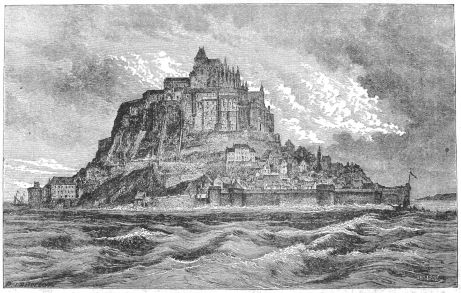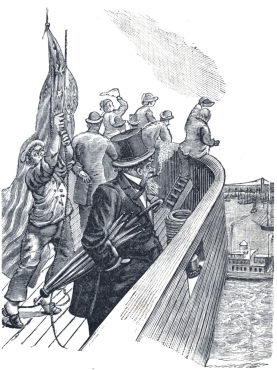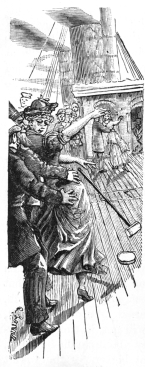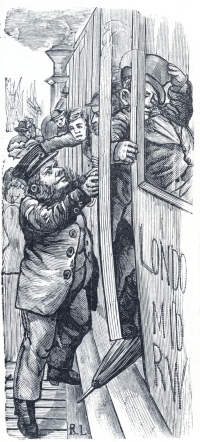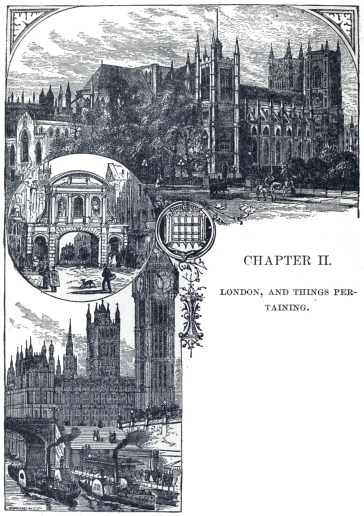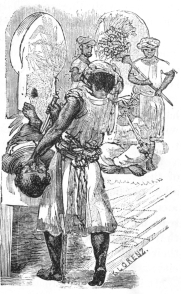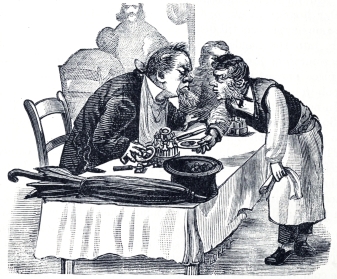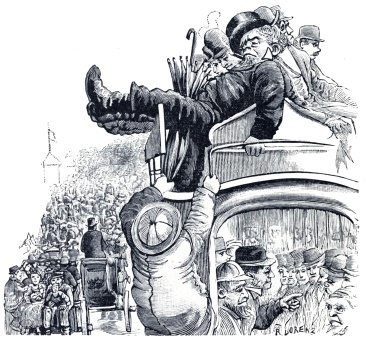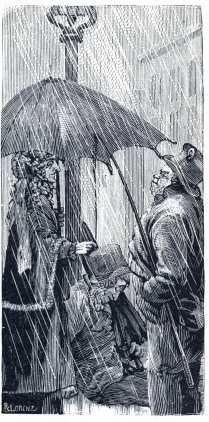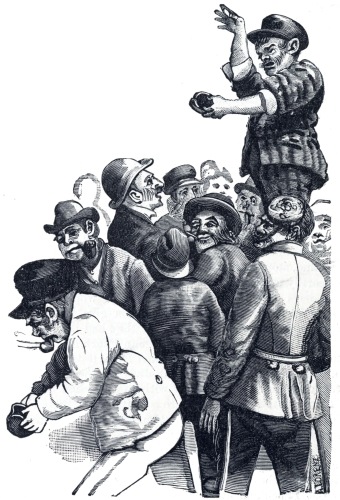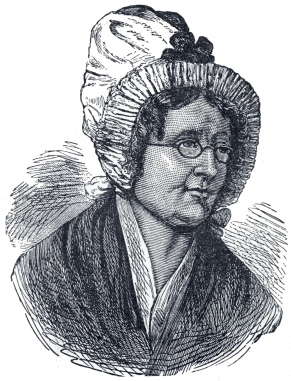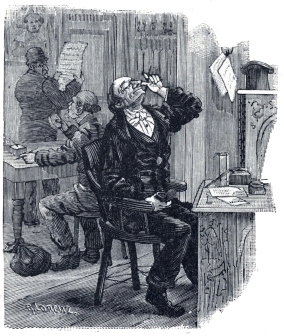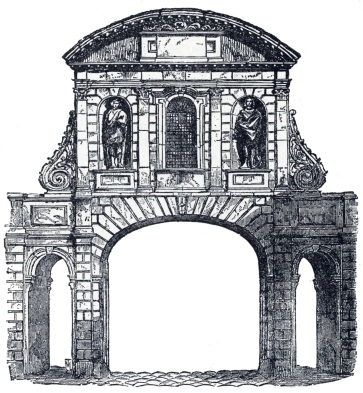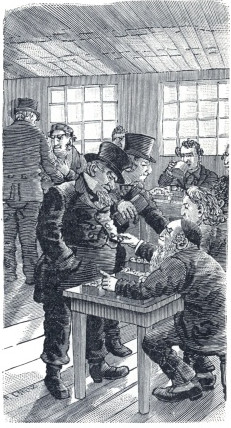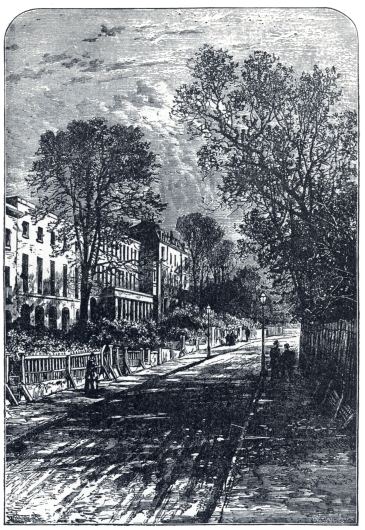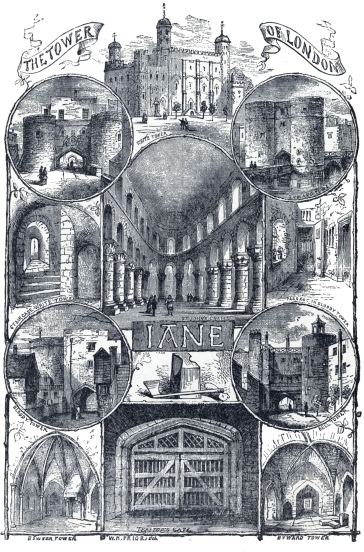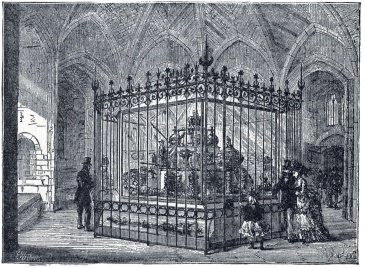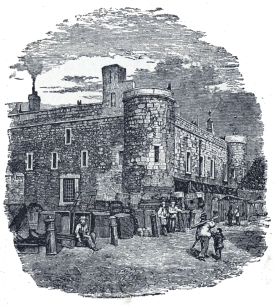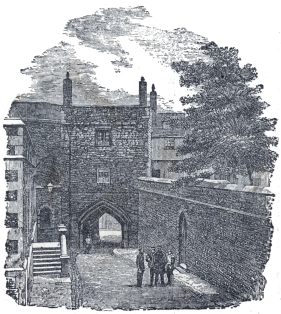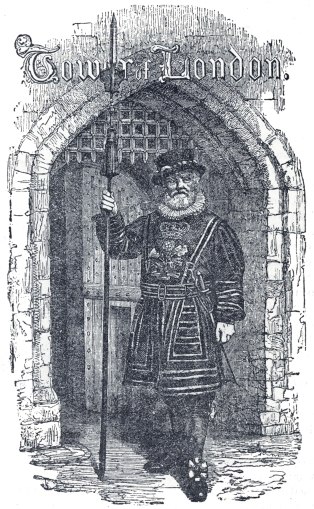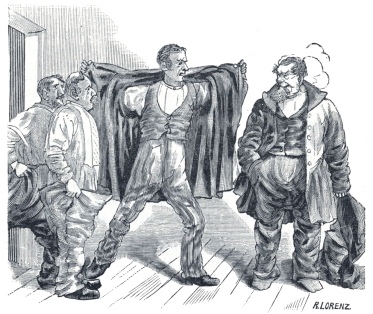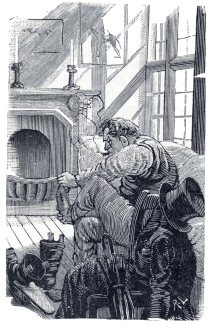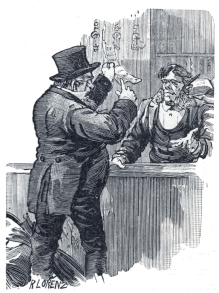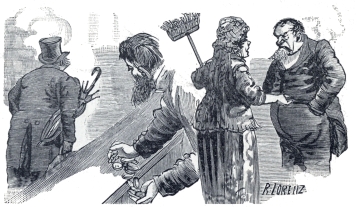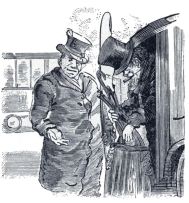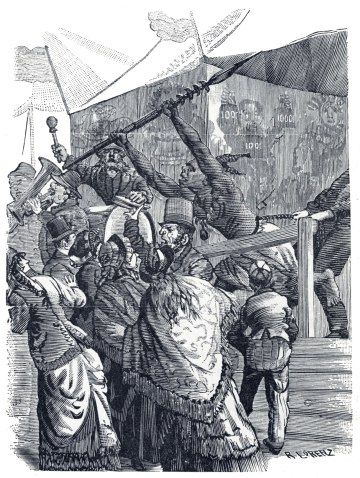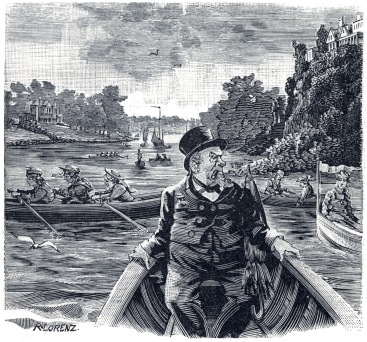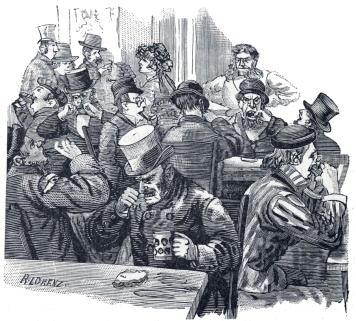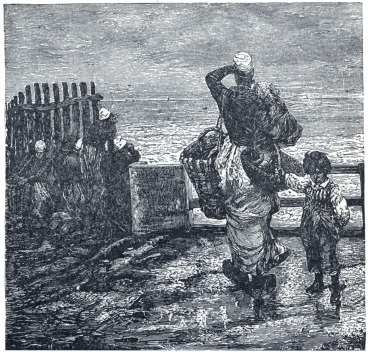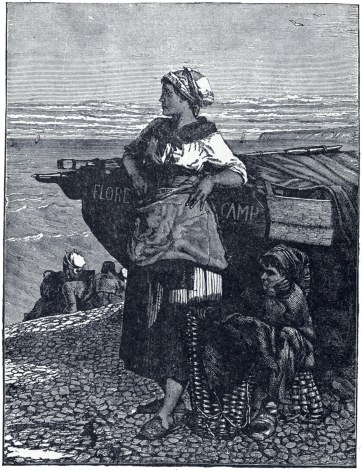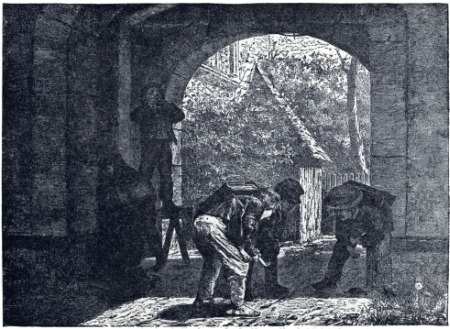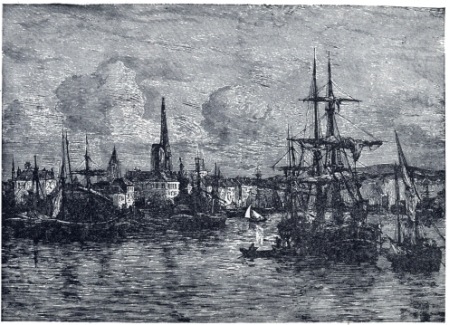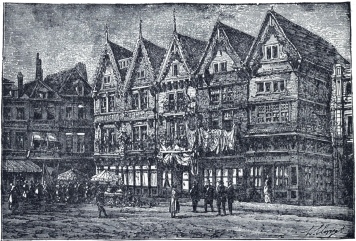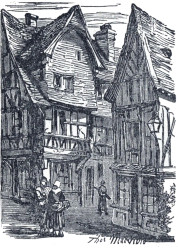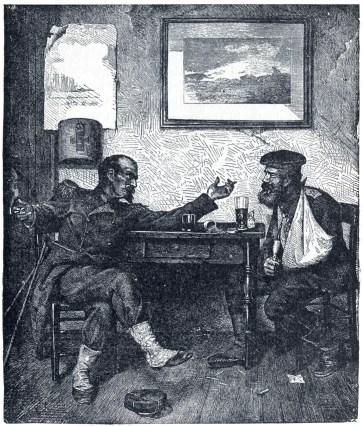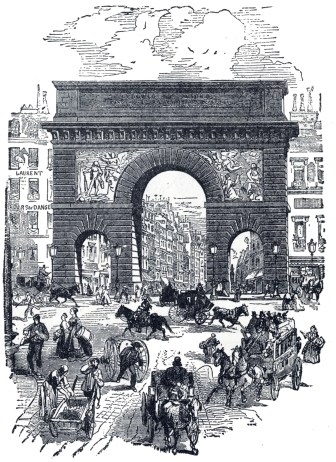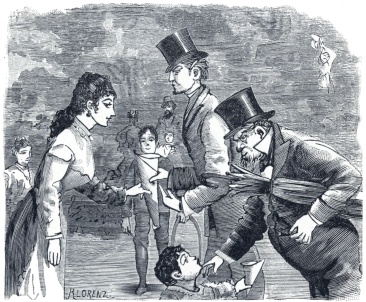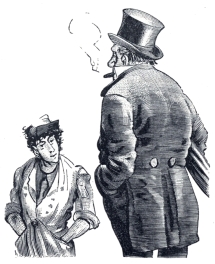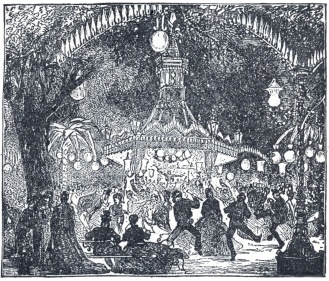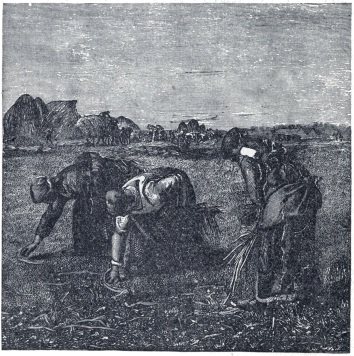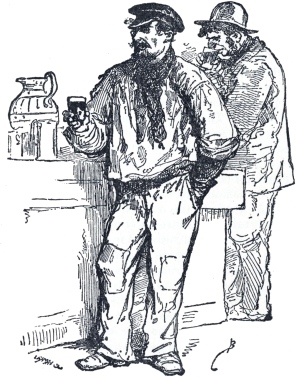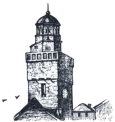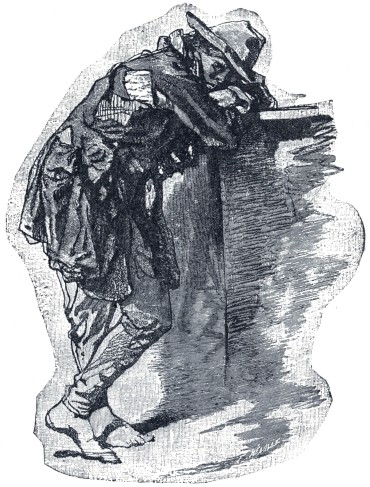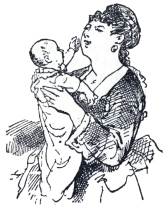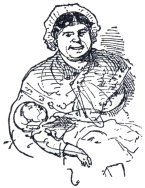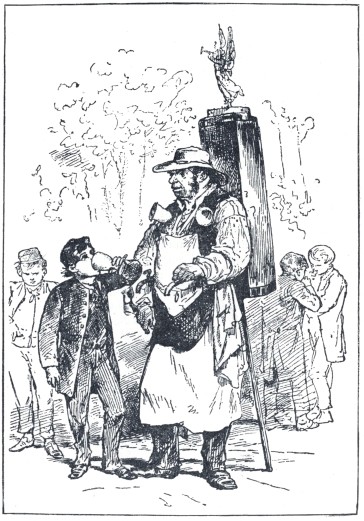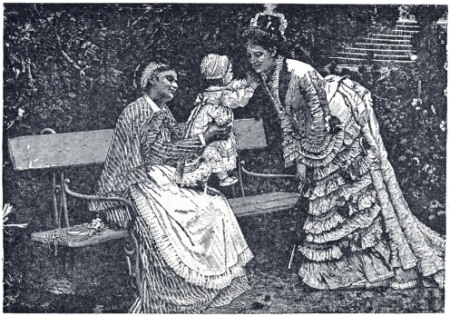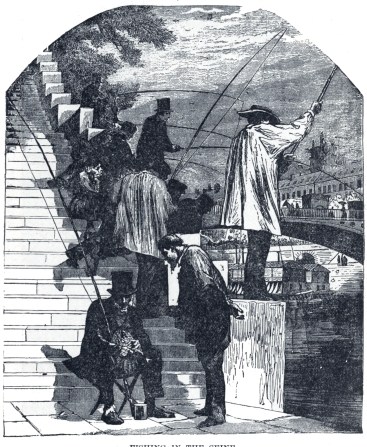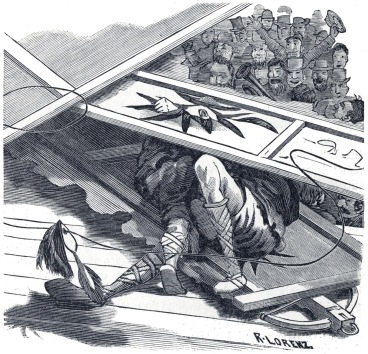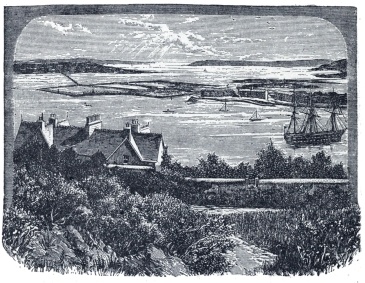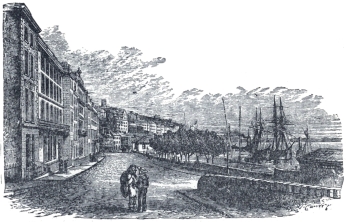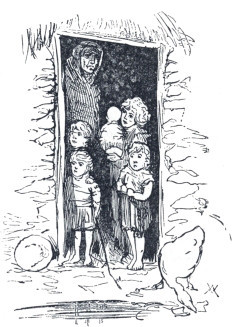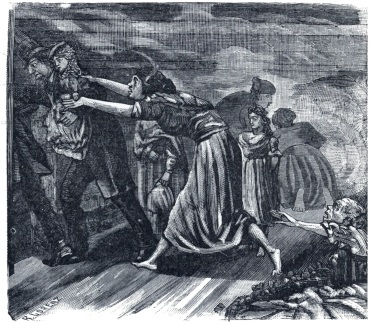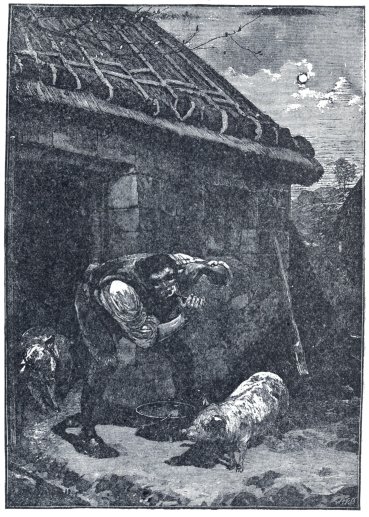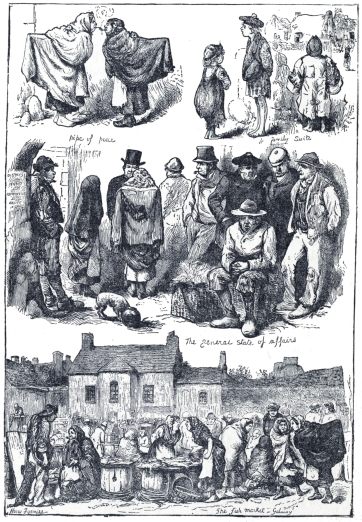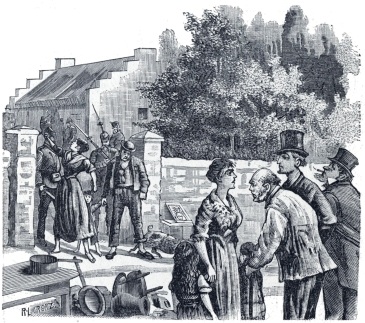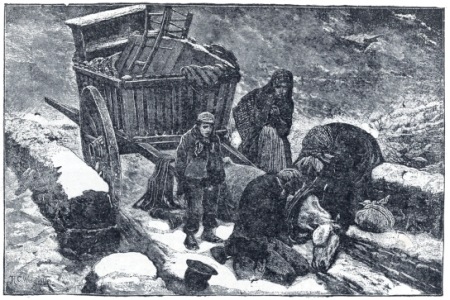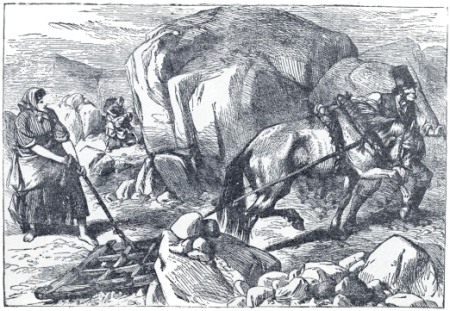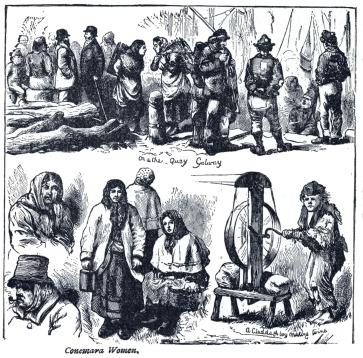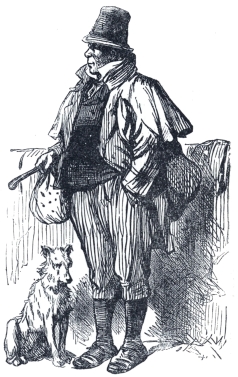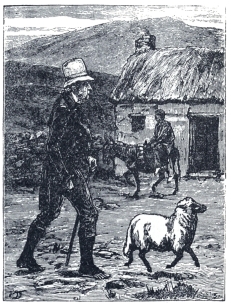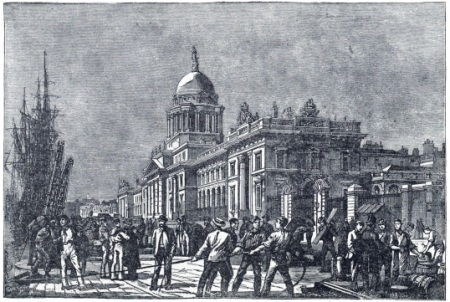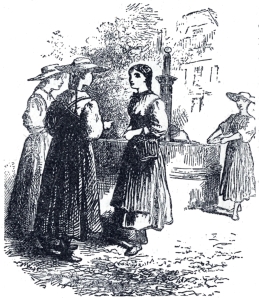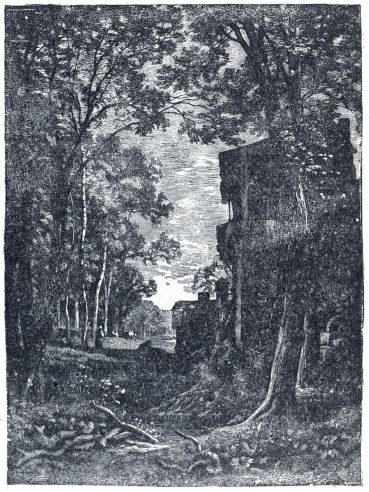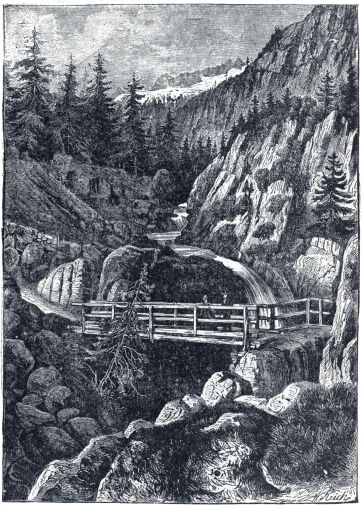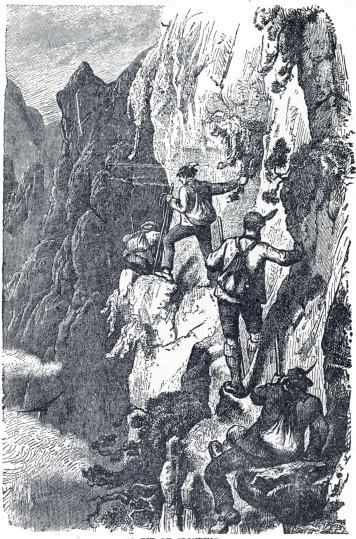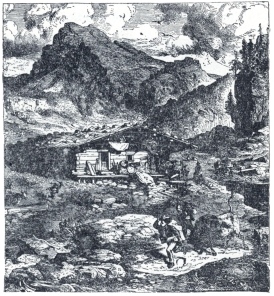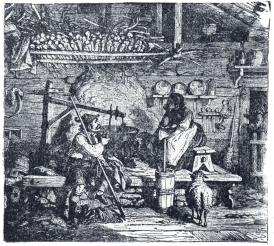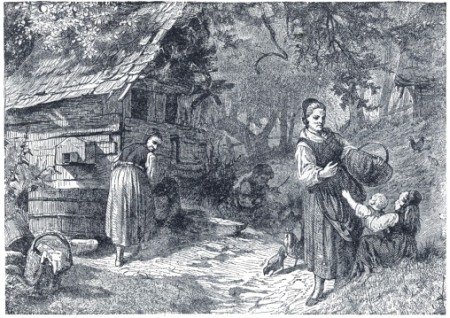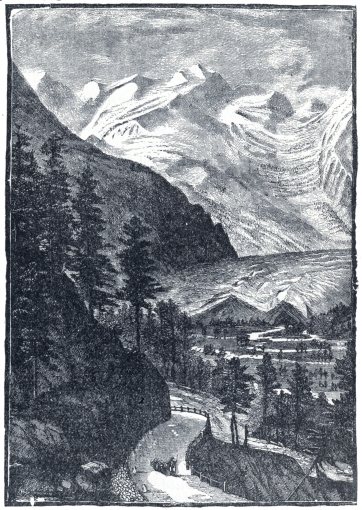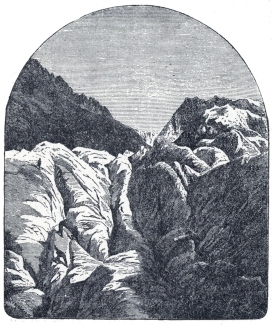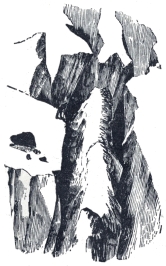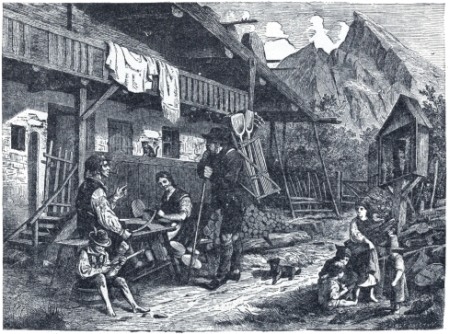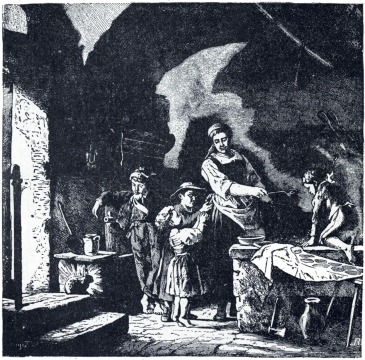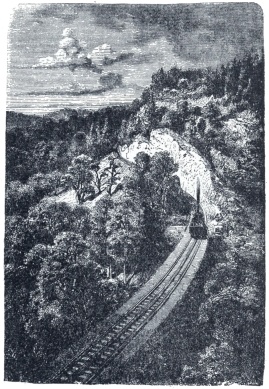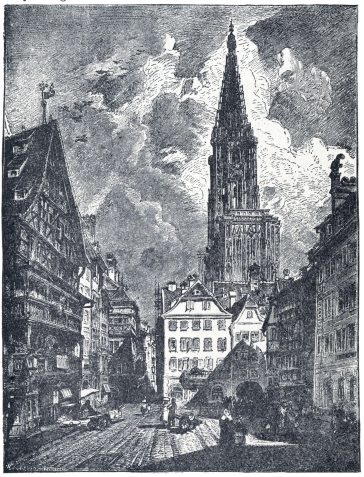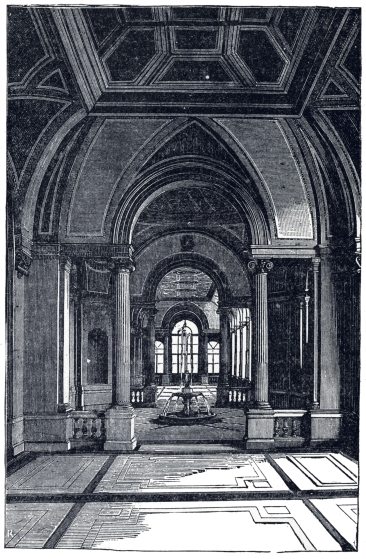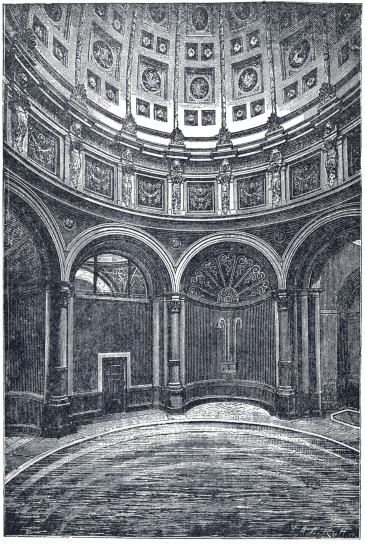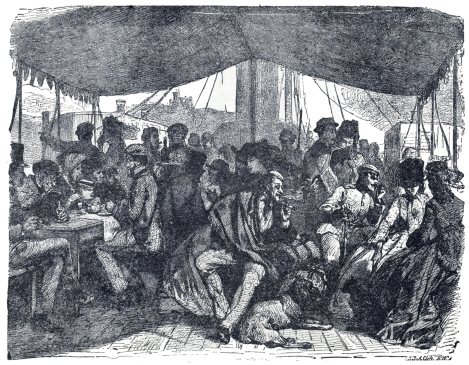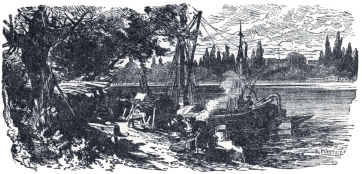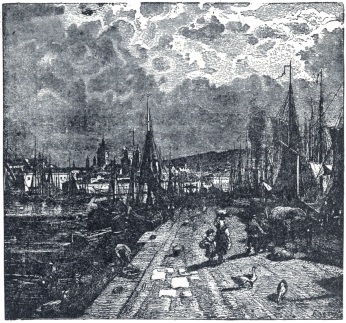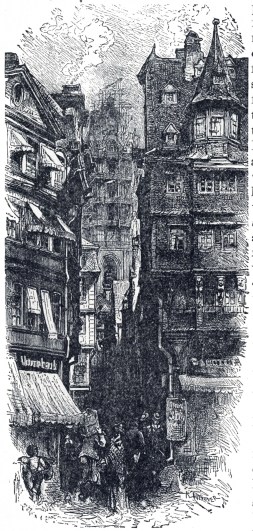*** START OF THE PROJECT GUTENBERG EBOOK 46451 ***
Every attempt has been made to replicate the original as printed.
No attempt has been made to correct or normalize the
spelling of non-English words.
Archaic spelllings (i.e. divers, ecstacy, graneries, asthetic, etc.) have been
retained.
Some typographical errors have been corrected;
a list follows the text.
In certain versions of this etext, in certain browsers,
clicking on this symbol  will bring up a larger version of the image.
will bring up a larger version of the image.
Illustrations.
Contents.
(etext transcriber's note) |
NASBY IN EXILE:
OR,
SIX MONTHS OF TRAVEL
IN
England, Ireland, Scotland, France, Germany,
Switzerland and Belgium,
WITH MANY THINGS NOT OF TRAVEL.
BY
DAVID R. LOCKE,
(Petroleum V. Nasby.)
———
PROFUSELY ILLUSTRATED.
———
TOLEDO AND BOSTON:
Locke Publishing Company.
1882.
COPYRIGHT,
1882,
By DAVID R. LOCKE.
ALL RIGHTS RESERVED.
Blade Printing and Paper Co.,
Printers and Binders,
TOLEDO, O.
PREFACE.
ON the afternoon of May 14, 1881, the good ship “City of Richmond,”
steamed out of New York harbor with a varied assortment of passengers on
board, all intent upon seeing Europe. Among these was the writer of the
pages that follow.
Six of the passengers having contracted a sort of liking for each other,
made a tour of six months together, that is, together most of the time.
This book is the record of their experiences, as they appeared
originally in the columns of the Toledo Blade.
It is not issued in compliance with any demand for it. I have no
recollection that any one of the one hundred thousand regular
subscribers to the Toledo Blade ever asked that the letters that
appeared from week to week in its columns should be gathered into book
form. The volume is a purely mercantile speculation, which may or may
not be successful. The publishers held that the matter was of sufficient
value to go between covers, and believing that they were good judges of
such things, I edited the letters, and here they are.
The ground we went over has been gone over by other writers a thousand
times. We went where other tourists have gone, and what we saw others
have seen. The only difference between this book and the thousands of
others that have been printed describing the same scenes, is purely the
difference in the eyes of the writers who saw them. I saw the countries
I visited with a pair of American eyes, and judged of men and things
from a purely American stand-point.
I have not attempted to describe scenery, and buildings, and things of
that nature, at all. That has been done by men and women more capable of
such work than I am. Every library in America is full of books of that
nature. But I was interested in the men and women of the countries I
passed through, I was interested in their ways of living, their
industries and their customs and habits, and I tried faithfully to put
upon paper what I saw, as well as the observations and comments of the
party that traveled and observed with me.
I have a hope that the readers of these pages will lay the book down in
quite as good condition, mentally and physically, as when they took it
up, and that some information as to European life will result from its
perusal. As I make no promises at the beginning I shall have no
apologies to make at the ending.
It is only justice to say that much of the descriptive matter is the
work of Mr. Robinson Locke, who was with me every minute of the time,
and the intelligent reader will be perfectly safe in ascribing the best
of its pages to his pen.
I can only hope that this work, as a book, will meet with the same
measure of favor that the material did as newspaper sketches.
D. R. L.
Toledo, Ohio, June 29, 1882.
ILLUSTRATIONS.
| No. | |
Page |
| 1. | Frontispiece. |
| 2. | The Departure | 18 |
| 3. | “Shuffle Board” | 22 |
| 4. | The Betting Young Man from Chicago | 24 |
| 5. | “Dear, Sea-sickness is only a Feminine Weakness,” | 27 |
| 6. | Lemuel Tibbitts, from Oshkosh, Writes a Letter | 29 |
| 7. | Every Sin I Had Committed Came Before Me | 33 |
| 8. | Off for London | 35 |
| 9. | Public Buildings, London | 36 |
| 10. | The Indian Policy | 39 |
| 11. | The Emetic Policy | 39 |
| 12. | A London Street Scene | 45 |
| 13. | A London Steak | 50 |
| 14. | “And is the Them Shanghais?” | 53 |
| 15. | Sol. Carpenter and the Race | 60 |
| 16. | Leaving for the Derby | 62 |
| 17. | By the Roadside | 64 |
| 18. | English Negro Minstrelsy | 66 |
| 19. | The Roadside Repast | 67 |
| 20. | The Betting Ring | 73 |
| 21. | “D——n the Swindling Scoundrel” | 74 |
| 22. | Egyptian Room, British Museum | 76 |
| 23. | A Bold Briton Trying the American Custom | 79 |
| 24. | A London Gin Drinking Woman | 80 |
| 25. | The Poor Man is Sick | 81 |
| 26. | “That Nigger is Mine” | 82 |
| 27. | St. Thomas Hospital | 92 |
| 28. | Interior of a Variety Hall | 95 |
| 29. | The Magic Purse | 98 |
| 30. | The Man who was Music Proof | 100 |
| 31. | Madame Tussaud | 102 |
| 32. | Wax Figures of Americans | 103 |
| 33. | “Digging Corpses is all Wrong” | 105 |
| 34. | Improved Process of Burke and Hare | 106 |
| 35. | Isle of Wight | 107 |
| 36. | The London Lawyer | 110 |
| 37. | The Old English Way of Procuring a Loan | 118 |
| 38. | “Beware of Fraudulent Imitations” | 120 |
| 39. | The Old Temple Bar | 122 |
| 40. | The Sidewalk Shoe Store | 125 |
| 41. | “Sheap Clodink” | 127 |
| 42. | “Dake Dot Ring” | 133 |
| 43. | A Lane in Camberwell | 135 |
| 44. | The Tower of London | 136 |
| 45. | The Jewel Tower | 140 |
| 46. | Sir Magnus’ Men | 142 |
| 47. | Horse Armory | 144 |
| 48. | St. John’s Chapel | 145 |
| 49. | St. Thomas’ Tower | 146 |
| 50. | General View of the Tower | 147 |
| 51. | The Bloody Tower | 148 |
| 52. | Drowning of Clarence in a Butt of Wine | 149 |
| 53. | The Byward Tower from the East | 150 |
| 54. | The Beauchamp Tower | 151 |
| 55. | The Overworked Headsman | 152 |
| 56. | The Persuasive Rack | 153 |
| 57. | The Byward Tower from the West | 154 |
| 58. | The Middle Tower | 155 |
| 59. | The Beef Eater | 156 |
| 60. | The Flint Tower | 157 |
| 61. | The Traitor’s Gate | 158 |
| 62. | What Shall We Do with Sir Thomas? | 159 |
| 63. | The Easiest Way | 160 |
| 64. | The Suits Come Home | 163 |
| 65. | The Candle Episode | 168 |
| 66. | The Little Bill | 169 |
| 67. | Getting Ready to Leave a Hotel | 169 |
| 68. | The Last Straw | 170 |
| 69. | The Cabman Tipped | 170 |
| 70. | The Universal Demand | 171 |
| 71. | The Lord Mayor’s Show | 173 |
| 72. | A Second Hand Debauch | 175 |
| 73. | The Anniversary Ceremonies | 178 |
| 74. | In the Harbor | 179 |
| 75. | Isle of Wight | 182 |
| 76. | The Unfinished Entries in the Diary | 184 |
| 77. | Westminster Abbey | 186 |
| 78. | Exterior of the Abbey | 187 |
| 79. | Entrance to the Abbey | 188 |
| 80. | The Poet’s Corner | 191 |
| 81. | Henry VII.’s Chapel | 193 |
| 82. | Chapel of Edward | 197 |
| 83. | Effigy Room | 200 |
| 84. | The Abbey in Queen Anne’s Time | 201 |
| 85. | “If She Ever Miscalculates She’s Gone,” | 204 |
| 86. | The Death of the Trainer | 206 |
| 87. | The Gorgeous Funeral Procession | 207 |
| 88. | Monument to the Trainer | 208 |
| 89. | The Side Show Zulu | 210 |
| 90. | The Lost Finger | 212 |
| 91. | On the Thames | 218 |
| 92. | Sandwiches at New Haven | 222 |
| 93. | Off Dieppe—Four A. M. | 224 |
| 94. | “Have You Tobacco or Spirits?” | 225 |
| 95. | Fisher Folk—Dieppe | 227 |
| 96. | Fisher Women—Dieppe | 228 |
| 97. | Fisher Boy and Child | 229 |
| 98. | The Boys of Rouen | 232 |
| 99. | Rouen | 233 |
| 100. | The Professor Stood Before it | 234 |
| 101. | Cathedral of Notre Dame | 235 |
| 102. | House of Joan d’Arc | 235 |
| 103. | Harbor of Rouen | 236 |
| 104. | St. Ouen—Rouen | 238 |
| 105. | The Showman in Paris | 240 |
| 106. | Bloss’ Great Moral Spectacle | 241 |
| 107. | Tower of St. Pierre | 242 |
| 108. | Old Houses—Rouen | 242 |
| 109. | The Professor’s Spectacles | 245 |
| 110. | Old Paris | 246 |
| 111. | Liberty, Fraternity, Equality | 247 |
| 112. | New Paris | 248 |
| 113. | The Louvre | 250 |
| 114. | A Boulevard Cafe | 252 |
| 115. | A Costume by Worth | 253 |
| 116. | A Magazine on the Boulevard | 254 |
| 117. | Mr. Thompson’s Art Purchases | 256 |
| 118. | The American Party Outside a Cafe | 259 |
| 119. | The Avenue de L’Opera | 261 |
| 120. | Cafe Concerts | 262 |
| 121. | The Faro Bankeress | 266 |
| 122. | French Soldiers | 267 |
| 123. | Parisian Bread Carriers | 269 |
| 124. | Queer—to Frenchmen | 271 |
| 125. | The Porte St. Martin | 272 |
| 126. | A Very Polite Frenchman | 275 |
| 127. | “Merci, Monsieur!” | 277 |
| 128. | Paris Underground | 279 |
| 129. | Interior of the Paris Bourse | 280 |
| 130. | The Arc du Carrousel | 282 |
| 131. | “How Long Must I Endure This?” | 285 |
| 132. | Tail Piece | 286 |
| 133. | The Mother of the Gamin as She Was | 288 |
| 134. | The Mother of the Gamin in the Sere and Yellow Leaf | 289 |
| 135. | The Aged Stump Gatherer | 290 |
| 136. | A Talk with a Gamin | 294 |
| 137. | The Mabille at Night | 305 |
| 138. | A Mabille Divinity | 306 |
| 139. | Professionals in a Quadrille | 309 |
| 140. | A Male Dancer | 310 |
| 141. | The Grisette | 311 |
| 142. | Meeting of Tibbitts and the Professor | 314 |
| 143. | The Cafe Swell | 316 |
| 144. | Tail Piece | 318 |
| 145. | Beauvais Cathedral | 319 |
| 146. | Struggle for the Kingship | 322 |
| 147. | Of the Commune | 326 |
| 148. | Tibbitts and Faro Bankeress | 330 |
| 149. | Tail Piece | 331 |
| 150. | Palais Royal | 333 |
| 151. | Vision of the Commune | 335 |
| 152. | Mother and Bonne | 337 |
| 153. | The Youthful Bonne | 338 |
| 154. | The Aged Bonne | 338 |
| 155. | “Who Put that Ribbon in your Cap?” | 345 |
| 156. | Corrective Used by Mr. Tibbitts | 348 |
| 157. | The Coco Seller | 349 |
| 158. | In Any of the Parks | 358 |
| 159. | The No-Legged Beggar Woman | 360 |
| 160. | How the French Sport Kills Game | 362 |
| 161. | Fishing in the Seine | 363 |
| 162. | Inside a Paris Omnibus | 364 |
| 163. | The Showman Shown the Door | 365 |
| 164. | The Tell Catastrophe | 368 |
| 165. | Zoological Room | 369 |
| 166. | Cork Harbor | 370 |
| 167. | Queenstown | 371 |
| 168. | Irish Woman and Daughter | 375 |
| 169. | A County Cork Cabin | 377 |
| 170. | Interior of Better Class Cabin | 378 |
| 171. | Royal Irish Constabulary | 379 |
| 172. | Interior of Cabin | 380 |
| 173. | A Quiver Full | 381 |
| 174. | Street in an Irish Village | 384 |
| 175. | Blarney Castle | 385 |
| 176. | Free Speech in Ireland | 387 |
| 177. | In a Bog Village | 389 |
| 178. | “Drop the Child!” | 391 |
| 179. | Nature’s Looking Glass | 393 |
| 180. | Irishman of the Stage and Novel | 394 |
| 181. | The Evicted Irishman | 395 |
| 182. | To Market and Back | 396 |
| 183. | The Real Irish Girl | 397 |
| 184. | A Small but Well-to-do Farmer | 398 |
| 185. | Sketches in Galway | 402 |
| 186. | Affixing Notice of Eviction | 406 |
| 187. | Eviction | 407 |
| 188. | The Eviction we Saw | 408 |
| 189. | Evicted | 409 |
| 190. | Farming in County Mayo | 410 |
| 191. | My Lord’s Agent | 413 |
| 192. | Kind of a Girl My Lord Wants | 414 |
| 193. | The Woman who Paid the Poor Rate | 416 |
| 194. | Conemara Women | 418 |
| 195. | At Work in the Bog | 420 |
| 196. | Duke Leinster’s Tenants | 422 |
| 197. | Tenant Farmer | 424 |
| 198. | In a Discontented District | 426 |
| 199. | Protecting a Gentleman Farmer | 427 |
| 200. | Filling the Ditch | 429 |
| 201. | Ready for Emigration | 431 |
| 202. | Old but Tolerably Cheerful | 433 |
| 203. | After a Wholesale Eviction | 435 |
| 204. | The “Faymale Painther” | 436 |
| 205. | Old and Not Cheerful | 438 |
| 206. | The Proper End of Royalty | 441 |
| 207. | Meath Lads at Crossakeel | 443 |
| 208. | A Mayo Farmer | 445 |
| 209. | Mayo Peasantry | 447 |
| 210. | Inhabitants of a Bog Village | 449 |
| 211. | Dublin | 452 |
| 212. | They Glared Ferociously | 456 |
| 213. | Bog Village | 459 |
| 214. | Interior French Car | 462 |
| 215. | They were Lively Children | 464 |
| 216. | Geneva | 466 |
| 217. | “Your Hotel is a Swindle, Sir” | 474 |
| 218. | Group of Swiss Girls | 480 |
| 219. | The Sweat of Other Men’s Brows | 481 |
| 220. | The Alpine Guide | 485 |
| 221. | A Non-Professional Lady Tourist | 487 |
| 222. | Young Man with Inopportune Remarks | 493 |
| 223. | “Would You Oblige Me?” | 495 |
| 224. | “See Me Unmask this Jew” | 497 |
| 225. | Swiss Timber Village | 501 |
| 226. | The Slender Bridge | 503 |
| 227. | A Bit of Climbing | 504 |
| 228. | Where the Maiden Leaped From | 511 |
| 229. | The Chamois | 513 |
| 230. | Taking the Cattle to the Mountains | 513 |
| 231. | Outside the Chalet | 515 |
| 232. | Inside the Chalet | 516 |
| 233. | An Alpine Homestead | 519 |
| 234. | “I Should Wake Them Cheerily” | 520 |
| 235. | On the Road to Chamonix | 525 |
| 236. | The Presumed Chamois Hunter | 530 |
| 237. | The Fate of Two Englishmen | 532 |
| 238. | A Frequent Accident | 533 |
| 239. | The Mer De Glace | 534 |
| 240. | A Slip Toward the Edge | 535 |
| 241. | Crevasses | 536 |
| 242. | The Moraine | 537 |
| 243. | The Dilemma | 538 |
| 244. | Rocks Polished by Old Glaciers | 539 |
| 245. | The Path to the Village | 548 |
| 246. | Mt. Blanc and Valley of Chamonix | 550 |
| 247. | The Conscientious Barber | 555 |
| 248. | The Jungfrau | 557 |
| 249. | Wood Carving | 559 |
| 250. | Home of the Carver | 560 |
| 251. | Female Costumes | 562 |
| 252. | Our Party at the Giessbach | 565 |
| 253. | Peasants of East Switzerland | 567 |
| 254. | Near Brienz | 568 |
| 255. | Lion of Lucerne | 570 |
| 256. | End of Pontius Pilate | 573 |
| 257. | Lucerne Rigi-Rail | 575 |
| 258. | Ditto from Kanzell | 576 |
| 259. | Old Way of Ascending Rigi | 578 |
| 260. | Night Ascent of Rigi | 579 |
| 261. | Railway up the Rigi | 581 |
| 262. | Rigi Railway | 582 |
| 263. | Railway up the Mountain | 583 |
| 264. | Tell’s Chapel | 584 |
| 265. | Tibbitts in Concert Hall | 589 |
| 266. | Entrance Strasburg Cathedral | 593 |
| 267. | Pig Market, Strasburg | 596 |
| 268. | The Great Hall | 606 |
| 269. | Tibbitts Making Plain the Point | 608 |
| 270. | Front of the Kursale | 612 |
| 271. | The Swimming Bath | 614 |
| 272. | The Donkey Enjoyed It | 616 |
| 273. | The Lichtenthal | 617 |
| 274. | Promenade in Baden-Baden | 618 |
| 275. | Charcoal Burners, Black Forest | 619 |
| 276. | Heidelberg Castle | 623 |
| 277. | Heidelberg Tun | 626 |
| 278. | Tibbitts and the Students | 629 |
| 279. | Rhine Steamer | 630 |
| 280. | Mannheim | 631 |
| 281. | Tibbitts in the Cloak Room | 633 |
| 282. | Mayence | 639 |
| 283. | Erchenheim Tower | 640 |
| 284. | Roemer | 640 |
| 285. | Luther’s Home | 640 |
| 286. | Street on the Roemerberg | 642 |
| 287. | The Jews’ Street | 644 |
| 288. | “Der Hind Leg of a Helty Mule” | 649 |
| 289. | Cologne Cathedral | 651 |
| 290. | Death of Bishop Hatto | 655 |
| 291. | Legend of the Cathedral | 668 |
CONTENTS.
TO
Charles A. B. Shepard,
The “Poetical Bookseller,”
This book is dedicated (without permission)
as a
Tribute to a most Reliable Friend,
a Thorough Business Man, and
One whose steady devotion to everything right and proper,
and whose
hatred for everything mean and disreputable,
was never questioned by any one
who knew him.
NASBY IN EXILE.
CHAPTER I.
THE DEPARTURE, VOYAGE, AND LANDING.
“CAST OFF!” There was a bustle, a movement of fifty men, a rush of
people to the gangways; hurried good-bys were said; another rush,
assisted by the fifty men, the enormous gangways were lifted, there was
a throb of steam, a mighty jar of machinery, a tremor along the line of
the vast body of wood and iron, and the good ship “City of Richmond” was
out at sea.
I am not going to inflict upon the reader a description of the harbor of
New York, or anything of the kind. The whole world knows that it is the
finest in the world, and every American would believe it so, whether it
is so or not. Suffice it to say that the ship got out of the harbor
safely, and before nightfall was upon the broad Atlantic, out of the way
of telegraph and mail facilities, and one hundred and fifty-six saloon
passengers—men, women, and children—found themselves beyond the reach
of daily papers, though they had everything else that pertains to
civilization and luxury.
A voyage at sea is not what it was when first I sailed from—but no, I
have never been abroad before, and have not, therefore, the privilege of
lying about travel. That will come in time, and doubtless I shall use it
as others do. But I was going to say that sailing is not what it was, as
I understand it to have been. The ship of to-day is nothing more or less
than a floating hotel, with some few of the conveniences omitted, and a
great many conveniences that hotels on shore have not. You have your
luxurious barber-shop, you have a gorgeous bar, you have hot and cold
water in your room, and a table as good as the best in New York. You
eat, drink, and sleep just as well, if not better, than on shore.
The sailor is no more what he used to be than the ship is. I have seen
any number of sailors, and know all about them. The tight young fellow
in blue jacket and shiny tarpaulin, and equally shiny belt, and white
trousers, the latter enormously wide at the bottom, which trousers he
was always hitching up with a very peculiar movement of the body,
standing first upon one leg and then upon the other; the sailor who
could fight three pirates at once and kill them all, finishing the last
one by disabling his starboard eye with a chew of tobacco thrown with
terrible precision; who, if an English sailor, was always a match for
three Frenchmen, if an American a match for three Englishmen, and no
matter of what nationality, was always ready to d—n the eyes of the man
he did not like, and protect prepossessing females and oppressed
children even at the risk of being hung at the yard-arm by a
court-martial—this kind of a sailor is gone, and I fear forever. I know
I have given a proper description of him, for I have seen hundreds of
them—at the theater.
WHO WERE ON BOARD.
In his stead is an unpoetic being, clad in all sorts of unpoetic
clothing, and no two of them alike. There is a faint effort at
uniformity in their caps, which have sometimes the name of their ship on
them, but even that not always. In fair weather he is in appearance very
like a hod carrier, and in foul weather a New York drayman. He doesn’t
d—n anybody’s eyes, and he doesn’t sing out “Belay there,” or “Avast,
you lubber,” or indulge in any other nautical expressions. He uses just
about the language that people on shore do, and is as dull and
uninteresting a person as one would wish not to meet.
The traditional jack tar, of whom the Dibden of the last century sang,
only remains in “Pinafore” opera, and can only be seen when the nautical
pieces of the thirty years ago are revived. If such sailors ever
existed, off the stage, they are as extinct a race as the icthyosaurus.
Steam has knocked the poetry out of navigation, as it has out of
everything else—that is, that kind of poetry. It will doubtless have a
poetry of its own, when its gets older, but it is too new yet.
There is no holystoning the decks. On the contrary the decks are washed
with hose, and scrubbed afterward by a patent appliance, which has
nothing of the old time about it. The lifting is done by steam, and in
fact every blessed thing about the ship is done by machinery. There is
neither a ship nor a sailor any more. There are floating hotels, and
help. The last remaining show for a ship is the masts and sails they all
have, and they seem to be more for ornament than use.
The company on board was, on the whole, monotonous. Ocean travel is
either monotonous or dangerous. Its principal advantage over land travel
is, the track is not dusty.
We had on our passenger list precisely the usual people, and none
others. There were three Jews of different types: the strong, robust,
eagle-nosed and eagle-eyed German Jew, resident of New York, going
abroad on business; the keen French Jew, returning from a successful
foray on New York jewelers, and the Southern Jew, who, having made a
fortune in cotton, attached no value to anything else.
I like the Jews, and ten days with them did not lessen my liking. They
know something for certain; they do things, and they do well what they
do.
There was a Chicago operator in mining stocks, going abroad to place
the “Great Mastodon” in London. There was the smooth-chinned,
side-whiskered minister, or “priest,” as he delighted in calling
himself, of the Church of England, going home, and a fiery Welsh Baptist
who had been laboring in the States for many years.
On Sunday evening the Chicago man and a Texan engaged the English
minister in a discussion on the evidences of Christianity. It was a
furious controversy, and an amusing one. The Welsh Baptist was a more
zealous Christian than the Church of England man, and he did by far the
best part of the argument; but the priest, by look at least, resented
his interference. Being a Baptist, he was entirely irregular, and did
not hold up his end of the argument regularly. The priest regarded the
evangelist as a regular soldier might a guerilla serving the same side.
The discussion embraced every point that religionists affirm and
infidels deny, commencing with the creation and coming down to the
present day, with long excursions into the future.
A terrible disaster was the result. The next morning the priest met the
infidel on deck, and extended his hand humbly:
“My dear sir,” said he, “I have been thinking over the matter we
discussed last night. I am convinced that you are right, and that—”
“What!” exclaimed the infidel. “My dear sir, I was looking for you. Your
forcible and convincing statements satisfy me that there is truth in the
Christian religion, and—”
Neither said more. The priest had converted the infidel to Christianity,
and the infidel had converted the priest to infidelity. So far as the
result upon the religion of the world was concerned, it was a stand-off.
The days were devoted to all sorts of occupations. There were young men
spooning young women, and young women who made a business of flirtation,
or what was akin to it. One young lady who could be seen at any time in
the day, in a most bewitching attitude, reclining on a steamer chair,
picturesque in all sorts of wraps, held a brief conversation with her
mother, who had hooked a widower the second day out. The mother was
skillful at looking young, and compelled her child, therefore, to be
juvenile and shy of young men.
HOW THE PASSENGERS AMUSED THEMSELVES.
“Helen, you were flirting with that Chicago young man, this morning!”
“Flirting! Mamma! It’s too mean! You won’t let me flirt. I havn’t
enjoyed myself a minute since we sailed. I wish you would let me alone
to do as I please.”
The poor child envied her mother, and with good reason, for within ten
minutes she was under the wing, or arm, of the widower, looking not a
minute over thirty-five.
There were old maids who found themselves objects of attention for the
first time for years; there were widows who grew sentimental looking at
the changing waters, especially at night when the moon and stars were
out; there were married men whose wives were many leagues away,
determined to have a good time once more, flirting with all sorts and
conditions of women, and there were all sorts and conditions of women
flirting hungrily with all sorts and conditions of men. There were
speculators driving bargains with each other just the same as on
land—in brief, the ship was a little world by itself, and just about
the same as any other world.
In the smoking room the great and muscular American game of draw poker
was played incessantly, from early in the morning, till late in the
night.
A portion of the passengers, including the English dominie, played a
game called “shuffle-board.” Squares were marked upon the deck, which
were numbered from one to seven. Then some distance from the squares a
line was drawn, and what you had to do was to take an implement shaped
like a crutch, and shove discs of wood at the squares. We all played it,
sooner or later, for on ship-board one will get, in time, to playing pin
alone in his room. The beauty about shuffle-board is, one player is as
good as another, if not better, for there isn’t the slightest skill to
be displayed in it. Indeed, the best playing is always done at first,
when the player shoots entirely at random. There is a chance that he
will strike a square, then; but when one gets to calculating distances,
and looking knowingly, and attempting some particular square, the
chances are even that the disc goes overboard.
However, it is a good and useful game. The young ladies look well
handling the clumsy cues, and the attitudes they are compelled to take
are graceful. Then as the vessel lurches they fall naturally in your
arms. By the way, it is a curious fact and one worthy of record, that I
did not see a young lady fall into the arms of another young lady during
the entire voyage.
We had on board, as a matter of course, the betting young man from
Chicago. No steamer ever sailed that did not have this young fellow
aboard, and there is enough of them to last the Atlantic for a great
many years. He knew everything that everybody thinks they know, but do
not, and his delight was to propound a query, and then when you had
answered it, to very coolly and exasperatingly remark:—
“Bet yer bottle of wine you’re wrong.”
The matter would be so simple and one of so common repute that
immediately you accepted the wager only to find that in some minute
particular, you were wrong, and that the knowing youth had won.
For instance:—
“Thompson, do you know how many States there are in the Union?”
Now any citizen of the United States who votes, and is eligible to the
Presidency, ought to know how many States there are in his beloved
country without thinking, but how many are there who can say, off-hand?
And so poor Thompson answered:—
“What a question! Of course I know.”
“Bet ye bottle ye don’t!”
“Done. There are—”
THE YOUNG MAN FROM CHICAGO.
And then Thompson would find himself figuring the very important problem
as to whether Colorado had been admitted, and Nevada, and Oregon, and he
would decide that one had and the other hadn’t, and finally state the
number, with great certainty that it was wrong.
The Chicago man’s crowning bet occurred the last day out. The smoking
room was tolerably full, as were the occupants, and everybody was bored,
as everybody is on the last day. The Chicago man had been silent for an
hour, when suddenly he broke out:
“Gentlemen—”
“Oh, no more bets,” was the exclamation of the entire party. “Give us a
rest.”
“I don’t want to bet, but I can show you something curious.”
“Well?”
“I say it and mean it. I can drink a glass of water without it’s going
down my throat.”
“And get it into your stomach?”
“Certainly.”
There was a silence of considerably more than a minute. Every man in the
room had been victimized by this gatherer up of inconsidered trifles,
and there was a general disposition to get the better of him in some way
if possible. Here was the opportunity. How could a man get a glass of
water into his stomach without its going down his throat? Impossible!
And so the usual bottle of wine was wagered, and the Chicago man
proceeded to accomplish the supposed impossible feat. It was very easily
done. All he did was to stand upon his head on the seat that runs around
the room and swallow a glass of water. It went to his stomach, but it
did not go down his throat. It went up his throat. And so his last
triumph was greater than all his previous ones, for every man in the
room had been eager to accept his wager. From that time out had he
offered to wager that he would swallow his own head he would have got no
takers.
It is astonishing how short remembrance is, and how the knowledge of one
decade is swallowed up in the increasing volume of the next. Every one
of the catches employed by this young man to keep himself in wine and
cigars were well known ten years ago, but totally unknown now except by
the few who use them. The water going up the throat instead of down was
published years ago in a small volume called “Hocus Pocus,” and it sold
by the million, but nobody knows of it to-day. I once asked a sharper
who had lived thirty years by the practice of one simple trick, how it
happened that the whole world did not know his little game?

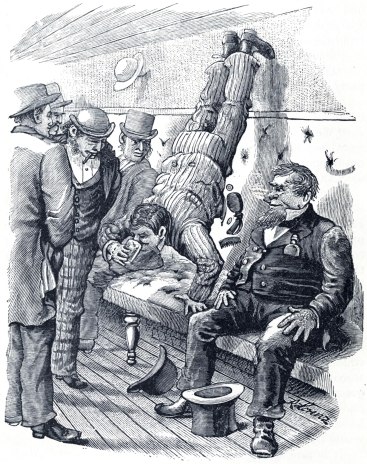
THE BETTING YOUNG MAN FROM CHICAGO.
“There are new crops of fools coming on every year,” was his answer. He
was right. The stock will never run out.
SEA-SICKNESS.
There were one hundred and fifty-six saloon passengers on board, but
with the exception of those mentioned, a distressing monotony prevailed
among them. Never was so good a set of people ever gathered together.
They were fearfully good—too good by half.
True goodness is all very well in the abstract, but there is nothing
picturesque about it. It is slightly tame. Your brigand, with short
green jacket and yellow breeches, with blue or green garters, and a tall
hat with a feather in it, is a much more striking being than a Quaker
woman. The wicked is always the startling, and, therefore, taking to the
eye.
On our ship the people were all good. There wasn’t a pickpocket, a card
sharper, or anything of the sort to vary the monotony of life. It was a
dead level of goodness, a sort of quiet mill-pond of morality, that to
the lover of excitement was distressing in the extreme. The card parties
were conducted decorously, and the religious services in the grand
saloon were attended by nearly every passenger, and what is more they
all seemed to enjoy it. Possibly it was because religious services were
a novelty to the most of them.
The second day out was a very rough one. The wind freshened—I think
that is the proper phrase—and a tremendously heavy sea was on. The
“City of Richmond” is a very staunch ship, and behaves herself
commendably in bad weather, but there is no ship that can resist the
power of the enormous waves of the North Atlantic. Consequently she
tossed like a cork, and, consequently, there was an amount of suffering
for two days that was amusing to everybody but the sufferers.
Sea-sickness is probably the most distressing of all the maladies that
do not kill. The sickness from first to last is a taste of death. The
resultant vomiting is of a nature totally different from any other
variety of vomiting known. The victim does not vomit—he throws up.
There is a wild legend that one man in a severe fit of sea-sickness
threw up his boots, but it is not credible. It is entirely safe to say,
however, that one throws up everything but original sin, and he gives
that a tolerable trial.
It was amusing to see those who had done the voyage before, and who had
been through sea-sickness, smile upon those who were in the throes of
agony. The look of superiority they took on, as much as to say, “when
you have been through it as I have, you won’t have it any more.” And
then to see these same fellows turn deadly pale, and leave their seats,
and rush to their rooms and disappear from mortal view a day or so, was
refreshing to those who were having their first experience.
The beauty of sea-sickness is that you may have it every voyage, which
is fortunate, as having a tendency to restrain pride and keep down
assumption of superiority; for when one has to suffer, one loves to see
everybody else suffer.
One man aboard did not think it possible that he could be sick, and he
was rather indignant that his wife should be. She, poor thing, was in
the agonies of death, and he insisted, as he held her head, that she
ought not to be sick, that her giving way to it was a weakness purely
feminine, and he went on wondering why a woman could not—
He quit talking very quickly. The strong man who was not a woman, turned
pale, the regular paleness that denotes the coming of the malady, and
dropping the head he had been holding so patronizingly with no more
compunction than as though it had been his pet dog’s, rushed to the side
of the vessel, and there paid his tribute to Neptune. The suffering
wife, sick as she was, could not resist the temptation to wreak a trifle
of feminine vengeance upon him. “Dear,” said she, between the heaves
that were rending her in several twains, “Sea-sickness is only a
feminine weakness. Oh—ugh—ugh—how I wish I were a strong man!”
There is one good thing about sea-sickness, and only one: the sufferer
cannot possibly have any other disease at the same time. One may have
bronchitis and dyspepsia at once, but sea-sickness monopolizes the whole
body. It is so all-pervading; it is such a giant of illness that there
is room for nothing else when it takes possession of a human body.
During General Butler’s occupancy of New Orleans a fiery Rebel Frenchman
was inveighing against him in set terms.
“But you must admit,” said a loyal Northerner, “that during General
Butler’s administration your city was free from yellow fever.”
THE SHARP-NOSED MAN.
“Ze yellow fevair and General Butlair in one season? Have ze great God
no maircy, zen?”
A kind Providence couldn’t possibly saddle sea-sickness with any other
ailment.

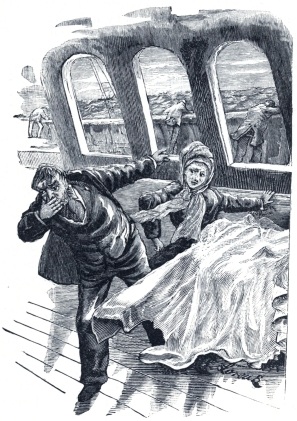
“DEAR—, SEA-SICKNESS IS ONLY—A FEMININE WEAKNESS.”
Was there ever a ship or a rail car, or any other place where danger is
possible, that there was not present the man with a sharp nose, slightly
red at the tip, whose chief delight seems to be to point out the
possibilities of all sorts of disaster, and to do it in the most
friendly way? I remember once going down the Hoosac Tunnel before it was
finished. I went down, not because I wanted to, (indeed I would have
given a farm, if I had had one, to have avoided it,) but it was the
thing to do there, and must be done. So with about the feeling that
accompanied John Rogers to the stake, I stepped, with others, upon the
platform, and down we went. It was a most terrible descent. A hole in
the ground eighteen hundred feet deep, and a platform, suspended by a
single rope! In my eyes that rope was not larger or stronger than
pack-thread.
“Is this safe?” I asked of the sharp-nosed man.
“Wa’all, yes, I s’pose so. It does break sometimes—did last month and
killed eight men. I guess we are all right, though the rope’s tollable
old and yest’dy they histed out a very heavy ingine and biler, which may
hev strained it. Long ways to fall—if she does break!”
Cheerful suggestion for people who were fifteen hundred feet from the
bottom and couldn’t possibly get off.
Another time on the Shore Line between Boston and New York, there was an
old lady who had never been upon a railroad train before, and who was
exceedingly nervous. Behind her sat the sharp-nosed man of that train,
who answered all her questions.
“Ya’as, railroad travelin’ is dangerous. Y’see they git keerless. Only a
year ago, they left a draw opened, and a train run into it, and mor’n a
hundred passengers wuz drownded.”
“Merciful heavens!” ejaculated the old lady, in an agony of horror. “We
don’t go over that bridge.”
“Yes we do, and we’re putty nigh to it now. And the men are jest ez
keerless now ez they wuz then. They git keerless. I never travel over
this road ef I kin help it.”
Then he went on and told her of every accident that he could remember,
especially those that had occurred upon that road.
And the old lady, with her blood frozen by the horrible recitals, sat
during the entire trip with her hands grasping tightly the arms of her
seat, expecting momentarily to be hurled from the track and torn limb
from limb, or to be plunged into the wild waters of the Sound.
TIBBITTS, OF OSHKOSH.
We had the sharp-nosed man with us. His delight was to take timid
girls, or nervous women, and explain if the slightest thing should get
wrong with the machinery how we should be at the mercy of the waves. For
instance, if we should lose our propeller what would happen? Or if any
one of the boilers should explode, filling the ship with hot steam,
scalding the passengers, or if the main shaft should break, in such a
sea as we were then having, or if we should run upon an iceberg, or
collide with some floating hulk?
“They say all these ships are built with water-tight compartments. Sho!
Stave in one part of the ship and it must go down. What happened to the
‘City of Boston?’ Never heard of. ‘City of Paris?’ Lost half her
passengers. But we must take our chances if we will travel.”
And this to a lot of people who had never been at sea before, with an
ugly wind blowing and a tremendous sea on. Imagine the frame of mind he
left his auditors in, and he made it his business, day after day, to
regale the very timid ones with harrowing histories of shipwrecks and
disasters at sea till their blood would run cold.
Some night this old raven will be lost overboard, but there will be
others just like him to take his place. Nature duplicates her
monstrosities as well as her good things.

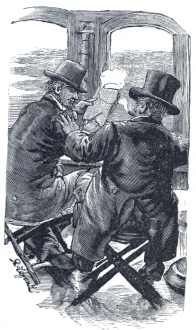
LEMUEL TIBBITTS, FROM NEAR OSHKOSH, WISCONSIN, WRITING A
LETTER TO HIS MOTHER.
Among the passengers was a young man from Oshkosh, Wisconsin, named
Tibbitts. He was an excellent young man, of his kind, and he very soon
acquired the reputation, which he deserved, of being the very best poker
player on the ship. He was uneasy till a game was organized in the
morning, and he growled ferociously when the lights were turned down at
twelve at night. He was impatient with slow players, because, as he
said, all the time they wasted was so much loss to him. He could drink
more Scotch whisky than any one on the ship, and he was the pet of the
entire crew, for his hand was always in his pocket. He ruined the rest
of the passengers by his reckless liberality. His father was a rich
Wisconsin farmer, and this was his first experience in travel.
What time he could spare from poker and his meals, was devoted to
writing a letter to his mother, for whom the scape-grace did seem to
have a great deal of respect and a very considerable amount of love. His
letter was finished the day before we made Queenstown, so that he could
mail it from there. He read it to me. The sentences in parenthesis were
his comments:—
On Board the City of Richmond, }
near Queenstown, May 23, 1881. }
Dear Mother:—While there is everything to interest one from the
interior in a sea voyage, I confess that I have not enjoyed the
passage at all. I have no heart for it for my mind is perpetually
on you and my home in the far West. (You see it will please the
old lady to know I am thinking of her all the time. Didn’t I scoop
in that jack pot nicely last evening? Hadn’t a thing in my hand,
and Filkins actually opened it with three deuces.) The ship is one
of the strongest and best on the ocean, and is commanded and manned
by the best sailors on the sea. The passengers are all good,
serious people, with perhaps one exception. There is one young man
from New York of dissolute habits, who has a bottle of whisky in
his room, and who actually tried to tempt me to play cards with
him. But he is known and avoided by the entire company.
We have regular services in the grand saloon, every morning, and
occasional meetings for vocal exercises and conversation at other
hours. I have just come from one, at which—
“You are not going to send this infernal aggregation of lies to your
mother, are you?” I asked.
“Why not? She don’t know any better, and it will make her feel good. I
have my opinion of a man who won’t give his old mother a pleasure when
he can just as well as not. I will, you bet?”
“But such atrocious lies!”
TIBBITTS’ LETTER.
“I’ll chance that. I can stand lies of that kind when they are told in
so good a cause. I love my mother, I do. Let’s see, where was I? Oh
yes.”
I have just come from one at which the discussion was mostly on the
progress of missions in the Far West. (The old lady is Treasurer
of a society for the conversion of the Apaches, or some other
tribe.) Just now the sailors are heaving a log, which they do to
ascertain the speed the ship is making. Mr. Inman, the owner of
this ship, is a very wealthy man, and he has everything of the
best. He furnishes his vessel with nothing but black walnut logs to
heave, while the others use pine or poplar. Captain Leitch is a
very humane man, and never uses profane language to his crew. On
other ships the men who go aloft are compelled to climb tarred rope
ladders, but Captain Leitch has passenger elevators rigged to the
masts, such as you saw in the Palmer House in Chicago, in which
they sit comfortably and are hoisted up by a steam engine.
“Great heavens! You are not surely going to send that?”
“Why not? What is an old lady in silver spectacles on a farm thirty
miles from any water more than a well, going to know about a steamer? I
must write her something, for she persuaded the old gentleman to let me
take the trip. I ain’t ungrateful, I ain’t. I’ll give her one good
letter, anyhow. Why, by the way you talk, I should suppose you never had
a mother, and if you had that you didn’t know how to treat her. I hate a
man who don’t love his mother and isn’t willing to sacrifice himself for
her. All I can do for her now is to write to her, and write such letters
as will interest her, and the dear old girl is going to get them, if the
paper and ink holds out, and they are going to be good ones, too.”
I have got to be a good deal of a sailor, and if it were not for
leaving you, which I couldn’t do, I believe I should take one of
these ships myself. I know all about starboard and port—port used
to be larboard—and I can tell the stern from the bow. On a ship
you don’t say, “I will go down stairs,” but you say, “I will go
below.” One would think that I had been born on the sea, and was a
true child of the ocean.
Owing to my strictly temperate habits at home, and my absolute
abstemiousness on the ship, I have escaped the horrors of sea
sickness. As you taught me, true happiness can only be found in
virtue. The wicked young man from New York has been sick half the
time, as a young man who keeps a bottle in his room should be.
The nice woolen stockings you knit for me have been a great
comfort, and all I regret is, I am afraid I have not enough of them
to last me till I get home.
(The young villain had purchased in New York an assortment of the most
picturesque hosiery procurable, which he was wearing with low cut
shoes. The woolen stockings he gave to his room-steward.)
The tracts you put in my valise I have read over and over again,
and have lent them since to the passengers who prefer serious
reading to trashy novels and literature of that kind. What time I
have had to spare for other reading, I have devoted to books of
travel, so that I may see Europe intelligently.
“By the way,” he stopped to say, “are the Argyle rooms in London
actually closed, and is the Mabille in Paris as lively as it used to be?
Great Cæsar! won’t I make it lively for them!”
In another day we shall land in Liverpool, and then I shall be only
five hours from London. I long to reach London, for I do so desire
to hear Spurgeon, and attend the Exeter Hall meetings, as you
desired me. But as we shall reach London on Tuesday, I shall be
compelled to wait till the following Sunday—five long days.
Please ma, have pa send me a draft at my address at London, at
once. I find the expense of travel is much greater than I supposed,
and I fear I shall not have enough.
Your affectionate son,
Lemuel.
“There,” said Lemuel, as he sealed the letter, “that is what I call a
good letter. The old lady will read it over and over to herself, and
then she will read it to all the neighbors. It will do her a heap of
good. Bye-bye. The boys are waiting for me in the smoking-room.”
And stopping at the bar to take a drink—the liberality of English
measure was not too great for him—he was, a minute after, absorbed in
the mysteries of poker, and was “raking-in” the money of the others at a
lively rate.
And the letter went to the good old mother, and probably did her good.
And she, doubtless, worried the old gentleman till he sent the graceless
fellow a remittance. Boys can always be sure of their mothers—would
that mothers could only be half as sure of their boys.
THE STORM.
The fourth night out we were favored with a most terrific thunder storm.
I say favored, now that we are through with it, for it is a good thing
to look back upon, but we esteemed it no favor at the time. A fierce
storm is bad enough on land—it is a terror on water. On the land you
are threatened with danger only from above—on the water you are doubly
menaced. There was the marshaling of the clouds that were arranging
themselves for an attack upon us, then the terrible darkness, then the
first onslaught of the winds, that tossed the strong ship like a cork,
then the thunder that seemed like the voice of a merciless Vengeance,
and the lightnings that were its fiery fingers; pitchy darkness, except
when the lightning illuminated the scene, and the sight it disclosed
made darkness preferable, for it showed the great waves rolling one
after another, their white crests like the teeth of enormous dragons,
strong enough to crush the mass of iron against which their fury was
directed. And then the wind howling through the rigging was fearfully
like the shrieks of the monsters baffled and robbed of their prey. It
seemed as though the entire forces of Nature were arrayed intelligently
against our ship, and for the sole purpose of its destruction.

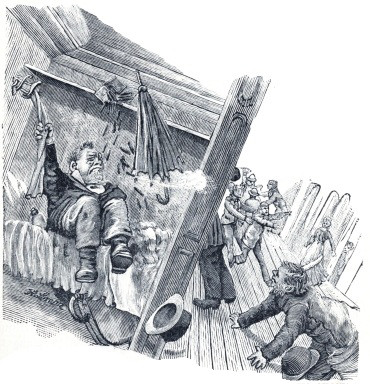
EVERY SIN I HAD COMMITTED CAME BEFORE ME LIKE ACCUSING
GHOSTS.
It was far from pleasant, and it is fortunate that such displays last
but a little while. In less than a second from its beginning every sin I
had ever committed, namely, the stealing of a watermelon in my boyhood,
and the voting of a split ticket in my manhood, came vividly before me
like accusing ghosts. I did remember also, once, that when a
ticket-seller in a railroad station in Troy, who was very insolent and
unobliging, made a mistake in my favor to the amount of thirty cents, in
my anger I did not rectify it, and I debated as to whether that was a
sin or not; but when I thought it over I came to the conclusion that,
inasmuch as the recording angel knew how brutal the fellow was, he would
blot out the record if he had to drop upon it a tear of oxalic acid.
But the good ship endured it all. The great body of iron, with its soul
of steam, and muscles of steel, defied the elements and rode it out
safely.
The storm hurried away to pursue and fright other vessels, and the waste
of waters was once more in a sort of a light that was not lurid. Though
the greatest terror was passed, the long swell which kept the ship
either climbing a mountain of water or descending into its depths was
anything but pleasant.
A ship at dock looks strong enough to defy all the elements, but out at
sea when those elements become angry it is wonderful how frail she
seems. It is man against Omnipotence.
I don’t care how many times a man has been to sea, the first sight of
land after a voyage is an unmixed delight. I know that, for I have
crossed the Great Lakes repeatedly, and when a boy I used to “go home”
via the Erie Canal, I always got up early in the morning to look at the
land on either shore. A man is not a fish, and no man takes to water
naturally. It is a necessity that drives him to it, the same as to
labor.
Therefore the decks were crowded on the ninth morning of the voyage when
the shores of Ireland were sighted. Not because it was Ireland—nobody
thrilled over that—but because it was land, because it was something
that did not roll and pitch, and toss and swing, but was substantial and
permanent. The Mississippi Ethiopian, when discussing the difference
between traveling by rail and water remarked: “Ef de cahs run off de
track dah ye is—ef de boat goes to pieces, wha is ye?”
“LAND!”
Ireland was there and land was there and reliable. Ireland—as land—has
no machinery to get out of order, no icebergs to run into—no other
steamers to collide with. I was delighted to look at her, and I venture
to say that the older the sailor, the more reassuring and delightful
the sight of land.
The bold cliffs looked friendly, and the long stretches of green on
their summits were an absolute delight. The color was the green of grass
and trees, that had something akin to humanity in it, not the
glittering, changing, treacherous green of the water we had been sailing
over and plunging through for eight very long days. And then to think
that twenty-four hours more would release us from our friendly prison,
and that during that twenty-four hours we should be within a short
distance of land, was a delight.
I have at times found fault with the Irish in America, and I don’t rank
Ireland as the greatest country under the heavens, but that morning I
felt for her a most profound respect. Had Ashantee been the first land
we had sighted that morning, I presume I should have forgiven the
Ashantees for killing and eating the missionaries. After one has been at
sea, even for eight days, land is the principal wish of the heart. One
day and night across the Channel, and we made Liverpool. There were
promises to meet in London, or Paris, exchanges of cards, the passing
the Custom House with our baggage, the purchase of tickets, and we found
ourselves in the cars of the Midland Road and scurrying away through
Derbyshire to London.
CHAPTER II.
LONDON, AND THINGS PERTAINING.
THE largest city of the world! The most monstrous aggregation of men,
women, children; the center of financial, military, mental, and moral
power! The controlling city of the world! This is London!
There may be in the effete East larger aggregations of what, by
courtesy, may be called humanity, for in those countries the limits of
cities are not properly defined, nor is the census taken with any
accuracy. But these cities exercise no especial influence upon the
world; they control nothing outside of their own countries; they reach
out to nothing; they are simply hives.
THE ENGLISHMAN.
Even an American, with all his pride in his country and her magnificent
cities, feels somewhat dwarfed to find himself in a city eight times as
large as Chicago, four times as large as New York, and his pride in
wealth and power, and all that sort of thing, collapses when he realizes
the fact that he is where the finances of the world are absolutely
controlled; that he is at the very center of the vastest money and
military power in the world!
There is nothing greater as yet than London, and whether there ever will
be is a question. I hope not. Men, women and children are all very well,
but they thrive best where they have room to develop. Four millions of
them together on so small a piece of ground dwarfs them. They do better
on the prairies.
England is an enormous octopus, whose feelers, armed with very strong
and sharp claws, embrace the world, and London, the mouth and stomach of
the monster, is sucking its prey steadily and mercilessly. The animal
lost one feeler which America cut off in 1776, and her grasp is
weakening elsewhere, but she has enough. India contributes its life
blood, China contributes, the islands of the sea contribute, and pretty
much the whole world gives more or less.
England comes by her characteristics honestly. The human being we call
an Englishman, half merchant and half soldier, the soldier element being
purely piratical, never could have been developed out of one race. Each
race has some peculiar quality which distinguishes it and marks it
everywhere. The Scotchman is noted for his hardiness, thrift, and
stubbornness; the Dutchman for his steadiness, boldness, and quiet
daring; the Irishman for emigrating to New York and getting on the
police force in a month, and so on. But the man we call an Englishman is
a composite institution.
The old Saxon was a stolid fellow, with flashes of temper. He never
could control things, for he was too lazy and sensual; but he had
qualities that mixed well with others. You have to have hair in plaster.
But when the Dane, who was a born sea pirate, swooped down upon Britain,
and the Norman, who was a born land pirate, came also, and mixed with
the Saxon, there was a new creation, and that is the Englishman of
to-day. He is a born trader and a born soldier, with a wisdom that the
rest of the world has not. His fighting power is made subject and
subordinate to his trading power.
When England wants anything she does not stop to ask any questions as
to the right or wrong of the thing—she quietly goes and takes it, that
is, if she is stronger than the party she desires to capture. If the
other party objects, a few armies are sent out and the country is
brought to reason immediately. Your bayonet is a rare persuader.
Can a country afford to fit out costly armaments and maintain vast
armies for such purposes? Certainly, if it is done on England’s plan.
England, after spending some millions in subjugating a country, simply
assesses the cost of the operation with as many millions for interest as
she thinks the subjugated party can bear without destroying it, and
makes it pay. She never destroys a country entirely, for she has further
use for it. She wants the inhabitants, once subjugated, to go on and
labor and toil and sweat, for all time to come, to furnish her with raw
material, and then to buy it back again in the shape of manufactured
goods, which, as she buys cheap and sells dear, makes a very handsome
profit, besides furnishing employment to her vast merchant marine in the
carrying trade.
And then her merchants manage to interest a certain portion of the
natives with her in plundering their neighbors, and so her rule is made
tolerably safe and inexpensive. This is about the size of it. She
conquers a country, and after reimbursing herself, calls a convention of
native Princes and says: “Here, now, we are going to hold this country,
anyhow. We are going to have the trade and the revenues, and you see we
can do it. You fellows may as well have your whack in it.” (These, of
course, are not the exact words used, but I am writing what a New York
politician would say. A ring man’s words mean exactly what diplomatic
language does, and they are always more to the point.) “Now you help us
keep the others down, and you shall keep your own places and shall have
yourselves fifty per cent. of what you can grind out of your people, and
as we shall stand behind you with our power, that fifty per cent. will
be more than you could possibly screw out of them alone and unaided.”
TWO POLICIES.
The native Prince sees the point, for he is as merciless and cruel as an
Englishman, and I cannot say more than that, and he assents. Immediately
there is a rush of native Princes, all anxious to join in for their
plunder, and England apportions to each his share, according to his
importance, and in less than no time she has a native army, officered by
English, to keep the people down to the proper level, and to collect
taxes and protect traders, and all that sort of thing, and London draws
in the money and lives royally.
And, then, if any Prince, or people, or soldiery, or anybody else, fancy
they have rights of their own, and question the right of the foreigner
to tax them and grind them, they blow a few thousands of them from the
mouths of cannon, to teach them the beauty of obedience.
It would take a wiser man than I am to determine by what right, earthly
or unearthly, England holds India, but she does all the same, without a
blush.
Perhaps it is as well for the Indians. The native Princes were just as
rapacious and more senseless than the English. If a native Indian should
swallow a diamond, his Prince would rip him open to get it, which made
him useless ever after. Johnny Bull, more politic and far seeing, would
force an emetic down his throat, so that he might go on and find more
diamonds to swallow. He gets the diamond all the same, and saves the
subject for future profit.

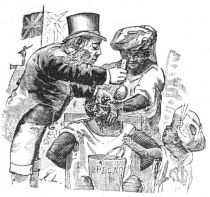
The strength of England is its fighting capacity, its mercantile
capacity, and its wonderful rapacity. As was said of a noted criminal
in the States, “he wouldn’t steal anything he couldn’t lift, though he
did tackle a red-hot cook-stove,” so with England. The eyes of her
moneyed power, and it is more than Argus-eyed, are being strained every
day for new worlds to sell goods to, knowing perfectly well that when
they find a field the Government will furnish muskets to occupy that
field. And let no mistake be made. If the field is worth occupying it
will be occupied beyond a doubt.
Ireland is an example, Scotland would be, only the Scotch, having a
habit of standing together, are ugly customers to deal with, and as they
and the English get along tolerably well together, there is no especial
trouble between them.
Hence it is that London is so great. London is the center of this vast
system of plunder and rapine, and the result of it all comes here. Here
is the Court, here is the seat of Government, here is where the great
nobles, no matter where their seats may be, are compelled to spend a
portion of their time; they are all obliged to have town residences;
here they bring their flunkies and retinues of servants, and they make
the great city.
It is not a commercial point, as is Liverpool or New York, nor a
manufacturing point, as is Manchester or Philadelphia. It is where the
spoils of the present organized legal brigandage are divided, and where
the surplus of the organized brigandage of past centuries is expended.
The tradesman of London would not alter the existing condition of things
if he could. He believes in that shadowy myth called the Queen, not
because he knows anything about her, or cares a straw for her, but
simply because when she, which means the Court, is in London, trade is
good. That eminent descendant of an eminent robber, Sir Giles Fitz
Battleaxe, is here during the season, with all his flunkies and
servitors, and the tradesmen have to supply them. As Sir Giles has vast
estates in Ireland and Scotland, and the Lord knows where else, which
yield him an immense revenue, Sir Giles’s steward can pool his issues
with his tradesman and both get rich. Sir Giles doesn’t care, for he is
paying all this out of rents of property, the title to which came from a
King who stole the ground, and he has enough anyhow.
A FEW STATISTICS.
And then comes the foreign robberies, which he has an interest in, and
those make up any waste that may happen at home. Even the cabman, who
haggles with you over a shilling, is loyal to the Crown and the Church,
for the Crown and the Church bring to London the people who make him his
fares.
Rampant republican as I am, opposed to monarchy as I am, I am
contributing several pounds per diem to the maintenance of the British
throne. I am here to see royalty, and everybody that I come in contact
with, from the boy who cleans my boots to the lady who rents me my
rooms, sing hosannas to the system that brings me here to be plundered.
When I give a shilling to a servant she doesn’t thank me for it, but she
goes to her garret and sings, “God Save the Queen.” That amiable shadow
gets all the credit for my money.
They shall give thanks to Victoria for me but very little. I will be a
republican to the extent of leaving as small an amount of money in
England as possible. Could there be a league of Americans formed who
would refuse to pay anything, I am not sure but that royalty might be
overthrown, and a republic established on its ruins.
And yet I am not certain that that would answer any good purpose. But
for these advantages I don’t think anybody would live in London. It was
said that if the Pilgrims had landed in the Mississippi Valley, New
England would never have been settled, and, therefore, it was
providential that the Pilgrims were so directed. But for royalty and the
profit that pertains to a Court, I doubt if London could hold
population. For if there is a disagreeable—but I reserve this for a
special occasion, when, less amiable than I am now, I can do the subject
justice.
London has a population, in round numbers, of four millions. Without
including outlying suburbs, it covers seventy-eight thousand and eighty
acres, or one hundred and twenty-two square miles. The length of the
streets and roads is about fifteen hundred miles, and their area nearly
twelve square miles. The area of London being one hundred and twenty-two
square miles, is equal to a square of about eleven miles to the side.
Assuming that it is crossed by straight roads at equal intervals, there
would be one hundred and thirty-six such roads, each eleven miles long
and one hundred and forty-two yards apart. The sewers have a length of
about two thousand miles, and are equal to one hundred and eighty-two
sewers eleven miles in length, on an average of one hundred and six
yards apart. At the census in 1871 there were within this area four
hundred and seventeen thousand seven hundred and sixty-seven inhabited
houses, containing an average of seven and eight-tenths persons to a
house, exactly corresponding with the proportion in 1861. The density of
population was forty-two persons to an acre, twenty-six thousand six
hundred and seventy-four to a square mile. The population, estimated to
the middle of the year, amounted to three million six hundred and
sixty-four thousand one hundred and forty-nine.
These statistics I know to be correct, for I got them from a newspaper.
I copy it entire, for the readers of this book do not take the London
Chronicle, as a rule, and it would be too expensive to send each one a
copy of it. If any false statements are made it is the Chronicle’s
fault and not mine.
The climate is, to put it mildly, fiendish. I have been in every
possible section of the United States that could be reached by rail,
water, or stage, and I was never in a location, excepting California, in
which the citizens whereof would not remark: “Oh, yes; this would be a
good country to live in if it was not for the changeable climate. The
changes are too sudden and severe.” One blessed result of my coming to
London is to make me entirely content with the worst climate America
has. Tennessee is a paradise to it, so far as climate goes, and when you
have said that the subject is closed.
THE CLIMATE.
It rains in London with greater ease than it does in any place in the
world. The sun will be shining brightly in the heavens; you look out of
your window and say: “I will take a walk this morning without that
accursed umbrella,” and you brush your silk hat—everybody who is
anybody must wear a silk hat—and you sally forth with your cane. You
turn into the Strand, feeling especially cheerful in the sun, when all
of a sudden the sky is overcast and you hat is ruined. You call a hansom
and go back to your lodgings for your umbrella, and when you have
encumbered yourself with the clumsy nuisance the sun comes out smiling,
and the rain is over, only to resume operations again without the
slightest possible reason.
Everybody in London carries an umbrella habitually and all the time. No
man ventures out of doors without one, no matter how the sky appears. In
America a fair day may be counted upon, but here there is no dependence
to be placed upon anything in the form of weather. Last week (June 1) it
was as hot as it ought to be the same day in Charleston, South Carolina;
to-day (June 7) I came in, went out, and came in wearing an overcoat,
and a tolerably heavy one at that. What the weather will be to-morrow,
heaven only knows. I have experienced so many and so violent changes
that I should not be surprised if it should snow. I may go skating next
week upon the Serpentine.
But the Londoners don’t mind it. They are used to it. From the ease with
which they carry umbrellas, I am convinced that they are born with them,
as George Washington was with the hatchet. A Londoner never lends his
umbrella, for everybody has his own, and he never loses it. It is a part
of him, as much as is his nose. The umbrella should be in the coat of
arms of the royal family, and I do not know but it is.
It is a dull and heavy climate. How it affects a native I cannot tell,
but an American has a disposition to sleep perpetually and forever.
In the house I am in is an American, who insisted one morning on going
across the square without his umbrella. I mildly remonstrated. “It is
safe,” he said, “it isn’t raining now, for it was a minute ago.” He was
right, but he came to grief for all that. It rained again in another
minute.
London is a miracle of twistedness. If there is a straight street in
it—that is, one that runs parallel with any other—I have not found it.
The streets of Boston, it is said, were originally cow-paths. If those
of London were located on the paths of cows, the cows must have been
intoxicated, for there is no system nor any approach to one. They begin
without cause and end without reason. There are angles, curves and
stoppages, and that is all there is about it. Where a street, to answer
the ends of convenience and economy, should go on, you come squarely
against a dead wall, and where a street should naturally end, there has
been constructed, at vast expense, a continuance, and for no apparent
reason. Doubtless there is a reason, but I would give a handsome premium
to have it made manifest to me.
Like all old cities, there never was a plan. This ground was never taken
up at a dollar and a quarter an acre, as in America, by a set of
speculators, and laid out in regular squares, and sold at so much a lot.
London never was made—it grew. The original city is a little spot,
occupied mostly by banks, but other cities grew around it, and they were
joined by all sorts of lanes and roads, which in time became occupied,
and so the inextricable jumble occurred.
The city is built entirely of brick and stone, and in the style and
convenience of its buildings, is not to be compared to American cities.
There is a terrible monotony in its architecture, and a most depressing
sameness in color. All London is dingy. Occasionally an enterprising
citizen paints his house to distinguish it from his neighbor’s, but he
never does it but once. The coal consumed is bituminous, and the smoke
it produces is the thickest smoke in the world, and it hangs very close
to the earth. The paint becomes discolored in a few months, and the
aspiring citizen finds in the smoke a protest against his vanity. His
house soon drops into line with his neighbor’s, and is as dingy as
before.
VEHICULAR.
The streets of London are crowded to a degree that an American can
hardly conceive. Isaiah Rynders said once that it required more
intellect to cross Broadway than it did to be a country justice. Had
Isaiah stayed a week in London he would have had the conceit taken out
of him. The streets of London, all of them, are boiling, seething masses
of moving men and animals. Omnibusses, vast cumbrous machines, loaded
full inside, and with twenty people on the top, hansoms, cabs, trucks,
drays, donkey carts, pony carts, carriages, form a never-beginning and
never-ending procession, making a roar like the waters of Niagara. He
who attempts to cross a street has to make it a regular business. It
cannot be done leisurely or in a dignified way. You narrowly escape
being run down by a hansom, only to find yourself in danger of being
impaled by the pole of an omnibus, and escaping that, a donkey cart is
charging full at you, and if you escape a carriage, and a dozen dog
carts, you finally find yourself on the sidewalk plump in the stomach of
somebody, who accepts your apology with a growl.

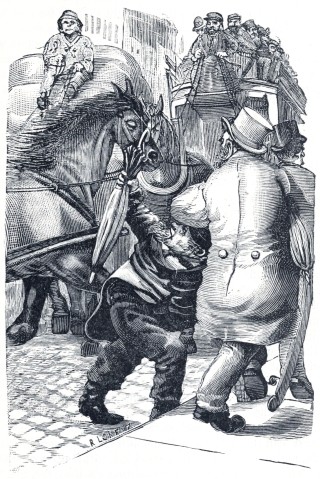
I shall never get over my admiration for the London driver. How he can
guide one horse, or still more wonderful, two, through this vehicular
labyrinth, is a mystery that I cannot comprehend. I would as soon think
of taking command of the British army, and a great deal sooner, for if I
didn’t stomach fighting, I could run. But they do it, and they seldom
have accidents.
And while I am on the subject of driving, I may as well get through with
it. The horses used in London embrace a vast variety. The draught horses
are all of the Norman variety, about as large as small elephants, and
magnificent in their strength. They are massive, and the loads they draw
are wonderful. The trucks are enormous in size and strength, with great,
broad wheels, and merchandise is piled upon them mountain high. Two of
these horses, nineteen hands high, and built proportionately, with
great, clumsy legs, will take an enormous load along the streets, making
no fuss, and seemingly without worry.
But when one notices the condition of the streets the wonder at the
loads that are drawn ceases. They are as smooth as glass. The stone
pavements are evenly laid and absolutely without ruts. The wooden
pavement, answering to the Nicholson, which has invariably been a
failure in America, is a success here, and for a very simple reason. The
contractors are compelled to do their work honestly. There is no shoddy
in the pavements of London. They are all as sound as the Bank of
England. They don’t lay down some pine boards in the mud, and then stand
rotten blocks on end upon them, as we do in America, but there is a
solid foundation of broken stone and such matter laid down first, and
this is filled with sand, and then the blocks, all good timber, are
placed upon that in a proper way, the whole resulting in a road-bed as
solid as stone itself, and smooth and noiseless, making a roadway over
which any load can be drawn without injury to either beast or vehicle,
and one which will be good long after the makers are dust. The vehicles
are made so strong as they are, not for fear of the roads, but to hold
the enormous weights that the roads make possible.
THE VICIOUS HORSE.
Sometime we of America will get to doing things in a permanent way. It
will be, however, after all the present race of contractors are worth
several millions each. I presume in the ancient days there were rings in
London. If so I can understand the uses for the beheading blocks
exhibited at the Tower.
All the vehicles used in the city are massive and solid. You see none of
the flimsy spider-web wheels and light airy bodies in carriages that we
affect in America. The wheels of a cab to carry four people are quite
three inches thick, and the bodies are correspondingly clumsy. Like
their owners, they are very solid.
But the hansom is the peculiar vehicle. The four-wheeler is a sort of a
sober-going cab, the one you would expect the mother of a family or a
respectable widow lady to use. The driver sits in front, as a driver
should, and the entire concern is closed except as you may desire to
have air by letting down eminently respectable windows in the side. But
the hansom is quite another thing. The occupant is in a low seat, while
his driver sits above him on a perch and the reins go over the
occupant’s head. Next to swindling his customer out of a sixpence on his
fare, the chief ambition of the driver of a hansom is to run down a foot
passenger, and in this ambition his horse shares fully, if he does not
exceed him. The horses used in these piratical vehicles are generally
broken-down hunters, who, too slow to longer hunt the wily fox, and
harnessed in the ignoble hansom, have transferred their hunting
instincts to men. When the “jarvey,” as he is called here, fixes his
eagle eye upon a citizen whom he proposes to run down, the horse knows
it as if by instinct, and they come charging down upon him at a pace
something as did the French cuirassiers at Waterloo. And if the intended
victim escapes, the driver gnashes his teeth in rage, and the
sympathizing horse drops his head and moves on a walk till the sight of
another countryman or stranger rouses his ambition. It is said that when
a driver succeeds in running down a foot passenger the injured man is
the one who is arrested.
The shops of London are of two kinds—the gorgeous modern and the
respectable ancient. The modern are of the most gorgeous kind. They are
not as in New York, immense show windows with a door between; but there
is an immense show window in the middle, with a small passage on the
side. When a London tradesman wants a show window he wants it all show.
It is very like the piety of some men I know. He doesn’t care how small
the opening is to get into the place, for he knows if he attracts a
customer by the display of his goods in the window, he, the said
customer, will manage somehow to get inside. The point is to corral the
customer. Once in, his bones can be picked at leisure.
The modern shops are as gorgeously fitted up inside as out. They have
silver plated rails, magnificently decorated counters and show-cases,
even more than the New York stores have.
Then there are the eminently respectable shops which despise these
gorgeous ones about the same as an old noble, descended from one of the
first robbers, looks down upon a Knight of day before yesterday. These
are the shops that have over their doors “Established in 1692.” They
would no more put in a plate glass window than they would forge a note.
They revel in their dustiness, and are proud of their darkness and
inconvenience. They wouldn’t sweep out the premises if they could help
it, and the very cob-webs are sacred as being so many silent witnesses
to the antiquity of the house.
“The house, sir, of Smithers & Co., was established by Samuel Smithers
on this very spot in 1692, and business has been done under that name,
and by his successors, ever since, except an interval of two months,
which was occasioned by a fire—from the outside. The house of Samuel
Smithers & Co. could never have originated a fire upon their own
premises. The business is conducted with more system. We have never had
a protested paper and never asked an accommodation.”
This is what the present head of the house will say to you. He has as
much pride in the house as the Queen has in her Queenship, and with
infinitely more reason. He would not allow a new pane of glass to be put
in, and he wouldn’t change a thing about the premises for the world. He
prides himself on the inconveniences of a hundred years ago, and would
die sooner than to use a modern notion in the business.
AN OLD HOUSE.
But the Smitherses are good people with whom to do business. Among the
other old-fashioned customs they preserve is that of honesty. They keep
good goods, no shoddy; they have a fair price, and you might as well
undertake to tear down Westminster Abbey with a hair-pin as to induce
any variation therefrom. They want your trade—every Englishman wants
trade—but they prefer their system to trade. You buy, if you buy of
them, on their terms. But you know what you get, and that is worth
something.
This affection for the old is general. It is a fact that one eating
house, noted for its chops and steaks, and ales and wines, which had
been in existence no one knows how many years, and had its regular
succession of patrons, who came in at regular hours, and ate and drank
the same things, and read the same newspapers till death claimed them,
fell, by reason of death, into the hands of young men. These young
fellows were somewhat progressive, and they determined to bring the old
place abreast with modern ideas. And so they swept out the cob-webs,
painted the interior, decorated it in bright colors, put in new tables,
swept and cleaned things, and replaced the old floor with modern tiles,
and made it one of the most handsome places in London.
The effect was fatal. The old habitues of the place came, looked
inside, ran out to see if they had not made a mistake as to the number,
and finding they were right as to locality, sighed and turned sadly
away. They could not eat in any such place, and they went and found some
other antiquated den, whose proprietor was sensible enough not to tear
down sacred cob-webs, and put in fresh floors.
The old patronage was lost forever, and the proprietors were compelled
to build up an entirely new business, the cost of which nearly put them
into bankruptcy.
All travelers lie. I am going to try to be an exception to this rule,
and shall, to the best of my ability, cling to the truth as a
shipwrecked mariner does to a spar. I shall try to conquer the tendency
to lie that overcome every man who gets a hundred miles away from home.
But I presume I shall fail; and so when I get home and say that living
is cheaper and better in London than it is anywhere in America, please
say to me, “You are lying!” You will do the correct thing.
No doubt when there I shall say to Smith or Thompson, “My boy, what you
want to do is to go abroad. You want to see London. And as for the
expense, what is it? Your passage across is only one hundred
dollars—ten days—and that is but ten dollars a day. And then you can
live so much cheaper in London than you can in New York that it is
really cheaper to go abroad than it is to stay at home.”
I presume I shall say this when I get home, for I know the tendency of
the traveler to lie. I have traveled all over North America, and I
confess, with shame mantling my cheek, that I have at times added some
feet to the height of mountains and to the width of rivers, and to the
number of Indians, and once I did invent an exploit which never
happened, and I have narrated incidents which never occurred. It is such
a temptation to be a hero when you know you can never be successfully
disputed.
While I am yet young in foreign travel, and capable of an approximation
to truth, I wish to say that London is not only not a cheap place to
live, but an exceedingly dear one.
THE MATTER OF COST.
“Just think of it,” said a travel-wise New Yorker, in New York, to me,
“just think of a steak for a shilling! Here you pay twice that!”
So we do, but when you pay fifty cents for a steak in New York, you get
a steak, and you get with it bread and butter ad libitum—you get
pickles, and sauces, and potatoes, and all that sort of thing. Your
fifty cent steak, with the accompaniments it carries, makes you a meal,
and a good one.
In London your steak is twenty-five cents, but it is only a sample.
After eating it you want some steak. Then you pay six cents for
potatoes, two cents for what they call a bread—you always have more and
there is a charge for each individual slice—you pay two cents for each
tiny pat of butter, you are compelled to struggle for a napkin, and if
you ask for ice to cool the infernal insipid water, you pay two cents
for that, and you get just enough to aggravate you. And, then, when you
are through, the smirking mass of stupidity and inefficiency they call a
waiter wants and expects a sixpence, which is twelve and one-half cents
more.
Where is your cheapness now? If you have a square, appetite-satisfying,
strength-giving meal, it has cost you twice as much as it would in New
York, with the difference that in New York it would be decently cooked,
decently served, and done with a sort of breadth that makes it a luxury
to eat, while here it is so hampered about with extras and charges for
minute things—things which in America are free to everybody—that
eating is reduced to a mere commercial basis and has no comfort in it.
The hotels are simply infamous in their charges. You agree to pay so
much per day for your rooms, and it looks tolerably cheap, but you
discover your mistake at the close of the first week, when you come to
settle your bill. Though you have never touched your bell and have never
seen the face of a servant, you are charged so much a day for
“attendance,” you are charged for light, for fires. If you have ordered
a bit of anything, no matter how infinitesimal, it is there, and these
charges make up a bill larger than your room rent.
There is no use in remonstrating, nor in threatening to leave. You know,
and the landlord knows a great deal better, that no matter where you go
it will be the same, and so submitting to the inevitable, you draw a
draft for more money, and settle down to be cheated in peace.
The lodging houses are quite as bad, only of course in a smaller way.
Your accommodations are less, and the swindle less, but the proportion
is very carefully observed.
Clothing is somewhat cheaper than in America, but nevertheless let me
warn the intending comer against buying it here. You may buy cloths, if
you choose, and pay duty on them and take them home, but never let a
London tailor or dressmaker profane your person, be you man or woman.
The Creator never made either for a London tailor to mar. He has too
much respect for His handiwork. I have been here now two weeks, and have
yet to see a native Englishman or a tailor-spoiled American who was
well-dressed. The English tailor has no more idea of style than a pig
has of the revised Testament. You can tell an American a square off by
the cut of his coat, and an American woman by the very hang of her
dress. The English tailor looks at you wisely, and takes a measurement
or two, and puts his shears into the cloth. The result is a sort of a
square abortion, loose where it should be close, close where it should
be wide, long where it should be short and short where it should be
long, and the poor victim takes it and is miserable till time releases
him from it.
The majority of English women are dowdies, and by the way they have
immense feet and hands. They are excellent wives, mothers and sisters,
but their extremities are something frightful. They do have delightful
complexions though, and are as bright and good as they can be.
A PITTSBURGH REMINISCENCE.
Speaking of the feet of English women reminds me of Captain McFadden, of
Pittsburgh. The dear old Captain—he is dead and gone now these many a
year—in addition to being one of the best river men that Pittsburgh
could boast of, was also,—think of it,—a poultry fancier. When the
fancy for Shanghais broke out the Captain joined in it, as he did in
everything in the fowl way, and he paid cheerfully twenty-five dollars
for a half-dozen eggs of the famous breed, which he immediately put
under a hen that was in a setting mood. But Captain McFadden had a son
who was without reverence either for his father or poultry. Young Jim
McFadden went and bought a half-dozen duck’s eggs and removed the
Shanghais and put the duck’s eggs under the hen, the said hen not
knowing or caring whether she was hatching the common duck or the royal
Shanghai. In time its labors were accomplished and Captain McFadden was
viewing the resultant ducklings, with Jim laughing in his sleeve as he
looked on.

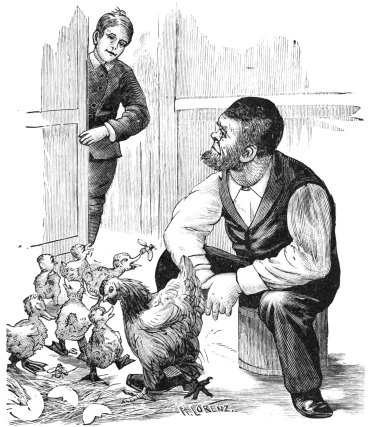
“JIM, MY BOY, AND IS THEM THE SHANGHAIS? LUK AT THEIR
FUTS! HEVENS, JIM.”
“Jim, me boy, and is them the Shanghais? Luk at their futs! Hevens, Jim,
luk at their futs. All h—l wouldn’t up-trup em.”
I can’t imagine anything that would “up-trup” an English woman. But as
small feet and hands are not essential to salvation I forgive them this.
They can’t help it. I presume they would if they could, but they are so
kindly, so hospitable, so bright and pleasing generally, that I shut my
eyes gladly to their feet, and their bad taste in dress, and accept it
all without a word.
Still I wish they could pare down their feet. Then an English woman
would be the simple perfection of nature’s most perfect work. I can’t
help thinking, however, that when your hostess’s shoe is—but never
mind. Their kindliness and their cheery laughs and their never failing
good humor are admirable substitutes for small feet. Feet are not the
whole of life.
You see soldiers about London. They are as common as mosquitos in New
Jersey, and to me just about as offensive. They are everywhere. Go where
you will, you see a tall fellow in a blue or scarlet, or some other
colored uniform, with an absurd little cap on his head, to which is
attached a leather strap which comes down to his lower lip, to keep the
absurd little cap in place. He has sometimes a sword hanging to him, and
sometimes not, but he is a soldier all the same. England has need of a
great many soldiers. In London they are used as a sort of show, as
walking advertisements of the power and strength of the Government, and
to make the picture of royalty complete.
As soldiers don’t cost much here, it is a luxury royalty can afford a
great deal of. The ordinary soldier gets twenty-five cents a day, and
his rations, and after twenty-one years service, if rum and beer and
bullets—the two first are the most dangerous—have not finished him, he
becomes a pensioner, which means he puts on a red coat and eats three
times a day in a sort of hospital, all the rest of his life.
A RED-COATED ROMANCE.
The army is recruited largely from Ireland and the poorer districts of
England and Scotland. It is about the last thing an Englishman or
Irishman does, but various causes keep the ranks full without
conscription. Women are the best recruiting officers the Queen has. It
is the regular thing for a young fellow who has been jilted to go and
enlist. He thinks he will make the girl feel badly. But it doesn’t. She
rather prides herself upon the number of young fellows she has given the
army, and when the time comes to marry and settle down, she goes and
marries, and laughs at them all.
Poverty is another very active and efficient recruiting sergeant. A
young fellow comes down to “Lunnon” to seek his fortune, equipped with a
few pounds and his mother’s blessing. He finds London quite different
from what he expected. He discovers it to be a very hard and cruel
place, with more mouths than bread, and more hands than work. He lives
as closely as he can, but, as meagerly as he lives, his pounds melt into
shillings and his shillings into pence. And finally, when his last penny
is gone, and hunger is upon him, he takes the Queen’s shilling, and the
next thing his mother hears of him, he is fighting the Boers in South
Africa. And once a soldier, always a soldier. The life unfits a man for
any other, and when he has once worn a uniform, he never wears anything
else.
As I said, women are the best recruiting sergeants. I got into a
conversation with one very handsome young fellow who had been in the
service only a year, who told me his little story. He is the son of a
small farmer in Scotland somewhere, with an unpronounceable name, where
it doesn’t matter. He had been in love with a pretty daughter of a widow
near by from the time he was a boy, and the girl professed to be, and
doubtless was, in love with him, but as she grew up she made the
discovery that she was very handsome (what woman does not?), and she
found that that beauty attracted others beside poor Jamie. Other swains
in the neighborhood laid siege to her, and she, exulting in her power
over the young fellows, and being unquestionably the belle of the
neighborhood, made it very uncomfortable for her real lover, to whom she
was betrothed.
Sore were the conflicts between them. The girl delighted in annoying
him, for she was as wilful and cruel as she was beautiful. She would
dance with the others, and she would flirt with them to the point of
driving the poor man mad, and then, just at the nick of time, she had a
trick of coming back to him, and for a time being as sweet as possible,
and so for several years she kept him alternating between the seventh
heaven of happiness, and the lowest depths of a hell upon earth.
There was one fellow in the neighborhood as much smitten with her as
Jamie, who was determined to marry her, whether or no. He was a
well-to-do young man, who had a farm of his own, and being quite as
good-looking and more enterprising than Jamie, was a most dangerous
rival to the hapless youth. Jennie had dismissed all the others, but
with the perversity that seems to be an infallible accompaniment to
beauty, she persisted in receiving the attention of this man.
Finally it came to a head. Jamie insisted that she should not see him
any more, and he insisted upon it with an earnestness that affected the
girl, and she made a solemn promise that she never would see him again.
It so happened that the very next day after this promise was asked and
given, Jamie was to leave for Glasgow on business, and he started early
the next morning. He hadn’t got to the railroad station before his mind
misgave him. Something worried him. He had slept all the night
comfortably on her promise, but something told him that she did not
intend to keep it, and that something preyed upon him to the degree that
instead of proceeding on his journey he turned about and walked back.
She knew that he was going to be gone a week, and the other man knew it
also. If she intended to play him false, this was her opportunity, and
he would know for certain, and set his mind at ease.
Poor devil! It would have been better had he proceeded on his journey.
For if he had known anything he would have known that if a woman wanted
to deceive him, watching her would amount to nothing. The devil is very
lavish of opportunities, that being all that he has to do, and simple
human nature is certain to avail itself of them; but Jamie was not a
philosopher, or a very bright man. He was a simple Scotch lad,
frightfully in love with a wilful and perverse beauty.
HOW IT ENDED.
But he did go back, and he concealed himself near her cottage, where he
could watch unobserved, hoping, in a desperate sort of way, that he had
made a fool of himself, but rather certain that he had not.
And sure enough, along toward evening his rival made his appearance
sauntering down the road, and sure enough he had no sooner appeared in
the road than Jennie, as if by accident, appeared, and the two talked
across the little gate in front, very earnestly, she in a mixed sort of
way.
And Jamie, full of rage at what he believed to be a betrayal, and
desperate on general principles, sallied out and attacked his man, and
after a fearful struggle left him almost dead on the ground, and despite
Jennie’s tearful assertions that she had seen him only to tell him that
he must not follow her any more, as she would henceforth and forever
have nothing whatever to do with him, Jamie, who didn’t believe a word
of it, announced his intention of enlisting, and started off toward the
station again.
Jennie followed him, for it appears the girl’s story was true, and she,
coquette as she was, did love him, but she arrived too late. He had
taken the fatal plunge, and was in the Queen’s uniform.
“And Jennie?” I asked.
Jennie was in London in service. She would not stay at home after he
left, and she came to town where she could see him at times, and things
were so arranged between them that when his term should expire they were
to marry and go back and settle down upon the old place and be happy for
evermore.
If his regiment should be ordered upon foreign duty, she would manage
somehow to accompany him. Anyhow, she was entirely cured of flirting,
rightly concluding that one true man is enough for one woman, and he was
equally soundly cured of jealousy, though it must be admitted that he
had sufficient cause therefor.
And so ends a red-coated romance.
CHAPTER III.
THE DERBY RACES, WITH SOME OTHER THINGS.
HORSE-RACING in America is not considered the most exciting, or, for
that matter, the most reputable business in the world. A horsey man,
except in New York, is not looked upon with much favor, being, as a
rule, and I suppose justly, regarded as a modified and somewhat toned
down black-leg.
I never ventured money upon but one race. I shall never forget it, for
it was my first and last experience.
It was many years ago, ere time had whitened my locks, and had set the
seal of age in my face in the form of wrinkles. It is needless to say I
was as immature mentally as physically, or what is to follow would not
have occurred.
There was a horseman in the county in Ohio in which I was living named
Carpenter—Sol. Carpenter. Every horseman’s given name is abbreviated,
the same as a negro minstrel’s. Carpenter was the possessor of many
horses which he used in racing, but he had one, “Nero,” which commanded
the confidence of all the sporting men for miles around. In a mile race
he had never been beaten, and there were wild rumors, which obtained
credence, that he had won a four-mile race in Kentucky (which at that
time was the starting point for all the running horses), and that Sol.
was holding him back for some great master-stroke of turf business.
Presently there appeared in Greenfield—Sol. lived in Plymouth—a horse
named “Calico,” which the owner intimated could lay out “Nero,”
without any particular trouble or worry. Carpenter laughed the man to
scorn—his name was Pete Scobey—and promptly challenged him for a mile
dash, two best in three.
AN AMERICAN HORSE CONTEST.
Scobey accepted the challenge and the date was fixed. There was the
wildest possible excitement in Plymouth. Greenfield did not share in it,
as there were no horsemen there, the village consisting of one
Presbyterian Church, a dry goods store, and a blacksmith shop. But
Plymouth absolutely boiled. Carpenter poured oil upon the fire by
confidentially assuring everybody that “Nero” could get away with
“Calico” without the slightest trouble; that he knew “Calico” like a
book, and knew exactly what he could do, and if the people of Plymouth
were wise, they would impoverish Greenfield, or rather the Norwalk
parties, who were to back “Calico.”
His advice was taken. Every man in Plymouth who could raise a dollar
went to that race at Greenfield and staked his money on “Nero,” on
Carpenter’s assurance as well as their own confidence. There was nobody
doing much betting on “Calico,” except Mr. Scobey and one or two others,
and they held off at first, which gave Plymouth more confidence. So
eager were we to despoil the adverse faction that we gave great odds,
all of which Mr. Scobey and his confreres took, finally, with a calm
confidence that should have taught us better. But it didn’t. I remember
that I wagered every dollar I had with me, and some more that Mr.
Carpenter kindly lent me, taking my note, and in addition to this a
sixteen-dollar silver watch.
The first heat was won by “Nero,” easily, and Mr. Carpenter winked to
Plymouth to make another assault upon the purses of Greenfield. We did
it. We gave even greater odds than before, which Mr. Scobey required, as
he admitted that his chances were very slim.
“But,” he remarked, “I will bet one to ten on anything.”
To our surprise the second heat was won by “Calico,” by just about a
head. Then Mr. Scobey offered to take even bets, and he would have got a
great many but for the fact that Plymouth had staked her entire wealth
already.
The next and decisive heat was run. It was closely contested. Each horse
seemingly did his best, and the jockeys seemed to ride properly. Alas
for Plymouth! “Calico” won, as he did the second heat, by just a head.
The indignation of Mr. Carpenter knew no bounds. He grasped his jockey
by the neck and pulled him from the horse, and accused him of giving
away the race, and he stormed about the track very like a madman.
“Pete,” he said finally, “Nero kin beat that cart horse of yours ez easy
ez winkin. I’ll run yoo two weeks from to-day at Plymouth for two
hundred dollars a side, and I’ll hev a rider that won’t sell out to
yoo.”

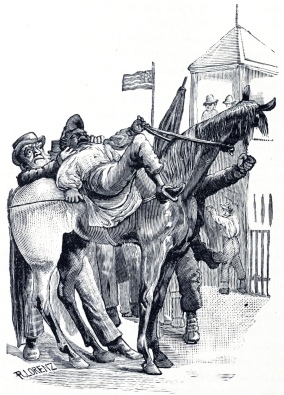
SOL CARPENTER AND THE GREENFIELD RACE.
“Jest ez you please, Mr. Carpenter. It’s easy enough to charge up a poor
horse to the account of a rider. Here’s the boodle.”
DEPARTURE FOR THE DERBY
And so another race was arranged, and Mr. Carpenter went among us and
assured that his own son should ride the next time, and there would be
no trouble about it.
We consulted all the next week, and Mr. Scobey was approached on the
subject. Mr. Scobey assured us that he knew “Nero,” and knew his own
horse. “Nero” was good for a long race, but for a dash of a mile
“Calico” could get away with him every time. We shared Mr. Scobey’s
opinion, and to Mr. Carpenter’s disgust, Plymouth wagered all the money
it could raise upon “Calico.” It requires but few words to state the
result. “Calico” won the first heat easily, and “Nero” won the other two
just as easily, and Plymouth was again bankrupt.
And then one of the riders who was disappointed in his share of the
plunder, came to the front and made known what, if we had not been an
entire menagerie of asses, we might have known in advance, that Mr.
Carpenter and Mr. Scobey were in partnership, and that “Calico” was a
horse hired from Cleveland for the occasion, and that it was a very
ingenious scheme put up by Mr. Carpenter to victimize his neighbors, and
that out of the speculation the two had made a very nice lot of money.
I don’t pretend to say that this has anything to do with the Derby, but
it illustrates the morals of the turf so well that I could not help
putting it upon paper. Racing is about the same thing everywhere, except
upon Epsom Downs. These races are conducted fairly, for they are under
the patronage of men to whom the honor of owning a winning horse is more
than any amount of money that can possibly be won. The English noblemen
want this honor, and they spend fabulous amounts of money to attain it.
I won’t say that the Duke of Wellington would have exchanged Waterloo
for the Derby, but I do say that if after Waterloo he could have had a
horse capable of taking the prize, he would have died better satisfied
with himself.
Thirty Americans were in the party that, on the morning of the first of
June, left the American Exchange at Charing Cross for Epsom Downs. It
was a very jolly party, and none of the accompaniments were forgotten.
An Englishman does nothing without a great plenty of eating and
drinking, and so the inside of one of the immense omnibusses—“breaks”
they call them—was filled with great hampers of lunch, and wine, and
things of that nature.
As early as it was all the avenues leading to the Downs were literally
packed with conveyances, to say nothing of the railroad trains which
passed in quick succession, and such a motley procession! There were
lords and ladies, merchants and clerks, prostitutes and gamblers,
workingmen and beggars, sewing-girls and bar-maids,—in fact every sort
and condition of people, who had for one day thrown care to the winds
and were on pleasure bent.
SIGHTS AND SCENES.
The roads swarmed with vehicles, and there was as much of a surprise in
the variety as in the number. There was My Lord in his dog cart, or, if
a family man, in his gorgeous carriage, which does not differ materially
from the American open barouche, save in the accommodations for the
everlasting flunkies behind, without which no English establishment is
complete. Then came the swarm of hansoms—which is a two-wheeled
vehicle, with a calash top to it, carrying the driver on a high perch
behind—the army of omnibusses, the tops covered with chaffing people,
and the inside full of more sober ones, and add to these every variety
of vehicle to which an animal can be attached, that would carry a human
being, and you have some faint idea of the appearance of the roads
leading to Epsom Downs on the 1st of June, A.D. 1881.
It was rather amusing than otherwise to note two kinds of vehicles and
the people they hauled. They have in London a little pony, not much
larger than a good-sized Newfoundland dog, extensively used by
costermongers and that class of tradesmen to deliver goods. A half of
these in London were at the Derby, hitched to a two-wheeled cart of
twice their size, and seven heavy men and women would be packed therein,
and this little mite bowled them along at a good pace, without being
worried. There were literally thousands of them upon the roads, the pony
pulling his heavy load, and seeming to enjoy the sport as much as those
he was hauling. He was having a holiday, and his holiday was much like a
human one, very hard work.
The donkey is another English institution. He is not as large as the
pony, but what enormous loads he will pull, and what a slight amount of
food he requires. He will breakfast on a tin tomato can, and relish a
circus poster for dinner. He is a patient little brute, and bears his
loads as meekly as the English laborer does his, and in just about the
same way.
As we leave the city the crowd of vehicles and pedestrians becomes
denser and denser. At the point where all the streets out of the city
meet the throng becomes more than immense, it is terrific. The drivers
of the vehicles, skillful as they are, have difficulty in guiding their
teams, whether it be the pretentious four-in-hand, or the humble
donkey-cart, through the mass, though they did it, and without an
accident.
And now the fun begins; that is, the English fun. Troops of fantastics,
with false faces, spring up, the Lord knows from where, or for what
purpose, unless it be to blow piercing horns

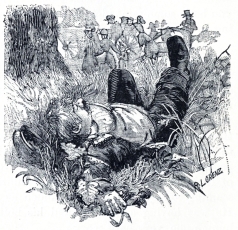
and beat toy drums for their own amusement. On one side just over a
hedge, an admiring party are witnessing a boxing match between two
yokels, who are giving and taking real blows in dead earnest, while just
beyond is a Punch and Judy show, which always has been popular in
England, and will be to the end of time. All along the dusty road are
men over come with liquor, sleeping the sleep that only the drunkard
knows, with faces upturned to the hot sun. They are perfectly safe, and
will not be disturbed. Every Englishman of the lower class knows all
about it, and as for robbery, all that he has on him couldn’t be pawned
for a penny. Next to the boxing match was a street preacher of some
denomination, armed with his testament and hymn-book, “holding forth” to
a throng constantly coming and going. I didn’t hear this one, for we
were too much on pleasure bent to stop for a sermon, be it ever so good
or our need for it ever so great. But I did hear one on the grounds, and
a curious sermon it was. There was no Miss Nancying about that preacher.
He did not attempt to win his hearers by depicting the delights of a
heaven for piety on this earth, not any. He knew his hearers too well.
The lower grade Englishman might try to be good to escape a hell, but no
one ever conceived a heaven that would win him. His idea of a heaven is
a pot-house, with plenty of beer, and bread and cheese, and nothing to
do. And so the preacher sang the hymn:—
“My thoughts on awful subjects roll,
Damnation and the dead,”
In which his audience joined, some devoutly and some jeeringly.
THE ROAD-SIDE EVANGELIST.
And he pictured hell in such lurid colors as to frighten the most
hardened. He had no fancy for a hell, such as American clergymen talk
about, which consists merely in being deprived of the company of angels
and all that sort of thing, but he had a substantial, real hell, with
actual fire and brimstone and real devils with red hot pitch-forks,
toasting and gridling sinners, and rivers of fire, and perpetual
torments of this cheerful kind, forever and forever. That was the kind
of a hell he had.
It had its effect. One man who stood listening, with his wife, said to
her as they turned away:
“Weel, Jenny, ’ell is a hawful thing, I don’t knaw but what I’ll turn
around and do better, hafter to-morrow.”
And the wife assenting to this proposition they went to the nearest beer
place and buried their countenances and their consciences, or their
fright rather, in pots of beer that would swamp the most seasoned
American, and a few moments after were dancing like mad in a booth
constructed for the purpose.
Except there be a special dispensation this party will never repent, and
if there be such a hell as the preacher described they will find it.
Their to-morrow for becoming good, like everybody else’s, will never
come. The negro who, when asked why, in view of the punishment that must
follow his sinful life, he would continue in his evil courses,
replied:—
“Boss, de great comfort and ’scurity I has, is in a deff-bed ’pentance.”
“But suppose you die too suddenly to repent?”
“Boss, I alluz keeps myseff ready for ’pentance.”
The road down is lined with public houses, little quaint inns in which
nobody sleeps, but which are devoted exclusively to the selling of beer
and spirits. At each of these half the vehicles stopped, and the scenes
about them were curious, if not altogether enjoyable. The only business
done inside was the drawing and drinking of beer, and outside—heaven
help an American—negro minstrelsy. Imagine three cockneys burnt corked,
and dressed in trowsers striped in imitation of the American flag, with
long blue striped coats and red vests, one playing the banjo, another
the concertina, and the third doing the silver sand clog, with that
peculiar soul-depressing, spirit-quenching expression that all clog
dancers wear habitually.

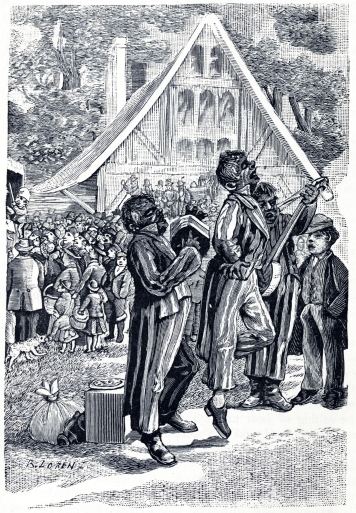
ENGLISH NEGRO MINSTRELSY.
THE ROADSIDE REPAST.
A clog dance on a stage in a hall is sufficiently depressing to send a
middle-aged man home to make his will, but imagine it done by an
Englishman on a board outside an inn, on a hot day, so hot that the
perspiration streaming down his face washed the burnt cork out in
streaks, and then when this doleful performance was finally
accomplished, think of a negro melody sung in the genuine cockney
dialect, and accepted as a correct representation of the American
African. By the way, in a first-class music hall I heard an English
minstrel use the word “nothink,” and misplace his h’s as fluently as the
most accomplished shopman. But the un-enlightened Englishman who had
never heard the rich, mellow tones of the genuine African didn’t know
any better, and so it was as well. People who love minstrelsy deserve
nothing better.
By this time it was noon, and the sun was blazing hot. But the sun
doesn’t mean as much on English roads as it does on American. England is
some centuries old, and the roads are bordered on either side with
immense trees, the hedges afford a grateful shade, and he who cannot
find a delightful seat upon the soft grass is very hard to please.
Exactly at noon the thousands of humble folk, the pony and donkey-cart
people, stopped and unharnessed their diminutive power, and permitted it
to crop the grass, while they unloaded those wonderful hampers, and
spread them upon the grass and ate and drank. There was the boiled ham,
the great masses of very bad bread made from the cheapest and worst
American flour, the pot of mustard, and the inevitable bottle of beer.
They sat under the delicious shade, men, women and children, and ate and
drank and chaffed, and seemed to be enjoying themselves.

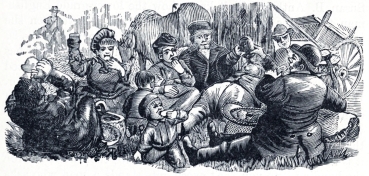
I think they all did enjoy themselves, except the women. The children
got more to eat than they did other days, so they were satisfied; the
men, great hulking fellows, gorged themselves, and were pleased because
they were full of beer, but the poor women had the children to care for,
and that ought to have been enough to have destroyed all the pleasure
there was in it to them. For be it understood, no English laborer’s wife
ever leaves her children at home on holiday occasions. There are two
reasons for this. One is there is nobody to leave them with, and the
other is there is a vague idea that it is a part of a child’s education
to know all about beer and public houses from its very beginning.
Therefore, almost every woman on that road to the Derby, had from one to
four children with her, the youngest very frequently being at the very
tender age of a month. The husbands always permit the mother to assume
the entire charge of the youngsters, and the wives accept the situation
uncomplainingly. They carry the “brats,” as the fathers delicately style
their offspring, and the small woman with a healthy baby in her arms,
keeping three others in tow, under a hot sun, must have an amusing time
of it. But they seem to like it, and I don’t know as it is any of my
business. Only I am rejoiced that the venerable Miss Susan B. Anthony
don’t know how the lower-grade Englishman treats his wife. Could she see
what I have seen she would start upon another lecturing tour, as ancient
as she is.
ON THE FIELD.
One peculiarity strikes an American—everything has its price, which is
rigorously exacted. Everything is fenced up and the slightest
accommodation has to be paid for. Do you want a glass of water? It is
given you, and you drink and set the glass down. Immediately the man or
woman who handed it to you remarks quietly, but with a tone that admits
of no question: “Penny, sir!” You pay it, for it is the custom of the
country. It isn’t for the water, but for the handing it to you. At every
gate stands a man who asks for his penny as he opens it, and he gets it.
It got to that point with me, that when I felt a breeze striking my face
and I got a breath of fresh air, I instinctively turned around to see to
whom I should give the inevitable penny. Air is the only thing that is
not charged for, and if there were any way of fencing that in and
selling it, it would be done immediately. I remonstrated mildly at
paying for a very simple service, for which in no country I was ever in
would a fee be demanded, but I was silenced instantly.
“It helps me make a day’s wages, sir, and it won’t break you, sir,” was
the very prompt answer.
I never dared to object again, but whenever I asked a question I offered
the penny, and I did not find any one too proud to take it.
Finally we reached the Downs. Epsom Downs is an immense field, the
property of the Earl of Derby, whose seat, “The Oaks,” is about two
miles distant. The “Derby” is only one of many races, but out of
compliment to the Earl, it is counted the chief event of the racing
season. The importance given to it may be inferred from the fact that it
is really a national holiday, that business is almost entirely
suspended, and that Parliament adjourns to attend it.
I am not going to write a description of the race, for one very good
reason. I didn’t see it. I could do it, but I am too honest, and beside
I have no idea that it would interest anybody. One race is just the same
as another. The horses all start, and run the course, and come in. One
horse wins, and a dozen lose; as in the American game of keno, one man
exclaims “Keno!” and forty-nine utter a profane word. A quarter-race in
Kentucky is precisely the same as the Derby, except that one is
witnessed by a hundred men in jeans, and the other by some hundreds of
thousands in all sorts of clothing. At all events I was too busy
studying the people to pay any attention to the horses. Possibly I made
a mistake, the horse may be the nobler animal of the two. I should like
to get the opinion of the horse on that point.
The sight of the field was indescribable. There were people by the
hundred thousand. The railroads brought down one hundred and twenty-five
thousand, and nobody goes to the “Darby” by train if he can help it.
Many prefer to walk the sixteen miles to going by rail. These either
haven’t the money to pay their fares, or shrink from giving money to
railroads so long as there is beer to be had. The grand stand, an
immense three-story structure, was black with people, and as far as the
eye could reach there was nothing but people. And, as it is in America,
the people were there for everything except to see the races, which is
proper. For if there be anything under heaven that is exasperating it
is a horse race, unless it be a regatta. Except as an excuse for
something else, I never could see why people went to either. To sit or
stand for an hoar under a hot sun, while a lot of jockeys are
undertaking to swindle each other, simply to see a field of horses run
or trot for a minute or two, or a parcel of boats start and come to the
finish, always did seem to me to be the very acme of absurdity. But when
you have thirty jolly fellows with you, who make good talk, a wild
profusion of lunch, and oceans of wine, it is quite another thing, that
is if you like lunch, wine, and talk.
The principal race this year, and the one on which the interest
centered, was between “Peregrine,” the English favorite, and “Iroquois,”
the American horse. There were others in the field, but these two
absorbed the entire attention of the throng. It was a national matter,
and a vast amount of money was lost and won on the event. As is known,
“Iroquois” won the race by a very small majority, and the American eagle
screamed with delight, and the British lion hung its head. The English
felt more humiliated than they did when they lost the Colonies, and
Archer, the English jockey who rode “Iroquois” to victory, was
considered a very unpatriotic man. The English found one consolation:
“Well, you know, the blarsted Yankee ’oss couldn’t ’ave won the ’eat if
a Hinglish jockey hadn’t ridden ’im.” This was the remark that I heard
everywhere.
SHOWS AND BEGGARS.
The enthusiasm of the Americans knew no bounds. The glorious victory was
made the reason for a fresh assault upon the lunch and wine, and a
number of American parties had provided themselves with American flags,
which they immediately pulled from their hiding places and flung to the
breeze. And then as the emblem of freedom displayed itself upon English
soil, it became immediately necessary to drink to the flag, which was
done with that promptness which has ever distinguished the genuine
American. Parties of Americans would arm themselves with champagne
bottles, and pass to the carriages displaying the flag, and insist upon
the occupants partaking with them in honor of the victory and the flag,
and when one would get the address of the other, they would find the one
was from Kalamazoo and the other from Oshkosh, and the coincidence was
so striking that they would drink again. By that time a New Yorker
would appear, and “Why, you are from New York! Open another bottle!” and
so on.
It was a glorious day, but for all that anybody saw of the race, it
struck me that it would have done just as well to have taken the lunch
and the wine to any other field outside of London, and become
patriotically intoxicated.
The country people and the laborers of London enjoyed the races about as
the Americans did. For their amusement there were shows and games on the
ground by the hundred. There were penny theaters; there were shooting
galleries, and the cocoanut game. A dozen or more pegs are driven into
the ground, and on each is placed a cocoanut. The man who hungers after
cocoanuts and amusement pays a penny, for which he has the privilege of
throwing a wooden ball at the row of pegs. If he hits a peg the nut
drops off and he is entitled to it, with the resultant colic. There were
hundreds and hundreds of tents, inside of which were cheap shows,
precisely such as we see at State fairs and outside of circuses. As I
gazed upon the enormous pictures of fat women, and bearded women, and
Circassian beauties with enormous masses of hair, and the wonderful
snakes, and the groups of genuine Zulu chiefs, and heard the inspiring
tones of the hand organ, accompanied with the bass drum, and heard the
man at the door imploring the people not to lose the great chance of
their lives, and saw the young fellow with his girl, torn by the
perplexing conundrum as to which was the better investment, the show or
more beer, I fancied for a moment that I was at home. But I was not. I
was three thousand miles from home, but I was seeing exactly what I
should have seen had I been there. Human nature is about the same
everywhere. Certainly, there is no difference in the side-showmen or the
people from whom he earns his living.
Beggars and gipsies, so-called (there was no doubt about the genuineness
of the beggars), were as thick as leaves in Vallambrosa. Stout men who
could have wrestled with the primeval forests were begging for
half-pence; women, with bloated faces, on every inch of which was
written “gin” in unmistakable characters, carrying wretched babies,
beset you at every turn; and hideous hags, with unmistakable Irish
brogue, thronged about the carriages with: “My pretty gentlemon, will
ye cross the palm ov the poor gipsy, and let her till yer forchoon? Och,
and I kin till ye the shtyle ov the shwate lady ye’ll marry, and the
number ov childher ye’ll hev, an bring ye gud luck.”
The absurdity of addressing me as a “pretty gintlemon,” and of proposing
to tell me the sweet lady I’d marry! I, a married man this quarter of a
century and the father of a family! That old lady got nothing from me.
But the good-natured fellows in the carriage did throw her pennies,
which she took with the regular “God bless yez,” and I have no doubt
that in the course of the day she picked up a very pretty sum, enough at
all events to keep her full of gin during the night.
The gipsies proper were on the ground in force, and a curious folk they
are. The women were telling fortunes, and a vast number of customers
they secured from the shop and servant girls on the ground, to all of
whom she promised speedy marriages, no husband being under the degree of
a Duke, and all of them very handsome and very rich men. The girls paid
their pennies and sixpences with great alacrity, and went home to dream
of their good luck, as they had a score of times before. The investment
was doubtless a good one. They were satisfied with themselves for a
while, at least, and when happiness can be had for a penny, why should
any one be miserable?
The men were hiring donkeys, saddled and bridled, for the boys and girls
to ride. To ride a donkey a certain fixed distance costs a penny, and
among English children it is famous fun. And as the gipsy owner lives
out of doors and steals all his food and the subsistence of his animals,
and the animals themselves, it was great fun for him. Albeit, as he
steals everything he uses and always proposes to, and never intends to
reform and start a bank, I don’t see what he wants of pennies. Were they
philosophical they wouldn’t let donkeys, but would lie down in the shade
till hunger compelled them to steal something to eat, and enjoy
themselves all the time.
BETTING.
As I said the races on this course are fairly conducted, and the best
horse, or the best jockey, actually wins. But there is as much rascality
here as on an American course, and I can’t say more than that. Under the
grand stand is the “betting ring,” in which the book-makers stand. These
are flashy gentlemen, with tall hats of painful newness, and diamonds
of unearthly size and luster, which gives one a comforting assurance of
solvency. These men take bets at the market rates. Thus, the betting
that morning was three to one on “Peregrine.” Now in America the betting
ring is under the control of the association owning the track; but it is
not so here, as any number of Americans discovered. They had faith in
“Iroquois,” and “laid” their money on him freely. One gentleman of my
acquaintance deposited ninety pounds sterling with a book-maker, and was
consequently entitled to two hundred and seventy pounds sterling, as his
horse won. In great glee he hied himself to the ring, after the race, to
collect his winnings. He hied himself back to the carriage sadly. Had
“Peregrine” won the race the book-maker would, unquestionably, have been
there and received the gentleman smilingly; but as “Iroquois” won, he
folded his tent, like the Arab, and as silently stole away. None of them
were to be found. Smarting under the sense of wrong, the American told
his story to the party on the way home, and he was pitied or laughed at,
according to the temper of his listener, quite a number laughing at more
than pitying him. One gentleman laughed at him fearfully, but before we
had got half way home, he broke out with “D—n the swindling scoundrel.”

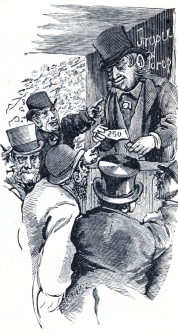
“To what swindling scoundrel do you refer?”
“That blank, blank, swindling devil of a book-maker!”
“Oh! oh! you were taken in, were you?” joyously exclaimed victim No. 1.
“Of course, I was, thirty pounds sterling!”
“And you were laughing at me.”
And then one after another confessed to have been bitten the same way,
and upon getting all the confessions in, it was discovered that one
carriage had deposited to the credit of a set of London sharks three
hundred pounds sterling, or fifteen hundred dollars.
I lost nothing, for I do not bet upon horses now, for reasons stated at
the beginning of this epistle, which shows that perfect safety is only
found in complete virtue.

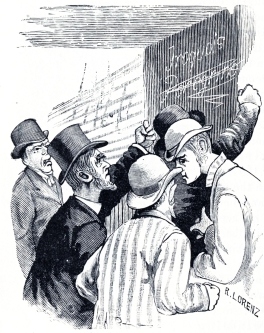
“D—N THE SWINDLING SCOUNDREL.”
ON THE WAY HOME.
One peculiarity of the event was the absence of fighting. During the
entire day I did not see a fight or anything that approached it. Gather
three hundred thousand people together in one field in America, and fill
them with our whisky, or even beer, and there would be processions of
broken heads, and funerals in plenty the next day. There is no question
as to the Englishman’s fighting qualities, but he does not fight on his
holidays. There were “d—n his eyes,” in plenty, and any quantity of
talk, but no actual combats, except the boxing matches, and they were
all in good humor. Why? I can’t tell. Possibly it is because the beer
they drink tends to peace, and possibly it is because they find vent for
their combativeness in whipping their wives at home. But they don’t
fight on race courses.
The mass commenced melting away at about four o’clock in the afternoon,
and the grounds were entirely deserted, except by the showmen and those
who have money to make during the entire racing season. They live in
their tents.
The scene on the road back was slightly different from the morning. The
people on the way out started to get drunk, and a vast majority
succeeded. The road was lined with prostrate forms of men and women. The
English women of the lower order drink as much as their husbands and
brothers. You see them in the public houses standing at the bars with
their husbands or lovers, pouring down huge measures of beer, and it is
a toss which can drink the most, or which enjoys it the most keenly. It
is certain that the woman gets drunk with more facility than the man,
she being the weaker, if not the smaller vessel. And understand, these
women are not disreputable; they are hard working wives and daughters of
respectable laboring people, mechanics and the like. It is their notion
of a day’s pleasure.
Possibly they are not to be blamed. The life of a London workingman or
woman is not a pleasant one; their pay is very small, and beer is very
cheap, and for the time they are happy.
But the next morning! Dickens and all other English writers, have given
most charming descriptions of the delights of a night’s drinking, but
why, oh why, have none of them ever described the repentance of the next
morning? That would have done the world some good.
And so we rode on through masses of people, two-thirds of them at that
stage of intoxication where the idea of enjoyment is noise and
horse-play, shouting, cheering, singing, yelling, waving handkerchiefs,
and all without the faintest idea of the object of either, till we
struck the lights of the city. Then the masses separated, and we finally
reached our homes, tired, half-pleased and half-disgusted. The Derby was
over.
No American, unless he be a sporting man, ever goes to the Derby twice.
It is necessary to go once to see it, but once is quite enough. It is a
sight to see three hundred thousand people in one mass, but it is not a
pleasant thing to realize the fact that two-thirds or more of the
number are under the influence of liquor, and that they did it
deliberately, and went there with no other idea. It rather lessens one’s
confidence in the future of the race, and leads one to the increasing of
his donations to the home missionary societies. But it has always been
so in England, and probably always will be. And then if the English
workingman didn’t get drunk at the Derby he doubtless would find some
other place for it, and as he gets a day’s pure air and sunshine, it is
perhaps, as well. If any good can be drawn from it, let us hunt it
persistently.

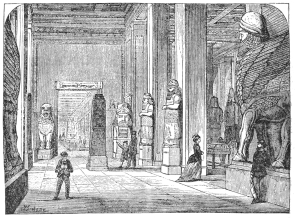
EGYPTIAN ROOM, BRITISH MUSEUM
CHAPTER IV.
WHAT THE LONDONERS QUENCH THEIR THIRST WITH.
SPEAKING within bounds, I should say that one-half of England is engaged
in manufacturing beer for the other half. Possibly it takes two-thirds
of the entire population to make beer enough for the other third, but I
think an equal division would be about the thing. The British public is
very drouthy.
One is astounded at the amount of drinking that is done here. Go where
you will, turn whichever way you choose, the inevitable “public,” or the
“pub” as they say between drinks, stares you in the face. And on the
streets almost every other vehicle you see is a vast, massive, clumsy
truck, loaded either with full kegs for the publics, or taking away
empty ones.
The British public house is not the same thing as the American. Except
in a few instances you see none of the glass and mahogany palaces of New
York, you see none of the flashy bars with plate glass, silver rails,
elegant glass-ware, and the gorgeous bar-tender with diamonds as large
as hickory nuts.
The London public house is a dingy affair, the dingier the better, with
barrels piled upon barrels, and cob-webs as plenty as liquor. There is a
wild superstition prevalent that age has something to do with the
quality of liquor, and therefore, every place devoted to the sale or
handling of the stuff, assumes as much of a Methuselean appearance as
possible. You are to have a party of friends at your lodgings, we will
say. You must have at least two kinds of liquor to entertain them
withal, for no Englishman does anything without moistening his clay, and
his clay is of a variety that absorbs a great deal of moisture. You pay
for it and the man sends home the bottles.
Now an American liquor dealer would carefully wipe the bottles, and they
would be delivered at your house as clean and tidy as a laundried shirt,
but not so here. They are sent with dust on them, and with cobwebs on
them, and to brush off the dust would be sacrilege. That dust is a sort
of patent—a testimonial to its age, and consequently a guarantee of its
excellence.
I mortally offended one liquor dealer by asking him to show me his
machine for dusting bottles, and also would he kindly explain to me his
process for cob-webbing them, and was it expensive to keep spiders? The
man actually resented it—was angry about it. Singular how sensitive the
Islanders can be about trifles like that! To keep spiders for the
manufacture of cobwebs would be more enterprising than to buy cobwebs,
and no American would dust bottles by hand, when a very simple machine
could be devised for the purpose.
The British landlord don’t set the bottle before his customer as his
brother does in free and enlightened America. Now at home,—as I have
been told by those who frequent bar-rooms—the barkeeper sets before his
customer a bottle of the liquor he prefers, and the drouthy man helps
himself to such quantity as he deems sufficient for the purpose desired.
If he is fixing himself for a common riot, he takes a certain quantity;
if for a murder, more or less, according to how aggravated the crime is
to be. A man would take more to fit himself to kill his wife than he
would for his mother-in-law, and the wife-killing draught is at the same
price as the mother-in-law annihilator.
But over here the bar-maid measures your liquor. You may have three
penn’orth, four penn’orth or six penn’orth. It is measured out to you
and handed to you, and you swallow it and go away.
I remonstrated with one proprietor as to the absurdity of the custom,
and the meanness of it.
THE REASON WHY
“I will show you the reason for it,” he said, quietly. Just then a bold
Briton came in and the landlord directed the maid behind the bar to set
down a bottle. The astonished customer was invited to help himself,
after the American custom. He was an astonished Briton, but he managed
to express his gratification at the innovation. Seizing the bottle he
poured out an ordinary dinner tumbler full, and, looking grieved because
the glass was no larger, drank it off without a wink.

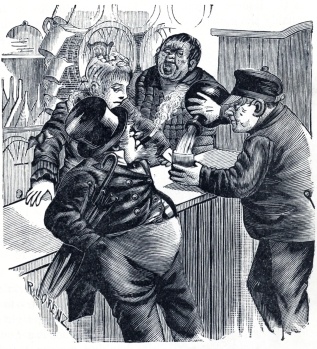
A BOLD BRITON TRYING THE AMERICAN CUSTOM.
I could easily see why the British landlord measures the liquor to the
British public. Two such customers on the American plan would bankrupt a
very opulent proprietor.
The quality of liquor used by the better classes is perhaps a trifle
better than that consumed in America, at least so I have been informed
by those who use liquors. A vast quantity of brandy is imported from
France, and it is so cheap there that it doubtless approximates to
purity. The whiskies drank are entirely Scotch and Irish, the English
making none whatever. Wines are consumed in great quantities, and there
is no question as to the purity of the cheaper grades, which is to say
they are undoubtedly the pure juice of the grape. The duty on wines is
so small that there is no inducement, as in America, for the manufacture
of bogus varieties.
But the liquors consumed in London by the lower classes are probably the
most execrable and vile that the ingenuity of the haters of mankind ever
invented. The brandy they drink is liquid lightning—chain
lightning—which goes crashing through the system, breaking down and
destroying every pulsation towards anything good. The gin—well, their
gin is the very acme, the absolute summit, of vileness. There is a
quarrel in every gill of it, a wife-beating in every pint, and a murder
in every quart. A smell of a glass of it nearly drove me to criminal
recklessness.

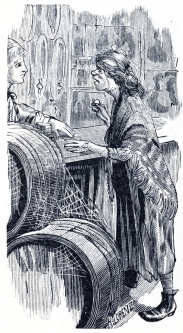
A LONDON GIN DRINKING WOMAN.
And yet they all drink it, and especially the women. The most disgusting
sight the world can produce is a London gin drinking woman standing at a
bar, waiting feverishly for her “drain,” with unkempt hair, a small but
intensely dirty shawl, with stockingless feet, and shoes down at the
heel, with eyes rheumy and watery, that twinkle with gin light out from
the obscurity of gin-swelled flesh, with a face on which the scorching
fingers of a depraved appetite have set red lines, as ineffaceable as
though they had been placed there by red-hot iron, every one of which is
the unavailing protest of a long-outraged stomach.
THE GENERAL BOOZE.
There she stands, a blotch upon the face of nature and a satire upon
womanhood. It is difficult to realize that this bloated mass was once a
fair young girl, and had a mother who loved her, and it is equally
difficult to comprehend how any power, even that of Nature, could ever
make use of it. But the elements are kindly to man. When they have done
their work, sweet flowers may grow out of this putridity.
In America this sort of being exists, but it is herded somewhere out of
sight. It does not stand at the bars in the best streets to offend the
eyes of decent people. But it is everywhere here. It is in the Strand
and on Piccadilly and Regent street.
The average Englishman of the lower, and even the middle classes, dearly
loves to booze. Drunkenness is not the result either of conviviality or
desperation as it is in other countries. It is the one thing longed for
and set deliberately about.
Rare John Leech, illustrated it in his picture in Punch, years ago. A
man was lying very drunk at the foot of a lamp-post. A benevolent old
lady of the Exeter Hall school seeing him, called a cabman. “The poor
man is sick,” quoth the kindly dame, “why don’t you help him?” “Sick, is
he,” replied cabby, “sick! don’t I vish I ’ad just ’arf of vot ails
him?” The cabby spoke the honest sentiment of his heart. The Londoner of
his class loves it for the effect it has upon him, and as he
accomplishes his design with English gin, he carries with him a breath
that suggests the tomb of a not very ancient king, a breath which has a
density, a center, as one might say.

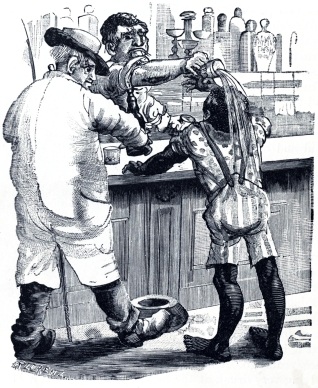
“THAT NIGGER IS MINE, AND WORTH FIFTEEN HUNDRED
DOLLARS.”
THE KIND OF LIQUOR.
At twelve o’clock, Saturday night, he would fight a rattlesnake and give
the snake the first bite. Were a venomous snake to bite such an
Englishman the man would never know it, for alcohol is a sure cure for
reptilian poison, but the poor snake would wriggle faintly away to some
secluded spot and die sadly. This is why, I presume, I have seen no
rattlesnakes in London; they cannot safely prosecute the business for
which they were created. They are similarly worried, I believe, in West
Virginia.
To drink this vile stuff successfully one would want his stomach
glass-lined and backed up with fire-brick. I never would attempt it
except as the man did in Kentucky. He walked into a bar, and distrusting
the quality of the whisky, called up a negro and gave him a glass before
drinking his own. The landlord, divining his purpose, knocked the glass
out of the negro’s hand. “No you don’t!” said the Boniface, “that nigger
is mine, and worth fifteen hundred dollars. Get an Irishman to try it
on.”
And while I am about it I may say that alcoholization is not confined to
the lower order by any means. Almost every body drinks something beside
water. The tradesman who can afford it has claret at his table, and
during the day his “drains” of brandy are very frequent. The gentry and
nobility drink more costly wines and better brandy, but liquor is
everywhere. Nothing is done without the accompanying drink; it is
universal and in all places. The climate prevents the injury that would
visit the same man in America, but it hurts. If the English could only
live as temperately as the Americans they would be the greatest race of
people on earth.
The exclusiveness of the English is manifest in their vices as in their
virtues. Every bar is divided in the front by partitions, one for each
class. Over the one designated as “the private bar,” you get precisely
the same liquors as at the others, but you pay more for it, because
laborers and the like are not admitted. One compartment exacts four
pence, the next three pence, and the last and lowest two pence. But all
are served out of the same wood.
But very few men are employed behind English bars, women filling those
places. The London bar-maid is an institution to be studied. To begin
with she must be pretty, for being pretty is a part of her
qualifications. As her feet cannot be seen, owing to her standing behind
the bar, she is generally pretty. Then they are required to dress
well, and all in one establishment dress their hair alike. In one place
the maids part their hair on one side, in another on the other, and in a
third in the middle. They are alike in each shop.
They are required to make themselves pleasant to customers, for each one
is expected to influence an amount of trade to the house. They are
exceedingly free and easy damsels, without being positively indelicate,
and there isn’t a cabman in the city who is so much a master of chaff as
they are. They will wink and leer at you in the most free way possible,
they will talk to the very verge of indelicacy if they think it will
please you, and if they form another judgment of your tastes they will
be as sedate as priests. These bar-maids were all born a great while
ago, and have improved all their time.
They are not only expected to be pretty, but they must have the power of
extracting drinks for themselves from the young or old fellows who
delight to chaff with them. If the young fellow who is enjoying the
delight of her conversation is not sufficiently prompt, the warning eye
of the landlord or landlady intimates that she has wasted enough time
upon him, and she simply asks him, when he has ordered a drink for
himself, if he won’t treat her, and he always does. Per consequence by
eleven at night the gentle maids are in a condition highly satisfactory
to the house, for their drunkenness represents so much money in his
till. He who serves the British public with drink would utilize the very
soul of an employe to make money, man or woman.
As a rule the wife of the landlord of a popular drinking place takes
personal charge of the bar, and she is a thousand times more cruel and
grasping than her husband. When a woman does unsex herself, she can give
a man points in wickedness that he never dreamed of. These wives are as
eager to have liquor paid for for themselves as bar-maids, and the sharp
eye they keep upon the girls to see that they swallow enough to make the
business profitable is something wonderful.
They are invariably dressed very richly, with elaborate coiffures, and
sparkling with diamonds. As the British young man prefers blonde hair to
any other, the landladies are mostly of that persuasion. If they were
born brunettes there are arts by which they can be changed, and besides
wigs are very cheap in this country.
THE EDIBLES ON THE BARS.
The British woman drinks as much as the British man, and possibly more.
I am not speaking of the low, degraded woman, but of the
respectability. It is nothing singular to see women, respectable women,
sitting in bars with their husbands and lovers, and the amount of stout
and “brandy cold,” they make away with is something wonderful.
I was through the wonderful park at Richmond the other day. It was a
holiday, and all London was out of the city in the parks. All the little
roadside inns were filled with the populace, women and children being
largely in the majority; and there was never a woman, no matter if she
had a child at the breast, who did not have a monster pot of pewter
filled either with porter or ale. And they gave it to their little
children as freely as an American mother would milk.
The drinking house in London is, as a rule, especially for drinking.
There are no free lunches, no nibbling bits, free on any bar. Nothing
but liquids are sold. An American speculator conceived the brilliant
idea of starting a bar with the addition of the American free lunch,
with which to attract trade. It did attract altogether too much. In
twenty minutes the lunch, which should have lasted all day, was gone,
and the British public was indignant that it was not renewed. They
pronounced the proprietor a swindle, and the speculation was a
disastrous failure.
At some of the bars an attempt is made to take the curse off the liquor
traffic by making some pretence of selling eatables. But the British
public knows this is a sham, and resents it by never buying any
comestibles at the counter. The British public scorns eating in such a
place, and insists upon drinks. Indeed, the British public won’t eat at
all as long as it can drink.
What they generally have in these places under glass covers, are
curiously indigestible meat pies, sandwiches, cheese, cakes and buns.
Sometimes at railway stations a hungry Briton buys and partakes of these
things, but not often, and never without his glass of something to wash
it down. This is the time I forgive him for drinking. It is necessary.
The sandwich is made either of ham or beef, and may be said to be the
universal cold refreshment. It is about four inches long by two wide,
and is a miracle of thinness. It is the thinnest thing on earth. I have
often purchased them, not to eat, but to admire this quality. How bread
and meat can be cut so thin, especially bread, is one of the mysteries
that never will be solved till I penetrate a public kitchen and see the
operation. It is an art I suppose, and the professor of it gets, I
presume, a very high salary. He ought to. The bread is stringy enough
and the meat tough enough to be cut as thin as might be desired, but the
puzzle is how any one can acquire the skill to cut it, that way. But
they do it. The English sandwich is more an object of interest to me
than the obelisk, and is just about as digestible. I would as soon
undertake to eat the one as the other.
The meat pie is made of hashed beef, the fat being put in liberally,
enclosed in a wrapper of dough, and all baked together, in some sort of
way. I could procure and write out the process, but being a true
American and loving the American people I will not. It is utterly
indigestible. I ate one at eleven P.M. one night, and woke up in the
morning feeling as though I had swallowed the plaster bust of the infant
Samuel at prayer that stood on my mantel. The pie is a trifle worse than
the sandwich. The cheese cake may be dismissed with the simple remark
that it is a trifle worse than the meat pie. The bun is a stand-off as
to the others. Altogether they make a frightful stomachic quartet. But
the British public, who know nothing of our hash and other luxuries, are
content with them, and I don’t know as I shall undertake to reform them
in this particular. I pity them, but there are so many things to reform
here that I shall not attempt any movement in that direction. Life is
very short.
TOBACCO.
The Englishman takes his liquor straight, or neat, as they call it.
Mixed drinks are entirely unknown. The sherry cobbler, the mint julep,
the fragrant cock-tail, are never heard of in regular English bars, but
the drouthy man who drinks, and they all do, takes either brandy or
Scotch or Irish whisky, raw from a barrel, and swallows his portion and
walks away satisfied. One woman in a famous drinking place was taught by
an American to make cock-tails, and the fame of the mixture drew all the
Americans to this particular place. The proprietor was sore displeased
at this trade, and raised the price two pence above what was regular,
to keep it away. It took too much of the girl’s time to compound the
mixture.
Drinking does not have the effect upon an Englishman that it does upon
an American. The Englishman is a more stolid and phlegmatic man anyhow,
and the climate is less exciting. There is not the exhilaration in the
atmosphere that there is in America, and the moist humidity that you
exist in is very favorable to the consumption of alcoholic drinks. I had
got so before I had been here a week, that I think I could have endured
a glass of brandy and water. I did not do it, but I say I could have
done it.
The prices of liquors average quite as high as in America, and tobacco
and everything made of it, is much higher and the quality is vile. A
decent cigar, or one counted decent here, costs twenty-five cents, it
being of the grade that in New York sells for ten cents.
No tobacco is chewed except by sailors, and the Englishman, very
properly, considers it a disgusting habit, only to be practiced by very
low people. In consequence of the high price of tobacco, pipes and
cigarettes are very generally used. The Englishman of the better class
smokes his pipe upon the street, the same as an American does his cigar.
He prefers a pipe to a cigar, possibly because it is better, and
possibly because it is cheaper. Your Englishman loves dearly to get the
value of his money, and he generally does it.
The lover of drink in America, especially our German fellow citizens,
are emphatic in their denunciation of the liquor laws of the United
States. They ought to live in England a little while to appreciate the
privileges they have at home. Hartford, Connecticut, is, I believe, a
paradise to those who live there. One old lady who was born and had
always lived in Hartford, came to die—an impertinence of Nature, as all
Hartford people firmly believe. People should die in other places, but
not in Hartford. But this old lady had come to death, and her minister
was consoling her.
“I trust, Mrs. Thompson,” he said, professionally, “that you are
prepared to die?”
“I am,” was her answer; “I owe no pew rent.”
“And are you content with the change?”
“Well, on the whole, yes. Heaven is no doubt a very nice place, but I
shall greatly miss my Hartford privileges.”
There is no especial moral to this story, except that if our German
population were compelled to endure English law they would greatly miss
their American privileges. While you can get all the drink you want
during the day, you must either have it at home or go without it after
twelve o’clock at night.
In London no liquor can be procured after twelve o’clock at night. Every
bar, big or little, is closed, and this law is not evaded, for the risk
is too great. A man’s license would be taken from him immediately, and
without remedy.
Persons are not licensed to sell liquor in England—it is the premises
that are licensed. The Board having it in charge license one public
house in a district, basing it upon the supposed necessity, and these
premises hold this license till deprived of it by violation of law. If
you desire to sell liquor you cannot go and rent a room and open your
bar; you are compelled to buy the lease of a place which carries the
license with it. Consequently a licensed place is a valuable piece of
property. One at the corner of St. Martin’s street and Orange, a dingy
building in a dingy neighborhood, was bought by an American to be used
as an American bar, and he paid twenty-five thousand dollars bonus for
the lease. The annual rental of the place is fifteen hundred dollars,
and the lease for which he paid the bonus has forty-five years to run.
For any other business the bonus would have been next to nothing in that
neighborhood.
EARLY CLOSING.
Sunday is an especially drouthy day in London. All the bars are closed
till one o’clock P.M., and are then open but an hour. Then they are
closed till six, and are permitted to keep open from that hour till
eleven. And let it be remembered that law in England is law. You cannot
laugh at it as you do in America. There is no evasion of this law
attempted. The publics are required to be closed and they are closed.
There are no side-doors, as in New York—there is no selling on the
sly—they are closed. The only exception is at the railroad stations.
The refreshment bars there are permitted to be kept open as long as
trains arrive or depart, for the British Government recognizes the
necessity of an Englishman having his grog till the prescribed hour for
his getting into his bed. The thirsty soul who pants for beer after
twelve goes to Charing Cross station, and buys a ticket to the first
station out, which is “tuppence ha’penny,” or five cents. Then he walks
into the bar, and being a “traveler,” can buy, drink and pay for all the
stimulants he desires, till the last train has arrived or departed for
the night. His ticket he puts into his pocket, to be used when he
desires.
The night trade in liquor is something enormous. A landlord in the
Haymarket, whose lease is about expiring, is now paying one thousand
dollars a year rent, and the proprietors have notified him that his
renewal will cost him just five times that sum. He told me that he
should not renew, but that he would gladly if he were allowed to keep
open till half-past twelve, a half hour after the regular time. That
half hour each day would more than make the difference in rent.
A walk along Piccadilly after twelve explains this difference. The
street, from end to end, is crowded with prostitutes, and drunken rakes
who think they are having a good time, but they are not. They walk up
and down, chaffing with these poor unfortunates. They take them into the
publics, and pay for their drinks, all of which the landlord not only
approves of but encourages. And the English prostitute can drink as
heartily and just as long as any man alive. She has just as drouthy a
system, and it takes just as much to fill it. And there they sit, and
chaff, and booze, till the clock strikes twelve and the place is closed.
The landlord turns off the gas and puts up his shutters, cursing the law
that compels him to close just as his harvest begins.
As there are literally tens of thousands of these women walking the
street, and as ninety per cent of them are drunk at ten, with a carrying
capacity of continuing to drink every minute as long as anybody will pay
for it, and as there is an equal number of men prowling the streets
whose highest idea of amusement is to pay for it, the importance of an
extra half hour after midnight may be appreciated.
But it is of no use. Law is law in England, and whether the citizen
likes it or not, he is compelled to obey it in letter and spirit. Were a
public house to be open a minute after the hour, a policeman would walk
in and close it for him, and the next day the nearest magistrate would
revoke his license, and he could never get one again. No proprietor
would rent him a place, for the license is too valuable to be risked by
a violator of law.
There are a few bars in London that make a specialty of American drinks,
which are very curious. The names they palm off as American are very
funny to an American, because they are never heard of over there. None
of my readers ever go into bars, except for curiosity, but just imagine
this list of drinks:
“Copper-cooler,” “Pick-me-up,” “Our Swizzle,” “Maiden’s Blush,”
“Bosom-caresser,” “Corpse-reviver,” “Flash-of-Lightning,” and so on.
And these names are actually believed by Englishmen to be genuinely
American, and in common use in the States.
Ice is about the scarcest thing in England, and cannot be had at the
majority of bars. At some of the very best it will be furnished, if very
forcibly asked for, but then in too small quantities to be satisfactory
to an American, who is accustomed to taking his drinks ice cold. The
frozen reminiscence of Winter is rather expensive here, and, besides
that, the Englishman very rightly considers it unhealthy. The water is
drank in its natural temperature, and it is really wonderful how soon
one becomes accustomed to it.
The prices of strong beverages run about the same as in the United
States. Brandy is three pence, six cents of our Bird of Freedom money,
and when the amount is considered, your three pence buys about the same
as twelve and one-half cents in New York. Malt liquors are about the
same. The glass is a trifle smaller, and the regular price at the small
publics is two pence, an equivalent, quantity considered, of five cents.
The quality of malt liquors is a long way below the American article,
and America, singular as it may seem, drinks better English ale than the
Englishman does. The ale made here for home consumption is vile stuff,
while that made for export is infinitely better. The Englishman eats
what he cannot sell.
To get at these facts concerning drinking has cost me an inconceivable
amount of wear and tear of feeling, which sacrifice I trust my readers
will appreciate.
CHAPTER V.
HOW LONDON IS AMUSED.
TO pass from rum to amusement is a very easy and natural transition, for
unfortunately the people who drink are, as a rule, those who need and
will have amusement. Having done with liquor forever, I am glad to get
to a subject not quite so disagreeable.
London supports forty theaters proper; that is, forty theaters devoted
entirely to dramatic or operatic representations, and several hundred
places of amusement of all kinds, which may be classed as variety shows.
The regular theaters are a long way beyond those in America. I dislike
to acknowledge this, but candor and fairness compels it. I cannot tell a
lie, even for national pride. My hatchet is bright—it has never been
used much. The London theaters will not compare with those of any of the
large American cities in point of size, or convenience of access. They
are generally situated in out of the way places, and the halls and
entrances are as shabby as anything can be, but when you are once in
nothing can be more delightful. There is a softness in the appointments,
a perfection in the furnishing, a good taste generally that America has
not. We are splendid, but it must be confessed, rather garish and loud.
The character of the performances excels the style of the theaters.
Their pieces are put upon the stage with an attention to detail, and
with a strength of cast which we at home never see, even in the best.
THE LONDON THEATERS.
I witnessed a piece at the St. James, the time of which was the First
Charles. In a drawing-room scene musical instruments

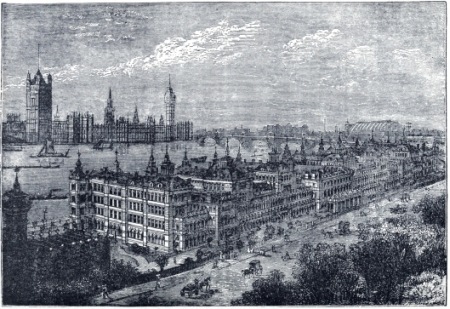
ST. THOMAS HOSPITAL AND HOUSES OF PARLIAMENT.
were necessary. In America it would have been nothing singular had a
Chickering piano been used, and a parlor set in reps. Imagine the
delight of seeing a drawing-room furnished with furniture of the period,
with an old harpsichord, such as the ladies of the time used, with the
ancient zittern, and the gorgeous harp, with the chairs and couches
precisely as they were in the country house of the time. The costumes
were not mere guess work—they were designed and constructed by a
professional costumer, who made studies from pictures, and put upon the
stage men and women of King Charles’ day. This was a delight, in and of
itself, that paid one for his time and expenditure, even if he cared
nothing for the play.
And then the acting. If there is any one thing in the way of amusements
that is utterly and fiendishly detestable, it is the acting of the usual
child. The mother or father who trains the ten year old phenomenon to
play children’s parts, takes it as far away from childhood as he can
possibly, and the child does not play a child at all. He does, or tries
to do, Hamlet, in children’s clothes. But nothing of the sort is
permitted in London. The child plays the child, and does it as it should
be done. It was a comfort to see two children on the floor in one scene,
playing at the game of “See-saw, Margery Daw,” and doing it exactly as
children would do in real life, instead of mouthing the lines like an
old-style actor in “Macbeth.”
And all the way down there was the same perfection in the acting as in
the setting of the piece. There was not one star and twenty “sticks,” as
is the rule over the water, but the servant who merely said, “My lord,
the carriage waits,” did that bit just as well as the hero or heroine of
the piece.
The Englishman is a very thorough sort of a man, and wants what he has
done well, according to his notion of what well is.
The places of amusement, other than the regular theaters, are of as
great variety as they are vast in number. The prevailing attraction is,
of course, the regular variety theater, which does not differ materially
from its brother in America. It is singular that the stock attraction at
the variety theater is the negro minstrel act. Minstrelsy originated in
America forty years ago, but it has as firm a hold upon England as it
has upon America, and a trifle firmer. No programme is complete without
it, and no part of the performances are so heartily enjoyed.
But their minstrelsy would drive an American negro crazy. It is
sufficient for a London audience to have a performer black his face and
hands, and put on a long-tailed coat, and striped trowsers, and sing
negro songs. The rich, mellow accent of the American African, the
rollicking humor, the funny grotesqueness, all that is wanting. At any
music hall you shall hear the songs popular in America sung by a cockney
with all the cockney peculiarities of speech, even to the misplacing of
the h’s.
The leg business is even more common and more indecent than in America,
and variety performance is more highly flavored generally. Magic and
athletic performances are greatly in favor, albeit fine vocalism and
instrumental performance of a very high character must be interspersed.
These variety performances are attended by all classes. The respectable
mechanic and his family, the professional man and his family, the thief,
pickpocket, and prostitute, are all mingled in one common mass, the only
division being the prices in different parts of the house. And here, as
everywhere, drinking goes on incessantly and forever. Waiters move about
through the audience, taking orders for beverages, and men and women
drink and guzzle, and men smoke during the entire performance. No matter
what else stops, the flow of beer never does. It is very like Time in
this particular, constantly moving.
The life of a variety actor is a very busy one after eight at night. If
he has any popularity at all he has engagements at three and even four
theaters. He sings one song and responds to three encores, then
throwing himself into a cab he is driven to another and to another, the
time of his appearance at each being fixed to a minute.
AN ENGLISH IDEA OF A GOOD TIME.
Singular as it may seem, the wretches who sing the most idiotic songs,
of the “champagne Charley” kind, compositions so utterly and entirely
stupid that one wonders that any audience would endure them for a
minute, are the most popular. They sing them in extravagant evening
costumes, in the most doleful and melancholy way, and call themselves
“comiques.” One of them, probably the nearest approach to an idiot of
any man on the English stage, makes from two hundred to three hundred
dollars a week, and is in demand all the time.

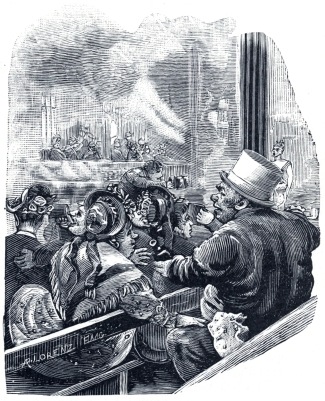
INTERIOR OF A VARIETY HALL.
But they have a good time at these theaters. To hear a woman sing a
slang song dressed—or rather undressed—is not calculated to inflict
much wear and tear upon the mind, and as all the performances are of the
alleged humorous order there is abundant room for chaff and talk of like
cheerful nature, which is further aided and promoted by the consumption
of beer. The parties seem to enjoy it, and I presume they do.
The low Londoner has very brutal tastes. His greatest delight is a prize
fight; a dog fight comes next in his estimation; a rat pit is
satisfactory in default of anything more bloody; a cock-fight will
answer as an appetizer; and a horse race is pleasing, though that shades
up into something too near respectability for him.
A dog fight in London is a sight that is worth seeing just once, if
studies of inhuman nature are what you want. The arena is always
behind a “sporting public,” on whose tables in the parlor you shall
always find the flash and sporting papers of the metropolis, and the
walls of which are decorated with engravings of prize fights, portraits
of famous dogs, and highly colored lithographs of noted horse
encounters.
Gathered around the arena will be a hundred or more of “the fancy,” who
were to me anything but fancy. They are the broad-jawed, soap-locked,
sturdy brutes, of the Bill Sykes type, beer-bloated and gin-inflamed,
who subsist by practices which, if not absolutely criminal, come as
close to it as possible.
The dogs are of the English bull variety, those plucky, tenacious brutes
who will die rather than yield, or even make any manifestation of pain.
At the signal the brute dogs are let loose upon each other, the human
dogs about expressing the keenest possible delight at any especial and
exceedingly bloody performance. The highest pleasure is attained, and
the wildest enthusiasm is evoked, when one dog gets the shoulder or jaw
of the other in his iron jaws, and holds it there, while the other
literally eats him up. Then wagers are laid as to which will hold out
the longest, and every movement is watched with the keenest solicitude,
and when the bloody drama ends in the death of one or both, and the
wagers are settled, the conversation flows naturally into a dog channel,
and the victories and defeats of past years are discussed, much as
soldiers discuss their achievements.
PUNCH AND JUDY.
Dogs of this breed, of approved courage and strength, are of great
value, and large sums of money are hazarded upon their performances. The
aristocratic dog fanciers can have a private match made for them at any
time for from one to five pounds.
Of course there are any quantity of aquariums and menageries, and
institutions of a supposed usefully scientific nature, which are largely
attended, but the variety theater, or music hall, as it is called, is
the stock amusement of the Londoner. He can drink to better advantage in
them than anywhere else, and that, after all, is the principal business
of his life.
The street amusements are beyond any possibility of enumeration or
description. You will not walk a dozen blocks without seeing the very
absurd and very brutal Punch and Judy, which has delighted England for
centuries, and seems to be immortal. One would naturally suppose that
when a boy had laughed at two wooden figures manipulated by a man inside
of a box, knocking each other on the head, with squeaks and idiotic
dialogue, every day up to his twenty-first year, would naturally pass it
by ever afterward, but it is not so. I have seen venerable men, who were
doubtless bank presidents or clergymen, or something of the eminently
respectable kind, stop in front of a Punch and Judy show, and laugh as
heartily at the ancient performance as they did when they were boys in
roundabouts. And they would stand out the performance, and at its
conclusion give the performer their two pence, and go away as if they
had been amused.
There never has been any change in Punch and Judy from the time it was
brought to England from Italy. The fun is now, as then, in Punch
knocking Judy on the head with his stick, and the shrieks of Judy with
an expression on her face of enjoyment. That is all there is of it, and
all there ever has been. And singular as it may seem, it is the first
amusement of an English boy, and it delights him till he dies. He
enjoyed it at eight, and just the same at eighty. No doubt he has a
vague idea that he will find a Punch and Judy show in heaven when he
reaches it.
But Punch and Judy shows are not all the amusements of the great city.
Garden hose not being common, owing to the fewness of gardens and the
limited use of water, the hand organ flourishes in all its native
ferocity, the grinders being, as over the water, Italian noblemen with
their wives. And they are just as dirty and grimy here as there. The
mixed brass and string banditti perambulate the streets making the day
and early night hideous, and in the side streets where the policeman is
infrequent the street juggler plies his vocation.
MUSICAL NUISANCES.
One, for instance, has a common purse with four shillings. He places the
four shillings in the purse, the country yokel sees them placed therein,
and he chinks the purse. So far as the countrymen’s eyes and ears go
there can be no doubt as to the fact of the four shillings being in the
purse. Then the fakir offers to sell the purse to the countryman for
sixpence, which, were the shillings actually inside, would certainly be
a bargain. The countryman pays the sixpence, and straightway opens the
purse, but he does not find the sixpence therein. It is as empty as his
head. He finds that he has paid sixpence for a purse dear at a penny,
and he retires amid the jeers of the populace.
As the clever juggler only finds a few victims each day, and as from
each he makes only ten cents, I don’t see how he expects to ever retire
from business and live upon his hard earned capital. The skill,
knowledge of human nature, and hard work necessary to the successful
prosecution of this little swindle would make him rich, with half the
wear and tear. But such men would rather work a day to swindle somebody
out of sixpence than to earn a dollar by honest work in a quarter of the
time. That is why I shall never go into the business of juggling with
four shillings and a penny purse. It is disreputable, and then it
doesn’t pay.
Couples of negro minstrels are a common sight on the streets, one armed
with a banjo, and another with a concertina, that he plays with an
atrocious disregard of time and tune, which under a despotism would
consign him to a block. They roam from house to house and play, as they
call it. The helpless family, worried to the very verge of madness,
throw them sixpence, and they move on. They stand and play till they get
their sixpence. The race is not as it was in Jem Bagg’s day. He played
the clarionet. “Ven the man tosses me a sixpence,” was his remark, and
says ‘Now, my good man, move hon,’ I gently says to him, says I, ‘I
never moves hon for a sixpence. I knows the vally of peace and quietness
too much for that, and then, hif ’e doesn’t throw me another sixpence, I
tips him my corkscrew hovertoor, and that halways fetches ’im.’ ”
In this degenerate day either the street musicians have forgotten their
“corkscrew overtoors,” or they are satisfied with less money. A sixpence
moves them on now certainly, but woe be to you if you are short the
sixpence.
Next door to me lives a deaf man who is a bachelor. It is his delight to
have the musicians come to this house. He sits in the doorway, and they
play and play, and he assumes an ecstatic expression, and they wonder
why he doesn’t order them to “move on,” but he doesn’t. It amuses him,
and they play, till, lost in amazement at his powerful endurance, they
put up their instruments sadly and move on of their own accord. I get
very little amusement out of him now. The majority of the fiends have
found him out.

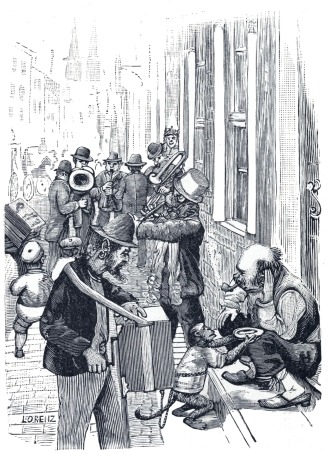
THE MAN WHO WAS MUSIC PROOF.
CHAPTER VI.
MADAME TUSSAUD.
ONE of the stock sights in London which every foreigner as well as every
man, woman and child from the country who goes to London, does with
great regularity, is Madame Tussaud’s Museum. It is known the world over
and is as regular a thing to see as the Tower.
A great many years ago, some time since the flood, a Swiss woman named
Tussaud, who had studied art in Paris, took the brilliant notion into
her wise head that money was better than fame, and instead of spoiling
marble she commenced doing some very good things in wax. She brought her
figures to London and opened a museum, which she added to and enlarged
as men and women became of sufficient interest to attract attention,
until she got pretty much everybody of whom the world ever heard.
She died many years ago, but the collection was continued by her family,
three generations of which have waxed rich and gone to join those whom
they put so well in wax in life.
This wonderful museum, which actually deserves all the attention it
gets, is filled with really excellent figures of the entire line of
English Kings, dressed in the costumes of the period in which they
lived, including arms, although court dresses generally adorn them. As
the Tussaud family were, and are, artists, these figures are not the
limp, misshapen, grinning effigies usually exhibited, but are in size,
stature, color and general grouping, perfect.
I cannot say that the effigies of King Edward and Richard, and those
other ancient marauders, are correct, for I never saw them in life.
They died many years ago. But all you have to do is what Dicken’s
Marchioness did with the orange peel wine: “Make believe very hard,” and
they will do. The faces were modeled from portraits, and their dresses
were made from actual costumes preserved in the curious repositories of
which London is full. The visitor gets some notion of what the subjects
were like, and that ought to be and is satisfactory.
AMERICAN WORTHIES.
You see, standing or sitting, marvelous likenesses of all the great
soldiers and statesmen of England, but heavens! how our poor Americans
have been abused! Washington is about as like our Washington as he is
like an Ohio River coal-boat captain. Ex-President Grant has good cause
for action for libel, for such a face as they have put upon him could
not have been on a third corporal of the poorest company in the very
worst North Carolina regiment, and President Hayes and Garfield have
been similarly treated. That of Franklin is a tolerable likeness of the
maker of infernal maxims, but there was a malicious design evident on
the part of the artists to dwarf the Americans, as I fancy there was to
enlarge and exaggerate the Englishmen.
The groups are something wonderful. The Lying-in-State of the Czar, a
recent addition, is a miracle of naturalness and awful beauty, as is the
death of Pope Pius; and they are so natural that one cannot help feeling
that he is in the presence of actual death, and not a counterfeit
presentment.

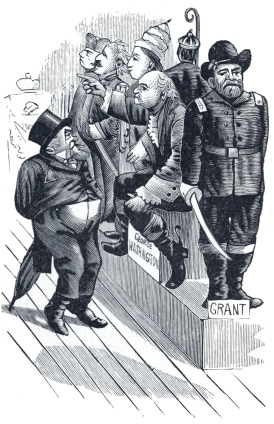
WAX FIGURES OF AMERICANS.
The Museum contains, among other curiosities that are of interest, the
identical coach used by Napoleon at the battle of Waterloo, with a vast
number of other relics of the great Corsican. From the number of
Napoleonic relics I fancy that the Madame was at heart a French woman,
though she was making her money from the English.
Great halls are filled with correct statuary in wax of the world’s
great, or notorious men, all of which have to be “done,” as a matter of
course.
But the great point, and one which no visitor ever fails to visit is the
“Chamber of Horrors.” You pay a sixpence extra—there is always sixpence
extra in England—and you are introduced to the most cheerful assemblage
of monsters that the world has ever produced.
If there ever was a murder committed of an especially atrocious
description, one done under peculiarly horrifying and terrible
circumstances, here is a wax figure of the murderer, and, if possible,
of the victim.
There is the original guillotine which made the acquaintance of so many
necks during the various French revolutions. There is the identical
scaffold which was devised by a man condemned to be hung, and on which
he suffered, with forty-eight others afterward, before it was retired,
and there are ropes and delightful articles of that nature with which
criminals have suffered, and in such numbers that we come to the
conclusion that the principal business of the English and French is to
kill somebody and get hung for it.
The two criminals in which I took the liveliest interest were Messrs.
Burke and Hare, of Edinburgh, Scotland. These gentlemen had a contract
with the medical university of Edinburgh, to furnish the students with
corpses for dissection, which they did by resurrecting them from various
church-yards.
Mr. Burke, who was evidently the leader in the enterprise, remarked one
night to Mr. Hare,—that is, I presume he did:
“Why go out this dark and rainy night and dig in the damp earth for
corpses? Digging corpses is all wrong. If the friends of the deceased
should ever discover that a corpse had been abstracted it would occasion
the most profound feeling. We should have more respect for the survivors
than to raise their dead, and then, in the interest of science, we
should give the students fresher bodies for dissection. I am inflexibly
opposed to digging any more.”
THE CONSULTATION.
“But how shall we get the corpses?” asked the obtuse Mr. Hare.
“It is far easier,” replied Mr. Burke, “to knock a man on the head than
it is to dig him up, and, in addition to the other reasons I have
mentioned, a sand-bag or a club is cheaper than a spade.”

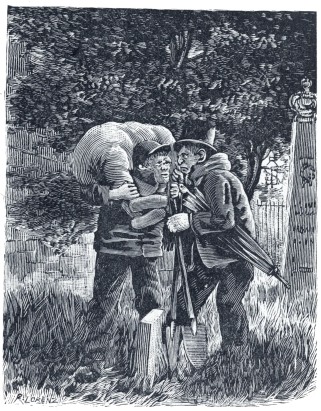
“DIGGING CORPSES IS ALL WRONG.”
And Mr. Hare coinciding with Mr. Burke, they went out that night and
killed a man, and they kept going out and killing men till thirty had
disappeared. The authorities finally got upon their track, when Mr. Hare
turned States’ evidence and hung Mr. Burke, and he went peacefully into
some other business.

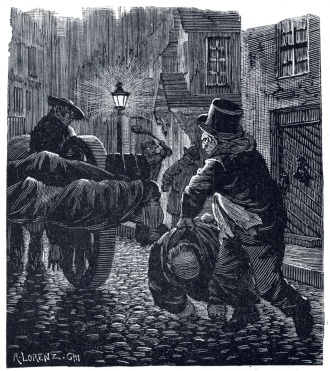
THE IMPROVED PROCESS OF MESSRS. BURKE AND HARE.
It is needless to add that a careful study of the faces of the two men
would not lead one to purposely encounter them in a dark alley after
twelve at night. Nothing earthly could be so villainous.
A little incident that occurred the day I explored the Museum
illustrates the perfection of the modeling and draping the figures.
There were in the party a gentleman and lady from Pennsylvania, the
former being a devotee of the alleged science of phrenology, and rather
fond of discussing the subject.
THE SCIENCE OF PHRENOLOGY.
A female figure was standing on the floor, which attracted his
attention. This was in the Chamber of Horrors.
“I want to call your attention,” he said to his wife, “to this
illustration of the truth of phrenology. Could there be modeled a more
vicious face? Notice the development back of the ears, showing the head
to be all animal, and the pinched forehead and the general
insignificance of the front head as compared with the development of the
back portion. There is murder in every line of that face. Let me see who
it is.”
“Thank you,” exclaimed the figure as it moved away. It was a very
estimable American lady whom the phrenologist had mistaken for a wax
figure.

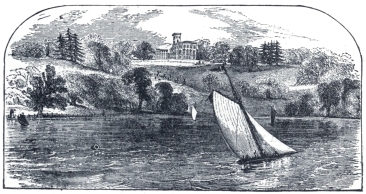
OSBORN HOUSE, ISLE OF WIGHT.
CHAPTER VII.
THE LONDON LAWYER.
LONDON is probably the most expensive place to do business in the world.
Its business men are conservative, so conservative that they would not
for the world part their hair in any way differing from their fathers,
nor would they adopt a modern convenience unless it were absolutely
necessary to the maintenance of English supremacy, and they would sigh
as they parted with an old nuisance for a modern delight. Their
professions have all got into ruts from which you can no more move them
than you can the Pyramids, and their practices are so established that
they may and do do as they please, without regard to the notions of any
body.
An American resident in London bargained for a house, and the lease had
to be transferred. Now in any country where a common school exists
almost anybody can assign a lease, but not so here. A solicitor had to
be employed, and afterward a contract long enough to cover a sheet of
legal paper had to be drawn up. It was a very plain matter—forty words
would have been sufficient. But a solicitor must be employed
nevertheless. How much do you suppose it cost Mr. Foote to have this
trifle of work done? As a matter of instruction to the American people
and for the benefit of American lawyers, who are too modest in their
charges, and I am now convinced that the majority of them are, I make a
partial copy of the solicitor’s bill, as it is a more interesting
document than anything that I can write. Here it is:
THE SOLICITOR’S BILL.
W. M. FOOTE, ESQ.,
To BLANK, BLANK, SOLICITOR.
Re STAR OF THE WEST.
PRIOR TO YOURSELF. |
| | £. | s. | p. |
Clerk attending at Messrs. Ingram’s (Vendor’s Solicitors), for
draft proposed contract | | 6 | 8 |
Procuring and considering and found same objectionable | | 6 | 8 |
Instructions for contract | | 6 | 8 |
Drawing same, folios twenty | 1 | 11 | 1 |
Engrossing in two parts | | 1 | 3 |
Writing Messrs. Ingram with one part | | 3 | 6 |
Writing Mr. Challer for schedule of fixtures to answer to contract | | 3 | 6 |
Same as to appointment for Monday | | 3 | 6 |
Drawing telegram and attending to forward and paid | | 7 | 8 |
Attending you, and then at Messrs. Ingram, engaged a considerable
time going through deed and documents, etc., and settling
contracts and signing | | 3 | 0 |
Writing your hereon, fully | | 6 | 8 |
Instructions for registration on title | | 6 | 8 |
Drawing same | | 12 | 0 |
Engrossing | | 4 | 0 |
Attending to deliver | | 6 | 8 |
Replying to your letter | | 3 | 6 |
Attending appointing conference | | 6 | 8 |
Engrossing papers, leases and covenants | 1 | 10 | 0 |
Attending Dr. Thomson therewith | | 6 | 8 |
Fee to him and clerk | 1 | 3 | 6 |
Paid conference fee | 1 | 6 | 0 |
Attending conference and cab hire | | 13 | 4 |
Perusing his opinion | 1 | 0 | 0 |
Writing you with copy Dr. Thomson’s opinion | | 6 | 8 |
Making copy of schedule and fixtures | | 5 | 6 |
Waiting upon Messrs. Ingram with same | | 3 | 6 |
Perusing abstract | 2 | 10 | 6 |
Writing with appointment to examine deeds with abstract | | 3 | 6 |
Attending examining deeds with abstract, self and clerk | 2 | 2 | 0 |
Attending searching liquidation proceedings of Arthur Coleman
and paid | | 14 | 4 |
|
As this remarkable document extends over four and a half pages of
foolscap paper I will not give it all. However, there are some other
charges
worthy of going upon record. For instance this item:
|
A replying to your letter | | 3 | 6 |
|
And this:
|
Attending you long conference, and you left cheque for purchase money |
13 |
4 |
0 |
Writing you fully |
|
3 |
6 |
Attending appointing conference |
|
3 |
6 |
The entire bill footed up forty-two pounds, fourteen shillings and ten
pence, which, reduced to bird of freedom money amounts to about two
hundred and twenty-five dollars.
And all this for transferring a lease from one party to another, about
which operation there couldn’t be the slightest trouble, except as the
two attorneys made it.
Doubtless the Messrs. Ingram and Dr. Thomson, whatever he had to do with
it, put in a similar bill against their clients, so both sides had a
very good thing of it.
But this was not all there was of it. It was necessary that Mr. Foote
should have a little article of agreement with Mr. Welch, his manager,
not that there was any especial need for it, but as a mere matter of
form, as we say when we want a sure thing on somebody. The same attorney
was employed to do this, in fact he suggested it and did it before this
bill was presented.
MR. FOOTE’S EXPERIENCE.
The bill for this service is precisely like the other. There are items
for “attendance,” for “preparing telegrams,” for “waiting, self and
clerk,” for “instructions,” and so on, the amount charged for preparing
an article of agreement being eight pounds sterling.
The attorney’s fees for the whole of this trifling piece of business
footed up exactly seventy-two pounds sterling, or three hundred and
sixty dollars.
“What do these items mean?” I asked Mr. Foote.
“Well, the items for attendance mean that I went to his office and told
him in three minutes’ time what I wanted, and he made minutes with a
pencil.”
“The clerk?”
“Oh, they never go anywhere without a clerk. His business is to carry a
green bag with nothing in it, and look like an umpire. All the writing
of letters, for which he relentlessly charged three shillings and
sixpence each, was totally unnecessary, as they related to matters of
which I fully informed him at the beginning. But he was the most
industrious letter writer I ever saw. And I would answer his letters
like an idiot, and he charged for replying to mine, and then he would
write again and charge for that, and so on. And when he couldn’t
decently write another letter, he would telegraph me and charge for
that, and—well, if I had taken two leases I shouldn’t have been through
till this time.”
“Did you pay it?”
“Pay it? Of course I did. To have resisted would have been ruin. He
would have sued me, and I should have had to have employed another
attorney, and the case would have gone into the courts, after about a
thousand instructions, conferences, letters, and telegrams, and clerks,
and all that, from him—the same as this—and it would have dragged
along, with more clerks, and letters, and telegrams, till the crack o’
doom. Instead of bills of four pages I should have had bills of forty,
and then there would have been money to be paid on account, and bail,
and the Lord only knows what. A law suit in London means ruin to
everybody but the lawyers and officers of the court. And in the end I
should have been compelled to pay it, for the courts take care of the
attorneys. And, after all, he only made the regular charges that every
London lawyer does. Indeed, as he omitted twice to charge three and six
pence for bidding me good morning, I don’t know but that he is rather
liberal than otherwise. I think,” said Mr. Foote, reflectively, “that
three times he shook my hand, and I find no charge for that. On the
whole, he is a tolerable fair lawyer to do business with.”
“Tell me all about him.”
“He is one of say twenty thousand lawyers in London who get a case like
this, occasionally. He occupies “chambers,” as they call their offices,
and keeps a clerk, as they all have to, to ever expect any business, as
a lawyer without a clerk would have no standing. The clerk spends most
of his time eating ham sandwiches, having nothing else to do, except
when his employer gets a man like myself on a string, on which occasion
he follows him about carrying a bag which is supposed to contain papers
of great moment. My lease was all that was in that bag for a month or
more. He lives well all the time, for no matter how poor he may be, or
how little business he has, he must live well for the sake of
appearance. Finally he does get the management of a good estate, and is
fixed for life. An Englishman reposes confidence in his solicitor, and
would no more think of disputing a charge made by him than he would of
heading a rebellion. They are doubtless a very nice lot, but the less
you have to do with them the better. A little of them go a long way.
Dispute his bill, not I. I don’t want to make England a permanent
residence, for I hope to get back to America some time, and a law suit
would keep me here all my life, provided I had money enough to pay fees
and costs. They’ll hold on you as long as you’ve a penny.”
That Mr. Foote did not exaggerate, I know. Had I supposed he had been
exaggerating I should not have written this. But I copied this bill from
the original, which was receipted by the attorney, who, doubtless,
sighed as he wrote his name, that some mistake had not occurred which
made litigation necessary.
CHAPTER VIII.
SOME NOTES AS TO THE INVESTMENT OF ENGLISH CAPITAL, AND ALSO BRITISH PATENT MEDICINES.
IT is a very common remark that Americans love to be humbugged. Perhaps
they do, but their English cousins can give them points in this desire.
The ease with which adventurers and bogus schemers get their claws into
English moneybags, is something astounding. Perhaps it is because the
nation has so much money that it don’t know what to do with it, or
possibly because the Englishman is naturally credulous, but it is a fact
that London is the paradise of the sharper, and the pleasant pasture for
the bogus speculator.
There are several reasons for it. Interest is very low in England, and
for the man who desires to live “like a gentleman” the temptation to
increase the rate is very strong. Then again there is an immense amount
of capital lying idle and seeking investment, and the man who has just
enough money at three per cent. to live upon very closely, is always
anxious to increase his income by making it six. Every man who has just
money enough to drink beer, has an insatiable thirst for champagne. And
the Englishman who has a strong sense of mercantile honor, naturally has
more faith than the inhabitant of a country where the standard of honor
is lower, and men are, by habit, more cautious of believing.
The papers of London are filled with prospectuses of companies organized
for developing something in all parts of the world, and these
prospectuses are so written that they would deceive the very elect.
The principal point at the beginning is to get a board with a great many
lords, dukes, esquires, and all that sort of thing, on it, the average
Englishman not seeming to realize that there are a good many of these
gentry who are as impecunious as anybody else, and who would do a piece
of roguery for enough to live upon comfortably upon the continent, as
readily as the commonest sharper in the world. The baronet has a stomach
to fill and a back to cover the same as the costermonger. In this, all
humanity stands upon an equality.
Before me lies a respectable paper, its pages filled with glowing
advertisements of projected companies. The first is for the “Acquiring
and further developing the well-known so-and-so gold mine,” in
Venezuela.
It begins with the Board of Directors, not one of whom is less in degree
than an Esquire, and several “Sirs” figure in it. Then comes the
bankers—nothing in London is complete without a banker—then
solicitors, then brokers. After this elaborate outfit, all of which
looks as solvent and sound as the Bank of England, comes a glowing
prospectus.
Nothing can be finer than this prospectus. “The property proposed to be
acquird consists of six hundred and fifty-nine acres, which contain the
most of the noted Venezuela gold mines. The vein has been traced on the
surface for a distance of one thousand nine hundred feet,” and so on.
Then comes a very complete table showing the profit that has been made
mining in Venezuela, and after this a statement from “Mr. George Atwood,
A. M. Inst., C. E., F. G. S., etc., etc.,”—it would not be complete
without all these initials, even to the etc., the etc., showing that as
learned as is stated there is more behind him,—who makes a statement as
to the probable profits of the enterprise, all of which are as good as
anybody could desire. The estimated profits are set down at twenty per
cent. on the investment.
The capital wanted is two million five hundred thousand dollars, in
shares of five dollars each. You are asked to pay the moderate sum of
sixty-two cents on application, which is modest enough, and the balance
of the five dollars you pay as the work goes on.
AIR-CASTLES.
What could be better than this? Here is a man with some money bearing
three per cent., and here is a proposition to give him twenty per cent.
There are “Honorables,” and “Sirs,” and “Esquires” on the board, and Mr.
Atwood, F. R. S., and all the rest of it, shows that twenty per cent.
has been made in Venezuela. Why should not the man convert some of his
beggarly three per cents. into cash and take a shy at it, as Wall street
would say, and set up his carriage on the profits? True, he don’t know
one of the Sirs or Honorables, and Atwood, F. R. S., etc., is quite as
unknown to him. But then the advertisements! They cover half a page in
each paper in London, and that costs an immense sum, and were there not
something in it how could they make that vast expenditure?
He takes it, never dreaming that the speculators who pay for these
advertisements, do it for the purpose of catching just such gudgeons as
he is, knowing, for they know human nature, that the modest
announcements that are made for really solid investments, would not
catch him at all.
There are projected companies for supplying London with fish, all with
boards of directors, and all promising from ten to twenty per cent.
profit, not one of them with less than two million five hundred thousand
dollars capital, in shares of five dollars each. Now there is no city in
the world so well supplied with fish as London, in fact the supply is
far beyond the demand, and there is no city which has cheaper sea food.
There being innumerable private firms in the business, and there being
fish markets everywhere, it would be supposed that a man of fair
intelligence would question the possibility of any new company being
able to compete in the business profitably. But, as in the mining
companies, the array of names, and the deliciously worded prospectus,
are hooks that never fail to catch. It is not the fish in the sea that
these fellows are after.
These are only specimen bricks. There are companies for the development
of iron mines, of tin mines, of copper mines, and all other kinds of
mines in England, Spain, Algeria, India, and everywhere under the sun,
companies proposing to buy vast tracts of land in Iowa, Minnesota,
Wisconsin, Colorado, New Mexico, and everywhere else, each with its
board of noblemen, its bankers and solicitors.
The American sharpers who have mines in Colorado and Nevada have reaped
a rich harvest. The city is full of them. You shall see about the place
where Americans most do congregate, sharp faced fellows, dressed very
seedily, whose trowsers are chewed off at the heel, and whose coats bear
unmistakable evidence of having passed through the renovator’s hands a
great many times, and would again if their proprietors only had the
one-and-nine pence necessary, or had another to wear while it was being
done, the said coats buttoned very closely to the throat, so closely
that a cheap scarf conceals the condition of the shirt beneath, if
happily there be one, standing listlessly, as if waiting for some one
who will never come.
They know you to be an American at once, and one introduces himself,
claiming to have seen you in the States:
“What are you doing here?” is your first inquiry.
“Oh, I have been here a year. I came over to place a mine I own in
Nevada.”
“How are you getting on?”
“Splendid! I just sold the half of it for five hundred thousand dollars.
I ought to have got more for it, but I am tired of waiting, and want to
get home, and so I let it go. Five hundred thousand dollars is a good
sum, and then I retain a half interest in it. It will make me all the
money I shall ever want. By the way have you met any of the nobility?
No? I shall be glad to introduce you to the Duke of Buccleugh. I am
going down to his country seat to-morrow. He is interested with me, and
he’s a devilish clever fellow.”
You plead a prior engagement if you are wise, but you have not seen the
last of your American friend who has just sold the half of a mine for
five hundred thousand dollars. Oh, no! For the next day he will be
waiting for you, and he will volunteer to go about with you in so
persistent a way that you cannot refuse without being brutally blunt,
and after taking you to all sorts of show places which are open to
anybody, and which you want no guide for, he will establish himself in
such a way as to make you feel, whether or no, that he has some claim
upon you.
Then comes the final stroke. As you part with him, he will take you one
side, and then this:
THE AMERICAN MINE-OWNER.
“By the way, I am waiting for the final drawing of papers to complete
the sale, when I get my money. I have been here so long that I have
exhausted my ready money, and my remittances did not come by the last
steamer, but they must come by the next, which will be Saturday. Would
you mind lending me five pounds till Saturday?”
You have but little pocket-money, you say.
“An order on the American Exchange will do as well.”
You never give orders.
He lowers his want, till, finally, when he gets down to five shillings
you give it to him, glad to be rid of him so cheaply.
Nevertheless this fellow will finally sell his mine, or his alleged
mine. All he has to do is to wait long enough, and he will find some
credulous Englishman who will bite at the naked hook, and put his name
and influence to it, and it will be done. Then he will go home and
establish himself in good style, and be a prominent man.
But what becomes of the English investors? Echo answers. It is a
conundrum that goes echoing down the ages, and will only be answered in
that period of the next world when everything shall be made plain. The
poor widow who put her little pittance in the hands of these sharks
doubtless started a private school, if she was qualified for it, or made
use of her one accomplishment, painting, music or what not, to earn a
miserable existence. The poor clerk who was saving to purchase a home of
his own, went back to his lodgings and put his nose freshly upon the
grindstone, and the young tradesman went into bankruptcy, his shop
passed out of his hands, and he served where he had once commanded. And
the shark, if an English one, shelters himself behind his assumed name,
or goes to the Continent, and lives in luxury all his days.
Inasmuch as these things have been going on ever since the South Sea
bubble it would seem that people would get wiser, and know better than
to put their all in such wild-cat schemes. But bear this in mind, the
loser never admits that he lost in so stupid a way, and his fellows are
never fully informed about it, and besides there are children born every
day, a certain percentage of them with sharp teeth, and the rest with
fat. The teeth find the fat, the shark finds the gudgeon invariably.
That’s his business. When I read these prospectuses I find myself
getting up a great deal of respect for the old barons who, when they
wanted money, seized a rich Jew and starved him awhile in a dungeon, and
if that gentle treatment did not suffice to extract the requisite cash,
pulled out his teeth, one by one, till he disgorged. In those days a
venerable Jew whose teeth were all gone was as fortunate as the man
caught by the Indians who was bald and wore a wig—he saved his scalp.

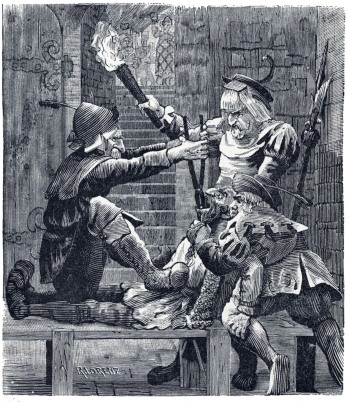
THE OLD ENGLISH WAY OF PROCURING A LOAN.
LONDON QUACKS.
These ancient robbers did not add grandiloquent lying to theft. It was
with them a simple taking of what they wanted without circumlocution.
It was highway robbery to picking pockets, and was certainly the
preferable of the two.
Were I an Emperor, with absolute power, I should immediately discharge
the honest soldier, who would work for a living were he out of the
service, and draft in the army all these fellows. And the regiments
composed of them should lead every forlorn hope, charge every battery,
and do all the dangerous and fatiguing work that soldiers have to do. A
country could afford to lose a great many battles to rid itself of these
worse than thieves.
Do you remember Dickens’ Montagu Tigg in Martin Chuzzlewit? I used to
think it an overdrawn picture, but it is not. It is as correct a
portrait as was ever limned.
America has been deemed the paradise of the quack, but before England
she must pale her ineffectual fires. Next to beer, patent medicines
stare you in the face everywhere. The walls fairly shine with the
advertisements of remedies for every disease known to the faculty, and
when that supply runs out the ingenious proprietor invents a stock of
new ailments that never did exist, and inasmuch as the least of them are
six syllabled ones, it is to be hoped never will.
There are medicines for the liver, for the kidneys, for the lungs, for
the feet, for the head, for the ears, for the eyes, for the scalp, for
the hair, and for every part and parcel of the human body, and for every
animal that man has subjugated and brought subservient to his will.
There are certificates from Lords, and Dukes, and Honorables, as to the
efficiency of Hobson’s Vermifuge, though with these it is always a
tenant’s child that was cured, the scions of noble houses being of too
blue blood to ever have so vulgar a complaint. In case of gout, or any
genuinely aristocratic ailment, they are not so particular.
The advertisement of every remedy ends with the announcement:—
“As there are unprincipled parties in the kingdom who seize upon every
article of known merit, to imitate the same, the purchasers of Hobson’s
remedies are respectfully requested to particularly observe the label on
the bottles. The name of “Hobson” is printed on the steel engraving, on
the face of the bottle, fourteen hundred and sixty-three times, and
without this none are genuine. Beware of fraudulent imitations.”
And the British dame will stand at the counter and count the wearying
repetition, much to the disgust of the shopman, who, knowing that the
remedy is only three days old, and that there are no imitations, and
never will be, wants her to take her bottle of the stuff and move on and
make room for another victim.

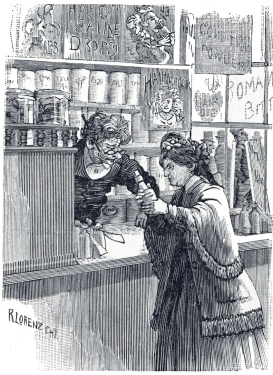
“BEWARE OF FRAUDULENT IMITATIONS.”
THE LONDON ADVERTISER.
Their ingenuity in advertising is as good as that of their
trans-Atlantic brethren. You see vast vans driven slowly up and down the
streets, built up twenty feet with canvass, showing an emaciated mortal,
with scarcely an hour of life in him, with the legend underneath,
“Before taking Gobson’s Elixir,” and the same party dressed, and walking
the streets with the physical perfection of a prize fighter, and
underneath, “After taking Gobson’s Elixir.” Transparencies at night
flash forth the miraculous virtues of “Hopkins’ Saline Draught,” and
there isn’t an inch of dead wall anywhere that has not its burden of
announcements. Long processions of ragged men the most of them too old
and weak to do anything else, march along the sidewalks sandwiched
between two boards, each one bearing testimony to the virtues of some
wonderful compound, there being enough of them to weary the eye and make
one wish he could go somewhere where advertising was impossible.
One of these human sandwiches remarked to me that the boards were a
little uncomfortable in the Summer, but the two made a mighty good
overcoat in the Winter.
And as if there was not enough of it already, an enterprising Yankee is
here with a steam whale, ninety feet long, spouting water sixty feet
high, the machinery and crew concealed in the boat on which it rests,
which is to ply up and down the beautiful Thames, bearing upon either
side the announcement of a liver pill. The proprietor gives him ten
thousand dollars for the use of it for the season, and bears all the
expenses of running it. It is very like a whale, and as it attracts much
attention will doubtless pay a handsome profit to the man by whom it has
been engaged.
The papers are full of such advertising, the only difference between
England and America being that the advertisements here are more
elegantly written, and couched in really superior English which ours are
not, always. The English shoemaker who turns doctor, employs the best
literary talent at command to write his announcements, and he pays more
liberally than the magazines do the same men. Many a London writer,
struggling for fame and a place in literature, makes a handsome addition
to his slender income by going into the service of these patent medicine
vendors.
Nearly all of them succeed. The British public are a medicine-taking
people by nature. There are not many diseases upon the island naturally,
but the inhabitants create a very large number by their habits. The
universal use of beer—and vile stuff it is—is not conducive to general
health, and the Englishman is about the heartiest eater on the globe. He
is more than hearty—he verges very closely upon the gluttonous.
Consequently he needs medicines, and the manufacturers adapt themselves
to the market. There are more than a thousand “after dinner pills,”
warranted to correct all the effect of “over-indulgence at the table,”
which means that it will do something toward keeping up a man who eats
about four times what he ought to, and drinks enough every year to drive
an American or Frenchman into delirium tremens.
The market for these goods is world-wide, and enormous fortunes are
amassed. I must say, however, that the trade is not in the best repute.
Many brewers have been knighted, but no patent medicine man. In the
matter of ennobling people the line must be drawn somewhere. Dickens’
barber drew it at the baker—the English draw it at the brewer.
CHAPTER IX.
PETTICOAT LANE.
THERE is no Petticoat Lane any more, some finnicky board having very
foolishly changed the good old name to Middlesex street. There was
something suggestive in the name “Petticoat Lane,” for it indicated with
great accuracy the business carried on there, but there is nothing
suggestive about Middlesex street. It might as well have been called
Wellington street, or Wesley street, or Washington street. I hate these
changes. A street is a street, and calling it an avenue don’t make it
so. Why not Petticoat Lane? By any other name it smells as strong. It
is Petticoat Lane and always will be Petticoat Lane, and despite the
edict of the board, the Londoner calls it by that title and always will.
Petticoat Lane is a long, tortuous narrow street, properly a lane,
(about the width of an ordinary alley in an American city,) in the heart
of the city proper. It is probably the dirtiest spot on the globe. If
there is a dirtier I do not wish to see it—or, more especially, to
smell it. It is the very acme of filth, the incarnation of dirt, and the
very top, the peaked point of the summit of rottenness.
A friend of mine who had lost the sense of smell was condoled with on
his misfortune.
“Don’t pity me,” he said, “please don’t. It is a blessing, and not a
misfortune. In this imperfect world there are more bad smells than
perfumes. If I am deprived of one delight I escape a dozen inflictions.
If I can’t enjoy the rose, I, at least, dodge the tan yard.”
Precisely so another friend who had his right leg torn off in a
threshing machine during the war, reveled in his cork leg, because,
having but one flesh and blood foot, he only took half the chances of
ordinary mortals of taking cold from wet feet.
So does philosophy turn misfortunes into blessings. To carry out the
idea I suppose the more troubles happen to a man the happier he should
be. Would that I could take life that way, but I can’t. Unfortunately
the day I was in Petticoat Lane my sense of smell was unusually acute,
at least so it seemed to me.
Philosophers of this school should spend a great deal of their time in
Petticoat Lane, for in that savory locality all the senses one needs are
his eyes and ears. A loss of smell there would be a blessing.
It is the especial street belonging to the Jews. Not the Jews we have in
America, the bright, busy, active men, who have left their impress upon
every spot they have touched, who have done so much to make America what
it is—not the well-dressed, well-housed leader in business and
everything else he puts his hands to, but the old kind of Jew, the Jew
of Poland, with the long beard and long coat, very like the gaberdine we
see in pictures and on the stage, the Jew of Shakespeare, the Jew who
will trade in anything, and live in a way that no other race or section
of a race on earth can live. There is a denser population in Petticoat
Lane, I verily believe, than anywhere else on the globe, outside of
China, and it is all Hebrew.
You should go Sunday morning, which is their especial day, and get there
about ten o’clock, to see it in all its glory. All places for selling
liquor in London are closed part of the day Sunday, except in this
street; but here they are all open and in full blast. Whether there is a
special exception made by law, or whether there is a tacit winking at
the violation by the authorities because of the religion of the people,
I do not know; but it is a fact that in this street the beer shops are
open all day and a thriving business they do.
THE HOME OF SECOND-HAND.
It is the busiest place I ever saw. The streets are crowded, not the
sidewalks only, but the streets, to the very center. You see no
horse-drawn vehicles—it is all people. Barrows and carts drawn by
people, men or women, are the only vehicles. There would be no room for
any other. The fiery steed attached to a hansom, which shares its
driver’s noble ambition to run down a foot passenger, would be tamed in
Petticoat Lane. The number of opportunities to run down people would
embarrass, and, finally, subdue him.

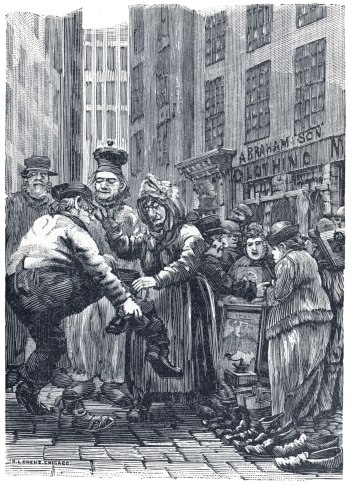
What do all these people do? It would be easier to answer the question,
What don’t they do? They do everything. If there is an article on
earth—that is, a second-hand article,—that is not bought and sold in
Petticoat Lane on Sunday morning, I have not seen it. You can buy
anything you want there, provided you want it second-hand, from a
knitting needle to a ship’s anchor. There is nothing in the street that
is not second-hand, except the people. They all bear the stamp of
originality, every one of them. They are born traders. If a pair of
Petticoat Lane Jew twins in a cradle don’t trade teething rings, and
attempt to swindle each other, the father and mother drop tears of
sorrow over them, and as soon as they are old enough, take them out of
the place and apprentice them to a trade. Without this manifestation
they would not be considered good enough for Petticoat Lane. Very few
have, however, been so apprenticed.
Here is a hideous old woman on the sidewalk with her stock in trade
under her eye, and a sharp eye it is, arranged along the curb. What is
it? A few dozen or more pairs of boots and shoes, in all stages of
dilapidation, carefully polished, and made to look as respectable as
possible, any pair of which (by the way, they are not always mates,) you
shall buy, if you desire, at any price ranging from a penny to a
shilling. No matter what the ancient dame gets for them, she has made a
profit. She picked them up on the streets, save a few that she may have
borrowed when the owner was not looking. What anybody wants of these
remnants, these ghosts of foot wear, I can’t conceive. But she sells
them. The trade is consummated easily after the chaffering is over with.
The purchaser pays the woman, and sheds the worse ones he has on, and
puts on his acquisition, and wends his way. Probably in an hour he would
be glad to trade back, but it is too late.
Next to her stands a cart, which is a portable hardware store. There are
hinges, nails, all second-hand, carpenter’s tools, axes, locks, keys,
and all sorts of iron-mongery, and he sells, too. Somebody wants these
goods, and he gets his price. As these things are collected as were the
boots, the vender is happy at every pennyworth he sells.
THE CLOTHING DEALER.
Here is a clothing merchant with his stock laid conveniently on the
sidewalk. It is a motley mass, and his method of disposing of it is
precisely the same as that of the second-hand clothing dealer the world
over. I don’t know as these dealers rise to the sublime height of the
New York Chatham street Jew, who claimed that a villainous green coat
was made for General Grant, but that he wouldn’t have it because the
velvet on the collar was too fine for his taste, but they approach it.
He has everything that one can conceive of. There are flunkeys’
uniforms, sailors’ jackets, worn-out dress coats that once figured in
the best society, but they decayed, and went down and down through all
the grades of society, till they finally landed in Petticoat Lane, where
they will be sold for a shilling, and the purchaser will tear the tails
off as useless encumbrances that give no warmth and are simply in the
way, and comfortable jackets will be made of them.

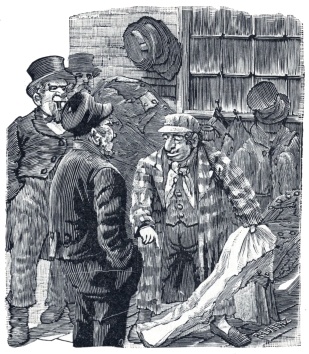
Under this head I might ring in Hamlet’s soliloquy about the dust of
great men stopping cracks, and preach a very pretty sermon on the
mutability of human affairs, but I won’t. Petticoat Lane is not exactly
the place for philosophizing, nor will it be for me till I get its smell
out of my nostrils. Visiting Petticoat Lane is very much like eating
onions—you carry the taste with you a long time, which is a
blessing—for those who like onions. The onion is an economical
vegetable at any price. It may come high to begin with, but it lasts a
long time.
I saw General’s uniforms, American sack-coats, trowsers that may have
graced the legs of royalty, and a great many that had not, there not
being many of the royalty. There were French blouses, police uniforms,
Irish knee-breeches, everything. One coat I saw sold for a penny, the
vender originally asking two shillings for it.
Next to this merchant was a man who had an assortment of sewing
machines—Wheeler & Wilson, Wilcox & Gibbs, the Domestic, Singer—all
the American machines were represented, and he sold them, too. People
come there to buy these things. They went as low as three dollars, and
as high as five. One bloated aristocrat, who was particular as to
appearances, actually paid seven dollars for a Wheeler & Wilson, and was
not above carrying it off himself.
In Petticoat Lane they don’t have wagons to deliver your purchases as
they do in Regent street and elsewhere, nor do they sell on time. You
buy, and pay for what you buy, and to prevent mistakes you pay for your
goods just before you get them. It’s a habit they have.
The furniture stores—all on the sidewalk—are curiosities. It would
delight a gatherer-up of unconsidered trifles to see one of them. I did
not notice a whole piece of furniture in the lot. There was either a leg
gone, or two legs, or the top, or the side, something must be gone. But
the dealer didn’t mind that. “You see, ma teer, all you hef to do ish to
get dot leg put on, and its shoost ash goot as new, efery bit.” Bureaus
with missing drawers, tables with three legs where four were essential,
chairs with the top, bottom and legs gone; in short, everything that was
broken and condemned as useless by everybody finds its last
resting-place here. Surely there can be no lower depth for the disabled.
A MOTLEY MASS.
As I gazed in wonder upon some of the articles I saw, and noticed how
little of the original article could be sold, I bethought myself of the
cooper who was brought a bung hole, with the request that he build a
barrel about it.
The street vendors of eatables formed no small portion of the traffic
that was going on incessantly. You can get a slice of roast beef with
greens (greens is what these people call cabbage, and, by the way, they
call a lemonade a “lemon squash”), for a penny, and you shall see it cut
from the joint, otherwise you wouldn’t know what it was. True the plate
on which the satisfying food was placed had been merely dipped in cold
water, and true it was that the two hundred pound woman who served it
had never washed her hands since the day she was married, but that did
not matter. The dish was taken and devoured, the ceremony of paying
before getting it being religiously observed. There were shrimps, and
snails, and lettuce salads, and moldy fruit, and everything else that
the British public eats, all on the street, which is convenient, to say
the least.
Sharpers were not wanting to complete this variegated scene. The
thimble-rigger was there, his game being confined to a penny, so as to
harmonize with the general cheapness of the locality, and, to keep it in
perfect accord, his little portable table, and his thimbles were
second-hand. There were street acrobats, nigger minstrels, hand organs,
hurdy-gurdys, street singers, and the inevitable street brass band, made
up of four sad-looking men who appeared as though there was nothing in
life for them, and that they were playing in expiation of some great
crime, and were compelled to play on forever. How these people live I
never could make out. During the whole day I never saw a penny given
them, except one which one of our party threw them. They took it up with
an expression of the most intense surprise, as though it was an
astounding and unlooked-for occurrence, and immediately stopped playing,
and made for the nearest cook stand and invested the whole of it in a
plate of beef and greens, which was divided among the four. I was about
to throw them another penny, but was checked by our guide. He protested
against pampering them. I understood him. The American Indian will
consume a month’s provisions in a single day’s feast, and starve the
other twenty-nine. Had I given them another penny they would have had
another plate of beef on the spot, and then gone hungry a week. As we
intended to come again next Sunday, for their own good I reserved the
penny for that occasion.
Understand it is not Jews who are the purchasers of these wrecks of
goods, these reminiscences of furniture and the like; they are the
sellers. The purchasers are the British public proper, who come here for
bargains. They get them—perhaps.
The question is, where do all these things come from? If there are more
than one in the Jewish family, and whether there is or not depends upon
the age, for they marry very young, and have children as rapidly as
possible, all but one of them roam through the country incessantly,
buying, bartering for and picking up all the stuff, which, after bought
or picked up, is brought here and fixed as far as the skill and
ingenuity of the purchaser and the rottenness of the material will
permit. Then it is sold, at no matter what price. The motto in Petticoat
Lane is, “no reasonable offer refused.”
It is not, however, only the second-hand that Petticoat Lane deals in.
You see moving among the crowd here and there quite another class of
Israelites from those who are vending dilapidated clothing and broken
furniture. They are well dressed men, with coats buttoned up very
closely. Their raven locks are surmounted with tall hats, and their
boots cleaned as carefully as any swell’s in London. They are all
distinctively Hebrew, there being no exception to this rule.
DIAMONDS.
Across the way is a beer-shop, kept by a Hebrew, the bar-maids and all
being Hebrew. On the one side of the bar is a small dining room; back of
that a kitchen, and from the bar-room is a flight of stairs. Follow your
guide, who in this instance was an American Hebrew, and you find
yourself in a low room just the size of the bar below, and a curious
scene presents itself. These rooms, and there are scores of them in
Petticoat Lane, contain on an average any number of millions of pounds
that you choose to say. I could say that there were a hundred millions
of wealth in each one, and perhaps wouldn’t be very much out of the way,
but as I desire to be accurate, I will not. If there is anything I
detest, it is exaggeration. I hope to distinguish myself by being the
first tourist who adhered strictly to the naked truth.
These rooms are diamond marts. In them all the diamonds that deck out
royalty and the wives of patent medicine men, gamblers, negro minstrels,
and other people who are not royal, are first handled. To these dingy
dens in the very heart of the worst quarter of the worst city in the
world, comes the diamond merchant, and here he meets the broker who
deals with the manufacturer in the city. Here all the diamonds of London
are first bought and sold.
One looks at it with amazement. Enter a young Jew with the
preternaturally sharp features that distinguish the race. All the
merchants, and there may be a dozen, each sitting at his little table,
hail him, and all in the language that the new comer speaks the best.
The Hebrew speaks all languages, and all of them well. (Facts crowd upon
me so fast that it is difficult to keep to my subject.) The young fellow
unbuttons his coat, and then the top buttons of his vest, and takes from
an inner pocket a long leather pocket-book, which he opens carefully.
There are disclosed a dozen papers folded like an apothecary’s package,
and he opens them. Your eyes dance as you see the contents. Diamonds! I
never dreamed there were so many in the world. Each paper contains a
handful of all sizes and qualities, cut and uncut, of all colors and
shades known to the diamond, and the ancient Jews at the tables take
these papers and examine critically the different sparklers, going over
the lot as the Western farmer would his cattle. With a little steel
instrument he separates this one from his fellows and puts it under a
glass, and screws his eye into the stone, and then little tiny scales,
which would turn under the weight of a sunbeam, are brought into
requisition, and then would come more chaffering and bargaining than
would suffice to buy and sell an empire.
This young fellow does not own these precious stones. He is a broker.
The diamond is first brought to light in Brazil, India, or the Cape of
Good Hope. From the original producer it passes into the hands of the
resident buyer, who consigns it to the broker to sell, and he does it on
commission the same as the elevator men handle wheat. The buyer in
Petticoat Lane either cuts and sets it himself, or re-sells it to the
fashionable jeweler, as he can make the most profit. Trust them for
doing that. It is something the London Hebrew understands long before he
cuts his teeth.
But it is not alone diamonds you find in these rooms. On the various
tables may be seen jewelry of every possible description, and all sorts
of goods, from a tooth-pick up. You can buy a watch or a jack-knife, a
button-hook or a diamond bracelet. Especially is the variety of curious
old jewelry very extensive. You find there rings and brooches set with
all sorts of stones, of every period in the world’s history, which makes
it the resort of the wealthy collectors of the ancient and curious. Here
is a brooch, said to have been worn by Queen Anne, and another by one of
the mistresses of Louis XVIII., of France. The seller says it was, and
if he happens to be mistaken, what difference does it make so that you
believe it? It is just as good to you as though the history was
accurate. One should not be particular in such matters, though I saw
enough brooches that were once the property of an English Queen to have
set up a very large jewelry store, and were they all genuine it explains
the high taxes in England, and justifies all the rebellions the country
has suffered. But it is all well enough. The goods are actually quaint
and beautiful. It is darkly hinted that these Jews have factories where
jewelry once worn by royalty is manufactured by the bushel, and I should
not wonder thereat. For, you see, a brooch of modern style, worth say
fifty pounds, is worth one hundred pounds if it were once Queen Anne’s.
“Dose goots, ma tear sir, vat ish anshent, and hef historical
associations, are wort any money. At one hundred pounts it ish a
bargain.”
As the price doubles because of historical features it pays very nicely
to manufacture the old styles, and tarnish the gold, and make antiques.
But possibly this is a weak invention of the Gentiles who do not deal in
antiques.
THE CONFIDING ISRAELITE.
One would suppose that it would be rather hazardous to carry about so
much wealth in a paper. What is to prevent the Jew at the table who has
a paper before him containing, say, two hundred diamonds, from secreting
one or two? The broker hands a paper to one, and another to another, and
divides his time between them, and to take a stone would be as easy as
lying.
Possibly it would be hazardous among Gentiles, but not so among these
Jews. There is an unwritten code among them which makes the property as
safe in their hands as though one diamond were shown at a time. There is
absolute honor among them, which was never yet known to be tarnished. It
is absolute and perfect.
One venerable Jew was very anxious to sell me a ring, the price of which
he fixed at one hundred and twenty dollars, “and no abatement.” (When a
Jew diamond merchant says “no abatement,” that settles it. There is
none.)
“Dake dot ring, put him in your bocket, go to any scheweler in Rechent
street, and oof you can get him vor dwice de monish I will give him to
you.”
“What!” was my reply, “do you say that I, a perfect stranger to you,
may carry off a ring worth forty pounds? Suppose I shouldn’t come back
with it?”
“Ach, ma tear sir, Philip (my American friend) vouldn’t pring nobody
here vot vould do such a ting. Dake der ring, ma tear sir, and see about
him. It ish a bargain.”
Philip or any one of the guild would be allowed to carry away a king’s
ransom.
Would, oh would, that the other people of the world were equally honest
and upright. Still, I wouldn’t advise any one to depend upon their word
in a purchase. They have two kinds of morality. A trade with them is a
battle royal, in which each tries to get the better of the other, but
the word once passed is never broken.
The merchant sits all day at his table, his meals, always a cut of beef
and greens, with a pewter of bitter beer, being brought to him from the
kitchen below. He sits and eats, never permitting, however, his eating
and drinking to interfere with his business. He would put down his pot
of beer to continue a trade any time, something I know a great many
Americans would not do.
Petticoat Lane is one of the curiosities of London, and the day was well
spent. It is a world by itself—a foreign nation preserving its religion
and customs intact, injected into the very heart of London.
CHAPTER X.
THE TOWER.
TO visit the Tower is to draw aside the curtain that separates the past
from the present. It is to go back a thousand years, and commune with
those who have long ages been dust, and of whom only a memory remains.
Once in the Tower, one seems to be with them, to see them, and to feel
their influence as though they were living, moving beings, and not
historical ghosts.
The vast structure, now in the heart of the great city, though once on
its borders, is as much out of place in this day and age of the world,
as a soldier would be in any of the suits of armor within its walls. It
is war in the midst of peace, it is a fortress surrounded by traffic, it
is lawless force against law, it is simply an incongruity, and only
valuable and interesting as showing what was, in comparison with what
is.
It was built originally as a stronghold, to keep the fiery and oft-times
rebellious citizens of London in check, and was afterward occupied
alternately, or at the same time, as a prison or palace. Many a terrible
drama has been enacted within the ancient walls, many a broken heart has
wasted away within the solid stone in its gloomy dungeons, and many a
noble head has parted company with its body, under its cold shadow, and
there is any quantity of “human interest,” as the dramatists say,
connected with it. There is a strong flavor of murder all through it,
there is cruelty written upon every stone, and treachery and death on
every inch of the cold, paved floors.
If a king desired to put quietly out of the way a dangerous rival, or if
he lusted after a woman, or wanted anything that was especially unlawful
and damnable, he could not have been better fixed for the business than
with this fortress, provided he had a sufficient number of servitors to
do his bidding faithfully. And that sort of material was very plenty, in
those days, for kings who had the means of rewarding them. The devil
himself could not have fitted up a better arrangement if he had given
his whole mind to the matter, and his ability in this direction is
unquestioned.
There are dungeons where an unfortunate’s cries could never be heard;
there are cells so strong that escape was simply impossible, even
without the watchful care of the soldiery with which it was filled, and
in short over each of its gates might well be written, “Who enters here
leaves hope behind.” It is a wonderful but an intensely disagreeable
place.
These old places are not the most cheerful in the world, but still I
like them. A ride behind a tandem team through the green lanes of
Hampstead, with the beautiful hedges on either hand, and the quaint old
houses with their steep red-tiled roofs, and their low rooms and curious
little windows that look more like eyes than windows, the broad fields,
grass green, (grass is greener in England than America,) with the
beautiful sleek cattle feeding peacefully, is a more pleasant thing, for
it is a singular as well as delightful mixture of to-day and yesterday.
The fields and cattle are of to-day, the houses are of a long ago
yesterday, but there is added what the Tower has not, the sun, which is
of yesterday, to-day, and to-morrow, shining down, and lighting up the
quiet glories that surround you. This is not depressing. The houses fit
the atmosphere—in good sooth I cannot imagine such houses in any other
atmosphere, and certainly the atmosphere would not be complete without
the houses. Everything adapts itself to everything else. A pale face
would be as much out of place in an American rum shop as a strawberry
patch in an alkaline desert. Rum requires something lurid—the quiet,
soft, hazy English atmosphere exactly fits the soft brown and the
subdued red that almost narrowly escapes being a brown of the houses.
THE CHEERFULNESS OF THE TOWER.
But in the Tower you have nothing that is soft, nothing that is
pleasant, nothing one would like to have about him.
The Tower is a good thing for a world to see, so that it can know what
to avoid.
Two teachers of elocution were in great rivalry. One gave an exhibition
with his pupils.
“Where are your classes to-day?” asked a friend of the other one.
“Gone to Mr. Blank’s exhibition.”
“Do you permit your pupils to attend your rival’s exhibition?”
“Certainly. I want them to learn what to avoid.”
No light ever penetrates its gloomy walls. There are but two colors—the
blackened wood painted by time, and the cold gray of the stones. All the
color indicates cruelty—the very stones typify the character of the men
who put them together, and their successors who used them. It is the
cruelest appearing place on the face of the earth, now that the French
Bastile is gone, and I doubt if a Frenchman could possibly construct a
place so grimly severe, so unutterably merciless as the Tower. He would
have had some fancy about it—it would have been lighted up somehow.
The Tower is so severe that a picture of a beheading, or of a torture,
would be cheerful by contrast and improve it.
I would suggest now, that to enliven the old place a bit, and save a man
from giving way too much to the depression that governs the spot, that a
fresco be painted representing the burning of John Rogers at the stake,
or the disemboweling of the Waldenses, or some cheerful historical
picture of that kind. Should the artist select pictures from Fox’s Book
of Martyrs, that one where the soldiers are crowding people off a
precipice so that they fall upon iron spikes about four feet long, would
impart a cheerful tone to the surroundings in the Tower and make one
feel more kindly toward his race.
As it is, he who enters and stays awhile becomes a convert to the
doctrine of Total Depravity. He gets blood-thirsty himself, and feels
like snatching up some one of the million weapons that are stored there
and killing somebody. The articles preserved with so much care are all
suggestive of blood. It is a Moloch of a place; but one must see it, all
the same.
The most cheerful place in the great structure is the jewel room, or
tower, as it is called. It isn’t very much of a room, but there is a
great deal in it which is of interest. Here are kept the regalia
appertaining to the throne. In glass cases very carefully guarded are
all the crowns of the royal family, and the scepters and things which
they display on state occasions, and a rare lot they are.
THE ROYAL JEWELS.
The prevailing impression among those not used to royalty is that the
King and Queen and the rest of their “royal nibses,” as an American
would irreverently say, go about dressed in velvet robes, covered with
jewels, with crowns upon their heads; that when the Queen goes to bed at
night she removes the crown, or a dozen maids of honor do it for her,
and that she resumes it the first thing in the morning, before she comes
down to breakfast. A moment’s reflection will show any one the
impossibility of anything of the kind. A crown would be no protection
for the head, and velvet robes would be exceedingly warm in summer, and
not warm enough in winter; and besides were the Queen to wear a crown
with some millions of dollars’ worth of precious stones in it, some
enterprising footpad would have it in no time, and then what would she
do?
For these reasons, which ought to be satisfactory to any reflective
mind, the crowns and articles of like nature are kept in the tower, and
are only worn on state occasions, when the public want a free show.
At all other times the Queen dresses like any other lady, with a regular
dress, and bustles, and all that sort of thing, and a bonnet, and she
dresses frightfully plain, so all the milliners and modistes say, too
plain for their trade; for Victoria, to a certain extent, sets the
fashion, which the court follows.
But in these cases you shall see the Queen’s crown, a cap of purple
velvet enclosed in hoops of silver, surmounted by a ball and cross, and
glittering with actual diamonds. In the center is an immense sapphire,
and in front is a famous heart-shaped ruby, said to have been worn by
the Black Prince. I don’t know the value of this article, or where he
stole it, but if Victoria gets hard-up and wants to raise money, I
presume the Jews in Petticoat Lane would advance a million or two on it,
and take their chances. Queens have done this before now, and all the
crown jewels in Europe have been in the hands of the Israelites at
different times; but I rather think Victoria will worry through. She has
an income of many thousands of pounds a year, and is very economical. If
I remember aright, she sent the starving Irish a thousand pounds, which
was about her income for an hour. And then an admiring Parliament, to
make it good to her, voted her thirty thousand pounds sterling, which
the people accepted without a murmur. She finds profit in liberality.
Then there is St. Edward’s Crown, the Prince of Wales’s, the ancient
Queen’s Crown, the Queen’s Diadem, that of Charles the Second, and a
dozen or two others, with scepters and rods, and all sorts of things
which are carried before, or behind, or on one side or the other, of
Kings and Queens, on occasions of great solemnity, when the people are
to be impressed with a sense of the importance of these individuals to
the world at large. The famous Koihnoor, stolen from an East India
Prince, some years since, is there—in glass, which is a swindle. We
wanted, and expected, when we paid our sixpence, to see the genuine
article, not a base imitation. It is as it is at side-shows at a circus,
you are allured inside by a picture of a vast giraffe, nipping boughs
from trees, and when you have paid and are in, you are shown a stuffed
giraffe, who can no more eat boughs from tall trees than he could preach
a funeral sermon. Possibly we should have demanded our money back, but
we didn’t.

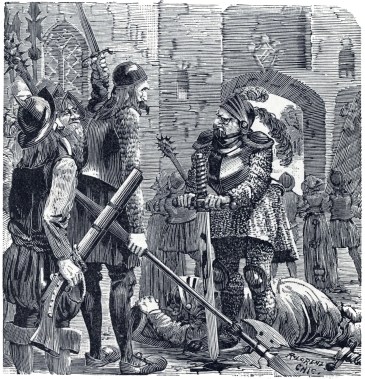
THE HORSE ARMORY.
From the jewel room you pass on to an infinity of towers, all through
long halls, how long I can’t say, filled with all sorts of armor and
weapons. Horses are set up and figures placed upon them, dressed in the
identical armor worn by the old kings and nobles, who, in their day,
rode about the country clad in iron fish scales, with a half ton of
iron, more or less, on their heads, engaged in the (to them) delightful
occupation of burning each other’s castles and killing the occupants.
They did not require a “cause,” or anything of the sort. If Sir Hugh
Bloody-bones wanted the wife or daughter of Sir Magnus Blunderbore, he
simply donned his iron, picked up his lance, called together the
inferior cut-throats who followed and lived upon him, and went for it.
Sir Magnus, if not surprised and murdered in cold blood, and he was
generally not, for those old ruffians slept upon their arms, harried the
country for supplies, shut the clumsy gates of his castle, and stood the
siege. If the castle was carried, all within were put to death, except
such of Sir Magnus’ cut-throats who were willing to join Sir Hugh, the
women were carried off, and so on. The survivors were willing, always,
to join the victor. The successful Knight would say, “Now look here, you
fellows, Sir Magnus is dead. I slew him, and you can’t get provisions
from him any more, while with me there will always be plenty of prog. I
shall keep you busy, for there are other castles to storm, and I am not
very particular with my men.”
And they would all “take service,” as they called it, with the
successful robber, and go right on as usual. They would take anything.
It was a cheerful life these ancient murderers lived, though the people
who supported them didn’t find it so pleasant.
The Horse Armory, so called because the figures in it are mostly
equestrian, is one hundred and fifty feet in length by thirty-four in
width. There sits a Knight of the time of Henry VI., in complete armor,
lance and all, just as he appeared when he started out to kill somebody
and steal his effects. The armor, understand, is not a fac-simile, it
is the genuine thing, actually worn by the marauder of that time. Then
come Knights of the time of Edward III. and Edward IV., both on their
horses and armored from top to bottom. How any man could carry such a
load of iron and sit upon a horse, and how any horse could carry such a
mass of iron, with his own, for the horses were armored also, passes my
comprehension. Imagine a man in July, with the thermometer at
ninety-five in the shade, with a steel pot on his head, covering his
face entirely, with little holes to admit air, with a breast-plate of
boiler-iron, and a similar one on his back, with his arms and hands
guarded with iron, and his legs and feet likewise, with swords and
battle-axes, and daggers hung to him, and a lance fourteen feet in
length, to handle, doing battle. Yet they wore all this, and in
Palestine, and in every other hot country in the world.

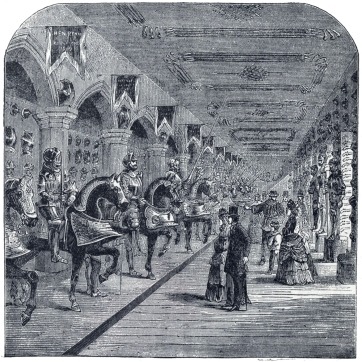
Woe to the Knight who was unhorsed with all this pot-metal on him. He
couldn’t rise under the load, and the other one could prod him to death
at his leisure, and enjoy himself at it as long as he pleased.
BLUFF KING HARRY.
Next to this is the figure of that wonderful old Mormon, Henry VIII. The
armor on this figure is the most curious and valuable in the collection.
It was presented to him on the occasion of his marriage to Catherine,
his No.—,—I forget what her number was—and he wore it at many a
tournament. This King, it will be remembered, had a way of getting rid
of wives that was far superior to Indiana divorce courts. Whenever he
saw a woman that he thought he wanted, and he had an eye for women, he
merely accused his wife of being unfaithful to him, and had a court
which always brought her in guilty, and her head was chopped off without
ceremony, and he married his new flame, only to accuse her and bring her
before the court and chop her head off in her turn. He finished eight in
this way. It was the Pope’s opposition to one of these little
arrangements that brought about the divorce of England from the Church
of Rome, and was the beginning of the Protestant movement. But for
Henry’s terrible liking for women and his peremptory and decisive way of
divorcing wives, I probably to-day should have been a Catholic! What
great events spring from trifling causes.

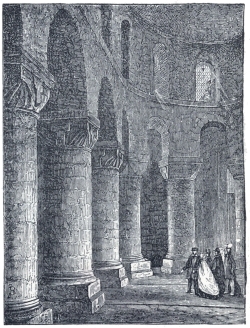
All the way down the long hall are equestrian figures, all armed in the
identical armor worn by the men whose names they bear, and between the
figures are the arms of the various periods of English history since men
took to killing each other as a trade. In this and adjoining halls are
grouped very artistically the arms of every country of the globe, and of
all ages and times. There are guns of every possible kind, most of them
of very rare workmanship, for the mechanics of those old days put more
work upon arms than upon anything else, and swords and daggers, and
battle-axes, and various devices for knocking out brains.
THE BLOODY STRUCTURE.
By the way, the revolver is popularly supposed to be an American
invention, but it is not. There are a score of revolvers here that were
made almost as soon as gunpowder was invented and came into use. The
very one from which Colonel Colt got the idea of a repeating arm is
here, and it is identical in construction with that which now graces the
thighs of so many Americans, and which has done so much for the glory of
our happy country. They were not very much used, however, as, owing to
the imperfect means of firing the loads, all the barrels were liable to
go off at once, invariably killing the shooter without materially
damaging the shootee. The invention of the percussion cap made the
revolver practicable, and Colonel Colt’s widow is living in great
luxury upon an idea taken by her husband from the Tower of London, the
work of some humble mechanic hundreds of years ago. I doubt not that if
she could find the heirs of that mechanic she would pension them. But
they were doubtless all killed in the wars of the day, and so it
probably would not be worth her while to try to seek them out.


GENERAL VIEW OF THE TOWER.
To enumerate everything that is curious in the way of arms and armor in
this hall would be to make a catalogue. It takes more than a day to
merely see (not study) this collection, and then one has his mind
overloaded.
The different buildings that make up what is known collectively as the
Tower, have all histories, and all bloody ones. There is nothing but
blood connected with it. In the White Tower, Sir Walter Raleigh was
confined, and near his den is that once occupied by Rudstone, Culpepper,
and Sir Thomas Wyat, who were all beheaded on Tower Hill. The Council
Room was used by the Kings when they wanted to give some sort of show of
law for a murder, and in this the Council sat when Richard III. ordered
Lord Hastings to instant execution.
The Bloody Tower (that would be the proper name for all of them) was
where Richard III. was supposed to have murdered the two children of
Edward IV., his brother, on which event Shakespeare founded his play of
that name. Some English historians have endeavored to show that Richard
was no such a man as Shakespeare represents. Instead of being a hump
backed, distorted villain, such as we see upon the stage, they insist
that he was the handsomest man of his time; that he did not even try to
murder the Princes, and, moreover, that he was one of the most humane,
politic Kings England ever had, and during his short reign of nine
months, instituted material reforms, and did more to promote the welfare
of England than any King who had preceded or followed him. Also, they
deny the story of his drowning his brother Clarence in a butt of Malmsey
wine, and likewise his murder of King Henry.
THE MUCH-ABUSED KING RICHARD.
Probably these historians are right. Since it has been shown that
General Jackson did not fight his men behind a breastwork of cotton
bales, a delusion that grew up with me, and since it has been
demonstrated that there is no maelstrom on the coast of Norway, that
takes down ships and whales into its terrible vortex, as shown in the
ancient geographies of thirty years ago, I have lost faith in
everything. When I want romance I read history, and when I hunger for
history I read novels. But whether he was a good man or a bad,

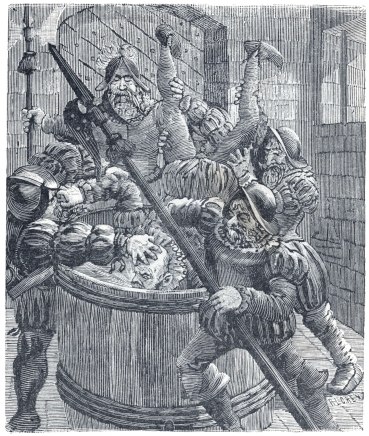
THE PRESUMED DROWNING OF CLARENCE IN A BUTT OF WINE.
Shakespeare has fixed his flint for all time. The essayist may essay,
and facts may be piled up mountain high in his favor, but Richard will
always appear to us as Shakespeare painted him, a hump-backed,
withered-legged man with a villainous face, killing Princes, stabbing
Kings and drowning brothers in wine. Still, I don’t suppose Richard
cares now what is said of him. If he killed the Princes, they, dying
young and before they could be Kings, and consequently comparatively
pure, he will never meet them. If he did not, and is with them, they
have had ample time to arrange their little differences. The opinion of
the world makes little difference to Richard, whereever he is.
Nevertheless, as I wish to stand well with the world hereafter, I shall
try not to get the ill-will of the poets whose works are likely to live.
Richard’s reputation should be a warning.

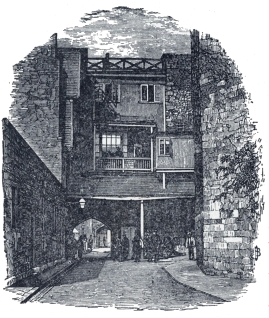
THE BYWARD TOWER.
(From the East.)
A CHAPTER OF MURDERS.
The bloody record continues. Devereux Tower is where the brilliant Essex
was confined till he was “privately beheaded.” The Byward Tower is where
Duke Clarence is said to have been drowned in the wine, which was a
great waste of wine, though it was a delicate compliment to the Duke,
who was fond of it. It was probably distributed among the soldiers who
did the job. In the Brick Tower Lady Jane Grey was immured, and in the
Martin Tower Anne Boleyn, one of Henry VIII.’s wives, was confined, till
she was beheaded, as well as “several unhappy gentlemen” who were
foolish enough to stand up for her, who also had their heads chopped
off. The word “unhappy” is not misused in their case. In the Salt Tower
is shown an inscription made by a gentleman who was accused of using
enchantments “to the hurt of Sir W. St. Lowe and my ladye,” who also
found himself short a head one fine morning. It was a comfortable time
to live when “Sir W. St. Lowe,” a court favorite, could accuse a man he
owed money to of being a wizard, and then ordering him beheaded. It was
easier to pay debts in those days than going through bankruptcy is now.


There were so many murders committed in the Beauchamp Tower that in the
guide books it is counted worthy of a chapter by itself, not only
because of the number, but because of the peculiarly atrocious quality
of them. The other murderers were mere apprentices at the business
compared with those who had the Beauchamp tower in charge. They were
artists, and knew all about it. They gave their whole mind to it.
Marmaduke Neville with fifty others who believed in Mary, Queen of
Scots, were confined in this tower, and they were all beheaded in one
day. Likewise Mr. William Tyrrell, who had some differences with the
government; then the Earl Arundel was beheaded from this interesting old
slaughter house for aspiring to the hand of Mary Queen of Scots. It
appears that a man couldn’t safely make love in those days. But as he
was tried for his religion—not for love—he was not beheaded, but was
mercifully permitted to “languish in prison” till he died. It is
probable that his jailors did not feed him on porter-house steaks.
The Earl of Warwick and the three brothers Dudley were here. The Duke,
the eldest of the three, was beheaded, and the others mercifully starved
to death. A gentleman named Gyfford was put to the rack in the Tower,
and finally consenting to answer the questions put to him—your rack was
a rare persuader—was probably dismissed. But doubtless the headsman got
him. Dr. Stohr, who refused to deny his religion—he was a Catholic—was
imprisoned here, and was released only to suffer a cruel death at
Tyburn. Being a Catholic, and murdered by Protestants, we may draw from
his history the useful lesson that persecution was not, strictly
speaking, confined to the Catholic church, as is popularly supposed. The
Protestants, when in power, knew the uses of the rack, and thumbscrew,
and stake, just as well as the Catholics, and they were just as handy
with them.

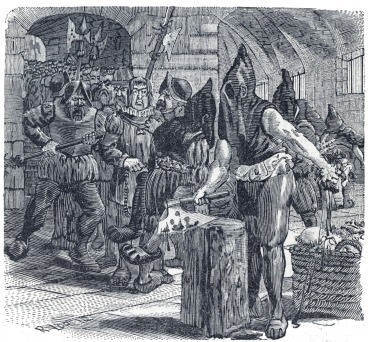
THE OVERWORKED HEADSMAN—FIFTY IN ONE DAY.
INTERESTING RELICS.
The Brothers Poole wanted Mary to be the Queen, and they went the long
road from here.
But the list is too long for these pages.

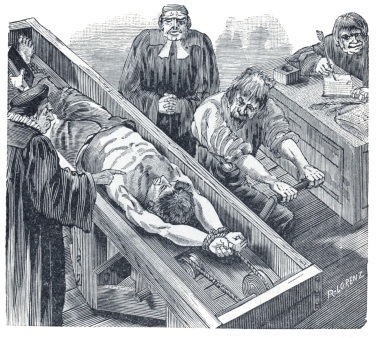
That you may be perfectly sure of the accuracy of these things, the
identical headsman’s block is carefully preserved, with the ax he used
and the mask he wore when engaged in his delightful duty. The ax is
shaped very like a butcher’s cleaver, and the mask is about the most
fiendish face that a devilish ingenuity could devise. Ugly and devilish
as it is, it was probably an improvement on the face it concealed. You
are shown the thumbscrew and rack. The thumbscrew would extort a
confession from a dead man; and the rack—well, that is something
inconceivably devilish. You are laid in a box; ropes on windlasses are
tied to your ankles and wrists; then the windlasses are turned, inch by
inch, till your joints are dislocated. After enduring the rack and
answering questions the way they desired,—for a man in that apparatus
would say anything for a moment’s respite—you are hurried to the block
for fear you may recant as soon as you get out of it. Then what was said
in the rack was put upon record as a testimony on which to rack and
behead other people. Those were the “good old days of merrie England.”


THE BYWARD TOWER.
[From the West.
]
MORE MURDER.
During the reign of Edward III. six hundred Jews were imprisoned in the
dungeons of the tower for “adulterating the coin of the realm.” The
trouble with these Jews was they had too much of the coin of the realm,
and Edward too little. The chronicler goes on to say that so strong was
the prejudice of the King against these people that he banished the race
from England, but, with the thrift that distinguished the Kings of that
day, he compelled them to leave behind them their immense wealth, which
he gobbled, and their libraries, which, as he couldn’t read he had no
use for, went to the monasteries. I suppose he sold them by the pound to
the monks who could read. King Edward has a counterpart in the English
landlord of to-day. He allows no foreigner to take any money out of the
kingdom. It is curious how national traits show in people through ages.
England has no more Barons to take things by the strong hand, but she
has hotel-keepers. Their processes are different, but the result is the
same. They have no racks now, but they have beds—the thumb-screw is
gone forever, but bills are yet made out.
In those days it was not enough to be a heretic or disturber to gain
admission to this portal to the tomb; it was only necessary to be
suspected, and when a man in favor wanted to get his enemy out of the
way, it was very easy to suspect. Talent, usefulness to the
State—nothing was proof against it. Cromwell, one of the most brilliant
men of his day, Secretary to the still greater Wolsey, on a most
frivolous charge, was seized and beheaded. He was becoming too powerful
to suit the favorites. Women suffered the same as men, and exalted
station went for nothing. Sir Walter Raleigh was beheaded please the
Spaniards, one of whose Princesses the King desired to marry.

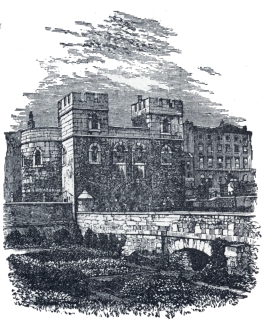
THE MIDDLE TOWER
(From the East.)
A large part of the vast building is now used as a great National
armory. Stored within its walls are ninety thousand rifles of the latest
and most approved patterns, all in perfect order, even to the oiling,
and ready for use at a moment’s notice. England is always ready for war.
It would be a quick nation that could catch her napping. These murderous
weapons looked cheerfully by comparison with the barbarous tools the
old English used. After looking at the battle-axes, and flails, and
lances, it would seem to be a comfort to be merely shot to death with a
Martini Henry rifle. One could feel some sort of comfort in going out
via a decent rifle ball.
THE ANCIENT BEEF EATERS.
The guards of the Tower are the famous “Beef Eaters,” and are all
habited in the uniform of the Yeomen of the Guard of the time of Henry
VII., who instituted the corps. The present yeomen are all old soldiers,
who have distinguished themselves, and a very pleasant time they have of
it. They don’t have to drag women to the block by the hair of their
heads any more, but spend most of their time standing around listlessly
and eating ham sandwiches, which is certainly better than their ancient
employment. There is nothing cruel in an English ham sandwich but its
indigestibility, and that only concerns the eater. It is a matter
entirely between him and his stomach, and does not concern me at all.

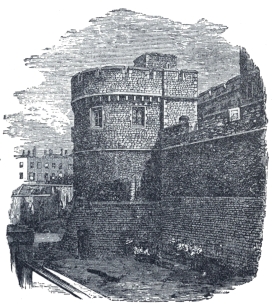
The ancient kings did not have as good a time as one would think, for
every now and then a baron would raise a rebellion, or a knight would
shoot a vicious arrow at him, or the House of Commons would rise, and
protest with arms in their hands against his abuses. But their
followers, these fellows whose armors are before me this minute, they
did have a good time. Their masters found it to their own interest to
feed them well, and their little acts of oppression on their own account
were winked at. And so they lived a jolly life, their bodies pampered
with food, their noses in a constant blush for the liquor they consumed,
and with the pick of the daughters of the peasantry, who were helpless
against them. It was no small thing to be a stout man-at-arms in those
days, and in the service of a powerful Lord. Fighting was really and
literally meat and drink to them, and they actually liked it.

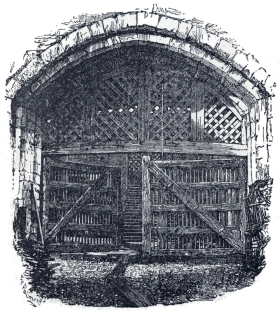
Suspected men of unusual importance were always conveyed to the Tower by
water, in barges gorgeous to a degree. Hence there is a water gate
called “Traitor’s Gate,” which is worth seeing, when one considers how
many great men have passed through it to their death. For a commitment
to the Tower was equivalent to death. If a man was accused of treason,
or witchcraft, or anything else, and the party against him was strong
enough to send him to the Tower, that ended it. Or if a King desired to
get rid of anybody, man or woman, it was easy enough to have a charge
brought, a commitment to the Tower followed, and the dispatch was easy
enough. The Tower was a slaughter pen where those obnoxious to a King or
his favorites could be butchered without uncomfortable publicity, and,
if necessary with some color of law. As if the favorite should say:
“Your majesty, what shall we do with Sir Thomas Buster? Behead him?”
THE CASE OF SIR THOMAS BUSTER.
“Oh, bother, what’s the use of going to that worry. A knife under his
fifth rib will do as well.”
And accordingly the next morning, just before his breakfast was served,
a low-browed ruffian would go to his cell, and Sir Thomas would get the
knife under his ribs, and a hole would be dug, and that was the last of
him. They generally stabbed them at seven in the morning, to save the
expenses of the last breakfast. He might as well go into the hereafter
on an empty stomach, and it was that much saved to the King’s treasury.
They had a good notion of economy in some directions. Or a hasty trial
might be had, and the illustrious prisoner might be led to the block and
have his head chopped off. Anyhow it amounted to the same thing, Sir
Thomas was bound to die in one way or another.

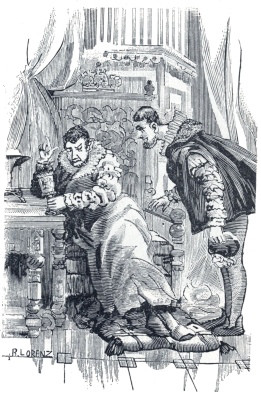
WHAT SHALL WE DO WITH SIR THOMAS BUSTER?
I have a profound respect for the murdered of the Tower, but not a
particle for their sacred butchers, the Kings and Queens of that day. To
have been murdered in the Tower, no matter by what means or in what way,
was a certificate of good character that should have lasted till to-day.
By chance, they might occasionally kill a bad man, but as a rule the
victims were men who incurred the displeasure of the powers that were by
opposing infamy; by making some sort of a stand, no matter how weak, for
something good. I should liked to have had time to get flowers to drop
on the spots where they were supposed to be interred, and I would have
done it to some extent, only no one knows where these spots are. A
flower dropped anywhere within the Tower would fall on some one’s grave,
but you might possibly decorate the wrong man. I didn’t do it, and I
don’t suppose the illustrious deceased would care much about it anyhow.
If I cared anything about what posterity should say about me after I had
gone hence, I shouldn’t want anything better than to have been butchered
in the Tower. That is a better patent of nobility than any that King or
Kaiser can confer. Whoso died there, died in a good cause, no matter
what it was. The victim must have been good, for the kingly butcher was
always bad.

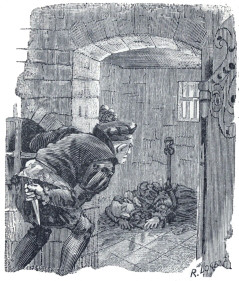
CHAPTER XI.
TWO ENGLISH NUISANCES—DRESS AND TIPS.
WITH that propensity for lying on the part of traveled men and women to
which I have had occasion to refer, the intending tourist is warned by
all who have crossed the water to take as little clothing as possible,
for the reason that “you can get any clothes you want in London at half
the money, and then you have the style, you know.” What infernal spirit
seizes traveled people and compels such terrible falsification, I cannot
conceive.
Quality considered, clothing is no cheaper in London than in New York.
Which is to say, if you are so lost to all sense of what is due yourself
and the world as to wear such clothes as the Londoner does, you can get
them quite as cheaply in New York as in London, and even if you want bad
clothes the style will be better. Should the American tailor try ever so
hard to make a badly-fitting garment, his conscience, his taste, his
everything, would rebel against doing such work as the English tailor
considers quite good enough for anybody.
You can get at a fairly fashionable shop in London a suit of black or
blue, frock coat, trowsers and vest, for five pounds, which looks very
cheap to one who has been in the habit of paying sixty-five dollars for
the same clothing in New York or Boston.
But just wait till you get the clothes and the idea of cheapness goes
like dew under a July sun. All there is cheap in the transaction is the
suit. The material is very cheap, cheap to the point of flimsiness, and
the making—heaven help you—it is thrown together. There are no stays
to the pockets, no reinforcing to the seat, no leather on the inside of
the bottoms of the trowsers, and the linings of the coat and vest, or
waistcoat, as these semi-barbarians call it, are of the cheapest and
flimsiest material that a devilish ingenuity can weave. The suit cannot
possibly wear a month and look decent.
But the worst is yet to come. You try it on. We will suppose the coat to
be a single-breasted frock. You are immediately astonished at the
liberality of your tailor in the matter of cloth, for when you draw the
lapels together you find yourself able to button the right hand one on
the left hand shoulder.
“Too much cloth in front,” you remark.
“I thought you wanted an easy fit!” the villain answers without a blush.
“So I did, but I did not want all the cloth in your shop.”
Then comes an animated discussion. You insist that it never has been
your habit to go about in a sack, that you prefer not to appear habited
in a bag. The tailor stands off a foot or two, and admits that while it
is perhaps “a trifle easy,” it is still a proper garment and quite in
the mode. But if you prefer he will alter it. Prefer! why it will fit
Daniel Lambert. It is twice too large for you and of course it must be
altered. Then he takes French chalk, and makes a lot of marks on it and
you leave it. In a few days he sends it to you altered. You put it on,
and commence swearing if you are a profane man, and objurgating, if you
are not. I objurgated. For the trowsers hang about your legs like bags,
the waistcoat climbs up the back of your neck to the ears, the coat is
loose where it should fit closely, it is tight where it should be easy,
the skirts hang about you awkwardly, it is angular, stiff and awkward,
and yet it comes so near to being a garment that you are compelled to
take it, especially, as, following the advice of the infernal tourist
who said to you to take only one suit with you, you must have it at
once. And so you put it on, and go out into the street, feeling as
though you were an object to be stared at, and blighted. You bear not
only the burden of physical discomfort, for a misfit is always
uncomfortable, but have the consciousness that you are badly dressed,
and that every bad point in your physical make-up, is made still more
conspicuous by the lack of skill in a tailor.
THE MIX IN CLOTHES.
The only comfort you have is that everybody else is just as badly
apparelled. Your American friends know at a glance that it is not your
fault, but that you have passed under the blighting shears of an English
tailor, and your English friends are all in the same fix. But then they
enjoy bad clothes, never having had any other.
There were four Americans in one house in London who each ordered a suit
of clothes of one tailor at one time. The four suits came home Saturday
evening, and were all tried on Sunday morning. One was tall and slender,
another short and stout, the third was dumpy, and the fourth was medium
in height and breadth.
No. 1 rushed into my room. “Look here,” he exclaimed “there is a mistake
somewhere. These clothes must be yours. They were never made for me.”
No. 2 entered. “These d——d trowsers must be yours. They were never
made for me.”
And in a minute No. 3 came in with the same exclamation. An examination
of the addresses on the wrapping paper showed, however, that each had
received the clothes intended for him, notwithstanding that each suit
would have better fitted some other man. And then I soothed them by
explaining that the English tailor makes all clothes alike; that he goes
upon the supposition that every man should be so high, and so broad, and
that measurement is a mere form gone through with as a professional
fraud, the same as a lawyer looks the wisest when he knows the least;
and that to make any fuss about it would result in nothing, and the only
thing to do was to take them, pay for them, and wear them while in
England. They were no worse off than everybody else, and that they
should be philosophical and content. One remarked, with a great deal of
truth, that all the philosophy in the world wouldn’t make a six foot man
look well in a pair of trowsers constructed for a five foot sixer, and
another that he knew of no philosophy that would support one under the
trying affliction of a coat that bagged on the shoulders and in the
back, and that had no more shape to it than a bean sack.
That is where they were wrong. That is what philosophy is made for.
England has given the world its greatest philosophers, her philosophers
being made necessary by her tailors, the same as every country that
cherishes an especially poisonous serpent, also grows a particularly
powerful antidote, and the snake and antidote grow together.
The women dress a trifle worse than the men—their dressmakers are a
trifle worse than their tailors. If an English woman would only buy her
gowns ready made, it would be better, for there would be a chance—only
a slight one, it is true, but yet a chance—of her getting a fit; but
she will not. She goes to the most expensive modiste, “to get something
good,” and then all hope of a prettily dressed woman is gone, and gone
forever.
A BADLY DRESSED PEOPLE.
You can tell an American or French woman as far as you can see one. The
neatly fitting dress, so neatly fitting as to make you almost think the
woman had been melted and poured into it, the dress of which an American
girl said, that when she got into it she felt as if she had been born
again; the neat little shoe; the grace with which the dress is carried,
and the grace of the woman who carries it; all contrast terribly with
the angular gown, the shawl badly hung, and awkwardly worn, the ugly
shoe and the large foot it covers, and the square, steady,
grenadier-like step of the English woman.
No matter how expensive the material, or how costly the garments, no
matter how much Nature has done for the Englishwomen, (and they are, as
a rule, magnificent specimens of womankind,) they can’t dress, and
consequently lose half their attractiveness. They have strength, but
they sadly lack grace.
It is all well enough for me, for I prefer badly fitting clothes,
desiring to keep down to the ordinary level, and not be made too
conspicuous; but it is hard upon those less favored, and who need to
reinforce nature by art.
But always bear this in mind. When you come abroad bring with you all
the clothes you think you will need, unless, indeed, you come flying
light in the matter of baggage for convenience of transit. If that is
your idea it is well, but if you come expecting to furnish yourself in
England at a less price, or to get superior styles, you will be the
worst deceived man or woman in the world. Quality considered, there is
nothing cheaper than in America, and, as for style, it is a Parisian
dandy to a Hottentot. The English tailor is the most detestable
cloth-butcher on the globe. So unutterably bad is he that I cannot
ascribe his miracles of misfits to lack of mechanical skill, or general
imbecility; there must be underlying his work a fiendish purpose and
determination. The English tailor or dressmaker must be a misanthropic
individual who has a spite against the human race, and they must have a
vengeance to wreak which they accomplish in this way.
I don’t wish it to be understood that all English men and women are
badly dressed. I have seen some most charming toilettes, but on inquiry
I found that they were well-to-do people who could afford to go to Paris
to get their clothes, or those who had just returned from New York.
If you desire to be well dressed in London, take your clothes with you.
This is the parting advice of a sufferer and victim. I have paid for my
experience—I give it to my readers gratis. That is what I am here for,
and I shall discharge my duty regardless of consequences.
The next principal nuisance you meet in England is the system of
“tipping.” “Tipping,” be it known, is gratuities given to servants, or
whomsoever does anything for you which, in any other enlightened country
on the face of the globe, is considered an act of courtesy, or a matter
of right.
It commences the moment you leave the dock at New York. You have paid a
very large sum for your passage, enough to entitle you to every comfort
that money can buy. But there sets upon you immediately a horde of
blood-suckers who never let go, till, gorged, they drop off at
Liverpool. There is a sovereign to the man who makes your bed; there is
the chamber-maid, there is the table steward, the smoking-room steward,
the deck steward; there are collections for asylums in Liverpool; there
are collections for the man who attends to the purser’s room, where a
select few are treated to a little refreshment at five in the afternoon;
there are fees for showing the machinery of the vessel; there are tips
for the Lord only knows what. The only thing free about the vessel is
the water outside, and could a scheme be devised for making you pay for
a sight of that it would be put into operation at once.
Then there is the English hotel. The landlord measures you as you come
in. He inventories you. He says “this man will stand six pounds, or
eight may be. That will leave him enough to get back to London, with a
cab fare to take him to his lodgings.” And so when he makes his bill he
manages to make it to the exact amount of what he thinks you have about
your person, irrespective of what accommodation you have received. In
paying this enormous bill should you display more money than he supposed
you carried, he gnashes his teeth and howls with rage. But he very
seldom gnashes or howls. He is a very skillful person, and knows
intuitively to a half-sovereign how much you will, or rather can, bleed.
AT AN ENGLISH HOTEL.
You contract for your room for so much a day—and the sum is always a
round one—and it is explained to you that you may order your meals from
a bill of fare, the price of each dish being set down opposite its name.
Very good, you say to yourself, I know now what I am to pay, and you
fall to work. Do you? Not much. There stands a waiter, who makes a
frantic effort to appear like a man, but only succeeds in getting to
where Darwin commenced the human race. But he rubs his hands, and
smirks, and smiles, and brings you your orders, and still smiles and
smiles, and would be a villain were there enough of him. He does all he
can in this direction, however.
When you are through, you rise and prepare to get out. The waiter stops
you with an obsequious smile in which there is much determination, and
remarks, “the waiter!” You are made to understand that he expects a
shilling. You give it to him. Getting to your room you want a pitcher of
water. A servant brings it, and waits till you give him a six pence. You
take a drink—if you do drink—I know this from seeing other
victims—you pay for the drink, and the servant who brings it to you
expects and manages to get three pence. The boy who cleans your boots
wants six pence, the chambermaid who sweeps your room wants a shilling,
the boy who goes down to see if you have any letters wants six pence,
and after paying for all this you get your bill. Understand you have
already paid exorbitant prices for each and every bit of service you
have received, but nevertheless, there in your bill is an item,
“attendance four days, eight shillings.” You pay it without a murmur,
externally; and hope you are done with it. Not so. As you leave the
hotel, there stands the entire retinue of servants, the boots, the
chambermaid, the bar-man, the bell-boy, all with their hands extended,
and every one expecting a parting shower of small coin. You pay it.
There is no other way to do.
You see how it is. You pay the servants for the performance of every
possible duty when they perform it; you then pay the landlord for the
duties already paid for, and then as you leave the house you pay the
servants over again. Three times for the same service, and that whether
any service has been rendered or not.
You get into your cab and drive to the station. The legal fare is one
and six pence. The cabby expects six pence in addition, for himself, the
porter who shows you what car to get into, with the uniform of the
company on his back, expects four pence for that, the other porter who
takes your valise to the car-door, must be fed, and so on, and so on
forever and forever.
I tried conclusions with a hotel clerk in a city in England, but I shall
never do it again. There is no use. You might as well submit first as
last. You may struggle, but they have you as certainly as their
ancestors and prototypes, the old Barons, had the Jews.
I went to bed at night with two candles on the mantel. It was bright
moonlight, and as I had read my regular chapter in the Revised Testament
in the office, I had no occasion for light. I simply wanted to get into
bed, therefore I didn’t light the candles, at all.
The next morning I found in my bill a charge for two candles, two
shillings. I protested.
“I used no candles,” I said.
“But they were there,” was the cool reply. “Perhaps you used matches—it
is all the same.”
“But I didn’t use matches, and if I did, I had my own.”
“We do everything for the comfort of the guests of the house. There were
candles and matches for you.”
He never blushed but took the two shillings as coolly as possible,
receipted the bill and said “Thank you,” and hoped if I ever visited the
place again I would call upon them.
I presume I shall. It doesn’t make any difference where you go, it is
all the same; and if you are to be swindled, it is preferable to have it
done by somebody you have a slight acquaintance with.
It reminded me of the man who built a tavern in Indiana. A traveler
stopped with him one night, and the next morning asked for his bill.
THE ENGLISH LANDLORD.
“Twelve hundred and fifty dollars,” said the landlord, promptly.
“Twelve hundred and fifty dollars for one day! It is outrageous!”
“It is a little high,” said the landlord, “but I’ll tell you how it is.
I opened this house exactly a year ago yesterday. I expected to make a
thousand dollars the first year, and you are the first customer I have
had. I ought to charge you a little more to cover insurance, but I like
you, and don’t want to be hard on you. Twelve hundred and fifty dollars
will do.”
The English landlord likewise makes out his bill with the calm
confidence that he will never see his guest again. He seldom does—if
the guest can help it.
I have orated much against the American hotel clerk and his diamond pin
and cool insolence, but I shall never do it again. He is a babe in arms
as compared with his English brother.

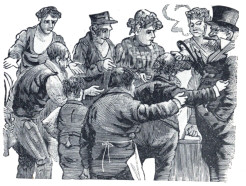
GETTING READY TO LEAVE A HOTEL.
The system of feeing goes into everything and everywhere. You are
begrudged a breath of fresh air, unless you are willing to tip somebody,
and I suppose a tip would be required for a snore, if a servant could
possibly get into your room.
In fact, you cannot go anywhere in London without the everlasting and
eternal tip, except the British Museum. That is the single and sole
exception. There, on certain days, there is no admission fee, and you
pay nothing for having your cane and umbrella cared for. But everywhere
else you pay an admission fee, you pay a swindler for taking your cane,
and you pay the guide for giving you an entirely unintelligible account
of what is to be seen. Even Westminster Abbey, the most sacred spot in
England, has its regular system of tips. It is not as it was in the
Temple of Jerusalem, in the time of our Savior. There were money
changers there—here the vergers give no change. They keep all you give
them. Consequently they are not liable to be scourged out.
In the restaurants there is a charge on the bills for attendance, but
nevertheless you are expected to tip the man who waits upon you. By the
way, these waiters get no pay for their services; they pay the
proprietors a bonus for their places.
WOULD THE QUEEN ACCEPT A TIP?
The hackney coach driver gets about two shillings a day from the
proprietors of his vehicles, and makes his money from his customers. The
man who drove us down to the Derby expected, and did not expect in vain,
for he demanded it directly, two shillings each from his twelve
passengers, notwithstanding the fact that we had paid twelve dollars and
fifty cents each for our passage.

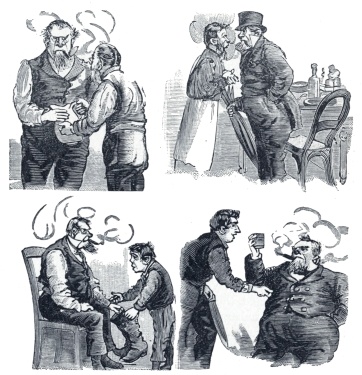
It runs through everything. I will not say that the Queen herself
divides with her servants the tips they receive, for I do not know. I
will not make statements rashly. But I presume she does. I do not see
how so important a source of revenue should escape her notice, or be
neglected. I shall not offer her sixpence when I inspect any of her
palaces, nor do I say she would take it from me. But so firmly fixed is
the infernal system, so much is it a part of English life, that I verily
believe it would wrench the amiable old lady’s heart not to take it, and
I also believe that she would so manage that I should not get away with
it in my possession.
Oh! my countrymen! It is my duty to warn you against a great impending
danger. The system of tipping is, gradually but surely, getting its
rapacious fingers upon your vitals. It has its clammy grasp upon your
sleeping cars; it is gradually working into hotels, and everywhere else.
Strangle the monster in its infancy. Declare war upon it at once, and
fight it to the death. Refuse to pay the sleeping car porter for what
you have already paid the corporation of which he is an excrescence.
Refuse sternly to fee the servant at a hotel, the porter who handles
your trunk, and the man who waits on you at table. When he says to you,
“My wages are small, and I must have fees,” say to him, kindly but
firmly, “Either make the proprietor pay you proper wages or quit his
employ. If you cannot plow or hammer stone, go out quietly and die for
the good of the many. It is not necessary that you should wear a
swallow-tailed coat, and make more for trivial services than the average
mechanic does for a hard day’s work. We will none of it.”
And so shall you rid yourself of the most infernal nuisance that
afflicts England, the one petty worriment that makes the life of the
tourist unhappy. We can endure a giant monopoly, but these small
tyrannies are unbearable.

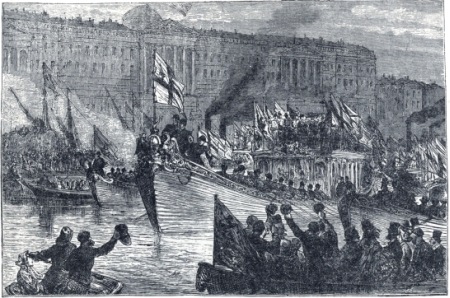
THE LORD MAYOR’S SHOW—ON THE THAMES.
CHAPTER XII.
PORTSMOUTH.
WAY down upon the Southern coast of England is an old town of more than
ordinary interest. Everybody is familiar with that great depot for
England’s naval and military forces—Portsmouth.
The run down from London is one of delight, that is it would be were it
not for the fact that the stolid Briton will not keep pace with the
times, and introduce upon his railroads modern carriages, in which a
traveler may ride with some degree of comfort. He refuses to abandon the
ancient compartment carriage, which is the most abominable arrangement
conceivable. The cars, as we would call them, are about half the size of
the ordinary American passenger coaches, but instead of being large,
roomy and convenient, they are exactly the reverse. They are divided
into compartments, each one of which will hold ten persons, five on each
side, facing each other.
After booking your place, instead of buying your ticket—although really
you do buy a ticket—you take your seat in one of these compartments, in
which are nine other persons. Thereupon the guard, about like our
brakeman, locks the door, and you are a prisoner until the next station
is reached.
There are absolutely no conveniences. You are simply compelled to sit
bolt upright, in a close, stuffy room, in company with nine other
persons whom you don’t know, and don’t care to know. You can’t walk from
one end of the car to the other, because there is no aisle, as in our
cars. You can do nothing but sit there and think what reforms you would
inaugurate were you only a Board of Directors on one of the roads.
THE BEAUTIES OF ENGLISH RAILWAYS.

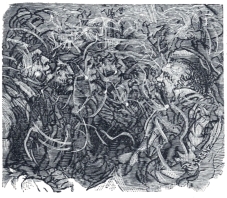
It is possibly a finicky sort of a person who would object to trifles
light as air; but there be breaths that are not as light as air, and
they are no trifles. You travel second or third class, and there shall
be nine sturdy Englishmen smoking short pipes, or villainous cigars,
with their breaths ornamented with every variety of very bad liquor that
the combined genius of the liquor compounders of all nations can
produce. Likewise there are feet innocent of baths. If you happen to
have an end seat you may let down the window and get fresh air, but
heaven help you if you are in the middle. You inhale the fumes till a
state approaching intoxication ensues, but you must sit there all the
same, for there is no escape. Such a debauch may be cheap; but I never
did like anything second-hand—second-hand intoxication least of all. I
vastly prefer original sin. And then imagine the pleasure of traveling
in such company as one must necessarily be thrown into by this system.
The terrible tragedy on the Brighton road recently, gives a good idea of
some of its beauties. A well-to-do merchant living in the country had
been to London to make some sales of land, and was spotted by an
impecunious wretch, who had previously known him. The merchant, whose
name was Gold, left London on the afternoon train, and was alone in one
of these compartments, securely locked with the villain, whose name was
Lefroy. It seems from the facts of the case, as gathered by the police,
that while between two stations Lefroy attacked Gold. There was a
violent struggle, during the course of which Lefroy killed Gold, rifled
the body and threw it out of the window, as it was found by the road
side. When the guard unlocked the compartment at the next station
Lefroy invented some flimsy story about some mysterious shooting, to
account for the presence of the blood, and actually made his escape. It
is comforting to know that afterward Lefroy was caught, tried and hung.
England does hang murderers.
How utterly impossible such a tragedy would have been in an American
car. But here the victim had absolutely no way of calling for or
obtaining assistance. The two were alone, locked in the compartment, and
the cries of the wretched man as he realized his danger, were drowned by
the noise of the train thundering along at sixty miles an hour.
But to return to Portsmouth. The scenery from London is charming. The
train rushes along, after leaving the fog and smoke of London in the
rear, through the garden land of England. The fields are all cultivated,
the farm houses, ancient and peculiar, have an air of solidity and
comfort, and an occasional castle lends variety to the scene and makes
the picture perfect.
The towns through which the road passes are, of course, all very old.
They abound in red-tiled houses of antique pattern, narrow streets, that
at the end of the village lose themselves in beautiful lanes, fringed on
either side with long rows of stately trees that shade the close-cut
hawthorne hedges. But over all these is an air of age. Everything is
finished. Everything is complete. We have visited so many old towns, and
inspected so many old buildings, that it would be a positive relief to
see a brand new house, painted white, with green shutters, whose gable
roof glistens in the sunlight with its new pine shingles. But, alas!
that cannot be. Here everything is old and purely English.
Portsmouth was reached after a delightful run of two and a half hours,
and soon after we were snugly quartered in the queerest hostelry
imaginable, our comfortable room overlooking an arm of the sea, upon
which were all manner of craft, from the diminutive dory to the massive
merchantman.
NELSON’S SHIP.
Portsmouth is, and always has been, one of England’s strongest points.
Situated in a most commanding position it has been an invaluable factor
in her matter of defenses. Only five or six miles away, the Isle of
Wight runs for miles parallel with the coast, forming a narrow passage
through which the vessels for a foreign nation, if they intended to make
a hostile landing in that neighborhood, must pass. Spithead, the famous
place of entry and departure of vessels, is just off Portsmouth, and is
guarded, as is the passage, by two immense stone forts, built at no end
of labor and money, directly in the channel, effectually protecting that
entrance. And then to make things more secure, there is a series of
three forts on the Isle of Wight, while Portsmouth, to speak within
bounds, is made up almost entirely of forts.
At first one wonders why England finds it necessary to keep these forts,
and the heavy force of soldiers required to garrison them. At Portsmouth
is one of the largest, if not the largest, dock yard in the world, upon
the safety of which the fate of the nation’s navy depends, and if that
point, strong as it is, and affording such excellent opportunities for
the protection of the southern coast, were to fall into the hands of an
enemy, it would open all England to it. And your English are great
Generals. In time of peace they prepare for war, and keep all things in
readiness for any emergency, no matter how sudden or how severe.
The harbor is a beautiful one and full of interest. Of course there is
the inevitable waterman, with his tarpaulin hat and tight fitting
“Jersey,” who beseeches “Y’r hon’r,” to let him row you about. And of
course he carries his point.
The very first thing he does, before you can admire the strange species
of ships that are on every hand, is to row you directly to Lord Nelson’s
flag ship, the “Victory,” on which the gallant sailor died, at the
battle of Trafalgar. But one is not sorry at that, for Nelson’s
character was one that compelled the admiration of every one who had
ever studied him and his glorious achievements. With what a thrill,
then, one stands upon the very deck upon which he trod during one the
most brilliant sea fights in the annals of history, to go upon the gun
decks where he commanded his gallant sailors. With what feeling of
sadness one stands on the spot where he stood when the deadly leaden
ball of a French sharpshooter gave him his death wound, and with
uncovered head bows before the spot where the soul of the greatest,
bravest sailor the world ever knew, winged its way amid the smoke and
horror of battle to the peaceful haven of the great hereafter.

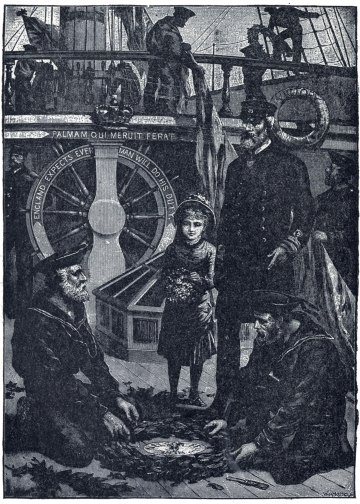
THE ANNIVERSARY CEREMONIES—“HERE NELSON FELL.”
IN THE HARBOUR.
The anniversary of the battle is celebrated regularly, and the old ship
is once each year made radiant with flowers. A beautiful wreath is
always placed upon the spot on the deck where the hero fell.
It does not seem possible that the great, clumsy-looking vessels that
were used in those days could even be navigated, to say nothing of
fighting with them. The “Victory,” which is only one of a half dozen of
the same kind now laid up—put on the retired list—in Portsmouth
Harbor, is a huge floating castle, and required, when in commission, one
thousand men to operate her. She is fifty-eight feet from the main deck
to the hold, though she seems, with her four decks above the water line,
to be even higher than that. Comparing her with the long, narrow
iron-clad of to-day, it requires a considerable stretch of imagination
to realize that she had once been really in service, and no slight
service, either.

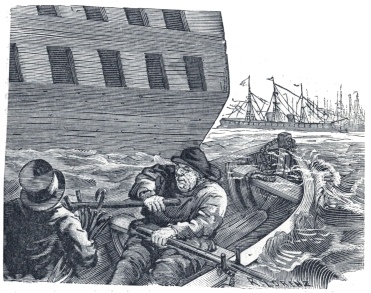
A two hours’ trip around the harbor is one of constantly increasing
interest. There are ships and ships. Here are immense men-of-war, full
rigged and ready for a cruise, alongside of which is a trim yacht flying
the pennant of the Royal Yacht Squadron. Here a huge merchantman, with
a cargo from Bombay, perhaps. Beyond, a great white steamer, larger than
the transatlantic passenger steamship, that takes England’s soldiers,
these same red-coated fellows we see strutting about here with their
diminutive caps jauntily perched over their left ear, out to India to
help keep the natives quiet and subdued. Right here is the Queen’s
private yacht, the “Albert and Mary,” a vessel of large dimensions, and
fitted up in the most exquisite manner. This is the ship the Queen takes
her little excursions in, and occasionally sends it across the channel
to bring over some distinguished personage whom she wishes to honor.
Near this palatial steamer, as though to make the contrast all the
greater, is an old man-of-war, built years ago, and found now to be of
no use, either for the purpose for which it was originally built, or for
the carrying trade. So it lies there a worn-out monument of the past,
gradually yielding to the ravages of time.
But the great point of interest in Portsmouth is the dockyards, the
finest in the world. A thorough survey of it would take three or four
days, but a stroll of four or five hours gives one a fair idea of what
it is. Here the mammoth vessels belonging to England’s naval equipment
are taken for repairs, and the dry docks, of which no description is
sufficient to convey a definite idea of their size and general
appearance, are constantly filled with them. These docks are magnificent
specimens of masonry, some of them being acres in extent, and built in
the most solid, substantial manner. In the great buildings fronting on
the water are vessels of all sizes and descriptions, in course of
construction, some ready to launch, and others in the first stage of the
work.
SOLDIERS AND SAILORS.
Just now the workmen are engaged in putting the finishing touches on a
great iron-clad turret-ship, of which England is very proud. And well
she may be, for the “Inflexible” is really a wonderful vessel, with her
two turrets bearing each two guns of eighty tons weight. The turrets,
made of heavy iron plates, are made to revolve by machinery, so that the
guns may be fired in any direction. The loading and cleaning is all done
by ingeniously arranged machinery, worked by hydraulic pressure. In
fact, all over the ship steam power is used wherever it is possible, and
in some instances where it seems almost impossible. She is built
entirely of iron, and seems impregnable. As one gazes upon her monstrous
proportions, her terrible facilities for dealing death and destruction,
there comes involuntarily the wish that there may never be an occasion
when her loud-mouthed and frightfully effective services may be
required.
Impregnable as she seems to be, English mechanics are busy inventing
guns to pierce her. That is going on all the time. They construct a
vessel which will resist any gun they have, and then construct a gun
which will pierce the vessel. Where it will end the Lord only knows. In
England the irresistible is always meeting the immovable, and vice
versa.
In Portsmouth, more than in any place in England, the policy of England
is manifest. Portsmouth is one vast fort, and every other man you see on
her streets is a soldier. You come upon vast fortifications everywhere,
long lines of earth works stretch in every direction on the coast,
commanding every approach to the city, and vast stores of ammunition are
piled away safe and secure but ready for use at a moment’s notice.
Portsmouth is a watch dog for that part of the island, and it would be a
daring foe that would attack her. It gives you a very good idea of
England’s strength, and of her power of defense. But heaven help the
people who have to foot the bills for all this.
After a day spent in the midst of all these places suggestive of war
with its terrible sequences, it was a pleasure, in the evening, when the
light sea breeze tempered the heat that had been so oppressive, to
stroll down to the “Old Fort,” as it is called, though it bears but
faint resemblance now, to an effective fortification. Its heavy stone
abutments that were once crowned with cannon, are now covered with moss;
the cannons have been taken away, and in their stead are rustic seats
around which happy children laugh and play, while their nurses sit
talking of their red coated favorites in the adjoining barracks. There
is just now an air of peace and harmony, of war days done away with,
that is only disturbed by the occasional sight of a sentry who paces his
beat in front of the barracks. It is

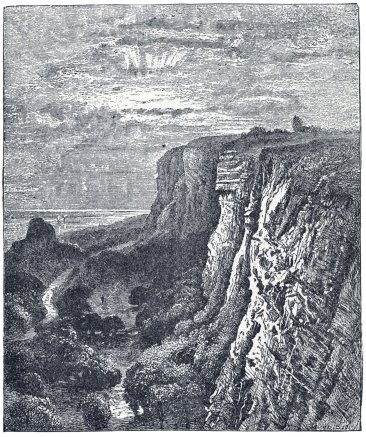
UNDER CLIFF—ISLE OF WIGHT.
OUR STEAMER FRIEND TIBBITTS.
peace now, but the sentry shows how insecure the peace. England must be
always ready for war. But standing upon a parapet, overlooking the sea,
one forgets for the time the fact that he is in the very midst of that
oppressive power, the strong arm of the soldier, and gives himself up to
kindlier thoughts, brought up by the marvelous beauties of the scene
spread out before him like the mystic picture painted by fairy hands.
The sea, over which the last rays of the sinking sun dance and shimmer,
is just rippled with a light breeze that sends the graceful little
yachts skimming merrily over its surface. The misty outlines of the Isle
of Wight, half hidden by a delicate purple haze, gradually fade from
sight as the sun sinks lower and lower, and throws a broad path of
golden light along the bright blue water. As it sinks into the sea, a
great globe of brilliant red, a stately ship, with graceful masts rising
high in air, cuts the path of golden light, and for an instant is
clearly outlined against the glowing orb. Every mast, every rope, even,
can be seen clearly and distinctly against the beautiful background. For
an instant every outline is tinged with gold, then it passes slowly on,
the sun sinks beneath the waves, and then comes the soft twilight, when
one “sinks into reveries and dreams.”
This reverie and dream business is all very well for awhile, but it
cannot last, and the awakening is not pleasant. The good old town of
Portsmouth, with its historical memories, the beautiful harbor filled
with so much that is interesting, must be left for others to enjoy while
we go back to London and resume the routine of sight seeing—that is, to
draw it mildly, becoming just a trifle tiresome. One can have too much
of even London.
* * * * * *
* *
On our return to London we met our old steamer friend, Tibbitts’s
Lemuel, of Oshkosh. He had been traveling in the North of England, and
tiring of the smaller cities and the country, had returned to London to
“do it.” He was rather puffy in the cheeks and rather bleary about the
eyes, which showed a season of not altogether strict adherence to the
precepts of Father Matthew. He was overjoyed at seeing us, as men always
are at seeing anybody of whom they want something. He was in trouble.
“Look here,” said Lemuel, “you are a good fellow, now, and I know you
will help me out. You see I came over for improvement and experience,
and to enlarge my mind, and all that sort of thing, and the old
gentleman insisted that I should keep a diary, and note down my
impressions of scenery, and industries, and modes of living, and all
that, and send it to him regularly, and I must do it, or he will cut
off the supplies, and bring me home.”
“Well, that is easy enough. You have done it? You have kept a diary?”
“Yes, a sort of a diary. You see there were four of us in the party,
devilish good fellows, one from Chicago, and two from New York, and we
went to a lot of places, and saw a great deal, and I wrote in my
memorandum book every day, but it was certainly the last thing I did
before going to bed, about four o’clock in the morning, or a little
later. What the old gentleman wanted was not only an account of all this
rot, but my impression of the places, to develop me. You understand?”

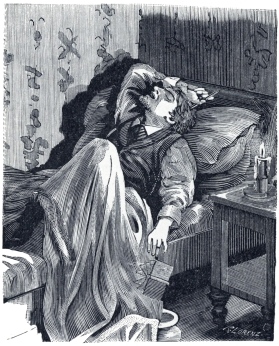
THE UNFINISHED ENTRIES IN THE DIARY.
“Yes; and a good idea it is. Did you write down your impressions of the
places you visited?”
“Well, yes; but I am afraid they won’t satisfy father. He is mighty
particular, and awful sharp.”
“Will you let me see your memorandum book?”
TIBBITTS’ DIARY.
He handed it to me, and these are some of the entries, which were, no
doubt, written at four in the morning, the last thing before getting
into bed; and they were, unquestionably, his impressions. I select a
few at random, these few being excellent samples of the whole lot:—
Leeds—Manufacturing city—Beer very bad—Scotch whisky tolerable,
though I never liked it cold.
Birmingham—Manufacturing city—Beer bad—Not equal to our lager—No
good beer in England—Stout rather better—Went in on stout.
Manchester—Good bottle beer—Draft beer bad—All draft—(This
sentence was not finished, probably for reasons. He explained that that
night he slept in his boots.)
Sheffield—Manufacturing city—found some genuine American bourbon,
and went for it—It was refreshing, as a reminder at home—Don’t know
about the beer—There’s no place like home.
Nottingham—Don’t know what the people do—a great many of them—Beer
bad as usual—Guinness’ stout in bottles fairish—Wish—
(Another unfinished sentence, explained as before.)
And so on. I told Lemuel that it certainly would not do to send these
impressions to his father, as evidently he observed only one side of
English life; that he had taken his observations through a glass darkly,
but that I really hadn’t the time to write up a set for him, especially
as I had not visited those places myself.
“But what am I to do?”
Advising him to procure a good guide-book, and remain sober for a week,
and get to work, we parted.
There are a great many Lemuels getting similar impressions of Europe—a
great many; I may say altogether too many.

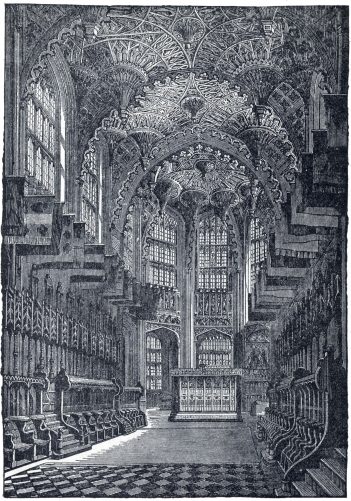
WESTMINSTER ABBEY—INTERIOR.
CHAPTER XIII.
WESTMINSTER ABBEY.
SOMETIME in the sixth century a Saxon King, named Sebert, founded an
Abbey, where Westminster now stands. It is another of the regular show
places of London, and possibly the most interesting, unless it be the
Tower. It has been rebuilt a dozen or more times, and is really the most
beautiful building in London of its class.


EXTERIOR OF WESTMINSTER ABBEY.
The Abbey is three hundred and seventy-five feet in length, by two
hundred in width, and its height from the pavement to the foot of the
lantern is one hundred and forty feet. I know this, for I got it from
the guide-book.
There is nothing in England, in the way of architecture, more striking
or grand. The beautiful is not always the grand, or the grand the
beautiful. Westminster Abbey is both. The old architects might not have
been able to have built the Capitol at Washington, and they certainly
could not have built the Court House in New York, and made it cost more
than the Houses of Parliament, for they were not that kind of
architects; they mostly died poor and did not wear diamonds, but they
managed to erect a building that is worth the passage across the
Atlantic to see.

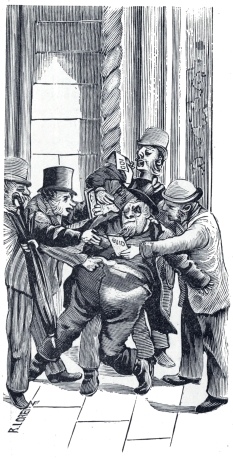
THE ENTRANCE TO THE ABBEY.
SEEING THE ABBEY.
On entering the Abbey you run the gauntlet of a dozen or more fellows
who have the privilege of selling guide-books. They will not take “No!”
for an answer, but manage somehow to compel the gratuity. They are
Potiphar’s wives with designs upon your pockets, and you have to choose
between yielding to them, like Joseph, or leaving some portion of your
garments in their grasp. You always shed the sixpence. Then you wander
about through the magnificent structure, reading tablets on which are
inscribed the virtues of all sorts of men, till happily remembering that
kings and queens were buried in the building, you ask whereabouts they
may be lying. Some one gives the information, the party is made up, and
you place yourself under the charge of what they call a verger, a beery
old fellow, with a face that blazes like a comet, with some sort of a
black gown over his shoulders, who conducts you to the gate of a chapel,
at which stands another beery old fellow, with a like face and a similar
gown on his shoulders, who deliberately asks you for sixpence apiece,
which being paid, you pass in, very like you would in a circus. Then the
beery old fellow commences in a sing-song, monotonous way, his
descriptions:—
“The first on the left is the tomb of Queen Eleanor, who died in the
year of our Lord,” and so on. He intones his service just about as those
officiating in the other services do, only he goes on without making a
stop or punctuating a sentence. He guides you from one room to another
without the slightest pause, and when he gets through he and the one at
the gate, who takes the money, go out and drink beer till another party
is formed.
But it is a very cheap show, and I am under obligations to the Church of
England for the delight. In fact, it is a big shilling’s worth—for a
drinking man. One blast from the fiery orifice in the volcanic face of
the verger is enough to save anybody sixpence in beer, and as for the
book, why you have it, and it is worth the money. Thus, you see, you
have the show of the building and the dead Kings thrown in. I was not
sure that we should not have given the Dean a shilling or two, and I
felt like offering it to him, but, unfortunately, I was out of silver.
It is not the magnificence and grandeur of the structure, or its
sacredness as a place of religious worship, that give Westminster Abbey
its interest to the average tourist. It is the burial place of the great
dead of England, and its walls contain the dust of more great men than
any building in the world.
Of course I did not enthuse a particle over the tombs of the old Kings,
those ancient robbers, whose titles came from force and were perpetuated
by fraud, thirteen of whom are buried here, and fourteen Queens,
commencing with Sebert, the Saxon, and ending with George, the Second.
They may sleep anywhere without exciting a thrill in me, for not one of
them ever did the world any good, or added one to the list of
achievements that really make men’s names worth remembering.
I do not like kings, and if we must have them, I much prefer them dead.
Safe in an abbey, they are not making wars upon each other, and besides,
a dead king can be kept much more cheaply than a living one. I pay
sixpence willingly to see where a dead king lies. When I remember that
they must die, I always feel encouraged.
But England has buried here those who made her glory on the field, the
wave, and in the Senate and closet, and it is England’s glory that she
does this. England has never let a great achievement go unnoted, or
unremembered. In the floors and on the walls of this great church, are
tablets, commemorating not only Generals and Admirals, but Captains and
Lieutenants, who aided in repulsing the foes of the country, or
extending its possessions, and the private soldier or common sailor
receives his meed of praise, the same as his officer.
In this, England is wise, as she is in most things. In this faithful
remembrance, the youth of England have a constant incentive to great
deeds and meritorious acts.
Speaking of monuments and commemorative structures, how many has the
United States? One was attempted to the memory of Washington, of the
general form and style of a Scotch claymore, set on end, hilt downward,
and it was placed in the mud, on the banks of the Potomac, where it has
been surely and certainly sinking these thirty years at least, and is
not yet half finished.
MONUMENTS IN GENERAL.
Occasionally, some enterprising woman, who wants a house, or to pay off
a mortgage, or something of the kind, organizes a Washington Monument
Association, and collects money for the purpose of completing it. But it
never amounts to anything. The lady and the managers collect a great
deal of money, but no stones are added to the monument, and there
stands, or rather, is sinking, a monument, not to Washington, but to the
inefficient management of the citizens of the country he freed, and
their indifference to the fame of their best and greatest men.
England does not do this. There is never a name in English history that
is not carefully preserved in the Abbey, and it is not permitted to wear
out and fade. When time has meddled with it the chisel is brought into
requisition, and it is restored.

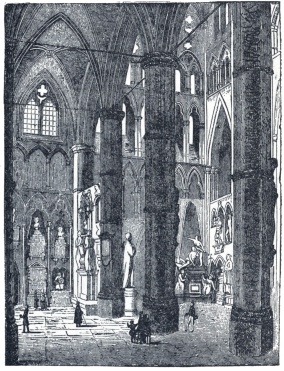
POETS’ CORNER—WESTMINSTER ABBEY.
If one wishes to thoroughly and completely appreciate the worthlessness
of human reputation, he should walk through these walls and over these
floors. While the fame of the heroes, poets and statesmen have been
carefully cared for, the nobodies buried here and hereabouts, and there
are thousands of them, have been permitted to fade out mercilessly. Sir
Toby Belch, we will say, or Sir Toby Anybody Else, who was so
circumstanced that he received the honor of being buried in the Abbey or
the grounds adjacent, lies here under a slab, on which is a long
inscription. The slab is here; but alas! where is the inscription? The
iron-nailed shoes of generations have as completely obliterated it as
though a chisel had been used for the purpose.
But not so the actually great. The slab that covers the remains of
Dickens has flowers placed upon it every day, and the inscriptions to
the memory of Shakespeare, Byron, Handel, Haydn, Macaulay, Sheridan,
Garrick, Rare Ben Johnson, and others, who made English literature, and
the innumerable warriors by land and sea who have extended English
possessions and defended England’s greatness, are kept as distinct and
as bright as the day they were erected.
One singular thing is that there are no bad men buried in the Abbey;
that is, if you may believe the marble inscriptions. Marble is a bad
material to tell lies upon, because of the limited space that can be
used. Were there more room there would be more lies, I suppose, but the
English have managed it tolerably well.
There was Warren Hastings, for instance, Governor-General of India, who
in his day was held up as a monster of cruelty, and a model of rapacity
and oppression. Even the English Parliament and the East India Company
were forced to protest against his extreme cruelty to the East Indians.
Nevertheless Hastings has a bust in the Abbey, and an inscription on it,
in which he is given every virtue under the sun. He is extolled as being
all that was merciful, just, kind, good, and wise, and if there is a
virtue that is not ascribed to him, the man who wrote it forgot it. As a
matter of curiosity I copied the epitaph, and here it is:—
SACRED TO THE MEMORY OF
THE RIGHT HONORABLE WARREN HASTINGS,
Governor-General of Bengal,
Member of His Majesty’s Most Honorable Privy Council, L. L. D., F. R. S.
Descended from the elder branch of the Ancient and Noble Family of
Huntingdon.
WARREN HASTINGS.
Selected for his eminent talents and integrity, he was appointed by
Parliament, in 1773, the first Governor-General of India, to which
high office he was thrice re-appointed by the same authority. Of a
most eventful period, he restored the affairs of the East India
Company from the deepest distress to the highest prosperity, and
rescued their possessions from a combination of the most powerful
enemies ever leagued against them. In the wisdom of his counsels
and the energy of his measures, he found unexhausted resources, and
successfully sustained a long, varied, and multiplied war with
France, Mysore, and the Mahratta States, whose power he humbled,
and concluded an honorable peace; for which and for his
distinguished services he received the thanks of the East India
Company, sanctioned by the Board of Control. The Kingdom of Bengal,
the seat of his government, he ruled with a mild and equitable
sway, preserved it from invasion, and while he secured to its
inhabitants the enjoyment of their customs, laws and religion, and
the blessings of peace, was rewarded by their affection and
gratitude; nor was he more distinguished by the highest qualities
of a statesman and a patriot, than by the exercise of every
Christian virtue. He lived for many years in dignified retirement,
beloved and revered by all who knew him, at his seat of Daylesford,
in the county of Worcester, where he died in peace, in the 86th
year of his age, August 22, in the year of our Lord 1818.
Pretty good, this, for a man who was the terror of the East, and who was
publicly branded in Parliament as the most audacious, corrupt and cruel
tyrant that ever seized anything that armed force could lay its hands
upon. But as England reaped the benefit of a portion, at least, of his
wickedness, England manufactures a record for him and permits it to
stand among its other heroes, for the admiration of future generations.

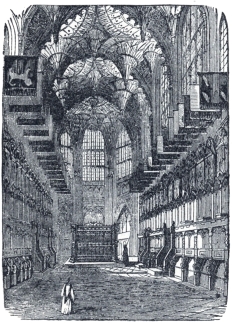
HENRY VII.'S CHAPEL—WESTMINSTER ABBEY.
I can imagine the ghost of Hastings, as he hovers over this tablet and
reads it. He must have smiled a spirit smile. However, it is probably as
correct as other history, marble or written upon paper. The inhabitants
of the other world must be amused as they read what is said of them in
this. A great many of them must feel as the horse thief did when he wept
after the speech of his counsel in his defense.
“What are you sobbing so for?” asked the counsel.
“I never knew before what a good man I am,” was the reply.
There are hundreds buried in the Abbey who have no especial claim to the
honor, that is so far as to deeds that survive the ages gone. They
enjoyed what we of to-day would term a mere local reputation, and all
that remains of them is what the marble says. The inscriptions are all
in the same strain, and are curious specimens of obituary literature.
For instance this:—
TO THE MEMORY OF
JAMES BARTLEMAN,
formerly a chorister and lay clerk of Westminster Abbey,
and Gentleman of His Majesty’s Royal Chapel.
Educated by Dr. Cooke,
He caught all the taste and science of that great master,
Which he augmented and adorned.
With the peculiar powers of his native genius,
He possessed qualities which are seldom united;
A lively enthusiasm, with an exact judgment,
And exhibited a perfect model
Of a correct style and a commanding voice;
Simple and powerful, tender and dignified;
Solemn, chaste and purely English.
His social and domestic virtues
Corresponded with these rare endowments;
Affectionate and liberal, sincere and open-hearted,
He was not less beloved by his family and friends,
Than admired by all for his pre-eminence
In his profession.
He was born 19 Septr. 1769. Died 15 April, 1821.
And was buried in this cloister,
Near his Beloved Master.
“Solemn, chaste and purely English” is very good. What could Mr.
Bartleman ask more?
EPITAPHS.
On the monument of Admiral Sir Wondesley Shovel the inscription reads:—
“He was deservedly beloved by his country, and esteemed, though
dreaded, by the enemy, who had often experienced his conduct and
courage. Being shipwrecked on the rocks of Scilly, in his voyage
from Toulon, Oct. 22, 1707, at night, in the 57th year of his age,
his fate was lamented by all, but especially by the seafaring part
of the nation, to whom he was a generous patron and a worthy
example. His body was flung on the shore, and buried with others on
the sand; but being soon after taken up, was placed under this
monument, which his royal mistress had caused to be erected to
commemorate his steady loyalty and extraordinary virtues.”
Mr. William Lawrence, who was a prebendary, gets this poetical
effusion:—
“With dilligence and trust most exemplary
Did William Lawrence serve a prebendary,
And for his paines now past before not lost
Gained this remembrance at his Master’s cost.
O read these lines again: you seldom finde
A servant faithful to a master kind.
Short hand he wrote, his flowre in prime did fade
And hasty death short hand of him hath made.
Well couth he numbers, and well measured land,
Thus doth he now that ground whereon you stand,
Wherein he lies so geometrical;
Art maketh some, but this will nature all.”
Obit Dec. 23, 1621.
Æstatus bud 29.
As a specimen of old English, this can hardly be excelled:—
Ander neath Lyeth
The Bodyes of 3 sonns
of Mr. Christopher Chapman,
Richard Christopher and
Peter Peter dyed the 11th
of September, 1672.
Richard dyed the 1th of
February, 1672, and
Christopher Chapman,
M. of Artes, dyed the 25
of March, 1675.
The next is a memorial to an authoress, who was the most popular of her
day, and whose pieces were the delight of London. To-day, she is only
remembered by book-worms and antiquaries:—
MRS. APHRA BEHN,
Dyed April 16,
A.D. 1689.
Here lies a proof that Wit can never be
Defence enough against Mortality.
This lady was the authoress of many dramatic pieces—all as dead as
their author.
The Wesley family are represented in this:—
NUTTY, SUSANNA,
URSULA, SAMUEL,
WESLEY.
1725, 1726, 1727, 1731.
Infant children of
Samuel Wesley,
Brother of John Wesley.
The British merchant was honored, as well as the British soldier:—
SACRED TO THE MEMORY OF
JONAS HANWAY,
who departed this life September 5, 1786, aged 74,
but whose name liveth, and will ever live,
whilst active Piety shall distinguish
The Christian.
Integrity and Truth shall recommend
The British Merchant.
And universal Kindness shall characterize
The Citizen of the World.
The helpless Infant natur’d thro’ his care:
The friendless Prostitute sheltered and reformed;
The hopeless Youth rescu’d from Misery and Rum,
And trained to serve and to defend his country,
Uniting in one common strain of gratitude,
Bear testimony to their Benefactors’ virtues—
This was the Friend and Father of the Poor.
RELIGIOUS SERVICES.
The wandering about among the tombs of so many illustrious dead, and the
reading of so many fulsome epitaphs—albeit I know they were not
altogether deserved—produced an impression, a feeling of solemnity,
that no other one place in all England could conjure up. It was in vain
that Tibbitts tried to make fun out of some of the quaint inscriptions.
It could not be done, and in a very short time the youth succumbed to
the influence of the mighty memory, and became a subdued and quiet
admirer of the solemn grandeur of the place.


CHAPEL OF EDWARD, THE CONFESSOR.
Three is the hour that religious services are held in the large nave.
More out of curiosity, perhaps, than anything else, we determined to
remain during the service. As we sat there looking over into the Poets’
Corner, the deep silence of the majestic building, growing more and more
profound, there came trooping through the mind constantly changing
pictures suggested by the memories awakened by the vivid recollections
of the once great in literature and art, science and warfare, who are
still alive in the hearts of all English-speaking people, although their
bodies have been lying for years beneath the massive pillars and superb
arches of Westminster.
As the eye wanders upwards along the walls, covered with tablets and
rare pieces of sculpture, and seeks to unravel the intricacies of the
fretted roof, just discernible through the dim light, the great organ
peals forth the wondrous strains of the Processional.
At that instant, as though to lend a new and greater impressiveness to
the scene, the clouds, which had been lowering all the afternoon,
suddenly breaking with a glorious burst of sunshine, that comes
streaming in through the tall, graceful windows, beautiful with their
colored designs, lights up the Abbey even to its darkest recess with a
light, soft, and mellow, which only intensifies the mystic feeling of
reverence and joy combined. And then the boy choristers, with their
fresh, innocent faces, sing in wondrous tones the Gregorian chant.
Nothing more is needed; everything is complete. You are lost in a
rapturous reverie, the mind is cleansed of all things earthly, and
wanders unchecked and unfettered through the boundless realms of purity.
One sits almost entranced; his very being filled with the wondrous power
of the place. Gradually it dawns upon him that there is a discord
somewhere, that something has occurred to mar the perfection of the
whole. For an instant he rebels against the thought, and strives to
believe that he still dreams. But the inspiration has fled. The music,
which a moment before caused the tears to fill his eyes, has lost itself
in the far-away cornices of the high columns, and in its stead there is
the dull, monotonous chanting of a priest, who is intoning the service
in a tired sort of way, as though he thought that, having done the same
thing every afternoon for forty years, it was time for him to retire
upon a pension, and enjoy the quiet of a pleasant home, where there was
no absolute necessity of going through the ritual every afternoon at
three o’clock.
HOW THE SERVICE IS DONE.
The awakening was not a pleasant one, and so we left the Abbey,
disappointed, as though we had been given the promise of something
wonderful and then been denied it. The service, no matter how beautiful
in and of itself, is not in keeping with the grandeur of the place.
There is lacking, to an American, that sense of power and majesty in it
that the massive building, glorying in its wondrous architectural
beauties, demands. The clergymen had an aimlessness that was simply
tiresome, and as they drawled out the words, it seemed as though they
did not care whether it produced an effect upon the worshippers or not.
But it did produce an effect. Not the one to be desired, perhaps, but an
effect after all, for the greater number of them quietly left the place,
and reached the open air with a sigh of relief, as if they had escaped
from some very depressing, dispiriting place.
In America religion and religious services mean something more than
form, and the ministers, no matter of what denomination, or in what sort
of a building, throw something of life and fervor into their services.
They act and talk as though they had souls to save, and that the
responsibility of the souls of their congregations were upon them. This
was not of that kind. The priests went through the service as though,
having offered the bread of life to their people, it was for them to
take it or let it alone, as they chose. Indeed, when one was a little
slow, as though he had been up the night before, the other would look at
him reproachfully, as if to say, “Look here; why don’t you hurry up and
get through with this, and let us get home. I don’t want my dinner to
spoil,” and the boys in the choir, though they sang like angels, did it,
not as if they knew or cared anything about it, but as a mere matter of
business, looking from one to another, and then upon the congregation.
Whatever the effect upon the people, their beautiful music had no more
effect upon them than as if they had been so many oysters.
These people would not do for a Western camp-meeting, or even for a
fashionable revival in an Eastern church. But they have their uses.
One room in the Abbey is devoted to the effigies in wax of seven Kings
and Queens, but few people visit it. They can see a more extensive
collection of murderers at Madam Tussaud’s for the same money, and they
go there.
The cloisters, as they are called, form a not uninteresting portion of
the Abbey, they being the former places of residence of the monks of the
establishment. In the various walks, with their quaintly carved pillars,
and moss-covered arches, are buried many distinguished personages, most
of whom belonged to the Abbey.

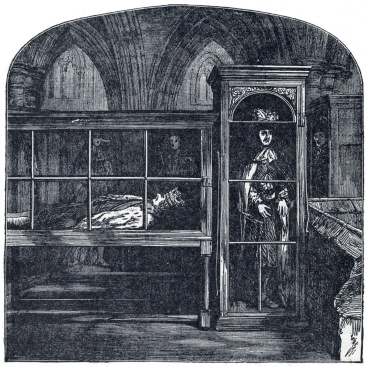
EFFIGY ROOM—WESTMINSTER ABBEY.
Another point of interest is the “Chapter House,” a circular room, of
large dimensions, which was built in 1250 by Henry III., on the site of
the earlier Chapter House belonging to the Abbey, founded by Edward the
Confessor. It was the chamber in which the abbot and monks, in the time
of the ancient monastery held their “Chapter,” or meeting for discussion
and business. The stone seats upon which the abbot and the monks sat are
still preserved.
A LITTLE HISTORY.

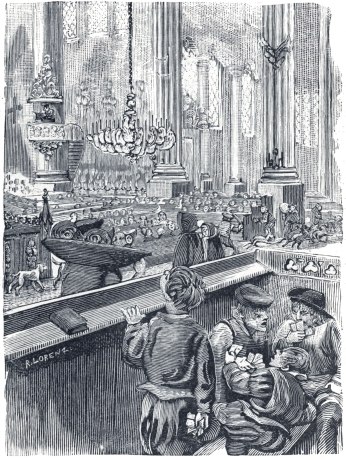
THE ABBEY IN QUEEN ANNE’S TIME.
In 1265, when the House of Commons came into existence, it first sat in
Westminster Hall with the House of Lords; but the two bodies having
parted, the Commons held its meetings in the Chapter House for nearly
three hundred years. The last Parliament known to have sat here was that
which assembled on the last day of the reign of King Henry VIII. After
that the House passed into the possession of the Crown, and from 1547,
when the House of Commons was transferred to Westminster Palace, until
1863, it was used as the depository of public records, and was very much
disfigured. In 1865 its restoration was begun, and it now presents the
same appearance it did in years gone by, save where the finger of Father
Time has been laid rather heavily upon its once fair paintings and
graceful proportions.
It does not appear that the nave and cloisters, though the last resting
places of so many eminent persons, were treated with due respect in the
reign of Queen Anne. At all events, the following occurs in the Acts of
the Dean and Chapter, under date of May 6, 1710.
“Whereas, several butchers and other persons have of late,
especially on market days, carried meat and other burdens through
the church, and that in time of Divine service, to the great
scandal and offence of all sober-minded persons; and, whereas,
divers disorderly beggars are daily walking and begging in the
Abbey and cloisters, and do fill the same with nastiness, whereby
great offense is caused to all persons going through the church and
cloisters; and, whereas many idle boys come into the cloister
daily, and there play at cards and other games, for money, and are
often heard to curse and swear, Charles Baldwin is appointed beadel
to restrain this, and to complain of offenders, if necessary, to a
justice of the peace.”
The Abbey is the especial pride of England, and well it may be. It is a
delight in and of itself, and would be were it empty. But filled, as it
is, with the enduring monuments of its glory, it possesses a double
interest. Every American visits it, and every American should, for those
who built it and those who sleep under its wonderful roof, are of the
same blood and kin. America shares in England’s glory, if not in her
shame. But then, we have some sins to answer for, and an Englishman may
not blush in the presence of his cousin across the water.
CHAPTER XIV.
SOME ACCOUNT OF AN AMERICAN SHOWMAN, WITH A LITTLE INSIGHT INTO THE SHOW BUSINESS.
RIGHT in the heart of London—if London may be said to have any
heart—is a tavern kept by an American, which is the headquarters of
American “professionals,” as showmen delight to call themselves. You can
never go there without meeting managers, nigger minstrels,
song-and-dance-men, unappreciated actors, and all sorts of people who
prefer living from hand to mouth and wearing no shirts, in this way,
than to making a fortune in any regular business. I go there frequently
from sheer loneliness, and to hear the kindly American language spoken;
and, besides, a man alone is generally in bad company, for the heart of
man is deceitful and desperately wicked. Any company that is fair to
middling is better than none at all. Even a hostler can tell you
something you don’t know. You may excel him in the philosophy of
finance, but when it comes to horses you are nowhere.
I met one circus manager who is over here, as he expressed it, to
“secure talent,” and he proved a delight. He was short and very thick,
and wore a sack coat, of rough material, and a little mastiff followed
him about constantly. His hat and necktie were something too utterly
gorgeous for description, his face was of a peculiarly puffy purple, and
his nose blazed like a comet. And he would sit and talk of his business
by the hour, keeping before him all the time a glass of British brandy
and water, which he pronounced “goodish.” You could be sure he was a
showman as far as you could see him. My first interview with him was
something like this:—
“I shall have the biggest list of genooine attractions that ever was
taken across the Atlantic, and if I don’t astonish the showmen of our
great country, as well as the people, I’m a sinner. I have got a baby
elephant, and a genooine Babulus, capchered by Stanley in the interior
of Africa, at a great loss of life, and I am after a performer sich as
the world never seen. She does an act on the trapeze that is so risky,
that sooner or later she must be killed. There ain’t any doubt about
it. I have seen her. She runs up a rope like a squirrel, and jumps from
a horizontal bar, twenty feet, catching hold of her pardner’s hands, and
then plunges down from his body head-fust, at the frightful altitood of
seventy feet, catchin’ a rope twenty feet from the ground. If the lights
are ever wrong by a half inch, or if she ever miscalculates a hair’s
breadth, she is a goner, sure.”

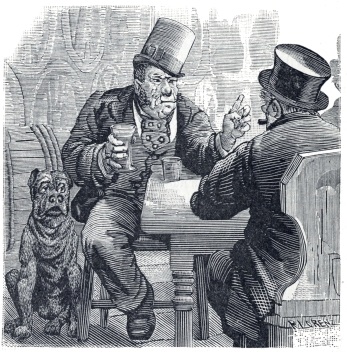
IF SHE EVER MISCALCULATES BY A HAIR’S BREADTH, SHE’S A
GONER, SURE.
And the enthusiastic old gentleman rubbed his hands in glee, as though
the death of a performer was a consummation most devoutly to be wished.
THE TRAPEZE ARTIST.
“Do people enjoy such perilous feats?”
“Enjoy em! Enjoy em! Why, bless your innocent soul, a feat ain’t
nothin'—won’t dror a cent onless it’s morally certain that the
performer will break his neck. This woman I’m after draws crowds every
night, because she must kill herself. The trick is so dangerous that
men make bets every night she will miss her lucky, and be carried out a
corpse. I’m a goin’ to have that woman, no matter what the salary is.
She does this trapeze act, and then goes on in the first part of the
minstrel entertainment after the big show. Oh, she’s got talent into
her.”
“But if the performance is so hazardous, and she should be killed, would
it not entail a heavy loss upon you?”
“Killed! Loss! Where was you born? My child, there never was a feat so
dangerous that there ain’t a thousand waitin’ to attempt it, and they’ll
do it. When Mamselle Zhoubert gits killed, as she will, I’ll hev to hold
a lev-vee to decide atwixt the dozen who will want to take her place.
I’ll select one of ’em, give her a French name—yoo can’t get on in the
perfesh with a English name—and she’ll go on and do it, and do it jist
as well. And then wat an advertisement it is! This will be about the
size of it:—
“The management begs to state that since the untimely death of
Mademoiselle Zhoubert, at Cincinnati, it was doubtful if another
lady competent to fill her place could be found. The feat was so
difficult, so dangerous, and required such arduous training and
such wonderful nerve, that it was feared that this leading
attraction of the World’s Aggregation would have to be omitted.
There was only one other such artiste in the world—Mademoiselle
Blanche, but she was engaged at the Cirque Imperial, Paris. The
management knows no such word as fail, and a commissioner was
dispatched at once to Paris, with unlimited powers to treat for
this stellar attraction, this acme of talent. At an expense which
would bankrupt any other establishment, conducted by narrow-minded
managers who advertise more and perform less, she was secured and
is now with us. Mademoiselle Blanche not only performs the original
feat of the sincerely mourned Zhoubert, but adds to it one so much
more dangerous as to make hers seem insignificant and commonplace.
Mademoiselle Blanche will appear at each and every performance, all
reports to the contrary notwithstanding.”
“That’ll fetch ’em.”
“Dangerous feats! why, I run a whole season on a lion that had once
eaten a keeper. The people come in crowds, expecting every day to see
him make a breakfast of his trainer.”
“Was he actually dangerous?”

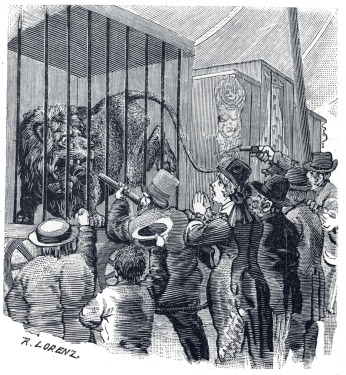
THE DEATH OF THE TRAINER.
THE TRAINER’S WIDOW.
“Dangerous! He et another trainer, and then I lost him. His widder was
actilly in love with her husband, and she swore the animal shood be
killed, and the people sided with her, and as the broot was gettin’ old,
and the killin’ made a sensation, I did it. But I made all there was out
of it. I insisted that the husband should have a gorgeous funeral. The
woman kicked at the idea of a funeral, for she sed there was nothing to
berry, as the lion had eaten her husband. But ain’t the dear departed
inside the lion? If we berry the lion, don’t we berry the dear deceast?
Cert. And we hed it, and it was gorgeous. We hed a percession, with all
our wagons in it—the regelar street parade—only all the riders hed
black scarfs on ’em, and the wagons and hosses and elephants and sich
was draped in black (mourning goods is cheap,), and the band played a
dead

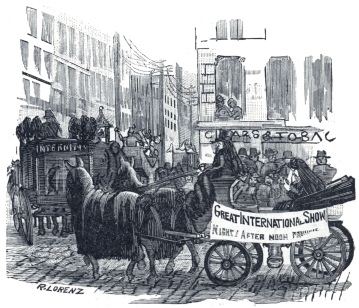
THE GORGEOUS FUNERAL PROCESSION.
march. The widder was in an open carriage, in full mournin’ with a white
handkerchief, with a black border, to her eyes lookin’ on his minatoor.
There wasn’t no minatoor, but she held a case jist the same. That nite
the canvass coodent hold the people, and we run on that two weeks to
splendid biz. In two weeks, the woman got over her grief and went into
the lion trainin’ line herself, ez ‘Senorita Aguardiente, the Lion
Queen.’ I give her some old lions to practis on, and in less than a
month she could do jest as well as the old man. She was a good woman,
too. She rid in the grand entree, and rid in the ‘Halt in the Desert,’
did the bar’l act, rid a good pad act, and is now practisin’ bare-back.
She juggles tollable, and does a society sketch song and dance in a
side-show. When I git talent I pay it and keep it. My treasurer changes
the names of my people every season, so as to have always fresh
attractions. Oh, I know my biz. But that wuzn’t all I made out uv that
afflictin’ event. I went and hed a moniment made and sot up over his
grave. This is the vig., inscription and all:

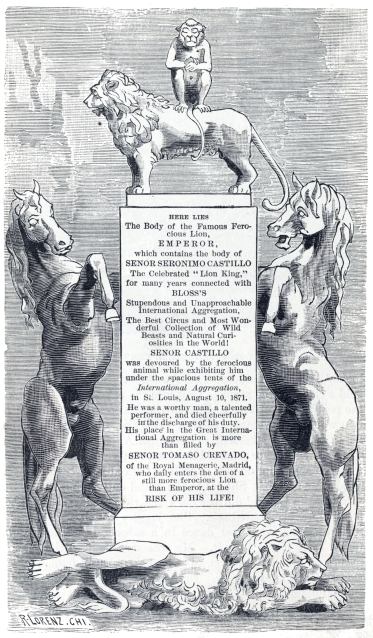
And on the back uv the monument, I had this:—
“His sorrowing widow still does her unapproachable act of
Equitation and Prestidigitation, in the Great International
Aggregation, with which her devoured husband was so long connected,
and may be seen at each and every exhibition.
“While mourning the loss of our friend, the Great Aggregation
travels as usual, and exhibits without regard to weather, twice
each day. Lion Kings may die, but the Great International
Aggregation is immortal.”
“The widder insisted on hevin a Scriptural quotashen on the moniment,
and it took me a good while lookin up suthin approprit. I know more
about circus than I do about Bible, but when I set out to do a thing I
do it. Ez the two hed lived together and died together, ez the lion et
him for cert, it struck me that this wuz about the racket, and I put it
on the base:—
They were lovely and pleasant in their lives, and in death they were not
divided.—2d Sam. 1:23.
“I had the monument did in galvanized iron, and it will stand there for
forty years, and every visitor to that cemetery will know suthin about
the Great International. I wrote it modest, for I didn’t want it to look
too much like an advertisement, though, of course, I wanted to get all I
could out of the afflictin event.”
Ordering another brandy cold, the pleasant old gentleman murmured more
reminiscences. He had always had a penchant for wild Indian troupes,
and, since the Zulu war, for Zulus, and he flowed on about them:—
“Foggarty,” said he, “was the best Zulu I ever had, and I have had a
hundred of ’em. He laid over the lot. He entered into the spirit of the
thing, and did the bizniss conscientiously. When he came outside with a
iron girdle about him, and a pizen spear, he lept in dead earnest, he
did. He made it mighty lively for the keeper to hold him, and he howled
so like a savage that he skeered the wimin and gals to a degree that
they couldn’t help goin’ in to see him. Foggarty was a great man, and
hed talent. He was the best Modoc Chief I ever had. O’Finnegan cood lay
over him on the green corn dance, and possibly drest the best, but
Foggarty’s war-whoop was suthin’ sublime. We hed him one season as
Scar-Faced Charley, and the next as Shack-Nasty Jim, and he did himself
proud in
FOGGARTY’S MISFORTUNE.
both. And then, there wan’t no dam nonsense about him. He wood peel out
of his Injun clothes, and go and clean the lamps, and help pack, or do
anything. Before the doors opened, he’d do canvasman, and howl at the
door, and at the door he’d play the bass drum or grind the organ with
cheerfulness. In the street parade of the big show, he was, for five
years, our Washington, The Father of his Country, standing on a
revolvin’ pedestal. Then, jist as soon as he got his dinner, he’d help
get up the canvas, and then skin into the Zulu rig, and after that, he’d
peddle lemonade, or do anything to make himself yooseful. But a woman
spiled him. Wimin spile a great many good men. We hed a woman, Biddy
McCarty, wich was doin’ the Circassian lady, with hair to her heels, you
know ’em, and sometimes the bearded lady. Likewise, she was a Chinese
knife thrower, and Foggarty yoosed to do the Chinaman she throwed her
knives at. Well, Foggarty, seein’ that she was an Irish gal, and he an
Irishman, coodent no more help fallin’ in love with her than fire kin
help burnin’ tow. He got it into his head that ef he could marry a gal
with so much talent, he might, some day, have a side-show of his own.
And then, as time rolled on, and they hed kids, he cood train ’em up to
the family business, and do things cheap. He wanted to be a Bearded
family, or a Zulu family, or a Jap family, or suthin, and so he married
Biddy, and they went double. Biddy hed a will of her own, and besides
she would git drunk. Rum spiles more talent in the perfesh than anything
else. She had a trick of beating Foggarty, and she led him the devil’s
own life. It was at Leroy, New York. She had bin on as the Bearded
Woman, and as the Circassian Lady, and hed sold all the photographs she
cood, and hed changed to go on as the Chinese Knife Thrower, from Hang
Fo. Foggarty hed changed to a Chinaman—Lu Fu, the Wizard—when I
diskivered that Biddy hed bin drinkin'. I warned Foggarty to look out,
for she was ugly, but he laughed, and said she wouldn’t hurt him, and
went on. You hev seen that act. Foggarty stands agin a board with his
arms spread out, and the China woman throws knives all around him. She
puts ’em between his fingers, and clost to his neck and between his
legs. Biddy could throw a knife within a hair of where she wanted it to
go. She hed talent, as I sed. But that day she was ugly. She and
Foggarty hed hed it hot, and when she came in twistin’ her queue, I
knowd suthin was goin’ to happen. She throwd six or eight knives all
right, and then one went, whiz! It took off Foggarty’s second finger on
his right hand, as clean as a butcher’s cleaver could do it. And Biddy
fired the rest of the knives at him and rushed out, yellin', ‘Be gorra,
Mike Foggarty, and ye’ll bate me over the head with a tent pin agin,
will ye? Ye’ll hev one finger less to do it wid, onyhow.’ Most men would
hev abandoned the perfesh with that finger off, but while it was bein’
dressed Mike whispered to me, ‘Put it on the bills that the Zulu Chief
lost the finger by a English saber, at the battle of—where was the
battle?’ I hev Foggarty yet, but Biddy broke his heart and he aint as
good as he was. She run away with the cannibal from the Friendly
Islands, who cood do the tight-rope and fire-eatin', and they are doin’
hall shows and the variety business together. He taught her to do a song
and dance, as well as fire-eatin', and she is now ‘M’lle Lulu Delmayne.’
They do society sketches, too. Foggarty is jest as willin’ as ever, but
the blow was too much for him. He goes with us next season as a Zulu,
and also lecters the sacred Burmese cattle, and has a part in the wild
perarie scene, and fires the calliope. He can’t do Washington any more,
for he has rheumatiz, and can’t stand an hour with his right hand in a
military coat. He’s practisin’ to be a lion tamer, but I don’t bleeve
it’ll do. He may git to play the snake, but that is about as high as
he’ll ever git in the perfesh.”

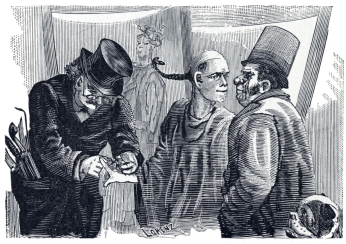
The next day the old gentleman departed for the continent.
CHAPTER XV.
RICHMOND.
FOUR weeks in London! Twenty-eight days of incessant sight-seeing. A
series of continual surprises day after day, from early in the morning
until late at night; a constant succession of new things of interest
crowded and forced upon one, until at length the senses weary, the mind
refuses to take in any more, and imperatively cries out for a change,
for rest. The body is exhausted. The dull, dense atmosphere is
enervating. A night’s sleep gives no refreshment. One rises in the
morning by sheer force of will power, with a feeling that it would be a
delight, pure and simple, to go back to bed and sleep five or six hours
longer, and when he does finally dress and go out on the street, he has
no more ambition, nor inclination to do anything, or go anywhere, or see
anything, than as if there were nothing to do, nowhere to go, nor
anything to see. But that is what he is here for, and from force of
habit he goes on the everlasting treadmill of sight-seeing, until the
very name of London is odious, and its never-ending throng of people,
hurrying along in the pursuit of pleasure or business, that, at first,
was such a novel and interesting study, becomes distasteful to a degree,
and he wishes he were home again or in some vast wilderness,
or—anywhere, away from the narrow, crowded streets of high wall, and
old-fashioned buildings, that stifle all his energies and tire his very
nature.
So it seemed—so it really was—after four weeks’ stay in London, when
one forenoon a trip down to Richmond, twelve miles away, was suggested.
The suggestion was acted upon with alacrity, and half-an-hour’s ride
produced a change such as one sees in the transformation scenes of a
pantomime. Vanished the dull, heavy air; gone all the queer old
buildings, with their still queerer old people; hushed the noise and
bustle of the streets, with their never-ceasing turmoil of struggling
humanity and ever-rolling ’ansoms, and instead a bright blue sky with a
glorious flood of sunlight, its fierceness tempered by a gentle breeze,
cool and delicious, that was breathing through the grand old oaks, and
stirred with gentle ripple the placid bosom of the Thames, which wanders
like a ribbon of silver through the wonderful meadows and dales of the
beautiful country that makes Richmond seem like a paradise.
The first feeling was one of relief—that the terrors of London had been
left far behind; and there was light and air and happiness again. Then
this gave way to exultation. The pure air intoxicated, the green trees,
the velvety turf, the warbling of the birds, after four long, dreary
weeks in London, caused the heart to throb with new life, the blood to
course through the veins with new strength, and there came an almost
irresistible desire to throw up one’s hands and shout for very gladness.
It was almost too good to be real, and once in a while one really
stopped to think whether or not he would suddenly awaken and find
himself in dingy, smoky London.
But no. It was all real. The pure air was there, the sunlight, the
breeze, the green turf, the magnificent trees, centuries old. All, all
were there, and the day was to be one of unalloyed pleasure and
happiness. God made the country—man made the town.
In all truth Richmond is a most charming place. Only twelve miles from
the metropolis, and in reality one of its many suburbs, it nestles among
the hills, and looks off upon a broad expanse of field and meadow and
forest, as though there were no such place as London in existence. It is
not a commercial city, although of course it has its quota of shops. It
is a residence city—or, as they call it, town—for, although it has a
population of one hundred thousand, there is no cathedral, so it cannot
aspire to the dignity of being a city. The town is made up in great part
of families whose members do business “in the city,” and they live in
quiet elegance in beautiful homes. That is the ideal suburban existence.
THE STAR AND GARTER.
But aside from the quaint beauty of the town itself, its chiefest
perfection is in its environs. A few minutes’ walk from the heart of
the town is that famous hostelry, known the world over, “The Star and
Garter,” where, in olden times, royalty disported itself under its
moss-covered roof, in grand entertainments lasting for days at a time.
For generations it was the resort of nobles, and then, when they tired
of it, the people, imitating them as far as they were able, took it up
and basked in the mellow light of its former grandeur, which has long
since departed, it having become unfashionable.
Gay old times these noble roysterers used to have in this beautiful
spot. The wines of the South, actually cobwebbed and dusty, flowed like
water, and the most delicious food, brought from the forests and seas of
all climes, graced the board. It was no trouble to them. They had no
occasion to count expense as the people who go there now have to. For
they had their tenants working for them at home, and they had their
armies and fleets bringing them wealth from everywhere, and they could
afford to eat, drink and be merry, and they did it all.
To be a King in those days was a very comfortable thing, except when
some sturdy commoner, like Cromwell, tired of all this, and cut off a
head. Opposed as I am to royalty and nobility and all that sort of
thing, had I lived in those days I should very much liked to have been
even a Duke. It wasn’t a bad situation, at all.
It is no wonder that the Star and Garter was a great favorite, and is
yet in its way, for it is most beautifully situated. Standing in its
broad verandas there is a rural panorama spread out that is simply
superb. Near at hand is the Park, filled with gnarled old trees, under
whose branches hundreds of years ago haughty ladies and imperious lords
indulged in courtly pleasures, or engaged in intrigues where the nobles
amused themselves in hunting the wild deer that ranged across its
commons; where the flower of the youth of the country met in fierce
tournaments, with all the pride and pomp of the time. Just below the
cliff is the Thames, placid and serene, that winds in and out the wooded
lands in graceful curves, while beyond, rising not boldly and grandly,
but none the less beautiful, are green hills, dotted here and there with
clumps of beautiful oaks and pines; dales and valleys that give us a
view miles in extent. Over all this picture, to which no pen can do
justice, is that marvelous atmospheric effect that can only be found in
an English woodland scene. Not a mist, and yet a delicate haze, soft and
subdued, that tones down the broad effects and gives the whole a
perfection that is enchanting. One can stand, as before a magnificent
painting, gazing for hours upon the scene and find new features every
instant.
And then the long walk through the Park, itself a marvel of the
picturesque. Along winding paths, over rustic hedges, resting here under
the cooling shade of a huge chestnut, whose branches cover a vast extent
of ground, stopping anon to admire the graceful deer that gaze timidly
and yet curiously at the passer-by, as though wondering why he should
trespass upon their domain. For a whole hour there was a continual
revelation of natural beauties, and then suddenly the old town of
Kingston was entered.
Here the streets were narrow, the houses low and old-fashioned, and the
people quiet-going English, who have lived in the same place where their
fathers lived before them, and their’s before them.
DOWN THE RIVER.
Passing the cattle market, which is about the only live business of
Kingston, a large square stone, surrounded by an iron railing, attracts
attention. Examination shows it to be the identical stone upon which sat
the ancient Saxon Kings when they were crowned. There was nothing
particularly peculiar about the stone, but of course it would not have
done to have gone by without at least casting a glance at the relic of
so long ago. Possibly the proper thing to do was to uncover and drop a
tear as the memories of the glorious scenes thereon enacted went
trooping through the mind. Possibly it would have been the thing to sit
on the queer old stone and imagine the space around filled with warlike
chiefs and outlandishly arrayed ladies of the Court, and indulge in a
day dream of the times when such things occurred. Possibly this may have
been the thing to do, but it wasn’t done, and for good reasons, too.
Even if one had had the inclination to act in such an orthodox,
sight-seeing manner, which is much doubted, there was a high iron
railing, with sharp pointed iron palings, that would have effectually
kept the greatest enthusiast outside the sacred enclosure.
Passing on through the town, the long walk begins to tell upon one’s
powers of endurance, so a rest is taken at “Bond’s.” Who has not heard
of Bond’s, the great resort of boating parties on the Thames? It is
noted all over England, and its fame has spread even to America. A
pleasant Summer garden, with trees and plants and flowers, gravelly
walks and rustic arbors, on a high terrace, at the bottom of which the
limpid stream glides smoothly along, while beyond, as far as the eye can
reach, is the beautiful scenery that seems almost like fairyland. What
better place can be imagined for a lunch—a biscuit and a bit of cheese,
washed down with a pint of refreshing “shandygaff.” One could drink the
bad beer of the country here. It is truly delightful. And then a quiet
smoke, the light clouds curling upward in an atmosphere as pure and
clear as the air of life; while all that is poetic in one’s nature is
appealed to by the beauty of the scene, the sense of delicious comfort,
and the faint music of distant boating parties, who, singing as they
row, make a harmony that intensifies the pleasure of the hour, and makes
one almost wish that this most perfect day might go on forever.
But still a greater treat is in store. A ride back to Richmond on the
water, rowed by a brawny waterman, who does, as a matter of business,
exactly the same thing that so many of the “swells,” who are seen
skimming past in their graceful single sculls, are doing for pleasure.
“Why,” said I to the waterman, “do you make us pay for doing what those
men do for nothing?”
“Ah!” was his reply, “ ’spose they ’ad to!”
Philosophic waterman! Whether any given exercise is pleasure or pain
depends very much whether one “has to.” The London jarvey drives a four
in hand for one pound a week, and Lord Tom Noddy does precisely the same
thing for the fun of it. One has to, and the other hasn’t, and there’s
the difference.
By this time the river is full of pleasure crafts. Here comes an
eight-oared shell, whizzing along at a rattling pace, the little
cockswain urging the crew on to still greater efforts as he skilfully
guides the long, slender boat through the multitude of pleasure barges
and skiffs. Over there is a trim craft gliding along lazily, a pair of
brawny arms just moving the oars, while a pair of honest, manly eyes are
speaking in unmistakable language to a fair-haired girl who is reclining
in the stern, idly tossing the tassels to the rudder strings, as if she
didn’t care about what was being said, even though the swift glances
from under her broad brimmed hat, and the mantling crimson on her cheek,
tell an entirely different tale.
A PLEASANT PLACE TO LIVE.
Just beyond is a boat, large and roomy, in which five young ladies are
enjoying the pleasure of the hour. While four of them pull strong and
gracefully, the fifth steers the rapidly moving lapstreak with a skill
and precision that shows a master hand. These English girls may be
laughed at by their more delicate American cousins, but in the matter
of health and strength, they are the ones to laugh. They believe in
plenty of exercise in the open air, and they take it; as, for example,
these girls, beautiful as a picture, who row as perfectly and in as good
“form” as though they had always been on the water. See the perfection
of their development, the ruddy glow of health in their cheeks, the
merry sparkle of the eye, the gladness in their hearty laugh, and then
talk about the usefulness of outdoor exercise.
Every stroke of the oar as the boat speeds merrily down the river,
reveals a new picture, each one as perfect in its completeness as that
which preceded it.
On the left bank are the country seats of gentlemen of means. They are
for the most part odd looking old places, with their angular towers and
turrets, and bowed windows long and narrow. The lawns sloping gradually
from the house down to the water’s edge are perfectly smooth, and
ornamented with clustering chestnuts and laburnums, elms and lindens,
and the green foliaged birch, while the green hedges, wonderfully well
kept, add to the general effect of the scene. The river winds in and out
among all the charming places, for seven miles, and the town of Richmond
is seen far off in the distance.
As the river makes a sudden bend there appears still another picture,
the masterpiece of the series that has delighted the senses for the last
two hours. There on the bluff stands the picturesque “Star and Garter.”
with its background of foliage. Just below is a portion of an old stone
bridge across the Thames, while to the left the beautiful landscape
stretches away to the distant hills, whose summits are lost in the
purple haze of the closing day. It is a sight never to be forgotten; one
that will linger ever upon the memory as a revelation of the absolutely
beautiful in Nature.
CHAPTER XVI.
FROM LONDON TO PARIS.
GOOD-BYE for the present to London. Good-bye to its smoke, its fogs, its
predatory hackmen, its bad water, its worse beer, its still worse gin.
Good-bye to its eternal rains, its never-ending badly dressed men and
worse dressed women. Good-bye to very bad bread. Good-bye to the
greatest collection of shams and realities, goodness and cruelty in the
world. Seven weeks in London and its environs is all that an American
can endure, who ever expects to get back to his own country. Were fate
to have a spite at him, and condemn him to make his residence there
forever, he would settle down as a man does in a penitentiary and do the
best he could, but for one who has a hope of returning to a country that
was made after the Maker had had some experience in making countries, a
longer stay in London than seven weeks would be too much. Seven weeks of
biliousness and depression—seven weeks of exasperation and discomfort,
seven weeks of extortion and tipping, seven weeks in an English suit of
clothes, is all that an average American can endure.
And so good-bye to London till we renew our strength and can tackle it
again. It is not exhausted, nor could it be in a year. It is a brute
among cities, but it is a mastodon. It is a very large and variegated
animal.
THE LANDLADY’S OBJECTION TO PARIS.
To the south lies France—La Belle France—and thither we go. Our
landlady would hold us if she could, and gives expression to many
reasons why we should stay in London: It is very warm in Paris; it is
very disagreeable crossing the channel; Paris is unhealthy. At this time
of the year Paris is crowded, and it is probable that we will not be
able to get apartments such as would be suitable. It is not the season
in Paris, and we had better go there later, and so on and so forth. You
see the season in London is waning, and the good lady will have
difficulty in filling her rooms. It is delicately hinted that if a
slight deduction in rent (we have been paying three prices) would be an
object, etc. But it all avails nothing. We should go to Paris if we
should be compelled to sleep under a bridge and eat in a market. It is
not so much to get to Paris as it is to get out of London, and raise our
spirits to something like their normal condition. And so, when the good
woman finds there is no holding us, she makes out our bill vindictively,
racking her imagination to find items to insert, and weeping, no doubt,
after our departure, over items that she might have inserted, but, in
the hurry, forgot. The cabman, knowing by the station he was driving us
to that we were going, managed to charge an extra shilling, and at the
lunch counter at the station we paid an extra penny for the everlasting
ham sandwich, which was to be the last. And when the last tip was paid,
and the last extortion submitted to, we were finally locked in our
villainous compartment, and were off. London, or the fog that covered
it, faded from our sight, we saw the sun, and were scurrying through the
green fields and the real delights of rural England.
From Victoria Station to New Haven is not the most interesting trip that
can be imagined, although there are picturesque towns, waving fields of
grass, with an occasional bit of woods, that relieve the journey of some
of its unpleasant features, and make it rather enjoyable. But by the
time one has gone through miles and miles of such scenery, the towns
become monotonous, each succeeding field of grain waves just as the one
before it did, the woods, miniature forests, are just alike, and,
leaning back in the corner of the compartment, the time is spent in
dozing until eleven o’clock, when the train rushes into the station at
New Haven, and we struggle through the dimly lighted passages to the
dock, where lies the steamer that is to take us across that bugbear of
all tourists, the English Channel.
And then we have the satisfaction of learning that the tide is not in,
and the steamer will not leave for two hours and a half. It is a dark,
windy night, and there is no way to spend the time save by pacing up
and down the narrow confines of the deck, watching the enormous cranes
loading huge packages of merchandize into the vessel’s hold; or taking a
stroll along the dock, regardless of the momentary danger of stumbling
over an unseen cable and pitching headlong into the water.
There is one other way of passing the time. Whenever a tourist can find
nothing else to do, he eats. There is in the station at New Haven the
inevitable lunch counter, with the orthodox ham sandwich and bitter
beer. To this everybody was attracted as by a magnet. There is no
escaping it. No body was hungry; but it seems to be a law of Nature that
you must eat ham sandwiches while you wait at railroad stations. And in
obedience to this law, a cart-load of the sandwiches were devoured and
paid for.
THE LONG WAIT.
The New Haven sandwich is very like its London brother, only it is a
trifle thicker. The cutter is not as expert as the London professional,
but he makes it just as indigestible. It is a trifle worse, because it
is a trifle larger.
But time goes on, no matter how slowly it seems to move, and the tide
comes in, although its rise cannot be seen, and so, just before one
o’clock the warning whistle was given, the passengers took their places,
the great wheels began to revolve, and we slowly steamed out past the
breakwater into the channel.
The necessity for making the boat’s landing so far away from the deep
water cannot be understood. But so it is. Instead of running the track
down to the dock and establishing the station there, where there would
be no occasion to wait for the tide, the steamer goes up an arm of the
sea about an eighth of a mile, and has to stay there until the water is
deep enough to allow the passage to be made.
Once out upon the channel, the fresh breeze blows away all the wicked
thoughts the two hours’ detention had engendered, and as the moon breaks
through the clouds, dimming the fast disappearing lights on shore, we
give ourselves up to pleasant reverie. There is the memory of all that
has occurred during an exceedingly busy seven weeks in London, and the
anticipation of experiences new and strange that are to fill in the next
two or three months. And as we sit on deck smoking and dreaming, until,
our last cigar having gone out, and the chill air made us shiver, we go
below only to find fresh cause for growling at the English, and things
English.
Instead of commodious, airy staterooms in which we can go regularly to
bed and enjoy a good night’s rest, there is nothing but a series of
bunks, upholstered in a cheap red plush, on which the weary traveler may
stretch himself, and, putting a blanket over him, get such rest as he
can from such scanty accommodations. And this, too, for the first-class
passenger.
At four o’clock every one was turned out, for Dieppe was in sight. Such
a sorry looking lot of passengers I never saw. Most of them had caught a
severe cold, and all of them looked uncomfortable and cross, as though
they really had not enjoyed the luxurious quarters furnished by the
enterprising manager of that line.
The view from the steamer’s deck was beautiful. The sun, about half an
hour high, made the water sparkle as the light off-shore breeze rippled
its surface. The channel, which had behaved wonderfully well, was dotted
with fishing smacks from Dieppe, while here and there a steamer,
trailing a long cloud of smoke behind, sailed along utterly indifferent
to the smaller craft that had to tack with each phase of the
ever-varying wind. Just ahead of us, half hidden by chalky cliffs, could
be seen a part of the town, while to the right, huge white cliffs arose
and stretched away almost as far as the eye could reach, the straight
white sides rising abruptly from the water, reflecting the rays of the
sun, and shining with dazzling whiteness. On the left, high up on the
hills, were stately mansions, pretty villas, cool looking parks and
pleasant drives. It was indeed a beautiful sight, and we were gazing on
it with rapture when a bell sounded, the paddle wheel stopped revolving,
and we drifted slowly on.

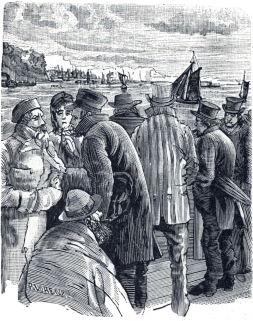
“The tide does not serve, and we will have to cruise about here for two
or three hours.”
So said one of the seamen when asked why the steamer had been stopped.
THE CUSTOM HOUSE.
It was pleasant. We enjoyed it. We fairly reveled in it.
We were hungry, it’s true, but what was hunger to the delight of waiting
three hours in an abominable steamer? We were cold and tired. But what
of that? We could gaze on white cliffs and talk pleasant things to each
other for three hours!
When the tide did serve, and we were landed, which happened about six
o’clock Sunday morning, we went through the Custom House, our
countenances expressing such Christian resignation as must have
indicated our character to the officials, for they never opened our
baggage at all. They simply said: “Avez vous tabac ou liquers?” (observe
how well we are getting on in French), and as we murmured “No,” aloud,
and to ourselves, “but we wish we had,” they waved us on, and we were
all right.

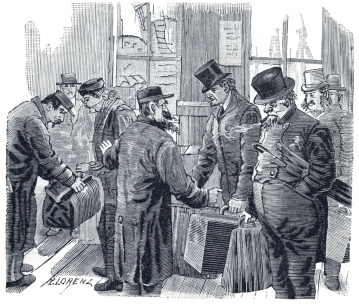
HAVE YOU TOBACCO OR SPIRITS?
Adjoining the Custom House is a coffee room, and we entered. The repast
spread out for us was just a trifle the worst that was ever seen. It was
worse than anything in London, and more than that cannot be said.
I suppose it is all right, and for the best. I suppose that taking us
out of London at six o’clock P.M., and waiting two and a half hours in
New Haven for the tide, and two hours in Dieppe harbor also, for the
tide, is unavoidable. But if I ever get a chance I shall ask the manager
of the line these questions:
1. Do you know the hour at which the tide comes in at New Haven?
2. Do you know the hour the tide serves to enter Dieppe?
3. If so, why not give us the five and a half hours that were consumed
in useless waiting at New Haven and Dieppe, in London?
4. Has your company any interest in the ham sandwich and beer counter in
New Haven? and is this delay in that most uninteresting place for the
purpose of compelling the waiting passengers to leave a few more
shillings in England?
And I shall demand specific answers to these queries. The taste of the
New Haven sandwiches is yet in my mouth.
Dieppe is a pleasant little city of perhaps twenty thousand population,
devoted to the carving of ivory, fishing, and swindling tourists, the
latter pursuit being evidently the most prosperous. The fisher people
are a picturesque lot as to costume, and are hardy withal, men, women
and children. They are bold sailors, and what they do not know about
water and its contents is not worth knowing.
Bad as the English trains are, in France, where there is the same
system, it was even worse, for we were a little shaky in our French.
However, we put on a cheerful countenance, and said “Oui” to
everything, and made believe we knew all about it, and let the guard put
us where he pleased, and were soon humming along through the outskirts
of Dieppe. We were just beginning to enjoy the prospect of rural
scenery, when, without a note of warning, we plunged into a tunnel,
which seemed to last forever, though it was only a mile long.
Emerging from this, it was seen that an immense mountain had been
pierced, and we were at once in the fertile valleys of picturesque
Normandy. As the train hurried along there was a constant succession of
pictures that would drive a poet or painter into raptures.
NORMANDY.
The broad valleys, the hills and dales, were intersected by smooth white
roads that wound around side hills, through forests and then far away
over a long, level stretch, through queer little towns, the existence of
which was never dreamed of by the outside world. All along these
well-kept wagonways were lined on either side by closely trimmed hedges,
shaded by tall and stately Lombardy poplars, that stood grim and erect
as though they were the guardians of the country.
Here and there between the quaint little villages, with their one main
street running their entire length, were the high, narrow houses of the
peasants, with thatched roofs and queer little windows. Around them,
neatly piled, were bundles of fagots, carefully done up and stored away
for winter use. They are a frugal people, these Normans, and waste
absolutely nothing.
THE PEOPLE.
Although it is Sunday morning, and we are sad because circumstances will
not allow us to attend divine worship, it seems to make no difference
with the people here, for in every field are seen women, with their high
peaked bonnets, busily engaged in raking fragrant hay into huge piles,
which the men, arrayed in the traditional blue blouse and overalls, are
loading upon wagons for carriage to the barns.

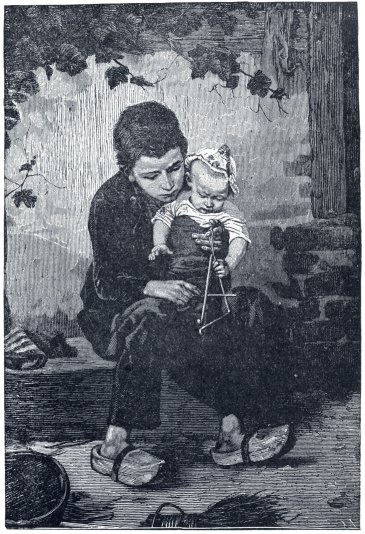
FISHER BOY AND CHILD—DIEPPE.
These men and women are well built, sturdy people, who have thrived
well upon the pure air that comes down from the mountains above. In the
olden time the men were noted for their stature and strength, and
furnished the French army with its best troops; and they are to-day fine
specimens of physical manhood.
I don’t know why it is, but there is something irresistibly fascinating
in an old castle, or the ruins of what once was a great stronghold.
After passing Malaunay and getting well out into the country, we came to
a series of hills stretching way back from the railroad. There was a
dense forest near the summit of the highest part, upon the top of which,
half hidden by the trees, was part of a castle, a bit of wall and a huge
round tower, all that remained of what was, in the early history of the
country, a castle that was utterly impregnable. As the train wound round
the base of the hill, a better view of it was obtained, and then came
the longing to plunge through the forest, clamber up the steep hillside
and wander through the old ruins, hunting for trap-doors and deep, dark
dungeons, where noble knights had been confined for years and years,
while fair ladies pined away and died because they came not back to
them. This pleasant reverie might have gone on indefinitely, even after
the romantic spot had been left far behind, had not the other passengers
in the compartment begun preparing to alight at the next station, Rouen.
We determined to stop over one train at Rouen, to see not only a French
city, but the old statue of the French heroine, Joan of Arc, who was
there burned at the stake, and the famous cathedral therein. Tibbitts,
Lemuel, was of the party, and a Professor in a western college likewise.
The Professor was calmly enthusiastic, and Tibbitts was unutterably
miserable. He could not speak a word of French, and it puzzled him to
even order a drink. And then the wine! He did not like wine, and French
brandy was not to his taste. He managed to make them understand,
however, what he wanted, and managed to get it a minute after he landed
from the cars.
It was Sunday, but the shops were all open, and newsboys were crying
their papers upon the streets. Their announcements were very long, and
Tibbitts stood and heard one of them clear through.
THE PROFESSOR’S ECSTACY.
“Listen to the little villain,” he exclaimed. “I don’t believe a d—d
word of it.” And Mr. Tibbitts preached a short sermon anent the
exaggerations common to newsboys, recounting the number of times he had
been induced by their false representation to purchase papers in
America. He considered himself too old to be taken in by a French
newsboy. “Newsboys are the same in Rouen as in Oshkosh,” he said.
After a light lunch in an arbor in a delicious garden back of a café, we
started to see Rouen, its cathedral and the statue of Joan, and what
else was to be seen. We urged Tibbitts to accompany us. He concluded to
do it, though he protested it was far more pleasant to sit in that
arbor, even though it was beastly wine he was drinking instead of the
delicious whisky of Oshkosh, than it was tramping around in search of
antiquities.
We came to a narrow street, one of the kind only to be seen in French
cities. The entire space from wall to wall could not have been twelve
feet, and on either hand were curious houses, seven stories high,
entered by dark, narrow tunnels rather than passages, but with flowers
at every window, clear to the queer, quaint top, which was continued
after it had reached what should have been its summit. The professor
stopped before one of these dark passages, and observed a parcel of illy
dressed but marvelously clean children—there are no dirty children in
France—playing some game.
“It is wonderful!” said the Professor, in an ecstacy; “here are we, of
the new West, standing on ground in a street through which, may be, the
soldiers of old France marched. Here are we within sight of the place
where Joan of Arc was burned, on ground pressed by the feet of
Charlemagne. In this house, perchance, were born heroes; within these
walls for hundreds of years have been born children who have grown to
manhood, and died. These children, playing in this gutter, were born in
this historic city, and——”
“And they all speak French,” interrupted Tibbitts, “which I can’t, but,
thank Heaven, I can lay all over ’em in English. Look here, Professor,
don’t give us any more rot about this being old. We are just as old in
Oshkosh as they are in Rouen. When the old Norman warriors were cruising
about
TIBBITTS’ SERMON.
loaded down with pot-metal, killing each other, the Indians of America
were doing the same thing among themselves, only they were clothed more
sensibly. A breech clout was a thundering sight more comfortable in the
summer than steel armor, and I don’t know that killing a man with a
lance was any more deserving of adoration than killing one with a bow
and arrow. The point to it all is killing the man. Antiquity!
“What do you know about it? Here is a lot of stone that has been piled
up a thousand years or more. How do you know but what the Indians are
older than the Gauls? I hold that they are. The Gauls built a cathedral
that is standing yet. I defy you to go anywhere in Wisconsin and find
such a cathedral standing. What does that prove? Why! that the ancient
Indians built their cathedrals so much farther back than the Gauls that
they have all disappeared. Nothing can resist the iron tooth of time.
Now I think that this cathedral is rather modern than otherwise. [By
this time we were in front of the cathedral.] It is tolerably ancient,
but if you want to visit a really old country, go to Wisconsin. That is
so old that everything of this kind has disappeared entirely.”

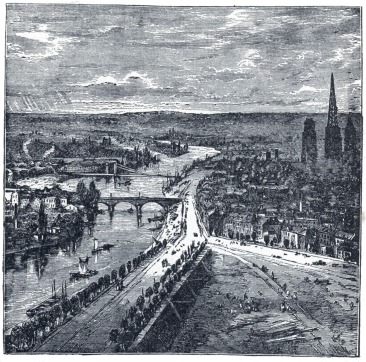
We left the cathedral, and after infinite trouble, owing to the fact
that the average citizen of Rouen is sadly deficient in English, found
the statue of Joan of Arc. The Professor stood before it in an ecstatic
mood; Tibbitts, profoundly disgusted.

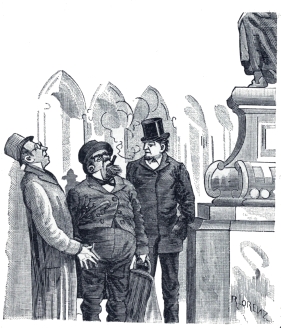
THE PROFESSOR STOOD BEFORE IT IN AN ECSTATIC MOOD.
“Who was Joan of Arc, anyway?” said he. “A dreamy sort of a girl who
thought she had a mission. There were no lecture courses in France in
that day, and no lecture bureaus. Had there been such a vent for her
inspiration she would have been an Anna Dickinson No. 1. She would have
gone about France lecturing for anywhere from one hundred and fifty to
three hundred and fifty dollars a night, and would have made a pile of
money, and bought a place in fee simple for her father, and got a lot of
money in bonds; that’s what she would have done. But there were no such
facilities for genius at that time, and so she put on armor, and led
soldiers, and won victories, and finally was burned at the stake for a
witch. I don’t see anything special to craze over in Joan. I’m going
back to the café and put in the time before the train leaves in literary
pursuits. I’ll write a letter to my mother. It’s a thousand pities that
we didn’t go straight on to Paris, instead of stopping in this infernal
old hole. We might have got there in time to go to the Mabille to-night.
But it will be too late by the time we get there.”
THE CATHEDRALS.
And Tibbitts left us and returned to the café and we went on. There is
nothing in Rouen that is not interesting. Sunday as it was, the
sidewalks in front of the numberless cafés were occupied with chairs,
the white-aproned waiters flitting hither and thither, serving their
customers with the light wines of the country; the market was in full
blast, and business was going on the same as any other day. There is no
Sunday in France, that is as Americans understand the day.
Due honor having been done to Joan of Arc, we entered a narrow, crooked
thoroughfare, spanned by an old arch, built hundreds of years ago to
mark the spot where a peasant named Rouen built the first house, erected
on the site that was destined to play such an important part in the
subsequent history of the country.


CATHEDRAL OF NOTRE DAME—ROUEN.
The one great sight of Rouen, however, is the Cathedral of Notre Dame,
which is one of the grandest Gothic edifices in Normandy. It dates back
to 1207, and is a magnificent building. It is impossible to describe the
grandeur of the structure, with its finely carved figures, its
symmetrical proportions, its graceful spires and lofty towers. The
interior is very fine, the high columns of white marble supporting the
roof, which is formed of a succession of arches. Adjoining the high
altar is the Chapelle du Christ, containing an ancient, mutilated
figure in limestone of Richard Cœur de Leon, discovered in 1838. His
heart, which was interred in the choir, was found at the same time, and
is now preserved in the museum.

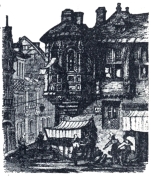
HOUSE OF JEAN D’ARC—ROUEN.
St. Maclou and St. Ouen are two fine churches of the florid Gothic
style, the latter said to be one of the most beautiful in existence. It
was founded in 1318, and completed toward the close of the fifteenth
century.
TIBBITTS WRITES A STORY.
Throughout the entire city the prevailing style of architecture is
Gothic—the Palais de Justice being in late Gothic, and is a very
handsome building. The residences, for the most part, are large and
beautiful, surrounded by well-kept lawns and adorned with flower beds
and fountains.
Rouen is a very important cotton manufacturing place, and is one of the
principal depots for the wines of Bordeaux. It is a commercial center,
too, the Seine affording a good harbor for large ocean steamers, most of
which are in the Mediterranean trade.
When we returned we found Tibbitts sitting in the arbor, with a pile of
manuscript before him, and we asked what he had been doing.
“I promised the old gentleman,” he said, “to learn the languages of the
countries I passed through, and I shall do it. I shall learn French,
some afternoon when I get time. And he requested me to practice writing
things for general improvement. As I am in France I have written mother
a letter, and I have enclosed in it a part of a chapter of a story, into
which I have jerked a lot of French to show her that I have not wasted
my time. Here it is, and I think it’s devilish good!”
This was Tibbitts’ part of a chapter of a story:—
“Precisely at the stroke of seven the Count was upon the ground, and the
clock had not ceased to sound the hour before the Marquis appeared. Both
threw off their outer clothing, and stood in their shirts, sword in
hand.”
“It’s an account of a French Duel,” explained Tibbitts.
“Fromage!” hissed the Count, between his clenched teeth.
“Fromage Gratin!” echoed the Marquis.
The swords crossed with an angry clang.
It was a supreme moment. The two men glared at each other, each fearing
to hazard a movement. Finally, tired of inaction, the Count took the
offensive. His rapier flashed like lightning. With an adroit mouton,
he well nigh succeeded in breaking his enemy’s guard, indeed he would
have done it but for the skill with which a marrons glacê was
interposed.
Both pause a moment for breath. Breath is necessary to a duelist. The
Marquis was the first assailant. He delivered a fierce cotellette de
veau, which had stretched many a tall fellow on the sod, followed by a
mayonnaise, of which few are the master, but gnashed his teeth to
find himself stopped by a poulet a la Paris. They paused again.
“I see you have advantaged by practice with Vol au Vent,” said the
Marquis. (Vol au Vent was the most celebrated swordsman of Paris.) “He
taught you the lunge—I invented the parry. We will resume.”
They eyed each other closely.
“This time I will finish him,” said the Count to himself.
Using the pomme de terre as a feint, he threw himself with all his
force into a patè, and would have ended the contest then and there,
but that the Marquis avoided the thrust by a poisson.
“Ah! ha!” said the Marquis, “I have had other masters than Vol au Vent!
Didst never hear of Vol au Vent’s younger brother!”
“A La Carte!” hissed the Marquis.
“Table D’Hote!” was the determined reply, and again the swords
crossed.
ON THE WAY TO PARIS.
It was over in a moment. The Marquis, springing lightly back, made a
rapid advance. His rapier made a motion that was as quick as the stroke
of a cobra. It was as fatal. A lightning-like potage, to which the
Count opposed a patisserie in vain, and he fell to the ground
lifeless, the thirsty sand drinking up his blood.
“Haricot!” said the Marquis, as he wiped his sword as cooly as though
blood had never stained it, and walked deliberately away.
“In the name of all that’s good what is all this about?” exclaimed the
Professor. “Why, Tibbitts, all this French you have taken from this bill
of fare here. Pomme de Terre, means simply potato, and Poisson is
fish, Mouton is mutton, and Fromage is cheese. You are not going to
send this to your mother?”
“Ain’t I though! The good old girl don’t read French, and this will do
just as well as any I ever saw in anybody’s novel. It shows that I have
not neglected my opportunities. Send it? You bet!”
And he did fold it, and put it into an envelope, and after several
frantic endeavors he made the boy understand that he wanted a postage
stamp, and in the box it went.
And now that I come to think of it, I am not sure but that Tibbitts was
right. If French phrases must be used in English writing, why not take
them from a bill of fare? So far as the general public goes they would
do just as well. I have no doubt but his French will pass muster, twelve
miles back of Oshkosh.
Leaving Rouen with its rich mediæval architecture, its quaint streets
and lovely parks, we cross the Seine and are whirling along at a rapid
rate towards Paris, the center of the gay world. As we approach the
metropolis several beautiful cities are passed, the principal one being
Poissy, a town of fifty thousand inhabitants, which was the birth place
of St. Louis, who frequently styled himself “Louis de Poissy.”
At Asnieres, the Seine is crossed for the last time, and in a few
minutes Cluney is reached, and away over to the right may be seen the
tomb of Napoleon, its gilt dome sparkling in the sunlight. Here we pass
the fortifications and in another brief interval are in the station at
Rue St. Lazarre, and before us with all its beauty is Paris.
In Paris the first American I met was Bloss, my circus friend. He had
succeeded in getting his “wonder” in Germany, and in Switzerland he had
purchased two bears, which he had with him.

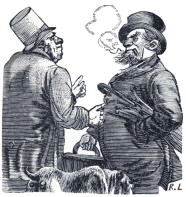
“They are probably the greatest wonders of the nineteenth century,” he
remarked. “Garsong, two cognacs, lo. I am pretty well up in French. I
hev got so sence I hev bin here that I kin order my drinks without any
trouble, and that’s the main pint. Them bears are something inscrutable.
They kin waltz on their hind legs; they kin fire pistols, and will work
in splendid with my Injuns. But what is more wonderful, they kin ride a
horse, ef the pad is made big enuff. And that’s where I’m goin’ to fetch
the public. To yootilize bears I’m goin’ to present a grand scriptooral
spectacle. The public want moral amoosement, and the public is goin’ to
hev it now till they can’t rest. Them bears is what is goin’ to do it. I
shel present the unparalleled spectacle uv Elijah and the bears eatin
the children, all on hosses. Come to think of it, wuz it Elijah, or
Elisha? I’ve forgotten, and must read it up afore I git it on the bills.
When yoo hev a scriptooral spectacle yoo want be very akerit on the
bills.
“It will be the gorgusest thing ever seen. Elijah—Foggarty kin ride
well enough to do Elijah, and I got a dozen kids in the company, mostly
tumblin', wich will anser for the children. Elijah, perfectly
bald-headed, will ride in on a black hoss to slow moosic, a sort uv
Scriptural waltz ez it were. The kids will ride in on spotted ponies and
shout, all in chorus, “Go up bald head!” Then the two bears—they ain’t
she bears, but that’s no difference—will come in on white hosses, and
chase the children. Then the band will play furious moosic, jist ez they
do at the finish of a tumblin act, and the bears will each snatch a kid
off his pony by the belt and ride out.
THE SHOWMAN’S SCHEME.
“But the children were eaten by the bears?”

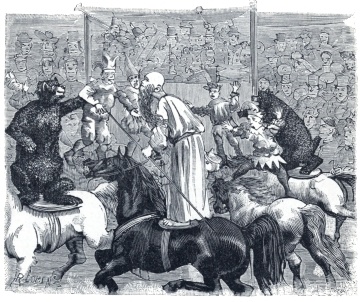
BLOSS’ GREAT MORAL EQUESTRIAN SPECTACLE.
“Cert. But suthin must be left to the imagginashen. Realism is all well
enough, but it kin be carried too fur. The children will all rush out
and the eatin will be supposed to have taken place outside. I can’t
afford to feed them bears on children every afternoon and evenin'. It
would draw, no doubt, but I couldn’t afford sich a luxury. But the
spectacle will draw. It will fetch the religious people. They disapprove
of the circus, as a rool, but they will all come to see a great moral
lesson, illustrated. To see this great moral lesson, they will come
early so as to get good seats, and when it is over they won’t go till
the show is out. To accommodate their prejoodisses and give ’em the hull
show I shel hev it put on the last thing, for once in they won’t leave
till they see the moral spectacle. To see this they’ll shock theirselves
with Mademoiselle Blanche on the tight rope, in tights. You’ve got to
have a moral show, and these bears will lay over anything on the road,
becoz it’s not only moral, but it’s actilly scriptooral. I’m after a lot
uv attracshens here. There’s a sword swallerer that I think I kin git,
and I know uv a lot uv the loveliest anacondas that ever went under a
canvas.”

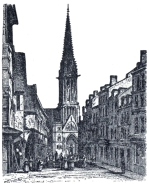
TOWER OF ST. PIERRE—CAEN.
The old gentleman by this time had consumed a half dozen brandies and
water, and was becoming incoherent. The waiter knew him so well that
whenever his glass was empty he filled it without orders, all of which
he approved, as it saved wrenching himself with French. “Bong Garsong,”
he remarked as he went off into a doze.
CHAPTER XVII.
A SCATTERING VIEW OF PARIS.
WHEN an enlightened public sentiment drove the pirates from the high
seas, and compelled them to seek other methods of supplying themselves
with means for the enjoyment of luxury, I am convinced that every one of
them came to Europe, and went into the hotel business. A few of them
might have got hotels in America, but the vast majority came here. I did
come across one at the Gorge de Triente, in Switzerland, who might not
have been a pirate, or, if he was, he was either a mild one, or, being
now very old, is endeavoring to patch up his old body for heaven. I am
inclined to the belief that he was a pirate, but not of the sentimental
order who shed human gore for the love of it; that when his schooner,
the “Mary Jane,” captured a prize, he only killed such of her crew as
were necessary, in the action, and after the vessel had surrendered he
did not make the survivors walk the plank for the amusement of his men,
but mercifully set them adrift in an open boat, without water or
provisions. That’s the kind of pirate he was. And since he has been a
landlord, he does not take every dollar you have—he leaves you enough
to get to the next bank, where your letter of credit is available. I
shall always remember this landlord. He is an ornament to his sex.
But the first hotel we encountered in Paris had for a landlord one who
must have commanded the long, low, black schooner, “The Terror of the
Seas,” who never spared a prisoner, or gave quarter to anybody, but who
hove overboard for the sharks every human being he captured, without
reference to age, sex, or previous condition of servitude. Indeed, I
think that after he was driven from the seas, he took a shy at highway
robbery before taking his hotel in Paris, thus fitting himself
thoroughly for his profession.
“Ze room will be ten francs, messieurs,” was the remark of the polite
villain who showed us our apartments.
“We, we,” we cheerfully replied, for the room was worth it. We said
“we, we,” that the gentleman might know that we understood French,
and that he need not unnecessarily strand himself upon the rocks of the
English language.
But the next morning! The bill was made out, and as we glanced at it we
forgave the English landlords—every one of them. Apartment ten francs,
candles, or “bougies,” as the barbarous French call them, two and
one-half francs; attendance (we had not seen a servant), two and a half
francs each, five francs. Then there were charges for liquors enough for
Bloss, the American showman, not a particle of which had been ordered or
had been brought to our room, and so on.
We expostulated, but when we commenced that, the clerk began to talk in
French, and as all the French we had between us was “we, we,” he had
rather the advantage. In reply to some question he appeared to be
asking, we said, “we, we,” whereupon he dropped back into English
promptly, and said that inasmuch as we admitted that the bill was right,
why didn’t we pay it? That “we, we” was our ruin.
“A little knowledge is a dangerous thing;
Drink deep or taste not the Pierian spring.”
Were we over with it? By no means. As we were ready to file down the
stairs there came to our various rooms more porters than we ever
supposed lived, each of whom seized a piece of baggage, when one might
well have carried it all. We discovered, finally, what that meant. Those
who did not carry baggage stood grinning in the passages, with their
hands extended, and those who did expected each a franc. As we had
passed the concierge, who had certainly been no earthly use to us, his
hand was extended, and to crown the whole and have it lack nothing, a
chambermaid came running to me with a handkerchief which “Monsieur had
left in his room,” and out went her hand. The brazen hussy had
abstracted it from my valise, and held it till the last moment, that she
might have some excuse for a gratuity.
THE USES OF SPECTACLES.
Tibbitts and the others shed silver freely, but the Professor did not.
Entrenched behind his spectacles he did not catch the eye of one of
them, and he stalked majestically through the lot, turning neither to
the right nor the left till he was safely ensconced in his fiacre. That
pair of spectacles saved him at least their cost that day. I shall wear
them hereafter. They are good for this purpose, and then one behind this
wall of glass can look another man in the eye steadily when he is
enlarging on facts. Spectacles have uses beside aiding the vision.

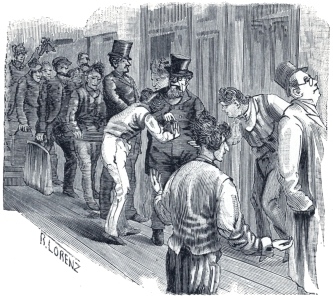
THE PROFESSOR’S SPECTACLES.
We paid everybody and everything, and departed sadly. No matter how
joyously you enter a French hotel, you walk out to the music, mentally,
of the Dead March in Saul. But what are you going to do about it? You
cannot sleep in the streets, and you must eat, and the pirates have you
in an iron grip, and they realize the strength and impregnability of
their position.
Paris is another octopus, differing from London only in the quality and
style of its feelers. London has been built up by main strength, that
being its characteristic. Paris has as many feelers as London, and they
are perhaps as strong and far-reaching; but they are wrapped in velvet.
It is a rather pleasant thing to be devoured by the French octopus. He
does not rend you limb from limb, like the English one, but he holds you
just as firmly, and sucks your life blood in so delightful a way, that
you rather like the operation.
Paris is the city of luxury. No matter where you go, nor among what
class of people, you see but two things—a vast population catering to
sensualism, and another vast population paying the price for it.
The difference between London and Paris is shown even in its proprietary
medicines. In London the walls groan, or would if they could, under
announcements of liver medicines; in Paris the walls of corresponding
conspicuousness are covered with advertisements of articles for the hair
and complexion. A French woman will get on with almost any kind of a
liver, but she must have hair to her heels, and a complexion that is
faultless. No matter what kind of underclothing she has on, or no matter
if she hasn’t any, the outside must be dressed in elegance and taste.
Paris lives largely for the eye.
OLD AND NEW PARIS.
The city is made up of two distinct parts—the old and new. Old Paris,
the Paris of Sue, and Dumas, and Victor Hugo, still exists, and its
people are precisely the same as when these authors wrote of them. You
leave the most splendid streets in the world, wide, and paved like
floors, with enormous rows of palatial structures on either hand, as
modern as modern can be, and in fifteen minutes you are in narrow,
crooked alleys, with the quaint old houses on either hand, six and seven
stories in height, with all sorts of gables, all sorts of deformities in
the matter of walls; with the quaintest and most curious passages, and
paved with the boulders which the Parisian of twenty or thirty years
since found so useful in constructing barricades when they had their
regular monthly revolution. And you see the same men and women who
fought behind these barricades, and who will do it again—the wine shop
politicians, who believe in “liberty, fraternity and equality” to-day,
and accept an empire to-morrow for a change. A Parisian cannot endure
monotony, even in a government.
Possibly he accepts imperialism, now and then, just for the pleasure of
overturning it.

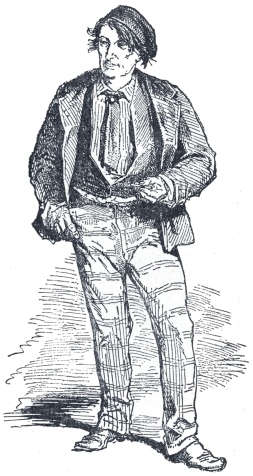
“LIBERTY, FRATERNITY, EQUALITY.”
But the new Paris is quite another thing. All Paris was, not many years
ago, like the portions of the Latin Quarter and the Faubourg St.
Antoine, but the Third Napoleon intended to be Emperor all his life, and
these crooked streets were not good for Imperial artillery, and the
pavements were easily torn up for barricades. So he called to himself
Baron Haussman, the prefect of the Seine, and said, “We will reconstruct
Paris.” The Baron, thoroughly devoted to the Emperor, and himself,
called about him the best talent in the world, and the work was begun.

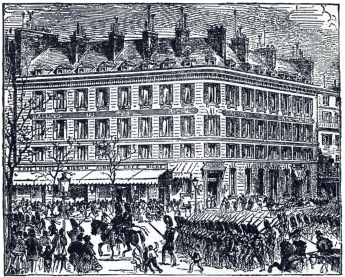
NEW PARIS—BOULEVARD DES ITALIENS.
HOW THE NEW PARIS WAS MADE.
But be it understood that the Baron and the Emperor did not go about
this work carelessly. The Baron, whose ancestors were Israelites, had
all the thrift of that remarkable race, and Napoleon was not much behind
him. Whenever they decided upon tearing down the whole quarter and a
score of crooked streets, and constructing a boulevard wider than the
widest street in New York, they had an agent who, before the design was
made public, went and purchased the entire property at the market rate.
Then came the necessary legal steps for the condemnation of the
property, and the payment therefor by the city. The new owner was
allowed twenty or thirty times for it above what he paid, and vast sums
were by this simple process turned into the Emperor’s private exchequer
and added to the already vast estate of the astute Baron.
The Emperor used his share of the plunder in amusing the Parisians, but
the Baron’s share is still in his family.
There are Tweeds in every country, but these were greater than our great
peculator. The Emperor Napoleon and Baron Haussman were just as much
greater than Tweed as France is greater than the single city of New
York. But then their opportunities were greater. Had Tweed had a chance
he might have risen to the front rank.
It is perhaps as well for Paris that it had an Emperor, and possibly it
would have been better for the United States had she had a King in her
earlier days. For a republic will never do toward the beautifying a city
or country what an Emperor will. I helped to elect a member of Congress
once, who, finding that a single door in the Capitol at Washington cost
twenty thousand dollars, exclaimed against the extravagance of the
country. “Why,” said he, “a good two inch pine plank door, painted
white, with three coats of paint, can be had in Upper Sandusky for eight
dollars, and it would do just as well as this infernal bronze thing
covered all over with figures.”
Had Paris been governed by a Congress, the honorable gentlemen from
Normandy, and Savoy, and other out-lying districts, would never have
paid for the wonderfully beautiful boulevards that make Paris the most
beautiful city in the world. The old alleys were good enough for their
fathers, and why not for the present generation?
But the will of a single man did it, and the memory of that man is still
worshiped in Paris. Dead though he be, he wields power in Paris to-day,
and had not his son been so reckless in Africa, the chances are a
hundred to one that he would to-day be occupying his father’s throne.
New Paris is made up of beautiful wide boulevards, some of them two
hundred feet wide, with sidewalks at least thirty feet wide on either
side, and lined with shops and cafés, the shops devoted almost entirely
to the sale of articles of luxury.
The cafés are very peculiar. Paris lives, as much as possible, out of
doors, for Paris desires to see and be seen. Therefore, in front of
every café, under tasteful awnings, are chairs and little white sheet
iron tables; there sits Paris, drinking its drinks and eating its light
repasts, from early morning till very late at night.
To an American it is a most peculiar sight. No matter where you go, in
old Paris or new, it is the same, except in the grade of the people. In
old Paris you see blue blouses and calico dresses at these tables, and
in new Paris broadcloth and silk, but the tables are there on the
sidewalk, and the people sitting by them, the same in one as in the
other, and very jolly they are.

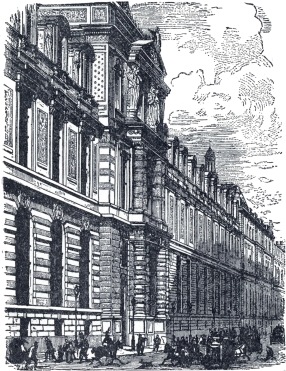
THE LOUVRE FROM THE RUE DE RIVOLI.
DRINKING IN PARIS.
Paris is the most temperate city on the globe. There is as great a
quantity of liquids consumed as in London, and perhaps more, but it is a
different kind. The Frenchman drinks the light wines of the country, or
curious compounds of stuff that are as innocent as milk, so far as
intoxication goes. He has syrups something like those the American
druggist uses in his alleged soda water, and he either mixes that with
pure water and makes his heart glad, or, if he is particular about it,
he mixes it with Seltzer water from the gushing syphon. There are vast
varieties of these syrups, but they are all alike except in the matter
of flavor.
Occasionally one rushes to the extreme of dissipation and stupefies
himself with German lager beer, but as a rule it is either wine or these
syrups.
Of course there are French drunkards. The brain-annihilating absinthe
obtains here, and a seductive fluid it is. It is the most innocent
tasting stuff in the world, and does not affect one immediately. And so
the ignorant stranger, on his first introduction to it, takes dose after
dose of it, and goes home wondering why people are so mortally in dread
of absinthe. In the still watches of the night he becomes convinced that
he has been taking something, and the next morning he, or his friends,
are entirely sure of it. For in the morning he is drunk, drunk clear
through, and he generally manages to stay so for some days. Tibbitts,
whose experience I am relating, said it was much cheaper than Oshkosh
whisky, for one night’s sitting at absinthe lasted him a week. There is
a vast quantity of absinthe consumed in Paris, but it is done quietly
and in great moderation. An American or foreigner who likes it drinks it
immoderately, and pays the penalty of his folly. The Frenchman knows
exactly how much is safe for him, and very rarely exceeds his limit.
I have seen but one drunken man in Paris, and he was either an
Englishman, or an American who had been long enough in London to get
spoiled. He spoke English, and from the style of his clothes I should
take him for an Englishman, but there was an especial wobble in his step
that proclaimed the American. I have seen the same a great many times in
my beloved country.
Drunkenness is impossible on these innocent liquids. The wine of the
country is consumed everywhere and in large quantities, and its use by
all ages and sexes is unrestricted.
It is on every table for breakfast and dinner, and is everywhere the
substitute for tea and coffee. Containing as it does a very small
proportion of alcohol, and as that is diluted fully a half with water,
it cannot be a very dangerous beverage. At all events, the French—men,
women, and children,—drink

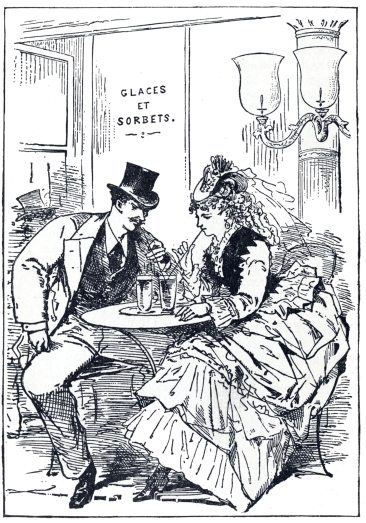
A BOULEVARD CAFÉ—OUTSIDE.
WINE AND WHISKY.
it in great quantities at all hours, and intoxication does not ensue.
Outdoor sitting is made possible by the harmlessness of their accustomed
drinks. The climate of New York is well adapted to this sort of thing,
but were Broadway lined with these cafés, with the public sitting at
the small tables, how long would it be before a gang of ruffians, filled
with the frightful whisky of the country, would swoop down upon them and
scatter tables and people. A gang from the Bowery, filled with the
fighting whisky of America, or the soul-searing brandy of the British
land, turned loose upon the Boulevard des Italiens, or any other
boulevard in Paris, would occasion as much terror as a Communist
insurrection. But with the light wines of France, and the quiet
pleasure-seeking and pleasure-enjoying disposition of the Parisian,
everything is as quiet and orderly as could be desired.

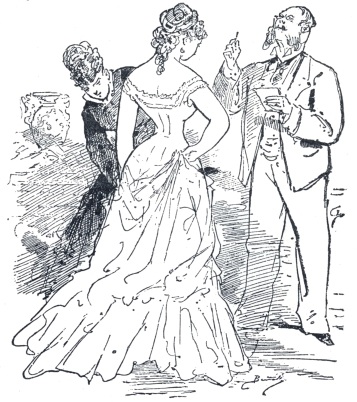
A COSTUME BY WORTH—THAT COSTS.
There cannot be in city life any sight so bewilderingly gorgeous or so
delightful as the boulevards, either by day or night. The streets are
lined with beautiful trees, and then the shops and cafés are exquisitely
beautiful, as are their contents. As I said, the shops are almost
entirely devoted to the sale of articles of luxury, for the Frenchman,
acute being that he is, discovered thousands of years ago, that a profit
of five hundred per cent. may be made upon articles of fancy; while the
dealer in things essential, which may not be dispensed with—articles of
prime necessity—obtains a beggarly ten or twenty. He learned centuries
since that Madame will pay any price for a hat that pleases her taste,
and do it without question, while she will haggle an hour over the price
of twenty pounds of sugar or a cut of beef. He who deals in necessities
must find his reward in the consciousness of honesty. His customers will
not let him be anything else.

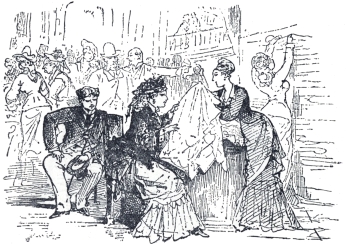
A MAGAZINE ON THE BOULEVARD.
THOMPSON, OF TERRE HAUTE.
You shall see shop windows filled with jewels that might well hang about
the neck of royalty—indeed, so costly that only he or she who has an
empire to tax can afford them—shops devoted to the sale of pipes, the
price of which, some of them, go up into thousands of francs; galleries
of pictures, magazines of bronzes, and all kinds and descriptions of
statuary, and the thousands upon thousands of costly nothings with
which rich people adorn their homes. Artistic paper hangings, ornamental
work in leathers, and every other material; shops for the sale of
everything that is ornamental in women’s wear, and, in a word,
everything that delights the eye, but which humanity, but for its vanity
and longing for the beautiful, could do without as well as not.
And an enormous trade these caterers to the non-useful carry on. The
whole world comes to Paris for these things, and they bring their money
with them for this purpose and expect to spend it.
Woe to the American, man or woman, who ventures into these shops. The
shopman knows the moment he enters that the coming victim who is rushing
upon his doom is an American; he knows that he has so much money to
leave with him, and no matter how much knowledge he affects, that he is
as ignorant of the real value of his wares as a babe unborn.
What should the citizen of Terre Haute, Ind., know of the value of
bronzes? Nothing, whatever. But he has just made a good speculation in
pork, and he has built him a two-story house, with a Mansard roof on it,
and has furnished it gorgeously with upholstered chairs, and on his
floors he has laid Brussels carpets, and his wife and he are taking
their first visit “abroad.” Mrs. Thompson is determined to astonish her
female friends and excite their envy with some “statoos” from “Paree,”
and she is going to do it. The pair look critically through the
assortment. They object to the Venus of Milo, because the arms are
lacking, and are surprised that an imperfect sort of second-hand work of
art of that kind can’t be had at a reduced price. The price of a picture
takes their breath away, and Mr. Thompson suggests that a few pairs of
chromos can be had a great deal cheaper, and he thinks they will make a
better show than the paintings that are shown them. Perhaps he is right,
when the paintings that are shown him are critically considered. But
Mrs. T. will have none of the chromo business. She will have some works
of art from “Paree,” and Mr. T., fired with ambition, assents, and the
“works of art” are bought and paid for at anywhere from four to ten
times their value, and they retire with them grieved and yet
satisfied—grieved at the hole the purchase has made in their
pocket-book, and satisfied to think what a sensation the purchase will
make when they are displayed in their home in the West. Thompson
anticipates the pleasure of calling the attention of his guests to these
wonders, and remarking casually, as though he were a regular patron of
art, “Oh, them! They are a few little things I bought in Paree, the last
time I was over. They are nothing. I only paid four thousand francs for
the pair. I shall buy more when I go over again. I really hadn’t time to
look around.”
And then Mrs. T. must have a Parisian watch, and some jewelry, and the
dealer sells them to her at a very large advance over what a Parisian
would pay, and when they are gone, loaded with their absurd purchases,
he falls upon his knees and prays for good crops in America, and a more
plentiful rush of visitors. They are his wheat fields.

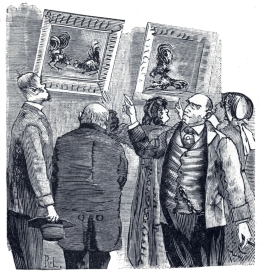
MR. THOMPSON’S ART PURCHASES.
The difference between the English and French is admirably illustrated
by two incidents somewhat similar in nature. It was our fortune to be in
London on the occasion of the celebration of the Queen’s birthday, a
time that is always made a general holiday by all classes. Business was
suspended, and every one gave himself up to pleasure—the kind of
amusement that the Londoner considers pleasure. The bands were out, the
military paraded, and all the parks were filled with people in holiday
attire.
A HOLIDAY IN LONDON.
As the afternoon wore on it became apparent that there was some agency
at work aside from devotion to royalty. There was a boisterousness that
savored of strong beer and still stronger gin. The crowd of men and
women who thronged the Strand and Regent street, and Piccadilly, laughed
and shouted, not with the merry ring of pure pleasure, but with the
maudlin utterances of semi-drunkenness.
In the evening there was a grand illumination of the government
buildings, the clubs and the prominent business houses. The streets were
thronged with people—men, women, and children—all elbowing their way
along, eager to see all that was to be seen, and willing to give no one
an opportunity they themselves could not enjoy. It was a motley crowd,
composed of all classes. The well-dressed shopman was jostled by the
ragpicker; and ragged, homeless girls, arm in arm, shoved aside the
elderly matron, who had come out with her children to see the
illuminations. There were all classes and conditions of people, and they
raved and tore about more like escaped lunatics than the staid, sober
Britons they pride themselves upon being.
A walk down Pall Mall was almost worth one’s life. On this thoroughfare
are located the principal clubs of London, and as they were rather
brilliantly lighted with gas jets arranged in fanciful designs, the
crowd flocked there to see them. The street was actually packed from
curb to curb, so that locomotion was difficult. The illuminations were
not on a scale grand enough to merit all this outpouring of people, this
great hubbub, this drunkenness and gin-incited hilarity. For the most
part the designs were simply the English coat of arms, with the letters
“V. R.” on each side, the whole being done in plain gas jets.
Occasionally some thriving shop-keeper, who had made a little something
from the Royal family, would branch out a little more extensively, and
use tiny glass shades of different colors, over his gas. But it was
dreary beyond measure. The streets were dark and gloomy, the air was
close, and the so-called illuminations were so very, very meager that
they made the general effect only more dismal.
Yet the people surged up and down the streets, hurrahing and shouting
for the Queen, for the Prince of Wales, for the Royal family, for
themselves, for anybody they could think of. The public houses were open
long after other places of business were closed, and there was a
constant stream of thirsty people gliding from behind the half-closed
doors out upon the street to yell until another dram became necessary.
The customers were not limited to the sterner sex by any manner of
means. There were crowds of young girls ranging from fourteen to twenty,
poor working girls, who had saved all of their scant earnings they could
in anticipation of this holiday, who boldly pushed their way with a
coarse laugh, through the crowd of men and, standing at the bar, would
call for and drink their bitter beer, or ale, or stout, or gin, even,
with all the effrontery of an old toper. And old women there were too,
who would quietly glide into the compartments marked “private bar,” and
there drink their brandy or Irish whisky. Throughout it all there seemed
to be a dogged determination to become intoxicated, just as though there
could be no pleasure, the Queen’s birthday could not be celebrated
properly, unless every one filled himself up with ardent spirits.
As it grew later, the crowds increased both in size and disorder.
Notwithstanding the fact that most of the illuminations had been
extinguished, the masses had had a taste, and they wanted more. They
became momentarily ruder and more boisterous. As the time approached for
the closing of the publics, the crowd received fresh installments of the
worse class of women, and then drunken women tried to do worse than the
drunken men, and they succeeded. A woman thoroughly under the influence
of liquor is something simply terrible to see, and here we saw it. On
that night the air rang with their ribald jokes and coarse songs, as
they jostled each other in their unsteady walk.
A HOLIDAY IN PARIS.
This, it must be remembered, is not a scene that occurred down in
Cheapside, or in the Seven Dials, or the streets down near the river.
No, indeed. Pall Mall, one of the most aristocratic streets in London,
Regent street, the Broadway of London, Piccadilly, the Haymarket, these
were the scenes of this frightful display, and evidently nothing was
thought of it. The police made no arrests, and did not seem to know that
there was anything occurring that was not perfectly allowable and
justifiable. So the wild debauch went on all night, and it was not until
the gray light made its appearance in the east that the city quieted
down and the streets no longer echoed with the maudlin cries of the host
of people who celebrated in their own peculiar style the anniversary of
their Queen’s birthday.

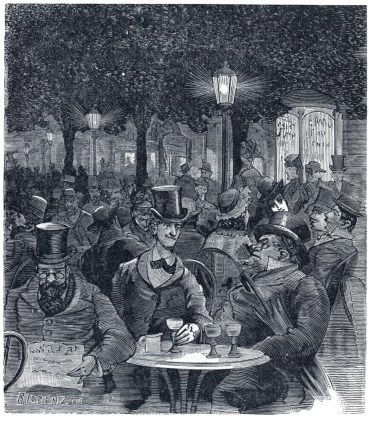
THE AMERICAN PARTY OUTSIDE A CAFÉ ON THE BOULEVARD.
How entirely different was the grand National fête of France on the 14th
of July. This, too, is made a day for general rejoicing and
merry-making, and the French people get out of it all that is to be
had. For days before, active preparations for the event are made, flags
and streamers of the colored bunting are put up all over the city,
elaborate designs in gas jets are prepared; fountains erected; electric
lights put up; in a word, everything is done that can in the slightest
way add to the brilliancy of the beautiful city, whose white buildings
make it bright and cheerful at all times.
On the night of the 13th it was apparent that something was about to
occur, for the streets, the broad, brilliantly lighted boulevards, were
crowded with people, all of them full of life and animation. The great
stores, with their glass fronts, were literally ablaze with lights; the
gaily decorated cafés with their inviting tables on the broad sidewalks,
were filled with people sipping wine, or coffee, and discussing with the
animation and vivacity that a Frenchman only possesses, the attractions
of the morrow. All along the principal boulevards electric lights were
suspended high in the air, while in the Place de Concorde, and out the
Champs Elysées, were thousands of brilliant clusters of gas jets, making
the night seem day. The crowds swayed hither and thither with one
impulse, to see everything, yet there was no departure from decorum.
Everybody was happy. But it was the happiness that comes of a sense of
pleasure, from bright and beautiful surroundings, and the knowledge that
every one else is happy. There was no sign of drunkenness; there was no
rowdyism; there was nothing suggestive even of offensiveness. Everybody
was gay and merry. There were songs and hearty peals of laughter, but it
was pure and wholesome, something that one could participate in with all
his heart.
THE NATIONAL FÊTE.
The morning of the 14th dawned with a bright, clear sky, and the sun
came up with a serenity that augured well for the fête. During the
night, while all Paris slept, busy workmen put the finishing touches on
the decorations, and when all business suspended, Paris turned out to
see itself, there was a general murmur of approval at the beautiful
sights displayed everywhere. The houses along the streets were almost
hidden by flags and banners and streamers; the statues were decorated;
high staffs that were not visible the day before, now floated long
streamers; the parks and gardens were in holiday attire. Paris was
arrayed in gorgeous dress, and every one went in for a day of rare
pleasure.
At all the theaters, including the Grand Opera, free performances were
given during the afternoon, and there were all sorts of entertainments
provided by the government for the amusement of the populace. In various
quarters of the city platforms were erected, and all during that warm
afternoon the working classes danced to the music of superb orchestras,
which were furnished to them without money and without cost.

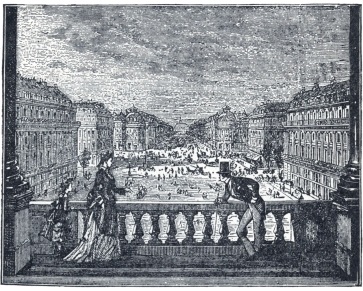
THE AVENUE DE L’OPÉRA
From the Loggia of the Opera House.
But when evening came the fête was seen to its best advantage. As it
grew dark the whole city blazed with light. There were millions of
lanterns of every possible color, hanging from every point that could
hold a support. Electric lights flashed from every corner, and gas jets
blazed everywhere. The Boulevard des Italiens, from the Madelaine to the
Bastille, was as light as though a noonday sun were pouring down upon
it. And so with the other large thoroughfares, while the different
quartiers had illuminations of their own, each of which was
wonderfully brilliant.
The one particular place that eclipsed all others was the two mile
stretch from the Tuileries to the Arch of Triumph, and then on to the
Bois de Boulogne. The straight promenade through the Tuileries garden
was lined on either side with a high trestle work, literally covered
with fanciful designs wrought in gas, while high arches of brilliant
flame intersected it at regular intervals.
The Place de Concorde was a marvel of beauty. All around the immense
square were hung festoons of gas jets, while all the statues of the
different cities of France that ornament each corner, were thrown into
bold relief by brilliant lights on the limpid water of the fountain in
the center; different colored lights were thrown during the evening, the
effect being wondrously beautiful.

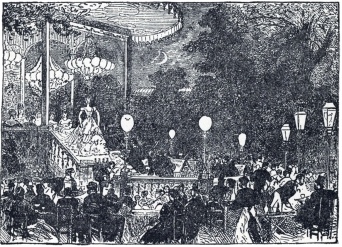
CAFÉ CONCERTS—CHAMPS ELYSÉES.
JOLLITY AND PATRIOTISM.
Standing in the center of the place, and looking towards the arch, the
sight was simply marvelous. Nowhere in the world but in Paris could such
a thing be seen. The broad avenue, Champs Elysées, rising with a gentle
slope, was lined its whole distance on both sides with a stream of
light, that drooped gracefully from cluster to cluster, all the way
out, as far as the eye could reach. Then the concert cafés which abound
on either side, made unusual displays, swinging lines of light from tree
to tree and café to café, till the effect was dazzling, and one really
had to stop to realize that he was here on earth and not in some fairy
land.
The Bois de Boulogne, always beautiful, with its charming lakes, long
winding drives, its parks, tiny brooks and picturesque café, was
unusually brilliant that night. On the shores of the lake large set
pieces of fire works were displayed, while bands of music in odd looking
gondolas blazing with colored fires, furnished exquisite music. The
paths and carriage-ways were lined with small set pieces, which,
together with the constantly burning colored fires, produced an effect
that was grandly weird. All Paris was one blaze of light. And all night
long the people of Paris and all France were on the streets enjoying the
rare sight. After nine o’clock carriages were compelled to keep off the
principal boulevards and streets, so densely were they packed with
people. The Champs Elysées from ten o’clock was one surging mass of
people—men, women and children—returning from the Bois. From curb to
curb was one solid mass of humanity, and such a jolly good-natured crowd
was never seen before. They sang patriotic songs, and laughed and joked,
and had a good time generally. Now and then there would come down the
street a small procession of students, wearing grotesque caps, each
student bearing a Chinese lantern. They sang funny songs, and chaffed
those that passed. But there was not a single display of temper.
Everybody took everything in good part, and every one was superlatively
happy.
During all that long day and still longer night, not a single case of
drunkenness did I see, and during that time I was in a great many
different places, and would have seen it had there been any. There was
fun and frolic on every side. But it was the overflow of exuberant
spirits, and not the outgrowth of too much wine and beer and liquor. In
no city in England, nor, I am afraid, in America, could there be so
gigantic a celebration, so much fun and hilarity, with so little
drunkenness and so few disturbances. Verily, the French, insincere and
superficial as they are, know how to get the most enjoyment out of
life. They have all the fun the Anglo-Saxon has, without the subsequent
horror.
Foreign travel is of a vast amount of use to a great many people. Coming
from Dieppe to Paris there were seated in our compartment two ladies
with their husbands, who were in New York, bankers, one regular and the
other faro, and both with loads of money. The wife of the faro banker
was arrayed in the most gorgeous and fearfully expensive apparel, with a
No. 6 foot in a No. 4 shoe. The other lady was a lady, and she really
desired to see something of the country she was traveling through. The
faro bankeress talked to her from Dieppe to St. Lazarre station, and
this was about what she said:—
“You never saw anything so perfectly lovely as the children’s ball last
year at the Academy of Music. My little girl, Lulu, you saw her at the
school—she goes to the same school with your Minnie, only Lulu isn’t
studying anything but French and geography now. I want her to get to be
perfect in French, because it will be such a comfort to travel with her,
and see things, and not be entirely dependent upon your maid—we have a
maid with us, but, of course, we have her travel third-class—not for
the difference in the expense, for we don’t have to economize—but you
know it won’t do to have your servants too close to you; they get to
presuming upon their privileges, and you must make them know their
place. Oh, how I wish we had a monarchy or something of the kind in
America, so that we could be divided up into classes, and not be
compelled to mix with the lower orders.”
[I may as well remark here that this fine lady was originally a
McFadden; that she came to America in the steerage, and was a
chambermaid in a boarding-house, where she first met her husband, who
was a brisk young bar-tender, who finally got a bar of his own, which
gradually blossomed into a faro bank. The maid was a thoroughly educated
and refined young lady, who was compelled by poverty to take a position
of this kind.]
THE TALK OF THE FARO BANKERESS.
“Well, Monsieur Bigwig, the dancing teacher, you know of him. He was a
Russian or a Prussian, or one of them people. Why, he has taught the
children of all the kings in Europe—the little princesses; but he came
to America and has three schools in New York and one in Brooklyn, and he
is perfectly splendid. Dodworth isn’t nothing beside him for giving
dancing lessons. Monsieur was a great friend of Lulu’s, and showed her a
great deal of attention, and paid her a great many compliments. When a
new pupil came in he used to take Lulu and dance with her to show the
new one the step, Lulu danced so prettily, and was altogether too sweet
for anything. And at his ball he had one tableau of four little girls
representing Spring, Autumn, Summer, and Winter, and he came to my house
and gave me the choice of characters for dear Lulu. I remember he came
to the house to do it, because he took dinner with us that day, and my
husband lent him fifty dollars. Well, I selected ‘Winter’ for Lulu, for
I could dress her warmer in that character than in any of the others,
and the dear child is delicate; she is so spirituelle, and I had for her
a costume which was altogether too sweet for anything. She had on a
dress—”
“Oh heavens! do look at that beautiful valley,” exclaimed the unwilling
listener.
There was a valley spread out before us, so entirely perfect in its soft
loveliness that it was worth a voyage across the Atlantic to see it. The
faro bankeress glanced out of the window, and with the remark, “It’s
altogether too lovely for anything,” went on without a moment’s pause:—
“I had a dress made of a white material that represented ice, with
little balls of white down to represent snow balls all over it, and
furs, the edges trimmed with down, and a little crown upon her head,
with points like icicles, and the same things tacked onto the bottom of
her outer skirt, and her hair powdered so as to be like snow, and she
was the Ice Queen, and had a retinoo of ice men, twelve little boys with
ice axes, and she was drawn in on a sled by two boys dressed like
reindeers, and in front of the reindeers was two little boys dressed
like bears, and it was altogether too sweet for anything. I don’t know
how the other little girls were dressed, but everybody looked at Lulu;
and then, after they four had made the circuit of the Academy (it was
all floored over), they formed in the center and danced a dance which
Monsieur had arranged for them, and Lulu danced too sweet for anything.
Everybody said to me that she was the sweetest little girl in the ball.
Where did you get that lace? I got some in Paris last year; we go abroad
every year; we are tired of Saratoga; we have been going there so long
that it is an old story, and then you have to meet all sorts of people
there, and I don’t like it. I don’t suppose it is just right, but I do
wish we could have a monarchy, so that the better classes could be more
select. That lace was altogether the sweetest thing I ever saw, and it
cost less than half it would in New York, and then—”

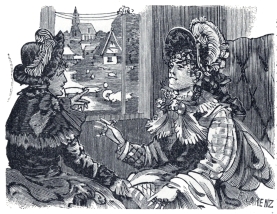
THE FARO BANKERESS ADMIRING THE VILLAGE.
“What a delightful village this is, and how quaint! Do look at it!” This
from the actual lady.
There was the same quick sweep of the head by the lady of laces, with
the regular remark: “Yes; it’s altogether too sweet for anything,” and
she resumed:—
TRAVEL AND DRY GOODS.
“Now when we get to Paris I do so want you to go with me. I can show you
where you can get laces and everything for half you pay in New York. And
hosiery! Well now. I always buy five dozen pairs of silk stockings in
Paris. And gloves! You can get kid gloves in Paris for almost nothing,
and all you have to do not to pay duties is to put them on once and
swear they have been worn. I always spend my last day in Paris putting
on and off gloves. And children’s clothes! Let me see; you have a little
boy, and so have I. Is yours in pants yet, or is he in kilts? Mine is in
pants, but I hated to take him out of kilts; he was altogether too
sweet for anything in them. With a broad white collar, and lace about
his wrists, and little black shoes, and red stockings, with a Highland
cap and feather in it, just like a Highland chieftain and—”
At this point the train stopped at a station, and our party got into
another compartment. I pitied the lady who had to stay, but
self-preservation is the first law of nature. I should not like to be
with her on a steamboat, where escape would be impossible. Travel does
her a power of good. But heavens! how many like her are strewing their
gabble all over the continent!
CHAPTER XVIII.
SOMETHING ABOUT PARIS AND THE PARISIANS.
PARIS covers an area of thirty square miles, has five hundred and thirty
miles of public streets, and has a resident population of nearly two
millions, all engaged in trading in articles of luxury for the rest of
the world. It supports about one hundred and fifteen thousand paupers.
Its religion is a very mild form of Catholicism tinged with infidelity,
or infidelity flavored with Catholicism, as you choose. Which flavor
predominates in the average Parisian I have not been able to determine.
I should say Catholicism Sunday forenoon, and infidelity the remainder
of the week. At all events, the cafés are always crowded, while the
churches never are, except by strangers, who go religiously and devoutly
thither—to see the buildings and the decorations. The Parisian
generally puts off going to church till next Sunday, and goes this
Sunday to the country instead. One-fourth of the births are
illegitimate, which is doing very well for Paris.
The city consumes annually eighty-six millions gallons of wine, and
three millions five hundred thousand gallons of spirits; the latter
going very largely into the seasoned stomachs of foreigners, the French
themselves being altogether too acute to use anything of the kind.
However, they are very willing to sell it, and welcome the Englishman or
American with hospitable hands to drunkards’ graves—if they have the
money to pay for it—with great politeness and suavity.
I have not yet been in any country which did not extend a hearty welcome
to any stranger with money.
SOMETHING ABOUT WINE.
About ninety-five millions of gallons of water per day come from the
water-works, which is mostly used in keeping the streets clean. I have
not yet seen a Frenchman who ever used any as a beverage or on his
person. For economy he mixes some of it with his wine, and his ablutions
may require a pint or such matter a day, but that is all the use he has
for water.

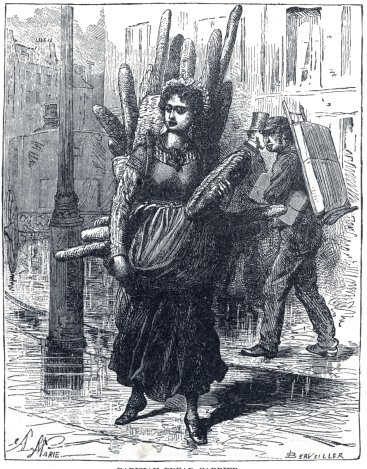
The very first thing that strikes an American in Paris with
astonishment is the meagreness of the water supply in the houses. You
look for the faucets which supply your room with hot and cold water, as
at home, but you don’t find them. A chambermaid pours out about two
quarts in a diminutive pitcher, and that is expected to last you for
purposes of ablution twenty-four hours. And this with the Seine running
directly through the center of the city. The houses are from five to
seven stories high, but all the water used in them, for all purposes, is
carted up to the top by men. My landlord told me it was cheaper to have
it so carried than to put plumbing in his house, and pay the water-tax,
“and we don’t use much of it, anyway,” he remarked, and he was right.
Still, accustomed as I have always been to the use of a great deal of
it, it took me some time to fall into their ways. Pure water is a very
good thing to have plenty of, but it’s all a matter of habit, I suppose.
A man can get to be a Frenchman, in time, if he tries hard enough.
Nothing is impossible, where there’s a will and a stubborn purpose. But
to keep oneself clean with a pint, or thereabouts, of water per day
looks rather difficult to a novice.
John Leech was very fond of illustrating this peculiarity of the French
people, in Punch, years ago. When the first English Exposition was in
progress in London, the city was overrun with French. One picture he
made was of two elegantly dressed young Frenchmen, standing in front of
an ordinary wash-stand, on which was the usual pitcher, washbowl,
soap-dish, etc., and underneath was this conversation:—
Alphonse—What is this?
Henri—I do not know. It is queer!
The good Leech doubtless exaggerated, as all satirists do, but he had
sufficient foundation for his skit.
FRENCH CLEANLINESS.
But whatever may be the condition of the French, man or woman,
interiorally, the outside is as delightfully clean as could be desired.
The blouse of the workman is outwardly as fresh and clean as the coat of
the swell on the boulevards, and the said swell would sooner lie down
and die than to wear soiled linen or uncleaned boots. The women, high
and low, are invariably neat and tidy in appearance—immaculately so.
The chambermaid, who cares for your room; the washerwoman who brings you
your linen; equally with my lady in her drawing room or in her carriage,
is neatness itself, and not only that, but elegance itself. Condition is
no excuse for outward slovenliness in Paris. The servants in the house
always have white about the throat and wrist, and it is white. And
then their dresses are made with some degree of taste, and are worn in
such a way as to make the cheapest and most common goods attractive.
With the same eye to appearance, and with the devotion to comfort that
is a part of French nature, the streets of Paris are the best kept in
the world. I do not wonder that the Frenchman, condemned by business or
other considerations to live in New York, considers himself a sort of
Napoleon, after Waterloo, and New York his St. Helena. The streets of
London are kept clean; the dirt from the throngs of horses and vehicles
is carefully removed, and it is done thoroughly, but not so much because
of cleanliness as for want of manure. The streets of Paris are kept
absolutely clean, simply for comfort and appearance. The neatly polished
boots of Monsieur and Madame must not be soiled on crossings, nor must
the skirts of its women be made unwearable by dragging through dust and
filth. The streets of New York would send a French woman to a
mad-house—they are nasty enough to send any one there compelled to wade
through them.

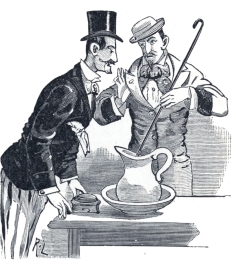
There are no people in the world who are so delightfully polite as the
Parisians. I might say the French, but Paris is
TIBBITTS’ ENGLISH.
France, and it is the same all over the country. It is a delight to be
swindled by a French shopkeeper, man or woman, they do it so neatly and
with such infinite grace. There is so much patience, so much suavity,
such a general oiling of the rough places, and such a delightful
smoothing out of creases. It is Monsieur who is the obliged party if you
come into his place. He feels the honor that you have conferred upon
him, and he makes you feel that he feels it. True, you pay for all this
politeness, and pay for it at very high rates, but it is, like all
high-priced commodities, very pleasant.
He never wearies of showing you goods; your atrocious French is
laboriously translated, and if you buy a franc’s worth Monsieur seems as
much delighted as though you had beggared yourself by taking his whole
stock. And if you have taken an hour of his time and purchased nothing,
he seems to be even more pleased. Indeed, his politeness on occasions
that to an English or American tradesman would be depressing, is even
more marked. He bows and smiles, not grimaces, as has been vainly
written, but a most gracious bow and a most delightful smile, which, if
not genuine, is a most natural substitute for it, and he modestly hopes
that if Monsieur or Madame desires anything in his line that they will
give him the preference. Possibly he says “sacre” to himself after you
are on the sidewalk, and possibly he launches all sorts of curses after
you, but you don’t know it, and so it doesn’t hurt you. Go back within
five minutes and you will find him with the same smile, ready and
willing to go through the same operation over again.
Tibbitts tried to worry one of them, and for once succeeded. He stopped
the party promenading with him on the Boulevard des Italiens, at a
jeweler’s, who displayed in his window the legend, “English spoken.” The
“English spoken” in the shops is good enough, as a rule, to explain the
nature and quality of the goods, and that is all. Further than this, the
English-speaking salesman has no more idea of English than he has of
Ashantee. Tibbitts marched in boldly, and the English-speaking man
appeared. He was a very well-preserved, bald-headed man of fifty, and at
him Tibbitts went.
“Do you speak English?”
“Oui—yees, Monsieur.”
Tibbitts grasped his hand enthusiastically.
“It’s refreshing to meet one in a strange land who can speak one’s own
language.”
“Yees, Monsieur.”
“Well, what I want to know is, is the Chicago & Northwestern Railroad
cutting rates the same as the other roads, and do they cut for
Western-bound passengers the same as for Eastern, and have you the
remotest idea that the cutting will be kept up till September when I
return, and does the Pullman Sleeping Car Company cut the same as the
railroad companies?”
“Eh, Monsieur? Zeese watches—”
“You don’t quite understand me. You see the Pullman Sleeping Car Company
is quite distinct from the railroad companies, and one may cut rates
without the other. See? Now what I want to know is—”
The bewildered Frenchman who spoke English stared in a wild sort of way,
but his politeness did not desert him.
“Ees eet ze watch, ze diamond, ze—”
“Not yet. What I want to know is, who is this Lapham and Miller who have
been elected to fill the vacancies occasioned by the resignations of
Platt and Conkling, and is Miller going to be a tail to Lapham’s kite,
or are they both square, bang-up men, and—”
“Will Monsieur look at ze goods?”
“No, no! Is the Chicago & Northwestern in this row?”
By this time the Frenchman was out of patience.
“Monsieur, talks—wat you call ’im—gibberish. I ’ave not ze time to
waste. Eef it ees ze watch—”
“Sir,” replies Tibbitts, severely, “when you announce ‘English spoken,’
you should speak English, or at least understand it. Good morning, or,
as you don’t understand the plainest English, bong-swoir.”
He had succeeded this time, and should have rested on his laurels. But
Tibbittses, alas, always overdo what they undertake. He had extracted so
much amusement from his first experiment that he tried it over again the
next day. He entered a similar place and commenced the same thing.
“What I want to know, is the Chicago & Northwestern in the railroad war,
and do you suppose the cutting of rates will continue till September,
when I return, and—”
“Indeed I cannot tell you, sir. It is something I do not keep the run
of. You had better apply at the American Exchange, or the Herald
office.”
THE POLITE FRENCH.
This in the best and clearest American English. Poor Tibbitts had
fallen upon a bright American who was turning his knowledge of French to
account by serving as a salesman in Paris. He smiled a ghastly smile as
he bowed himself out of the place. Bad marksmen who by chance hit the
bull’s eye, should be very modest and refuse to shoot again. Even
Napoleon, great as he was, fought one battle too many.
Politeness with the French is a matter of education as well as nature.
The French child is taught that lesson from the beginning of its
existence, and it is made a part of its life. It is the one thing that
is never forgotten and lack of it is never forgiven. A shipwrecked
Frenchman who could not get into a boat, as he was disappearing under
the waves, raised his hat, and with such a bow as he could make under
the circumstances, said, “Adieu, Mesdames; Adieu, Messieurs,” and went
to the fishes. I doubt not that it really occurred, for I have seen
ladies splashed by a cab on a rainy day, smile politely at the driver. A
race that has women of that degree of politeness can never be anything
but polite. When such exasperation as splashed skirts and stockings will
not ruffle them, nothing will.

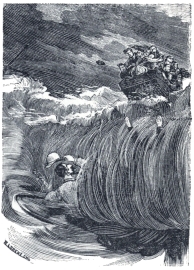
The children are delightful in this particular. French children do not
go about clamoring for the best places and sulking if they do not get
them, and talking in a rude, boisterous way. They do not take favors and
attentions as a matter of course and unacknowledged. The slightest
attention shown them is acknowledged by the sweetest kind of a bow—not
the dancing-master’s bow, but a genuine one—and the invariable “Merci,
Monsieur!” or Madame, or Mademoiselle, as the case may be.
I was in a compartment with a little French boy of twelve, the precise
age at which American children, as a rule, deserve killing for their
rudeness and general disagreeableness. He was dressed faultlessly, but
his clothes were not the chief charm. I sat between him and the open
window, and he was eating pears. Now an American boy of that age would
either have dropped the cores upon the floor, or tossed them out of the
window without a word to anybody. But this small gentleman every time,
with a “permit me, Monsieur,” said in the most pleasant way, rose and
came to the window and dropped them out, and then, “Merci, Monsieur,” as
he quietly took his seat. It was a delight. I am sorry to say that such
small boys do not travel on American railroad trains to any alarming
extent. Would they were more frequent.
And when in his seat, if an elderly person or any one else came in, he
was the very first to rise and offer his place if it were in the
slightest degree more comfortable than the one vacant, and the good
nature in which he insisted upon the new comer taking it was something
“altogether too sweet for anything,” as the faro bankeress would say.
And this boy was no exception. He was not a show boy, out posing before
the great American republic, or such of it as happened to be in France
at the time, but he was a sample, a perfect type of the regulation
French child. I have seen just as much politeness in the ragged waifs in
the Faubourg St. Antoine, where the child never saw the blue sky more
than the little patches that could be seen over the tops of
seven-storied houses, as I ever did in the Champs Elysées. One Sunday at
St. Cloud, where the ragged children of poverty are taken by their
mothers for air and light, it was a delight to fill the pockets with
sweets to give them. They had no money to buy, and the little human rats
looked longingly at the riches of the candy stands, and a sou’s worth
made the difference between perfect happiness and half-pleasure. You
gave them the sou’s worth, and what a glad smile came to the lips, and
accompanied with it was the delicious half bow and half courtesy, and
invariable “Merci, Monsieur.” One little tot, who could not speak,
filled her tiny mouth with the unheard of delicacies she had received,
and, too young to say “Merci,” put up her lips to be kissed.
THE DISGUST OF TIBBITTS.
Tibbitts gave some confectionery to her elder sister, a young girl of
eighteen, but she merely said “Merci, Monsieur,” and that was all. She
took the candy, but declined to kiss him, much to Tibbitts’ disgust.
Oh, ye thoughtless, heedless mothers of America, would that you could
all see these children and take lessons from their mothers. There is a
difference in people, and a still greater difference in children. Our
American Congress could well afford a commission of ladies to learn the
secret of training children, and a school for mothers should be
established in every city for their preparation for this important duty.
It would pay better than any monetary conference.
The French family is an unknown quantity. Monsieur, the husband and
father, spends his time at his café according to his quality, while
Madame the wife receives her friends, or admirers, if she be not too old
to have them, in her drawing-room. There are no homes in France, as the
English and Americans understand the word. It would drive a Frenchman
crazy if, when business hours are over, he should be compelled to eat
his dinner and afterward go up stairs, sit with his wife and children
quietly till bed-time, and then retire in good order. Likewise would it
be distasteful to the French wife. She may be in love—in fact, she
always is—but not with her husband.
A Frenchman once, who was too fond of the softer sex, pledged himself to
avoid women. Later he was asked if he had kept his pledge. “Certainly,
or rather partially. I have religiously avoided Madame; I can keep that
pledge always, so far as she is concerned.”
He meets his wife with, “Good evening, Madame. I trust you have had a
pleasant day.”
“Merci, Monsieur; very pleasant.”
He does not ask her whether she has been driving out with the children,
or with a lover; in fact, he does not care. He knows she has a lover,
but that is nothing to him so long as he himself sees nothing wrong.
And after dinner he bids her “Good evening,” and goes to his favorite
café, where he, and other similar husbands, save the country over
innumerable bottles of wine, and when the cafés are shut, and there is
no other earthly place to visit, he goes home and retires to his room,
only to meet Madame the next morning at breakfast.
This is not singular. The French girl is kept by her mother under the
strictest possible guardianship till she is of the age to marry. She
might as well be in a prison, for she is never out from under the sharp
eye of her mother, or aunt, or in default of these, a governess. Her
life, when she gets to be about fourteen, and begins to know something
of what life really is, and wants to enjoy it, is most intolerable.
MARRIAGE IN PARIS.
She is married in due time, but she has very little to do with it. A
husband is selected for her, and she accepts him scarcely knowing or
hardly caring who it is she is to wed, for she wants that liberty which
in France comes with marriage, and marriage only. She knows that a wife
may do that which a maiden may not—that matrimony means in France what
it does not in any other country—almost absolute freedom. Once married,
the mother washes her hands of her, considering that she has discharged
her whole duty by her child.

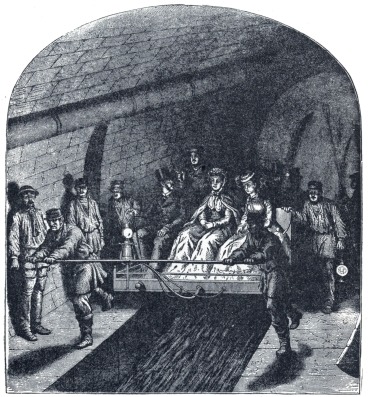
PARIS UNDERGROUND—MAKING THE TOUR OF THE SEWERS.
The whole idea of French matrimony from the girl’s standpoint is well
illustrated in the picture of the French caricaturist. Two girls are
discussing the approaching marriage of one of them. The bargained-for
girl exclaims lugubriously, “But I love Henri!” “Very good, my child,”
replies her elder and wiser friend, “you love Henri; then marry
Alphonse.”
Her marrying Alphonse made love for Henri possible. It was all there in
one small picture and two lines of print, but a page of small type could
not explain the situation more clearly.

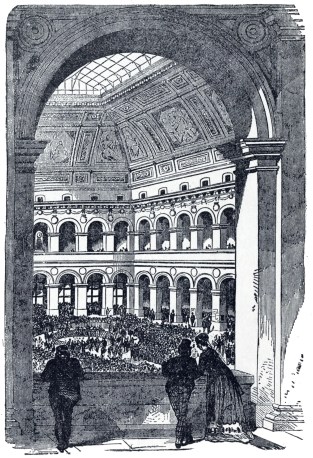
INTERIOR OF THE PARIS BOURSE.
BARGAIN AND SALE.
Marriages are arranged by the parents of the parties, and an exceedingly
curious performance it is. The girl’s parents actually buy her a
husband. The two old cats who have one a son and the other a daughter,
meet like two gray-headed diplomatists, and there ensues a series of
negotiations that would put to shame traders in anything else. The girl
has to have a dot, which is to say, a dowry, and the son must have
money or property settled upon him. The mother of the girl proposes to
give her one hundred thousand francs as the dot. The mother of the son
insists that it is not enough, and enlarges upon the perfections of the
young man. He is educated, he is polished, he is handsome, he is
amiable. He isn’t a brute who would make a wife miserable; not he.
Clearly one hundred thousand francs is not enough for such a paragon.
The mother of the girl strikes in. The girl is the handsomest in Paris,
and has had every advantage. She is a lady, and would make a desirable
addition to the house of any man in Paris; but finally she names one
hundred and ten thousand francs.
It will not do. “Mon dieu!” exclaims the mother, “you must remember I
have three other daughters to provide for, and the estate is not large.
If I give one hundred and ten thousand francs to one, what will become
of the others? There is reason in all things, even in marrying off a
daughter!”
And thus they haggle and haggle, just as though they were trading
horses, until finally it is fixed. The happy pair are permitted to see
each other; so much is settled upon the young man and so much upon the
girl, and they are married, and by the laws of France and the sanction
of the holy church, are man and wife. They are man and wife legally but
in no other sense.
Of course there can be nothing of love, or affection, or even esteem in
such marriages. Monsieur wants Madame to be handsome and accomplished,
precisely as he wants a handsome horse—it pleases his eye and gratifies
his tastes—but the main point after all is the dot. He has that
additional income to live upon. Madame desires Monsieur to be likewise
prepossessing, for she wants the world to believe that she married
something beside the title of Madame, though all the world knows better.
Each wants the other to be amiable, for even living separate, as they
do, they are necessarily under one roof, and bad temper on either side
would make things uncomfortable. Above all, they want no jealousy or
inquisitiveness. Each wants to be let alone; each desires to follow the
bent of his or her inclination, undisturbed and unmolested. And they get
up, doubtless, some sort of an esteem for each other, which may in time
ripen into something like what outside barbarians call love. But that
occurs, probably, after one of them is dead, provided the survivor is
too old to marry again. It looks well for a widow of fifty or sixty to
revere the memory of her dear departed, and they generally do it, no
matter on what terms they lived.


Of course they have children born to them, for there must be heirs to
the estate. Madame loves them very much, or appears to, but she sees
very little of them. She puts them out to nurse at once. Children are
tiresome and wearying to a woman whose day is divided into so much for
dressing, so much for riding, so much for eating, and so much for balls
or opera. She sees them and admires them, and when they are old enough,
marries them off. The father is pleased to see that Henri is growing
into a fine boy, or Marie into a fine girl, but he has his business and
pleasures to attend to, and besides, there is invariably some woman,
somewhere in Paris, that he does love, and she has children also. And so
the children grow up, Monsieuring their father and Madaming their mother
till they escape from under the paternal and maternal charge, only to go
and do the same things for themselves.
MARRIAGE IN LOW LIFE.
Curious notions “our lively neighbors, the Gauls,” as Mr. Micawber says,
have of domestic life. There is no such thing in Paris.
This among the upper classes. Jean and Jeannette, the baker and the
milliner, are not so particular about the dot, and for a very good
reason—neither of them or their parents have a sou to give more than
the wedding clothes and a holiday, with an extra bottle of wine on the
occasion of the wedding. They dispense with the dot, and, in very many
cases, with the legal and religious ceremonies, which are considered
necessary among other classes, and among all classes in other countries.
Having nothing else to marry for, they marry for love, and very good
husbands and wives they make. True, Jean goes to his café every night,
to save the country in his way, and Jeannette expects him to, but as
they do not inhabit large houses they are naturally brought closer
together, and, consequently, are more in sympathy with each other. Jean,
with two francs a day, even with the help of Jeannette, who may earn
quite as much, cannot afford the luxury of separate rooms or separate
beds. One answers them both, and not infrequently they have not that
one.
But with their cheap wine and their very cheap bread, and, above all,
their careless, happy-go-lucky dispositions, they manage to get along
very comfortably. So long as they can work, and they do work, both of
them, they live very well; and when sickness or old age comes there are
excellent hospitals to go to, and after that—why, the church has fixed
their hereafter, and so everything is smooth with them.
Poverty has its uses, though, desirable as it is, I find I can get on
with a very little of it. I firmly believe that in time I could accustom
myself to riches, and really enjoy myself. But it may never be.
Madame, the faro bankeress, is at the same hotel with us, and is getting
on famously in French. This morning at breakfast—she calls it
“dejuner”—much to the waiter’s astonishment, she ordered “café
o’lay—with milk,” and at dinner, “frozen champagne glace,” never
knowing, poor woman, that café au lait means, simply, coffee with
milk, and champagne glacé is simply chilled champagne. But it did
nobody else any harm except the waiter, and it pleased her. She
remarked to the other lady that she was sure she would have no trouble
in getting along—which she would not, as the waiter, being an
Englishman, could understand even her English, except when she plunged
too much into French.
“Have you been to the Louvre?” asked the other lady, or the lady, to
be accurate.
“Oh, no, not yet. I have no doubt it is altogether too sweet for
anything, but I have not had time. I dote on art. But I have found a new
place where you can get such lovely laces, for almost nothing, and
another where silk hosiery can be had for less than half what you have
to pay in New York. And I bought such a lovely dress for Lulu, a pearl
silk, with such a lovely waist, and an embroidered front, with roses
embroidered in the skirt. It is just like the one she wore at the
children’s ball, at Mrs. Thompson’s, last Winter, which cost me more
than twice what this one did and wasn’t half so nice. But Lulu looked
altogether too sweet for anything in that, though, and everybody at the
ball was in perfect rapture over her. And then I bought a sweet suit for
little Alfred, my youngest child, nine years old. It is such a perfectly
sweet little pair of pants with a waist that buttons on just lovely, and
with red stockings and purple shoes he will be altogether too sweet for
anything. They will fit, for I have the measure of both the children
with me. I have found out that when one travels to see nature and
things, one ought always to be prepared. That’s why I brought their
measure with me.”
At this point the husband of the other lady, who could not help hearing
all this, as he had for many weary days, told me an anecdote like
this:—
“A young man with a very bad voice, but who firmly and steadfastly
believed that in the article of voice he was the superior of Brignoli,
engaged a teacher to give him lessons. When asked how he liked his
teacher his reply was that he was a good master, but he was altogether
too religious for him.
“How too religious?”
“Why, while I am practicing, he walks up and down the room wringing his
hands and praying.”
“What is his prayer? What does he pray about?”
THE STRATEGY OF TIBBITS.
“I can’t exactly say, but I caught the words, ‘Heavenly Father! how long
must I endure this?’ There was doubtless something the matter with him.”
There was no necessity for him to point to the moral of this, for the
stream of gabble flowed on in a smooth and continuous flow, finding no
rocks of thought to give it picturesqueness, or no impediment of fact to
make it pause. It was simply the wagging of a tongue that was hung on a
swivel in the middle—a tongue which would wag so long as the lungs
furnished breath and the muscles that moved it held out. Inasmuch as she
has pleasant rooms and likes the hotel, and will not move, we are going
to find another. But probably we shall find another just like her at the
new place. They are the people who delight in travel and are everywhere.
Tibbitts has made the acquaintance of a wholesale liquor dealer, who is
going to “do” Switzerland, and Tibbitts has determined to join him.

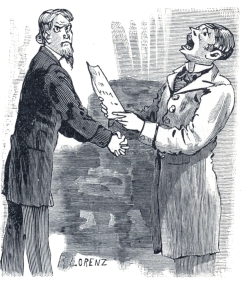
“HOW LONG MUST I ENDURE THIS?”
“Why join a wholesale liquor dealer?”
“With an eye solely to the future. In the coming years what may happen
to me? Will it not be handy to drop into his place, and, after remarking
about the weather, say, ‘Thompson, do you remember it was just five
years ago to-day that we climbed Mont Blanc? And do you remember when
you gave out at the foot of the first glacier how I pulled you up?’ Or,
‘What day of the month is this? 16th? Yes; exactly six years ago to-day
we were skimming over the Brunig Pass, on our way to Lucerne.’ Then he
can’t do less than to ask me to take something. And then we will sit and
sit, talking over our European experiences and drinking his liquor. I
shall live very near his place, so as to have it handy. It is a
provision for a doubtful future. You are altogether too careless about
such things. You haven’t common prudence. A man who in his youth do’n’t
lay up provision for his old age is very reckless indeed. I count the
association with this delightful man as good as half my living all my
life. I shall try to strike a merchant tailor after I have fixed myself
in this man’s memory, and after that, if I stay long enough, a boot and
shoe man. The past is safe; the present I am satisfied with. What I want
now is an assured future. Then I am heeled.”


CHAPTER XIX.
THE PARISIAN GAMIN.
PARIS has one institution possessed by no other city in the world—the
genuine street Arab. London has, heaven knows, enough homeless waifs,
born the Lord only knows where, and brought up the Lord only knows how;
but the London article is no more like the Parisian than chalk is like
cheese. The New York street boy comes nearer it—New York is more like
Paris than any other city—but even the New York Arab is not to be
compared with the Parisian. He stands alone, a miracle of impudence,
good nature, self-possession and resource.
Where he was born he never knows and never cares. He don’t carry his
pedigree in his pocket, not simply because he has no pocket, but because
he don’t care a straw about it. It doesn’t concern him. He would not
give a sou to be the son of the late Emperor. Birth and blood concern
him very little. What his mind is running on, chiefly, is where and how
to get a crust of black bread, a draught of very cheap wine, and a dry,
warm place to sleep.
His mother was, and is, a seamstress, or a house servant, or woman of
all work, or a shop girl. His father—well, it is doubtful if the mother
could give any very definite information on that subject. She may have
been a true daughter of Paris, or she may have come from the delicious
valleys of Normandy or Brittany, or the mountains of Switzerland, with
her heavy shoes, her quaint bodice, and her long, braided hair hanging
down her shapely back. She got work, she wrought in a clothing
warehouse, or she went behind a counter; then came the balls in the
Latin quarter (it is a part of the nature of the girls of this country
to love lights and glitter and dancing, and the like); then appeared
the student with his half-polished brigandage, and then began the life
of a grisette. They lived together till the student was called home, and
he went back to his native country to marry and settle down into
respectable citizenship, forgetting entirely the poor little girl he
left behind, and the wee baby she had borne him.

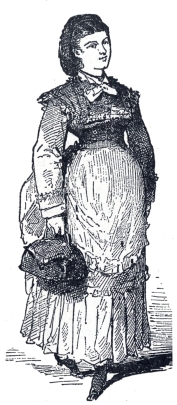
THE MOTHER OF THE GAMIN—AS SHE WAS.
But whoever his father might have been he never saw him that he
remembers, and he has a very indistinct idea of what a father is.
The uncertainty of fatherhood in Paris is illustrated by the grisette
who was walking with her little boy. A funeral procession was passing:—
“Who is it that is dead?” asked the boy of his mother.
“I do not know, but take off your hat, my child. It may be your father!”
It was not unlikely. I don’t think this ever happened, however, for in
France, every one removes his hat while a funeral passes. They are
polite to the dead as to the living. Besides this, the boy had no hat to
remove.
THE MOTHER OF THE GAMIN.
He knows his mother, however, very well; he remembers a pale, worn
woman, who always gave him the largest half of the scant bread, and
assuaged her hunger by seeing him eat, and who managed somehow to keep
the rags that hung about him clean, and had hidden somewhere, a neat and
tidy suit of clothes which were worn only on fête days, and when they
went to church. No matter about the father, since every boy knows who
his mother is, and he knows likewise that whatever may happen to her, he
is sure of all she can possibly do for him, even to the last, the
supreme sacrifice.
They lived together in a garret, somewhere, or a cellar. With these
people it is always one extreme or another,—they never have the middle
of anything.

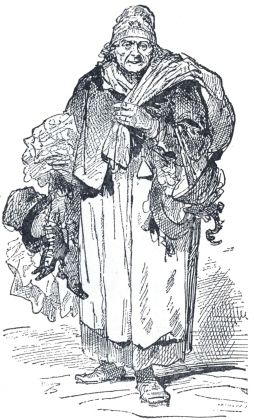
THE MOTHER OF THE GAMIN IN THE SERE AND YELLOW LEAF.
Somehow she managed to make the little den they existed in rather
pleasant, and he had a tolerably happy life. Only the mother was
compelled to leave him very much alone, for there was the black bread to
earn, and no matter how miserable their apartment, there was something
to pay for rent. He was left, always, with a score of others just like
him, with an old woman who had once gone through the same experience,
and who, unable now to do other work, earned her few sous a day caring
for children that were short a father, and whose mothers were
skirmishing on the outside borders of existence for enough to keep body
and soul together. This was all very well till the little legs were
strong enough to walk, and the old woman could no longer control him.
Armed with the

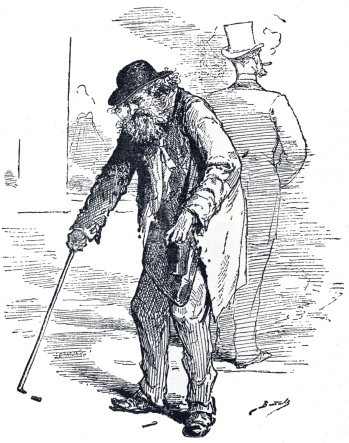
THE AGED PICKER-UP OF CIGAR STUMPS.
THE GAMIN AND HIS MOTHER.
preternatural sharpness that always accompanies poverty, he took to the
streets, and, in the old times when begging was permitted, he was a
beggar. Now he is anything. He scorns regular work, he is a hawk, who
picks up his living here, there and everywhere. He may be on the
boulevards, and a handkerchief may be dropped; the apple-women, sharp as
they are, find in him a most competent brigand. There are cigar-stumps
to be picked up, and they are worth something an ounce to be worked
over into smoking tobacco. Everywhere in the great city there are
unconsidered trifles, but an unconsidered trifle is everything to a boy
who has no use for clothing, and to whom a crust of bread is enough for
a day.
Finally, at the mature age of eight, or thereabouts, he leaves his
mother; or, rather, some night he does not come home. He has found a dry
place under an arch to sleep, or a hole in the docks, and he has
associated with him other boys of the same breed; now he is an
independent citizen.
His mother knows the way of the world, and she goes right on, sure that
her child is living, and, in his way, well.
He occasionally goes to see her, till she moves some time suddenly, and
is lost to him in the great desert.
He probably never sees her again. If she gets on well and keeps her
health she dies finally in a hospital—if not, a plunge in the Seine
ends her struggles with a very hard world. Not infrequently his last
look at her is taken in the Morgue.
While he is a boy he leads a very independent and happy life. He toils
not, neither does he spin; he does not dine at the Maison Doree; nor
does he drink champagne or burgundy. He drinks wine when he can get it,
and water from the public fountain when he cannot. He eats black bread
when he has a sou to buy it with; lacking the sou, there are always
opportunities to steal an apple, and failing in that, there are apple
cores to be picked up on the streets.
As for clothing, very little does him; very little, but where he obtains
that little, I have never been able to ascertain. He gets it, though,
somehow, each article in the suit coming from a different source, and
all just strong enough to hold together. A picturesque vagabond it makes
of him.
His conversation is something wonderful. There isn’t a slang phrase in
French that he has not, and as the mothers are of all nations, he has
made piratical excursions into other languages, and has the worst of
them all. He can swear very well in English, not the unctuous, brutal
oaths of the American or Englishman, for even a Parisian gamin has
taste, but English oaths lose none of their strength in him. He
ornaments them, but not to the degree of weakening.
No Frenchman would ever think of chaffing a gamin twice, for he knows by
bitter experience that the gamin always gets the best of it, and the
first and last time he tried it he retired with everybody laughing but
himself and the boy. He did not laugh, because the boy had routed him,
horse, foot and dragoon—the boy did not, because to have laughed would
have been undignified, and lessened the effect of his wordy victory. He
professed to sympathize with his victim, which was adding insult to
injury.
In this matter of talk the very cabmen are afraid of him, and the
policemen dread him. It is his delight to catch a policeman or a soldier
in a position where he cannot move, and to cover him with not exactly
abuse, but what the English call chaff. He makes the poor fellow
ridiculous; he sets a crowd laughing at him, and does it in perfect
safety, too, for the official cannot leave his post to capture and
punish him, and if he could it would do no good. The urchin is as
slippery as an eel, and as fleet as an antelope. He can slip through the
crowd and be a safe distance long before the encumbered man has made up
his mind to go for him.
These boys make up no small portion of every mob that has devastated
Paris for centuries, and popular risings are altogether too common for
comfort in that excitable city. In all the revolutions these little
fellows have handled muskets and pikes, and made much of them. The gamin
was foremost in the mob that leveled the Bastille to the ground, and
when that monument of irresponsible tyranny was in ruins the dead bodies
of hundreds of them were found underneath them, and the living bodies of
hundreds of others waved their crownless hats over the smoking debris.
There never has been a barricade erected that had not gamins behind it,
boys of fourteen, fighting as coolly and steadily as grizzled veterans
of sixty.
AN INTERVIEW WITH A GAMIN.
They knew not what they were fighting for, nor cared. They only felt it
was the people against the recognized authorities, and that was enough.
The Parisian gamin hates the authorities, for his chief idea is that the
name means a prison, police, and everything else that a brigand in a
small way don’t like. He loves commotion, for commotion signifies
excitement, and excitement is as necessary to him as bread itself. He
will stand behind a barricade and load and fire as long as the oldest
man, and, firing with a musket, he is as good as a giant.
There are theaters which he patronizes regularly, for next to a
revolution he loves the theater. Where he procures the money for
admission, small as it is, heaven only knows; but he gets it somehow,
for he is there nearly every night. If he cannot get in at the
beginning, he hangs about the entrances, waiting for some good-natured
man, who does not care to see the performance out, to give him his
check, or he wheedles a good natured doorman into letting him pass. And
once in, there is no adult in the audience who is so critical an
auditor. He knows all about the drama, all about the music, and all
about everything connected with it. He applauds at the right place, and
if there be the slightest fault of omission or commission in the
representation, his hiss is the first and the most distinct and deadly.
The Parisian actor dreads the gamin almost as much as he does the
newspaper critics. They have made and unmade many an aspirant for public
favor.
I gave a sou to one for the privilege of a minute’s conversation. (I had
a friend to translate—a street boy would not understand my French.)
“Where were you born?”
There was a comprehensive wave of the hand which took in all Paris. He
might have been born all over the vast city.
“How do you live?”
There was an expressive shrug of the shoulders that meant anything you
chose.
“What are you intending to do when you are older?”
Another expressive shrug, as if to say “Who knows?” (These French boys
can talk more with their arms and shoulders than other people can with
their tongues.)
But when he saw the sou in hand he had expression enough all over him
for a dozen boys. He took it with the invariable “Merci, Monsieur,” and
darting away, in a minute re-appeared with a loaf of black bread, and
was as willing to be communicative as you desired.
All that could be gathered from him was that his mother was a
washerwoman, his father the Lord only knew, and he had been living on
the streets as long as he could remember anything. That was all. That
was his beginning—his end was in the hands of fate; possibly one thing,
and possibly another, but, one thing or another, he had bread enough to
last him twenty-four hours, and he was more happy than many a man in a
palace.
They are ubiquitous, and all alike. Their being all alike is what makes
them ubiquitous. You see him on the boulevards—you dive down from those
dizzy heights of splendor, from the broad glare of that magnificence, to
the poverty-made twilight of the Latin quarter, or the Cimmerian gloom
of the Faubourg St. Antoine, and you see him.
Just the same. He wears the same reminiscence of a hat, the same
remnants of trowsers, the same shirt with holes torn in it in the same
places, the flag of distress floats from the same quarter, if, indeed,
the shirt is long enough to boast a lower end, and the bare feet in the
summer, and the dilapidated shoes in the winter, are the same. It is not
the same boy, but it is the boy cast in the same mold, and with all the
others, subject to the same conditions, and consequently exactly like as
peas.
Nature makes men in molds. Noblemen’s sons have something in their
make-up besides their clothes, and so have the children of poverty. A
pallet in a garret, or, more usually, the bare floor; a crust, or the
core of an apple at rare and uncertain intervals, are as certain to
produce one typical face and a typical body as luxurious beds and rich
food do another.
WHAT BECOMES OF THE GAMIN.
The Parisian gamins are alike wherever you see them, for they all come
from one stock, and are all brought up in one way. So nearly are they
alike that the old saying might well be reversed. Instead of its being
“It’s a wise child that knows its own father,” it should read “It’s a
wise mother that knows her own child.” With these waifs, a child’s
knowing, or even guessing, at its own father, would be an idea utterly
chimerical.
Yet they are good-natured, and even kind to each other. There are girl
vagabonds and girl waifs as well as boy waifs. The boys are wonderfully
good to the little homeless girls who are too Arab-like to go to the
retreats provided for them by the Government. If the boy has a warm
place under a bridge or over a lime kiln, he gives it up to the
wandering female rat, with as much chivalry as any grand Seigneur could
display, and he shares with her the result of his predatory excursions,
even going a trifle more hungry himself that she may not entirely
starve. They are always hungry—it is only a question of how hungry they
may be.
What becomes of them? I don’t know. Sometimes they get into other ways
and grow into respectable citizens. Occasionally one of them is
sufficiently tamed to learn a trade, if some citizen picks him up and
cares for him, and now and then a street boy or girl drifts, by
accident, into a profession and becomes eminent. The great French
actress, Rachel, was a street girl, whose only fortune was her guitar,
and whose living was made by singing in front of cafés. By hook or crook
she got upon the stage, and once there her genius made her way for her.
The Frenchman cares nothing for birth or position in the matter of
genius. He wants good singing and good acting, and he cares not whether
the singer or actor comes from the gutter or the palace. If from the
gutter, the genius which delights him removes the slime, and he does it
even greater honor than as though it had been pushed by more favorable
circumstances.
Rachel not only made a world-wide fame, but she raised her family, all
of whom were as poor and low down as herself, to the very heights of
French grandeur. One of the Felix girls—that is their name—is now the
wealthy and prosperous manufacturer of a face powder, which is the
delight of the upper classes. With the shrewdness of the Israelite, she
did not go into groceries or such trifles. She knew the French people
too well. She invented a face powder and hair restorative, and waxed
rich. She will marry her daughters to noblemen, and possibly Kings may
spring from a line that once was delighted with a sou thrown into the
gutter for them to scramble for.
One of the great chocolate manufacturers, whose name is known wherever
there is civilization, who counts his residences by the dozen, and his
wealth by millions, was a gamin till he was eighteen.
Some of them, like Rachel, from their intense love of the drama, get to
be actors, when they are old enough. Some of them become rag-pickers, or
work into other employments of a semi-vagabondizing nature; some of them
become thieves, and take in all the range of crime from picking a pocket
to committing murder, and numbers of them go into the army and navy.
But these instances are comparatively rare. The gamin grows, as a rule,
into a vagabond, the vagabond into a criminal, and the criminal either
ends at the guillotine or in the prison hospital. A lucky chance may
graft something better on them, or a revolution may afford them
opportunities for distinction in a military way, but those so promoted
are exceptions. The rule is quite the other way.
In New York these human rats sell newspapers, clean boots, and do things
of that nature, nominally. The genuine Parisian gamin might do this, for
there are papers cried and sold on the street, though the most of this
trade is transacted in picturesque little buildings called “Kiosques.”
But he will have none of it. Should he labor or do anything approaching
labor, he would lose caste with his fellows, and become to them a social
pariah.
One important specimen of the kind, nine years old, and weighing,
perhaps, fifty pounds, saw a former member of the fraternity, who had
seceded, passing with packages to deliver, neatly dressed, and with a
general air of being well cared for, and comfortably fed and housed.
THE SECEDING GAMIN.
The ragamuffin looked upon him with an expression of contempt never
equalled off the stage, and he called the attention of a score of his
ragged comrades to the seceder:—
“Look at him! just look at him! He has got to be a baker’s boy! Poor
devil! Poor devil! He has clothes, he has a cap on his head, and shoes
on his feet. He sits at a table with the maid, and eats three times a
day, and has a bed to sleep in! He will never more be one of us! He is
ruined! Poor devil! Why can’t everybody have spirit? Bah! A bed to sleep
in, and regular meals!”
And the mob of ragamuffins jeered and hooted at him as he passed, and
the boy himself looked as though he had been a traitor to his class, and
as if he had half a mind to confiscate the bread he was carrying and
return to his former fellows.
The young bundle of rags felt all that he said. To him this desertion
from a life of vagabondage was a betrayal, as it were, and he felt,
actually, a supreme pity for the gamin who could be anything else for so
small a consideration as a comfortable life. To him the liberty of the
streets was better than any house that required regularity. He would not
have dined at the Grand Hotel if it required his coming at regular
hours.
And after venting his opinion he went out in search of something to eat,
and if he found that something he was happy—if not it was a shrug of
the shoulders, and to sleep an hour or two sooner. They have a trick of
making a dinner upon an hour or two of sleep, and an enjoyable breakfast
by not waking up till dinner time. It is an economical way of living,
but not conducive to increase of flesh. How long they can stand it has
never been determined, for, not regarding the interests of science, they
always manage to find a crust, or a bone, or something, just as the
experiment is getting to be interesting. None of them have ever been
willing to die in the interest of science. They are largely devoted to
themselves.
The gamin of Paris is deserving of more credit than the gamin of New
York, for he has nothing especially cheerful before him. When he ceases
to be a vagabond boy he becomes a vagabond man, except in the rare cases
I have mentioned, and ends his career, as vagabond men do, the world
over.
In New York the ending is quite different—indeed the vagabond boy has
better opportunities than the good boy. For in New York he loafs about
gin mills, and he has the advantages of free lunches, an institution
unknown in Paris, and the good old ladies get up excursions for him, and
give him sandwiches and ice cream, in the hopes of reaching his better
nature through the medium of his stomach, they firmly believing there is
a better nature, and as it has never been seen it must be in the
stomach. In time he grows up and gets as far along as to have that
blessed boon of the ballot, and becomes useful to the politicians, who
transfer him from the front of the bar to the back of it, and he has a
gin mill of his own, and controls votes, and “hez inflooence in my
warrud.”
When his “inflooence” is sufficient, he boldly demands office for
himself and becomes a School Commissioner, or an Alderman, and finally
goes to the Legislature and waxes enormously rich, and his wife—for
this sort of a fellow marries when he gets off the streets and has a gin
mill of his own—wears diamonds and has a carriage.
It was Teddy McShane, and Mickey O’Finnegan, two of this class, who got
into the Board of Aldermen of New York. Alderman McShane had heard of
gondolas and wanted a few in the little lakes in the park, for, of
course, had his motion prevailed he would have got his commission from
the builder thereof. And so he spoke:—
“Misther Prisidint—We cannot be too liberal in ornamintin’ our parruks.
A parruk is for the paple, and they should be ornamintid. To this ind, I
move ye sorr, that twinty gondolas be purchast for the lakes in Cintril
Parruk to-wanst.”
Alderman McFinnegan, who saw a job in this, decided to oppose it till
McShane should come to him and propose a divide. And so he said:—
“Misther Prisidint—No man in New Yorrick will go furdther in
ornamintin’ the city than mesilf; but the paple’s money musht not be
squandered. Why buy twinty gondolas, to-wanst? Why not buy two—a male
and a faymale, and breed thim ourselves?”
A CONTENTED BEING.
The Parisian gamin can do nothing of this kind—indeed, it is impossible
in Paris, and he would not want to do it if it were possible. He does
not care for money; he does not long for houses and lands or a fixed
habitation. If he had the best house in Paris, with silken beds and all
that sort of thing, the second night he would steal away and sleep
comfortably under an arch, or in one of his accustomed places. He is
very like one of the chiefs of the Onondaga Indians, who was persuaded
to build him a house in the civilized fashion. He slept in it one night
and the next morning broke every pane of glass out of the windows. That
night he slumbered with the rain and sleet pouring in upon him, and was
happy. That was something like.
The Parisian gamin, grown to be a man, could not sit still long enough
to make an efficient Alderman, and he would not give a turn of his hand
for all the money that could be made out of the position. He can be
happy with rags and a crust, and what is money to such a being? He
understands better than any philosopher, that riches consist in not how
much you have, as how little you can get on with. If rags and apple
cores suffice, why more?
And so he doesn’t go about speculating in stocks, and getting “politikle
inflooence,” as his counterpart in New York does, but he is content with
what he finds himself. No one ever heard of a Parisian grown-up gamin
attempting to control railroads, or build steamships, or anything of the
sort. He dies as he lived, and is always happy. Possibly he is the wise
man. Who shall say?
But he is a part and parcel of French civilization—a natural outgrowth
of French habits and customs. Without the gamin, Paris would not be
Paris. Bad as he may be, he is always like Artemus Ward’s kangaroo, “an
amoosin’ little cuss,” a perpetual mystery, an everlasting study, and
something that no other city in the world possesses. He can live on less
and get more happiness out of it than any other human being on earth;
but he could not exist out of Paris. He had rather be in prison in Paris
than to have a palace anywhere else. He belongs to that atmosphere, to
those surroundings, and can exist nowhere else in the world. He is a
savage in the midst of the highest civilization, a drone in a hive of
industry, and hungry in the midst of plenty. He is everything that he
should not be. Nevertheless, I rather like him, to say the least. He is
picturesque.
CHAPTER XX.
HOW PARIS AMUSES ITSELF.
THE average Parisian thinks of but two things—how to get the wherewith
to amuse himself, and how to get the most amusement out of that
wherewith. I doubt if he ever thinks of any hereafter beyond to-night.
His religion is admirably adapted to his nature. He is either a Catholic
or an infidel. If a Catholic, a few minutes at the end suffices to fix
him for the next world; if an infidel, death is annihilation, and
therefore he proposes to have as much enjoyment as possible out of the
present.
Paris would not be a good place for a series of revival meetings. The
Parisian would jeer at the exhorters, and say, “Go to!”
Paris supports seventy theaters, good, bad, and indifferent. It is not
fair to use the words “bad and indifferent,” with reference to the
quality of acting, for there is no bad acting in Paris. It is as to the
quality and material of the representations. They have all kinds, from
the gorgeous Italian opera down to the small and cheap affairs in which
burlesque comic opera of the funniest, and melodrama of the most lurid
character is performed, for the especial delectation of the lower
classes.
The theaters devoted to the melodrama are of the most melodramatic kind.
There can be no crime too horrible for representation, and the
situations cannot be too intense, or the plot too complicated. French
life, like French cooking, must have any quantity of pepper in it.
A MELO-DRAMA.
About the least thrilling situation that would be considered good in
these theaters would be the chopping up of the villain’s grandmother,
and the roasting alive of a parcel of illegitimate children, to hide
the consequences of a “damning crime.” There is always any quantity of
blowing up of towers, of stabbings and shootings and bludgeonings, and
all that sort of thing. There are secret passages in ancient castles,
and paid cut-throats, and blue lights, and heroines with hair hanging
down their backs, and everything pertaining to what in America is known
as the “blood and thunder drama.”
One that I saw reminded me of an incident that happened at home many
years ago. In a village in which I was residing, there came the usual
strolling company of players of the olden time, the sad-faced men and
wan women, who knew by actual walking all the various roads in the
United States, to whom a good house would be a novelty that would make
them uncomfortable. They had played to empty benches so long that they
could not do well if living people occupied the seats.
I was fond of the drama, and the variety that we had there was better
than none at all; so that I always patronized the strolling companies,
attended invariably by a German physician who was quite as fond as
myself of theatrical representations, and who, like myself, preferred a
half loaf to no bread. We went together that night.
The play on the occasion was that cheerful drama from the French, “La
Tour de Nesle.” The plot is variegated, to say the least. Margaret of
Burgundy is afflicted with a desire for lovers, and she has a tower in
which she receives them and holds her orgies. It is a pleasant thing to
be invited to sup with the fair Margaret, while the supper lasts, but
the pleasure doesn’t hold out. It is not continuous. For when you have
bidden her good-evening, and get your hat on, you come across a trap
door on which you step, and you go down several hundred feet, and alight
on spikes situated conveniently in a bed of quick-lime, and your friends
never know what has become of you; and if your life is insured there is
always trouble about that, for there can be no proof of your death.
Margaret loved amusement, but, for reasons, she desired no living
witnesses of her escapades.
She fell in love once with a captain in the French army, one Buridan,
and invited him to one of her little receptions. The disappearance of
so many of her gallants had made the youth in the neighborhood rather
wary of her, and Buridan was advised not to go, and good reason was
given. An intimate friend of his had disappeared mysteriously a little
while before, and the last that was ever heard of him was when he
entered the tower.
Hearing of this, Buridan determined to go anyhow, and find out whether
this friend had really dropped out of the way, via the tower. He went
and supped with the fair Margaret, with whom he fell in love in the
regular French fashion. For reasons of her own, Margaret did not want
him to take the regular walk over the trap-door, but desired to let him
out another way. All would have been well had not Buridan discovered,
inopportunely, that his friend had been in the same room, and had
stepped on and gone through the trap, and that the lime had finished
him. Margaret confessed it, whereupon Buridan drew his sword and killed
her to avenge his friend. Before Margaret passed out she informed
Buridan that he was her son! Buridan then immediately killed somebody
else, and that one, before dying, stabbed another, and so on, till the
entire company, fifteen in all, were piled upon the stage like
cord-wood, which ended the play, there being no living actors to
continue it.
My friend, the German physician, rose and remarked:
“My frendt, dere ish shoost one ding lacking to make dish blay gomplete.
Der beople on der stage ish all deadt. De first violin shood now stab
der second violin mit his bow, and gommit soocide mit himself by
schwallowing his fiddle. Dot wood endt de entire gompany.”
As we were leaving the hall a young man named Smith, who was always
blatting about art, and music, and the drama, and such things, having
been in New York once, seized the doctor and said, “Was it not a good
performance? There is power in this company. Have you anything better in
Germany?”
The doctor looked at him pityingly.
“My tear young man, you are not to plame. I pity you. When de Almighty
rained common sense, de Schmidt family all shtood unter umbrellas.”
THE GRAND OPERA.
“La Tour de Nesle,” as lurid as is its plot, would be mild meat for the
frequenters of the minor theaters of Paris. They would insist upon
seeing the actual trap-door, and the lovers of Margaret falling through
it, and I am not sure but what they would demand real spikes and lime.
You pay enormous prices in the one class and next to nothing at the
other; but in both the standard of performance is a very high one, and
is rigidly maintained. The Parisian, gamin or marquis, will have no bad
music or acting. He may tolerate adulteration in his food, but none in
his amusements.
It was always the policy of the French government to see that the people
were sufficiently amused, and also to do every thing possible to attract
strangers to the gay capital. Therefore, the theaters are the most
gorgeous in the world, and as it would be impossible to maintain them
from the admission receipts, the deficiencies are made up from the
public treasury. The Grand Opera receives from the government nearly two
hundred thousand dollars per year, and a number of other theaters
receive like support, the entire amount thus paid aggregating something
over six hundred thousand dollars per year. The citizen who may never
see the inside of the Opera House is content with this, for it attracts
to Paris the foreign sheep whose fleece is his living. Without the Opera
the rich American would not come to Paris, and then what would trade be?
The Parisian shopkeeper pays that tax willingly; and they pay their
artists well, so as to have and keep the best. Any eminent tenor has a
salary of twenty to twenty-five thousand dollars per annum; and other
talent in proportion. It is not a bad thing to be a tenor in Paris. The
salary is very comfortable.
In addition to the regular theaters there are numberless open-air
concerts and variety performances in gardens, the spectators sitting on
benches on the sand, the stage only being covered. These are always
brilliantly lighted, and most artistically and profusely ornamented, and
as attractive to the Parisian as to the stranger.
There is no entrance fee to these places. You wonder at the liberality
of the proprietor, and say to yourself, if you could only find a hotel
with similar views, you would immediately remove to Paris, and make it
a permanent residence. But once inside, you find a pang in store for
you. The free entrance is merely to evade some ordinance or other, and
you are required to purchase refreshments, and no matter what it is, an
ice or a glass of beer, the price is the same, three francs, or sixty
cents, which makes really a high admission, even for Paris. It is the
same as though a landlord should make no charge for his rooms, but
compel you to pay two dollars for the privilege of getting into bed.
Nowhere can something be had for nothing, and the more liberal it is at
the beginning, the dearer it is at the ending.
But the chief delight of the middle and lower class of Parisians is the
ball at night. There are scores and scores of gardens in every part of
the city, immense enclosures, with a magnificent orchestra in the
center, in which the Parisian dances and dances, seemingly never tiring.
He stops now and then for a glass of wine, or the non-exhilarating syrup
with which he lights his soul and ruins his stomach, if he has soul and
stomach, but he seems to regret even this loss of time. The women are
even more intoxicated with the dance than the men. A man may stop a
minute and be easy, but the women chafe under the pauses in the music,
and are impatient to be in motion.
There are gardens for the very poor, where the admission is a sou, or
such a matter, for the men, and nothing for the women. The grounds
outside are rather diminutive, and the ornamentation somewhat scanty,
but the dancing floor is there and the orchestra likewise, and the
blouses and calico enjoy themselves as thoroughly as the broadcloth and
silk that frequent the higher priced places.
The Jardin Mabille, near the Champs Elysées, is the best known in Paris.
It has world-wide celebrity, and no foreigner, no matter of what nation,
ever leaves Paris without paying it, at least, one visit. It is a
wondrously beautiful place, gorgeously illuminated with colored lights,
and full to excess of trees, shrubbery, flowers and everything else that
is beautiful. There are long walks, tortuous labyrinths, tables
everywhere under trees, and it is filled with all sorts of attractions
to take money from the visitor.
THE WICKED MABILLE.
The foreigner goes there to see the peculiar dancing, of which he or she
has heard so much. The whole world knows of the can-can, and the whole
world has heard of the frightfully immodest exposure of person visible
at these bacchanalian orgies. I doubt if a youth ever left his native
home in America that his mother did not exact a promise from him that he
would not visit this horrible Mabille, which promise he gave, with,
“Why, mother, do you suppose I would go to such a place? Never!” And
then he went there the first time he was in Paris. He wasted no time.
Inasmuch as the Mabille has, ere these pages will be printed, gone the
way of the world (the ground has been sold, and is to be used for
legitimate business purposes), some little account of it is proper, even
though it is like embalming a fly in precious ointment.
Mabille was established in 1840 by an old and not very popular dancing
master named Mabille, by virtue of his age known as Père (Father)
Mabille. He purchased or leased a piece of ground on the Allée des
Veuves and the Champs Elysées, and built thereon a dance house.
Originally it was a dingy structure and the admission, male and female,
was only ten sous. It prospered, for it was the resort of the doubtful
classes who always pay.

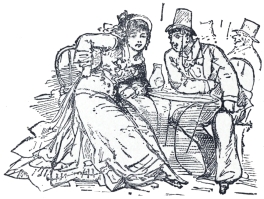
A MABILLE DIVINITY AND THE IDIOT WHO PAYS.
The sons of Père Mabille took the money the old gentleman had saved, and
enlarged it. They substituted gas for oil; they enlarged and decorated
the grounds; they planted shrubbery and introduced decorations; they had
better music, and made it the resort of the better, that is, richer
class of the demi-monde, the wild Bohemians and that enormous class in
Paris who live from hour to hour like butterflies.
Then commenced its prosperity. It became the fashion among all classes.
The rich and aristocratic went there to get the dissipation that more
correct amusements would not afford them; the foreigners flocked thither
in droves, for the Jardin Mabille was one phase of Parisian life which
must be seen, and every girl who wanted to display her charms and graces
in a way to excite attention, chose Mabille as the stage upon which to
make her essay.
Enter a girl from the Provinces of any peculiar type of beauty, any
especial beauty of face and figure, with the wit and boldness for the
venture. She danced at the Mabille. Some rich or notorious debauchee
picked her up at once, and made her the fashion. He gave her carriages,
costumes, palaces. Poets, who are never so divine as when a responsible
spendthrift inspires them, sang the beauties of the new sensation, and
all Paris talked of her. Of course she did not dance at Mabille after
she had made her conquest—Mabille was her opportunity.
HARRIET BEECHER STOWE AT THE MABILLE.
They lived their brief existence, they were attired like the butterfly
while they lived but, alas! they died as does the butterfly.
Originally it was the resort of the middle class of Parisians, who
worked for their living, clerks, students, and that class, and
grisettes, and the women who skirted the edges of decency. The dances
that made the place famous were born of the natural extravagance of
feeling that possesses these classes of Frenchmen, and they were done
with an abandon which their paid imitators never rivaled. It was
grotesque, wild and suggestive, but it was genuine. If Finette flung
herself into a position that procured applause, Marie would excel her or
die in the attempt. These people, forty years ago, did the grotesque
because it pleased them to do it—the paid dancers last summer were mere
imitations, and bad ones at that.
The proprietors encouraged this kind of thing, for in it was their
profit. And they engaged other women, not beautiful enough to become
sensations, but accommodating enough to stay in the place nights, who
were ready to endure the attentions of any man who had francs enough in
his pocket to afford it, and who, for their society, would pay ten
prices for refreshments; they getting their percentage regularly in the
morning.
We saw them by the hundred, each one with some wealthy idiot attached to
her, spending his money supposing that he was seeing “life.” He was, the
dirty end of it, and he was paying roundly for it.
Who went to Mabille? Everybody. Thirty years ago, Harriet Beecher Stowe
visited it, and described it as follows:
We entered by an avenue of poplars and other trees and shrubs, so
illuminated by jets of gas sprinkled among the foliage as to give
it the effect of enchantment. We found flower-beds laid out in
every conceivable form, with diminutive jets of gas so distributed
as to imitate flowers of the softest tints and the most perfect
shape. In the centre there is a circle of pillars, on the top of
each of which is a pot of flowers with gas jets, and between them
an arch of gas jets. In the midst of this is another circle,
forming a pavilion for musicians, also brilliantly illuminated, and
containing a large cotillion band of the most finished performers.
Around this you find thousands of gentlemen and ladies strolling,
singly, in pairs, or in groups. While the musicians repose they
loiter, sauntering round, or recline on seats. But now a lively
waltz strikes the ear. In an instant twenty or thirty couples are
whirling along, floating like thistles in the wind, around the
central pavilion. Their feet scarce touch the smooth-trodden earth.
Round and round, in a vortex of life, beauty and brilliancy they
go, a whirlwind of delight, eyes sparkling, cheeks flushing, and
gauzy draperies floating by, while the crowds outside gather in a
ring and watch the giddy revel. There are countless forms of
symmetry and grace, faces of wondrous beauty; there, too, are feats
of agility and elasticity quite aerial. One lithe and active dancer
grasped his fair partner by the waist; she was dressed in red, was
small, elastic, agile, and went by like the wind, and in the course
of a very few seconds he would give her a whirl and a lift, sending
her spinning through the air, around himself as an axis, full four
feet from the ground. It is a scene perfectly unearthly, or rather
perfectly Parisian, and just as earthly as possible; yet a scene
where earthliness is worked up into a style of sublimation the most
exquisite conceivable. Aside from the impropriety inherent in the
very nature of waltzing, there was not a word, look or gesture of
immorality or impropriety. The dresses were all decent, and if
there was a vice it was vice masked under the guise of polite
propriety.
It was different in the Summer of 1881. The dancers were professionals;
the poor, painted, broken down danseuses of the minor theaters, and the
male dancers were professionals, or semi-professionals, who came every
night and went through the same dreary performance.
Now it is no more. It existed forty years; poets have raved over its
habitues; women who made their debut on the treacherous surface of
Parisian life, survive only in their rhymes, and the visitor to Paris
next season will find in its place imposing structures devoted to trade.
It is well. The more trade and the less Mabille the better for the
world.
THE PROFESSIONAL DANCER AT THE GARDENS.
But the American youth who thought to have a bacchanalian orgie was
terribly disappointed, for there is nothing bacchanalian about it. All
he saw was the entire dancing platform occupied by waltzers, who waltzed
just as everybody does in good society, nothing more or less. Only after
each waltz comes the terribly immoral can-can, and the eyes of the young
American, or English, man or woman glitter with expected enjoyment.
Alas! they do not get it. The can-can is simply a quadrille danced by
two or more couples; there is no prompter, no set figure as I could see,
and nothing about it singular except the extravagant poses of the
dancers. They advance and retreat, not with the dignified walk-through
that the English speaking races affect, but more like Comanche Indians.
The male being who dances, always with his hat on, will indulge in the
most terrific leaps; he will twist his body into every possible shape
that the human body is capable of, and will do more grotesque work than
any pantomimist on any stage. He twirls, he twists, he leaps, he dances
on one foot, and then on the other. He throws his body into the air in
all sorts of shapes; he squats, he lolls his tongue out of his mouth, he
makes play with his hat, he puts it back on his head, either at the back
or over his eyes; he springs and knocks his feet together; all without
system or design, but always in time with the music. It is not the
poetry, it is the delirium tremens, of motion. It is such a dance as one
might expect to see in a lunatic asylum containing only incurables.

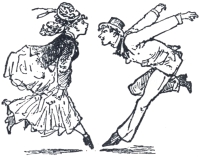
PROFESSIONALS IN A QUADRILLE AT THE MABILLE.
As an exhibition of absurd posturing, it is always a success; as a
specimen of dancing, as we understand dancing, it is anything else. But
for just once it is amusing. As between seeing it every night and
serving an equal time in the penitentiary, I would unhesitatingly choose
the penitentiary. The human body is a thing of joy when naturally
carried, but you do not want too much of it in the can-can.
The women are, it must be confessed, a trifle freer. They will kick a
bystander’s hat from his head, and in some of the movements there is a
very free exhibition of leg; that is to say, if the leg be shapely. I
noticed that the ladies whose general contour suggested pipe-stemmy
support were as modest about their displays as though they had been
nuns, and I fancied I could detect a shade of anguish pass over their
faces as they observed the shapely proportions of their more favored
sisters.
But be it known that the especial dancers, those who do these
extraordinary leaps and contortions, are such by profession, who get so
much per night, the same as at any other theater. This style of dancing
was always in favor in Paris among the people, and the proprietor of
the place, finding that it attracted strangers, reduced it to a system.
He hires a certain number of dancers, the same as he does his orchestra,
and these set the fashion for the citizens who indulge in terpsichorean
gymnastics.
You can easily detect the professionals. They come on the floor at
regular intervals and do their dreary performance coolly and in a purely
professional way, without any more emotion than they would manifest in
combing their hair.
I do not know what it might have been in other days, but at present
writing it is about the tamest place I know of. I overheard this
conversation between two young ladies one morning:—
“Mary, dear, where did you go last evening? I could not find you.”
“Ah, don’t tell anybody, but Mamie, and Charlie, and I, went to the
Mabille.”
“Is it good?”
“Good! It is nothing. It is the most shockingly moral place I ever saw.
Why, anybody can go there.”
Mary dear had expected to be shocked, but she was not. Possibly the
world never saw so much of her lower limbs as it did of the ladies
dancing at the Mabille, but I will venture to say that she, herself,
under the eyes of her prudish mamma at home, had more than made that up
by display from the neck downward, a great many times.

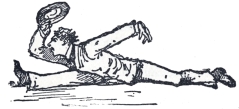
A MALE DANCER AT JARDIN BULLIER.
GARDENS OTHER THAN MABILLE.
It is not altogether pleasant for young Americans of the gentler sex to
visit Mabille, no matter how good their escort. There are too many
draw-backs to the pleasure, and it is being continually marred. I
noticed one party, a young lady and gentleman who were perpetually
troubled; they would be observing something that interested them, when
very suddenly the girl would exclaim, “Charley, this way! quick! There
comes Sadie Mercer, and I would not have her see me here for anything.
Sammy Burton is with her!”
They rose and darted down a path-way, only to turn and meet another
party whom they knew, and so on. The most of the evening was spent in
vain endeavors to keep their acquaintances from knowing they were there,
and their friends were similarly employed.
There was no occasion for all this effort. Everybody goes to the
Mabille, once at least, because everybody must. But it isn’t worth the
time, however.

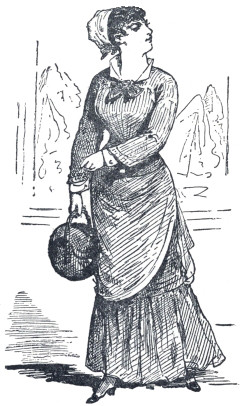
THE GRISETTE WHO PREFERS THE JARDIN BULLIER.
At the Jardin Bullier, in the Latin quarter, there is wilder dancing
and more freedom than the Mabille. It is the resort of the students and
the grisettes proper, and the spectacle is genuine. There are no
professionals there, and the dancing is done by those who have paid for
it, and do it for the pleasure they find in it. The high-kicking girl
kicks as a colt does, because she enjoys it, and not in the languid way
of the paid dancers. The brigandish youth who can contort the wildest is
cheered on to renewed exertions, and the grisette who can kick the
highest or do the most grotesque things is applauded to the echo. And
when in these extravaganzas one slips upon the waxed floor, and falls,
what a shout goes up from the excited spectators! She cares nothing for
it—slips are common on these floors. She laughs more heartily than the
rest, and rises and resumes her place.
The French quadrille is like American hash—a mystery. There is no
earthly system in it. Like volunteer soldiers, each one operates upon
his own hook. They forward and back with the most sublime disregard of
everybody else; they combine in the one dance the American quadrille,
the German and French waltz, the Spanish fandango, the galop, the polka,
and every other dance known to ancient and modern times. The only reason
that they do not incorporate other dances into their alleged quadrille,
is because they do not know any more. They put in all they have heard
of, and one would be unreasonable to expect more of them.
But they have a good time, and, as the French world goes, an innocent
one. There is perhaps more freedom in gesture than would be considered
proper in England or America, but there is no drunkenness, and the
utmost decorum is observed. Such a thing would be impossible with the
fighting whisky of America, or face-bruising brandy of England. Get
together a thousand of the lower classes in either of those excessively
moral countries, and the affair would break up in a row in an hour.
There would be knock-downs and dragging-outs without number; there would
be bruised heads and mashed faces, and the broken nose brigade would be
largely recruited.
The Frenchman does not get drunk. He drinks his light wine to the point
of exhileration, and that is all. The student of art, or law, or
medicine, who finds his enjoyment at these places, keeps as sober as a
judge, and a great deal more sober than a great many judges in America I
wot of. He looks to be capable of any enormity, but he is the most
inoffensive being on earth. Indulging in the wildest vagaries—dressed
in the most rakish and brigandish costume, he is scrupulously polite and
intensely considerate. He could not be more so were the grisettes his
sisters, and the spectators his father, mother and aunts.
AT THE JARDIN BULLIER.
One evening at the Jardin Bullier one young fellow, utterly and
entirely brainless, evidently the fop of his quarter, appeared dressed,
to his taste, gorgeously. He wore a pearl gray suit; the bottoms of his
trowsers were so absurdly wide that they covered his boot; his coat
sleeves were so wide that they made a fair match for his trowsers; his
cuffs (with a showy sham button) came down to his knuckles; his shirt
collar was cut half way down his breast, and his hat was the most
painful in shine that I had ever seen. He was, in short, gotten up
regardless of expense, and entirely for effect.
This young fellow offered some slight indignity to a girl with whom he
was dancing. Very promptly she cried out, and in an instant the dancing
was suspended. “Put him out!” cried those near them, who comprehended
the matter. “Put him out! Put him out!” was echoed from one side to the
other of the vast hall, and a rush of excited Frenchmen was made toward
that part of the room. The fellow attempted some sort of an explanation,
but it was of no avail. Out he went, guilty or not. In that place
everybody must be like Cæsar’s wife—above suspicion. Out he went, and
the dancing was resumed with redoubled fury. A duty discharged, they
might abandon themselves to pleasure with increased zest. All the
difference was those who had yelled “Put him out” the loudest, kicked a
trifle higher than before, and went crab-like sideways with more
extraordinary contortions.
Tibbitts and the Professor had an awkward experience the first night
they were in Paris. The Professor had received a letter from Tibbitts’
father requesting him to look after the young man, and see that he
attended to legitimate matters and be not carried away with the
frivolities of Parisian life, which destroy so many inexperienced youth.
In fact, he gave the Professor authority in the matter, and made him a
sort of a guardian over him.
After dinner the Professor showed Tibbitts the letter and assumed
control at once.
“To-night, Lemuel, I have to meet the American delegates to the
International Science Congress, and I cannot be with you. But I must
exact a promise from you that you will not go to any of those public
balls, such as the Mabille. I have no objection to your visiting the
Opera, for I understand the building itself is a study, and it is
perhaps well that you should hear and enjoy the music of the masters.
This is as far as I can permit you to go. You promise?”
“Certainly,” replied Tibbitts, “though it is not necessary. Without a
promise I should not go to those wicked places.”

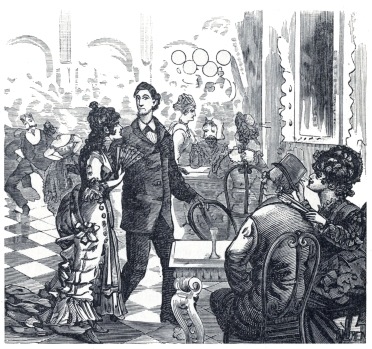
THE MEETING OF TIBBITTS AND THE PROFESSOR.
Scene the second: The Jardin Mabille—music, lights, gaily dressed
women, little tables, wine, and all that sort of thing.
Tibbitts dancing furiously with a lady in silken attire, and striving in
vain to do the high, grotesque dancing of the Parisian. The music ceases
and Tibbitts leads his partner to a table. In his excitement he does not
at once notice that at the table exactly in front of him is seated the
Professor, who, inasmuch as he was holding an interesting conversation
with a lady who spoke English somewhat, did not notice Tibbitts till
their eyes met.
TIBBITTS AND THE PROFESSOR.
Tibbitts is a young man of great presence of mind. He was equal to this
emergency. The Professor regarded him a moment, and said:—
“Lemuel!”
Lemuel stared at him and replied:—
“Are you addressing me, sir?”
“Certainly I am.”
“You are mistaken in the person, sir. I do not know you. My name is not
Lemuel, it is Smith. Smith, of Hartford, Connecticut. May I ask your
name, and why you address me, a perfect stranger? Do I resemble any
friend of yours? Am I like any grandson you have? If so, could you, for
the sake of the resemblance, lend me a hundred francs?”
“Lemuel, this is trifling. What are you doing here?”
It suddenly occurred to Lemuel that he had the Professor in as close a
corner as the Professor had him, and he replied:—
“Professor, what are you doing here?”
“Lemuel, I was fearful that you would break your promise to me, and I
came here to be sure that you were not here.”
“Professor, I was fearful that you might accidentally stray hither
after the meeting of the Social Science sharps was over, and I came here
to see that no harm came to you.”
“Lemuel, we are, I perceive, both innocent of any harmful intention, but
as our action might be misconstrued at home, it would be as well if no
mention is made of this unfortunate matter.”
Lemuel coughed slightly and appeared wrapped in thought a moment.
Finally he spoke:—
“I do not know but that I am permitting my good nature to get the better
of my duty, but I will not make mention of your escapade. But I wish it
distinctly understood that this must not be repeated, and that you go
home at once. You ought to be ashamed of yourself. It is no place for
you. You, a teacher, an instructor of youth, a man of sixty, one whose
duty it is to form the morals of American youth, one to whose care is
entrusted inexperienced youth, to be seen in such a place and in such a
company. It is too much, and would not sound well in the West. For
shame. As I said, it must not be repeated. Go. I now see why you were so
willing that I should go to the Opera, and why you exacted of me a
promise that I should not come here. You intended to come here by
yourself, and did not want me to be a witness to your shame. But go! I
forgive you! I forgive you.”
The Professor went, and as soon as he was safely away, Lemuel took the
seat he had vacated, and was presently engaged in a very pleasant
conversation with the lady who spoke English somewhat.
The Professor’s guardianship will not be of much use to the
pleasure-seeking youth. Professors have curiosity, which they generally
gratify, in one way or another. Poor humanity!
The café is the Frenchman’s especial resort, however. They are
everywhere and of all classes, and from six to twelve at night are full.
The regular Frenchman sees his friends here; business is transacted
here; the political questions of the day are discussed, and here nations
are made and unmade. In foul weather the inside is crowded; in fair, the
little tables on the sidewalk under the beautiful trees are all
occupied. And these little tables outside afford never-failing pleasure,
to any one, native or foreign. There is a constant ebb and flow of
humanity along the streets; there the costumes of all nations and the
manners and customs of the world are reproduced for your benefit.
Americans, English, Germans, Turks, Tunisians, West Indians, Carribeans,
Russians, and Polanders. If there is a nation on earth that is not
represented in the Boulevard des Italiens or any of the principal
streets, any fine night, I do not know of it.

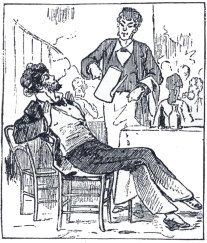
And here sits the Parisian, hour after hour, watching this human
kaleidoscope, and thanking heaven that he is a Frenchman, and above all
a Parisian.
THE RELIGIOUS AFRICAN.
The electric lights shine through the foliage of the trees, making
figures of rare beauty upon the faultless sidewalks; there is the
constant procession of vehicles more beautiful under this light than at
noonday; opposite him are the brilliantly lighted shops with their
wealth of beauty in the windows, and all around him is bustle, stir, and
life. There is nothing dull or stagnant on the streets of Paris at
night. The Parisian will not have it that way. The glitter may be very
thin, but he will have the glitter. He lives upon it.
Paris by day is beautiful—Paris by night is superb.
The faro bankeress is getting ready to go home. She has well nigh done
Europe, which is to say, she has explored every shop in Paris and
London. She may go through Switzerland and Germany with us, but we hope
not. We are praying that she will go home from Paris, and she can’t
start any too quick. That she is making preparations for a start, she
confesses. She is afraid of sea voyages; she has a mortal dread of
water; she remarks that she always lives very correctly a week or so
before she sails. She says her prayers regularly, attends church every
service, and does nothing wrong that she knows of. She will not go to an
Opera on Sunday; she declined to go to the Mabille at all; nor will she
even play cards any day. This for ten days before sailing.
“And after you land safely in New York?”
“O, I ain’t on the water then, and it don’t differ so much.”
Which is very like a negro I once knew in Bucyrus, Ohio. He was very
religious, of the African kind of religion, and was the loudest and most
muscular man at a prayer meeting for many a mile around. A gentleman who
had a piece of work to do that was not entirely legal offered Sam two
dollars to do it for him.
“Massa Perkins, dis ting doesn’t adzackly squar wid my perfeshn, an’
it’s decidedly wicked. It’s suthin’ a perfessin’ Christian shouldn’t do,
nohow. But two dollahs is a mi’ty heap ob money foh de ole man, and
ain’t picked up ebery day. I’ll chance it. Bress de Lawd! It’s a sin,
but I can ’pent. Bress de Lawd, I can ’pent.
“While de lamp holds out to bun,
De vilest sinnah may retun.”
“Bress de Lawd foh de deff-bed ’pentance. Dat is de great t’ing. Yoo can
’pent on a dying bed.”
“But, Sam,” said Perkins, “I don’t want you to do anything that grinds
against your conscience. A death bed repentance is all very well, but
suppose you die too suddenly to repent?”
“It’s a risk, Massa Perkins, but I’ll chance it. Two dollahs is a great
deal ob money foh de ole man. It’s a mi’ty sudden deff dat’ll ketch me
onpropared. And come to t’ink ob it, to be entirely safe, I’ll
’pent—jist ez soon ez I git de two dollahs.”
Our faro bankeress had the same kind of religion. Land her safe in New
York, and she was easy as to her sins. It was only against the dangers
of navigation that she wanted to be insured.
CATHEDRAL AT BEAUVAIS.
CHAPTER XXI.
THE LOUVRE.
PARIS, the magnificent, has thousands of structures that are worth a
voyage across the Atlantic to see, but there is in all that wonderful
city no one that is so utterly bewildering in its magnificence as the
massive pile, the Louvre, one of the largest as well as grandest places
in the world. Its long galleries and beautiful salons, with hundreds of
winds and turns, form a labyrinth in which, without a guide, one may
almost be lost.
It required a great deal of time to build the Louvre, as its completion
was being continually retarded. But through all the years and the
changes in the styles of architecture, a general oneness of plan was
maintained, and the noble structure, though constructed piece-meal, is
consistent and symmetrical.
It is admirably located near the banks of the Seine, and with the
Tuileries, occupies forty acres of ground. It is of a quadrilateral
form, enclosing an immense square. Approaching it from the Place du
Royale, its imposing front challenges attention and then invites study.
Admiration is excited by the solidity, as well as symmetry of the pile,
and this is increased by its elaborate ornamentation.
Such buildings are impossible in this day and age of the world. Private
means are not sufficient. An American railroad magnate might do
something in this direction, but when the idea of expending even a few
paltry millions upon a residence for himself comes to him, he puts it
off till after he has attempted a corner in some stock or another, which
generally makes a lame duck of him, and he is glad to retire to the
humble mansion which he always has—in his wife’s name.
THE STRUGGLE FOR THE LEADERSHIP.
Modern governments cannot do it, for they haven’t the facilities of the
ancient Kings for this kind of work. All that the old French Kings had
to do when they wanted a palace of this kind was to call upon the
workmen of the nation, with spears, and set them about it, and feed them
upon black bread and very sour and cheap wine, and take possession of
the stone quarries and the lumber mills, and put it up. The painters and
sculptors and the makers of the furnishings they were compelled to pay,
but that was nothing. An extra tax on everything the people lived upon
was levied and collected with great vigor and much certainty, and so
without any bother or worry the King had a new palace, with fountains,
and trees, and flowers, and pictures, and statuary, and all that sort of
thing, in the most gorgeous style. A French King, a few hundred years
ago, had what an American would not unjustly style a soft thing of it.
It was a good situation to hold, and I don’t wonder that Nobles fought
to be Kings, and Kings struggled to be Emperors. Everybody wants power.
And this reminds me of a little incident that happened in my own beloved
America, illustrative of this principle. In a certain county in the good
State of Ohio was, and is, a township called Cranberry, inhabited
largely by Germans and those of German descent. These Germans, without
exception, adhered to one political party, and all voted one way, and
their devotion to their party was such that it was considered an
unpardonable sin to “scratch” a ticket, or in any way run counter to the
action of their convention. In politics they were as regular as a horse
in a bark-mill.
One man, always the stoutest and best one physically, of the party,
stood at the polls, and every one of his organization as he came to vote
was expected to show his ticket to this recognized King, that it might
be made certain that no one scratched or acted unorthodox. This man was
by right entitled to a county office, and held one as long as he could
maintain his position at home.
One Peter Feltzer had been King of Cranberry for a great many years, and
by virtue of his position had been successively Commissioner, Treasurer,
Representative, and, in fact, had gone up and down the ladder of earthly
glory a great many times, and was waxing as full of glory and honors as
he was of years.
There was a young man named Meyer, who had an idea that he wanted to
hold a county office, and live at the county seat, and spend his time in
drinking beer, at good pay, and he knew there was but one road to this
summit of human bliss, and that was over Feltzer’s body. So one election
day he presented himself at the polls, and ignoring Feltzer, offered a
folded ballot.

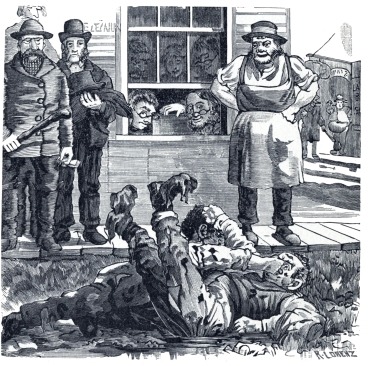
THE STRUGGLE FOR THE KINGSHIP.
“Mike, show me dot dicket!” exclaimed Feltzer.
“Yoo shust go mit hell!” was Meyer’s answer.
ART IN THE LOUVRE.
Feltzer divined the meaning of this revolt at once. He knew that this
was a challenge to mortal combat, and that the prize of the victor was
the crown. Meyer was a splendid young man, built like a bull, and only
thirty. Feltzer had been, in his day, more than a match for him; but
alas, he was sixty, and had been enervated by the soft allurements of
official position. However, he determined not to die without a struggle,
and so laying off their coats, at it they went. Meyer had no easy
contract. Feltzer was fighting for life, and the contest was long and
severe. Youth finally triumphed, and Feltzer, after half an hour of
rolling in the mud, admitted defeat. Meyer sprang gaily to his feet, and
seizing Feltzer’s hickory club exclaimed to the bystanders, “Now, yoo
men vat vants to vote will shust show me your dickets!”
They accepted their new ruler the same as the French do, and he was
elected to an office the ensuing Fall, and ever since, for aught I know.
He held it, anyhow, till some younger man deposed him.
This has nothing to do with the Louvre, except as showing that humanity
is the same everywhere. If any other moral can be got out of it I have
no objection.
All over the Louvre are statues of men who are famous in French
history—those who have achieved fame in art, science, literature or
war. They are here, and in stone that will last for ages; longer,
probably, than the memory of the acts that placed them there.
On the north side of the Place Napoleon there is a wonderful Corinthian
colonnade, over the columns of which are heroic statues of eighty-six
celebrated men, and on the balustrade are sixty-five allegorical groups,
wonderful in design and execution, and so, all the way around the
enormous building, story after story is burdened with works of art.
Wondrous works, artistically bestowed, always profuse, but never
overdone. Every column, every window-cap, even the ledges just under the
projection of the roof, bear the impress of genius. There are statues,
medallions, large groups illustrating important events in the history of
France, exquisitely carved by master hands, on all four sides of the
exterior, all symmetrical in design and faultless in proportion.
The interior is in keeping with the exterior. The noble pile is a fit
repository for what it contains. The one hundred and forty salons into
which the Louvre is divided are marvels of artistic beauty. Intended for
the abode of royalty, it was royally constructed. The kingly builders
did not spare the sweat or blood of their subjects. They set out to have
a royal palais, and they did not allow the miseries of a few millions of
their people to stand in the way of its achievement.
The most beautiful of them all is the Galerie d’Apollon, the
ornamentation of which, in beauty of design and skill in execution, is
marvelous. It is of itself a study. The vaulted ceiling is filled with
paintings by Le Brun, one of the greatest of the French masters. The
cornices and corners are ornamented with beautiful designs in gilt,
elaborately wrought, and on the walls are portraits of French artists in
gobelin tapestry, making it one of the finest collections of this kind
of work extant. There is a perfection in the drawing that is remarkable,
and the coloring is exquisite, the various shades and tints blending
with a nicety that makes one almost feel that they were done by artists
with brush and paint.
Tapestry, as a rule, has small degree of expression in face and feature,
but in these every feature is faithfully reproduced, and the whole
figure is strikingly life-like.
This room has a history. It was originally built by Henry IV., and was
burned in 1661. During the reign of Louis XIV. the work of
reconstruction was begun, Le Brun furnishing the designs. His death in
1690 put a stop to the work, and for a century and a half it stood in an
unfinished condition. In 1848 work was resumed, and in three years it
was finished as it now stands.
There are scores of other rooms of quite as much interest. In all, the
frescoes and wall paintings are incomparable, and though the galleries
aggregate over a mile and a half in length, in no place is there a
barren spot. The great masters, through all these ages, gave to it their
best years and their best work, and so long as the Louvre remains these
rooms will be monuments of their genius.
THE REASON FOR THE COMMUNE.
The Louvre is inseparable from the history of France. In all the
upheavals, the tearings down and overturnings, it has been a central
figure. It was from the Louvre on that dreadful night in August, 1572,
that Charles IX. fired the shot that was the signal for the horrible
massacre of St. Bartholomew, which ended in the indiscriminate slaughter
of the Huguenots, and from that time on to the present it has been the
stage on which tragedies have been enacted. It figured in the terrible
days of the Commune, in 1871, and but for an almost Providential
interference, would have passed into history as a memory.
The Louvre has always been the especial object of the hatred of the
Parisian mob, and no wonder. Every stone laid was so much bread taken
from the mouths of French workingmen; every stroke of a chisel, every
inch of the wonderful pile, was a robbery of himself of whatever it
cost. It was the habitation of a nobility, supported in luxury at the
expense of the French people.
It is all well enough to talk of reason, but there is no reason in a
revolution. The Parisian whose wife and family were living in garrets
and cellars, eating black bread and drinking sour wine, could not be
reasoned with when he caught glimpses of the luxurious salons in which
the few took their pleasure. He could not be expected to have much
reason when he got a smell of the delicacies of the royal table, and
thought of the scant fare on which he was compelled to subsist. His
garret and thin pallet did not contrast well with the gorgeous
apartments and silken couches of his royal masters, nor did the offal
with which he was fed compare pleasantly with the wild profusion of
dainties which they rioted upon.
It was nightingale tongues versus offal—it was poverty in the extreme
versus prodigal waste.
And then the arrogance of these tyrants! They held the commoners as an
inferior race, as another creation, much as the Southern planter used to
hold his slaves.
One of the ancient nobility replied to a demand from the workingmen for
better food: “The animals! Let them eat grass!” It is no wonder, a few
months later, when this silken lord was beheaded, that the mob carried
his head upon a pike with a tuft of grass in his set jaws.
It is no wonder that when the mob, starved and frozen to a point where
death was preferable to life, wrested the power from the nobility and
controlled Paris, that it should blindly destroy everything that
symbolized royalty, everything that smacked of class rule.
True, the Commune should not have destroyed fountains, and statuary, and
paintings, but it must be said that they did not destroy these priceless
works for the mere sake of destroying them. The statues symbolized
royalty. It was not a Venus that was the object of their hatred—the
Venus was their wrong, in stone.
There is much to be said about these Parisian mobs, and whoever knows of
the sufferings of the people, even under the mildest form of royalty,
cannot wholly condemn. The many laboring for the few; the man with a
hungry wife and pallid children does not care much for the art that his
oppressors delight in. He looks at immortal work through eyes dimmed
with suffering and half blinded with tears, and it is not singular that
in his rage he strikes blindly.
THE COMMUNE.
At this time Napoleon had fought an unprovoked war, and to perpetuate
his dynasty had dragged from their wretched homes thousands of the youth
of France, and had been driven back by the Prussians in utter and
entire humiliation. Had he crushed Prussia, the glory of the achievement
would have atoned in some degree for its cost; but to bear the burden of
defeat in shame and humiliation was too much, and though a Republic
followed, the Commune was not satisfied. It would not trust the
Republic. It looked upon the Republic as a partial change—it wanted a
radical one; and, with the childishness peculiar to the French, they
commenced the work of reconstruction by destroying what was their own,
and which would delight them as much under the Republic of the future as
it had their oppressors in the Monarchies of the past.
English, American or German people would have done differently. If these
wonderful works reminded them too much of their sufferings to be
pleasant, they would have been sold to other nations, and the proceeds
devoted to the payment of the national debt.
It is well for the world that so much of the Louvre was preserved, for
there are other nations than France that have an interest in it. Art has
no nationality—it is the property of the world.
The Communists ruined many of the finest works in the lower part of the
building, but fortunately their ravages were confined to a small space.
More important matters occupied their attention, and the Louvre was
virtually spared. It was set on fire, however, and the magnificent
library of ninety thousand volumes was entirely destroyed, and many
works of art were injured, but the troops of the Republic arrived in
time to arrest the progress of the flames, and the building was
preserved.
The first floor of the building is devoted wholly to ancient sculpture,
and a wilderness there is of it. Too much of it, in fact, unless one has
time for its study. You stop a moment to admire a Psyche; you have only
time to glance at the Caryatides in the hall in which Henri IV.
celebrated his marriage with Margaret of Valois; you pass through the
Salle du Gladiateur, containing the Borghese Gladiator, the famous work
made familiar through copies of it; you look down a long hall filled
with wonderful statues and see at the farther end the outline of a
figure whose very pose is a poem. The room is hung in crimson velvet,
and the light, soft and subdued, makes the figure seem almost that of a
living, breathing being. At this distance the effect is wonderful. There
was great genius in making the sculpture; there was almost as much in
placing it.
There is a long vista of beautiful statues lining the way on either side
to the crimson chamber, which, with its gentle lights and shades, makes
the picture perfect, and as one feels the delight of the scene wonder
ceases at the ravings of artists and lovers of art over the Venus of
Milo.
There, in the center of the crimson room, stands the armless figure
whose perfection of form and face has never been equaled. It stands
alone, with nothing near to distract the mind by divided attention, and
as the lover of the beautiful looks upon the wondrous beauty of that
speechless yet speaking statue, admiration ripens into adoration.
Even Tibbitts and the faro bankeress stood still and silent before it
for full twenty minutes, and no greater compliment was ever paid a work
of art. It interested even them.
The figure compels feeling. You do not feel that you are enjoying rare
sculpture, but your sympathies go out to the beautiful form before you,
not in cold marble but in life—real life, with all the tender qualities
belonging in nature to such a perfect face and figure.
This may be gush, but there is something about this block of marble that
is fascinating beyond expression. In it art has conquered material. The
marble lives and breathes. It is marble, but it is marble endowed with
life. Or, rather it is not marble, it is life resembling marble. It is a
dream caught and materialized. If it is not nature, it is more than
nature. It is a poet’s idea of what nature should be.
A VERY PRETTY ART SPEECH.
Whether it be the face with the wonderful features that almost speak, or
the form so graceful in pose, or the combination of both, cannot be
said; but the effect is produced, and no one can withstand the silent
appeal made by this creation of an unequaled genius. It is something of
which one cannot tire. The oftener it is seen the greater the
impression. It can never be forgotten, nor can it be described. It
cannot be reproduced, either in marble or oil. There are innumerable
copies of it the world over, but to feel and realize the absolute
perfection of the work the original must be seen. No copy can do it
justice.
The great trouble with the Louvre is there is too much of it. If one
could live to the age of Methusaleh it would all be very well, but
unfortunately life is short. You wish you had not so much to see, for
you want to see it all, and the very wealth is bewildering. Recollection
becomes confusing and mixed.
Of course every one selects some one picture or statue which impresses
him to the point of carrying away a memory thereof. We had among us a
young American physician who stood in the orthodox pose before the
Gladiator. Having studied anatomy, muscles and things of that nature
were just in his way. He stood for full twenty minutes wrapped in what
he desired us to understand as ecstacy, and then delivered himself
thus:—
“A——! This is the very actuality of the ideality of individuality.”
It was a very pretty speech, and the fact that he had lain awake all the
night before arranging it, and that he pulled us all around to the
Gladiator to get his chance of firing it off did not detract from its
merit. No one knew what it meant, but the words were mouth filling, and
it did as well as though it had some glimmer of meaning. There is
nothing in art like good sounding words.
From the ground-floor you ascend a broad stair-case, exquisitely carved.
You come into another wilderness, only this is in canvas, instead of
marble. Every school in the world is represented here, for when the
French potentate was not able to buy he could always sieze. You don’t
stop to inquire how the collection was made; it is here, and to an
American, or any other foreigner, that is sufficient. We come to enjoy
the pictures, and we don’t care whether they were purchased or taken by
force. There are, as I said, one hundred and forty of these salons, and
you must go through them all. There are galleries devoted to the French
school, ancient and modern, the Italian school, the German, Dutch,
Flemish, and Spanish, and you come away feeling a sort of satisfaction
that it has been done; but no man living, in the time one usually has in
Paris, can get a good idea of what is there gathered. Four miles of art
is rather too much for one short effort. It is bewildering in its very
profusion. One may be fond of art, but not educated to the point of
taking so much of it in systematically. Nevertheless, days spent in
collections like the Louvre are too good to miss. Some of it will stick
to you if you cannot carry it all away.

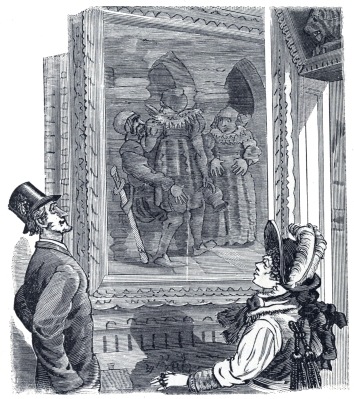
TIBBITTS AND THE FARO BANKERESS ENJOYING ART.
TWO PEOPLE’S DELIGHT IN ART.
Tibbitts and the faro bankeress were delighted. Tibbitts, with an eye to
speculation, made elaborate calculation as to the cost of the entire
collection, and wondered whether or not a good thing could not be made
by buying it all up and exhibiting it in New York.
That was the delight he got out of it.
The faro bankeress protested that she had never enjoyed art so much, and
had never before known the delight that was in it. From several of the
female figures she had got ideas of lace that were entirely new to her,
and she had found and fixed in her mind a design for a fancy dress for
Lulu, which she should have made the next day. She wondered if she could
borrow the picture to show to the modiste. She had no idea that the
ladies of ancient days dressed in such good taste, or that they had such
wonderful material to dress with. Some of the costumes she had studied
were altogether too sweet for anything.
And that was the delight she got out of it.
CHAPTER XXII.
THE PALAIS-ROYAL.
THE Palais-Royal is the Parisian Mecca for all Americans. Its brilliant
shops, glittering with diamonds and precious stones, are so many shrines
at which Americans are most devout worshipers. They go there day after
day, admiring the bewildering display, and the admiration excited by the
wily shopkeeper by his skill in arranging his costly wares leads to
purchases that would not otherwise have been made. There is a
fascination about a shop window literally filled with diamonds, arranged
by a Frenchman, that is irresistible, and with hundreds of such windows
extending all the way around the immense court, there is no escaping its
power. What a Parisian shopkeeper doesn’t know about display isn’t worth
knowing. All Paris is arranged solely for the eye. They ignore the other
senses to a very great degree.
With all its present wealth and beauty the Palais-Royal has witnessed
some very exciting scenes.
It was built by Cardinal Richelieu for his residence, and he built it
extremely well, little dreaming of the scenes of carnival, riot,
quarrels, and bloodshed that were to be enacted there long after he had
vacated it forever.
In 1663, when it was finished, it was called the Palais-Cardinal, but
having been presented by Richelieu to Louis XIII., whose widow, Anne of
Austria, with her two sons, Louis XIV. and Philippe d’Orléans, lived
there, it was called the Palais-Royal.
THE LUXURIOUS PALAIS.
Louis, on coming into possession of the Palais, presented it to his
brother Philippe, during whose occupancy it was the scene of the most
horrible orgies the world ever saw. The royal profligate gathered about
him a host whose tastes were as depraved as his own, and with these he
led a life of wild debauchery.

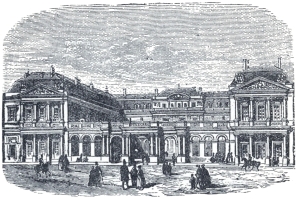
Later on, Philippe Egalité, exceeding the excesses of his grandfather,
Philippe d’Orléans, made the Palais-Royal the scene of wilder disorders
than had ever been seen there before, as bad as it had been. He was so
reckless that his princely income was not enough to keep him in ready
money. In fact his coffers were well nigh exhausted when he conceived
the idea of deriving a revenue from some of the property that surrounded
the Palais, which up to that time had been used simply for
ornamentation. So he caused a number of shops to be erected around the
garden adjoining the Palais, and from the rents paid for these was
enabled to keep up his former manner of life until that (to him)
memorable morning in November, 1793, when he took a walk to the Place de
la Concorde, up a short flight of stairs, and for once in his life laid
his head on a hard pillow. The deadly guillotine did its work, and the
riotous life of Philippe Egalité came to a sudden end.
At that time the upper rooms of the vast galleries, now converted into
handsome restaurants, were devoted to gaming, and it was no child’s
play, then, either. Here the excitable nobles, fascinated by the green
cloth, lived in a constant whirl of excitement. The stakes ran high.
Fortunes were made and lost in a night, and the Seine never did so good
a business in the way of suicide. While these elegantly furnished and
brilliantly lighted salons witnessed the demonstrative joy of the lucky
winner or the gloomy despondency of the unhappy loser, scenes of an
entirely different nature, and far more terrible in their results were
being enacted in the cafés below.
In these cafés met the leaders of the people who were organizing for the
destruction of the thoughtless revelers above their heads. It was the
old story over again. The canaille, as the nobles termed the people,
were groaning under the loads imposed upon them. The life-blood of the
French people was being drained by the parasites of royalty—it was
waste on the one hand and starvation on the other. Every gold piece that
passed upon the tables above represented so much unpaid for sweat from
the many below. Absolute power had, as it always does, run into
unbridled license, and unbridled license had made the people desperate.
They might not succeed, but they could no more than die, and the life
they had was not worth the having.
It was in these cafés that Camille Desmoulins organized the people, and
with such arms as they could seize on that memorable morning in July,
marched upon the Bastille. They did not need arms. That mob, so led,
could have torn down the hoary old wrong with their bare hands. There
was not a man or woman in the throng that surged out of the Palais that
morning who had not some especial reason for its destruction. Confined
within its walls had died their brothers and fathers. To them it was
royalty, and to royalty they owed every woe that afflicted them.
Desperate, determined men they were, crazed with excitement, and caring
for nothing. They reached the Bastille and hurled themselves against its
stubborn sides. Again and again were they beaten back by the garrison
within, but each repulse only served to more determined efforts, and
finally on the 14th of July the Bastille was swept from the face of the
earth. Nothing was left of it but the terrible memories of the bloody
past.
THE COMMUNE.
In 1801-7 the first Napoleon assembled the Tribunate in the
Palais-Royal, and in 1815, Lucien Bonaparte made it his residence during
the “One Hundred Days.” From 1815 to 1830 it was again in the possession
of Orleans family, and Louis Philippe occupied it until his ascension to
the throne. Eighteen
years later, during the Revolution of February, which finally resulted
in the Presidency of Louis Napoleon and subsequently his election by
plébiscite as Emperor, the royal apartments were completely wrecked.
The mob, wild with excitement, went through the Palais like a whirlwind,
destroying anything and everything it could lay its hands upon. Of all
the magnificent paintings, the exquisite statues, the marvelous
collections of fine glass and porcelain, with which the royal apartments
were adorned, nothing escaped their fury. Almost the entire building was
destroyed.
Napoleon III., who did so much to beautify Paris, restored the Palais to
its original condition, and it continued so, being the residence of
Prince Napoleon, cousin of the Emperor and son of Jeróme Napoleon, until
the outbreak of the war in 1870. Then in 1871, on the 22d of May, the
Communists took a hand at it, and sad work they made. Almost the entire
south wing was destroyed by fire, and the other portions were badly
damaged.
Now it is bright and gay with its magnificent display of diamonds, its
pleasant little park with fountains and statues, its long spacious
galleries that form unequaled promenades, and its restaurants celebrated
the world over.
The galleries, four in number, extend entirely around the square park,
which is two hundred and fifty-seven yards long and one hundred and ten
wide. The Galerie d’Orléans, on the south side, is the most showy. It is
three hundred and twenty feet long and one hundred and six feet wide,
flanked with shops, containing fine goods of all descriptions. The roof
is glass covered, and when lighted up at night, presents a dazzling
appearance. It was on this site that, previous to 1830, stood the
disreputable shops that gave the locality such an unsavory reputation.
The other galleries, though not so fine in construction, are just as
attractive, and their wide pavements, shaded by the high balcony that
forms a part of the second story, are thronged day and night with
strangers, to whom these windows, ablaze with the light of precious
stones, are always a delight. It is a pleasure to saunter slowly along
and admire the beauties that increase every minute.
IN THE COURT YARD.
Nowhere in the world can be found so great a collection of gems in so
small a space as in these four galleries. The fronts of the stores
consist of a huge plate glass window and a small door. Although
disproportionate in size, the window suffices to show the goods, and the
door is plenty large enough for any one who wishes to enter. The
Frenchman has a natural love for the beautiful, and the French jeweler
shows his taste in the arrangement of his window. A large space, covered
with diamonds, set and unset, of fine gold jewelry, artistic designs in
rubies, pearls, opals, or emeralds, is in itself a beautiful sight, but
when they are all arranged so as to show them all to the best advantage,
then the effect is marvelous.
But there can be too much of a good thing. As a whole day spent among
the wonders of the Louvre fatigues the mind and body, so the constant
succession of dazzling windows in the Palais-Royal becomes after a while
tiresome, and the pretty little park is sought for rest and refreshment.

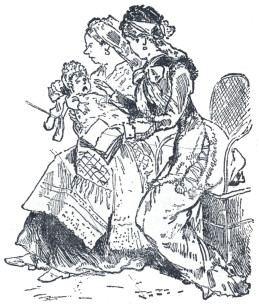
MOTHER AND BONNE—PALAIS-ROYAL.
There the scene changes again, and a new and interesting phase of the
Palais-Royal’s attractions is seen. Under the long rows of trees that
fringe the busy galleries are groups of women enjoying the cool breeze
that just moves the branches above them, and tempers the heat that
elsewhere is oppressive. They have some little trifle of fancy work in
their hands, and as they languidly ply the needle they talk. It may be
too warm to knit. It is never too warm to gossip.
Closely imitating these are the bonnes, or nurse girls, old and young,
who chatter away like magpies, while their charges are amusing
themselves making pictures in the sand. The youngsters romp and roll
about with all the pleasure of childhood. They don’t care whether the
Palais-Royal ever saw bloodsheds and riots or not. It makes a good
playground for them, and that is all they want.
Then the concerts that are given there during the afternoons are
enjoyable, and they always attract large audiences. The entire space on
the south side is occupied by all kinds and conditions of people, and
like all French assemblages, it is quiet and orderly. The music, if not
of a high classical standard, is good, and the people enjoy it. Given a
little white table in the open air, some light Offenbachian music and a
glass of wine, and the Frenchman is happy.
The restaurants in the Palais-Royal form another by no means unimportant
feature, for the average American is no less fond of a good dinner than
the French bon vivant, and in these pleasant places he can find the
perfection of good living. The skill of French cooks is acknowledged
everywhere. Here he is on his native heath, and is seen, or tasted
rather, to his best advantage.
A TALE OF THE COMMUNE.
The clerk or bookkeeper whose salary is not in keeping with his tastes,
takes his modest dinner in one of the second-floor restaurants, where he
gets a small bottle of claret and a well cooked, well served meal for
two francs. The place is clean, the surroundings cheerful, and though
there are none of those delicate trifles the French cook delights in
making, there is an abundance of hunger-satisfying viands prepared in a
most appetizing manner, and they are to him better than the delicacies
that grace a more elaborate table.
The more pretentious man, or the one having more money, goes to more
pretentious places, and takes a dinner of several courses for five
francs. There is a pleasing variety of soup, fish and entrées, with a
dessert, and, if desired, coffee and cognac afterward, all prepared in
good style, and well served.
But the thoroughly good liver goes to none of these. He knows the
places, there in the Palais-Royal, where cooking has been reduced to a
science; where the finest cooks in Paris bend their best energies to the
concoction of dishes that Epicurus himself would have delighted in;
where fine pictures and elegant surroundings appeal to the sense of
sight, while the sense of taste is being catered to. He hies himself
there and revels in the delights of a perfect dinner.
As the Parisian, man, woman, or child, will never sit indoors when the
open air is possible, the Palais is always full. As a park it is
delightful; the shops are just as attractive to the citizen as to the
stranger, for the windows change contents every day, and the variety is
such that something new and attractive can be seen at any time. It is a
small world by itself, and it is no wonder that every American finds him
or herself within it every day.
It is always a good thing to get hold of a good modern legend, a story
that, while it may not be as gray-headed as those of the time of the
gods and goddesses the ancients wrote of, has still attained a
respectable age—a middle-aged legend, as it were. Such an one I have
unearthed, and write it down for the benefit of coming generations.
It was during the terrible days of the Commune, Mademoiselle Therese, a
beauty of the Faubourg St. Antoine, was loved by a Monsieur Adolph, the
son of a rich baker in that quarter. That is to say, the baker was
rich—but I am anticipating. Mademoiselle was a dressmaker of ravishing
beauty. She could have married far above her condition on account of
this ravishing beauty, but she was as wise as she was beautiful. She
said to herself, “I could marry, by virtue of my face and figure, a
grand gentleman, but—what then? I am not accomplished. I could learn to
be a fine lady, it is true; but when Monsieur should tire of me, as he
inevitably would, I should lead a very uncomfortable life. I am a
daughter of France—I do not wish to lead an uncomfortable life. Adolph
is not handsome; he is only five feet four; he has bandy legs; his hair
is bad, and his nose is a pug; but his papa has much ducats, and he is
so much in love with me that he will take me without a dot, and on his
papa’s money we shall do business. I shall manage the business, we will
make much more money, and found a family of our own, of which I shall be
the head! Who knows? My sons will be gentlemen, and my daughters shall
marry into the best families. Clearly, I shall marry Adolph.”
She had one other suitor whom she favored somewhat, because he was a
handsome fellow of some aristocratic connections, but he lacked the
money of Adolph’s father, being the heir of an impoverished house that
had barely enough to live on in a sort of scrimped gentility. He was the
son of a widow whose husband died with nothing, leaving her with just
what she inherited from her own family, which was little enough, the
Lord knows.
In some speculations at this time, Adolph’s father, to use the language
of the ancients, went up the spout. He lost every sou he had and in his
chagrin laid down and died, which precluded the possibility of his
acquiring another fortune.
Mademoiselle Therese found herself in this predicament:—
She was solemnly engaged to Adolph.
Adolph was bandy-legged, five feet four inches in height, with a pug
nose and sandy hair.
Adolph possessed the additional drawback of not having a sou to bless
himself or herself with.
It was a terrible situation.
At this precise time Henri, her other suitor, had come into improved
circumstances. An uncle had died leaving him something, not as much as
she had expected with Adolph, but yet something. In addition to this the
handsome young fellow had served gallantly in the war, had attained the
rank of Lieutenant, and was well up in the military.
He came to her with his improved prospects and once more tendered her
his hand.
THE WISDOM OF THERESE.
She thought it over and decided to accept him. “It is my duty. I adored
Adolph, despite his legs, and hair, and nose, but I have a duty I owe to
France. How can I bring up children for France on nothing and encumbered
with a five-foot four husband with sandy hair, a pug nose, and bandy
legs? Clearly it is my duty to marry Henri.”
But how to get rid of Adolph? It would never do to jilt him, for it
would ruin her reputation, and then she had a regard for his feelings.
“It would drive him to madness should he lose me, and once mad he would
become a burden to France. I will spare his feelings.”
By this time the Commune was in possession of Paris, and the National
troops were besieging the city. Henri was with the National troops,
while Adolph was a bitter Communist, as were all the Parisians who had
lost their money.
Women are proverbially fickle, and French women especially. Therese was
not only a woman, but she was a French woman. Therefore, there could be
no question as to her fickleness. She had pondered long and seriously
over the situation, and was troubled. Matrimony is a very serious
matter, and she finally came to the conclusion that she could not marry
Henri. She loved him to distraction, but he had not enough money.
Without a rich husband she should still have to depend upon her needle
for a living, and if she had to needle her way through life she
preferred to do it for herself alone. This interesting female found
herself engaged to two men, and determined to marry neither. But she was
equal to the emergency.
“I have it,” said Therese to herself. “I will extricate myself from this
dilemma. I will not marry Henri. I cannot. It is a duty I owe to myself
to have money, and a great deal of it. Henri has not enough, and yet I
have promised to marry him. Adolph has none, and yet I have promised to
marry him, though I cannot blame myself for this. When I promised him he
had money. But I will marry neither, and will spare the feelings of
both. No daughter of France ever wounds the feelings of those who love
her. Love must be respected, even though it cannot be returned. I see my
way out of these woods.”
A terrible struggle was impending. The citizens and soldiers could not
help coming in collision the next day. Adolph, armed as the Communists
were, called upon her, on the afternoon preceding the final struggle.
She sat calmly, frozen with despair.
“Love of my life,” said she, bursting into tears, “you, to-morrow, rush
upon death; I—I shall survive—would that I might die with you. What
will become of me?”
“I may not die,” said Adolph, “but if I do it will be for La Belle
France.”
And he drew himself up to his full height, which was, as I have stated,
five feet four. All Frenchmen draw themselves up to their full height
when they say “La Belle France.”
“I have come, my darling, to bid you farewell. To-morrow we are to be
attacked—”
“Yes, I know it, Adolph, and as much as I adore you, I adore France
more. I am a daughter of France. Fight! Be a hero! All Frenchmen may be
heroes. And listen! There will lead the enemy to-morrow an officer whom
you must recognize. He is six feet tall, with a black mustache, dressed
in the uniform of the Tenth. He will have a cockade on the left side of
his hat. He must die! He is an aristocrat! He is brave, and being an
aristocrat and brave, clearly he must die that France may live! Shoot
him as you would an enemy of France! To a hero—a French hero—I can say
no more!”
“He dies—I swear it!” ejaculated Adolph, drawing himself once more up
to his full height.
“And now, my heart’s beloved, go; and meet whatever fate may be in
reserve for you like a man—like a Frenchman. But stay! you have a
watch, shirt-studs, cuff-buttons, and some money. Should you fall, this
portable property would be seized by the enemy, and be used against
France. That would be deplorable. In this holy cause one should think of
everything. Leave them with me, and when you return—oh, my beloved, you
must return! Else I shall die!”
And Adolph took his personal effects, and gave them to her, and with a
passionate embrace was about to leave her.
“Stay a moment, my darling. You must not go into battle without a charm
to keep the bullets from you. Here!” and she twisted a ribbon, a very
red one, into a bow, and pinned it in the front of his cap. “Now go and
be a hero!”
THE TWO LOVERS.
He gave her a passionate embrace, she sank to the floor in a fainting
fit, and he rushed out with a gesture.
As soon as the door was shut, she rose very calmly, and inventoried the
property.
“It is not much, but it is better than nothing. I am a daughter of
France. I will be content with what is sent me; but I think the chain is
oroide, and I know the shirt studs are snide.”
A few moments later Henri entered. She received him with evident signs
of pleasure.
“Therese,” said the handsome young fellow, “I know that you love me. We
attack the canaille to-morrow. I come to bid you farewell. I may never
see you again!”
“Henri! I love you! But fight like a hero for France!”
“Adorable! Rapture! This is peaches! I will fight; I will be a hero—I
am in the hero line just now. You have given me a new heart. Oh,
Therese!”
And then there was more kissing and embracing, which was all very nice.
Then Henri rose and said he must go. Mars could not wait upon Venus.
France called him.
“Must you go? Alas! But, Henri, should you fall, what would become of
me?”
“Die,” said Henri, “and follow me to the next world.”
Therese said to herself, “Not much, I thank you. I know a trick worth
two of that. I prefer to live.” But she said audibly:
“I cannot die, for I shall live to avenge you and France. But should you
die on the field, the horrible Commune will take your watch, your chain,
your personal effects, to continue this sacrilegious strife. Leave them
with me.”
Henri emptied his pockets, and took off his watch and everything on his
person that had value, even to his cuff buttons, and then Therese said:
“You have your money in the hands of Duclos, the Notary. Give me an
order for that, for he is affected toward the Commune. France before
everything. When you return we will destroy the paper. Should you fall,
I will spend it to avenge you.”
Then Henri wrote the order for the money, and the prudent girl had up
the concierge, who witnessed it, to make it all legal like, and then
with one passionate embrace she bade him farewell.
“Stay, but for a moment, my heart’s beloved,” she said. “Foremost on the
barricade to-morrow you will see a young man who is an enemy of France.
There isn’t much of him, but what there is, is pizen. You will know
him—he is only five feet four high, has sandy hair and a pug nose, and
very bandy legs. He ought to dance well, for he is put up on elliptic
springs. He wears a red bow in his cap in front. He must die, for he is
an enemy to France. Swear that he shall not live.”
“I swear. He is as good as dead now. You may bet your sweet life he
populates a trench to-morrow night. He shall count one in the census of
the hereafter.”
“Thanks—for France. And now, my beloved, go! Be a hero. But stay, wear
this for my sake.”
And she pinned very securely upon the left side of his hat, a cockade,
and they embraced once more, and he left the room, leaving her in a
swoon.
“Poor thing!” said he to himself, as he took one last look at her,
curled up gracefully on the floor, “shall I leave her thus? Yes; she
could not endure a second parting.”
And he went. Then she immediately got up and inventoried his property,
and put the order for his money in her bosom, which all French women do,
though I can’t say that that is a very safe place—in France. And she
was pleased to find that his jewelry, though not extensive, was all
genuine, and she said her prayers and went to bed, with the calmness of
one who had done her whole duty.
The next day the assault was made and things worked about as Therese had
calculated. Adolph had but one objective point and that was the man with
a cockade, and Henri carried a carbine for the fellow with the red bow.
They saw each other at precisely the same moment, both fired the same
moment, and both fell mortally wounded. Having each noticed a peculiar
mark upon the other’s hat they used what life was left in them to crawl
to each other.
THE END OF THE ROMANCE.
“Who put that ribbon in your cap?” gasped Henri.
“Therese! And who that cockade in yours?”
“Therese! And she took my effects?”
“And mine. Perfide! But we die for France all the same?”
“Precisely.”
And they both went into the hereafter. Therese waited quietly and with
great resignation till the troubles were over, and then realized upon
her trust funds. Shortly after she purchased a café in a good drinking
quarter and grew wealthy. She married a rich, banker, whose place of
business was just over her’s, and they waxed very rich.
“What kind of a banker was he?” I inquired of a gentleman who
indistinctly mastered some of the English language.

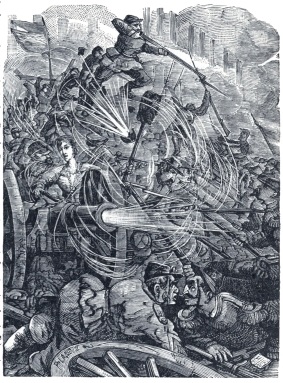
“WHO PUT THAT RIBBON IN YOUR CAP?”
“He eez some thing vat you in L’Amerique would call—vat eez
eet?—oui, a faro banker.”
I do not vouch for the truth of this legend, though I have every reason
to believe it to be true. I was personally in a café presided over by a
woman whom I firmly believe could manage just such a scheme. True or
not, it shows what the women of France will do for their beloved
country.
CHAPTER XXIII.
FRENCH DRINKING.
THE French are the most temperate people on the globe. Why this is so is
not easily explained, for it would be naturally supposed that so
excitable a people ought, in the very nature of things, to be
intemperate. They have no fixed code of morals, as the Saxon people
have, and they make no pretense of anything of the kind. They are
intemperate enough, heaven knows, in their politics, and apparently so,
to a stranger who does not understand French, in their conversation; but
in the matter of drinking they don’t do enough of it to injure an
English baby, and an American is lost in amazement at the little
stimulant they get on with.
There are drinkers of the deadly absinthe, and occasionally indulgers in
the more immediate but less fearful brandy, but they are rare. The
absinthe drinkers are, as a rule, literary men, reformers, and the
long-haired visionaries who have a notion that in stimulants there is
inspiration, and the reckless ones who hold that the more they get out
of life in ten minutes the more they enjoy. They are the men who invite
the guillotine, and walk to the scaffold with great alacrity, and shout
“Vive La France,” in the most picturesque and absurd manner. The devotee
of absinthe drinks it as a part of his social system, and generally dies
of softening of the brain at about thirty-five. He thinks he has a good
time, but he does not.
THE WATER OF PARIS.
There are low people who stupefy themselves with cheap brandy, but they
are not common. The Frenchman does not take kindly to the fierce
stimulant so common across the channel, and the amount of raw whisky
consumed each day by the average whisky-drinking American would fill him
with astonishment. He cannot comprehend it at all, and regards such a
man as a brute. Possibly he is not very much out of the way. I, for one,
quite agree with him.
And when it comes to wine he is very moderate. There is very little
alcohol in the red wine he drinks, so little that Tibbitts, after taking
a glass of it, remarked that he had known water in America that was more
exhilarating. And that wine, mild as it is, he dilutes fully one-half
with water, and sips it very slowly. In an evening he consumes not more
than a pint of it, getting out of that pint about as much stimulation as
is held in one drink of American sod-corn whisky.
But it suffices him. He sits and laughs and talks just as well over this
mild swash as the American does over his fiery, bowel-burning,
stomach-destroying, brain-shriveling liquor, and a great deal more, for
he enjoys himself, and the American does not. At least, so I have been
informed.
The use of wine is universal. It is in the bed-room in the morning, on
the table at twelve o’clock breakfast, it is taken at dinner at six
o’clock, and during the evening till bed-time.
The water of Paris is very bad; at least, so all Parisians tell you,
though I cannot see why it should be. I tasted it several times, and I
saw no especial difference between Paris water and any other, except, as
they do not use ice, it does get rather insipid in the Summer, when the
thermometer reaches ninety-five. But there is a superstition prevalent
that it is unhealthy, and hence it is never used as a beverage unless it
is qualified. The Frenchman drops a lump of sugar in it when he takes it
raw, though, as a rule, wine is used as a corrective.
Tibbitts had a bottle of cognac in his room to mix with the water. He
insisted that he thought too much of his mother and her happiness to
endanger his life by taking the water, bad as it was, clear, and the
wine of the country did not agree with him. He wanted to get back to
America, he did, that his friends might have the benefit of his foreign
experience.
An American in London remarked, that in all the time he spent in that
city he met but one cordial Englishman, and he was a Dublin man. So with
me in Paris. In all the time I spent there I saw very few drunken
Frenchmen, and they were to a man from either London or New York, and I
made very thorough search. The sobriety of the people is something
wonderful.

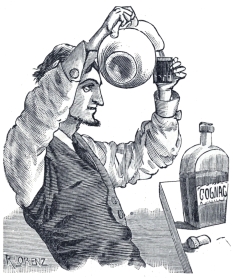
THE CORRECTIVE USED BY MR. TIBBITTS.
I saw plenty of men exhilarated; I heard more laughter than I ever heard
in twice the time in any other country; but drunkenness, the drunkenness
that maunders, and is idiotic, or the drunkenness that tends to
destroying property or life, I saw none of. In the Jardin Mabille, where
in England or America drunkenness would be co-extensive with the
attendance, at the students’ balls, at the Chateau Rouge or at even the
less pretentious places, there was hilarity in plenty, but no vinous or
spirituous excess. The same condition of affairs obtains in Switzerland
and Germany. I don’t want any man to say this is not so, for I assert
that drunkenness is comparatively unknown in the two countries where
wine and beer are the staple drinks of the people of all classes. I am
aware that the same statement has been made hundreds of times before and
disputed a thousand times, and therefore I was at pains to get at the
truth of the matter.
The use of wine in France is universal. It is drank by the commonest
laborer and the most aristocratic citizen. You go nowhere that you do
not see it—it is everywhere present, and is the one drink of the
country. The fruitful vineyards of France make it almost as cheap as
water, and the pampered wives and daughters of the ancient nobility who
bathed in wine were not guilty of a very frightful extravagance after
all.
THE MILD SWASH.
What a Frenchman satisfies his appetite with for drink is
something astonishing. The middle-aged man in America who would
deliberately ask for the root-beer of his youth would be laughed at as a
milk-sop. In America even the lemonade drinker is not looked upon with
favor, although that is admissible.
But in Paris you shall see a sturdy man walking the streets with an
immense can upon his back with cups attached, and men of all ages stop
him. He draws from the can a cup full of a liquid. He drinks it and pays
for it. What do you suppose this liquid is? Merely a decoction of herbs
and Spanish licorice, and coco, as harmless as mother’s milk, and a
great deal more insipid. Of mother’s milk I cannot speak, for it is a
long time since I have tasted it. I wish to heaven that the gap between
the present and the mother’s milk period were less. But the Frenchman
patronizes the coco seller, and his Chinese pagoda arrangement is always
well patronized.
There is no drunkenness. It may be that the Frenchman does not want to
get drunk, but I am convinced that the nature of the regular beverage of
the country is to be credited with this delightful exemption from the
great curse that devastates other countries. I am compelled to this
conclusion, for I have noticed that the French in America and England,
where spirituous liquors are the rule, come to be as frightful drunkards
as anybody; and, per contra, I know scores of Americans in Paris who at
home drank whisky habitually, and in consequence rarely went to bed
sober—so seldom that when it did happen their wives needed an
introduction to them—I know scores of these men here who have fallen
into the French habit, and drink nothing but wine, and are as sober as
the French themselves. They are getting to be so good that some of them
have felt justified in taking on other sins to keep them down to the
true American average. They have discovered that they can get on very
well with wine, and do not crave the fiery liquid they considered so
necessary at home.
A WOEFUL LACK OF MORAL.
I made a point of investigating this very thoroughly, for in days past I
have seen some drunkenness and the effects thereof. I have seen the dead
bodies of women murdered by drunken husbands; I have seen the best men
in America go down to disgraceful graves; I have seen fortunes wrecked,
prospects blighted; and I have perused a great many pages of statistics.
There are crimes on the calendar not resulting from rum, but, were rum
eliminated, the catalogue would be so reduced as to make it hardly worth
the compiling. Directly or indirectly, rum is chargeable with a good
ninety per cent, of the woes that afflict our country.
The moral to all this is—but come to think of it I am not here to point
out morals. I have made a true statement, and each one may extract from
it any moral he chooses. This is all there is of it: The French drink
all the wine they want, and the French are a sober people. It hasn’t
much to do with foreign travel; but to see thousands of men sitting and
drinking without a fight, an angry word, a broken head, or a black eye,
was so delightful an experience that I felt it must go upon paper.
CHAPTER XXIV.
PARISIAN LIVING.
THE Parisian family, unless it be one of the bloated aristocrats and
pampered children of luxury, do not occupy separate houses, as families
do in American cities. Rents are somewhat too high to permit that
luxury, and besides they never were used to it, and it wouldn’t suit
them at all. They have been accustomed to living up stairs for so many
generations that I doubt if a genuine Parisian of the middle classes
could be happy on or near the ground floor.
The first floor, and, for that matter, the second and third, in the
heart of the city, are devoted to business purposes. Above the third
floors the residences begin, and they continue to the very top. As a
rule, each floor constitutes a dwelling by itself, with halls, parlor or
drawing-room, dining and sleeping rooms and kitchen, all compactly and
very conveniently arranged. True, some of these apartments are small,
not large enough to swing a cat in; but, as Mr. Dick Swiveler wisely
observed, “You don’t want to swing a cat, you know.” The French
housekeeper finds a kitchen five feet wide and six feet long quite large
enough for the preparation of the food for the family, and the sleeping
rooms, being only used for sleeping, may be very comfortable, if they
are only large enough to hold a bed and the other necessary furniture.
HOW YOU GET INTO YOUR HOUSE.
The entrance to these buildings is on the ground floor, and is a wide
gateway with a diminutive suite of apartments on one side, which is
habited by the concierge, or, as the English call it, the porter. This
personage, usually a woman, receives all messages from the different
flats above her, answers all calls and gives all the information
concerning the various families inhabiting it. It is she who cleans the
main staircase which goes to the top of the house, and has charge of
the buildings.
At night, say at eleven, the great doors guarding this common entrance
are shut, and whoever desires to enter thereafter finds a bell-pull, the
other end of which is at the head of the concierge’s bed. She doesn’t
bother herself to get up and see who it is, but she merely pulls a wire,
the bolt of the great door is withdrawn, you enter, and shutting the
door after you—it fastens with a spring lock—go to your floor, and
enter your own house.
Tibbitts likes this idea very much. He says that when you come home late
at night, and not precisely in the condition to be accurate about
things, there isn’t any nonsense about finding a key first, and then
going through the more delicate operations of finding a keyhole and
getting the key in right side up. “All you have to do is to catch on
that bell-pull, and the more unsteady you are, the better, for you lean
back upon it, and your whole weight takes it.” And he further remarked
that there wasn’t a concierge in Paris who wouldn’t know his ring before
he had been in the house a week.
The principal business of the concierge and her entire family is to keep
the stairs clean. I once held that the Philadelphia servant girl would
die were the supply of water to run out so that she could not wash
sidewalks and marble steps, but she has a worthy rival in the Parisian.
The stairs leading to the top of the buildings are kept sloppy all the
time with the perpetual cleaning. Indeed so constantly is this going on
that no time is given to enjoy the luxury of clean stairs. Not only the
stairs are cleansed, but the very sides of the building are washed and
scrubbed once in so many years, by law. If Paris only took as much pains
with its inside as it does with its outside! But it doesn’t.
Once inside the houses, the first thing that strikes an American is the
total absence of carpets; that is, carpets as we have them. The floors
are of wood in many patterns, and in the center there may or may not be
a rug, which covers, perhaps, two-thirds of the room. A room carpeted
the entire surface is very rare, and I must say that therein the French
housekeeper does better than the American. These rugs are taken up very
frequently, it being no trouble, and are kept clean and free of dust,
something impossible when they are fastened to the floor, as is the
custom across the water.
In the Summer they are taken out of the way entirely, and the bright
waxed floor is deliciously cool, and in the Winter the rug, always in
warm colors, forms a pleasing contrast to the wood on the edges. The
French idea is better than ours.
The French housekeeper is perfection in her way. She allows nothing to
go to waste. There is not a penny’s worth more purchased than can be
used, and the ending of the day sees the ending of what was bought for
the day. If there are ten to sit down to the table there is soup made
for just ten—not enough for twenty and the remainder to the slop
bucket—and there is just meat enough to make ten portions, and no more.
There is butter for ten and vegetables for ten. By the way, very little
butter is used. Wine is provided ad libitum, and even that, cheap as
it is, is carefully poured from the half or two-thirds emptied bottles
into others and carefully husbanded till the next meal brings it out.
There is nothing of meanness in this—only the good sense not to waste.
The French housewife, very properly, sees no use in throwing away food
any more than she does money. Consequently, despite the much higher cost
of provisions, a French house gets on in better style than an American,
and at a much less expenditure.
THE MARKET WOMAN.
The skill of the French cook is proverbial, and his reputation is
deserved. One of the craft once said that with a pair of cavalry boots,
a handful of grass and plenty of salt and pepper, he could make soup for
a regiment, and I believe him. They use more vegetables than we do, and
use them infinitely better. Out of the despised carrot, which seldom
makes its appearance on American tables, they make a delicious dish, and
their treatment of potatoes, tomatoes, and the whole race of
salad-making vegetables, is something akin to miraculous. They use oil
in profusion, and no matter what the raw material is that comes under
the hands of a French cook, there is a taste and relish about the
product that is satisfying as well as gratifying. The Frenchman at his
table aims at all the senses. To begin with it is garnished with
flowers, and, second, the dishes gratify hunger, and, thirdly, they
gratify the taste. Then, as an appropriate finish, they will have the
most cheerful conversation, and for the time all care and trouble is
banished and the feeding time is the good time of the household. A
Frenchman may come to his house ever so much depressed, but he has a
thoroughly enjoyable time at his dinner. He may rise from the table and
blow his brains out, but at the table no one would ever know or dream
that he ever had a trouble.
Among the middle classes, and indeed the better, the lady of the house
does the marketing in person. It is too important a matter to be
entrusted to a servant, for they are exceedingly particular as to the
quality, and equally so as to the price of the supplies. French
market-people, especially the women, are the shrewdest and the most
unscrupulous in the world, and it requires much care and skill not to be
imposed upon. I went one morning with my landlady to see a French
market.
The first thing desired was a lobster. One was selected and then
commenced the bargaining.
“How much?” demanded the Madame.
“Five francs,” was the answer, “and very cheap it is. Observe, Madame,
its size, and its condition. Oh, I have nothing but the best. Shall I
put it into your basket?”
“No, it is too much!”
“Too much! Madame, you would starve me. Well, then, you are an old
customer (she had never seen Madame before), I will give it to you—I
would no one else—for four and a half. It is ruin, but I can’t keep
them over.”
“I will give you two francs.”
“Two francs! You jest, Madame. Two francs for this king of
lobsters—this emperor! Ah no! but I will say four—and little Jean
shall go without shoes.”
“Two francs.”
“Say three and a half—my landlord can do without his rent till times
are better.”
Precisely as the two franc offer was being accepted, a young man drove
up in a stylish coupe.
“How much for that lobster?”
“Ten francs, Monsieur le Colonel,” replied the dame without a blush.
“Wrap it up and put it in my carriage,” was the reply, and it was done.
“Why did you ask him ten francs when you only asked me five to begin
with, and intended to take two?” demanded my landlady, purely that I
might hear the answer.
“Eh? Oh, the young man has plenty of money—it is for his little woman,
I suppose. We poor must live, and I must make my profit. But here is one
just like it—rather better. Shall I say three francs?”
“Two.”
“Well, it must be so. But I lose money.”
The old dame made a good hundred per cent. as it was.
As it was in lobsters so it was in everything. The price offered in
every instance was about two-fifths of the price asked and even then it
was not certain but that too much was not paid. But when a French market
woman and a French housekeeper come together there is not going to be
very much swindling. Both know their business and whoever gets the best
in the encounter may congratulate herself upon possessing a great deal
of acumen.
The servants in French families are now tolerably attentive and
obliging, but their bearing depends very much upon the political
condition of the country. Every Frenchman is a politician, and they have
all the shades of politics down to the humblest, and the lower orders,
as elsewhere, take their politics from their superiors. The retainers in
the families of the old nobility are Monarchists to a man, and hate the
Republic with a hatred that the dispossessed nobility themselves do not
feel. The waiters at the cafés and those who entered domestic service
latterly are all virulent Republicans, disagreeably so. Especially was
this true just after the downfall of the Third Napoleon, and after the
Commune. A lady of my acquaintance, who got out of Paris just before the
Commune, returned and rearranged her household after order was restored.
Her daughter had engaged servants, and the good old lady rang for one.
PARISIAN WASHING.
“Are you one of the new servants?” she asked, as a strange man answered
her summons.
“No, Madame. I am in your employment, but no servant. Since the
Republic, there are no servants. Address me, please, as ‘citizen!’ ”
And she was compelled to do it, or go without service. The man
considered himself the equal of his mistress in all particulars, and
would be counted nothing less.
Fuel is very costly in France, and consequently very little used. In
Paris the climate is mild, and very little is needed. But the same
economy is observed in this as in everything. Twigs of trees and the
smallest bushes, cut in uniform lengths, are used for firing, and for
cooking the use of charcoal is almost universal.
As the shops furnish food as cheaply as it can be prepared at home, it
is only in families that cooking is done. The washing among this class
is done altogether at the public wash-houses in the Seine. These are
immense boats anchored close to the bank and partitioned off into spaces
just wide enough for a woman to work comfortably. For two sous, the
woman has the use of tubs and hot and cold water ad libitum. She takes
her bundle of soiled goods, and her own soap, and washes them, using a
heavy wooden paddle to drive the soap through the fabric, instead of the
pounder and washboard, and, wringing them out, carries them home wet. A
few sous’ worth of charcoal suffices to iron them, and the same fire
cooks her little dinner, and so two very important birds are killed with
one stone. The shop girls, whose attics will not admit of a fire, have
no other way of washing their clothes, and so the public wash-houses are
always full.
The eating of the day commences with a very slight breakfast in your
room at any hour you choose. The said breakfast consists of exactly one
cup of coffee or chocolate—it is measured accurately, there is exactly
one cup in the little pot—two rolls and an infinitesimal portion of
fresh butter. You bid good-bye to salted butter when you leave the
steamer. On this you exist till twelve, or thereabouts, when you have a
breakfast as is a breakfast. There are eggs and one or two varieties of
meat, and wine ad libitum, ending with sweets. This over, at six you
have the meal of the day, the dinner, consisting of five or six courses,
commencing with the everlasting soup, and ending with black coffee. Wine
constitutes the drink of this meal, as at the breakfast.
THE TIDY FRENCH WOMAN.
It takes an American some little time to get used to this light
breakfast, but when accustomed to it he is entirely satisfied with it.
If he has nothing to do it is certainly better than the heavy breakfast
of his own country, and unless he has the most violent bodily labor to
perform, it is better than to go to business with an overloaded stomach.
Anyhow, whether you like it or not, it is all you can get, and a wise
man always manages to like what is inevitable. One very soon gets to
liking this very strange innovation upon one’s established habits.
The French woman esteems tidiness and cleanliness above everything on
earth, that is, outward tidiness. If rumor be true, they are not so
particular as to internal economy, but the outside of the platter must
be as white as the driven snow. An English or American woman will walk
the sloppy streets and drag her skirts in the mud and filth till they
are not only uncomfortable but are absolutely indecent in appearance.
All this could be avoided by merely lifting the skirts, but the notion
of delicacy, the fear of exposing an ankle, prevents this. That is the
Anglo-Saxon notion of delicacy. The French woman has other views. Her
ankles are not sacred, but her skirts are. She will not have soiled
skirts, she will not have petticoats with the filth of the streets upon
them, and so when she comes to a vile spot, she lifts her skirts and
passes over without carrying any of the filth with her. It matters not
if her ankles are exposed. That she expects. But she does this
skirt-lifting with such a grace and such a manner that to an American
even it is the most natural thing in the world. The French woman hoists
her skirts in a way that makes it apparent to the most critical observer
that it is not done to show neatly turned ankles, but to save her person
from filth. It is a necessity with her, from her stand-point, and is
consequently accepted as such. She has no objection to exposing a
shapely ankle, but whether the ankle be shapely or not, no Parisian
woman will ever, under any circumstances, be untidy. She has a passion
for neatness, and a very pleasant passion it is. Would that she were as
correct in her other passions.
Every woman in Paris, or for that matter everywhere in France, works.
This is the secret of French prosperity. This explains the ease with
which the French people recovered from

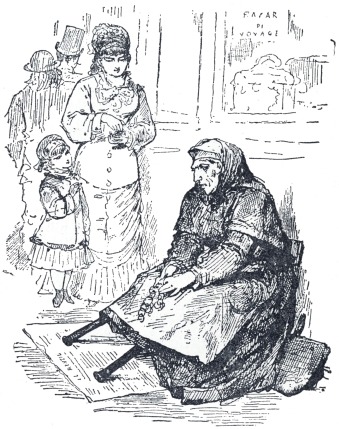
THE NO-LEGGED BEGGAR WOMAN—BOULEVARD DES CAPUCINES.
FEMALE SHOP-KEEPERS.
the extravagance of the Empire, the frightful cost of the war with
Prussia, and the enormous indemnity exacted by the merciless Bismarck.
It is the universality of labor, and the knowing how to live well upon
next to nothing. A French wife not only does the house keeping for her
family, but she takes care of the shop. She sells the goods which her
husband makes. Say he is a trunkmaker—he is in the shop on the floor
above, or the floor below, as the case may be, working for dear life,
but in the salesroom sits Madame, his wife, or Mademoiselle, his
daughter, who sells the goods, takes the money, keeps the books, buys
the materials, and runs the business end of the concern.
But this is not all. Customers do not come in every minute, and Madame
has time upon her hands. She does not waste it. There are her children,
too young to work, but they must be clothed, and if there are no
children there are a few sous to be earned by knitting, or fancy
needlework. And so all this spare time is put in by Madame, sewing or
knitting, either for her own family or for a market. Not a minute goes
to waste. Wherever you see a French woman you see her doing some thing.
The nurse-maid, who takes her charges out for an airing, has work in her
hands, and she works. In the gardens in the Palais-Royal you shall see
hundreds of nurse-maids whose charges are playing under the beautiful
trees, knitting industriously, one eye on the work and the other on the
children, and in every shop you enter you see the same thing.
Wages are very low, but with this absolute economy of time and the more
absolute economy in the matter of living, the French workingman manages
to get on better, on an average, than those in the same station in any
other country in the world. French industry and French thrift make
anything in the way of living possible. There is nothing like it.
Transportation is very cheap in Paris and exceedingly good. The
omnibusses are large and the street cars likewise, and have the delight
of holding as many people on the top as on the inside. And then they are
never overcrowded. You are entitled to and get a seat. When the seats
are all taken the sign “Complet,” is displayed, and no more passengers
are admitted. A ride on the top of a French omnibus in good weather is a
delight.
The Frenchman tries to imitate the English and Americans in the matters
of sport, but it is a sorry failure. The young French sport gets himself
up in remarkable sporting costumes, and goes out gunning, and always
returns with game. Does he shoot it? Alas! It can be bought, and—he
buys it. But he brings in his hare or his birds, or whatever can be
bought that has been freshly killed, and proudly displays it to his
friends and talks loudly of the pleasures of field sports.

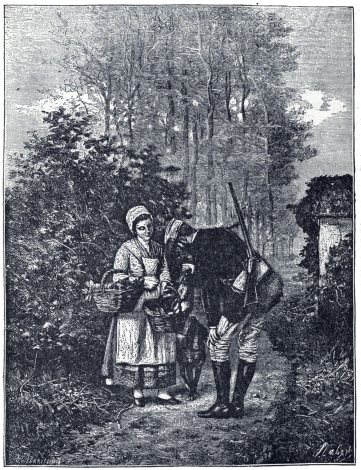
HOW THE FRENCH SPORT KILLS GAME.
THE FRENCH SPORT.
Fishing in the Seine is another amusement, though I never met anybody
who had ever caught a fish. There are more lines in the Seine any hour
of the day than there are fish, but they all fish just the same. The
docks are lined with men and boys at all hours, and all standing as
gravely and patiently as though they made their living by it. The sight
of a fish would astonish them.
Bloss, my old showman friend, arrived last night from Switzerland. There
are a number of bears kept at Berne, the property of the city, one of
which, some years ago, killed an English officer who fell into his den.
That bear—but Bloss may tell his own story.
“Wat I wantid wuz that bear. I wantid that identical bear, the very one
that squoze the Britisher. Ef I cood hev

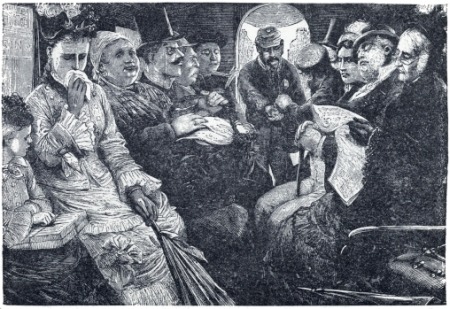
INSIDE A PARISIAN OMNIBUS.
A SHOW ADVERTISEMENT.
got that bear it wood hev bin the biggest thing in the annals of the
show biznis. So I went to Berne and saw the President of the Swiss
Republic. I offered him fust two hundred dollars for it, pervided he
would write a certifikit on parchment and put the seal of the Republic
onto it that it wuz the identical animile. Ye see, ef he hed done this
I should hev put it onto the bills this way:—
That there may be no doubt in the minds of a too-oft deceived
public, deceived by audacious pretenders who advertise what they
know they cannot perform, that this is the identical ferocious bear
that did actually kill an unfortunate British officer in the
presence of his newly-made bride (he wasn’t married at all, but you
can’t awaken no interest without the pathetic)—who was powerless
to extricate him from the tenacious grasp of the ferocious brute,
the most dangerous of the species, the certificate of the President
of the Swiss Republic, with the broad seal of the Republic
attached, will be exhibited at each and every entertainment, all
reports to the contrary notwithstanding, and positively without any
extra charge. This statement is made to counteract the envious and
malicious reports of would-be rivals, who seek to make up by
slander and misrepresentation, what they lack in enterprise and
resource.

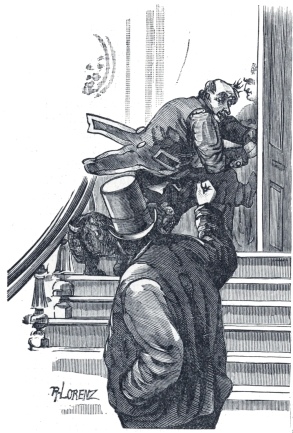
THE SHOWMAN SHOWN THE DOOR.
I should hev hed a copy—a fac-similer—uv the certifikit printed, in
two colors, and I shood hev hed the certifikit itself hung out afore
the big tent, and it would hev bin wuth a heap uv money to me.
“Did you succeed?”
“Succeed! Why the bloated aristocrat refoozed to hev anything to say to
me, and directed a servant to show me out. A pretty Republic that is,
where the President won’t hear a common biznis proposishen! And then I
went to the Mayor uv the city, and when my proposishen wuz translated to
him, he remarked that he wuzn’t in the bear biznis, and he hed me showed
out. I shood like to be a voter in Berne at one elecshun. But I shel hev
the bear that killed the offiser jes the same. That is, I shel advertise
that one uv the bears I yoose that eat the children in the Elijah act is
the identikle one. I don’t like to deceeve the public—I hed ruther deal
strate with ’em, but I must git my expenses out uv that trip to Berne
somehow, and I shel hev the President’s certifikit all the same. Yes,
and blast me ef I don’t add the Mayor’s to it to make ashoorence doubly
shoor. I ain’t agoin’ to Berne for nothin', nor am I goin’ to lose an
ijee. Ijees are too skase to waste one.”
“Did you enjoy this trip to the land of Tell?”
The sound of the word “Tell,” was sufficient to tap the old gentleman
once more, and he went off into a narrative that flowed smoothly as
cider from a barrel.
DE LACY’S IDEA.
“The land uv Tell! I shel never forgit Tell—Willyum, the Swiss wat shot
a apple offen his boy’s head. It wuz way back in 1844, when I was
runnin’ my great aggregashun in the West. We had a minstrel sideshow in
the afternoon, and a regler theater for a sideshow in the evenin'. Our
leadin’ man wuz Mortimer de Lacy, from the principal European and Noo
York theaters—his real name was Tubbs; he wuz the son uv a ginooine
Injun physician, which hed stands about the country suthin’ like a
circus—who wuz very fond uv playin’ Tell. De Lacy wuz one uv the most
yooseful men I ever hed. He rid the six hoss act, the “Rooshun Courier
uv Moscow,” and did the stone-breakin’ act, where he bends over on his
arms and hez stuns broken on his breast with sledges, and he did the
cannon ball act, and in the afternoon wuz the interlocootor in the
minstrel show, playin’ the triangle—anybody kin play the triangle, and
he alluz sed he wood give anything ef he cood manage a banjo or even a
accordeon so ez to git up in the perfesh—and in the evenin’ he did the
classical in high tragedy. The afternoon minstrel show wuz for the
country people, but the play in the evenin’ wuz to ketch the more
refined towns folks. Well, one day De Lacy cum to me, and sez he:—
“ ‘Guvnor, I hev a idear.’
“ ‘Spit it out,’ sez I. ‘Idears is wuth money in our biznis.’
“ ‘I kin make Tell more realistic. You know the way we do the shootin’ uv
the apple off the boy’s head is to shoot an arrer into the wings and the
boy comes runnin’ out with a split apple in his hand.’
“ ‘Yes, that’s the way it alluz hez bin done. It’s a tradishn uv the
stage.’
“ ‘I perpose to hev the boy stand on the stage in full view uv the
awjence, and to shoot the apple off his head under their very eyes. It’s
a big thing.’
“ ‘Big thing! I should say so. But you can’t shoot an apple with an
arrer. You couldn’t hit the side of a barn.’
“ ‘Very good, but this is my idear. We only play Tell at night. We
stretch a wire across the stage jes the height of the boy, and the wire
runs through the apple on the boy’s head. Then I hev a loop fixed onto
the arrer, and when I shoot it runs along the wire—see?—and knocks the
apple into smithereens. It’s a big notion.’
“It occurred to me that it wood be a good piece of biznis and I agreed
to it. My youngest boy, Sam, alluz played the boy, and De Lacy and I
fixed the riggin’ and hed it all right. To make it more realistic De
Lacy hed a very broad-headed arrer made so that the awjence should see
it wuz reel, and everythin’ wuz ready. When that scene come on, the boy
come out walkin’ very keerful—we hed the apple fixed tight upon his
head so that ef he walked in a strate line it wooden’t be moved, and he
wuz placed. After the speeches De Lacy sprung the bow, and let the arrer
drive with all the force it hed.”
“It must have been a thrilling scene.”
“Thrillin'! Yoo bet! But we didn’t repeat it. Bekaze yoo see the wire
slackened, and the arrer struck Sam on the top uv the head and scalped
him as clean as a Camanche Injun cood hev done it, and he howled and
jumped onter De Lacy and the wire tore down the two wings it wuz hitched
onter, and De Lacy in gittin’ rid uv him tore down the rest uv the
wings, and they clinched and rolled down onto the stage, and the awjence
got up and howled, and the peeple all rushed on, and there wuz about ez
lively a scene ez I ever witnessed in a long and varied experience. It
wuz picteresk and lurid. I rung the curtain down and separated ’em. It
wuz a good idear, but it didn’t jes work, owin’ to defective machinery.”
THE CAREER OF SAM.
“But it turned out pretty well, after all. The smart man is he who turns
wat to others wood be a misfortoon to account. I hed the scalp tanned
with the hair outside, and ez soon ez Sam’s bald head healed up I
exhibited him in a blue roundabout, with brass buttons—I bought the
soot cheap uv a bell boy at a hotel in Cincinnati—ez the son uv the
Rev. Melchizadek Smith, a missionary for thirty years among the Injuns,
who wuz scalped at the time his father wuz barbariously killed, and I
hed a life uv the Rev. Smith writ, and an account of the massacre, and
Sam sold it after he hed bin exhibited. It did very well till he got too
big for that biznis.”
“But Sam is doin’ very well. He is now an end man in a minstrel show,
and he does the Lancashire clog, and does mighty well in the wench
biznis, and he hez a partner in the brother biznis, the De
Montmorencies, I beleeve they wuz, the last time I heerd uv ’em. He will
git on—he hez a great deal uv talent and kin turn his hand to almost
anything.”

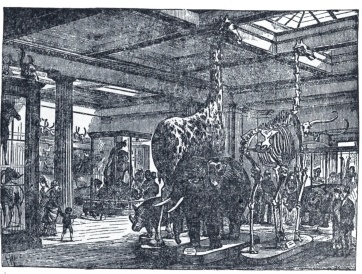
ZOOLOGICAL ROOM—BRITISH MUSEUM.
CHAPTER XXV.
IRELAND.
“ ’Tis the most distressful country that ever yet was seen,
They’re hanging men and women there for the wearin’ of the green.”
From France the gay, France the prosperous, France the delightful, to
Ireland the sad, Ireland the poor, Ireland the oppressed, is a
tremendous jump. Contrasts are necessary, and my readers are going to
have all they want of them.
CORK.
Cork is a lovely city; that is, it would be a lovely city were it a city
at all. Nature intended Cork for a great city, but man stepped in and
thwarted Nature. It is situated on the most magnificent site for a city
there is in all Europe. A wonderfully beautiful river, with water
enough to float any vessel, flows through it; and at the mouth of that
river, twelve miles below, is one of the great harbors of the world.
Queenstown—I wonder that any Irishman ever consented to call it
Queenstown—is the nearest port to the great western hemisphere, and
Cork should be the center of all the trade from America.
It is twenty-four hours nearer New York than Liverpool, and should be
the final landing-place of the American lines, instead of being simply a
point to be touched.
Cork is a sleepy city of perhaps seventy thousand population, made up of
the handsomest men and most beautiful women and children on the face of
the globe. You shall see more feminine beauty on the streets of Cork in
an hour than you can anywhere else in a week. Homely women there are
none—beautiful women are so plenty that it really becomes monotonous.
One rather gets to wishing that he could see an occasional pair of
English feet, for the sake of variety.
The city itself is beautiful, as are all the cities of Ireland; but it
is a sad city, as are all the cities of Ireland. It is not prosperous,
and cannot be, for it is under English domination, and England will not
permit prosperity in Ireland. It is only the attachment which an
Irishman has for his own country that makes anybody stay there. With
every natural advantage, with every facility for manufacturing, for
trade and commerce, with the best harbor in the world, and the nearest
point for American trade, it has no manufactures to speak of, and no
trade whatever. Its population has decreased thirty thousand within
fifteen years, and its trade is slowly but surely dwindling to
nothingness.
The river Lea is a wonderfully beautiful stream, and Cork, which
occupies both sides of it, is a wonderfully beautiful city, and would be
an enjoyable city but for the feeling of sadness that comes to an
American the moment he sees the empty warehouses, the empty dwellings,
and the signs of decay that are everywhere.
There are churches everywhere, and churches with a history. Here is the
church of Shandon, of whose chimes Father Prout wrote:
“The bells of Shandon
That sound so grand on
The pleasant waters of the river Lea.”
Here is climate, soil, situation—everything to make a great controlling
city; here are a people with industry, intelligence, brains, and all the
requisites to make a great controlling city; but, despite all these
points in its favor, Cork has decreased year by year, and is to-day
absolutely nothing. The city has lost population every year; its
business is leaving it, its warehouses are empty, its streets are
deserted, its quays are silent—it is nothing.
What is the reason for this? It is all summed up in one
word—landlordism. There is no man in the world, not excepting the
Frenchman, who will work longer or harder than the Irishman. There is no
race of men who are better merchants or more enterprising dealers, and
there is no reason, but one, why Cork should not be one of the largest
and richest cities of the world. That reason is, English ownership of
Irish soil.
Irish landlordism is condensed villainy. It is the very top and summit
of oppression, cruelty, brutality and terror.
It was conceived in lust and greed, born of fraud, and perpetuated by
force.
A MILD EXPRESSION OF OPINION.
It does not recognize manhood, womanhood or childhood. Its cold hand is
upon every cradle in Ireland. Its victims are the five millions of
people in Ireland who cannot get away, and the instruments used to hold
them are bayonets and ball cartridges.
It is a ghoul that would invade grave-yards were there any profit to be
gotten out of grave-yards. It is the coldest-blooded, cruelest infamy
that the world has ever seen, and that any race of people was ever fated
to groan under.
Irish landlordism is legal brigandage—it is an organized hell.
Wesley said that African slavery was the sum of all villainies. Irish
landlordism comprises all the villainies that the devil ever invented,
with African slavery thrown in. Irish landlordism makes African slavery
a virtue by comparison. For when a negro slave got too old to work, he
was given some place in which to live, and sufficient food to keep him
in some sort of life, and clothes enough to shield him from the
elements.
The Irish tenant, when he becomes old and cannot work, is thrown out
upon the roadside, with his wife and his children, to die and rot. He
has created lands with his own hands, which he is not allowed to occupy;
he has grown crops which he is not allowed to eat; he has labored as no
other man in the world has labored, without being permitted to enjoy the
fruits of his labor. The virtue of his wife and daughter are in the
keeping of the villain, who by virtue of bayonets, controls his land. In
short, to sum it all up in one word, the Irishman is a serf, a slave.
In a country that makes a boast of its freedom, he is the suffering
victim of men who claim to be Christians; he is the robbed, outraged
sufferer of a few men who are as unfeeling as the bayonets that keep him
down, as merciless and cruel as tigers.
From the above feeble utterances my readers will, I hope, get the idea
that I do not like Irish landlordism. I hope some day to get sufficient
command of words to make my meaning apparent. I really would like to
make it understood just how I feel about it.
To see Ireland you must not do as the regular tourist always does,
follow the regular routes of tourists’ travel. You may go all over
Ireland, in one way, and you will not see a particle of suffering, or
any discontent. At Glengariff, for instance, the most charming spot on
the earth, you are lodged in as fine a hotel as there is anywhere; the
people are all well dressed and well fed, and the visitor wonders why
there should be any discontent.
This is a part of the English Government’s policy. On these lines of
travel, which the tourist for pleasure always takes, the misery is kept
out of sight, and the mouths of the people who serve you are sealed. The
American lady traveling through that country don’t like to see naked
women and squalid poverty, for it would make her uncomfortable. None of
it is shown her, and she wonders at the discontent of the Irish.
But just take a boat at Glengariff, leave the splendid hotel, and be
rowed two miles across the bay, and you begin to see Ireland, the real
Ireland. You then know why Ireland is agitated; you then see the real
reason why an Englishman is hated with an intensity that would find
expression in a rifle shot, if rifles were permitted to be owned and
used.
We took a train for Fermoy, a distance of perhaps fifty miles from Cork.
In Fermoy, a tolerably prosperous village for Ireland, the women did not
only have no shoes or stockings, but they had scarcely anything else to
wear.
“This is nothing,” said the wise Mr. Redpath, who was with us; “these
people are fairly prosperous—for Ireland. I shall show you something
worth while before night.”
It puzzled me somewhat to understand how anybody could be worse off than
to be walking in cold mud without any protection whatever for the feet,
but I found it at Mitchellstown, at the foot of the Galtee mountains.
THE JAUNTING CAR.
The Irish jaunting-car, being the most inconvenient and detestable
vehicle on earth, deserves a description. It should be known in order to
be avoided. A jaunting-car is simply a two-wheeled vehicle with the body
that supports the seat reversed. Instead of sitting so as to look
forward, you are on the side; the seat runs the wrong way—which is
characteristic of almost everything in Ireland. The driver sits looking
toward the horse, the passengers sit backing each other, and the concern
is so balanced that you must hold on a rail with a death-grip, or be
flung off upon the road by every jolt. As detestable as it is, it is the
national Irish vehicle, and you ride on the car, or go afoot.

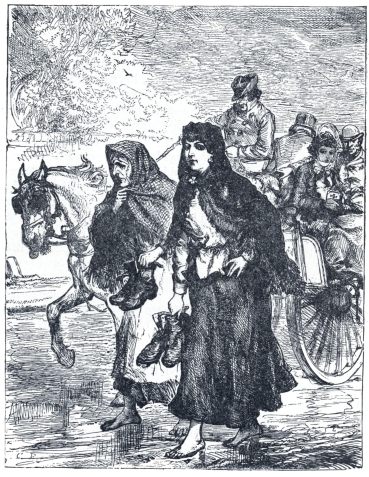
AN IRISH WOMAN AND HER DAUGHTER ON THE ROAD TO CHURCH.
On one of these atrocious conveyances, we left Mitchellstown at nine
o’clock in the morning, in a soaking rain-storm, the cold, misty
drizzle going through our heavy overcoats, and almost penetrating the
very marrow. The road wound along past well cultivated fields, over
picturesque streams, now up gentle declivities that gave us, or would
have given us had the day been clear and fine, an admirable view of the
valley that lay spread at the foot of the Galtee Mountains. But on that
day the picture was not a cheering one. The sun refused to shine, the
rain was cold, and the whole prospect was bleak and desolate. Then our
driver was a loquacious fellow, who had at his tongue’s end hundreds of
instances of the oppression of landlords and the terrible sufferings of
the poor, evicted tenants. He talked fast, and, his whole heart being in
the subject, he talked well, oftentimes emphasizing his stories by
pointing to bare-footed, bare-legged and bare-headed women, who went
trudging along the cold, wet road, with no protection from the frightful
inclemency of the weather but a light shawl thrown over the ragged dress
that scarcely covered their bodies. These women, whom he pointed out as
evicted tenants, were not the rough, degraded-looking beggars that are
commonly supposed to overrun Ireland, and make the tourist’s life one of
continual annoyance. They were bright, intelligent and handsome, and,
notwithstanding the horrors of their situation, comparatively cheerful.
But it was an unnatural cheerfulness, for it was noticeable that there
were lines about the mouth and around the eyes that told only too
plainly their story of want and suffering.
Even with these living evidences, we could hardly believe the stories of
cruelties committed by the landlords and their agents, which our driver
kept pouring into our ears. We could not realize that they could be
true. They seemed so absolutely barbarous that we utterly refused to
accept them, and did not, till, having gone about nine miles from
Mitchellstown, we stopped at a little roadside cabin, as they called it,
although we would have more properly denominated it a hovel.
MR. DUGGAN’S FAMILY.
At the invitation of our guide we alighted, shook the rain off from our
great coats, and entered the place to inquire for Michael Duggan, who
worked the little holding back of it. He was not at home, but his wife,
a comely, buxom woman of about forty years, asked us to be seated, at
the same time offering a small stool on which one of the girls of the
family had been sitting near the fire, taking care of an infant.
While our guide was inquiring for Mr. Duggan, we made an inspection of
the house, where a man, his wife and seven children lived. There was the
one principal room in which we were standing, which was about ten by
twelve feet, and eight feet high. There was no floor, except the
original earth. There was only one opening for a window, and that had
never known a pane of glass. In one end of the room there was a dingy,
smoky fireplace, around which were huddled three or four children,
scantily dressed in loose cotton slips that came to just below the knee.
At the other end of the room a brood of chickens disported themselves in
a pile of furze, while every few minutes a huge porker would push his
nose in at the open door, only to be driven away by one of the children.

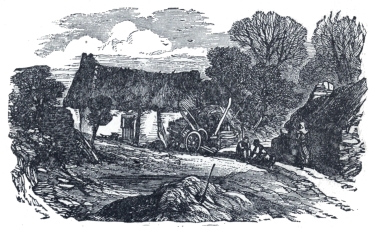
The family was very interesting. The mother was tall, well formed, and
of an exceedingly pleasant appearance, while the children, shy at the
sight of so many strangers, were sturdy, healthful and clean. They
were bright and intelligent, and under any other circumstances and mode
of life would grow up to be eminently representative citizens.
On the return of Mr. Duggan from the fields, we went with him up the
Galtee Mountains, he explaining on the way that he was very comfortably
fixed compared with his neighbors. He said that his grandfather had
taken the little holding he occupied, when it was full of stones and
rocks, and was next to worthless. He paid a rent of three shillings an
acre for it. During his lifetime the land was partially reclaimed, the
rocks and boulders were taken out of a part of one field, and the rent
was advanced to seven shillings. His father further improved it and
raised some little crops, and the rent went up to twenty shillings. When
the present tenant succeeded to it, it was in comparatively good shape,
and with the improvements he had made, building the house, or rather
hovel, the value of the land had increased enough in the mind of the
landlord to justify him in placing the rent at two pounds.

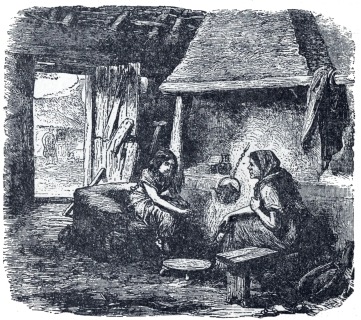
INTERIOR OF A BETTER CLASS CABIN, COUNTY CORK.
THE ALTERNATIVE.
That tract of land in America, if one were to go to the few districts
where such abominably bad land can be found, would be thought extremely
high if it were sold at a dollar, or four shillings an acre.
“Well, how in the world can you raise enough on such a holding to pay
such an exorbitant rent?”

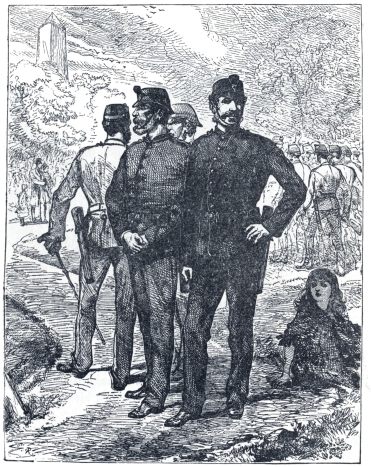
ROYAL IRISH CONSTABULARY.
“I can’t do it. I’ve tried my best, but it is absolutely impossible.”
“Suppose you don’t pay the rent, then what?”
“I’ll be thrown out in the road, with my family and the little furniture
we have gotten together.”
“In case you refuse to be thrown out of the house you have built, and
off the land you and your fathers before you made from utterly worthless
fields of rocks?”
“Then those fellows would come down upon me.”
As he spoke he pointed to a flying squadron of a hundred and fifty men,
who were riding back to Mitchellstown after having evicted a number of
tenants who had been unable to pay the back rent. They were a fine
looking body of men, well mounted and well armed, each one carrying a
loaded carbine, while at his side was dangling a sword bayonet.

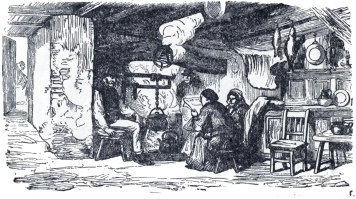
INTERIOR OF A CABIN IN KILLALEEN.
But our business in hand was not speculating upon results so much as to
see the actual conditions that led to and still sustains the agitation.
So we plodded on, through the drenching rain that was coming down in
torrents, up the bleak and desolate hill side.
Along the side of the road were high stone fences, from four to seven
feet wide at the top, rather good fences for so poor a country.
“Why, you see,” said Mr. Duggan in reply to an inquiry as to how they
found time to make such solid substantial fences, “those stones were
every one taken from that field there, and having no other place to put
them we made a fence, and our rent was raised on us for doing it, worse
the luck.”
ANOTHER CABIN.
We looked into the field whence these stones were taken. It was as
uninviting a piece of ground as can be imagined, still full of huge
boulders, rocks, weeds and the never-dying heather. It was not capable
of supporting a sparrow, yet for the slight improvement that had been
made, the rent had been raised. Great inducement that for a man to work!
Seeing a little low, thatched cabin just off the road, we asked in all
simplicity, if it had any history, for by this time it was beginning to
dawn upon us that almost everything in that vicinity had some story
connected with it. But we were totally unprepared for the reply.
“No, there’s no history about it. It is simply the dwelling place of a
family of people who are daily expecting to be evicted because they
can’t pay the rent, the father having been unable, through sickness, to
work all of the season.”
The idea that human beings, made in God’s image, having the power to
think, to reason and to act, could live, even exist, in such a hovel as
that was so incredible that we insisted upon going over and seeing how
it was done.
Wading through mud and slush coming over our shoe-tops, we bent our
heads and entered. The room, if so it could, by a stretch of the
imagination, be called, was so low that we could not stand erect. The
cold bare earth that constituted the floor was damp and slippery as the
rain came trickling down through the broken thatch and formed little
pools on the ground. Near a suggestion of a fire, were huddled a woman
and four children, the eldest not more than eight years of age. As we
entered they all arose. We were horrified to see that they were as usual
without stockings or shoes, and their clothing was so torn and ragged
that it afforded no warmth whatever. The mother and her little girls
were blue with cold. Their features were pinched with hunger. Their
whole appearance indicated the want and suffering they had been
patiently enduring for years.
Over in one corner of the room was what they called a bed. It consisted
of four posts driven into the ground. On stringers were laid a few rough
boards; on these boards were dried leaves and heather, covered by a few
old potato sacks. There was where this family of six persons slept.
There was no window in the house, the only light and ventilation being
furnished by the door and the cracks in the thatched roof.
It was too horrible and we went out again into the rain—there we could
at least get a breath of fresh air. We asked our guide how these people
managed to keep the breath of life in them. He said they lived as their
neighbors did, on potatoes and “stirabout.”
“What is ‘stirabout'?”
“It is a sort of a mush made of Indian meal and skimmed milk. They have
that occasionally, for a little luxury, or when the potatoes are so
scarce that they think they must husband them.”
“You don’t mean to say that these people actually live on that fare?
that they have nothing else? They at least have meat with their
potatoes?”
“God bless you, sir,” and the honest man’s eyes filled with tears, “they
never know the taste of meat. There has not been a bit of meat in my
house since last Christmas, when we were fortunate enough to get a bit
of pig’s head. But up here they don’t even have that.”
A TERRIBLE SEVEN HOURS.
Surely this must have been an exceptional case. It was impossible that
even in that country there could be more than one or two instances of
such utter and abject woe and misery.
But Mr. Duggan told us to the contrary. He said that the house we had
just left was only a fair sample of what was to be seen all over the
Galtee Mountains. To be convinced, we trudged painfully through the rain
for seven long hours.
We toiled through fields that in America would not be accepted as a
gift. Here, if the exorbitant rent charged for them could not be paid,
the holders were evicted. We went through roads so wretchedly bad that
teams could not travel over them. Yet taxes had to be paid by those who
had holdings on either side. We saw fields that had been reclaimed from
the original state, had been made productive, and had been the cause of
the eviction of the holder because he could not pay the rent which the
improvements brought upon him. He had been thrown off the land and it
was rapidly going to waste again. Large patches of heather, which is
worse than the American farmer’s bane, the Canada thistle, were growing
over it, choking all other forms of vegetation. It would only take
another season to make the land so worthless that three years of hard
work would be required to put it back to the condition it was in when
the holder had been compelled to leave it, after having devoted the best
years of his life to reclaiming and making it productive.
After seven hours of such sights as these, which cannot be described, we
were wet, weary and mad. We had seen enough for one day, and were ready
to go back. All during the long drive to Mitchellstown not a word was
said. The subject was too terrible to discuss.
CHAPTER XXVI.
BANTRY.
THE village of Bantry, in County Cork, some forty miles from Cork, is
owned and controlled by My Lord Bantry, who is, or, at least, ought to
be, one of the richest men in Ireland. Whether he is or not depends
entirely upon how expensively he lives in Paris, and how much
extravagance he commits there and in London. He certainly screws enough
money out of the unfortunates born upon the land stolen from them by
English Kings and given to him, to make him a richer man than
Rothschild, if he has taken care of it. But I don’t suppose he has.
Probably the magnificent estate, robbed from the people, is mortgaged to
its full value, and he supports himself by keeping his so-called tenants
down to a point, in food, shelter, and clothes, that a Camanche Indian
would turn up his nose at. Indeed, were the most degraded Piute
compelled to accept life on the terms that My Lord Bantry imposes upon
the men he robs, he would paint his face, sing his death song, go out
and kill somebody, and die with great pleasure.

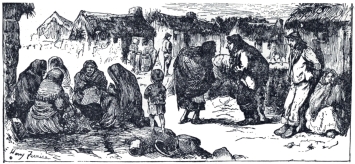
A STREET IN AN IRISH VILLAGE.
BANTRY VILLAGE.
Bantry is a pleasant village; that is, some of its streets are pleasant,
and it has the most beautiful bay on the coast. Sailing across the most
lovely body of water I have ever seen, is the famous watering place,
Glengariff, which is the most delicious spot of land in the world. And
Bantry itself has much in its favor, all marred by the abject poverty of
nine-tenths of its inhabitants.
Leaving the main street, which is, like all the streets of Irish
villages, made up of small stores, or shops, as they are called, you
walk up a rather steep hill, pass through a crooked street, and you find
yourself in the midst of the regulation Irish cabins.
Miserable structures of stones piled one upon the other, not even daubed
with plaster, with no windows, as a rule, though the more pretentious
ones have a single pane of glass in the wall somewhere. However, as that
pane is almost invariably broken, its principal use is the extra
ventilation it affords.
The cabin is the same size as those on farms, say from ten to twelve
feet wide by fifteen or sixteen in length. In the country, however, they
do have the space above, to the thatched roof, but land is more valuable
in the villages, and My Lord Bantry’s expenses in London and Paris are
enormous. He must get more money out of the villagers, and he makes two
stories out of the wretched hovel, and by crowding in two families makes
double rent. The first floor is not above five feet six inches in
height, and the upper is a good foot shorter. In neither floor can an
ordinary man stand upright.
We went up the miserable stairs in one of them, and gained the still
more miserable den above. It was more like a coffin than a room, and the
idea of a coffin was brought forcibly to the mind as you glanced at the
wretched occupants. On a miserable bed of dried leaves, covered with
potato sacks on the one side, was the emaciated form of a man dying of
starvation and consumption. He had about forty-eight hours of life in
him. Upon my word I felt happy to see he was so near death. For having
an excellent reputation, having always been a good man, he is certain to
go, after death, where there would not be the slightest possible chance
of meeting My Lord Bantry or his agent. In the other corner was a flat
stone, upon which a consumptive fire of peat was burning, the smoke
filling the room. Huddled around this fire were five children, under the
watchful eye of a very comely woman. The children were barefooted and
stockingless, and clad in the most deplorable rags, while the mother,
also barefooted, was clothed in the regular cotton slip, without a
particle of underclothing of any kind or description. And into that
garret, poor as it was, came other women, not clothed sufficiently to be
decent, to boil their potatoes at the wretched fire. They have a
practice of exchanging fires in this way, that none shall be wasted.
“What do you pay for this apartment?”
“Ten-pence a week, sor!”
“Are you in arrears for rent?”
“Yis sor. He (pointing to her husband) has been sick, sor, for months,
sor, and cud not worruk.”
“What will you do if he dies?”
“We shall be put out, sor.”
This with no burst of anguish, with no special tone of anger or
manifestation of emotion. To be “put out” is the common lot of the Irish
laborer, and Irish wife, and they expect it.
HOW MY LORD BANTRY LIVES.
And within a mile of that wretched spot, of that dying man and starving
children, My Lord Bantry has a most beautiful castle, luxurious
furniture, filled with pampered flunkies, his stable crowded with the
most wonderful horses, and his table groaning under the weight of the
luxuries of every clime.

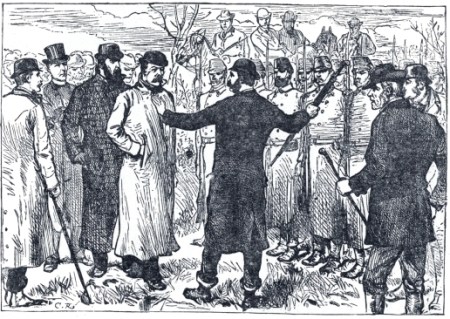
FREE SPEECH IN IRELAND—INTERDICTING A LAND LEAGUE
MEETING.
Surely, not for ten pence a week will he tear this woman from the side
of her dead husband, and throw her, with her helpless children, out into
the cold and wet street?
Yes, but he will, though!
For this family is but one of many thousands on the land which a bad
King stole from the people who owned it. Were this the only case he
might relent; but should he do it in this case he would have to do it
for others, and ten pence a week from thousands aggregates a very large
sum, and My Lord Bantry’s expenses are very high, for it costs money to
run a castle, and there is his house in London, his house in Paris, and
his house in Rome, and his houses the Lord knows where; and then his
yacht is rather expensive, as his officers and men must be paid, to say
nothing of the larder and wines necessary to entertain his friends; and
then there is the terrible expense of entertaining his friends from
London during the shooting season, and occasional losses at play, and
all that.
Clearly, the Widow Flanagan must either pay her rent or be pitched out
into the street to make room for some other widow who can pay, for a
while at least, and when she can’t pay there are others who can.
It is needless to add that there is in Bantry Bay a splendid English
gunboat armed as in time of war, with burnished guns, with bombs of all
sort of explosive power, rifled guns, which would knock poor Bantry into
a cocked hat in ten minutes, with fine looking marines, armed to the
teeth, which, with the military on shore, would make it very warm for
the widow Flanagan and her friends, should they presume to interfere
with My Lord’s land agent, and the bailiffs and the soldiers behind
them. The widow has nothing to do but to bow her head and submit, and
pray that some relief may come to her from somewhere. But where is it to
come from? Not from My Lord, for, as I said, he has his private expenses
to meet; not from his agent, for he was selected for his especial
fondness for pitching women and children into the street; not from
England, for England looks upon every country it has anything to do with
as either to be plundered or traded with; not from the peasantry about
them, for they are in the same boat with the widow.
A LITTLE PATHOS.
What becomes of her finally, I don’t know. I am altogether too
soft-hearted to stay any length of time where such things are to be seen
every hour.

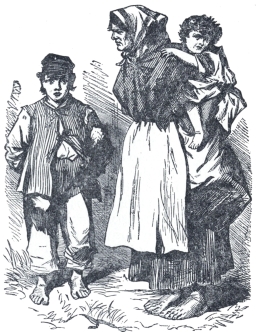
A pathetic little scene took place in the widow’s loft, which
illustrates something of Irish character. As I said the husband and
father was lying upon his wretched pallet, dying of consumption. The
youngest but one of the children was the most beautiful child I have
ever seen, a sweet little fairy, with long curly, blonde hair and black
eyes, built from the ground up, and with a face that a painter would
walk miles to sketch. She was a delicious little dream, a dainty bit of
humanity. True, she had nothing but rags upon her delightful little
figure, and true it was that her sweet little face was smeared with
dirt, and her little hands were as grimy as grimy could be, and her
little shapely bare legs were very red and somewhat pimply. But why not?
Clothes cannot be had for the children when the father works for ten
pence a day and is sick half the time, and nickel-plated bath-tubs and
scented soap are not to be expected in the top of a cabin in which you
cannot stand upright; and how can a child’s face be kept clean where
there is no chimney, and where the room is so thick with peat smoke that
you may almost cut it with a knife, and a child that never had a pair
of shoes and stockings could hardly be expected to have white legs and
feet. The cold prevents that.
In our party was an American gentleman, who was blessed with an
abundance of boys, but no girls, and he and his wife had been
contemplating the adoption of a girl. Here was an opportunity to secure
not only a girl, but just the kind of a girl that he would have given
half his estate to be the father of. And so he opened negotiations.
An Irishman who knew him, explained to the father and mother that the
gentleman was a man of means, that his wife was an excellent, good
woman, and that the child would be adopted regularly under the laws of
the State in which he lived, and would be educated, and would rank
equally with his own children in the matter of inheritance, and all
that. In short, Norah would be reared a lady.
Then the American struck in. She, the mother, might select a girl to
accompany the child across the Atlantic, and the girl selected should go
into his family as the child’s nurse, and the child should be reared in
the religion of its parents.
The father and mother consulted long and anxiously. It was a terrible
struggle. On the one hand was the child’s advantage; on the other,
paternal and maternal love.
Finally a conclusion was arrived at.
“God help me,” said the mother, “you shall have her. I know you will be
good to her.”
Then the arrangements were pushed very briskly, and, with regular
American business-like vehemence. The girl selected to act as nurse was
the mother’s sister, a comely girl of twenty. The American took the
child, and rushed out to the haberdasher’s, and purchased an outfit for
her. He put shoes and stockings on her, which was a novel experience,
and a pretty little dress, and a little hat with a feather in it, and a
little sash, and all that sort of thing; and he procured shoes and
stockings for the elder girl, and a tidy dress, and a hat and shawl, and
so forth. And then he brought them back, instructing the mother that he
should leave with them for Cork the next morning at eleven, and that the
girl and the child should be dressed and ready to depart.
A MOTHER’S LOVE.
The next morning came, and the American went for his child. She was
dressed, though very awkwardly. The mother had never had any experience
in dressing children, and it was a wonder that she did not get the dress
wrong side up. But there she was, and the mother wailed as one who was
parting with everything that was dear to her, and the father lay and
moaned, looking from Norah to the American. Time was up. The mother took
the baby in her arms, and gave it the final embrace, and the long,
loving kiss; the father took her in his arms, and kissed her; the other
children looked on astounded, while the girl stood weeping.
“Good-bye!” said the American; “I will take good care of the baby,” and,
taking her from the mother’s arms, he started for the door. There was a
shriek—the woman darted to him just as he was closing the door, and
snatched the baby from him.
“Drop the child!” said the father. “You can’t have her for all the money
there is in Ameriky.”
“No, sor!” ejaculated the mother, half way between fainting and
hysterics. “I can’t part wid her!”
And she commenced undressing the baby.
“Take back yer beautiful clothes—give me back the rags that was on
her—but ye can’t have the child!”
And the girl—she commenced undressing, too; for she did not want to
obtain clothes under false pretenses. But the American stopped the
disrobing.
“It’s bad for the child,” he said, “but somehow I can’t blame you. You
are welcome to the clothes, though.”
And he left as fast as he could, and I noticed he was busy with his
handkerchief about his eyes for some minutes. And I am sorry to say he
indulged in a very profane soliloquy, ’till he got out of the street,
and his objurgations were not leveled at the father and mother.
What became of the clothes I know not, but I presume that, when the
husband died and went where landlords cease from troubling and the weary
are at rest, the widow pawned them to pay the rent, and save the dead
body of her husband from being pitched into the street with herself and
children; and that when My Lord Bantry saw her name on the list, as
paid, he remarked:
“Ah! the Widow Flanagan has paid her rent. I thought she would! What is
necessary with these Irish, is to be firm with them. By the way, is she
paying enough?”
And after ascertaining that the wine had been properly frappéd, he
went to his dinner, and the gunboat, and the royal constabulary felt
relieved.
It is a pleasant thing for all concerned to have the Widow Flanagan pay
her rent promptly, and make no fuss about it, except, of course, for the
Widow Flanagan. But she, being an Irish widow, is not to be considered.
But if there is a God of justice and mercy, there will come a time when
she will be considered, and then it will be made very warm for My Lord
Bantry, his agent, the captain of the gunboat, the officers of the
soldiery, and the whole brood of oppressors. There is a Court at which
the Widow Flanagan can appear on equal terms with her landlord, but it
is not in Ireland.
A RELIGIOUS OPINION.
If I ever leaned toward the doctrines taught by the Universalists, a
contemplation of the system of Bantryism has entirely and completely
convinced me that they are erroneous. If there is not a lake of fire and
brimstone, a very wide and very deep, and very hot one there ought to
be, and when the British House of Lords meet there, there will always
be a quorum. And My Lord will lift up his eyes to the widow Flanagan and
beg for a drop of water to cool his parched tongue. But he won’t get it.
He don’t deserve it.
It is impossible to make an American comprehend the width, depth and
breadth of Irish misery until he has seen it with his own eyes. No other
man’s eyes are good for anything in this matter, for the reason that
nothing parallel exists this side of the water. And besides this the
writers for the stage and of general literature have most woefully
misrepresented the Irish man and woman, and very much to his and her
disadvantage.
The Irishman of the stage and novel is always a rollicking,
happy-go-lucky sort of a reckless fellow, with a short-tailed coat, red
vest and corduroy trowsers, woolen stockings and stout brogans; with a
bottle of whisky peeping out of his pocket, a blackthorn shillelah in
his fist; always ready for a dance, or a fight, or for love-making, or
any other pleasant employment. There is always on his head a rather bad
hat, worn jauntily, however, and though he may be occasionally rather
short of food, he manages always to get enough to be fat, sleek, and
rosy. And then he always has a laugh on his face, a joke on his lips,
and he goes through life with a perpetual “Hurroo.”

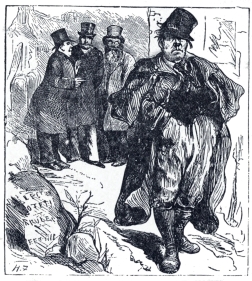
THE IRISHMAN OF THE STAGE AND NOVEL.
THE REAL AND THE IDEAL.
And Katy—she is always presented to us clad in a short woolen gown, her
shapely legs enclosed in warm red stockings; and she had a bright red
handkerchief about her neck, with good, comfortable shoes, and a
coquettish straw hat—a buxom girl, who can dance down any lad within
ten miles, and can “hurroo” as well as Pat, and a little better.
The Irish priest is always represented to us as a fat, sleek, jolly
fellow, who is constantly giving his people good advice but who
nevertheless is always ready to sing “The Cruiskeen Lawn,” in a “rich,
mellow voice,” before a splendid fire in the house of his parishioners,
with a glass of poteen in one hand and a pipe in the other, the company
joining jollily in the chorus. He is supposed to live in luxury from the
superstition of his people, and to have about as rosy a life as any man
on earth.
All these are lies.
The Irishman is the saddest man on the surface of the globe. You may
travel a week and never see a smile or hear a laugh. Utter and abject
misery, starvation and helplessness, are not conducive of merriment.

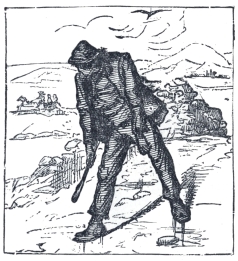
The Irishman has not only no short-tailed coat, but he considers himself
fortunate if he has any coat at all. He has what by courtesy may be
called trowsers, but the vest is a myth. He has no comfortable woolen
stockings, nor is he possessed of the regulation stage shoes. He does
not sing, dance or laugh, for he has no place to sing, laugh and dance
in. He is a moving pyramid of rags. A man who cuts bog all day from
daylight to dark, whose diet consists of a few potatoes twice a day, is
not much in the humor for dancing all night, even were there a place for
him to dance in. And as for jollity, a man with a land agent watching
him like a hawk to see how much he is improving his land, with the
charitable intent of raising the rent, if by any possibility he can
screw more out of him, is not in the mood to laugh, sing, dance or
“hurroo.” One might as well think of laughing at a funeral. Ireland is
one perpetual funeral. The ghastly procession is constantly passing.
There is unquestionably a vast fund of humor in the Irishman, which
would be delightful could it have proper vent. You hear faint tones of
it, as it is; but it is in the minor key, and very sad. It always has a
flavor of rack-rent in it, a taste of starvation, a suggestion of
eviction and death, by cold and hunger, on the road-side. It isn’t
cheerful. I had much rather have the Irishman silent, than to hear this
remnant of jocularity which is always streaked with blood.

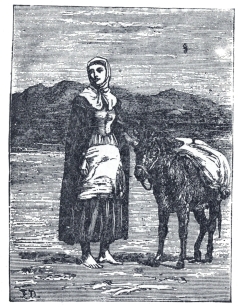
TO MARKET AND BACK FOR SIXPENCE.
SEVERAL DELUSIONS.
The Irish girl is always comely, and, properly clothed and fed, would be
beautiful; still she is comely. Irish landlordism has not been
sufficient to destroy her beauty, although it has done its best. But she
has no gown of woolen stuff—a cotton slip, without underclothing of any
kind, makes up her costume. The comfortable stockings and stout shoes,
and the red kerchief about her neck, are so many libels upon Irish
landlordism. Were My Lord’s agent to see such clothing upon a girl, he
would immediately raise the rent upon her father, and confiscate those
clothes. And he would keep on raising the rent till he was certain that
shoes and stockings would be forever impossible. Neither does she dance
Pat down at rustic balls, for a most excellent reason—there are no
balls; and, besides, when she has cut and dried a donkey load of peat,
and walked beside that donkey, barefooted in the cold mud, twelve miles
and back again, and sold that peat for a sixpence, she is not very much
in the humor for dancing down any one. On the contrary, she is mighty
glad to get into her wretched bed of dried leaves, and pull over her the
potato sack which constitutes her sole covering, and, soothed to sleep
by the gruntings of the pigs in the wretched cabin, forget landlords and
rent, and go off into the land of happiness, which to her is America.
She finds in sleep surcease of sorrow, and, besides, it refreshes her to
the degree of walking barefooted through the mud twenty-four miles on
the morrow, to sell another load of peat for sixpence, that she may pay
more money to My Lord Bantry, whose town-house in London, and whose
mistresses in Paris, require a great deal of money. Champagne and the
delicacies of the season are always expensive; and My Lord’s appetite,
and the appetite of his wife and mistresses, and his children,
legitimate and illegitimate, are delicate. Clearly, Katy is in no humor
for dancing. She has her share to contribute to all these objects. And
so she eats her meal of potato or stirabout—she never has both at
once—and goes into sleep and dreams.

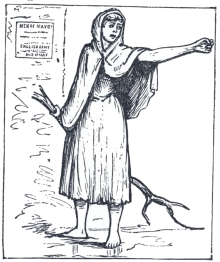
As to the priest, there never was a wilder delusion than exists in the
minds of the American people concerning him. I was at the houses, or
rather lodgings, of a great many of them, but one example will suffice.
Half-way between Kenmare and Killarney, in a wild, desolate country,
lives one of these parish priests who are supposed to inhabit luxurious
houses, and to live gorgeously, and to be perpetually singing the
“Cruiskeen Lawn,” with a pipe in one hand and a glass of poteen in the
other.
He is a magnificent man. In face and figure he is the exact picture of
the lamented Salmon P. Chase, one of the greatest of Americans; and I
venture the assertion that had he chosen any other profession, and come
to America, where genius and intellect mean something, and where great
ability finds great rewards, he would have been one of the most eminent
of men. A man of great learning, of wonderful intuitions, of cool and
clear judgment, of great nerve and unbounded heart, he would, were he to
come to America, and drop his priestly robes be president of a great
railroad corporation, or a senator, or anything else he chose to be.
But what is he in Ireland? His apartments consist of a bed-room, just
large enough to hold a very poor bed, and a study, in a better class
farm-house, and for which he pays rent, the same as everybody else does.
His floor is uncarpeted, and the entire furniture of his rooms, leaving
out his library, would not invoice ten dollars. His Parish is one of the
wildest and bleakest in Ireland, and is twenty-five miles long and
eighteen wide.

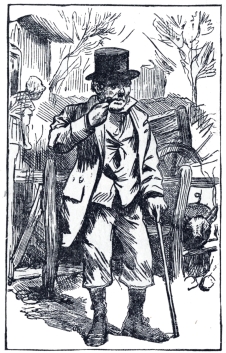
A SMALL, BUT WELL-TO-DO FARMER—COUNTY CORK.
“I WAS CALLED TO IT.”
Now, understand that this man is the lawyer, the friend, the guide and
director in temporal as well as spiritual matters of the entire
population of this district. If a husband and wife quarrel it is his
duty to hear and decide. If a tenant gets into trouble with his
landlord he is the go-between to arrange it. In short every trouble,
great and small, in the Parish is referred to him, and he must act. He
is their lawyer as well as their priest. He is their everything. He
supplies to them the intelligence that the most infernal Government on
earth has denied them.
But this is a small part of his duties. He has to conduct services at
all the chapels in this stretch of country. He has to watch over the
morals of all the people. But this is not all. No matter at what hour of
night, no matter what the condition of the weather, the summons to the
bedside of a dying man to administer the last sacraments of the church
must be obeyed. It may be that to do this requires a ride on horseback
of twenty miles in a blinding storm, but it must be done. Every child
must be christened, every death-bed must be soothed, every sorrow
mitigated by the only comfort this suffering people have—faith in their
church.
What do you suppose this magnificent man gets for all this? The largest
income he ever received in his life was one hundred pounds, which,
reduced to American money, amounts to exactly four hundred and
eighty-one dollars. And out of this he has to pay his rent, his food,
his clothing, the keeping of his horse, and all that remained goes in
charity to the suffering sick—every cent of it.
When the father dies his nephews and nieces will not find good picking
from what is left, I assure you.
“Why do you,” I asked, “a man capable of doing so much in the world,
stay and do this enormous work, for nothing?”
“I was called to it,” was the answer, “what would these poor people do
without me?”
That was all. Here is a man capable of anything, who deliberately
sacrifices a career, sacrifices comfort, sacrifices the life he was
fitted for, sinks his identity, foregoes fame, reputation, everything,
for the sake of a suffering people!
“I was called to it—what would these poor people do without me!”
I am a very vigorous Protestant, and have no especial love for the
Catholic Church, but I shall esteem myself especially fortunate if I can
make a record in this world that will give me a place in the next
within gun shot of where this man will be placed. I am not capable of
making the sacrifices for my fellows that he is doing—I wish to Heaven
I was. I found by actual demonstration why the Irish so love their
priests. They would be in a still worse way, if possible, without them.
Ignorance of the real condition of the farming Irish is almost as common
among the better class of Irishmen, I mean the dwellers in the cities,
as it is among Americans. At one of the fine hotels in Glengariff, a
watering place, I made the acquaintance of an Irish lady, a resident of
Cork. Her husband is a wealthy citizen, a thorough Irishman, a Land
Leaguer and all that, and she is a more ardent Land Leaguer than her
husband. She is a more than usually intelligent lady, with a warm heart,
and she realized, she thought, the wrongs Ireland was suffering, and was
doing, she supposed, all she could to aid the oppressed people.
Now in Glengariff suffering is not permitted to be seen. The hotels are
magnificent, the servants well-clothed and well fed, and it is so
arranged that the people in rags are seldom seen in that vicinity.
But two miles across the bay and you may see all the misery you can
endure. I had been over there and had gone through a dozen or more
cabins, and on my return I expressed myself to the lady in as strong
terms as my command of language permitted.
“Are you not exaggerating?” asked she. “I have never seen such misery as
you describe. It cannot be.”
“Because you have never sought it out. But it is there. Fifteen minutes
in a boat will take you to it. Will you go over now, and see for
yourself if I have exaggerated?”
She went. It was a lovely morning; the waters were smiling, and the
Glengariff shore, with its beautiful buildings, its long hedges of
fuchsias along the winding street, the background a mountain of flowers,
was a fairy scene. From this side the mountains on the opposite in the
delicate brown of Autumn, were beautiful. Distance showed you only the
beauties of Nature; it mercifully hid the squalid poverty the mountains
contained.
THE CONVERSION OF AN IRISH LADY.
We landed and began the ascent. The land was, as everywhere, bog and
rock, with here and there a spot reclaimed, which smiled in green. We
approached one of the regular hovels.
“How far have we to go before we come to one of the houses you spoke
of?”
“We are at one now.”
The woman stood petrified.
“Do people live in such places?”
“Madam, that cabin holds a man, his wife, six children, the wife’s
father and brother, pigs, calves and poultry. But you must see for
yourself that I did not exaggerate. Come in with me.”
The lady entered, wading pluckily through the slush and mud that
surrounded the cabin, and saw all and more than I had told her. There
was the cold earth floor, wet and slippery, the two wretched beds on
which these people slept, the pigs, the calves and the poultry, which
must be sheltered and grown and fattened, not for their eating, but that
My Lord may have his rent. There was the flat stone in one corner, with
the smoky peat fire, no chimney to carry away the smoke; there were the
half-ragged men, the half-naked women and children, shoeless,
stockingless, skirtless, less everything; in short, there were all the
horrors of absolute destitution, without one single redeeming feature.
“Take me out of this place,” she gasped.
It was not a pleasant sight for a lady delicately nurtured and daintily
kept, whose hands had never been in cold water and upon whose face cold
wind had never blown. These people were of her own blood, her own race,
almost her own kin. She said never a word on the way back, but that
afternoon she left Glengariff for Cork. But before she went, a boat went
over the bay, and a dozen families had at least one square meal, and
more money than they had ever seen before.
It is to be hoped that they ate the provisions, but the money—that went
to My Lord’s agent for rent, beyond a doubt. And if My Lord’s agent was
certain that he could depend upon the lady from Cork as a permanent
almoner, he would ascertain to a penny just how much she intended to
give, and raise the rent to that amount.
My Lord’s agent is as ravenous and insatiable as a grave-yard—he takes
all that comes.
The lady from Cork is spending her entire time and a great deal of money
in the interest of her people. It requires actual sight to understand
the condition of the Irish.
CHAPTER XXVII.
AN IRISH MASS MEETING.
MR. CHARLES STEWART PARNELL, lately in Kilmainhaim Jail for the crime of
lifting up his voice in behalf of an oppressed people, represents Cork
in the British Parliament, and his constituents determined to give him a
reception.
In Catholic countries political demonstrations take place on Sunday,
always, the Catholic having attended services in the morning, devoting
the rest of the day to recreation and public business. And besides this
reason for Sunday demonstrations in any country under British rule, the
citizen does not have time enough on any other day to make any
demonstrations, political or otherwise. He has to earn his two meals of
potatoes a day, and his landlord has a mortgage upon the remainder of
his time. Sunday is his only day, and it is a blessed thing for him that
the Church of England stands between him and his landlord. Were not
labor on the Sabbath illegal, My Lord would raise his rent to the point
of making Sunday labor necessary.
I had always supposed that America was the country for demonstrations of
a public nature, and indeed we do get up some monsters in this way, but
the Irish, in 1881, did things, compared with which our largest are but
pigmies.
Early in the morning the city began filling with people. They came
singly and in pairs, and in processions. They came from down the river,
from up the river, from the east, west, north and south; they came in
steamboats, by rail, on horses and donkeys, in wagons and donkey carts,
and on foot. By nine o’clock Cork was swarming with people, literally
swarming.
Then came the most wonderful procession I ever saw or ever expect to
see. The trades and occupations of the city were in bodies with emblems,
flags and banners; the Land Leagues of the entire south of Ireland were
there with appropriate banners, and then came a swarming, seething,
boiling mass of humanity, without order, without form or coherence.
There were men, women and children, on foot, and in all sorts and
descriptions of vehicles, and bestriding every animal that permits its
back to be crossed. There were women with children in their arms, men
carrying their boys to save them from being crushed in the press; there
were old men, young men and boys, maids and matrons of all ages, all
sorts and conditions of people, in all sorts of garments; men and women
shod, men and women barefooted, and all in one inextricable jam.
If there was an idea in the way of a banner that was not in that
procession it escaped my notice; and if there was a form or manner of
decoration that was not in the seemingly endless mass of humanity that I
did not notice, it was because there was so much of it that one pair of
eyes could not take it all in.
The procession was fully ten miles long, and there were in it not less
than one hundred thousand people. I know that mass meetings are always
exaggerated, but there were actually that number in that monster
procession on that Sunday.
A very great deal is said about the intemperance of the Irish people. In
all this vast throng, this hive of human beings, there were but three
drunken men. Also, much is said about their tendency to brawls. There
was not a single fight. The procession was wild in enthusiasm, wild in
cheering and handkerchief-shaking, but there was not a blackened eye nor
a broken head. I never saw one-fourth the number of Americans together
that did not eventuate in a score or two of fights. Ireland certainly
behaved herself remarkably well on that occasion.
“COME DOWN.”
There was one curious scene. A young man in Cork in the early days of
the Land League had been suspected of playing into the hands of the
government, for gain. Since the movement became overwhelmingly popular,
he shifted his course and tried to curry favor with the Leaguers, but
without success. They did not trust him. A carriage was set apart for
the use of the prominent Americans then in the city, and he, by sheer
impudence, forced himself upon them. He managed to get himself seated
upon the box of the carriage, making himself exceedingly conspicuous.
It was a kind of conspicuosity which the young Irishmen did not like.
They remembered his betrayal of the cause a few months before, and they
believed his present zeal was for effect and not honest. They would not
have him foist himself upon their American friends. There was no
violence, no obstreperousness. Ten of them, five upon each side, formed
beside the carriage, and they kept step as soldiers do, only instead of
the regular “Left!” “Left!” the words were “Come down!” “Come down!” He
tried to reason with them; he said all sorts of pretty things to them;
he assured them of his entire and utter devotion to the cause; but to
every word he uttered there came the one response, “Come down!” “Come
down!” He came. He might have resisted force, but the moral suasion in
the simple words “Come down!” was too much for him. He descended from
the carriage and slunk away in the crowd, and we saw no more of him.
Immediately the young men fell into rank, and the procession swept on.
It was their way of punishing one who was seeking for himself instead of
for the mass.
And that enormous mass of people paraded the streets all day, and in the
evening, in the fields outside the city, they waited patiently and
listened to speeches from the leaders of the people, every sentence
bringing a quick response.
As grand as was the demonstration, it was no mere man worship that was
at the bottom of it. It was not so much in honor of their leader; it was
a protest of a great people against a system which has already driven
out from the country two-thirds of the entire population, and which
would drive out the remainder were there means enough left to take them.
It was the wail of a starving people, a naked people, a robbed, outraged
and oppressed people. It was a protest against bayonet rule, a protest
against carbines and ball cartridges, an appeal for the right to live
upon the ground upon which they

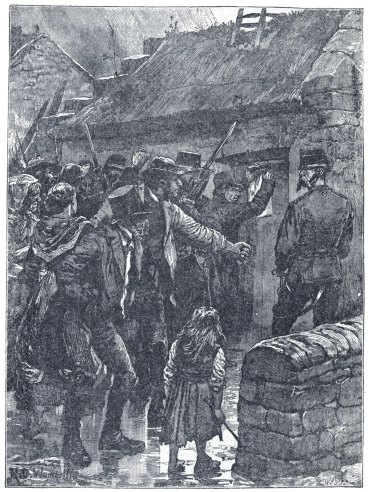
AFFIXING NOTICE OF EVICTION UNDER PROTECTION OF THE
POLICE.
AN EVICTION.
were born. Had they arms probably they would make this protest in
another form, and there never was a cause in which arms could be taken
up so justly, but unfortunately they have not. The British government
allows the Irishman to bear nothing more deadly than the spade, and all
the arms that are in Ireland are used to compel him to use that
implement for British greed.

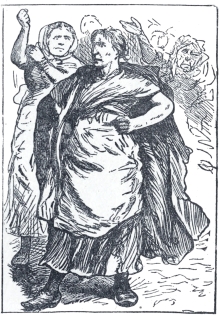
I was present at an eviction near Skibbereen. An eviction is a very
simple thing. The landlord desires to possess himself of the land which
a tenant holds, having been born upon it, his father and his grandfather
for many generations back. When the land passed into the hands of the
present alleged owners it was worthless, but several generations have
toiled upon it, until it has been “reclaimed,” as they term it, and made
into good soil, which will yield crops. The landlord has raised the rent
regularly, keeping the tenant and his family down to the potato and
stirabout point, until it is impossible for him to pay. There is no
question of a desire to pay—paying is a physical impossibility, unless
the tenant has a son in America, and even in that case the rent is
raised to the point of absorbing the boy’s wages. Just as the crop is
ripening the landlord gets out a process of eviction, a bailiff, backed
by thirty constabularly, go to the house, the warrant is served, the
tenant knows exactly what is to happen, and he goes out without a word.
But the mother, not so well versed in English law, does make a protest.
As wretched as the cabin is, as poor as are her surroundings, it is the
only home she has. In this wretched cabin her children were born, this
is her home, and no woman relinquishes that without a protest. But she
might as well whistle against the north wind. There is no pity nor mercy
in these beasts, to say nothing of justice.
First the poor furniture is pitched out into the road, then the children
are thrown out after the furniture, and then the woman is hustled out,
the door is nailed up, and the family are by the roadside in the cold or
rain. Pat or Mick, as the case may be, is offered another farm, farther
up the mountain, a piece of land, bog and rock, which he may go on and
convert into smiling fields only to be evicted from that when his
landlord sees fit, or he may die by the roadside.
In the village of Kenmare, there were thirteen families one cold wet
morning, out on the roadside, men, women and children, some of the
latter being only two months old, their only protection being blankets
made of potato sacks stretched upon four sticks driven into the cold
clay, and their only bed, leaves, which were wet with the rain. The
mothers were boiling their potatoes, contributed by neighbors almost as
poor as themselves, in pots suspended from extemporized tripods, the
fuel being leaves and twigs.
WHAT HAPPENS.
What became of them? I do not know. I presume some of the children died
from exposure, but that was nothing to the landlord or his agent. They
were too young to work, and really stood in the way of the mother and
father paying their rent. Possibly the father working in the mines in
Wales, got money enough before the children were all dead to enable them
to get into some kind of a shelter.
It is only necessary for me to say that they were there, and there
because they could not pay an unmerciful rent unmercifully exacted and
relentlessly pursued.
BOYCOTTING.
An English landlord’s agent would levy upon a child’s coffin for
arrearages of rent, and the British government would give him thirty
soldiers to protect the bailiff in serving the process. They wish it
distinctly understood that rent must be paid though the heavens fall.
Rent is My Lord’s living and the agent’s also. Where mercy is shown to
one tenant others might expect it, and so the rule must be inexorable.
“Boycotting” is a system devised by Mr. James Redpath, of America. It is
this: The landlord, when he has made up his mind that he wants to rob a
tenant of the land he once owned, and which he has, does not evict him
in the Spring. He waits till the tenant has dug up the ground, planted
it and tended it, and it is ready for the harvest. He wants to steal the
crops as well as the land, and so just before harvest he gets out his
process, and accompanied by the everlasting thirty constables, armed
with carbines, he makes his descent. The process is served, the tenant
and his family are pitched out into the street, and the place taken
possession of.
Prior to the Land League, the villain had no difficulty in employing
labor to secure the crop, thus giving the agent his percentage of the
robbery, and enabling My Lord to indulge in fresh extravagances in
London or Paris, or wherever he might be. But the Land League steps in
now, and My Lord’s agent cannot find a man who will put a sickle into
the ground. No matter what price he offers, or how sorely the laborer
needs work, or how cheaply he would be glad to work for any one else, he
will not work for this man at any price. Consequently the crops rot on
the ground, and if the robbed tenant gets no benefit from his labor, My
Lord in Paris, and his agent at home, do not.
I was in one cottage over the bay from Glengariff, in a cabin in which
three men were sitting listlessly, waiting for work. They had nothing to
eat but the everlasting potatoes, and would have given their lives,
almost, for something to do that would keep the pot boiling, even though
there was nothing but potatoes in it.
Enter My Lord’s agent.
“Come, men. I want you for a few days.”
“Yis, sor, what is it?”
“I want you on Captain ——’s place. I will give you two shillings a
day.”
Ten pence a day is good wages.
“Is it on Mickey Doolan’s farrum?”
“Yes.”
“We don’t want wurruk. We’re rich, and are enjoyin’ ourselves.”
Mickey Doolan was the evicted tenant, and had the agent offered them a
thousand pounds an hour he could not have got a stroke from one of them.
This is boycotting. The process was first tried upon a Captain Boycott,
hence the term. It was an invention of Mr. James Redpath, as I said, and
a very clever one it is.
To prevent the evicted tenant from taking another farm, and reclaiming
it for the benefit of My Lord and his agent, the Land League makes him
the princely allowance of three shillings a week, on which he supports
his family, and it finds him some sort of a shelter. My Lord and his
agent have the privilege of getting in the crops themselves, else they
rot in the field.
There is no violence, no shooting or mobbing—only passive resistance.
The British government cannot compel a man to labor, and there is left
the Irish the blessed boon of dying from starvation. Possibly the
government will make labor compulsory—it would not be worse than most
of the laws for the government of the unhappy island now in force. But
so far the Irishman need not labor for an unjust landlord unless he
chooses to, and that means he need not labor for any of them.
There is no such thing as a just landlord in Ireland. Ireland is a cow
to be milked, and just enough potatoes are given her to make the milk.
ONE LANDLORD WHO WAS KILLED.
You hear a great deal in America about shooting landlords. How many
landlords have been shot? It is much to the discredit of the Irish race
that more have not been; but the melancholy fact is, only a very few
have been put out of the way by buck-shot. When I look over the meagre
list I blush for the Irish. It is something in the way of an offset to
know that they are not permitted to have arms, and it may be plead in
extenuation that the police and soldiery are all pervading; but,
nevertheless, it does seem as though a few more might be picked off. If
they cannot have fire-arms, there are at least pitch-forks and stones.
Clearly, the Irish are not so public-spirited as they should be.

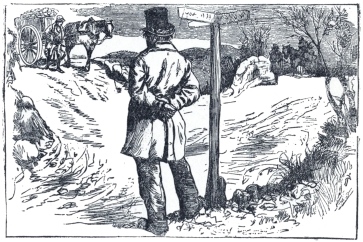
One was shot, some years ago, and a great to-do was made about it. In
this case, as in most of the others, it was not a question of rent. My
Lord had visited his estates to see how much more money could be screwed
out of his tenants, and his lecherous eye happened to rest upon a very
beautiful girl, the eldest daughter of a widow with seven children. Now,
this beautiful girl was betrothed to a nice sort of a boy, who, having
been in America, knew a thing or two. My Lord, through his agent, who is
always a pimp as well as a brigand, ordered Kitty to come to the castle.
Kitty, knowing very well what that meant, refused.
“Very good,” says the agent, “your mother is in arrears for rent, and
you had better see My Lord, or I shall be compelled to evict her.”
Kitty knew what that meant, also. It meant that her gray-haired mother,
her six helpless brothers and sisters, would be pitched out by the
roadside, to die of starvation and exposure; and so Kitty, without
saying a word to her mother or any one else, went to the castle, and
was kept there three days, till My Lord was tired of her, when she was
permitted to go.

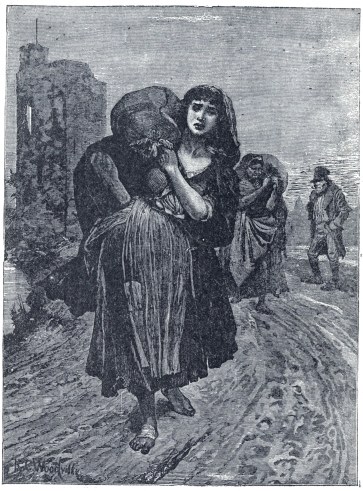
THE KIND OF A GIRL MY LORD WANTS.
She went to her lover, like an honest girl, and told him she would not
marry him, but refused to give any reason.
HOW HE WAS KILLED.
Finally, the truth was wrenched out of her, and Mike went and found a
shot-gun that had escaped the watchful eye of the royal constabulary,
and he got powder, and shot, and old nails, and he lay behind a hedge
under a tree for several days. Finally, one day My Lord came riding by,
all so gay, and that gun went off, and “subsequent events interested him
no more.” There was a hole, a blessed hole, clear through him, and he
never was so good a man before, because there was less of him.
Then Mike went to Kitty and told her to be of good cheer, and not be
cast down; that the little difference between him and My Lord had been
happily settled, and that they would be married as soon as possible. And
they were married, and I had the pleasure of taking in my hand the very
hand that fired the blessed shot, and of seeing the wife to avenge whose
cruel wrongs the shot was fired.
“Vengeance is mine!” is written. In these cases it is well to facilitate
the vengeance a trifle by means of a shot-gun. I object to keeping such
a man as My Lord out of fire and brimstone a minute. Give the devil his
due, and never let the note he holds go to protest.
An immense reward was offered for information leading to the conviction
of the noble man who fired the shot, but, though every man, woman and
child in a radius of twenty miles knew exactly who did it, no one was
found base enough to lodge information against him.
You see the Irish all have daughters and they are all comely, and if
shooting lords for such crimes comes to be a rule, the lords will turn
their lecherous eyes elsewhere. There are worse things in the world than
shot-guns. That particular one should be wreathed with flowers, and hung
up in the church of that Parish. There is much moral suasion in a
shot-gun loaded with rusty nails.
I entered one cabin in the Galtees which rather eclipsed anything in the
way of misery that I had seen. It was the smallest and the most wretched
of any I had investigated, and there was a refinement of wretchedness
about the whole arrangement that to an American would seem impossible.
The children were the thinnest that I had ever seen. It was poverty
condensed—it was wretchedness boiled down. It was the very essence of
misery.
“What rent do you pay for this place?”
“Three pounds a year, sor!”
Then with an inflection in my voice that had something of sarcasm, I
suppose, in it, I asked:—
“Is that all?”
“Oh, no sor, I pay a pound a year, poor rate!”
Think of it! To pay a poor rate implies that somebody is poorer than the
payer. Here was a family living in a pig style, and paying fifteen
dollars a year for the privilege, who, with a starving and almost naked
family, was compelled in addition to this monstrous rental to contribute
an additional five dollars per year for the support of the poor!

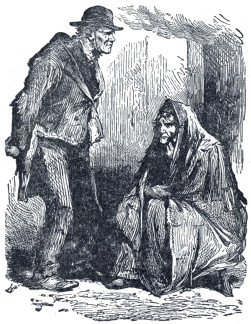
THE WOMAN WHO PAID THE POOR RATE.
This would be humorous were it not ghastly. Had she intended it as a
joke it would have been a good one, but unfortunately it was no joke.
The British government is not jocular. The wretched woman was actually
paying a tax to support the poor! What must be the condition of the poor
if such as she were paying to support them?
I was in the postoffice at Cork, when a middle-aged woman came in and
received a letter. She opened it and read it, or rather read a few
lines. The letter dropped to the floor, and she staggered and would have
fallen but for the friendly wall against which she leaned.
“What is the matter?”
“Oh, sor, Patsey is dead—and who’ll pay the rint!”
PATSEY’S DEAD.
Here it was again! Patsey was her son, a boy of nineteen, who by the aid
of an uncle who had fortunately escaped from the clutches of the British
government, years ago, had been taken to America. He had found
employment and had been regularly sending money to his mother to pay the
rent of the miserable cabin she existed in. She had not heard from him
for six weeks and had been worried about him. This letter was from his
room-mate, and it conveyed the intelligence that he had been sick for
six weeks, and that his sickness had terminated in death. Poor Patsey
was dead and buried.
What kind of an infamy is it that will not permit a mother to mourn the
death of her first born without connecting it with “rint?” This one
could not, for as dearly as she loved Patsey, there were six others just
as dear to her, to whom Patsey was the life. It was Patsey in America
who shielded the others from starvation. What kind of an infernalism is
it that grips the hearts of women, that lays its icy iron finger upon
the tenderest chords in a mother’s heart?
“Patsey’s dead—who’ll pay the rint!”
Death and rent! A most proper combination. Rent is death.
Tibbitts is here, but I am sorry to say that that not altogether
exemplary young man is paying a great deal more attention to Irish
whisky than he is to Irish troubles.
He came in very much intoxicated last night at twelve o’clock, and I
reproved him for the condition he was in.
“It’s my (hic) mother that did it,” he replied. “My mother in Oshkosh.”
“Your mother, you—well, that is too much!”
“True, ’shoor you. She wrote me a long letter, which I got this mornin'.
(Hic.) R’ligious letter, and a mighty (hic) good one. (Hic.) Great
woman, mother. She said man in state of nature (hic) was wicked as
sparks fly upward. Struck me (hic) as true. What was duty? To get out of
state of nature. (Hic.) Man full of Irish whisky is not in state (hic)
nature—entirely unnatural. Ergo—man drunk not bein’ in state of
nature, not sinner. See? Logic. Have too much regard (hic) for mother’s
feelings to be in state of nature. Never will be, so long as the old
(hic) man comes down.”
I don’t think he ever will be. Clearly, it is my duty to have the young
man sent home as soon as possible.
While I am informed that Irish whisky is less destructive of the tissues
than English gin or British brandy, or the vile compound they call ale,
it will intoxicate, and I do not accept Mr. Tibbitt’s logic. His getting
outside of whisky does not enable him to get outside of himself.
CHAPTER XXVIII.
SOME LITTLE HISTORY.
IT is very difficult to make an American understand the Irish question,
for the simple reason we have nothing parallel to it in our own country;
for which every American should thank his Heavenly Father, who cast his
lines in such pleasant places.
Whenever you speak to an American about the woes and wrongs of Ireland
he at once says, “Why does the Irish farmer sign a lease which he knows
he cannot live to?” “If he don’t like the country and the laws, why
don’t he get out of it?” “Why is it, the country being under one
government, that the English farmer and the North of Ireland farmer are
prosperous, while the South of Ireland farmer is in a state of
discontent?”
The trouble with the man who asks these questions is, he doesn’t know
anything about the subject. He measures everybody’s grain in his
half-bushel. He supposes that under English government, as in America,
there is one law which obtains everywhere, and under which all men are
equal.
I shall try to make it plain how a farmer in one part of Ireland may be
prosperous, and in another poorer than the pigs he fattens.
To understand this matter it is necessary to go back some hundreds of
years. All grievances took root a long way back—the world has got too
wise to commence or tolerate any new ones.
Originally Ireland was an independent kingdom; in fact, five independent
kingdoms. Under the kings were the clans. The Clan O’Connor, for
instance, held a certain amount of land—not each man an owner in fee
simple, but in common. That is to say, the ownership of the soil was in
the clan as a community, each family of the clan holding its land
forever, and that land was distributed among them as the best interests
of the clan dictated. The chief of the clan was elected, and he was
their general, their counsellor, their judge, their advisor,
philosopher, guide and friend. He was the father of the clan.

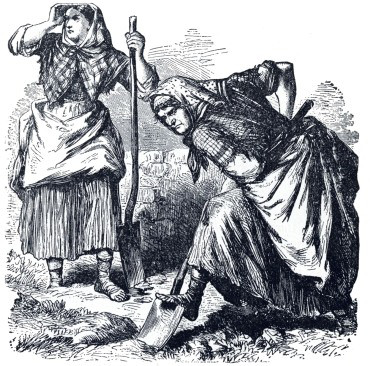
To support the dignity of his position, and to bear the expenses of the
post of honor put upon him, a tribute was paid to him, based upon the
land held—so much per acre. It was very light, for the chief farmed
land, as did the clansmen; and there was, for the time, a fair degree of
prosperity in the island—as much as could be expected for that day and
generation. At least everybody had all they could eat, drink and wear.
CONQUERING AND DISTRIBUTING.
The English wanted Ireland, and England did with Ireland as it has done
with every country it ever desired to possess. She simply measured
bayonets, and, finding her bayonet the strongest, took possession. This
work was begun by Henry II., but received a great impetus from Henry
VIII., the brute who was so handy at decapitating his wives, and it was
followed up vigorously by succeeding kings and queens.
The country was conquered, the chieftains were expelled, the land was
divided up among the favorites of the English kings, and the people
found themselves tenants at will of a foreign proprietary, instead of
being actually owners in fee simple of their own land.
England never does an injustice by halves. She is very moderate in the
matter of mercy and justice, and things of that nature, but when it
comes to robbery and spoliation she knows no middle way. When Elizabeth
determined upon occupying Ireland, the orders were to spare neither man,
woman nor child.
The chiefs were driven out, and the land of the clans was distributed
among the favorites of the English court. Sir Walter Raleigh had
forty-two thousand acres given him from the estate of the Munster
Geraldines, and a proclamation was made through England, inviting
“younger brothers of good families” to undertake the planting of the
land from which the Irish—the owners and occupiers of the soil—had
been killed or driven off, and the repopulation of the country, “none of
the native Irish to be admitted.”
Under this invitation, which the English robbers were not slow to
accept, scores of estates were given to the dissolute nobility of
England, who were willing enough to take possession of land which they
got for nothing, and which would give them means to dodge the primal
curse of labor. What they wanted was to live as they wanted, by the
sweat of other men’s brows, and British bayonets gave the means.
It is not possible to detail the outrages perpetrated upon this
unfortunate people by the kings and queens of England, but let it
suffice to say that a wholesale system of spoliation, robbery, and even
extirpation, was inaugurated and most relentlessly and rigorously
pursued. Man, woman and child, and even the animals that could not be
driven off and sold, were destroyed.
There never was, in the history of the world, a record so black with
infamy, so red with blood, or so scarlet with injustice.

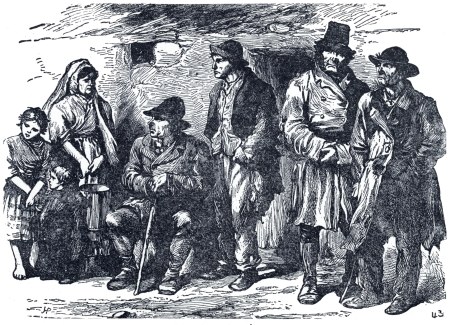
SOME OF THE DUKE OF LEINSTER’S KILDARE TENANTS.
THE QUESTION OF LEASE.
This is the way England obtained possession of Ireland. This is the
title by which My Lord This, and My Lord That, holds the lands he
exacts rent for to-day. This is his deed to the property upon which five
millions of people are eating two meals of potatoes a day, that he may
gamble and keep mistresses in London and Paris.
“Why does he sign a lease, the conditions of which he cannot fulfil?”
There are no leases. It is not as it is in America, where the tenant and
the landlord come together, and bargain and wrangle over the terms, and
when an agreement is arrived at both are bound by the terms thereof.
There is no lease, no writing, no courts, except for the landlord. The
tenant is born upon the ground which British brute force, the only
principle there is in British government, robbed him of. The new
landlord enforced upon him by the pikes of Elizabeth’s banditti, said to
him, “The rent of this land will be one shilling an acre.” He could go
nowhere else. He knew no other country, and so he bowed his head and
built with his own hands a cabin—in the subjugation the old homes were
entirely destroyed—and went to work upon land, forty acres of which, in
its natural state, would not pasture a goat.
Before it had any value whatever the bog had to be cut off, the stones
dug out—in short, the land had to be made. They call it “reclaiming.”
The tenant has no lease. He is purely and simply in the power of the
landlord. Whatever rent the landlord chooses to exact, that is the rent
he must pay. He is a tenant at will—and the will is the will of his
landlord, the English robber who lives in luxury in London and Paris,
and permits himself to be fleeced by sharpers, who, differing from the
English, use finesse instead of force. In brute force the English cannot
be excelled; when it comes to decent robbery, the kind of robbery where
the victim has some sort of compensation in the knowing that it was
accomplished by superior acumen, the English are babies.
The tenant—the robbed farmer—for his own sake is compelled to go on
and reclaim the land; he must raise something, for he has children who
must be fed; and so he digs out the rocks, and cuts the bog, and makes
good, arable land out of what was a barren and dreary waste.
What happens to him then? Why, My Lord in Paris has a subordinate
watching his tenant. There is nothing so mean that there is not
something meaner. Cruel as My Lord is, he has a crueller man under him.
And that is My Lord’s agent. He comes to the miserable holding, and he
notices that Pat has reclaimed an acre more this year. Immediately he
says to Pat, “Your rent next year, my fine fellow, will be advanced.”

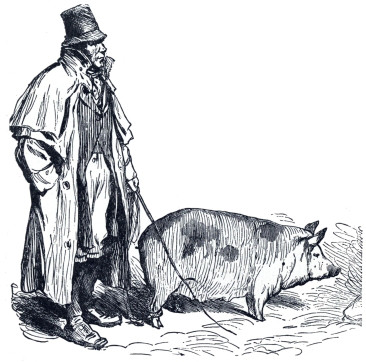
TENANT FARMER, COUNTY MEATH.
SOMETHING TO BE CONSIDERED.
What can Pat do? Nothing. He can’t get off the land, for the merciless
exactions of My Lord, who is living in Paris and London, have left him
nothing; he cannot get away; he has no title to possession a minute; he
can be evicted from his holding at any time, for any one of a thousand
causes; there are no courts he can appeal to, as in America, for the
magistrates are all landlords. And so he bows his head, and meekly goes
on and reclaims more land, only to have the rent raised for every acre
made valuable by the labor of his own hands; until, finally, it comes to
a point where he has reclaimed the entire holding, and My Lord’s agent
comes to the conclusion that it is better for him and My Lord—their
interests are identical—to convert the farm into a sheep-walk, and Pat
is evicted—which is to say, he is thrown out upon the roadside to
starve, with his wife and children; and the cabin he has built is torn
down.
Does he get anything for the making of the land? Not a halfpenny. All
the labor bestowed upon that land, originally his, goes to My Lord,
whose mistresses in London and Paris need it. They must have their silks
and velvets, they must have their wines and carriages, and horses and
servants—and Pat must pay for it.
It must be understood that there is no such thing as leases in the South
and West of Ireland—the landlord dictates the terms, and the tenant
must accept them. He has no alternative. He cannot get away; he has
nothing to get away with. As to the difference between the farmer of the
North and South of Ireland, it is not true that the farmer of the North
is a wonderfully prosperous man, but it is true that he is better off
than the farmer of the South. Why? Because there is not one law
governing the whole country. The “custom” that governs one section does
not govern the other.
Now, please, get this infamy in your mind, and try to comprehend it. The
British government actually drove the Irish, which is to say the native
owners of the soil, out of the North of Ireland into the South. The
phrase “To hell or Connaught” had its origin in this. It was to
Connaught that these people were condemned to go, the alternative being
death.
Of course no American can understand why anybody should go to any place
that he does not want to go, America being a free country. But the
American must understand that England is not a free country; that the
corrupt and vicious nobility of England wanted ground upon which they
could commit piracy, and that they had the entire power of the British
government behind it. The English bayonet is a rare persuader,
especially when it has the stolid cruelty and the iron will of a
Cromwell behind it. Let a man like Oliver Cromwell breathe upon a
bayonet, and you may reasonably expect to see a baby impaled upon it in
a minute. To have satisfied his ambition, and what he, in a mistaken
way, considered his duty, he would have burned his mother.
It was considered necessary to have an English garrison in the land. To
accomplish this the Irish were driven out of the North of Ireland, and
when I say driven out, I mean driven out. They were forced to go, man,
woman and child, into the wilds of Connaught.
Then the land vacated by this exodus, at the end of a bayonet—British
rule always means bayonet, British statesmanship begins and ends with a
bayonet, that being the only thing in the world that does not
think—this land was divided up among the dissolute villains who
infested the British Court, and for whom, they being the alleged sons of
nobles, something must be done.
But a condition was attached to these grants of stolen lands. No native
Irishman was to have a holding there. It was considered necessary that
there should be in Ireland a garrison of what they chose to call “loyal”
citizens, to hold the robbed and outraged Irish who had been driven into
the South in check. Therefore the North of Ireland was given to the
dissolute younger sons of dissolute English Lords, upon condition that
their tenants should be English or Scotch, and in all cases Protestants.

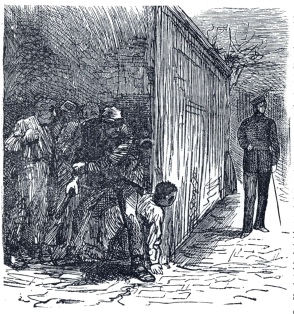
IN A DISCONTENTED DISTRICT.
“CUSTOM.”
To get English or Scotch farmers to join in this wholesale brigandage,
there had to be some inducement held out. They were not compelled to
come upon the ground, and they made their bargain with the Lords. They
insisted upon fixity of tenure, a low rent and free sale, which is to
say they would not enter upon these stolen lands except upon a low rent,
and if they made improvements they should have the benefit thereof, and
if they chose to quit the lands they should have the right to sell the
improvements they had made, and that the improvements should be a part
of the value of the lands, and their interest therein should be an
interest in law and equity.
This was agreed to, and on these conditions the North of Ireland was
settled by English and Scotch Protestants; the “custom” known as “Ulster
custom” was established, and is law to-day.

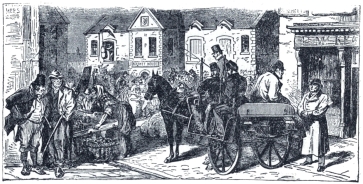
PROTECTING A GENTLEMAN FARMER.
But “Ulster custom” does not extend over the entire island. While the
farmer in Ulster has fair rent, fixity of tenure and free sale, the
farmer of Cork and Tipperary has nothing of the kind. He is a simple
tenant at will. He holds a farm at the will of his landlord; his life is
in the hands of a dissolute scoundrel who has no brains, backed by a
dissolute scoundrel in the form of an agent who has brains, and both of
these scoundrels are backed by the bayonets of the most infamous
government on the face of the earth.
“Ulster custom” gives the tenant some rights. “Cork custom” is quite
another thing. “Ulster custom” was a bribe. “Cork custom” is robbery. It
is a system of wholesale confiscation of labor, of body and soul.
The farmer of Cork and Tipperary has nothing to say about himself, his
wife or his children. If the son of the thief who stole his land loses
money at bacaret in Paris, he telegraphs the other thief, his agent,
that he wants money, and the secondary thief, who has a percentage in
the robbery, goes about among the tenants, and raises the rent. And that
is all there is about it. The tenant farmer has no lease. He lives upon
the land at the pleasure of his landlord, and the measure of the rent he
pays is the measure of the landlord’s vices and the agent’s
expectations.
Each county has its own “custom,” and the poor, robbed slave lives under
that custom. The North of Ireland farmer comes nearer to keeping body
and soul together than the South of Ireland farmer, because the villain
robbers who expelled the Irish from the North of Ireland had to make a
custom more favorable to get the Scotch and English to go there to keep
the Catholic Irish in check, and they would not have gone to the country
except for some advantage. An English lord will do anything mean for the
love of it—the Scotch are altogether too acute to do a mean thing
without being paid for it.
An instance, not a very large one, but enough to illustrate the power of
the landlord over his victim, the tenant, occurred upon the estate of My
Lord Leitrim, who is this minute where I hope never to go if there is a
hereafter.
This worthy descendant of a very unworthy race had an industrious
tenant, whose farm he had been long coveting. But somehow he did not
dare to take it by force, with the feeling there was in the country at
the time, and so he sought a legal pretext. An Irish tenant is not
permitted by the paternal government, under which he starves and goes
naked, to make any improvements without the consent of the landlord. He
cannot build an addition to his cabin (this condition is unnecessary,
for he couldn’t if he would), he cannot dig a ditch or do anything. This
is the law, but it has never been enforced, for in the very nature of
things the tenant would not do more than was profitable to himself for
the improvement of the land is the enrichment of the landlord, who
religiously raises the rent with every improvement made.
A FOILED LANDLORD.
This tenant needed a ditch preparatory to the reclamation of a bog
farther back, and he had been putting in all his spare time for two
years digging it. He did not suppose that My Lord would object to his
reclaiming the bog.


THE FILLING OF THE DITCH.
One Saturday Mike was working in the ditch up to his knees in water when
My Lord came riding by. He saw his opportunity. He knew the law.
“What are you doing?” he asked.
“Making the drain, sor,” replied Pat, proudly, for it was a big thing he
had undertaken.
“Who gave you permission to make a ditch on my land?” demanded My Lord.
“My fine fellow, you have that dirt all back by Monday morning, or out
you go.”
Mike saw the trap he had fallen into. Before striking a spade he should
have gone to My Lord’s agent, and got permission. But he was in for it,
for he knew that My Lord had a legal excuse to rob him of his years of
labor.
But the next morning he went to the chapel, and interviewed the priest.
The priest asked:—
“If you get that earth back by Monday morning, will you hold the land?”
“Unless the ould—that is—My Lord doesn’t kape his worrud.”
“We’ll try whether he does!” said the father.
And so the sermon that morning was a very short one, and mostly devoted
to Mike’s case. At its conclusion the father asked every man in the
parish to come at once with his spade and put that earth back. They
came—thousands of them—and they wrought with a will, and long before
Monday morning the drain was filled up as nicely as possible; and when
My Lord came riding by again to see the drain, and give orders for the
eviction of Mike, he found that his cruel alternative had been
fulfilled, as if by fairies.
An Irishman in Corduroy knee-breeches, with a spade in his hand and a
short clay pipe in his mouth, would not make a very happy stage fairy,
but he was a very serviceable fairy to Mike.
Had Mike not been so assisted he would have been evicted, and there
would have been no appeal from it. He couldn’t employ counsel to fight
his battle, for he had nothing with which to pay counsel, and the
Justice would be a landlord anyhow, who had other Mikes to evict, and so
Mike would have never gone into court at all, but would have accepted
his fate in silence.
A cheerful state of affairs, surely.
And speaking of the possibility of paying rent, I remember a young man
on the Galtees, insufficiently clad (that was nothing new), working for
dear life in a soaking rain.
“How many hours do you work?” I asked.
“From daylight to dark, sor,” was his answer, first peering around
before speaking, to be sure that no one heard him. In free Britain it is
dangerous for him to talk even of so small a matter as wages.
“And what are your wages?”
“Ten pence a day, sor.”
“Are you satisfied to work for so many hours for so little money?”
“Troth, sor, it wuld be betther for my ould mother if I cud get that the
year around.”
A BIT OF HISTORY.
Ten pence is about nineteen cents; and understand he was not boarded.
Out of that pittance he had to furnish his own food and his own bed. And
yet he would have been thankful to the man who would have given him
steady work at that price.
To know something of what landlordism really is, and how it all came
about, read the following little history of the Barony of Farney:
In 1606 Lord Essex, who had “obtained” a grant of the Barony of Farney,
leased it to Evar McMahon, at a yearly rent of two hundred and fifty
pounds. And this was a mighty comfortable rent, for, understand, under
the Crown grants the one receiving it was only charged for arable
land, the bog and mountain land adjacent, then esteemed worthless, being
thrown in.
McMahon sub-let it to poorer men, and they so improved it that, fourteen
years later, the same land was let for one thousand five hundred pounds,
and in 1636 thirty-eight tenants were compelled to pay a rental of two
thousand and twenty-three pounds.
Under the strong hands of the original owners, the robbed peasantry, who
found themselves tenants on their own lands, this piece of property was
mounting up in value very rapidly.
The Earl of Essex died in 1636 A.D. “His” estate went to his sisters.
There is in English families always somebody to inherit, and in case
there should not be, the Crown steps in and takes it, that the proceeds
of the robbery may not go out of the race. The two sisters married and
had children, of course, and in 1690, when the two came together to
divide their plunder, it was found that the rentals had risen to
twenty-six hundred and twenty-six pounds. Then the rents began to be put
up so as to produce something like.
The two daughters had children to be educated and provided for,
marriages were getting to be common in the family, and the debts of the
youngsters had to be paid. And so in 1769 this estate, which started so
modestly at two hundred and fifty pounds, yielded eight thousand pounds.
How? Easily enough. The land in this stolen estate, as I said, was
nine-tenths of it bog and stone, and only the arable land, some
twenty-five hundred acres, was set down in the lease, all the bog and
mountain adjacent for miles around being thrown in. By judiciously
evicting the tenants from the arable land and converting it into cattle
and sheep walks, and compelling the tenants to go upon the bog and stone
land, which they were compelled to reclaim and drain, the original
twenty-five hundred acres of arable land silently grew into twenty-four
thousand six hundred acres, and fifty-seven families had multiplied to a
population of twenty-three thousand eight hundred!
Can there be any way of making a great estate so delightful as this? It
is a pleasant thing to have a government steal land and give it to you,
and then protect you with bayonets while you are compelling the original
owners to improve it for you.
Bear in mind this fact. The plunderers never put a penny upon this land.
They never dug a ditch, dug out a stone, or cut a square foot of bog.
The cabins the tenantry lived in they built themselves, and every
improvement, great and small, they made themselves.
And this process of swindling, robbing, confiscation, spoliation and
plunder went on until this estate, which commenced at two hundred and
fifty-nine pounds in 1606, now yields the enormous revenue of sixty
thousand pounds, or three hundred thousand dollars per annum!
THE YOUNG MAN BOYLE.
Which is to say, the laborers on this estate have been yearly robbed of
their labor, and starved and frozen, that one family in England may live
in wasteful luxury. This is all there is of it.
About the same time that Essex got his grant, Sir Walter Raleigh got a
grant of forty-two thousand acres (exclusive of bog and waste) from the
plunder of the Earl of Desmond’s estates. There lived in London at the
time a young lawyer named Boyle, who was probably the worst man then
living. He had been a horse thief, a forger, and murder had been charged
to him. Raleigh was in prison and wanted money, and Boyle offered him
one thousand five hundred pounds for his grant, which Raleigh accepted.
Boyle paid him five hundred pounds on account, and promptly swindled him
out of the balance.

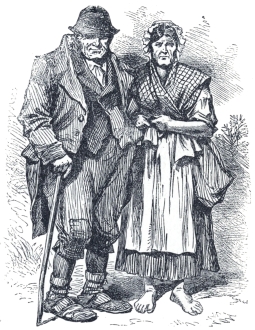
OLD BUT TOLERABLY CHEERFUL.
Boyle being serviceable to the court (such men always are), was created
Earl of Cork, and got from James I. patents for his plunder. Then he
proceeded to marry his children into noble English families, the Duke of
Devonshire being one of the descendants. One small portion of the estate
now yields His Grace an annual income of thirty thousand pounds, being
only a part of the land for which his ancestor, the horse-thief, forger
and murderer, paid five hundred pounds.
His Grace, the Duke, is not content with the land. Under some clause in
the patent given by the pedantic James to the criminal Boyle, he claims
the right to the fisheries in the Blackwater, and the Irish Appellate
Court, an English landlord’s institution, as are all the courts, sustain
the claim, and he levies tribute upon every fish drawn from the waters.
If it were very certain that there is no hereafter, and if a man had no
more heart than an exploded bomb shell, it would be a very good thing to
be a duke, with a forger and horse-thief for an ancestor. The duke was
very judicious in the selection of a father.
The English landlord found after a while that sheep and cattle raising
was more profitable than diversified farming, and with that calm,
sublime disregard of the rights of the people which is characteristic of
the ruling classes in England, eviction became fashionable. The policy
pretty much all over Ireland was to clean out the population and
consolidate a thousand small farms into one large one.
Between the years 1841 and 1861, twenty years, there were destroyed in
Ireland two hundred and seventy thousand cabins, representing a
population of one million three hundred thousand, all driven to the
workhouse, to exile or death.
The process was a very simple one. A process of eviction was served, the
tenant and his family would be pitched out into the road, and the
cottage be leveled to the ground. This was originally done with
crowbars, but crowbars were too slow. A mechanical genius, who was a
landlord and had a great deal of eviction to do, invented a machine to
facilitate the process. It was an elaborate arrangement of ropes, and
pulleys, and iron dogs, and all that sort of thing, which could be run
up beside a cabin and tear the miserable structure down in a few minutes
and save a great deal in the way of labor.
This is the only labor-saving machine Irish landlordism has ever
produced.
Any system that does not permit the marriage of two persons of sound
bodies and minds and of the proper age, is an infamy that should be
wiped out at no matter what cost, and no matter what means.
BANTRY VILLAGE.
I was walking down a street in Bantry, when I came to a little grocery
store, with a ladder projecting over the wretched

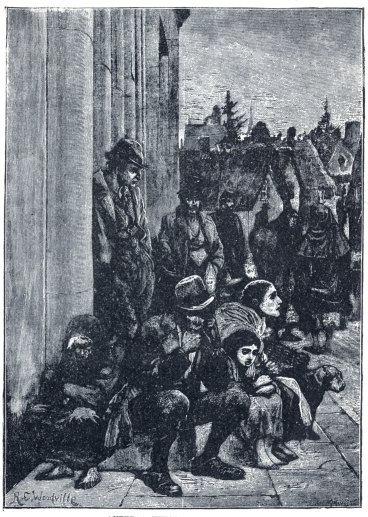
AFTER A WHOLESALE EVICTION.
sidewalk. My Lord Bantry, who owns, or professes to, every foot of the
ground in the village, is not willing to put the sidewalks in good
order. His tenants, who pay him ground rent, built their own homes and
are expected to build the sidewalks and keep them in order if they want
them. Otherwise they may walk in the mud. My Lord Bantry has his
carriage, but he never drives through the village. He does not like to
see distress.
This grocery was the property of an old lady of seventy, and perched on
the ladder was a girl of about seven teen—her grandchild. She was using
a paint brush as vigorously, if not as skillfully, as any male painter
that ever lived.
We halted a minute and greeted her. Unclosing a pair of very rosy lips
and showing a magnificent row of teeth (it might have been a pride in
the teeth that made her open her mouth so wide, but, if so, it was
pardonable!), she exclaimed:

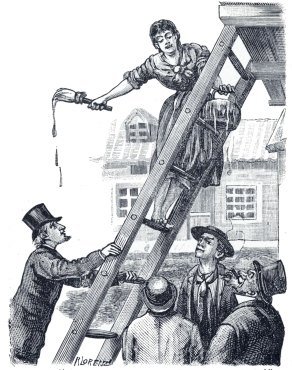
THE “FIRSHT FAYMALE PAINTHER IN OIRLAND!”
“I am the firsht faymale painther in Oirland! Have ye a job ye can give
me?”
And she laughed a very cheery laugh at the little pleasantry.
There was with us a boatman whom we had employed for a sail on the bay.
As we passed, he looked back with a pleased expression.
“Nancy, there, on the ladther, is my gurl.”
THE BOATMAN AND NANCY.
We congratulated him on his good fortune, for Nancy was a bright,
handsome, buxom, cheery girl, who was just the kind that such a man
should marry.
“You are to marry her?”
“Yes, some time.”
“Why not now?”
“Marry her now! What on? She has her grandmudther to care for, I have my
fadther and mudther, and there is but little boating to do, and the rint
is to pay jist the same. I have lived in Ameriky, and want to get back,
but I won’t go widout Nancy, and God knows whin I shall git enough to go
wid her.”
“Why don’t you marry her and take the chances.”
“Niver! I’ll niver marry a gurl and bring childher into the world to go
through what we have had to. I’ve seen enough of it. My fadther has been
upon the place all his life and his fadther afore him. They made the
land they wuz born upon, and the rint has bin raised rigularly, lavin us
jist what we could git to eat, and now at sixty-five and bad wid the
rheumatiz, so that he can’t work half the time, he has nothing. I went
away to sea, and got to Ameriky, but I had to kim back to take care of
him and my mudther, and it’s all I kin do to keep ’em from bein’
evicted. An Amerikin gev me the boat, which he had built for the season,
and if it wuzn’t for wat I make out of it we would all be in the
workhouse. I’ll never marry Nancy till I kin find some way to git to
Ameriky, and some way there to make a dacint livin'. I will niver marry
and settle here, to see Nancy and her childher kim up as I kim up, and
me livin’ as my fadther and mudther is livin'.”
“And Nancy?”
“It’s hard on the poor gurl, for there are any quantity uv the byes who
wants to marry her, but she, with her grandmudther on her hands, knows
all about it, and she has sense enough to wait for something to toorn
up. It will come, we hope, some day; but it’s weary waitin'.”
And so the two, who in any other country would be wedded and have a
cottage of their own, with plenty to eat, and drink, and wear, two who
owe the world by this time at least three chubby urchins, the girls like
their mother and the boys like their father, are kept apart by this more
than inhuman system of landlordism, which is the bottom, top and sides
of Irish misery. Others who never knew what it was to live better, would
marry and would add to the eternal roll of paupers that make up the
population of Ireland; but a residence in God’s country unfitted this
man for that. He discovered that man’s natural inheritance was not rags,
and filth and starvation, and he determined not to marry till he could
get, somehow, to the country where that crowning achievement of the
devil’s most astute prime minister, a landlord, is unknown.

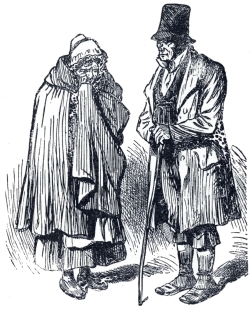
But the poor fellow will have to wait a long time. He is like a bear
chained to a post—he can neither fight nor run. My Lord has a mortgage
on him, and My Lord’s agent will never let up on him so long as there is
a penny to be squeezed out of him. What to My Lord is Nancy and her woes
or her hopes? He would be willing she should marry and multiply and
replenish the earth, for it would give him more muscle to enslave in
time, or rather, the young lord who is riding by on his gaily
caparisoned pony, with two flunkies after him, would, when he came into
the estate, have the children of the boatman and Nancy to fleece, as the
present lord fleeces Nancy and the boatman. But as for his having any
care for the welfare of Nancy and the boatman, that is preposterous. The
cost of the trappings of the young lord’s pony would make them
comfortable, but he would be a bold man who would suggest such a thing
to him.
CHAPTER XXIX.
ENGLAND, IRELAND, SCOTLAND—ROYALTY AND NOBILITY.
THIS will be found to be a mixed chapter, but I respectfully desire
every American to read it very carefully, and to give it some thought
after reading it. In America, where one man is as good as another, we
have so much that is good that we do not appreciate the blessings we
enjoy; we do not realize how much a free government is worth. I am going
to put upon paper some few governmental facts, to the end of showing my
countrymen what a good government is worth to them, and what a bad
government costs the people who groan under it.
In a late number of that especial organ of king-worshipers, the London
Illustrated News, there is a beautiful engraving, entitled “The
Princess of Wales and Her Daughter, in the Garden of Sandringham.” It is
a lovely picture. The garden itself is a study, with its wonderful
shrubbery, and flowers, and statuary; a garden that falls but little
short of being a Paradise. And the Princess of Wales and her six or
eight daughters are just as lovely—by the way, as the British
Parliament gives every child born in the royal family a princely estate
and an enormous allowance to start with, the royal family all have large
families—the Princess herself is arrayed in gorgeous morning costume,
with a hat trimmed with ostrich feathers, with a parasol with silken
fringe upon it a foot deep, and everything comporting. The children are
likewise gorgeously arrayed, and one of them is teaching a pug dog how
to sit up, the said pug costing the British people at least an hundred
guineas. The entire party are in as jolly a state as can be imagined.
Now I like such scenes as this immensely. I like to see comfort and even
luxury. Had the husband of this fortunate woman and the father of these
happy children been, early in life, a shoemaker, a tailor, a lawyer, a
merchant, or anything under heaven, and had by his own labor and his own
skill accumulated the means for all this luxury, I should insist upon
his right to enjoy it because he had earned it, and had given the world
something for it. But how did this woman get it? Why is she with a
parasol with silken fringe a foot deep, her children in silks and
satins, while just as good children, and just as good women, in Ireland,
are shoeless, stockingless and almost naked! What title has she to the
gardens at Sandringham, and by what right does she starve the peasantry
of Ireland that she may thus disport herself and her children?
Simply this: She is the wife a dissolute middle-aged man, whose stupid
mother was the niece of a stupid uncle, who was the son or brother or
something or other of the worst kind of a man in the world, who happened
to be the son of a king who was half a lunatic and half an idiot—the
same who attempted by hireling soldiery to subjugate America—who became
a king because he was the descendant of a race of pirates, who by arms
wrested from the people of the countries they invaded, all their rights,
and assumed to own the land.
Have these people from first to last ever added one penny to the wealth
of the world? Is there any one thing they have ever done to push forward
the progress of the nations? Not a thing. On the contrary, they have
been the dead weights; they have been the blocks in the way. They simply
live, and eat, and drink, and wear and disport themselves in the gardens
at Sandringham and an hundred other gardens; they have castles, and
servants, and special trains, and all that sort of thing, and hundreds
of Guinea pug dogs; and to support all this, with the horde of nobility
hanging upon them, and their retainers, the men of Ireland are starving,
and the women of Ireland are going shoeless, stockingless, and well nigh
naked.
A DIRE WISH.
I am not especially cruel in my nature, but were the royal family of
England to invite the royal family of Prussia, and the Czar of Russia,
and the King of Italy, and the Sultan of Turkey, and all the kings of
the world, with all their nobles, to an excursion on the German ocean,
and were the ships all to go down to the bottom of the sea, and make an
end of the whole business at once, I should thank Heaven more fervently
than I ever did before in my life. Royalty is larceny in the first
degree. It is larceny all the way down, according to the amount of the
spoil.

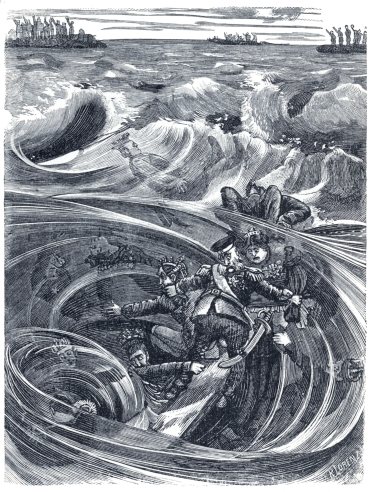
THE PROPER END OF ROYALTY.
I did not confine my observations of land troubles to Ireland alone,
though it is in Ireland that there is the worst condition of affairs,
for the reason that there is a vital difference between the ruling
classes of England and the entire Irish people, in race and religion,
and that makes a great deal more difference in the British Empire than
anywhere else on the footstool.
But the English or Scotch farmer has not so happy a time of it as he
might have, and England will have just as violent a land agitation as
Ireland within a very few years. The average Englishman has a vast
veneration for royalty and nobility, and all that sort of thing, for he
ascribes to the “system” what he himself has done to make Britain great,
but his wife and children are nearer to him than Her Majesty or My Lord,
and he is beginning to ask why he is yearly getting worse off, while Her
Majesty and My Lord are living even more luxuriously and expensively
than ever?
When a strong, vigorous race of men get to asking themselves this
question, it is high time that Her Majesty and My Lord begin to look out
for themselves. The French peasantry and the French artisans made it
very warm for the “Divine Righters” several times, and finally they have
a republic that will endure; not the best republic in the world, but a
very good attempt at one; as good as we could expect from Frenchmen.
Farming in England doesn’t pay much better than in Ireland, and the
reason for it, as in Ireland, is summed up in the one word, rent. In
Bedfordshire, Lincolnshire, Nottinghamshire, and Cambridgeshire, there
are hundreds upon hundreds of farms vacant, and doing nothing, the
reason being the insecurity of tenant farmers and the rottenness of land
ownership. It all comes from the fact that in England as in Ireland, the
fee simple of the land is in the hands of the few, and that the few
owners regard the tenants as so many cows to be milked for their
infernal extravagancies, and that they are so stupid that they cannot be
made to understand that there is a point beyond which the tenant cannot
go, and that when that point is reached something must break.
LAND TROUBLES IN ENGLAND.
One farm I saw was a good piece of land of two hundred and eighty acres.
It lies as dead as Julius Cæsar, and is growing up to thistles. Why?
Because the rent is four hundred pounds a year, or two thousand dollars.
It has been screwed up to that point by successive owners, till the
closest labor and the most starving economy will not pay the rent. It
would not pay it anywhere on the globe.
In Nottinghamshire the “Noble” proprietors are having their farms left
upon their hands for the same reasons, and they are attempting to farm
them by their agents, practically evicting the skilled labor which was
born upon the soil and is best fitted to cultivate it.
These owners are those whose debts compel them to get something out of
their land. They either attempt to farm them themselves, or they make
leases at a rent just low enough to induce their tenants to continue.

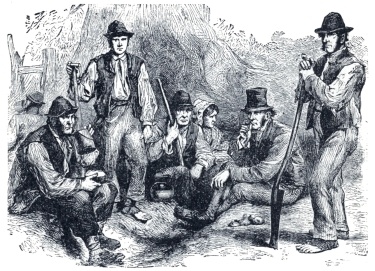
MEATH LADS AT CROSSAKEEL.
But there is another class that is not so merciful—or rather who are
not compelled to be just, and the English nobleman is never just except
upon compulsion. These are the drones who are actually rich, and have an
income from some plunder outside of their lands. They will not make
leases at all, for fear of losing the game! They want this beautiful
land to grow up into shelter for hares and birds and all that sort of
thing, for the sake of the pleasure of shooting in the season. The
distress of the evicted tenant—eviction by reason of exorbitant rent
is as certain as eviction for non-payment—is nothing to them. They must
have their preserves of game; they must have their sport.
The process is the same in England as it is in Ireland. The landlord
puts his estates in the hands of an agent, selecting for the purpose a
man with a heart of flint and a face of brass, one who knows no mercy,
and who would not do a kind act were he paid for it.
The tenant appeals to him for a reduction, but he might as well ask
mercy of a tiger. Then in his despair goes to the landlord.
“My good sir,” says the landlord, beaming upon him benevolently, “I know
nothing about these things. The matter is entirely in the hands of Mr.
Smithson, my agent. Go to him.”
“But I have been to him and he will do nothing.”
“Really I regret it. But Mr. Smithson knows all about it—I don’t. If
he, with a knowledge of the situation—that is what he is there for—can
do nothing, I cannot. I am not to be expected to know anything about it,
nor can I meddle with business that is his.”
And the poor devil of a tenant, with the prospect of starving on the
land or emigrating from the only place on earth which to him is a home,
goes away sadly, and My Lord or the Rev., as the case may be, drops his
agent a note, saying:—“Jobson was here to get a reduction of his rent.
He will stay, and can be made to pay. Be firm with him.”
Then the agent tells Jobson that lowering the rent is out of the
question—and Jobson stays, for he does not want to leave. He buys his
artificial manures and his fertilizers from the agent, for he can get
credit nowhere else, the agent has a handsome commission from the
manufacturer, and so between the agent and the landlord, the
manufacturer and the usurer, and the rest of them, Jobson works fourteen
hours a day only in the end to either lie down and die or by the help of
friends get away to America.
THE COST OF “SPORT.”
I know one tenant who, dissatisfied with an agent’s apology for serious
and unreasonable raising of his rent, determined to see the duke
himself. At the interview His Grace said he really knew nothing about
the matter; he had put the re-valuing into the hands of the most
eminent man recommended to him; and, in short, if the tenant did not
feel comfortable, it was open to him to leave and let another man come
in at the new terms. Now this was the cruel truth, but only part of the
truth. The tenant could not quit without tremendous sacrifice of his
property—to say nothing of his home-love and other feelings. So he
answered, “Your Grace, I cannot leave without ruinous loss; I have
farmed well for many years; I can get nothing else at my time of life;
and hence your power to oppress me.”
All England is dotted with unoccupied farms, and these blotches upon the
fair face of nature are becoming more frequent every year.
There are in England about five hundred packs of hounds, numbering about
eighty each, or forty thousand in all. The hunting horses number about
one hundred and fifteen thousand, and the yearly cost of these hunting
establishments is estimated at more than forty-five million dollars.
These estimates do not include the original cost of the establishments,
it is merely the annual expense. The first cost goes up into hundreds of
thousands, for enormous prices are paid for good hunters and the better
breeds of hounds.
And this hunting is no joke to the farmer. The horsemen and the hounds
go across the country, and it matters little to them what damage is done
to crops, grounds and animals. The tenant has no rights that the
landlord is bound to respect, and he must submit to whatever burdens are
imposed upon him.
It may be necessary to keep up the “good old English customs,” and to
encourage “manly sports,” but are not the stomachs of the tenants and
the stomachs of the tenant’s children worthy of some consideration? And
then if killing game is a sport to be encouraged to keep up English
manliness, why not give the tenantry, who, after all, do the fighting, a
shy at it? Why keep all the good things for the nobility? John Hodge
could improve his markmanship and his manhood by having an occasional
shot at a deer, or a hare, and the deer or hare would not be an
unacceptable addition to his remarkably short commons at table. But were
John to presume to be seen with a gun in his hand he would be shot at by
a burly game keeper, and if not killed would be arrested, tried,
convicted and transported. What is My Lord’s amusement is John Hodge’s
crime.
Inasmuch as the British government is for one class only, that class
takes mighty good care of itself. Men in favor with the ruling classes
are pensioned for life, and in many cases the pension goes beyond life,
and is handed down to descendants on more pleas than is comprehensible.
The army, the navy, the law departments, the State departments,
the—well, if there is a department in the English government that is
not like a comet, the pension tail ten times as long as the department
nucleus, I have not found it.
The list of pensioners set in very small type, two columns to the page,
occupy twenty-two large pages. And this enormous list is made up not of
the common soldiers and sailors, but entirely of what are called
gentlemen pensioners—men who were foisted into office as the younger
sons of the nobility, or “sisters, cousins and aunts,” and after a few
years of loafing about the government offices retired upon life
pensions.
A fair sample of these pensions is that of the Duke of Schomberg. The
duke was killed at the battle of the Boyne, in the year 1690, and a
pension of six thousand pounds or thirty thousand dollars per annum was
given his heirs. It is estimated that this family, the heirs of a
foreign mercenary, has received from the British government the enormous
sum of six hundred and eighty thousand pounds, or in American money
three million four hundred thousand dollars! And this for his being a
favorite of William of Orange, a Dutch King!
THE ROYAL FAMILY.
Rev. J. Smith, whoever he may be, served at the Lord knows what,
twenty-three years, at a yearly salary of three hundred and sixty-four
pounds, and was retired at fifty-six years of age with the comfortable
pension for life of two hundred and thirty-one pounds annually! And so
on you go, wading through twenty-two closely printed pages, two columns
to the page, of just such cases, the yearly allowance for these
excrescencies footing up for the year 1879 the enormous sum of one
million three hundred and thirteen thousand two hundred and fifty-eight
pounds! It is a good thing to be the favorite of a duke.

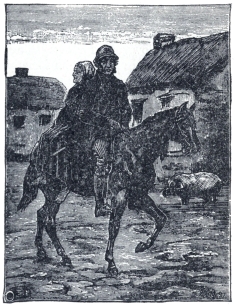
The Royal family have a remarkably soft thing of it. Her Royal Highness,
the Princess Royal, receives a yearly allowance of eight thousand
pounds, the Prince of Wales receives the snug sum of forty thousand
pounds, which he manages to squander in questionable ways (this does not
include the grants Parliament has made at divers and sundry times to pay
his debts), the Princess of Wales ten thousand pounds, Prince Alfred ten
thousand pounds from his marriage and fifteen thousand pounds from his
majority—twenty-five thousand pounds in all—Prince Arthur fifteen
thousand pounds, Princess Alice six thousand pounds, Princess Louise,
she of Canada, six thousand pounds, Princess Mary five thousand pounds,
Prince Leopold fifteen thousand pounds, Princess Augusta three thousand
pounds, Duke of Cambridge twelve thousand pounds, and in addition the
last mentioned fraud has princely pay as field marshal, general,
colonel, and no one knows what else.
Whoever chooses may figure up what all this costs the people of Great
Britain. I have not the patience.
And bear in mind the fact that this does not represent any portion of
what these absorbers take out of the people. This is merely pin money
for the female leeches and pocket money for the male! In addition to
this they have enormous estates all over England, Ireland, Scotland and
Wales; they have offices beyond number, with a salary attached to each,
and they have allowances for everything under heaven. If the tax-payer
breathes it costs him something, for the nobility have revenues based
upon everything.
The Royal household is a curiosity. There’s the Lord Steward, who draws
two thousand pounds a year; the Lord Treasurer and Comptroller, nine
hundred pounds each; Master of the Household, twenty one hundred and
fifty-eight pounds; Secretary of the Board of Green Cloth, whatever that
may be, three hundred pounds; Paymaster, five hundred pounds; Lord
Chamberlain, two thousand pounds; Keeper of the Privy Purse, two
thousand pounds; Assistant Keeper of the Privy Purse, one thousand
pounds. It takes two men to keep the privy purse, and it is large enough
to require it. Then there are eight Lords in waiting, who get for
waiting seven hundred and two pounds each, and there are grooms in
waiting, grooms of the privy chamber, extra grooms in waiting, four
gentlemen ushers, one “Black Rod,” whatever he may do I don’t know, but
for being a “Black Rod” he gets two thousand pounds a year. Then there’s
a clerk of the closet, mistress of the robes, ladies of the bed-chamber,
and bed-chamber women, maids of honor, and poet laureate, and examiner
of plays.
The poet laureate gets five hundred pounds a year for writing a very bad
ode in praise of Her Majesty on each birthday, which must be a very
bitter pill for him, he being actually a poet. But he does not give the
worth of the money, for there is absolutely nothing in the Queen of
England to praise. Mr. Tennyson has a very hard place.
THE ROYAL HOUSEHOLD.
The Master of the Horse receives two thousand five hundred pounds, the
Master of the Buck-hounds one thousand seven hundred pounds, Hereditary
Grand Falconer one thousand two hundred pounds, (by the way kings don’t
falcon any more), then there are eight Equerries in Ordinary at seven
hundred pounds each, which is certainly cheap; five Pages of Honor at
one hundred and twenty pounds each, and a Master of the Tennis Court,
which is a sort of a ten pins, I suppose, at one hundred and thirty-two
pounds.
These, understand, are only a few of the people belonging to the Royal
household. There are over a thousand persons, male and female, attached
thereto, all receiving magnificent salaries, for real or imaginary
services to Her Majesty.

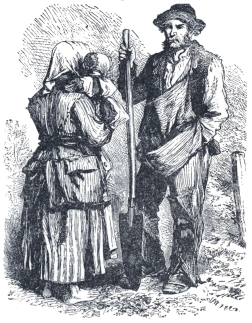
INHABITANTS OF A BOG VILLAGE.
The Queen receives, exclusive of the vast income of her estates, for the
running of her household and pensions for the dead-beats who get too old
to show themselves, the enormous sum of four hundred and seven thousand
pounds, or, in American money, two million thirty-five thousand dollars
per annum! And this represents but a portion of the swindle, as
constantly allowances are being made and annuities granted which do not
show upon paper, and can only be reached by the most ferret-like
acuteness and perseverance.
Ninety per cent. of all this mummery, for which the people of England
have to pay in good hard cash, is the most absurd and utter nonsense.
Like falconry and all that business, it has gone out of date. In the old
times kings kept buck-hounds and flew falcons, and such offices were
necessary, that is, if kings were ever necessary, which I deny, but it
has all gone, never to return. But the offices remain—and the salaries.
They are kept up to make places for illegitimate children of lords, for
poor relations of royalty and nobility, and for favorites whose fathers
or themselves have done dirty work for the government.
In the name of all that’s good, what does the Queen of England want of
eight ladies of the bed-chamber, and thirteen women of the bed-chamber?
Can’t she unhook her dress and corset, untie the fastenings of her
skirts, peel off her clothes, draw on her woolen night-cap over her
foolish old head, and turn in the same as other women? What does she
want of all these people about her? I can understand that it would take
that number and more to make the ancient nuisance presentable in the
morning, but why tax the people of Great Britain forty-four thousand
pounds a year for this service?
And then when it is taken into account that the entire royal family have
each all this humbuggery, to a less extent, it can be figured up what a
very expensive thing royalty is, and how wise the American people were
to bundle the whole business off the continent at the time they did.
One thousand people at salaries ranging from one hundred to ten thousand
dollars a year, to take care of one rickety old woman, who is mortal the
same as is the humblest of those ground into the dust by her and hers,
and who has no more title to the place she occupies than a thief has to
your watch.
THE PALACE AND THE WORKHOUSE.
Ireland swarms with soldiers, and, for that matter, every nook and
corner of the British Empire is scarlet with military. Royalty and
nobility, having no reason for existence, have to be maintained by brute
force. Royalty and nobility do not pay for this expenditure; a
subjugated people pay for their own debasement. To every pound of the
expenditure in the British Empire, sixteen shillings four and one-eighth
pence go to the war debt and the support of the army, leaving three
shillings seven and seven-eighth pence for all other purposes
whatsoever. Military power is the basis of despotism everywhere. Germany
groans under it; Russia sweats under it; and wherever a king is
tolerated you will find bayonets and artillery in most uncomfortable
plenty. Some day, let it be hoped, the kings and nobles will experience
the delight of looking down the muzzles of these arms themselves.
Up to the time of the disestablishment of the Irish Church, the Irish
were compelled to support the archbishops and bishops of a church whose
religion is as foreign to them as Buddhism, paying therefor the sum of
one hundred and two thousand eight hundred and twenty-five pounds per
annum, and to other attaches, for curacies and all that business, a vast
amount more. This immense amount of money was a tax yearly upon a
starved and overworked people, to keep in luxurious idleness a parcel of
drones whose only functions in life were to eat, sleep and hunt; who
were of no earthly use to the people who supported them, either in a
temporal or a spiritual way. There is one English church at Glengariff,
in a parish in which there are only six Protestants, the rector, his
wife, two children, and two servants. The rector has as fine a house as
there is in the country-side, the cost of which and its support is a
burden on a people struggling for their daily bread.
Pauperism is a certain consequence of royalty and nobility. The Queen of
England cannot have one thousand men and women about her person under
pay without taking bread from the mouths of many people, and the luxury
of a noble must find an echo in the other extreme, the workhouse.
The number of adult paupers in England and Wales in 1880, exclusive of
vagrants, was seven hundred and eleven thousand seven hundred and twelve
and the cost to the labor of the country to relieve them footed up eight
millions eight hundred and nineteen thousand six hundred and
seventy-eight pounds.
This does not include Ireland and Scotland, but England, the most
prosperous part of the British Empire. The English writers on political
economy ascribe this appalling pauperism to every cause but the right
one. Wipe out royalty, nobility, and landlordism, and give the people a
chance to earn their bread, and this army would be reduced to almost
nothing.
Crime goes on hand in hand with pauperism. In 1879 the United Kingdom
had the enormous number of one million four hundred and ninety thousand
four hundred and thirty-nine committals for crime. This does not include
the cases of drunkenness or kindred offences which come before
magistrates and are summarily disposed of.
HOW THE NOBILITY ARE EMPLOYED.
The principal business of the aristocracy of England is to make places
for themselves and their sons and nephews. No matter how large the
plunder of the tenantry, the landed aristocracy must have government
employment for their surplus children, for they cannot all stay on the
acres originally stolen from the people. And so British arms conquer
other lands, or British diplomacy, which is a lie backed by a
man-of-war, “acquires” it, and immediately a full staff of officials is
sent out, all under magnificent salaries, to stay just long enough to be
retired upon a fat pension. If possible, the expense of governing the
“acquired” possession is squeezed out of the unfortunate natives; if
not, the home government makes up the deficiency.
Cyprus, an island made almost barren by years of Turkish misrule and
oppression, is now in the hands of the English, with a
commander-in-chief at fifteen thousand pounds a year, and a complete
staff, the cost of which is not less than seventy thousand pounds per
annum, to say nothing about the armament necessary to be kept there.
The island of Maritius, a speck in the Indian Ocean, thirty-six miles
long and twenty miles broad, furnishes sinecures for the scions of
English nobility to the tune of eleven thousand six hundred pounds per
year, and three little islands off the Malayan Peninsula are governed by
a parcel of “Sirs” and “Hons.” at an annual cost of twenty-one thousand
two hundred and ten pounds.
These are only samples. England has such harbors of refuge for her
surplus nobility everywhere, and the cost of supporting these locusts is
a crushing tax upon the labor of the country. The items of pauperism and
crime are easily accounted for.
Some of her stolen dependencies, however, are made to pay very well. The
total receipts from British India for the year 1879, (customs, taxes,
etc.), were sixty-five million one hundred and ninety-nine thousand six
hundred and sixty-two pounds, while the expenditures for the same year
were sixty-three million one hundred and sixty-five thousand three
hundred and fifty-six pounds. India is so worked as to support a vast
army of officials and leave a balance of two million pounds for profit
besides. But the real profit is much larger. The manufacturers and
merchants of England compel the down-trodden natives to buy their goods
at their own prices, and a never failing stream of wealth flows from
India to England. India was a successful piece of brigandage, and has
always paid very well.
Other steals have been successful—in fact they all have been. These
younger sons, legitimate and illegitimate, have to be supported some
how, by the labor of the country, and to transfer even a portion of
their cost to the people of other countries is a saving of just that
much from the people at home. But where is the necessity of supporting
them at all? What necessity is there for their existence?
The peers of the realm number four hundred and eighty-seven, and of this
number four hundred and two own, or at least get rent for, fourteen
million one hundred and twenty-nine thousand nine hundred and thirty-one
acres of land, which bring them a rental annually of eleven million six
hundred and seventy-nine thousand eight hundred and thirty-nine pounds.
In addition to this enormous income the most of them have appointments
of various kinds, all of which make the position of peer a very
comfortable one.
They have a very pleasant life of it. They all have a castle on their
estates in the country, and in the season guests made up of the same
class, with a few poets, novelists and painters to supply the intellect
and make variety, indulge in all sorts of festivities, and in town, in
the season, their houses are constantly filled, at no matter what
expense. Then they each have a membership in all the clubs, and between
their country houses, and their town houses, and their clubs, they take
pleasure and cultivate gout till death, which has no more respect for
them than it has for their oppressed tenants, takes them to a place
where there is no difference between a duke and a laborer.
MY LORD.
Gout, by the way, is the fashionable English disease, and a nobleman or
a squire of an old family would rather have it than not. It is a sort of
mark of gentility, about as essential to his position as his family
tree, and no matter how they suffer under it, they bear it with
fortitude as one of the evils incident to their rank—an evil that
emphasizes their dignity. When Dickens sent Sir Leicester Deadlock into
the next world via the family gout, he did not satirize at all. The
starved Irish never have the gout, nor do the working people who clamor
for some measure of right. The Jack Cades never were so afflicted; only
your noble, who toils not, neither does he spin, who goes to bed every
night full of every flesh that exists, every wine that is pressed, to
say nothing of more potent beverages. It is an accompaniment of “gentle
birth,” and very liberal living—living so liberal as to be only
possible by those who have other people’s unrequited labor to live upon.
An Englishman dearly loves a lord. There is a cringing servility, a
hat-off reverence for noble birth, in England, that to an American is
about the most disgusting thing he sees. My Lord may be a thin-haired,
weak-legged, half-witted being, capable of nothing under heaven but
billiards and horses, loaded to the guards with vices, and only not
possessing all of them because of his lack of ability to master them. He
may be the most infernal cumberer of the earth in existence, but if he
is of noble birth, if he has the proper handle to his name, he is bowed
to, deferred to in every possible way. A London tradesman had rather be
swindled by a nobleman than paid honestly by a common man, and for one
to have permission to put over his door, “Plumber (for instance) to His
Royal Highness the Prince of Wales,” is to put him in the seventh heaven
of ecstacy. The farm population of England show outward deference, but
they don’t feel it, and the Irish have so intimate an acquaintance with
them that they refuse even lip service and ignore the “hat-off”
requirement altogether. This lack of respect for the nobility in Ireland
is considered one of the most alarming signs of the times.
I saw a sample of this bowing to royalty, in Scotland. I happened to be
doing Holyrood Castle at the same time His Majesty Kalakeau, King of the
Sandwich Islands, was in Edinburgh. Now King K. may be a very good man,
but in appearance he is an ordinary looking man of half negro blood, and
not a very remarkable mulatto at that. Our Fred Douglas would cut up
into a thousand of him.
He is a sort of a two-for-a-penny king; but he is a king for all that,
and so all the dignitaries of Edinburgh, the mayor, the principal
citizens, a duke or two, and a half dozen right honorables showed him
the city, and escorted him, and lunched him, and banquetted him. They
brought him to Holyrood, and the entire lot of them formed in two ranks,
and, with hats in hand, bowed reverently as this king of a few thousand
breechless, semi-civilized savages, passed to his carriage. And they
glared ferociously upon the few Americans who, not just au fait in
such matters, and not knowing precisely who the distinguished colored
man was, stood with their hats on their heads, inasmuch as it was
raining. Had it been the King of the Fijis, and had it been raining hot
pitchforks, these snobs would have stood with uncovered and bowed heads,
simply because he was a king. To these people, “there is a divinity
which doth hedge a king,” no matter what kind of a king it is. They do
the same thing for that venerable old stupidity, Victoria Guelph,
precisely as they did it for that amiable imbecility, Albert, her
husband, and are doing it every day for those embryo locusts, their
children. Burns wrote:—
“Rank is but the guinea’s stamp,
A man’s a man for a’ that.”

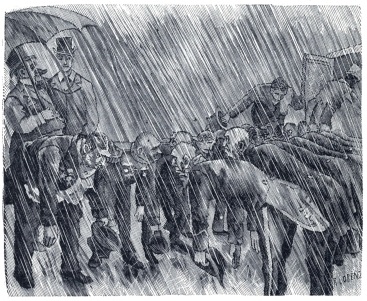
THEY GLARED FEROCIOUSLY UPON THE AMERICANS.
LIVING IN IRELAND.
But this class of Scotch have forgotten Burns. Possibly they never
understood him. But Burns was wrong. Kalakeau may be a man, but the
snobs who toadied to him so meekly, are not, and never can be.
“Look upon that picture, and then upon this!” I have shown how the
English oppressor lives. Let us go, by actual figures, taken from
official sources, for a few actual facts as to the Irish tenant. The
Parish of Glencolumbkille, in County Donegal, is a fair sample of the
west coast. In this parish there are eight hundred families. In the
famine of 1880, seven hundred of these families were on the relief list,
and on to the end of the famine (if famine may be said to ever end in
Ireland), four hundred families had absolutely nothing but what the
relief committees gave them.
The committees were able to give each of these families per head per
week seven pounds of Indian meal, costing five pence farthing, up to
about five dollars and fifty cents per year.
These people all said that if they got half as much more, ten and
one-half pounds, it would be as much as they would use in times of
plenty.
Your pencil and figures will show you that this would be equivalent in
good years, to an expenditure per head for food for every individual, of
one pound thirteen shillings and sixpence a year, or for the average
family of say four and one-half, seven pounds thirteen shillings and
sixpence per year.
This is the cost of food for the average family per year when the times
are good.
When potatoes are cheaper than Indian meal potatoes are eaten, but one
or the other constitutes the sole food of the people. As the cost is
always about the same, the figures are not changed in either case.
To this you want to add about three pounds a year for “luxuries.” Luxury
in an Irish cabin means an ounce of tobacco a week for the man of the
house, and the remainder of the three pounds goes for tea. I admit this
is an extravagance, this tobacco and tea, and I doubt not that a
commission will be appointed by Parliament to devise ways and means to
extinguish the dudheen of the man and abolish the teapot of the woman.
This three pounds a year, thus squandered, would enable the landlords to
have a great many more comforts than they now enjoy. I presume the Earl
of Cork could build another yacht on what his tenantry squander in tea
and tobacco.
Add to this one pound for clothing (an extravagant estimate) for each
member of the family, and you have the entire cost of the existence of
the Donegal family, twelve pounds three shillings six and three-quarters
pence, or, in American money, fifty-seven dollars and sixty-one cents!
The clothing provided by this pound a year means for the man of the
house a pair of brogans, which he must have to work at all, a couple of
shirts, a pair of corduroy trowsers, and a second-hand coat of some
kind. The women and children wear no shoes or stockings, and their
clothing I have described before. Of bed-clothing they have nothing to
speak of. A few potato sacks, or gunny bags, or anything else that
contributes anything of warmth, makes up that item.
The Queen and the Princess of Wales sleep on down and under silk, and
the Queen has one thousand people about her person. My Lord has his
yacht in the harbor, and the humblest seaman on board sleeps under
woolen and has meat three times a day.
Some day there will be a Board of Equalization from whose decision there
will be no appeal. Then I would rather be the Donegal peasant’s wife
than the Queen. Despite the fact that she sent one hundred pounds to the
starving Irish, she won’t need silken covering to keep her warm.
To pay the rent and provide this fifty-eight dollars for food and
clothing consumes the entire time of every member of the household. The
land will not pay it—it is impossible to get it off the soil. So the
man of the house plants his crops and leaves them for the women and
children to care for, and he goes off to England or Wales, and works in
mines, or in harvest fields in the season, or at anything to make some
little money to fill the insatiable maw of the landlord, and to keep
absolute starvation from the house.
Then the boy in America sends his stipend, which helps—provided his
remittances can be kept from the lynx-eyed agent, who would raise the
rent in a minute if he knew that remittances were coming.
WOMEN’S WORK.
But the work of caring for the crops is not all the women

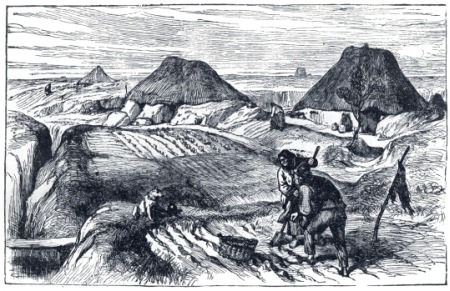
BOG VILLAGE, COUNTY ROSCOMMON.
and children do. They knit and sew, every minute of the spare time they
have from field work, making thereby from two to three cents a day. This
knitting is done for dealers who furnish the material and pay for the
work, and to get the material journeys of twenty to forty miles, and
the same distance back again to deliver the finished work, have to be
performed.
In brief, there is not a moment to be lost, nor an opportunity wasted to
make a penny. The penny not earned makes the difference between enough
food to sustain life, bare as life is of everything that makes it
desirable, and absolute pinching, merciless hunger. No matter at what
sacrifice, the penny must be earned and religiously applied either for
rent or food. Clothing is always a secondary consideration—a place to
stay in and food to keep life in the body, these are the first.
What is the amount paid the drones of England in the form of pensions?
How much does the Queen receive? How much do the little Princes and
Princesses cost the Nation? How much the Dukes and Dukelings, the Right
Honorables and the Generals and Colonels, and the Secretaries and all
that? “Look upon this picture and then upon that!” A nobility rioting in
extravagance—a whole people starving!
And yet there are those who believe the people of Great Britain have no
grievances, but should settle down contentedly and in quiet!
If there is an American who does not hate royalty, nobility, and
aristocracy, in no matter what form they come to view, he either wants
to be an aristocrat himself, or is grossly ignorant of what this triplet
of infamy means. If there is an American who does not sympathize with
the common people of England, Ireland, Scotland and Wales, he is either
a heartless man or does not know the condition of the laboring classes
of that unhappy Empire. And if there is an American who reads these
pages, and does not from this time out, make politics just as much a
part of his business as planting his crops, that American does not know
what is good for him. Government is the most important matter on this
earth. Good or bad government makes the difference between
nobility-ridden England and free America.
CHAPTER XXX.
PARIS TO GENEVA
FROM Ireland with its woes, Ireland with its oppressions, through
England, the world’s oppressor, to Paris, and from Paris to
Switzerland—that was the route our party took; not so much because it
was consecutive or in order, but because the whim so to do seized us. We
were out to see, and to us all countries that were to be seen were alike
of interest. We spent a few more days in Paris—everybody wants to spend
a few more days in Paris—and then turned our reluctant faces southward.
A dismal, gloomy night; the fine, penetrating rain, cold and
disagreeable, that chills the very marrow, half hides the dimly burning
gas-lights, and makes the streets utterly forlorn. The belated
pedestrian bends his head to the blast and hurries along, eager to reach
the cozy room where the gloom that pervades everything out of doors
cannot penetrate. The cabs roll along the stony pavements with a dead,
metallic sound that adds to the general dreariness.
Everything and everybody is depressed.
So it was when the train drew out of the dimly lighted station in Paris,
and plunged into the unfathomable gloom and darkness of the country
beyond.
Wonderful invention—this railroad! and never so wonderful as at night.
The mariner has his compass to guide him—the engine-driver has the
rail. You go to sleep, or try to, in Paris; you wake in Switzerland. It
makes reality of the magic carpet in the “Arabian Night’s Tales.”
Though the coarse, stuffy compartment afforded no pleasure, the dull
roar of the train as it sped on through the driving storm lulled the
senses, gave our memory full sway; gradually

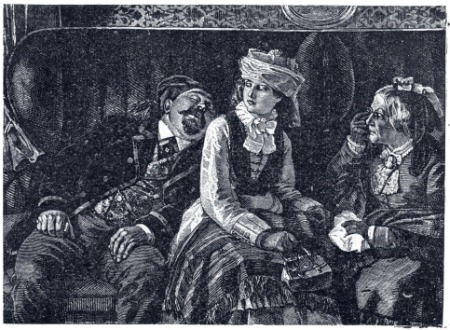
COMPARTMENT IN A FRENCH CAR.
A NIGHT ON THE RAIL.
the rain ceased its pattering against the window pane, the sky broke
into a rosy blue, the brilliant sunlight streamed out in the night over
the beautiful white city, and Paris, the frivolous empress of the world,
held out to the mind its multitudinous attractions and unlimited
pleasures. We saw again, reflected in the memory of the last six weeks,
the long, wide boulevards, with their cheerful cafés filled with
beautifully dressed women and leisure-loving men. There was the
constant, ever-changing streams of humanity surging on to some end,
each in his own way. There were the lights, the flowers, the gaities of
the beautiful city, where the attainment of happiness and pleasure seems
to be the chief aim of existence. The Louvre with its infinity of
beauties, the Palais Royal with its bewildering jewels, the Place de
Concorde with its historic memories, the Champ Elysées dazzling bright,
with its arch-crowned vista of brilliant equipages, the Bois du Boulogne
with its flower-lined walls and flower-lined lakes. There was rare
relief, ever present to us, in all its glory, all its pleasure, all its
gaiety. Days passed into weeks, and weeks into months, of perfect
enjoyment that came to an end only when the guard in gruff tones hustled
us out of the car at Macon, to change for the train going to Geneva. The
transition was sudden and decidedly unpleasant.
There were eight of us in the compartment all that night—a Frenchman
and four small daughters, on their way to Geneva, Tibbitts and
ourselves. Tibbitts, who could not speak a word of French, except “Der
bock,” which means in English “two beers,” and “Combien?” which is
“how much,” entered into a cheerful conversation with the Frenchman, who
could not speak a word of English. It was vastly entertaining. Tibbitts
would make a beautiful remark in English, to which the Frenchman would
reply, “Oui, Monsieur.” Then the Frenchman would make an elaborate
observation on something or other in French, to which Tibbitts would
reply, “Oui, Monsieur,” and so on all night.
It was not pleasant for those trying to sleep, but it seemed to amuse
the two participants.
At Macon, in the morning, the Frenchman followed Tibbitts around the
platform, attempting by gesture and a volley of Parisian French, to make
something known to him.
Tibbitts came to me alarmed.
“What is ‘Oui Monsieur’ in English?”
“It means simply ‘Yes, sir,’ or ‘Certainly, sir.’ ”
“Did you know what that Frenchman was saying last night?”
“Not a word.”
“I said ‘Oui, Monsieur’ to everything he said. Suppose he asked me to
lend him a hundred francs! I am in a fix about it. I can’t go back on my
word, and if he asked me that I certainly promised to do it, and if I
have to do it I shall have to borrow it of you.”
Mr. Tibbitts’ fears were unfounded. A hotel-porter who could master a
trifle of English, came between them, and found that the Frenchman had
been so impressed with the urbanity of my Oshkosh friend as to ask him
in the night to take care of his four children to Geneva, that he might
return by the next train to Paris, and Tibbitts had said “Oui, Monsieur”
to the proposition, and he had the babies on his hands all the way.

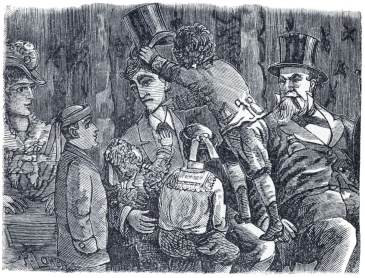
THEY WERE LIVELY CHILDREN.
They were lively children, and made the poor fellow much trouble, and
Tibbitts heaved a prodigious sigh of relief when he turned them over to
their waiting guardian at Geneva. He immediately asked for the French
word for “No,” and vowed solemnly to ever after use that word when in
conversation with Frenchmen on railroads or elsewhere.
ON THE WAY TO GENEVA
The day broke dull and cheerless, but as soon as the sun came up the
clouds were driven away, and the whole country was bright and
beautiful. The road passes through some of the best wine districts of
France, and nearly all of the little towns through which the train
whirls with only a long shriek of the whistle, are devoted to the
handling of wine, although in most of them there is a church or two and
some monuments, just enough to make it a show place.
A town on this side of the water is no town at all if it does not have
at least two or three places that were either old or historical, or
both. Thus at Tournus, a little town of six thousand inhabitants, there
is an Abbey church that was begun in 960, and not completed until late
in the twelfth century. It isn’t much of a church, but it attracts
visitors to the town, and so adds to its revenue. It pays to have show
places.
From Macon to Culoz the line passes through lovely vineyards that lie
spread out almost as far as the eye can reach, over gently undulating
hills and dales that are watered by pretty little streams, clear and
pure, having their source way off in the mountains, dimly discernible in
the distance. Soon after passing Culoz the country assumes a more
picturesque appearance, the vine-clad hills giving way to rugged
mountains that tower high above the fertile valley, through which the
train has been rushing for the past two or three hours. Swift, deep
streams, fed by mountain springs, come tumbling down the sides of the
high cliffs and lose themselves in the mass of foliage that skirts the
base of the range, which hourly grows more and more imposing. We are
whirled through long tunnels, over high bridges, and are treated to
magnificent prospects. Green mountain sides crowned with the ruins of
old castles that in days long gone by had been the terror of the
neighborhood, picturesque towns nestling in cozy nooks flit by as the
train speeds rapidly on, until, early in the forenoon, we arrive at
Geneva, the Mecca of all strangers who contemplate an Alpine or Swiss
tour.
The day was perfect. A cool breeze from lovely Lake Leman tempered the
heat that otherwise would have been oppressive; the sky was without a
cloud and as the pure air was gratefully inhaled by long delightful
breaths, there was a sense of joyousness and happiness that was
heavenly. Near at hand a long range of high mountains stretched out into
the country and lost itself in the range that skirts the shores of the
long irregular lake. Far off in the distance, between the dimly outlined
peaks of another range, Mont Blanc rears its grand white head high among
the clouds, its aged covering of pure white, glistening and glinting in
the sunlight. It is an impressive scene, full of strange fascinating
beauty.

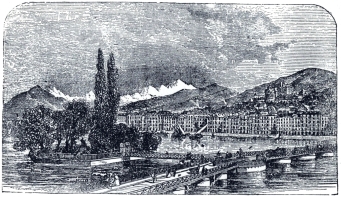
THE LAKE AND CITY OF GENEVA.
GENEVA.
Grandly the view changes. A light fleecy cloud floats languidly past the
summit, casting a weird shadow on the spotless white. That delicate
lace-like cloud, beautiful in form and color, is followed by another,
darker and more threatening. Another and another comes, each darker and
more forbidding, until suddenly the whole is overcast. Mont Blanc is
enveloped in a sable mantle from which, presently, issues a low rumbling
noise that foretells in unmistakable language what is to come. Now long
jagged flashes of lightning rend the gloomy masses of fast scudding
clouds, that turned the bright day into darkness, the wind sweeps down
from the mountain with a wail half human; the rain comes down in
torrents, not in fitful gusts but in a steady, angry stream. The placid
waters of the lake, only a moment before laughing in the bright
sunlight, are lashed to a fury, as the storm increases in violence.
Terrific peals of thunder that seem to shake the earth, break directly
overhead and then go rolling and rumbling away up the valley, until they
exhaust themselves and die away with one final crash. All the elements
seem to combine to produce a grand spectacle that strikes the beholder
with awe-tempered admiration.
As quickly as it came the storm died away, and in a short time all
nature smiled again and seemed to feel better after the display of its
ability in getting up grand sights on short notice. The sun came out
with renewed splendor and tinged Mont Blanc forty miles away, with a
rosy hue, that lasted all the afternoon, long until the other and less
pretentious peaks had become mere outlines in the twilight that presaged
the coming night. And then even the King of Peaks began to fade.
Gradually but constantly the pink tints turned lighter until it was
ashen. Then it became darker and darker until at length its massive
proportions faded entirely away and were lost in the darkness that had
come so gradually that its presence was hardly felt.
Geneva is a curious old city, one of the links that connect the dead
past with the terribly active and quite distinct present. Its memories
are of monks and opposers of monks; its present is of watches and music
boxes. However, the Genevan has been shrewd enough to carefully preserve
the dust of the past, out of which, combined with its delightful
situation, it gathers many shekels from the horde of tourists who sweep
over Europe every year. Everybody must and does see Geneva. It is the
capital of the smallest canton in Switzerland but one, the entire
territory being but fifteen miles long by as many square, a large
portion of this being taken up by the lake. Its population is less than
fifty thousand, but, nevertheless, it is the largest city in
Switzerland, and one which has the most of historical interest attached
to it.
The land is so nearly perpendicular in Switzerland that large cities are
impossible.
So small was the canton of Geneva that Voltaire said of it: “When I
shake my wig, I powder the whole Republic,” and when some commotion
occurred in the little Republic the Emperor Paul said of it: “It is a
tempest in a glass of water.”
But, small as it is, it has played its part, and a very important one it
has been, in the history of the world. Here lived John Calvin, or Jean
Caulvin, who originated that cheerful form of religious faith known as
Calvinism. As he preached, and, to the credit of his powers of
endurance be it said, practiced, it made a good heaven necessary in the
next world, to compensate somewhat for what his disciples had to endure
in this. He eliminated from life everything that was pleasant,
everything that was cheerful, everything that was pleasurable, and
brought mankind into a sort of religious straight-jacket, that made any
swerving from a straight line impossible.
Daring Calvin’s reign, for his rule was almost absolute, Geneva was a
safe place to live in (if you believed with Calvin, or pretended to
believe hard enough), but it would hardly suit a Parisian. Theaters were
considered the especially wide gateways to perdition, and everything
that savored of amusement was strictly prohibited. As his was a stern
and gloomy religion, which made the business of this life a constant
preparation for the next, and the reward for all this sort of penance a
continuance of the same in the next, his doctrines found more ardent
support in Scotland than in France.
In opposing the Catholic Church, as the Catholic Church was in that day,
Calvin, with Luther, did a great work, but Calvin, after all, simply
wanted the people to exchange one form of spiritual despotism for
another. The chief benefit arising to the world was that, in moving the
people out of Romanism he taught them that they could move, and, so
instructed, they lost but little time in moving out from the perpetual
thunder-cloud he put over them.
For many years he was supreme in Geneva in temporal as well as spiritual
matters. As a Liberal who hates authority invariably becomes in time the
worst bigot, so Calvin, who commenced as a champion of liberty of
conscience, came to executing and banishing all who differed with him on
points of religious belief. He wanted everybody to believe as their
conscience taught them, provided it taught them his belief. Castellio,
one of his oldest supporters, differed with him on the doctrine of
predestination, and Calvin promptly banished him. Servetus, a Spaniard,
wrote a treatise on the doctrine of the Trinity. He was arrested by
Calvin in 1553, and was promptly tried, found guilty of not believing as
the great reformer did, and was condemned to the stake, and was burned,
Calvin standing by to make it impressive.
AN AFFECTING ANECDOTE.
Tibbitts told an old Boston story of a confirmed joker who was dying. A
friend called upon him one morning, and finding his feet warm sought to
encourage him.
“Barnes, you ain’t going to die. No man ever died with warm feet.”
“One did.”
“Who?”
“John Rogers!”
Servetus died with warm feet, and his ashes were scattered to the four
winds. He and Calvin differed about the exact meaning of some passages
of scripture and as it had not been revised at that date, Calvin made
himself the authority. As he had supreme power and could do as he
pleased he succeeded in having a tolerable degree of unanimity. After
the burning of Servetus there were but few who desired to argue with
Calvin.
I have observed that burning and otherwise killing for the up-building
of the kingdom of the Prince of Peace has been common in all ages, and
that the sect that does the most of it is always the one that happens to
be in power. The Jesuits have published a sort of Catholic “Fox’s Book
of Martyrs,” which sets forth with ghastly wood engravings the histories
of the persecutions of Catholics by Protestants. The burning of Servetus
by Calvin is the subject of one of the illustrations, though the editor
carefully omits the fact that Servetus was not a Catholic at all.
Rosseau, the great Socialist, was born here, and here he wrote the works
that have consigned his memory to infamy or glory, according as the
reader believes. He was a man of wonderful genius, one of the foremost
writers of the world, but he was as fantastic as any other Frenchman,
and his doctrines were based upon a condition of things which only a
dreamy poet could imagine as possible. He was a Socialist, a
latitudinarian, and one of the kind of “world reformers” who hold that
everything that is, is wrong, and that to destroy anything is to better
the condition of the world.
It is a curious commentary upon French morals that after he had been the
lover, (with all that the word implies) of a dozen or more of French
titled women who affected men of letters, and while living openly with
his cook, who bore him five illegitimate children, a French college
invited him to write a treatise upon the “Effect of Science and Art Upon
Morals,” which invitation he most cheerfully accepted. He was the
reverse of Calvin, but like Calvin, he left his impress upon the thought
of the little city.
Geneva is a pleasant place to come to, and, but for the extortionate
hotels, would be a place that one would be loth to leave. Swiss hotel
keepers have got swindling down to so fine a point that further progress
in that direction is impossible. There is a legend afloat that hotel
keepers from all over Europe come to Geneva to learn the business, and
that lectures on the art of swindling travelers are given regularly by
the managers of Geneva hotels; in short, that Geneva is a sort of hotel
college, but I don’t know as to its truth. Any hotel keeper here,
however, is competent to fill a professorship—in such an institution.
You are charged for candles, a franc each. You never use a candle,
except during the minute necessary to disrobe for your bed, but you are
charged a franc for it just the same. The more conscientious hotel
manager wants to satisfy you with a new candle every night, and so he
has a little machine, something like a pencil sharpener, with which he
tapers off the top of the burned candle, making it look as though it had
never been lighted, and charges you right over again for it.
Tibbitts exasperated his landlord by putting his candle in his pocket
every morning, and from the front of the hotel giving it to the first
poor person who passed. But the landlord smiled grimly, in French, when
he saw the little trick, and promptly instructed his clerk to charge
Monsieur Tibbitts two francs a day for broken glass.
THE CHAMBERMAID’S TRICK.
You are to depart to-morrow morning, and you charge the clerk with great
distinctness to have your bill made out before you retire. You want to
go over the items and see that everything is correct. The clerk, with
great suavity, assures you that it shall be done, but it isn’t. You come
for it and find the office closed. The next morning you arise betimes
and make the same request; you say you want your bill immediately, to
which the same answer is given with an apology for its not having been
done the night before. You get through your breakfast—it is not yet
done. Minutes fly, the carriage is at the door to take you to your
train, and just as the last minute possible to catch the train is on
you, it comes—as long as your arm, written in French, which you can’t
understand if you had time to, but which now is utterly impossible. You
glance at the grand total—it is a grand total—and you pay it,
objurgating because it is a trifle over twice what it should be.
Then comes the long array of servants, the chambermaid, the boots, the
elevator boy, the head waiter, the table waiter, and so on, all of whom
expect and plumply demand recognition, and you think you are done. But
you are not.
Just as you are getting into the carriage, a chambermaid, not the one
who had charge of your room, but her sister, appears with one of your
silk handkerchiefs.
“Monsieur forgot the handkerchief.”
She extends the handkerchief with one hand, holding out the other for a
franc. You give it to her of course, knowing all the time that your own
chambermaid abstracted it and gave it to her for the purpose of wringing
the last possible drop of blood out of you, and that this wretch has
done the same kind office for your chambermaid, to be practised upon
another victim who leaves to-morrow.
I presume the landlord compels a division of these swindles, for as they
all lay awake nights to devise ways and means to wrench money from
tourists it is not likely they would let so easy a source of revenue
escape them.
Here everybody takes gratuities, even excelling the English in the
practice.
There is a story which comes in here by way of illustration. An old lady
had a case in court which was going slowly. She desired more speed, and
asked an old man, who was supposed to know everything, how she could
accelerate the matter.
“Give your lawyer twenty francs.”
“What! will the grave and great man take twenty francs? Would he not
throw the money in my face and feel so insulted that he would throw up
my case?”
“He might, but I can tell you how to know whether he will take the
gratuity or not. When you come into his presence observe his mouth. If
it runs up and down his face don’t offer it to him, for he would not
take it. But if his mouth runs across his face offer it with confidence.
Every man in Switzerland whose mouth is cut crosswise the face will
accept a gratuity.”
It so happened that in sailing up the lake the question of piracy came
up,—it grew out of a discussion of the charges at the various
hotels—when Tibbitts broke in with that calm confidence that
distinguishes the young man:—
“I have been giving the matter of piracy most serious consideration, its
rise, decline and fall. Formerly piracy was everywhere on the high seas.
Adventurous spirits manned vessels which were built, armed and sent out
by wealthy corporations, their business being to capture merchant
vessels, cut the throats of the male passengers and crew and confiscate
the property. In those halcyon days money was gold and silver, and the
pirates after capturing a rich prize sailed their vessels to some point
on the Spanish main, where there was a convenient cove, captured a
Spanish village, murdered the men, and made such love to the women that
they very soon preferred the picturesque villains to their virtuous but
common-place and insipid (because honest) husbands. And there they
lived; gaily dancing fandangos and boleros, under the shade of palms, to
the soft pleasings of the lute, till the money was spent (by the way I
never could see how they spent money in such places after they had
killed all the shop-keepers and saloon men) and then they sailed sweetly
out to be a scourge of the seas once more.
“It was a pleasant thing to be a pirate in those days.
“The first blow this industry received was the invention of sight draft,
by which money could be transmitted. The pirate who seized drafts
couldn’t forge the names necessary to their collection, to say nothing
of the risk of presenting himself at a bank in London to collect them.
PIRACY ON LAKE ERIE.
“The second and severest blow was the introduction and general use of
dollar jewelry. Dollar jewelry has done more for the suppression of
piracy than the Christian religion. Imagine a pirate captain parading
the crew of a captured ship to despoil their persons before inviting
them to walk the plank, the hungry sharks about the vessel in
joyful—not jawful—anticipation. Imagine his disgust at tearing out a
pair of ear-drops from a lady’s ears of the size of hickory nuts, that
ought to be worth thousands, and finding them Parisian imitation stones
set in oroide gold. Such experiences were heart-breaking. Who would cut
a throat for oroide gold with imitation stones?
“A score of daring spirits once organized a piratical party for a
steamer on Lake Erie. We proposed to take passage Sundays, when there
were excursions; to murder the excursionists, and throw their bodies
over to the catfish, the nearest approach we have to sharks on the
lakes. Our first attempt was our last. There was an excursion from
Indiana, the party numbering eight hundred. We had a contract with a
gentleman named Moses for their clothes, so much a dozen for stockings,
shirts, and so on, as they run; and the money and jewelry we proposed to
divide among the party, each one disposing of his share of the plunder
as he pleased.
“It was a disgusting failure. We discovered that the passengers had
spent all their money in purchasing round tickets for the excursion,
they had brought their lunches with them in baskets, and there wasn’t a
single piece of anything but dollar jewelry among them; and as for their
clothes—Mr. Moses was on board, and he looked over the lot and begged
us not to inaugurate our slaughter, as “ ’selp him, he vouldn’t gif
tventy-fife tollar for all as it stood.” We stood idly by, endured the
excursion ourselves, and were even reduced to the ineffable chagrin of
paying for our own dinners and refreshments. The dashing captain
actually begged his dinner of an old lady in spectacles.
“That was the last effort at piracy on the lakes, and it is about the
same on the high seas. Drafts and dollar jewelry have tamed the
adventurous spirit of the buccaneer, and driven them all into keeping
hotels in Switzerland, the captains as proprietors, the second officers
as head-porters, and the crew as waiters, chambermaids, etc. They are
doing as well, probably, as before, and by similar methods, though
piracy has lost its picturesqueness. Your pirate, instead of wearing a
broad hat and a picturesque sash, and all that, is clad in sober
broadcloth, with a white necktie; his cutlass is transformed into a pen,
the deck of his vessel is the floor of the corridor of his hotel. But he
preys upon mankind the same as of old. It is the method only that is
changed. Dollar jewelry don’t affect them, except in cases where the
landlord has to seize baggage for his bill. Sometimes he comes to grief
then, but not often.”

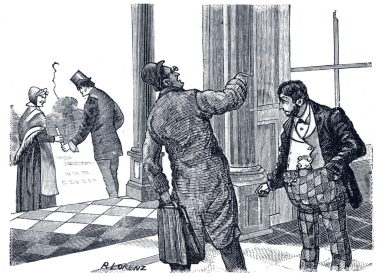
“YOUR HOTEL IS A SWINDLE, SIR!”
One of the most amusing things connected with the hotels is the final
talk that ensues when the traveler has paid his bill, and is buttoning
up his coat for departure.
“Your hotel is a swindle, sir, and I will never darken its doors again.
I will take especial pains to inform my friends, sir. This bill is an
outrage, sir, an outrage! and my friends shall know of it!”
“Oui, Monsieur,” says the landlord, bowing gracefully and grimacing as
expressively as a monkey.
THE IRATE GUEST.
The plundered guest tells everybody not to go to the National, but by
all means go to the Beau Rivage, not knowing, poor soul, that the very
minute he was abusing, justly abusing, the proprietor of the National,
another man just like him was abusing the proprietor of the Beau
Rivage, and that, while he is sending guests to the Beau Rivage, the
swindled Beau Rivager is sending his friends to the National.
“Ze zentleman ees offend,” smirkingly remarked the landlord of the
National, after one of these scenes; “vera goot. He sents all hees
frients to ze Beau Rivage. The proprietor of ze Beau Rivage ees my
frère—vat yoo call ’im, eh?—bruzzer. Ve ees in partnersheep.”
And so it is. All the hotel men are in partnership, and, besides this
powerful leverage, they know that so many come every year, anyhow; that
those flayed at the National this year will go to be fleeced at the Beau
Rivage next, and so on around.
Despite this modified piracy, Geneva is a pleasant and hospitable place
to visit, and one difficult to leave. It is a thoroughly enjoyable old
city, and life there was very full. There is just enough quaintness in
its queer, rambling streets to make one wish to be constantly exploring
them, hoping, yet fearing, that he would get lost. It was an especial
delight to go across the river and prowl among the steep, narrow streets
that end finally against a dead wall; to scale high hills, with old
fashioned houses forming alleys so narrow that two people could scarcely
pass. We loved to plunge into dark, forbidding passages, groping our way
along under houses, until, when least expected, we found ourselves in a
bright, well-paved street in another portion of the town.
And then the long rambles on the lake shore, especially at night, when,
far off in the distance could be seen the twinkling lights of the city
on both sides of the lake, connected by a tiny belt of light across the
bridge that connected the old with the new.
And the concerts at the Jardin du Lac, a pleasant garden with trees and
flowers and fountains, on the south bank of the lake, where a fine
orchestra furnishes exquisite music during the soft, balmy Summer
evenings. Ah! those were indeed days and nights of rare enjoyment.
Geneva is divided into two sections; one as distinct from the other as
an Indiana cabin is from the cathedral at Cologne. On the one side of
the river, it is the same as the freshly built and lively looking
streets of a new American city. You see the modern cornice on the roofs
and over the windows, the elegant plate glass fronts to the shops, the
massive buildings for the factories, the orthodox basement dwellings in
the main part of the city, and the modern villas with ample grounds
farther out.
This is the new part, the part created by the latter day Swiss, who were
compelled by the reconstruction of Paris to modernize and wipe out the
old to make room for the new. There is less of reverence in a dollar
than in anything else in the world. The owner of a historical old
rookery didn’t care a straw for the associations connected with his
premises; what he wanted was rent, and so the quaint old piles were
demolished and new buildings, modeled after the new Paris, went up in
their stead. The uncomfortable old streets were widened into something
like boulevards, the beautifully smooth and clean asphalt pavement took
the place of the wretched old bowlders, and everything that was old, no
matter whether its savor was of the Puritanic Calvin, or the antedating
monk, was bundled out of the way with as little reverence as a
Cromwellian soldier displayed in cleaning out an English or Irish
monastery.
But the other side of the river has escaped the hand of the vandal, and
whoever hungers for the uncomfortable past can find all he wants of it.
The streets are as wretched as the most exacting could desire, and the
houses run up as many stories as you choose, and the old notion of a
building being so high that you have to look twice to get to the top of
it, is well nigh realized. Very like the conductor who was boasting of
the speed of his train:
“Thunder,” says he, “we passed Millgrove so fast that the station master
had to call out the telegraph operator to help him ketch a glance at
us.”
There are passages so tortuous and cavernous, built for no earthly
purpose that any one can divine now-a-days, buildings like small Alps,
with the quaintest windows, the most absurd staircases, and the most
inconvenient arrangements, shops in passages so dark as to require
artificial light in mid-day, and human habitations in these underground
burrows.
TOO MUCH MUSIC.
Old Geneva, like Old Paris, has a musty smell and ancient flavor that is
delightful, if you do not have to live in it.
On the other side you are oppressed with watches and music boxes, the
manufacture of which support the city. In the matter of watches Geneva
is not so absolute as she was, for the inventive Yankee makes a better
watch than the Genevan hand-worker. We do not make so many kinds or so
curious specimens of horology, but for substantial wear and constant
use, the American watch is conceded even by the Genevan to be the best.
But in music boxes and every species of musical machinery, Geneva has no
rival. At your hotel the doors of some of the grand halls reel off
snatches of opera as they swing upon their hinges, the caraffe from
which you pour your water at table sings an air as the water gurgles
from its mouth, and you shall see beautiful trees with gorgeous birds
hopping from limb to limb, and all singing deliciously and naturally.
Snuff boxes, tobacco boxes, cigar cases, everything of the kind has a
musical attachment, that discusses sweet melody whenever opened. In
short, there is such a wealth of melody, and it comes to you from such
unexpected quarters, that one gets rather tired of it, and wishes he
could go somewhere to get out from under it.
A perpetual concert is rather too much of a good thing. And they get
prices for these goods, too. My friend, the faro bankeress, who has
about as much of an idea of music as a pig has of the Greek Testament,
paid five thousand dollars for a tree with singing birds, because, I
presume, the price was five thousand dollars. Had it been fifty dollars
I doubt if she would have taken it.
It didn’t matter to her. Her husband’s establishment could win that
amount any night, and it pleased her to astonish the manufacturers of
these airy nothings, with her profuseness of expenditure. I saw a
duplicate sold to a man who knew something about these things for one
thousand dollars. These sellers of whims know their customers at sight.
CHAPTER XXXI.
SWITZERLAND—SOMETHING MORE ABOUT GENEVA AND THE SWISS OF THAT
ILK—THE LAKE AND RIVER.
Some one remarked to the Rev. Mr. Henry Ward Beecher, before he had the
little difference with Mr. Theodore Tilton, and was editing the
Independent, “Mr. Beecher, I like your paper. You had a religious
article in the last number. Now I think it is the correct thing for a
church paper to have, occasionally, a religious article.” So, in a
record of travels, I think it entirely proper to say something,
occasionally, about the country the traveler explores.
The lake, at one end of which sits the beautiful though much mixed
Geneva, is known abroad as Lake Geneva, but here as Lake Leman, the name
given it by the Romans who once occupied this country, as they did every
other country they could reach and conquer. The inlet to the lake is the
River Rhone, and so, likewise, is its outlet; which is to say, the lake
is simply a widening of the river, a huge goitre, as it were, on the
lovely neck of that beautiful stream.
The Rhone collects the waters that fall on the south side of the chain
of mountains, as the Rhine does the water drainage of the north side,
and is created originally, and fed as it goes, by the glaciers that
adorn the mountain sides, and support Switzerland by attracting
tourists.
At the top of the mountains there is snow, soft, regular snow, which
slides down fissures, and which, as it gets down the slides, changes
from snow to ice. It melts slowly all the Summer, the water seeking the
bottom of the field of ice, but its thickness being constantly
maintained by fresh supplies of snow from the top.
THE RHONE.
This water brings out of the mountains all sorts of material, rocks and
earth, which fill the streams that come down the mountain side in
swiftly flowing streams which lose themselves in the river in the valley
below.
The Rhone flows past Sion, Martigny, Bex, and other points, till it
falls into Lake Leman, as beautiful an inland body of water as there is
in Europe, and almost as beautiful as some of the American lakes.
Before and at its entrance into the lake, the water of the Rhone is as
muddy as the Mississippi at St. Louis. It is about the color of cheap
restaurant coffee, but the lake acts as a great settling bed, or filter,
or both; and by the time the water finds itself in its new location it
becomes the most pure and limpid of any in Europe. The water in the
lake, which was so muddy and discolored in the river above, becomes so
pure and limpid that the fish may be seen disporting themselves in its
lowest depths, and the minute pebbles on the bottom are distinctly to be
seen.
Geneva is at the lower point of the lake, and the Rhone, which was
buried in it at the upper end, is resurrected at Geneva, and issues
therefrom in a stream of fearful rapidity. The waters spring out from
the lake with a fall that would be called rapids in America, and rush
through the city actually singing as if with joy at its deliverance. It
rushes out as if it spurned all impediments of shore that kept it into a
well-behaved and quiet lake, and as if anxious to get the freedom of
rushing through the valleys, over rocks, and tumbling around generally
in a free and easy way till it runs its race and loses itself forever in
the common sepulchre of all rivers, the great sea.
Laundrying is done in Geneva as it is in Paris. Anchored in the river
are large boats arranged for wash houses. In these floating temples are
furnaces which supply hot water, and plank tables at which the
washerwomen do their work. The garment is taken and swashed in the hot
water of the floating laundry, then they are religiously and
conscientiously soaped, and placed upon these thick tables, and pounded
with a wooden paddle till the soap and water is driven completely
through them. Then they are rinsed in the swift running water of the
Rhone, and pounded more, and rinsed and rinsed again, till they come
out as white as the snow from which comes the water.
These nymphs of the paddle and soap-kettle are industrious workers, with
strong muscular arms that seem capable of doing any kind of work, as
indeed they are. It is no small matter to carry down to the river the
enormous bundles of superlatively filthy clothes, and after the soaping
and beating and wringing, carrying them home wet and heavy. But possibly
there are no more pounds to carry home than they brought. There is added
weight in the water they hold, but the dirt is gone down the river to
form bars below and impede navigation. Possibly the loss of the dirt
balances the increased weight of the water. It is a stand-off.
These women earn a good living, for there is any quantity of laundrying
to do, not from the citizens, but from the horde of tourists who throng
the city and make Geneva their headquarters for the Alpine tour, and who
here lay in a fresh stock of linen.
A GENEVAN BAKERY.
The Genevan, like all other men of French or partially French
extraction, is a tremendous worker, and this includes the female as well
as the male. The male Genevan is up with the lark, or whatever bird in
Switzerland has the disagreeable habit of early rising, and his labor
continues as long as he can see, and even after. And he works, not in a
perfunctory sort of way, but tackles his business as though he was doing
it for the simple liking of it. He is a most persistent and rapid
worker.
I was exploring the old part of the city one night, and in groping
through the narrow, half-underground passages, I came upon a baker’s
shop. As I wanted to get at the secret of the delicious bread for which
the French are famous, I investigated. It was a scorching night, but
nevertheless there was a roaring oven, heated seven times hotter than
any furnace I had ever read of, except one. In front of this furnace,
were the mixing and kneading troughs, and at them, in a space of not
more than twenty feet square, were a score or more of men naked to the
waist, with perspiration pouring from every pore, at work at the stiff
and tenacious dough. They would lift a mass of it half as large as their
bodies, and slap it about, and pull it out, and compress it, and
elongate it, and torture it in all sorts of shapes, and in every way
possible for dough to be tortured. It was as hard manual labor as I had
ever seen performed.

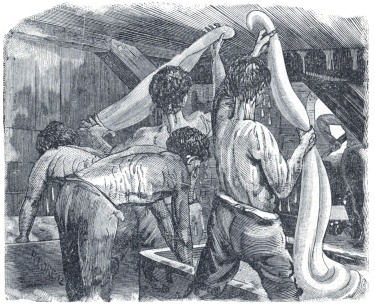
THE SWEAT OF OTHER MEN’S BROWS.
And finally after the dough had been tormented a sufficient length of
time it was formed into rolls, five or six feet long, and not more than
six inches in diameter, and placed in the oven, from whence it emerged
the most deliciously crisp bread that ever was eaten, and entirely
different from the heavy, soggy English bread which has dyspepsia in
every crumb of it.
The secret of this light, delicious crustiness is not only in the form
in which it is baked, but also in the thoroughness of the kneading. It
is worked over and over, till it is as smooth as silk all the way
through, and as light as a feather. Such bread needs no butter (and, by
the way, very little is used) and may be eaten with gustatory delight
anywhere, and at any time.
Still, a person who has to eat bread had better not go and see it made,
on the same principle that a wise old boarder of experience never
ventures near the kitchen. “Where ignorance is bliss,” etc. The industry
and conscientious perseverance of the kneaders cannot be too highly
commended, but the consumer of their product had better remain in
ignorance of the perspiration. I prefer not to live upon the sweat of
other men’s brows. There are seasonings more to my taste.
One of the very pleasant things in Switzerland, and France as well, is
the perfect system of roads everywhere, and the care taken to shade the
roads. The road-beds are marvels of excellence, and well would it be for
America could we find it in our people to pay some little attention to
this important matter. Whatever else may be slighted the roads are not.
In making a comparison between Swiss roadways and American, I take into
consideration the fact, that Switzerland is old and America new, and
that the present Swiss road represents the labor of hundreds, or, for
that matter, thousands of years, while the average age of the American
road is not sixty years. Still, we might, and should, with our
enterprise come nearer to continental roads than we do.
SWISS ROADS.
Everywhere in Switzerland the earth on the roadway is removed to the
depth of four or more feet, and pounded stone, gravel and sand are
deposited in its stead, gutters on the side are carefully made; till you
have, to travel over, a beautifully rounded way which never can be wet,
and never anything but solid and smooth. Along the entire length there
are, beside the road, small piles of broken stone, and at regular
distances are men with tools, whose business is to keep them clean and
in perfect order. Whenever a depression, no matter how slight, appears,
it is instantly filled, as skillfully as a tailor puts a patch in your
trowsers; thus keeping them, everywhere and always, smooth, uniform and
clean.
The bridges are solid masonry, and on the edge of declivities and
dangerous places are solid walls of stone. Not a point, either for
safety or comfort, is overlooked.
They are rather costly to make, to begin with, and it costs something to
keep them in order, but it pays, after all. Enormous loads are hauled
over these smooth roads, and the wear and tear upon horses, vehicles and
harness is reduced to well-nigh nothing, to say nothing of the comfort
and pleasure. Bad weather makes no difference with their inland traffic,
for just as great a burden can be hauled in wet weather as in dry, nor
does frost affect them.
I would that every American farmer, in the month, say, of March, could
see these roads, could view the enormous loads piled upon the enormous
wagons, and see with what ease they are moved. Then his mind should go
back to his own country, and there should come up a recollection of the
last March, when he was lashing and swearing at his poor horses, who
were doing their level best to pull him, in an empty wagon, through the
rivers of mud we call roads. A Swiss horse would commit suicide were he
taken to Illinois in Winter or Spring.
It would pay America to imitate Switzerland in this particular. Our
half-made roads should be at once abolished, and the money spread out
over ten miles, which the first thaw obliterates, should be used in
making one mile of permanent road, and that mile should be extended just
as fast as the people can bear the burden. The Swiss are not so fast as
we are, but their work, when once done, stays. There is scarcely any
section of America where material of some sort is not attainable to make
better roads than the wretched apologies we have for them. Whoever makes
himself the apostle of good roads in America will have many generations
to rise up and call him blessed.
Next to the perfection of the roads comes the delightful shade that is
over them. This has been done, not spasmodically and at the whim of the
people residing along the roads, but it is a government matter, and as
much care is taken of it as of the roads. On either hand are lines of
beautiful trees, forming a most delightful arch over the road, and the
shade is as grateful to the horses as to the riders. A long vista of
trees, whose branches form an arch over the roadway, is not only a
comfort, but it gratifies all the senses. A Swiss tree-bordered road is
one of the most delightful sights in the country.
We cannot, of course, compel the planting of trees by the roadside, by
law, but if the farmers of America could be made to understand the
beauty and comfort there is in it, they would do it of their own free
will and accord. New England has shaded roads, and some scattering parts
of other sections, but it should be made general. It would add several
per cent. to the value of every farm, to say nothing of the perpetual
gratification it would afford. We have the best shade trees in the
world, and the cost of transplanting is comparatively nothing.
Road shading should be systematically pushed in America, and the sooner
it is commenced the better.
At Geneva you get the first glimpse of the Alpenstock people, male and
female. They are a queer lot. They appear to you at the hotels clad as
follows: The men with a sort of blouse bound by an enormous belt, for
which there is no earthly use, short knee breeches with woolen stockings
reaching above the knee, and the most utterly absurd shoes that ever
annoyed the human foot. The soles of these shoes are an inch thick; they
project beyond the uppers, and are studded with nails, as if the wearer
had joined an exploring party which would require eight years of his
life, and make necessary one pair of shoes that should exist all that
time, inasmuch as he would be far beyond the reach of that important
adjunct of civilization, a cobbler. Then he has a broad-brimmed hat,
with a clout about it, hanging down behind, and a vast assortment of
baskets, flasks and glasses, and all sorts of appliances, provisions
enough to join Livingstone or Stanley for the exploration of the
interior of Africa.
FEMALE CLIMBERS.
The women are either misses of seventeen or mature women of
thirty-eight. They have the same outfit of material and differ from the
males only in the matter of dress. Everything that savors of femininity
is religiously eliminated (even the bustle is sacrificed), heavy
underclothing is worn, a most ungraceful skirt, the most barbarous
English shoes appear on feet never too small, and their entire
hideousness is made painfully visible, inasmuch as the straight skirt
never reaches below the ankle.
The Alpenstock is a staff perhaps seven feet long, of ash, very stout,
with a hook upon one end and a spike in the other.
In this hideous garb, in a stern sort of a way, as though they were
leading a forlorn hope and never expected to escape with their lives,
but were doing it as a sort of sacrificial duty, they ride out to the
foot of the Alps somewhere, as safely and in as much luxury as though
they were in rocking chairs in their own homes, and coming to the hotel
thereat they purchase another lot of climbing apparatus, and hire all
sorts of donkeys and mules and guides, and after a day or so commence
the ascent. They go up roads that are so plain as to need no guides, on
donkeys or mules, over paths that could be walked as well, and tiring
half way up, stop and rest and never go farther, but return, with their
mouths full of lies. Every mother’s son and daughter of them claim to
have made the full ascent of the peak essayed, and having read
themselves up, talk as glibly about it as though they had lived upon the
mountains all their lives, and knew every glacier as familiarly as they
do their bedrooms.
And then when they come down they are stared at by the last arrivals,
and laughed at by the old ones, and they go to a shop around the corner,
and pay several francs to have the name and date of the ascent of the
mountains in the neighborhood burned in upon their Alpenstocks, which
they cart all over Europe, and finally hang up in their homes as
“souvenirs.”
There ought to be an Alpenstock shop in New York, where all this could
be done. It would save a deal of annoyance to a great many people and do
just as well.
A PROPER ASCENT OF MONT BLANC.
Did I ascend any of these mountains? I did not. Some of my party did,
but I preferred not to essay it. The heat was intense, the paths are not
good, and lifting one’s self by sheer strength up sixteen thousand feet
is not the thing to do, especially when you may read it, see it in
engravings, and even make the ascent yourself—with a telescope—at the
cost of a franc. I did it by telescope, and have never regretted it. I
could buy an Alpenstock just the same, and have burned in it, “Mont
Blanc, July 20, 1881,” just as well. And, as they all lie about it,
anyhow, why not, if you are going to lie, commence lying at the
beginning, and save labor? If tongue work is to do it, why not use your
tongue, and save your legs? Were I to lie at all, I would sooner lie
from the door of the hotel than half way up the mountain.
But I will not lie at all. I did go up Mt. Blanc, perhaps five hundred
feet, to the very foot of one of the glaciers, and saw and touched it.
That did me. I had seen all that was to be seen, and I was glad enough
to get back. I was willing that anybody who chose should do the
remaining fifteen thousand feet; five hundred was quite enough for me.

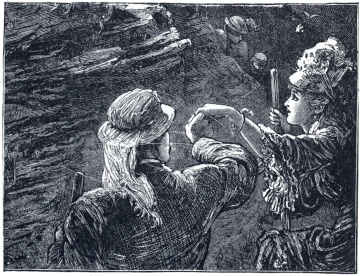
A NON-PROFESSIONAL LADY TOURIST.
It is a most amusing thing to see a woman with this absurd gown,
actually glorying in looking hideous, with her ghastly blue spectacles,
Alpenstock in hand, ride up to a hotel on a mule, and march boldly into
the grand hall, after one of these fraudulent excursions. She speaks of
the topmost peaks as though she had been there; she talks of chasms in
the glaciers, of the risks she ran because the ropes were not exactly
right; she abuses her guide, and says he was the worst she ever had, as
though she had been climbing Alps from the time she left off short
dresses; and when her little stock is run out, she goes to her room, and
reads up her guide-books and such local printed matter as is
attainable, and commences again. She buys Alpine flowers at the market
in the village, and sends them home as gathered on the mountains; she
has all sorts of carved work which she swears she purchased from the
Alpine dwellers who make it (there are factories of these “souvenirs”
all over Switzerland); and she loads herself with all sorts of rubbish,
all of which her people at home will preserve and cherish as carefully
as though the lies she told about it were truths. There are enthusiasts
who make it the business of their lives to explore the Alps, and as they
alone take the risk, they do no harm if they do no good. But the average
amateur climber is about as absurd a being as is permitted to exist, and
inasmuch as there are thousands of them, one may imagine what an offense
they are.
You meet all sorts of queer people in Europe, and as many in Switzerland
as anywhere, unless it be Paris, which is a common sink for all the
world. I met in Geneva a very curious specimen, whose career is worth a
place in history.
He was the son of one of the most wealthy men of New York. His father
had made some millions of dollars in trade and judicious real-estate
investments, and brought up his family as all rich New Yorkers do. The
young man had gone through college, and had graduated by the skin of his
teeth. He had learned much of boating and base ball, and was one of the
best billiard players in his set. Out of college with a lot of knowledge
that he could make no use of, for he had nothing to do in life, he
became a club man in New York, and commenced the pursuit of pleasure. It
was all well enough for a time. Yachting occupied him for two seasons,
horses took his attention for two more. He once, in desperation, made a
trip in a wagon from New York to Montreal, just to put in a Summer, with
three companions, he footing all the bills. Horses palling on his taste,
he entered upon a life of general and miscellaneous dissipation, and
finally that tired him and he was without an aim in life.
He had hunted pleasure and now pleasure was hunting him.
In despair he took to travel, and for five years he rambled from one
capital to another, seeing everything and being bored by everything.
FEELING AN INTEREST IN SOMETHING.
Here he was living at the best hotel, in the best style; he kept a
servant or two, and had oceans of friends, as every man has who has
money, but life to him was a curse. He had nothing to do.
“Why don’t you go up the Alps?” I said to him.
“Bless your innocent soul I have been up the Alps a dozen times. There
isn’t a dangerous place that I haven’t attempted, nor anything that is
regular that I haven’t done. It don’t pay.”
He had seen all the theaters, all the stock places were as familiar to
him as the alphabet, and as for the dissipations he had so tired of them
that he was a saint. He was virtuous from necessity.
One morning I asked him to go with me to inspect a machine shop which
was one of the lions of the place. For sheer want of something else to
do, he put on his coat and went. I was very much interested in some of
the processes which were new to me, but my friend yawned through the
whole of it, in the same ennuied way that was manifest since I knew
him. Finally we came before a machine known in machinery as a shaper. It
was a powerful tool, which went backward and forward, cutting at each
forward movement a thin thread of iron. The work it was doing was
cutting a slot in a shaft of iron. The shaft, before it went into the
shaper, was a round piece of iron. Delancy looked at it with the first
expression of interest I had ever seen in his face.
The man at the machine had nothing to do after the shaft was put into
the “chucks” but to sit and read a novel, the machine doing all the work
with regularity and accuracy.
“Do you forge this shaft originally?” he asked the man.
“Certainly, sir.”
“How long does it take you to cut this slot in it?”
“About four hours.”
“Then why don’t you have the piece of iron forged with this slot made
down to within say a quarter-inch and save nine-tenths of this time?”
“We never did it that way,” was the reply of the man; “it won’t do.”
“But it will do,” said Delancy. “That shaft can be forged, to begin
with, something as it should come out, and it’s a cussed waste of time
to do it in this way.”
The foreman assured him that it could be done in no other way. The
workmen corroborated the foreman, but Delancy was not satisfied.
That evening in his room he had a dictionary of mechanics, and was
intent upon the parts relating to forging. He called my attention to it,
and swore great oaths that the machinists were a set of asses, and that
they hadn’t a process which he could not better.
The next morning he was up at six and had an early breakfast and was at
the shop driving the workmen mad with his persistent inquiries. At
dinner he talked of nothing but machines and machinery, and the evening
he devoted to whittling curiously shaped things out of wood.
Suddenly he disappeared. One morning I went to the shops again, and who
should I see in a greasy suit of overalls, with his gold eye-glasses,
but a man who looked like my friend Delancy, at a lathe.
It was a curious transformation, and about the most incongruous
spectacle I had ever seen. Here was a man with gold eye-glasses, a
diamond ring, thin white hands, patent leather boots, with greasy
overalls. It was an earnest mechanic engrafted upon a Broadway
exquisite.
“Do my eyes deceive me?”
“They do not. It is I, Delancy. Not the old Delancy, but an entirely new
one. I have now something to live for.”
“Why have you quit the hotel?”
“Because I want to associate with my fellows. I am living with them. I
have been admitted as one of them, and they all know me as well as
though I had been born one of them, which I wish to Heaven I had. I can
eat something now, and their beer—well, with a lot of good fellows it
lays all over the champagne I have always paid for. You see I have made
up my mind to demonstrate to these ignoramuses that a piece of iron can
be forged to any shape, with any depression in it desirable, and that
these men at the lathes and shapers waste ninety per cent. of their
time. We have got to have machinery, and we want it cheap. I have
something to live for. I shall be a machinist.”
A USEFUL MAN AT LAST.
The man had actually bribed the master of the works to accept him as an
apprentice, and he had made an exceedingly good one. He was at the works
at the regular hour, and stayed as late as the latest. And he developed
wonderful genius in the way of mechanics, and was in a fair way to
arrive at a high position in the business.
The workmen idolized him. He delighted to go with them evenings to the
cafés they frequented, to be a little king among them; he helped the
sick and unfortunate; he took some interest in their concerns, and they
in turn did everything possible to acquaint him with the practical part
of the trade.
“They are a much better lot,” he said, “than the leeches who used to
hang upon me.”
He invited me to dine with him one day, and the amount of coarse food he
could consume—this man who had not had an appetite for twenty
years—was something wonderful.
For the first time in his life, he declared, he was absolutely happy. He
had something to do.
Before he had been in the shop a week he showed the master how the iron
bar could be forged to the shape required, and how two-thirds of the
time at the machine could be saved, and he succeeded in having his
system introduced.
He vows that he will stick to it till he has learned his trade, then go
home to New York and start the most perfect machine shop on the
continent, and that, moreover, he will be perfectly happy therein. He is
not ennuied any more, for he has found something to do. There are
others who would do well to follow his example.
CHAPTER XXXII.
CHILLON AND OTHER POINTS.
ON a clear bright day, the hot air tempered by a gentle breeze wafted
down from the ice-covered mountains, with others we left Geneva, to
cross the mountains and visit Mont Blanc, that patriarch of the Alps.
The blue waters of Lake Geneva danced and sparkled in the sunlight as
our steamer sped along towards Nyon.
At last we were skimming over the surface of that wonderful body of
water whose peans have for hundreds of years been sung by the poets, in
prose and verse, of all countries. Rosseau, Voltaire, Byron, Goethe have
revelled in the delights of its tranquil beauty and celebrated its
charms in immortal words. And it is indeed a fitting theme for a poet’s
song. To-day its deep blue surface is broken into a myriad of ripples.
Here and there, sailing slowly along, are large barges with the graceful
lateen sails that are seldom seen except upon the Mediterranean. The
shores are lined with rich foliage, the cedar of Lebanon mingling its
sweet odor with that of the chestnut, the walnut and the magnolia, the
whole enlivened with pretty villas and picturesque hamlets.
Though more beautiful, Lake Geneva has a peculiarity that is enjoyed by
Lake Constance. It is subject to a change of level. At places, where the
bed of the lake is narrow, the water occasionally rises several feet
above the ordinary level, and remains so for half an hour or more, this
too without any previous warning of what was about to occur. Another
peculiarity is that hidden springs oftentimes break forth from the bed
of the lake and form a current so swift that it is impossible, almost,
to stem the tide. These springs are very dangerous to oarsmen and are
nearly as badly feared by the fishermen as the waterspouts that
frequently occur.
THE INOPPORTUNE YOUNG MAN.
Here, as everywhere, we had all sorts of people with us. We had a
widower, and a widow with a daughter, and the widower had been making
love to the widow all the way from London, which the widow accepted more
than kindly. Indeed, the attentions of the ancient beau had become so
marked, that to the mind of any widow of experience, it was only a
question of time as to a proposal direct, which she was waiting for
impatiently.

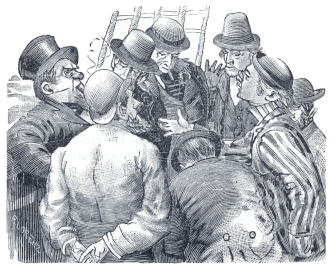
THE YOUNG MAN WITH HIS INOPPORTUNE REMARKS.
Among others on the boat was the Young Man who Knows Everything, who has
studied everything, and who has that rasping memory that enables him to
retain everything he ever read, as well as every thought that ever
passed through his mind, and the self-sufficiency that impels him to
thrust his own talk at you, at no matter how inopportune a time, and no
matter how inapplicable it may be to whatever is being discussed. He
will discuss a question with you to-day, and when in his bed at night he
will remember something that he should have said at the time, and break
in upon you a week after with the omitted remark, with no preface, no
explanation, taking it for granted that any discussion you ever had with
him was of sufficient importance to take full possession of your mind
and occupy it forever and forever. He had had an argument with the
widower the night before at the hotel in Geneva, upon the authority of
the Old Testament, which the widower, as was natural, forgot in an hour.
Our widow and widower were sitting near the stern, in loving proximity,
discussing quietly the loneliness of their situation. The young man was
waiting very close, entirely oblivious of what they were saying, and
only anxious to fire off his charge.
“Ah, Mrs. Redding,” said the widower, “when one has once tasted the
sweets of congenial companionship—”
In broke the young man:
“It was the old dispensation, and is not binding on us to-day at all.
Therefore you needn’t do everything that Moses put upon the Jews; but,
Mr. Thompson, you can just bet your sweet life that you are perfectly
safe in not doing anything that he said the Jews should not do.”
The widower looked daggers, and the widow broadswords. As handsome a
proposal as was ever to be made was nipped in the bud—an opportunity
for the widow was lost which might never be regained. Who could tell?
Possibly his passion might cool off. The fish was hooked but not landed,
and this insufferable argument-monger was the cause of it.
“Blast your Moses,” uttered the irate widower. “Madam, if there is any
part of this boat safe from the intrusion of young men who dabble in
Moses, let us find it.”
And they went off, leaving the young man not at all abashed. He merely
turned to an amused spectator, with the remark:
“That man’s face proves the correctness of the Darwinian theory. In time
his descendants may become men. I was about to enlighten him on an
important subject, but he would not.”
THE IMPECUNIOUS TOURIST.
There never was a boat loaded with tourists which did not have on its
deck the man who was doing Europe on insufficient capital. He spent
money freely in London, Paris nearly finished him, and he commenced
traveling on credit in Switzerland. His method was very simple: he
borrowed a hundred francs of every man he thought simple enough to lend
it to him. It was always the same story, he had drawn on his people at
home and would have the money at the next stopping place but one. Then
he always slipped away from his victim at the next stopping place and
was seen no more. We had him, but he did not succeed. There were too
many old travelers in the party.
Geneva, on a plateau above the level of the lake, with its picturesque
background of rugged mountains, gradually melts into a solid mass of
buildings, bridges and parks as we go up the lake, past the mammoth
hotels, with their beautifully arranged lawns and gardens. On the left,
in an immense pleasure park, is the Rothschild villa, a country seat as
beautiful as the surroundings. For miles the left bank of the lake is
lined with summer residences, nestling among the lovely groves of
fragrant trees.

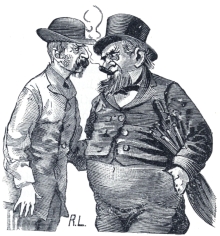
“WOULD YOU OBLIGE ME WITH A HUNDRED FRANCS TILL
SATURDAY?”
On the right bank, a range of hills, starting way up the lake, rises
gradually higher and higher until it culminates, apparently, in Mt.
Blanc, fifty-six miles away. These mountains, rugged and severe, slope
gradually down to the bank of the lake, which is lined with well
cultivated farms.
The lake is a study. Its bright blue waters are as clear as crystal, the
small white pebbles on the bottom being plainly discernable. As the
sharp prow cleaves the water and throws it off on either side, the hue
is changed into a dark green, making a charming contrast with the
unruffled water beyond, which retains its peculiar blue.
Long before Nyon is reached, the white buildings of Geneva have faded
away in a mild rose colored haze, through which the dim outlines of the
mountains can just be seen.
After an hour’s run, full of beauty, Nyon, a favorite resting place for
tourists, is reached, and the steamer stops long enough to take on three
or four mountain climbers, who, with Alpenstocks in hand and knapsacks
on back, are going on a pedestrian expedition on the other side of the
lake.
The sharp pointed roofs of Nyon’s houses, its quaint streets,
pretentious hotels and historic buildings make it a favorite resort all
Summer long.
The faro bankeress was of the party, she and her husband. The husband
looked listlessly into the blue water, and enjoyed the succession of
beautiful views, and studied nature in all its aspects, with a party of
kindred spirits, in the hot cabin below, over a game of euchre, with a
rapid succession of orders for cognac and water. That’s all he saw of
Lake Leman. He played moodily, as though the time taken from his
magnificent game at home was so much wasted. Green cloth was more to him
than emerald water, and he never desired to see an elevation greater
than a roulette ball.
His wife made the acquaintance of, and fastened herself to, a party of
actual tourists, and to them she discoursed volubly of the prices of
silk stockings in Paris, and of dress making and millinery and kindred
topics. There was one young girl who really had the eye of a hawk for
the actually beautiful, who would go into raptures as some wonderfully
beautiful view dawned upon us, and who felt an enthusiasm which she must
share with somebody. And so she would pull the faro bankeress by the
sleeve, and interrupt her flow of talk.
“And then you see these stockings are—”
“Oh, Mrs. ——, do look at that mountain with the cataract rushing down
its side!”
A hasty glance at the wonderful work of nature.
“Oh, yes, my dear—it’s nice. But them stockings. Why, in New York, at
any first-class store—”
And so forth, and so on.
TIBBITS AND THE JEW.
Tibbitts was gorgeously arrayed in a Parisian suit, with trowsers very
wide at the bottom, and cuffs of preposterous length and width. He
discussed all sorts of abstruse questions with grave German professors,
neither understanding a word of what the other was saying, and so he
passed for a very wise young man. More men would be so esteemed if they
would always talk in language which nobody can understand. I remember of
being wonderfully impressed with the profundity of a New England
metaphysical talker, but alas! when his six syllabled words were
translated into common English, I wondered at the stupidity of his
commonplaces.

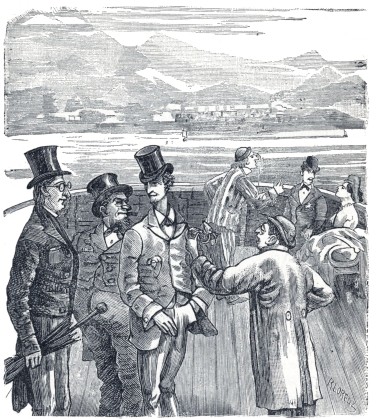
“SEE ME UNMASK THIS JEW.”
But poor Tibbitts was finally conquered. There was a Jew on board who
was selling the “art work” of the country. He spoke all languages, as
the Continental Jews all can. Tibbitts admired a little ivory carving.
“What is the price of it?”
“My tear sir ze work of art vill be given avay for ze redeecoolus sum
oof two huntret francs. It gost me dwice dot.”
Then Tibbitts winked a wink of intelligence to the rest of us, as if he
should say, “See me unmask this Jew.”
“I will give you five francs for it.”
“Fife francs? Fadder Abraham, but you laugh at me! I vill dake—but no,
mine friend, dis ees a bat season—you dake him.”
Then the laugh was not with Tibbitts. The “ivory carving” was the basest
kind of an imitation, and would be dear at a half franc. And Tibbitts
retired sullenly to the cabin below, and all the way up his American
friends amused themselves by asking to see his rare ivory carving.
There is so much that is beautiful on this side that time slips away
without notice, so that when Thonon is reached it scarcely seems
possible that it has taken an hour to make the run across the lake from
Nyon.
At the entrance to Thonon, the channel is very tortuous, and once, near
the landing, you may seek in vain for the entrance or the way out. There
is a little lake all by itself, hemmed in on every side, apparently, by
mountain and forest.
Surrounded by mountains, Thonon nestles at the foot of a
vineyard-covered hill, up the sides of which low houses, with their
queer, overhanging roofs, line narrow, angular streets that seem to be
too steep for any practical use.
High up the side of the hill is a picturesque terrace, with pretty,
vine-clad houses on the site of the old ducal palaces destroyed by the
Bernese in 1536, from which a beautiful view of the lake and surrounding
country is obtained.
At one time this little place was the residence of the Counts and Dukes
of Savoy, it still being the capital of the Savoyard Province of
Chamblais. The vineyards in this neighborhood produce the fine white
wines that are celebrated the world over.
ON THE LAKE.
Touching for a few minutes at Evian, a favorite resort for wealthy
people from the south of France, with its pretty hotels, charming oak
shaded promenades, the boat sped rapidly on toward Auchy, crossing the
lake again. Looking up the lake the mountain ranges, towering high
above, change their form and color with every revolution of the wheel.
Just ahead of us on the right, a great peak, starting abruptly from the
water’s edge, shoots straight up into the air for a thousand or two
feet. All about us are the green covered hills, forming a rare frame for
the picture of the sun-lit lake, dotted here and there with a lateen
sail, and the slowly drifting smoke of a pleasure steamer that skirts
along the shores. At this point a long detour is made around a huge hill
that juts out into the water, completely shutting out the view on the
right. As we passed round it, an exclamation of surprise and wonder
involuntarily burst forth at the sight of the Tête Noire, which lay
before us, with its lofty peaks crowned with eternal snow.
On we go, past pretty little villages, any one of which would be a most
delightful place to spend the Summer; past vineyards, with their
luscious fruit ripening in the sun, until, just above Chillon, we come
to the Castle of Chillon, made famous by Byron.
“Chillon, thy prison is a holy place,
And thy sad floor an altar, for ’twas trod—
Until his very steps have left a trace,
Worn, as if the cold pavement were a sod—
By Bonivard! May none those marks efface,
For they appeal from tyranny to God.”
This ancient castle, built as far back as A.D. 830, stands in a
picturesque position on a barren rock some twenty yards from the shore,
with which it is connected by a wooden bridge. Its history is full of
romance, from the time Louis le Debonnaire incarcerated within its
gloomy walls—from which but the sky, the Alps, and Lake Leman, could be
seen—the Abbot Wala of Corvey, for instigating his sons to rebellion,
down to the reigns of the Counts of Savoy, who used it as a military
prison. The walls of its dingy dungeons are literally covered with names
of persons who have visited them, among others being those of Byron,
Victor Hugo, George Sands, and Eugene Sue.
Here in Republican Switzerland the traces only of monarchy remain, for
which the Swiss should perpetually thank heaven. Everywhere else in
Europe the monster actually lives—here only its ghost survives. It is
here a remembrance to be shuddered at, not a living reality. But they
had it here once. There was a time, and the Castle of Chillon is a
silent testimony to it, when a duke or a king, who claimed to be of
better clay than ordinary mortals, could seize a man and immure him
within its gloomy walls, just as Victoria, by the accident of birth,
Mistress of Britain, may order the arrest of an Irishman who opens his
mouth the wrong way. Kilmainham is the Irish Chillon, and there are
within its walls men whose hair is turning gray, not in a single night,
but turning gray just as surely.
The ancient tyrants who lorded it over Switzerland were not one whit
worse than the tyrants who now lord it over Europe. Royalty is royalty,
the same in all ages, because based upon the same infernal heresy. It is
the absolute rule of a class, backed by organized force.
Switzerland, America and France have repudiated it, and the rest of the
civilized world will. But what oceans of blood must flow before all this
is accomplished.
In order to be a complete and very radical Republican one needs to visit
a few just such places as the Castle of Chillon, that the true
inwardness of monarchy may be realized.
As the castle, so full of historical interest, fades away, the boat
rounds the head of the lake, where the river Rhone pours its gray
glacial waters into the brilliant blue of the lake, making a clearly
defined mark of gray and blue at least a quarter of a mile from the
shore. Then Vernayaz is reached and we disembark for our trip across the
Alps.
As the boat glides up to the dock, the ancient castle, built in the
twelfth century, is pointed out. Its walls and towers are very massive,
and bid fair to stand as long as the city endures. Near the castle is a
chateau, where, at one time, Joseph Bonaparte lived. It is now the
property of the Moravians, and all its former grandeur is sunk in the
abysses of a boys’ school.
Just opposite the town the Jura mountains have entirely changed in
appearance, and are full of strange, fantastic peaks and crags, while
Mt. Blanc, always visible, presents different faces as the boat changes
its course, always, however, grand and fascinating.
RURAL SWITZERLAND.
CHAPTER XXXIII.
FROM GENEVA OVER THE ALPS.
A SHORT drive over one of those wonderfully hard, smooth roads that make
carriage traveling in Switzerland so delightful, and we are at the hotel
at the Gorge du Trient, whence, early in the morning, we are to begin
the ascent of the mountains. The time before dinner is occupied in an
exploration of the wildly picturesque gorge, with its winding
foot-bridge built alongside the cliffs, over yawning chasms, around
jutting bowlders that rise to such a height that the sky seems like a
strip of blue ribbon suspended high above our heads. At the bottom of
the gorge a mountain torrent, springing from some unknown nook way up in
the mountain, comes rushing and tumbling down over the jagged rocks,
foaming and whirling, and dashing its spray high in the air, as it
hurries along to join the Rhone.
The slender bridge, at times hanging apparently without any support over
deep pools of water, seems too fragile to bear the weight of a person,
and one treads lightly, lest the frail structure give way, and he be
precipitated into the unfathomable abyss below. The gorge is about
three-quarters of a mile long, and is wierdly picturesque.
MOUNTAIN CLIMBING.
After dinner, some rash member of the party suggested that we do a
little mountain climbing. Then a wager was immediately laid that no one
had the courage and endurance to go to the summit of a high peak near
by. Of course the challenge was accepted, and the whole party, there
were three ladies and five gentlemen, all started to accomplish the easy
feat. It looked easy. The path zigzagged up the hill, and
was provided with resting places at stated intervals. Nothing could be
more delightful than to skip merrily along, like chamois, clear to the
summit. It was all very well for the first few hundred feet, and we
laughed and vowed that mountain climbing was not such a terrible affair,
after all. But at the first resting place two of the gentlemen and one
of the ladies announced that they were subject to heart disease, and
dare not go any farther. They could do it, but it was a duty they owed
to their families and the world at large not to tempt death.
THE PERSEVERING ONE.
At the next resting place one of the ladies discovered that she had
turned her ankle, and she went back. She danced as briskly as usual,
however, at the hotel that evening.
Another of the gentlemen thought it his duty to assist her down to the
hotel. This left but three, who silently lifted themselves up step by
step to the next resting place. From this the view was something
unutterably grand. The valley sweeping out to the lake, the mountains on
the other side, with the clouds kissing their summits, the fleecy white,
pink-tinged by the setting sun, forming a beautiful contrast to the
forbidding black of the rocks, and the dark green of the mountain
foliage. One of the gentlemen looked up to the dizzy height still before
him, and remarked that he had seen as much grandeur as he could take in
at one time, and down hill he went.
The other and last smiled a contemptuous smile as he disappeared on the
zigzag path, and setting his teeth, turned his footsteps upward. He
reached the summit, and waving a small American flag (which he always
carried about his person), took in the wonderful view, and slowly but
majestically descended.
I will not say which of the eight persevered and made the ascent. It is
a fault, a common fault, in travelers, this boasting of their own
achievements, and because one has a command of type and presses I do not
see why he should use those facilities to record his own performances.
If any one else of the party publishes an account of the excursion I
shall see my name in this connection, but never will I write it.
But I—or rather, that is, the one who did persevere to the summit, was
rewarded with a sight that amply repaid me—or him—for my, or his
labor. There at his feet, bathed in the light of the sinking sun, was
the valley of the Rhone, brilliant with its covering of green, relieved
by the silvery river meandering through its center. To the right,
crossing and cutting off the valley, are the Bernese Alps, their
snow-covered peaks glistening in the sunlight. It was a magnificent
view, giving us a good idea of the glories of nature that were to be
entered upon on the morrow.
When the Gorge du Trient was organized, nature must have been laboring
under an attack of cholera morbus.
At some remote period in the history of the earth there was a solid
mountain, but some glacier, or earthquake, or other irresistible force,
cleft it in twain, and the ever present water, nature’s slow but
exceedingly certain worker, poured into the chasm to finish what the
first rude force commenced.
There is a great plenty of water stored away in these mountains, and it
has been pouring through this rent in the bosom of the earth, wearing
away a few feet here and a few feet there, augmenting in volume as the
space for it increased, until it has become a wild, resistless torrent,
which doesn’t dance, but rushes through the rocks, till after its brief
attack of delirium tremens it loses itself in the Rhone and finally in
Lake Geneva, and becomes as quiet and well-behaved as you could wish.
The scenic artist who painted “The Devil’s Glen” in the Black Crook, had
doubtless visited this gorge. If devils ever came together in
convention, and wanted a place, the horrible wildness of which should be
absolutely satanic, they could find it here.
The rocks on either hand are nearly five hundred feet high, and the
ravine twists and turns in every direction, the sides approaching each
other so nearly at every turn at their summit that the gorge seems to be
but an immense vaulted cavern with an entirely irresponsible torrent of
water gyrating through it.
It drops itself down sheer precipices, in places thirty feet, and
everywhere rushes, it never dances, but rushes with an ugly, wicked,
vindictive rush, a cruel rush, a resistless force, as if it wanted to
catch something in its merciless grasp, and toss it against rocks, grasp
it when it came back, and hurl it down a dizzy fall of cruel, jagged
rocks, and shoot it way up the side of the gorge, on other rocks, and
finally release it when pounded to a jelly, in the river below.
This water is well-behaved enough when it reaches the river, but up here
in the gorge it is the wildest, most cruel, most devilish and wicked
water I ever saw.
Niagara impresses one with its calm, resistless strength, Minnehaha is
beautiful enough to induce one, almost, to go over it, but this torrent
in the gorge has strength only. It is a fiendish, impish body of water.
THE LEGEND OF THE GORGE.
It is not utilized. Its only use is to support a very good hotel, the
venerable party who takes a franc for admission to it, and several shops
devoted to selling “souvenirs” to tourists. These are the only wheels
this water power turns. About one hundred people make a comfortable
living from the gorge, and they no doubt esteem it highly.
Of course the gorge has its legend. Every well regulated gorge in
Switzerland as well as every other country in Europe has a legend, done
in the most atrocious English, and execrably printed, which you can
purchase of the local guide for what is equivalent to ten cents American
money. I doubt not that Switzerland has a legend-factory running
somewhere, which turns them out to order. People go several times, you
see, and they want a new legend every time.
This legend accounts for the formation of the gorge, and I spent an
entire night getting it into understandable English. It runs thus:—
Way back in the dark ages, when the devil was in the habit of coming in
person to transact his business with men—and women—there was no gorge
at all. The mountain was shaped not as it is now, but was a respectable
mountain, with a properly conducted stream dancing down its side. This
stream turned two mills, one owned by a very nice miller, named
Balthazar, and the other by a very wicked miller, named Caspar.
Balthazar had the respect and esteem of his fellow-men, while Caspar was
universally detested. He was a griping, grasping man, who took double
toll, and was as avaricious as a grave-yard. Balthazar, on the other
hand, was beloved by everybody, because he was good; and, because he was
good, he was very poor. Caspar had succeeded in buying up his notes, and
he held a claim on his mill, which he desired to get out of the way, as
he wanted no competition. But Balthazar kept right along, for he had
friends somewhere who advanced money to him, so that he could keep up
the interest and defy the enemy.
Caspar tried every way to get rid of his competitor, but he could not,
and he chafed under it. He dwelt upon it so long that it became a mania
with him. How to crush Balthazar and have the sole privilege of
plundering the people was the thought with him by day and night.
One Spring he bought more of Balthazar’s paper, but, to his chagrin,
Balthazar came around promptly and paid it, the day it was due, and
Caspar found himself foiled again.
And so that night when he was pacing his room and fretting and fuming
about his disappointment, he remarked to himself mentally—a very
dangerous thing in those days—that he would give his soul to be
relieved of this popular rival.
No sooner thought than done. The archdemon appeared in person, and
Caspar did not seem to be surprised.
“Are you in earnest, Herr Caspar?”
“Indeed I am. That man is poison to me. I must get rid of him and his
mill.”
“Very right. You can do it, but you know the terms?”
“Certainly. You remove the mill, you ruin Balthazar, and after a time I
become yours, I sign an article of agreement, writing my name in my own
blood. That’s the regular thing, I believe!”
“You are right, old man, right as a trivet. Sign here.”
And he produced the document which he had with him. It stipulated that
Balthazar’s mill was to be utterly destroyed, and Caspar’s not injured,
and that things should be so fixed that Caspar’s would be the only
respectable water-power possible on the mountain.
As a consideration for this friendly service, Caspar was, after twenty
years of milling with no competition, to yield himself gracefully to the
demon, body and soul.
Caspar whipped off his coat, cut his arm for blood, and signed.
The devil disappeared in a clap of thunder, leaving a perceptible odor
of brimstone in the room, and Caspar went calmly to bed.
The next morning he heard that an immense stream of water had burst out
of the mountain below his mill, and that it had swept poor Balthazar’s
property entirely away—that not a vestige of it was left. He smiled
grimly, doubled the size of his toll-dish, and went about his business.
SOME DOUBTS.
Twenty years later, to the minute, the devil appeared and demanded his
pay. But he did not know Caspar, who had been thinking the matter over
for some two years, and being hale and hearty, had no idea of going at
all, and especially of going where he had rashly ticketed himself. He
had consulted an abbott of rare power in such cases, and the abbott had
shown him how to evade the contract. The writer of the legend does not
state just what this was, but it was sufficient.
Caspar declined to fulfil his contract, and the devil saw he was foiled.
He recognized the superior power of the abbott, but he couldn’t help
himself. He merely lashed his tail around, and smiling sarcastically,
remarked:
“Very good, my fine fellow, you have won the first point in this game,
but I shall proceed to show you that there are things over which the
abbott has no control. Good night.”
He sailed out into the night, Caspar jeering him. He jeered too soon.
For just then there came a horrible darkness, with terrible thunder and
flashes of frightful lightning, and the mountain was rent in twain, and
Caspar’s mill with himself and his live stock all went down into the
chasm, and the Gorge du Trient was made.
Caspar’s body was found in the river below, with ugly marks about the
throat, with the debris of his mill. There was not a splinter left of
anything.
This is the legend. I don’t believe it, for several reasons.
If the devil had sufficient knowledge of the intention of men in advance
to bring with him a contract all drawn up, (which must have cost him
some trouble unless he kept them printed in blank) he would also have
known that Caspar would outwit him in the end.
If he had the power to catch Caspar by destroying his mill by splitting
the mountain, he had the same power before, and was just as sure of the
miller before as after this exhibition of his power.
Going through all this rigmarole of signing and making contracts would
be totally unnecessary. Satan is supposed to be cunning. What sense was
there in laying traps for Caspar when Caspar was doing his level best to
get to him anyhow? Had he let him alone, Caspar would have come to him
of his own accord.
And then splitting a mountain to catch one miller would be something
like firing a columbiad at a cock sparrow. It would be a great waste of
ammunition. He could safely have depended upon Caspar’s own toll-dish.
He may have made the gorge knowing it would be used, as time rolled on,
by guides and hotel-keepers, but the legend of the miller will not do.
However, it is the legend of the place, and so I have to give it. The
only lesson I can draw from it is not a good one. The virtuous Balthazar
lost his property just the same as the wicked Caspar, and as he probably
starved to death immediately, while Caspar had a good time for twenty
years, his virtue counted him nothing, so far as this world goes. I have
found that out, however, in my own experience.
In every country in the world that has rocks, there is some frightfully
high one from which a great many years ago a maiden leaped. Indian
maidens were addicted to this in America, and so were maidens in
Switzerland.
You are compelled to climb to the very top of the mountain on one side
of the gorge to see the place where a maiden threw herself over. The
guide said she was crossed in love by her parents, while our landlord
had it that she was deserted by her lover. Thus you had two stories at
the price of one, and could believe which you chose.
Tibbitts looked calmly down the frightful chasm.
“The maiden leaped from this spot?”
“Yes, sare.”
“How under Heaven did she ever get back!”
“She did not get back.”
“Did she hurt herself?”
“Hurt hairselluf! It ees five huntret veet to ze bottom. How could she
fall five huntret veet and not hurt hairselluf?”
“Five hundred feet! Well, I should say it was rather risky. What did the
old folks do about it?”
He wanted to know all the circumstances, but the information of guides
on such subjects always ends with the blood-curdling tragedy. They know
nothing of what happened after the girl took the fatal plunge.
MARTIGNY.
The road from Vernayaz leads through a number of pretty Swiss villages,
whose peculiarly built stone houses contrast strangely with the
pretentious edifices of the towns and cities we had just left. The one
narrow street through which the carriages passed is filled with queerly
dressed people, to whom the passing of a tourist party is about the only
event that relieves the dull routine of their monotonous lives.

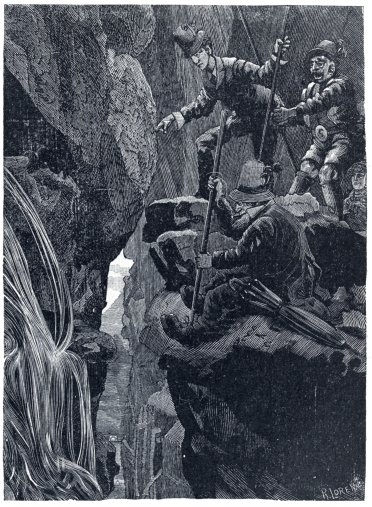
WHERE THE MAIDEN LEAPED FROM.
Near Martigny we pass an old dilapidated castle, that, seven hundred
years ago, was the stronghold of Peter of Savoy, who ruled with an iron
hand the people in the neighboring Cantons.
Now we leave the valley of the Rhone and begin in earnest the ascent of
the mountains.
It is hard to realize that horses and carriage can make their way over
these great towering mountains. Apparently they are inaccessible as the
clouds that float lazily above them. But we bowl along the hard white
road at a rattling pace, and are soon at an elevation from which the
villages in the valley below look like toy towns. The road is a
continuous letter Z, winding up the side of the mountain, each tack
bringing us higher and higher.
The air is clear and dry, so that at each turn in the road a wonderful
view is afforded. Across the valley are seen well cultivated farms, with
men and women hard at work in the harvest fields. Further down is a
grove, the green foliage standing out in bold relief from the golden
fields of grain that surround it, while above towers an old ruined
church, its cold, gray color softened and subdued by the ivy that nearly
covers it.
There is an exhilaration as we mount higher and higher. All thoughts of
worldly cares are thrown to the winds and we revel in the delights of
this new and wonderful experience. We almost envy the Swiss peasant as
he cuts the sweet-smelling grass high up the mountain side. We are
tempted to stop and visit some of these ugly chalets, with their
stone-anchored roofs, which looked like miniature bee-hives from the
valley below. We want to do almost anything to give vent to the
superabundant supply of animal spirits this clear and bracing air
produces.
A WOEFUL LACK.
We were subjected, however, to many grievous disappointments. We
expected the moment we struck the Alps to see the graceful chamois,
leaping from crag to crag, the Alpine hunter, dressed in knee breeches,
with a peaked hat and particolored ribbons wound around his stockings.
We kept sharp lookout for the Swiss maidens with their broad-brimmed
hats and picturesque short dresses, and above all we hungered for a
sight of a Swiss chalet, one of those delightfully beautiful and
picturesque houses, all angles and gables, and things of that nature,
which we all have admired at Long Branch and other watering places in
America.
We saw no chamois, either leaping from crag to crag, or in any other
business. If there are any chamois they manage to keep themselves in
very strict seclusion.

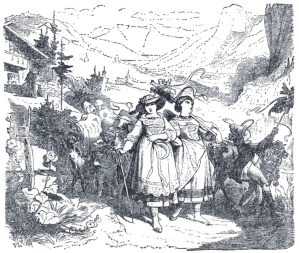
TAKING THE CATTLE TO THE MOUNTAINS.
There being no chamois, it follows, as a matter of course, that there
are no Alpine hunters after them, for the Alpine Swiss don’t go about
posing in picturesque garments for the benefit of tourists. Not he. He
keeps himself busy in his shop, making carvings of wood, which he sells
to the tourists, and he isn’t picturesque either. He wears shocking bad
clothes, just about the same that poor people wear the world over, and
poverty is scarcely ever picturesque.
The smiling Swiss maiden is also a myth. Those we met on the roads were
anything but pretty, anything but smiling, and anything but pleasant to
look at. They were, as a rule, short, dumpy young ladies, with either
bare feet or feet in wooden shoes, carrying enormous loads, their
mothers following them, also carrying a heavy load of grass or wood, and
she and the mother were generally ornamented with immense goitres which
hung down from their necks in particularly disagreeable prominence.
This disease is fearfully prevalent in these mountains, almost every
other woman of age having it. I don’t remember seeing a man with it, nor
a very young woman, but it is almost the rule in some sections, in women
of forty and over.
Physicians do not pretend to cure it, and so it hangs and grows, and the
neck swells and swells, till the goitre becomes an immense bag.
It is a singular dispensation. Why should it be the exclusive property
of women? It doesn’t make much difference how a man looks, and the Swiss
women, worked to death as they are, have little enough beauty at best,
and with all these disadvantages to hang a goitre upon their necks is
burdening them a trifle too much. Still, so much do they love their
mountains, that they would stay among them if their necks should enlarge
to the degree of requiring wheelbarrows to carry them comfortably.
The Swiss chalet is another disappointment. We expected to see the
mountains dotted all over with those beautiful houses, all gables and
dormer windows, picturesquely painted in all sorts of gay colors, such
as we see in the theaters.
Such a house with a pretty peasant girl in short dress, with gay colored
stockings, and a simple but very sweet broad straw hat, and a few dozens
of chamois leaping from crag to crag, would make a very pretty picture
and one worth going a long way to see.
THE SWISS COTTAGE.
As we were disappointed in the chamois and the maidens, so were we in
the Swiss houses. There is everything in them but beauty. They are just
about as beautiful as a western grain elevator or a Quaker
meeting-house. There is enough timber in them—each stick crossing the
other in a most unnecessary way, and there are gables, and dormer
windows and all that, but they are put together in a most unsatisfactory
way, if beauty is what you are after. They are absolutely shapeless. The
roof is burdened with layers of stone to keep it on in the high winds
that prevail, and they are invariably weather-beaten, dingy, and
altogether unsatisfactory.
In one end of these uncouth dwellings the family reside, and the work is
done, and in the other the cattle are stabled, in what in America we use
as a barn. The cattle, the pigs and the poultry are all stabled
convenient, only a thin wall separating them from the women and
children.
It must be confessed that the residence end of the hideous building is
kept very clean, and very nicely, for your Swiss housewife is a good
one, but the proximity to the stock would not be considered pleasant in
any other country. They cannot plead lack of land for thus crowding
together, for these mountains are immense, and very sparsely settled. It
is so arranged probably for convenience.
Inasmuch as the traveler through Switzerland is always disappointed in
the matter of chamois, picturesquely clad and pretty girls and Swiss
chalets, I insist that the government should furnish them. It is a
matter for national action. The government should breed chamois, and
train them to skip from crag to crag, it should maintain a force of
chamois hunters, such as we see in pictures and at the theater, to hunt
them, and it should have pretty girls dressed as we were led to expect
to see them, at regular intervals, even if it should import them from
Paris, and it should build on each Alpine pass at least a dozen chalets
of the regulation style.
Then tourists would be satisfied and invest more liberally in wood
carvings and music boxes, and would be more content with having got the
full worth of their money.
The principal industry on the mountains is cheese, and selling
refreshments to travelers. The travelers stop and drink wine every time
possible, for the purpose of improving their taste in wines, which
affords a very respectable revenue to the inhabitants along the roads.
The cattle in the Spring are driven to the very summits of such of the
mountains as are not tipped with snow, in the little valleys of which a
very sweet grass is found, which makes a cheese almost as good as the
imitations that are produced in various sections of America. The people
live upon a tolerably bad cheese, very bad bread, and still worse wine,
and when one looks at the almost absolute sterility of the soil, the
wonder is how they get enough of that to sustain life.
THE SWISS IN GENERAL.
But they do. It takes very little to sustain a mountain family in this
country. The women don’t wear gaiters with high heels at ten dollars a
pair—wooden shoes, a pair of which lasts for several generations, does
them, if indeed they do not go barefooted, which in the Summer is the
prevailing fashion. Their clothing is substantial, though very coarse,
and if they don’t go to theaters or operas, or have any of the expenses
of a more luxurious civilization, they get on very well, and seem to be
happy. As it is a day’s journey down a mountain to a village where there
is anything to buy, they don’t buy very much; and as their little land
furnishes all they can eat, drink and wear, they are just as rich as
Rothschild, every bit. It isn’t what you want that makes you rich, it is
what you don’t want. The mountain Swiss don’t want anything, and they
have it. Therefore they are rich. Their government doesn’t bother them
with taxes to any extent; they don’t require daily newspapers or
magazines, or anything of that kind, and so they live on the next thing
to nothing a long time, and die at the end of it, when they have just as
much as anybody.
As quiet and stagnant as is the life of a Swiss family, don’t make the
mistake of supposing them to be either unintelligent or stupid. They are
well educated, and in every one of these ugly houses there are books,
and books that are used. They keep themselves posted in everything that
is going on in the world outside, their intelligence being a month or
such a matter behind the rest of the world, but they get it, and they
understand it when they do get it.
A sturdy race they are, and the world knows and appreciates them. There
is scarcely a battle-field in Europe upon which they have not bled, and
though subjected to the stigma of being hirelings and mercenaries, they
have never proved false to the side they hired to. They do not
scrutinize the cause they fight for very closely, unless it be their
own, but when once enlisted they can be depended upon to the death.
Thousands of them are coming to the United States, and I wish every one
of them could be multiplied by a hundred. They make excellent Americans,
and we can’t have too many of them.
CHAPTER XXXIV.
OVER THE ALPS—THE PASS TÊTE NOIRE.
IT is just in the midst of the hay harvest, and men, women and children
are all cutting, raking and carrying from the mountain side to the vale
below.
All this work is done by hand. There can be no such thing as a team on
these mountains—one would as soon think of driving a team up the side
of a wall.
The Swiss woman takes an active part in the duties of the field, and an
immense amount of work she is capable of. While the men are cutting the
grass, she fills a huge sheet with that which has dried, forming a
bundle about eight feet square and two or three feet high. This she
balances upon her head and carries it down the steep mountain side to
their curiously constructed barns, which have the side of the hill for
one end.
Women in this region do the most of the outdoor work, and do every kind.
The Swiss maid or matron isn’t lolling about parlors or spending her
time over her dressing bureau. She plows, or rather digs, for on these
steep mountain sides plowing is an impossibility, for so steep are they
that should the team be plowing transversely the upper horse would fall
and crush his mate on the lower side. They dig up the ground with a
heavy mattock, a tool heavier than I would care to wield, and the women
are just as expert at it as the men. Muscular parties are these Swiss
women, and their lives are anything but easy. In such a country every
one must labor to procure the common necessaries of life—men, women and
children. It is a good thing, however, to have so much that is kindly in
nature as to make a living sure if those wanting the living are willing
to work for it.
MR. TIBBITTS’ IDEA.
Tibbitts observed these stout, sturdy women as they came zig-zagging
down the mountain, carrying these enormous burdens as patiently as mules
and quite as surely. There was a lapse of five minutes, during which
time he never spoke a word, which was something so unusual as to cause
remark.
“I was thinking,” said Tibbitts, “that could polygamy be

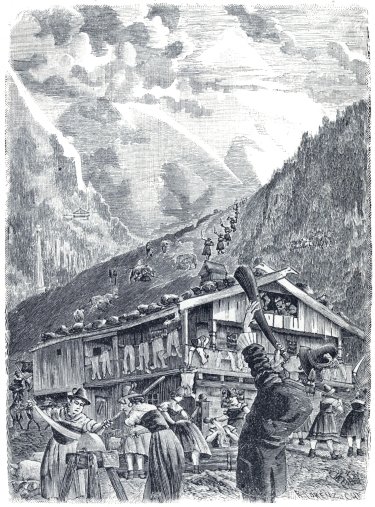
“I SHOULD WAKE THEM UP CHEERILY WITH AN ALPINE HORN.”
WHAT TIBBITTS WOULD DO.
introduced into Switzerland, I should emigrate to this country and
become a William Tell. I should secure a large tract of this land and go
into a general marrying business. I should take to my bosom say fifty of
these maidens—nay I wouldn’t object to widows, not even those with
goitres, for I have noticed that the goitre, no matter how large, does
not interfere with an elderly woman’s capacity for carrying hay down the
mountain. Indeed, a goitre, skillfully managed, may be helpful. For if
arranged so as to hang on the upper side of the woman it would assist
materially in preserving her equilibrium. With fifty of these wives the
labor problem is solved. I should wake them up early in the morning
cheerily with an Alpine horn (after taking one myself), and after the
frugal meal of black bread and cheese, I should have them skip merrily
up the mountains and cut the sweet smelling grass, and rake it and turn
it, like so many Maud Mullers, and tie it up in bundles and carry it
down to the modest chalet, where I would be to see that other wives
stored it safely away for use in the long Alpine Winter.
“I should at once purchase cows, with the dowry of my fifty wives, and
establish a cheese factory, making the fragrant Limberger for the
Germans in America, and the smooth Neuchatel for more delicate
appetites, and all the other varieties. To carry on the business
successfully would take me much to Geneva, and, in pursuit of a better
market, to Paris, where, as the proprietors of the Jardin Mabille are
large consumers of the products of the Swiss dairies, I should be thrown
largely into society that would prevent life from becoming too
monotonous.
“And while I was away, my fifty wives would rise early in the gladsome
morn and labor cheerily, singing the while the simple carols of their
native mountains till dewy eve, and sleep sweetly, gaining strength for
a larger day’s work on the morrow.
“There is some sense in marrying a Swiss woman, for she can do something
toward supporting you. An American woman expects to be supported; she
expects to have luxurious surroundings, and all that sort of thing,
which the man labors for. I like this scheme the best. But,
unfortunately, one is not sufficient to support a man, and, as polygamy
is unlawful, I shall not marry in Switzerland. One could not be made
useful, and when I marry for ornament, I shall require something more
ornamental.”
And Tibbitts relapsed into moody silence, disgusted with life because
the Swiss government would not permit him to marry enough women to
insure him a comfortable living.
At Geneva we took a courier. A courier is a man who professes to speak
seven languages, but in reality speaks one well, generally the German,
and two, English and French, very badly. He is invariably the champion
liar of the universe. There isn’t a lying club on the Pacific coast of
which the humblest and most recent courier would not at once be
unanimously elected perpetual president. He lies, not from necessity
growing out of his situation, but because to him it is a luxury. He
revels in it, and is never so happy in it as when he has accomplished a
gorgeous lie—one of those picturesque lies that the listener is
compelled to accept, though he knows it to be false.
He approaches a lie with the feverish anxiety that always accompanies an
expected pleasure; rapturizes over the performance, and is unhappy till
he can bring forth another. He has been in all countries; he has been in
the service of every notable on earth, from the Shah of Persia down; and
he is with you at the absurd price of forty-five dollars a month only,
because he has to wait a month for a Russian Prince, who would never
take a step without him.
You feel from the beginning that you are under obligations to this
gorgeous being; you are ashamed of yourself when you hand him the
miserable pittance he condescends to accept for his services; and you
would no more think of asking him to account for any moneys put into his
hands than you would of offering a tip to the Queen of England.
The courier is a man who professes to know all the hotels, all the
roads, all the manners and customs, everything of the country through
which you pass; and he takes charge of a party for a stipulated price
per month, pledging himself to use his wonderful gifts entirely for your
benefit.
At the beginning, while you are engaging him, he warns you that to
travel through any country is to expose yourself to swindles, and
extortions and impositions of all kinds, from an exorbitant hotel bill
up the whole gamut to the swindle in works of art—the only protection
against which is a good courier.
“Am I dot man? I vill not say. But ask the Prince Petrowski, the Duke of
Magenta, the Earl of Strathcommon. Dose are my references.”
THE COURIER.
These personages being a long way off, you don’t ask them at all; but
you engage him and flatter yourself that from this time on your pocket
is safe and your comfort is assured.
The courier is your servant for one day, and your master all the rest of
the time he is with you.
The second day he comes to you with a smile.
“I have you feexed goot. Dot rascal landlord knows me, and he vouldn’t
dare try a schwindle mit any barty oof mine.”
“What do you pay for the rooms?”
“Ten francs—only ten francs!”
“But we had better rooms day before yesterday for six!”
“Not in dees blace. Het you pin alone you would hef baid feefteen.”
This was all a lie. The courier is known to all the landlords, and the
landlords allow him a very snug commission on all parties he brings into
their sheep fold to be sheared.
This matter of commission goes into everything you touch. Your courier
will not permit you to purchase anything without him—he places himself
between you and everything, from a picture to a tooth pick. He buys for
you, the goods are sent to your hotel, you give the courier the money to
pay it, which he does, bringing back a receipt for the money which he
has really paid, less the commission, all of which was added to the
price of the goods at the beginning.
In order that you may not escape him in material things, he reduces you
to abject helplessness in things not material. He bears down upon you in
such a way that you comprehend the fact that you can do nothing without
him. For instance, you see a beautiful spring by the roadside; the water
as pure and sweet as water can be, which actually invites you to drink.
Now, should you ask the courier if that is good water, he doubtless
would say yes; but should you spring from the carriage and attempt to
drink without permission, he jumps also and holds you back.
“Dot vater ees boison,” he says. “I vill show you de vater vot you may
trink mit safety.”
Likewise in the matter of wines. At one resting place on the mountains,
Tibbitts was ferocious for a bottle of the delightful white wine you get
everywhere, and called for a bottle without consulting the courier.
Promptly the man countermanded the order.
“Mr. Teebbeets, de vine here ish pat mit de stomach. Ve vell vait till
ve get to de next blace.”
Tibbitts was furious, for he was arid.
“Look here, my friend,” he said, “I am not carrying your stomach around
with me. The one I am endangering I have had a proprietary interest in
for twenty-six years, and if I don’t know its capacity, its powers of
endurance, and all that, I don’t know who does. You take care of your
stomach and let mine alone. Mademoiselle, apportez moi ze—that
is—d—- n it—botteille—bottle—du vin—that is, fetch back that
bottle and be mighty quick about it.”
And a minute later he was pouring it out, and as he swallowed it, he
remarked to himself, “Injure the stomach, indeed! A man who has
swallowed enough sod-corn whisky in Oshkosh to float the Great Eastern,
to be afraid of this thin drink. If it were aquafortis now—”
The courier was mortally offended, and sulked all the afternoon. If
Tibbitts could order a bottle of wine without his permission, he might
possibly buy a Swiss carving in Chamonix when we arrived there, without
consulting him, and then where would be the commission?
After the rest and the wine, and the bad bread and the tolerably bad
cheese, we proceeded on our journey. From that time on it was a
succession of wonderful views, a panorama sometimes beautiful, sometimes
awesome, sometimes soothing, and sometimes frightful. But no matter
which it was, it was never insipid. There was a positive character to
each view, something that you must observe, whether or no, and something
that seen left an impression that many years will not efface.
The Pass Tête Noir is an experience that will last a life time.
A SATISFACTORY FALL.
We made a sharp turn in the road at one point, and a view burst upon us
that was worth a journey across the Atlantic to see. We were hanging
over a chasm full six thousand feet deep—that is, to the first
impediment to a full and satisfactory fall. Should you go down that six
thousand feet you would
strike upon a ledge and bound off a number of thousand feet more before
you finally came to the bottom. Across this yawning gulf was a mountain,
the twin of the one on whose sides we were hanging, covered with
evergreen trees to a certain way up to the top, which was crowned with
the pure white of the eternal snow and ice. There were a thousand
shades of color as the eye commenced at the level we were on and
traveled up to the top, all brought out gloriously by the sunlight of
noon-day.
One of the party took in the whole view and very properly went into a
rapture.
“Is there anything under heaven so magnificent as this combination of
colors!” she exclaimed, holding her breath in an ecstacy.
Then up spoke the faro bankeress as she took it all in at a glance:
“What a dress it would make, could one only have them colors brought out
in silk!”
The scenery, always grand and imposing, changes with every bend in the
road, and always gives a view better than the preceding one. We are now
at an altitude where the fragrant spruce lines the narrow roadway, and
covers the hillside with everlasting green. Way over there, where the
cold gray of the rocks is hidden under a mantle of green, on which the
sun and clouds make ever-changing pictures, is a bright, flashing
stream, dancing and sparkling in the sunlight, as it falls tumultuously
from rock to rock, now losing itself in a chasm hundreds of feet deep,
then springing out again further down, until at length it worries and
frets itself over the crags and cliffs till it reaches the valley, and
flows tranquilly and smoothly along to the lake. It typifies life, with
its early struggles, its constant striving for the rest and quiet that
comes at last.
Now we approach the summit of the mountains. All around, as far as the
eye can reach, is nothing but a series of rough, jagged crags, the peaks
of the irregular range of mountains. Not the forest-covered hills we
have been riding through, but vast piles of everlasting snow, which even
the fierce and angry sun is unable to make any impression upon.
THE TROUBLES OF TIBBITTS.
But we were not permitted to take all the enjoyment possible out of the
wondrous views. There never was a party that did not have a professor in
it, who knows all about everything, and who considers it his mission to
instruct everybody else. Add to this, a courier who knows all the stock
show points, professionally, and life becomes a burden. Some peak would
come to our view higher and grander than any we had encountered. And
then the courier:
“Ladies unt shentlemen, dot ish—”
The Professor, who had charge of Tibbitts:
“Lemuel, particularly note that mountain peak. It is—”
“Of course it is,” said Tibbitts. “What am I here for, anyhow? What did
I sail across the Atlantic, and come to Switzerland for? Why do you and
that other weazened monkey interrupt me when I am contemplating nature,
by calling my attention to it, and asking me to note it? Havn’t I got
eyes? Don’t I know the difference between a Western prairie and an
Alpine peak? And as for the names of the places, havn’t I got a guide
book, and can’t I read? Am I a baby in my A B Abs? Curious you can’t let
a fellow alone.”
The faro bankeress was asleep, she had been for many miles, and her
husband was asking her why they charged a franc for a little bit of ice,
at the last hotel, when the mountains were all covered with it.
The road, which, up to this time, had been comparatively pleasant, now
assumed a more dangerous look to those who have only known wide paved
streets. It winds along the very edge of precipices, where a single balk
would send us all tumbling down three or four thousand feet. At places
it is cut out of the side of the hill, so that on one side there is a
solid wall of rock rising high above our heads, while on the other is a
sheer descent of thousands of feet. As we rattle around the sharp curves
there is an involuntary clutching at the seats, for it seems certain
that the carriage cannot keep the road. But the Swiss voiturier is an
expert driver, and his horses are sure footed, so there is not the
slightest danger, perilous though it may seem.
After a brief rest at the summit, the brakes are put on, one of the
three horses is taken from the front, and down we go on the other side
of the mountain it took us all day to ascend.
If the journey so far was attended with any danger, fancied or real, the
fact was driven out of our minds by the nature of the road we were
descending. It was frightful. From the carriage we could look down into
a valley miles and miles away, and the road was so narrow that the
slightest slip would have sent us into that valley in short order. The
view was grand but the ride was fearful. We were all charmed when we
reached the valley and were enabled to look up at the dizzy heights that
had given us such a scare.
From this on to the hotel at Tête Noir, there was a constant succession
of tunnels, high bridges over deep crevasses, and sharp curves around
jutting crags that almost blocked the road.
At the “half-way house,” as it is called, the view is beautiful; three
or four waterfalls tumbling down the mountain sides, and falling into
the mad stream that goes careering wildly over the rocks and bowlders.
Then another long ride through a rough and barren country, indicating
the approach to the glacier region, and then at a sudden turn in the
road, Mont Blanc looms up high above the great peaks by which it is
surrounded. We speed rapidly over the floor-like road, and at six
o’clock in the evening, after having been on the road since seven in the
morning, we are in Chamonix, the little village at the foot of Mt.
Blanc, that lives entirely on tourists.
Of course the great point of interest is Mt. Blanc, the highest point of
the central chain of the Swiss and Italian High Alps.
There it is—fifteen thousand seven hundred and thirty-one feet high,
covered with a great mass of ice and snow that has been accumulating for
ages.
There stands the patriarch of the Alps, crowned with the centuries, and
still smiling grimly at Time.
It stands alone in its fearful beauty. Of all the European mountains, it
impresses the mind with the power of the forces, the source of which are
hidden to man, and which it is not given to man to comprehend. One feels
his own insignificance as he gazes on this wonderful peak, and, no
matter what his creed, feels a profound reverence for whatever power he
believes created it.
THE DANGERS OF ASCENDING MONT BLANC.
Around it are other peaks that elsewhere would be considered very high,
but compared with this giant they are pigmies. Mt. Blanc is not to be
described. Descriptions and pictures can convey no idea of it. One must
stand under the shadow of that eternal snow, must feel the presence of
the grand old mountain, to fully appreciate it.
From the streets of Chamonix the sides seem to be as smooth as a frozen
pond, as the sun glistens on the ice and snow; but viewed through the
powerful telescope great crags are seen. Wide chasms, no one knows how
deep, yawn on every side. Blank, inaccessible walls shoot straight up in
the air, hundreds of feet. There are impassible glaciers and great
gullies where, centuries ago, a great landslide occurred. All this can
be seen through the telescope, but not till one attempts the ascent can
he realize the nature of Mt. Blanc’s formation. Then he finds his path
beset with dangers he never dreamed of. He sees the glaciers, which by
the glass seemed only rough places, are full of deep crevices hundreds
of feet wide. He hears the rumbling of wild streams of water far down in
the ice, as they swirl and swish round and round in the cavities formed
by the everlasting action of the water against the flinty ice. He comes
upon solid mountains of ice, around or over which it is next to
impossible to go. He finds bridges of ice, where one misstep would
launch him down a crevice, so far that his body could never be
recovered. In short, he finds that Mt. Blanc is only smooth and safe and
pleasant when seen at a distance through a telescope.
CHAPTER XXXV.
GOING UP THE MOUNTAIN.
I CANNOT see why any one should desire to ascend Mt. Blanc. It is a trip
of great danger, is very fatiguing, and, it is said, even when the
summit is reached the view is unsatisfactory, on account of the great
distance from all objects save the jagged peaks of the big mountain. Yet
there are quite a number of ascents made every year.


THE PRESUMED CHAMOIS HUNTER.
ALPINE ASCENTS.
Why? Because the innocents who do it dearly love to start out, the males
with their knee breeches and horrible spiked shoes, and the females with
their hideous dresses, and after the ascent is either made, or not made,
it is a pleasant thing to be photographed in groups in these costumes.
Thousands of these photographs are taken, for home consumption.
Everybody likes to be photographed in the act of doing what they can’t
do. The stupid man who never looks into a book always wants to be taken
with one elbow upon a pile of books, and his fore finger thoughtfully
upon his forehead, as though he were devising a plan for the payment of
the national debt; the young sprout who buys a double-barreled shot-gun,
which is destined never to take animal life, always rushes to be
photographed in complete sporting costume, shot-gun, game-bag, dog and
all; and where was there ever a militia officer who did not want to be
photographed in full uniform, as though he had served with credit
through the great rebellion?
So these Alpine climbers, these Mt. Blanc ascenders, would no more leave
Chamonix without being photographed in costume than they would leave
their letters of credit behind them.
Photography is an unconscious liar. It is as unreliable as history.
Mt. Blanc was first ascended in 1786; then in 1787; again in 1825. Since
then the trip has been made several times, two ladies, even, having gone
to the very summit.
The guides and souvenir dealers in Chamonix are full of stories of the
dangers incurred in making the trip. They say that some forty or fifty
years ago a couple of guides made a misstep, and were hurled down a
chasm. An attempt was made to recover the bodies but without success.
They were never found as a whole. Some thirty or forty years afterward,
portions of their clothing, with a few bones, were found in a glacier,
having been gradually worked from the place they were killed, by the
slow but continual motion of the ice. They didn’t show us the shoes nor
the bones, so we did not feel obliged to believe the story.
Accidents! There have been enough of them to deter any sane man or woman
from attempting the perilous ascent. The scientists who ascend these
dizzy heights, which a goat hardly dares essay, may be excused, for the
real scientist is bound by his profession to risk his life any time to
establish or demolish


THE FATE OF TWO ENGLISHMEN.
THE MER DE GLACE.
a theory, but there can be no excuse for the mere sight seer to attempt
it. Some years ago four English clergymen attempted the ascent. When
near the top, toiling up a precipice of ice, the rope to which they were
attached broke, and two of them slid down the smooth descent to a
precipice, and plunged into a chasm thousands upon thousands of feet
deep, and were never more seen. In these ascents every care must be
used, for every step is only one step from death. A fall of three
thousand feet may be an easy way to die, provided one wants to die, but
people are not, as a rule, anxious for so sudden a parting with things
sublunary. Imagine the feelings of a man in the instant after the rope
breaks and he feels himself nearing the chasm, with nothing on earth to
save him!

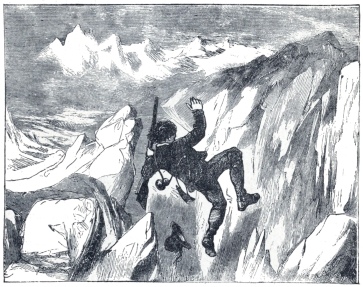
It is now a well established fact that these immense glaciers, between
ten and twenty miles long, and from one to three miles wide, and
oftentimes five hundred feet thick, are continually moving, though of
course very slowly, averaging from one hundred to as high as five
hundred feet per annum. The Mer de Glace, near Chamonix, which is twelve
miles long and nearly a mile wide, is said to have moved a foot a day
during the past year.
This glacier, the Mer de Glace, is one of the most beautiful of the four
hundred that are to be found in the Alps near Mt. Blanc. De Saussure,
the Genevese naturalist, speaking of its surface, said that it
“resembles a sea suddenly frozen, not during a tempest, but when the
wind has subsided, and the waves, although still high, have become
blunted and rounded. These great waves are intersected by transverse
crevasses, the interior of which appears blue, while the ice is white on
the surface.”
The journey from Chamonix to Montavert, where the best view on the “Sea
of Ice” can be had, is very tiresome, and not unattended with danger,
but the sight is well worth the time and trouble. Twelve miles of solid
ice in the most fantastic shapes, “a sea suddenly frozen,” is a sight
never to be forgotten.
A very little mountain climbing goes a great way. We tried it and know
whereof we speak. The courier was to blame for it.
THE GORGE.
Couriers make men do more foolish things than any other agency in the
world. We had been out to visit a gorge some six or seven miles from
Chamonix, and had been delighted with the ravine, with its foaming
stream tearing along way down the valley. We had walked for an hour or
more on a rickety old foot-bridge, hundreds of feet above the bottom of
the gorge, we had crept along wooden galleries fastened to the sides of
the precipices, the tops of which were well-nigh out of

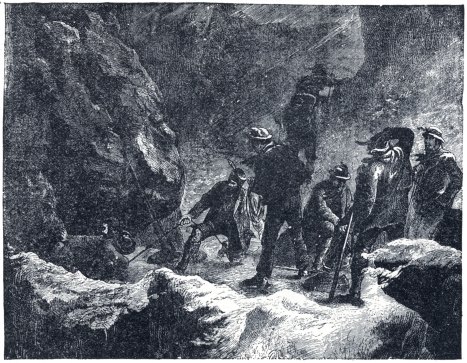
sight, and the bottoms scarcely discernable. Galleries that creaked and
shook, and swayed under our weight, secured to the rocks with rusty
irons, renewed no one knew when, and suggesting at every step the
probability of giving way, and letting you down thousands of feet upon
jagged rocks, and bounding from one to another till your corpse finally
struck water, a torrent as wild and uncontrollable as Niagara. The
gallery did not go down and we had gone to the end and admired the
waterfall, and then on our way back to Chamonix that courier insisted
upon our going up the Glacier des Bossons.
In vain we demurred, and told him we could see the Glacier from the road
quite well enough. He insisted. It was an easy path clear up, and the
view was something marvelous. Our whole visit to Europe would be a
failure if we missed this view.
There was no help for it and we went. The ladies were provided with
mules, while the gentlemen, under the guidance of the courier, struck
out across lots.
For the first quarter of an hour it was all right. There was a good
path, and the hill was not very steep. We crossed a number of little
brooks that had their source in the glaciers above, and emptied into the
Arve in the valley below. The woods through which we passed were huge
pine trees, among which the narrow path wound its tortuous course.
Occasionally there would be a little clearing and then we could get a
glimpse of the valley and the mountains towering high above us.
The higher we ascended the more precipitous became the path. We found
huge bowlders obstructing our way, and soon had to begin climbing in
real earnest, oftentimes using both hands and feet. At length we reached
a narrow ledge that led directly to the little house at the foot of the
glacier, whither we were going. This ledge was like a backbone, with
only a tiny path two or three feet wide. On the right, was a sharp
descent of several hundred feet to the woods through which we passed.
Beyond these woods could be seen bright spots of green and yellow, where
harvesting was in progress. Further down was the Chamonix valley, its
broad acres divided by the silvery Arve, that starts from the Mer de
Glace, and empties into the Rhone, just below Geneva.
THE TRIALS OF THE FAT MAN.
On the left there is a descent of some five or six hundred feet to the
ice crags of the glacier. It requires steady nerves and a sure foot to
walk along this dizzy path, for a stumble or fall would be attended with
fatal results.
And right here was where the infernal persistency of the courier got in
its worst work. One of the party was a gentleman of full habit, who
weighs, perhaps, two hundred and twenty-five pounds, one of that kind
whose head becomes dizzy when at any elevation, who hardly dares to look
out of a third-story window, one of those who have an almost
uncontrollable desire to spring off any elevation they may be so
unfortunate as to be placed upon. He came panting like a second Falstaff
to this narrow ledge, the edge of which was not more than three feet
wide, and the descent on either side was hundreds of feet. It was a
place that nothing but a goat or a born Alpine climber should ever think
of essaying, and here was a fleshy party, with a dizzy head, never
sure-footed in anything but his morals, with an impulse to jump down a
chasm, either to the right or to the left!

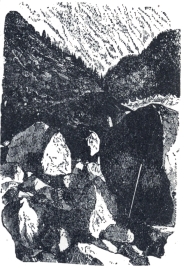
He did not desire to jump, he could not go forward, and to go backward
was just as impossible. He thought of his pleasant home across the
Atlantic, he thought of his wife and family, his creditors, and all who
had an interest in him, and shut his eyes and sat down, clinging
desperately to the few bushes that were within reach.
Another of the party, who had skipped very like a goat over the ridge,
and had gained the porch of the little tavern, saw his danger, and
called the courier. The party were all amused at the predicament of the
fleshy man except the fleshy man himself. To him it was no joke. He was
anchored in the fix described by the colored clergyman. “On de one
side, bredern, is perdition, and on de oder damnation.”

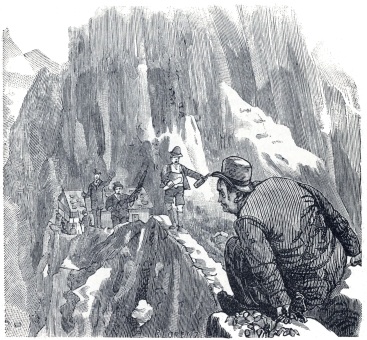
THE DILEMMA—WHICH SIDE TO FALL.
But the courier, good for something, acted promptly. He seized a loaf of
bread and a bottle of wine, and rushed down the path. He bade the victim
of an attempt to do something he couldn’t do, to eat of the loaf and
drink all he could of wine (which he did, especially the latter), shut
his eyes, grab his hand, and run; adding cheerfully:—
“Geep your eysh shut dight—oof yoo opens dem at all yoo are gone—and
run mit me.”
In this way the poor man was brought to the little tavern, where he sat
in gloomy silence while the rest of the party essayed the glacier.
I may add here that he made the descent safely. There is another path, a
mile or two longer, but entirely safe. He didn’t mind the mile or two.
SOMETHING ABOUT GLACIERS.
The Glacier des Bossons, while not so imposing as the Mer de Glace, has
a great many wonderful points. Here at the beginning of this dangerous
ledge is one of the best places to study it. The surface, rough and
jagged, with sharp peaks and crags from three to twenty feet high, is
partially covered with slate, rocks and debris, while beneath this,
bright and sparkling, is the pure, solid ice, with its greenish-blue
tint. Just opposite us, resting on the ice, is an immense bowlder that
must weigh at least twenty tons, while all about are smaller stones,
varying in weight from one hundred pounds to four or five tons. These
immense stones became detached from the mountain, ages ago, by the
continued pressure of the solid ice, expanded by the heat and contracted
again by the cold, and have gradually been carried down the mountain on
the bosom of this imperceptibly moving field of ice.

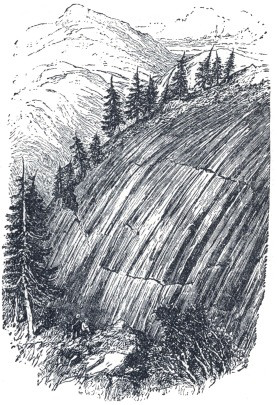
ROCKS POLISHED BY OLD GLACIERS.
The warm sun, which beats down upon us with terrible effect, gradually
melts exposed portions of the snow and ice, and tiny rivulets are seen
trickling along in the crevasses and depressions. They come together at
the foot of the glacier, and, after a fall of about sixty feet, they
wander off down the woods to join the Arve.
As we stand there enjoying the beautiful view down the Chamonix Valley,
the courier breaks in and says it is time to go on. Day dreaming is
over, and, with no kindly feelings toward him, we push on up the steep
and narrow ledge.
At the Pavilion, a little one-story house, we obtained a fine view of
the glacier. We also obtained some fine wine and bread. At this height
the air is so rarified that a little wine is all that one can drink. But
after the long, hard walk through the intense heat, it is very
refreshing, and revives one’s drooping spirits wonderfully.
Leaving the Pavilion, a narrow foot-path, cut out of the side of the
mountain, leads to a long flight of steps, at the bottom of which we
reach the ice. There a long scramble over its slippery surface, to the
entrance of the cavern. Imagine a solid wall of clear, transparent ice.
Into this by means of picks and spades a cave eighty-five yards long,
eight feet wide and seven feet high has been dug. As you go in, the
little lights flickering along the side seem to say, “Who enters here
leaves hope behind.” But we push on through the dripping water at the
entrance, and finally find ourselves walking on ice that is hard and
dry, while the atmosphere is cold enough to make an overcoat
comfortable.
From the end of the cavern the view is like a glimpse of fairyland. Away
down the dimly lighted tunnel, the tiny lights reflected against the
crystalline blue, can be seen the smooth surface of the ice, gradually
growing bluer and bluer until, at the very entrance, where the sunlight
pours down upon it, it becomes nearly transparent, forming a dazzling
frame to the bright picture of the glacier, the forest-covered mountain
and brilliant sky beyond.
MARKING SHEETS AND THINGS.
As we are about to emerge from the cavern the guide shows us a hole in
the side, where we can see, some distance off, a subterranean stream,
that has forced a channel through the ice. Here we can hear most
distinctly the glacier mills in full operation. There is one, very
large, near this spot, said to be sixteen hundred feet deep. It was
formed by the action of huge stones moved by the water against the ice,
making, during the ages the glacier has been in existence, a deep round
well in the ice. This low, rumbling noise we hear is the water rushing
into that well with terrific force, and working the stones against its
sides.
But we are aweary of mountain climbing and glacier exploring, and it is
with a sigh of relief that we retrace our steps, take another glass of
wine at the Pavilion, and, after a short rest, descend the mountain by
an easy path. A short drive, and we are in Chamonix, some of the party
telling marvelous stories of our hair-breadth escapes during our
perilous ascent of Mt. Blanc. Of course they didn’t go up Mt. Blanc, but
the glacier gave them all the experience in mountain climbing they
wanted. It satisfied them just as well as though they had scaled the
great peak.
As a matter of course all these people purchased Alpenstocks, which they
had marked “Mt. Blanc, July 22, 1861,” and were all photographed in
Alpine climbing costume, which the enterprising photographer leases you
for a consideration.
And these photographs went home with the Alpenstocks, and are to-day
being displayed upon center-tables and in albums, while the fraudulent
Alpenstock has the post of honor in libraries.
Also we didn’t see any chamois, nor any chamois hunters, nor any sweet
Swiss maidens in picturesque costumes. Like the fever and ague in the
West, “there ain’t none of it here, but there’s any quantity of it over
in the next county.”
That evening, in the hotel, Tibbitts became indignant. He noticed for
the first time that the sheets and pillow cases on his bed were marked
with the name of the hotel in indelible ink.
“What is this for?” he demanded.
“To keep guests of the house from carrying them off, I suppose.”
“Then the prevailing impression is that everybody in the world is a
thief? The idea is that I, Tibbitts, am going to snake off these sheets
and cram them in my valise and tote them all over the continent, and
finally take them to Oshkosh for my mother’s use!
“It is my opinion, and I say it deliberately, that the vices of one-half
of mankind keep the other half of mankind busy. It is the wickedness of
man that makes courts necessary, and sheriffs and policemen, and all
that sort of thing. But for vice we could dispense with nine-tenths of
the churches and ministry, and we could let up on standing armies. All
the locksmiths and the time wasted upon marking these sheets and pillow
cases could have been devoted to the multiplication of the wealth of the
world. Think of the number of hotels in the world, and the number of
sheets and pillow cases in them, and the quantity of indelible ink and
the time spent in using it, just to keep them from being stolen! The
grand aggregate is appalling. And then add to that all the rest of the
precautions, and mighty expensive they are, that have to be taken to
keep the property you have, and it amounts to the absorption of fully a
half of the industry of the world.
“I have made up my mind what I am going to do. I am going home, and
shall immediately organize societies for the promotion of common
honesty. I shall have to pay for the marking of these sheets and
pillow-cases in my bill to-morrow. In self-defense these societies must
be organized, and this sort of thing done away. Had the time employed in
marking these sheets been used in making cheese, we should not have to
pay such prices for it in America. Vice is an expensive luxury—it eats
two ways; it consumes the time of the vicer, and the time of another man
to watch him. It must be crushed out!”
And Tibbitts went to bed full of projects for the suppression of vice
and for the eventual universality of virtue.
We had at the hotel, of course, the everlasting talker—that man is
ubiquitous, and as frequent as sin. The class was represented with us by
a commission merchant from Milwaukee.
One evening the discussion happened to turn upon the tariff question,
and overflowing its banks, as conversation always does, meandered off
into a variety of channels.
One gentleman asked Jones, the Milwaukee man, why wheat could be
manufactured into flour at Minneapolis, and not at points further East.
THE MILWAUKEE MAN.
And this question set Jones running, and he answered:
“That question is easily answered. I’ll illustrate it. You know Filkins
& Beaver, of Buffalo? No? I have always known ’em—ever since I have
been in the business. I have sold ’em many a thousand bushel of wheat
since I have been in Milwaukee, and many a thousand barrel of flour for
’em when I was in Toronto. Ef there is anything about wheat and flour
that they don’t know, you just want to go and tell ’em, you do, and they
are the whitest men in the business. They have been longer in it than
any two men livin'. They have the immense Eagle mill in Buffalo, and the
Excelsior in Lockport, down on the second dock, the best water-power in
Lockport, and that’s saying a good deal, for the fall there is
immense—it is the water-power that has made Lockport. Take that away
and there wouldn’t be anything of that city at all, and the people there
are enterprising enough to use it, they are. Filkins & Beaver, take all
their mills together, must flour one hundred thousand bushels of wheat a
day, and that’s no small business, and don’t you forget it. It takes
good heads to run such a business, y’ bet yer. They know me mighty well,
I tell ye, for I have done business with ’em for nigh onto thirty years,
and every time I go to Buffalo, and I have to go there once a month, I
have to stop with either one or the other of ’em. They wouldn’t any more
let me go to a hotel than they’d let me sleep on the street.
“Both of ’em came from the same village in England and both went back
and married the girls they were engaged to afore they left, and then
brought ’em to Buffalo, and settled down to work. They worked
themselves, they did, y’ bet yer. First they bought the little Eagle
mill, that hadn’t only two run of stone, and they did the whole work
with their own hands, they made a great deal of money for they were
close operators, and kept the run of the markets, and they enlarged the
Eagle till it kivered all the ground they had, and then they built the
Continental, and that was too small for ’em, and then they went to
Lockport and bought a water-power there, and built the Excelsior, and
another one at Wellsville, and I don’t know where all.”
In glided the Young Man who Knows Everything, as chirpy as possible,
and he broke into Jones’ narration without as much as saying “by your
leave.”
“Jones, there’s no use in trying it. You can’t cover up bad actions with
loud professions. You can’t smother the scent of a skunk by singing ‘Old
Hundred.’ ”
“What in blazes has bad actions and skunks to do with—”
He might as well have talked to an Atlantic gale. The young man ambled
off serenely and attacked another party with the same cheerfulness with
which he assailed Jones, who resumed his narrative:
“As I was saying when that blasted—well, then they bought a propeller,
the old Ada, and they paid for it in cash. They always pay cash for
everything. There ain’t none of their paper afloat, and they have the
prettiest bank balance of any concern in Buffalo.
“I always have a good time with ’em, no matter which I stay with.
Sometimes I go to Filkins’ and sometimes to Beaver’s. Filkins’ wife is a
rather high-falutin sort of a woman, and when Filkins got rich she made
him go and buy a lot on Eagle street—no cheap lot, bet yer—one hundred
feet front, and the Lord knows how deep, and she made him build the best
house on it there is in Buffalo. She has conservatories, and a carriage,
and velvet carpets, pianos, and bath rooms, and silver, and everything
bang up, and when they dine the old man has to sit down in a dress coat,
with a nigger behind him. Oh, it’s nifty, y’ bet yer.
END OF FILKINS & BEAVER.
“But old Beaver he’d never do anything of the kind. He stuck to the
little frame cottage he built for himself down on Swan street, and he
sets down to his dinner in his shirt sleeves, and eats off’n stone ware,
and has no wines like Filkins, and swears he wouldn’t trade his toby of
ale for all the wines that ever were imported. And his wife only keeps
one hired gal, and does the heft of the work about the house herself.
You kin see her any time with her sleeves rolled up and her apern on,
bustlin’ about in jist the same old way, and they have their friends on
Sunday to take pot-luck with ’em, and I ain’t sure after all but that
Beaver is right. He swears he will never build a new house till he has
thirty grand-children, and then only one jist large enough to
accommodate and hold ’em all at one table Christmas day. He laughs at
Filkins with his fine airs, though they are the best friends in the
world. You couldn’t get a word of difference between ’em for any one of
their mills, or for all of ’em together.
“I remember in 1865 I was in Buffalo, and one of their propellers—it
was the Jeannette, I believe—no, it was the Ariel, had just—”
One by one the party had slipped out of the smoking-room at the
beginning of the new chapter of the experience of Filkins & Beaver, the
termination of which no man could foretell. I took advantage of his
raising his glass to his lips to get away myself. I presume he finished
the story to the waiter, for the next day when I casually remarked that
Jones was coming he looked frightened, and quietly slipped out of the
room.
But no one of the party ever learned why wheat could not be
advantageously floured east of Minneapolis.
CHAPTER XXXVI.
IN SWITZERLAND.
THE scenery from Chamonix to Geneva, by the way of Sallanches, St.
Martin, Cluses and Bonneville is magnificent. Leaving Chamonix the road
winds down the beautiful valley with the Glacier des Bossons,
overshadowed by Mont Blanc, on the right, while on the left are the
pretty hamlets and fruitful farms that relieve the barren, rugged
mountains on either side.
The road, which is a marvel of smoothness, as are all the roads in
Switzerland, crosses and recrosses the river Arve, until, after passing
through a long tunnel, hewn through a massive rock, it strikes another
valley and makes a wide sweep around the horseshoe-shaped mountain,
giving a splendid view up and down the valley. Far across this valley is
a long high range of mountains down which at different places great
cataracts of water come tumbling, dashing the spray high in air.
Here we pass through the pretty village of St. Gervais, with its
celebrated baths. Then a long straight drive for an hour or more, and
with an extra crack of the whip the carriage whirls into Sallanches,
where the horses are changed, while the weary, hot and dusty travelers
rest and refresh themselves.
At St. Gervais is one celebrated bathing establishment conducted by an
Englishman and patronized almost entirely by English and Americans, the
principal treatment being for rheumatism and kindred diseases, and
especially for the alcoholic habit. It is claimed that the most
inveterate drunkard can be cured by the use of these waters, and
therefore it is continually full of men who have burned life’s candle at
both ends, and who need rest from their vices, and moral, as well as
physical recuperation.
MR. TIBBITTS’ LETTER.
Tibbitts determined to stay a week and test the efficacy of the waters.
“I shouldn’t need it if I could have the regular Oshkosh sod-corn, but a
foundation of vile English brandy, and the edifice built up and topped
off with French cognac is too much for me. I will test the waters.”
The fact that a half-dozen very wild Americans of his own age and tastes
were at the establishment was really what induced him to stay, but he
repeated over and again, that what he wanted was to stay a while in a
place where rum was impossible. He wanted to get away from it.
We left him, and the next week I received a letter, the following being
an extract therefrom:—
“I did not go over to the Cure at once, for the day you left I met
a young American, troubled as I was, who decided to go with me.
Slosson (he is from St. Louis) and I, having met the proprietor of
the Cure and taken a fancy to him, determined to do him a good
turn, and to that end we would not go to his establishment till we
had got ourselves into a condition that would make a cure
creditable. I am always ready to make sacrifices for those I love.
“We then went over to the establishment to get out of the way of
rum.
“We had been in the house perhaps five minutes, when the proprietor
took us one side and remarked, casually, that while he would not
advise any one in the establishment to drink, if one must, he could
furnish much better liquor than could be had in the village. And it
was injurious to those taking the baths to walk much either before
or after.
“It is a good thing to get out of the way of rum.
“The bar man was an American who could mix a cocktail, and so we
drank to the old flag and went to our dinner. The wine at the place
is excellent.
“After dinner we walked up to the village with an American to whom
I was introduced, and he took us to a very comfortable place where
the cognac was good, very good, and we sampled it several times.
“If there is a place on earth where the alcohol appetite can be
cured it is here.
“On the way down the main street of the village we stopped in
another place like the first one, for the purpose of seeing whether
there was any difference in cognac.
“There are superior facilities for getting away from rum at this
place.
“There is a museum in the village which has a smoking room
attached, which we visited that evening. The cognac was better than
at the first place.
“To have the vile stuff out of reach is a great help to the
struggling victim of strong drink.
“What we would call a drug store in America was the next place we
visited, to have some prescriptions filled, and the proprietor, an
Englishman, insisted upon our tasting some very old brandy he kept
for medicinal purposes.
“There is no place in the world where you are so safe from the
destroyer as here.
REFORM AT ST. GERVAIS.
“Returning to the Cure we thought it unfair not to patronize it. We
did—twice.
“St. Gervais offers inducements for those really trying to reform.
“We went to our room and sat down to a quiet game of poker. It was
suggested that it would be dry work, and a bottle of cognac was
ordered, and if I remember, there wasn’t enough left to make a
cocktail for a flea. The very smell was gone.
“For absolute absence of temptation to drink, St. Gervais is the
place. I will write you concerning the water when I have tasted
some.
“P. S.—I forgot to mention that another thing you come here for is
to get regular sleep, and plenty of it, in the early part of the
night. Having resolved upon this, we played poker till three in the
morning.
“If you have a friend who desires to reform, by all means advise
him to come to St. Gervais. There is no such place on the continent
for reform. A man in the next room, with acute inflammatory
rheumatism, actually complained of us this morning. He said he
couldn’t sleep with us near him. We sent word to him that there
were other hotels, but that we couldn’t peril our chances of reform
by moving. We were determined to persevere till we had made new men
of ourselves. We were very positive, and would not move.
“We could hear the rheumatic gentleman swear, through the wall, but
we sat there reforming all the same, and smiling at his
irascibility. Why will such men come to places intended as
reformatories? What is a man with rheumatism, inflammatory or
otherwise, to five men trying to mend their ways? I think we played
an hour longer than we would, for the pleasure of hearing him
profane.
“St. Gervais is a good place to come to to get away from rum, but
it is of no account for rheumatism. This man thought so, for he
left the house in the morning. I will write you about the baths
to-morrow. I have no doubt they are good. It is said they do away
with the rum appetite.”
From Sallanches the road is through a most beautiful country. As we
approach St. Martin the carriage is stopped, so that we can have one
last look at the dazzling peaks of Mt. Blanc. They are at the very head
of the valley, and although twelve miles away, in a straight line, they
loom up so magnificently that they seem only a short distance from where
we stand. It is a sight never to be forgotten.
The valley now assumes a more barren appearance, with but little to
interest one. An occasional waterfall, a handsome hedge or two, relieves
the dull monotony of the ride, till Bonneville, a picturesque town, the
capital of the province, is reached. There we have dinner, and then on
towards Geneva, passing the two ruined towers of the ancient castle of
Fancingny, after which the province was named. Crossing the long
substantial bridge of the Foron river, we come to Annemasse, and then
rush through a number of pretty little villages, reaching the suburbs of
Geneva, and, after having been on the road since seven o’clock, finally
draw up at the hotel on the lake, a thoroughly tired, hot and dusty
party.

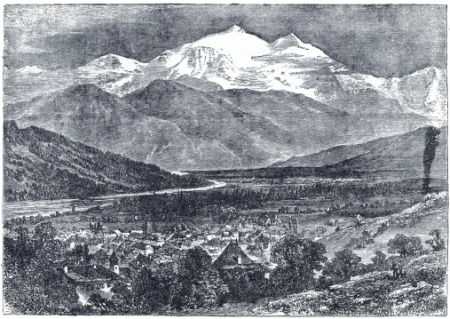
MONT BLANC AND THE VALLEY OF CHAMONIX FROM SALLANCHES.
THE SWISS SYSTEM OF BEGGING.
This is the especial part of Switzerland where beggary is reduced to a
science. Your carriage is going at a very rapid rate, but in advance you
notice one of those ugly Swiss cottages. The mother is in the door,
holding well in hand four children, ranging in age from five to ten,
boys and girls. As you get opposite the door, she looses her hold upon
them, and then commences the chase. These children, trained as they are,
can keep up with a carriage at a seven-mile an-hour pace, and,
bare-headed and bare-footed, they do it, two on each side. They make no
appeal; they say nothing, either by word or look; they simply run by the
side of the carriage, as though it were a race intended as a test of the
endurance of Swiss children against Swiss horses. After ten minutes of
this, you begin to feel some concern for the children, and you ask the
courier what they want.
“Vat dey vant? Oof you vants to kit rid mit dem, fling ’em some sous.
Dey vill run into Zhenave oof you ton’t.”
And so, merely to get them out of your sight, knowing that they dare not
go home to their mother without something, a shower of sous fall in the
dust, which the children gather, and return to the cottage to wait for
the next coach. Sometimes they catch one on the return trip, which is
good luck.
It is the most systematic begging I have yet encountered. The strong
point in it is the not asking. There is no professional whine, no story;
nothing but a sturdy assault upon your sympathies. They make the legs
take the place of the tongue. It is very well done, and, as carriages
loaded with tourists pass every half hour, it must pay well. I presume
the rent of these cottages is fixed with reference to their facilities
for begging. An advertisement of one of them reads as follows, I
suppose:
For Rent—An eligible begging station, on the route from Chamonix
to Geneva. Regular diligence route, and the favorite route for
carriages of rich English and Americans. There are no hills near,
the course in each direction is level for miles, permitting
children to run a long distance without exhaustion. Especially
recommended for very young children. Half hour after dining
station, which ensures good nature on the part of passengers. The
most certain and profitable location on the route. Owner will take
a percentage of the collections for rent, or will rent for a
certainty.
The journey by cars from Geneva to Interlaken is delightful. The road
follows the left bank of Lake Geneva until Lausanne is reached. Now and
then a break in the woods gives a glimpse of the blue waters of the
lake, with the mountains beyond, then a long, dark tunnel shuts off
every view, but only for a few minutes. Then we enter a country that is
magnificent in its quiet beauty. The hillsides are cultivated to the
summit. Rich vineyards with their luscious grapes fast ripening in the
sun, fine farms with the variegated fields hide from sight the cold gray
stone that makes the Chamonix valley so desolate.
After passing Lausanne, Lake Leman is left behind and we go nearly due
north to Friburg, a beautiful town situated on a rocky eminence and
nearly surrounded by the River Sarine.
Friburg, like every Swiss city, has its organ and legend. The organ is
one of the finest of Europe, and is played every afternoon and evening,
provided the admissions amount to twenty francs. If there is not the
vast amount of four dollars in the house the curtain does not go up, or
rather, there is no performance. However, there are generally enough
tourists present to justify the performance, and the listener is well
rewarded for the expenditure of time.
In front of the council house is an immense lime tree, partly supported
by stone pillars. It has its legend. It is said that a young man of
Friburg—a participant in the great victory of Morat, in the year 1476,
was sent after the battle to convey the glad news to his townsmen. He
arrived, breathless and exhausted, so much so that he had just strength
left to gasp the word “Victory!” and expired. There was in his lifeless
hand a lime twig which the citizens planted, and it grew to be the
patriarch of trees it now is, and it is guarded with as much care as
though the legend were actually true.
How many in our late war ran from battle-fields, who might have had lime
twigs in their hands if they had waited long enough to get them. But
they did not. They were in too great a hurry to reach Canada, from which
they will all (1882) return to claim pensions under the arrearages of
pensions act.
BERNE AND BEARS.
It would have been well for the country if all of this class had
imitated the example of the young man of Friburg, and expired. The
citizens could well have afforded the time to plant the twigs in their
hands.
Only a short stop is made here, and then to Berne, one of the most
interesting cities in Switzerland.
Berne is the city of bears, and were it located in Wisconsin would be
called Bearville. A bear was its origin. Berthold DeZahringen, some
centuries ago, killed a tremendous bear on the ground now occupied by
the pretty city, and founded a town in commemoration of the event, and
so the bear became as common in Berne as the lion is in England, or the
eagle in America. There is bear everywhere. The public decorations are
in the form of bears, the flags have bears on them, the bread is stamped
with bears, the pot you drink your beer out of is in form a bear; the
children’s toys are all bears, and the city keeps two bear-pits, in
which a dozen, more or less, fine specimens are kept. Not many years ago
an English officer, who, with his lately wedded bride, were doing
Switzerland, fell into one of these pits, and after a desperate struggle
with the ferocious brutes, was literally torn to pieces in the sight of
his agonized wife. I could not learn who it was the heart-broken wife
married the next year, or whether she married well or not.
It is a quaint and curious old city, and well worth a day or two. The
situation is particularly beautiful, and as it has preserved the
peculiar characteristics of the long ago, it is an instructive place.
In the older section the streets have no sidewalks, the ground floors
being made into arcades, with the houses above supported upon arches,
under which you walk. It is always well for an American to visit the
older portions of these cities, that he may more fervently thank heaven
that his lot was cast in a new country, where there is no ancient and
inconvenient rubbish to worry him. There is more of convenience in any
one modern American house than there is in all of the old part Berne,
or, for that matter, of any ancient city. They do well to look at, but
that is all the use they should be put to. I have a profound sympathy
for the people condemned to live in them.
Berne is the capital of the little Republic, and here its Congress
meets. Its sessions last a month, as a rule, and then Congress
adjourns, and the members go home. The country is too poor to have much
to steal, and consequently a short session is sufficient.
I was shaved in Berne, and, speaking of shaving and barbers generally, I
want to say all I have to say on that subject at once.
There is no barber like the American barber, and no such comfort
anywhere in barbers as we enjoy at home. Tourists have complained of the
straight chairs, the dull razors, and all that sort of thing, and with
some reason, though it is not as bad as represented. I have never known
of any one being absolutely killed by an European barber, either at
sight or sixty days.
It is true that you do not have the luxurious reclining chair, nor the
soothing manipulations of a deft artist, nor the delightful hair
dressing, and all that. In England you are seated in a common,
straight-backed chair, a napkin is adjusted closely about your neck, a
dab of soap, three strokes of a bad razor, and you are permitted to
staunch the blood and wash off the soap yourself. If you desire your
hair dressed, as a very clumsy brushing is called, it is “tuppence
extra.”
In France the operation is the same, only the barber, being always a
statesman, talks you to the verge of madness. He knows that you do not
understand a word of his language, but he talks on cheerfully just the
same, till he is through, and really believes he has entertained you.
The German barber does not talk you to death, for he is by nature
phlegmatic. He stays by you longer, however, and leaves less of your
face to carry away than either the English or French torturer. He wants
to earn his money, and he does.
The Swiss is less airy than the Frenchman, and more active than the
German, for, very likely, he is of both nationalities. He is more
careful, likewise. When his razor enters the flesh, he does not slice
the whole side of the face off, for his time is not occupied with talk,
as is the Frenchman, nor is he so heavy as the German. No, indeed! When
he sees that his razor has cut through the skin, and is entering the
flesh, he stops right there, and calls your attention to the fact that
he has stopped, and claims some credit for not carving off a half pound
or more.
BARBERS.
French, German, and Swiss allow you to wash your own face, and comb your
own hair, and otherwise fix yourself, but the Swiss is the best of the
three.
But even in Switzerland, it is better for the tourist if he has his own
shaving material, and does it himself. He may cut and scar himself, but
he will have some skin left, and may console himself that the cutting
was the result of his own lack of skill, and not that of another.

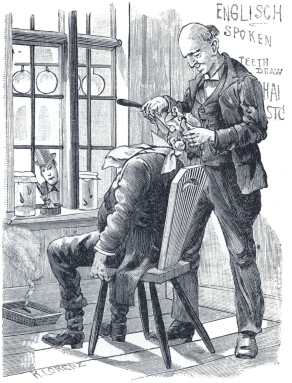
THE CONSCIENTIOUS BARBER.
The continental barber has much to learn in the matter of shaving. The
English barbers say they would like to adopt the American system, but
their English customers will not. I understand it. Their fathers were
scarified, and why should they not be? It would be un-English to change.
And so they go on with the same straight-backed chairs, the same clumsy
contrivances, and they will so go on, till the end of time. The last
Englishman will be so shaved, when he might have had comfort and luxury
all his life.
CHAPTER XXXVII.
LAKE THUN AND BEYOND.
FROM Berne to Thun the scenery is less bold and rugged, although the
horizon is always filled with great peaks that are to be seen from every
quarter.
At Thun we take steamer across Lake Thun, one of the most beautiful of
all the Swiss lakes. It is not so large as Lake Geneva, and is not
fringed with such enormous mountain chains, but it abounds with
unexpected views of rare beauty, resembling very much our own
picturesque Lake George.
As the steamer skirts the north bank of the lake, which is a succession
of vineyards, we suddenly come upon a magnificent view of the Jungfrau,
almost as impressive as Mt. Blanc. From that time on the great range
gradually unfolds itself like the views of a panorama, until at length
we have all the highest peaks in full sight.
At Därlingen we leave the steamer, and, after a short wait, see a
peculiar looking train dash through the tunnel, at the head of the lake,
and then come puffing noisily into the station. This is the celebrated
Bödeli railway, the second shortest in the world. It runs from Därlingen
to Interlaken, a distance of a mile and a half. Its cars are especially
adapted to sight seeing, being constructed in two stories, so that every
one can have an outside seat, to fully enjoy the picturesque scenery
between the two stations.
INTERLAKEN.
The one main street of Interlaken is chiefly devoted to hotels,
especially the upper portion of it, for from this location one has the
best view of the celebrated Jungfrau, that stands head and shoulders
above the high Silberhorn on the right and the Schneehorn on the left.
Further down, the street is occupied with tempting stores filled with
Swiss wood carvings. From this time on nothing can be seen but wood
carving, save perhaps an occasional bit of chamois horn.
It is a quaint old town, full of odd nooks and corners, that would
afford interesting study for weeks at a time. While there are no
particular attractions, Interlaken is a favorite resort of tourists, and
is always full of strangers, who enjoy the mild, equable climate and
find pleasure in resting.

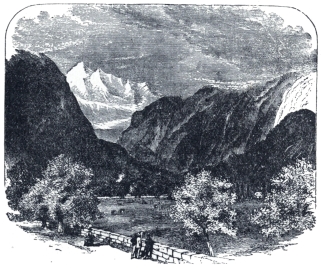
THE JUNGFRAU, FROM INTERLAKEN.
The broad walnut-lined Höheweg, a beautiful avenue, leads down across an
old-fashioned, massive stone bridge to a street set aside for markets.
Here, during the forenoon, is a miniature Petticoat Lane, only the
people are all clean, picturesquely dressed and decent. There are no rum
shops, reeking with the vile odors of stale liquors and still staler
tobacco smoke; there are no intoxicated men and women. Everything is
quiet, orderly and well conducted. But the variety of articles offered
for sale is something astonishing. Here an enterprising woman, as stiff
and formal as the high white cap she wears, has a small stock of dry
goods spread out on the pavement for the inspection of the
picturesquely dressed peasants, who trade their milk and farm products
for clothing material. A little further on you will find a complete
assortment of boots and shoes, of all kinds and conditions. There a man
has a hat store and a junk shop combined. At any place, almost, you can
buy specimens of Swiss skill in carving. These stores or exchanges are
all on the street, along which it is difficult to thread one’s way, so
crowded is it with buyers and sellers.
These narrow, crooked streets are lined with houses built the Lord only
knows how long ago. The long beams that cross each other in the front of
the houses are carved and cut in every conceivable shape. Sometimes the
artist was a little ambitious and attempted very elaborate work, not
always successfully, however, for the heads and figures that adorn the
fronts of some of them are grotesque to a degree.
Interlaken is the starting point for most of the mountaineering parties
that visit the Bernese Oberland, the chief point of interest centering
about the Jungfrau, which is forty-one hundred and sixty-seven feet
high. The ascent of this mountain, which, though very fatiguing, is not
dangerous, was first made in 1811, and between that time and 1856 it was
only accomplished five times. Since the latter date, however, it has
been made very frequently. We did not attempt to explore the icy
regions, so far above the clouds, being perfectly content with our
experience at Mont Blanc.
Interlaken is the great distributing point for the vast quantities of
carved goods made in this vicinity. There are a number of large
factories in the city, but the greater part of the work is done in the
little towns near there. The displays made in the large stores are
wonderful, some of the pieces being the work of genius. While every
possible subject is treated, the carvers have a passion for bears, the
heraldic emblem of some of the Cantons. You will see bears of every
conceivable size, and in every attitude. Whole parties of them, playing
billiards or cards, or dancing a quadrille; bears standing, sitting,
lying down; bears everywhere and doing everything. Some of this work is
wonderfully well done, the lines and spaces being so delicately cut that
it seems as though a breath would break them.
WOOD CARVING.
On the way from Interlaken to Brienz we passed through little villages,
whose one street is filled with wood carving establishments, and almost
every house between the two places has a small factory for the
manufacture of these pretty trifles.
At Brienz we went through a very large factory and saw the patient Swiss
chipping away tirelessly at the huge piece of wood that was soon to be
a medallion portrait. It is an art that requires great skill and
delicacy of touch to produce fine work. In this factory there were some
four hundred or five hundred men employed, and the work they turned out
was marvelously beautiful. In fact one cannot sufficiently admire the
wood carving of the region. The patient workers do everything artistic
in the material, and it is artistic. Landscapes, portraits, hunting
scenes, animals, angels, scriptural subjects, everything that is done on
canvas or in marble, is done in wood, and many of the pieces are
purchased by crowned heads, and at a very high price.
THE ROMANCE OF THE WOOD CARVER.
The artists in wood are, however, very poorly paid, even for
Switzerland. In America their wages would be considered as close to
starvation as possible, without touching it. Think of a man capable of
doing the most artistic work laboring at four francs a day, or eighty
cents! This is as high as any, except an occasional phenomenal genius,
gets, and they appear to be content with it. For this miserable sum they
work so long as they can see, commencing at daylight and ending at dark.
True, living is very cheap, and such as it is it ought to be. The
wretched beer of the region is only about a cent a glass, and the black
bread of the country costs next to nothing, and so the artist works all
day and at night sits himself in his little café, and with his cheap
wine and cheaper beer, plays cards contentedly, and enjoys himself
thoroughly.
After all he is as well as though he got ten dollars a day. He couldn’t
drink any more wine than he does, and neither would additional pay
enlarge his capacity for black bread, and what does he want of anything
more? It isn’t what you want—it’s what you don’t want that makes you
rich. Even in little wood carving Brienz, romance gets in.
We saw on the street, there is only one in Brienz, a young man whose
demoralized clothing, fiery eyes and unsteady steps, all bore evidence
to the terrible fact of dissipation. He was the first drunken man of the
genus loafer we had struck in Switzerland. The Young Man who Knows
Everything looked at him and promptly remarked:—
“That young man has wisdom. He is cultivating a vice. When he wants to
economize he has a basis for economy. Suppose he had always lived a
perfectly correct life, and some emergency should come to him that
demanded economy, what would he have to economize on? Every man should
so live that he can, if he must, better himself. I admire that young
man, for he leaves himself room for development.”
The landlord gave us his history. The young man was ruined by
prosperity. He was an industrious and very skillful carver, and had
attained sixty cents a day with an immediate prospect of a raise of
twenty cents, which is the summit of a legitimate Brienz ambition.
He was engaged to be married to the daughter of a poor Swiss farmer, who
had three cows and a goat or two, and there was no reason under heaven
why he should not have been happy. He had health, strength, skill;
Josepha was beautiful, and there was nothing to prevent his marrying
her, and settling down quietly to watch the development of her goitre,
and passing a long and happy life.
But evil was hanging over them. An uncle of Rudolph’s, who was a cook in
Paris, died without issue, and left his entire estate, sixty-eight
dollars and fifty cents, to his nephew, our Rudolph, in Brienz.
Immediately Rudolph grew cold towards Josepha. He did not meet her on
the little bridge after his work; he did not take her to fairs where the
two drank beer lovingly out of the same mug; he did not always have some
little present for her; in short, he avoided her. To use the strong
though not elegant English of the wild and untamed West, he “shook” her.

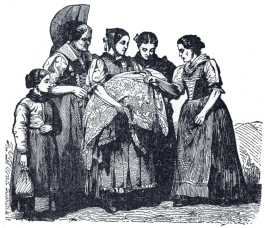
FEMALE COSTUMES IN APPENZELL.
Josepha noticed this change, and wept in her enforced solitude. With
true womanly instinct she felt what was coming. There was now an
inseparable bar between them. Could she, a plain country girl, with no
dowry to speak of, hope to wed a man with a fortune of sixty-eight
dollars and fifty cents?
And so she wept her lost love, her first love, which never comes again.
One may love twice, but the second love has not the twang, the flavor,
as it were, of the first. It is the difference of a meal on an empty
stomach and the tail end of a feast.
They met and Josepha made one appeal to him. He answered her briefly,
brutally:
JOSEPHA’S WOE.
“I did love you, Josepha,” he said, “and could love you again, were it
possible. But you must remember, my girl, that circumstances have
changed; I am a man of fortune—you are the daughter of a poor farmer
with but three cows, and those to be divided among ten children. And the
price of cheese is sadly going down, and must still go down, owing to
the competition of the factory system in America, where they can imitate
even our most penetrating Limburger, and sell it cheaper here than we
can produce it. It is no use to talk of buying our own product, all
people buy where they can buy the cheapest. That is political economy.
“Had you an uncle, a cook in Paris, and liable to die, with sixty-eight
dollars and fifty cents, the aspect of things would be changed. But you
have no such uncle, and really, Josepha, you cannot expect me, in my
altered condition, to so throw myself away. No indeed. But I wish you
well. Forget me, if you can, and marry some one in your own sphere, and
be happy. You would not want to wed me, and see me miserable! Life would
then be a burden to both. Be ye not unequally yoked.”
Josepha, weeping, turned away, for despite her love, she realized the
truth of what he said. And Rudolph, whistling an air, gaily went into
the café, and sought to drown his feelings in wine.
He knew he had done a very mean thing, but he felt it to be impossible
for a youth of his prospects to marry a penniless girl.
Reveling in his wealth he pursued his mad career and came to grief, as
such men always do. He quit work, he dressed extravagantly, and finally
he made an unlucky investment in stocks, which swept off every sou he
had. His sixty-eight dollars and fifty cents were irrevocably gone, and
Rudolph the Gay found himself without money, with an expensive appetite
for wine and an extreme disposition to do no work of any kind.
One morning he heard a wild rumor that a brother of Josepha in America
had made a strike in oil and had sent Josepha five hundred dollars. Then
his feelings toward that young lady changed. He went to her and remarked
that he forgave her for her treatment of him; that the cloud that had
come between them and obscured their happiness had passed away, and
that there was no reason now why they should not realize the dreams of
their youth and wed.
It was now Josepha’s turn. She remarked that sentiment was all well
enough, but that there was something in viewing matters from a mere
worldly standpoint. Love was sweet, but fortunately the stock of the
article in the world was not limited. It was not to be expected in her
altered condition that she should unite her fortunes with those of a
penniless man. She quite agreed with what he (Rudolph) had said to her
on a former occasion, “Be ye not unequally yoked.” She (Josepha) had now
five hundred dollars. He (Rudolph) had not a sou. Had he (Rudolph) five
hundred dollars, and had he the good habits of his youth when he was an
humble worker in wood, she would wed him gladly, but as he (Rudolph)
was, in the language of the world, short of that amount, and as she
(Josepha) had any quantity of coin, she rather thought she wouldn’t. She
should always regard him in the light of a friend, and should weep with
great regularity when she thought of their severed loves, but there was
a young farmer up the mountain who had twelve cows, and with her capital
could double the stock, and she believed that her best show was with
him.
And so Rudolph, penniless, loveless, and with an appetite which, like
jealousy, makes the meat it feeds on, is a mere cumberer on the earth
about Brienz, the wreck we saw.
And Josepha, she married the young grazier, and has two children and one
of the largest goitres in the neighborhood, and the two have prospered
to the point of seriously contemplating the starting of a small inn,
near a convenient waterfall, that they may fleece strangers, which is a
more lucrative business in Switzerland than cheese-making or
wood-carving.
In the evening we were rowed across the Lake of Brienz to the Giessbach,
the regular sight of the locality. The lake is twenty feet higher than
Lake Thun, from which it is separated by a narrow strip of low land only
two miles wide. It is thought that at one time the two lakes were
joined. Lake Brienz is from five hundred to nine hundred feet deep, its
water being of a very dark blue.
THE GIESSBACH.
The Giessbach consists of seven falls, the highest being one thousand
one hundred and forty-seven feet above the lake. The water comes from a
lake in the summit of the mountain, and tumbles from rock to rock till
it finds its level in the lake below. All the seven are visible at once,
and the sight is one of the most delightful in all Switzerland. Opposite
the falls, on the other side of the enormous chasm, is a magnificent
hotel, as a matter of course, where you are charged very reasonably—not
more than twice what the same accommodations would cost you in a
first-class hotel anywhere else. For this reasonableness you try to feel
very thankful. One has to see the Giessbach, anyhow; and, as there is
but one place to stop, the proprietor’s facilities for swindling are
unlimited. A mere double charge may be classed as reasonable, there;
especially as the sight is worth almost any expenditure.
It was nearly dark when we reached the Geissbach shore, so that we had
but an imperfect view of the lovely falls, as we climbed up the steep
path leading to the terrace, three hundred and nine feet above the lake.
But even in the half twilight they were wondrously beautiful, as they
dashed from rock to rock, hundreds of feet apart.

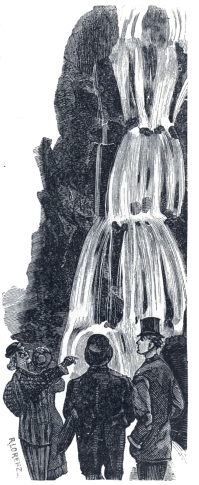
OUR PARTY AT THE GIESSBACH.
As it grew darker, the green foliage on each side threw out the silvery
cascades, dancing from one to the other, in bold relief. Gradually
darkness completely enveloped them, and we could see nothing but the
dark, gloomy mass of mountains down whose side for a thousand feet the
water fell, from one pool to another.
The terrace on which the hotel stands was brilliantly lighted, and was
filled with tourists who were spending some little time here, visiting
the many beautiful spots that make the Giessbach one of the favorite
resorts in Switzerland.
Suddenly, about nine o’clock, a rocket flew skyward, from a point on the
mountain opposite us. Then one went up from the terrace, and while we
were admiring its flight high in air, the lights about the hotel and on
the terrace were extinguished and we were left in utter darkness. A long
drawn “Oh-h-h” involuntarily burst forth as the lowest cascade suddenly
stood before us, a brilliant, beautiful sheet of water, of a delicate
light blue tint. Then simultaneously the other cascades above shone
forth in all their splendor. The scene was wonderful. It was fairy land.
Bengal lights of different colors were arranged back of the sheets of
water, so that each cascade was brilliantly lighted, producing an effect
exquisitely and indescribably beautiful.
Gradually the lights under the water went out, the gas at hotel was
relighted, and we were rowed back to Brienz with a picture of wondrous
beauty printed indelibly on our minds.
Tibbitts, who has rejoined the party after his attempt at reformation at
the St. Gervais baths, (by the way his personal appearance is not a good
advertisement for the waters,) got an idea at Giessbach, which he
developed thus:
“I have at last got my fortune made. What is wanted in Switzerland is
more waterfalls, with legends, more mineral springs, and more ruins,
secular and sacred. As soon as I get back to New York I am going to
organize a company for a Waterfall, Ruin and Spring Company.”
“But all the eligible waterfalls are taken.”
“Very true, and to get one we should have to pay too large a price. This
is the very essence of my idea—I am going to create a waterfall. What
is a waterfall, anyway? Nothing more than water pouring over a rock or
other material. All that is necessary to a waterfall is an elevation and
water. Turn on the water, and it can’t help falling, and there you are.
A MODEL WATERFALL.
“How shall we get water? Easily enough. A side of a precipice, with a
notch in it big enough for a hotel, can be bought anywhere along the
Lake of Brienz for almost nothing. What is more easy than to construct a
reservoir on the top, put a ninety-horse power engine in at the lake,
and pump the water to the reservoir on the summit, and when visitors are
there turn it on, and give them the best waterfall in all Switzerland.
“Keep the water on till after they all go to bed, and for an hour or so
after, so the roar’ll soothe them to sleep; and if any rich Americans
choose to stay up all night, and buy wine, keep it on all night. We must
have nothing mean about our waterfall.

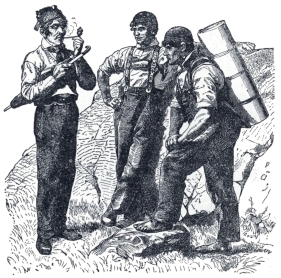
PEASANTS OF EASTERN SWITZERLAND.
“There are a great many advantages in this over the natural article. The
water can be turned off while the lights are being placed behind the
sheet for illuminations, and the flow can be regulated so as to suit
every taste. If the party is made up of young ladies who delight in the
soft and beautiful, we can make a Minnehaha of it; if it is strong men
and old maids who hunger for the grand, why, whack on more steam, and we
can have a Niagara.
“About a mile or so away I am going to have a castle in ruins—ruins
ain’t expensive where there is so much rock—and I can have any
newspaper man write me a proper legend of it for ten dollars. This for
the history crank. For the more devout we want the ruins of an ancient
church, which was destroyed by whoever you choose. This will fetch all
those who are on their way to the Holy Land. They don’t spend as much
money for wine as the other classes, but we can make it up in charges
for board and guides. The ruins must be so built as to make a guide
necessary, and so extensive that two days will be necessary to get the
proper views of them, and to study their history understandingly.

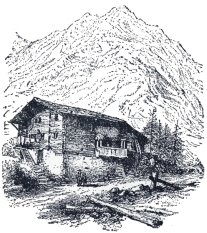
“But this speculation will not be complete without mineral springs in
the valley below. This is the easiest thing of the lot. You will build a
reservoir and chuck into it a few barrels of salt, and a few bushels of
rusty iron filings with sulphuric acid, a ton or so of sulphur (we must
be liberal with sulphur for it is cheap), and any other articles that
smell—asafœtida isn’t bad—get it so thundering strong that it would
drive a yellow dog out of a tanyard, and have it cure anything, from
original sin to corns. We want a gorgeous cure, and a corps of
distinguished physicians, and an analysis of the water, and all that,
and we can just rope in the money. We commence them at the falls, we
deplete them at the ruined castle, and dig into them at the ruined
church, and finally finish them at the medicinal springs. We want a bank
at the latter place, and, if the law permits it, a faro bank. Anyhow, we
can get a Swiss hotel man, and if every blessed tourist doesn’t have to
draw more money before he gets out, then the race has lost its cunning.
“I am going to be the president of this company, with a brother-in-law I
have in Wisconsin for treasurer. There’s money lying around loose, and
this scheme will corral all of it I shall ever want.”
Tibbitts talked of his joint-stock Waterfall, Ruin and Medicinal Spring
Company all the way into Lucerne.
CHAPTER XXXVIII.
LUCERNE AND THE RIGI.
THE road from Brienz to Lucerne, over the Brünig Pass, follows the
valley of Meiringen for a long distance, and gives some very pretty
views of Lake Brienz, the River Aare, and a number of cascades in the
mountains across the valley. As the ascent of the pass begins the road
is frequently overshadowed by hanging rocks, which seem about to topple
over every minute.
As we wind around the mountains occasional glimpses are obtained of the
valley far below, and then, after having gone over the summit of the
pass, we have a long almost level stretch along the side of the
mountain, from which we have a magnificent view of the valley of Sarnea,
with its pretty little lakes and rivers, its long, straight, white
roads, and its queer little towns.
Two hours later we come in sight of Pilatus rearing its lofty head high
above Lake Lucerne, as though it were the guardian of that beautiful
body of water. Then a long drive on the banks of the lake, where the
road is cut out of the solid rocks, and in a short time we rattle over
the rough stones of a pavement, across the Reuss River, and are in
Lucerne.
This city, which is to Switzerland what Saratoga is to America, is
prettily built at the head of Lake Lucerne, or, as the Swiss call it,
the Vierwaldstätter See, which resembles somewhat in shape a Roman
cross, Lucerne being at the head. It is situated in an amphitheater, if
the term might be so applied, facing the snow capped Alps of Uri and
Engelberg, with Rigi on one side and Pilatus on the other. Around it are
massive walls and watch towers, built in 1385, and still in a good state
of preservation.
The hotels are nearly all located on the Schweizerhof Quays, which
occupies the site of an arm of the lake that was filled up some fourteen
years ago. From any one of these mammoth hotels magnificent views may be
obtained on any clear day. Directly in front is the lake; to the right
the Rigi group, with its hotel-crowned summit; in the center the
Reussstock chain, and to the extreme right Pilatus. All of these
mountains are full of points of interest, and are annually visited by
thousands of tourists, who make up their parties at Lucerne. The sail
across the lake to any part of the town on its borders, makes a
delightful excursion that is always new and interesting.

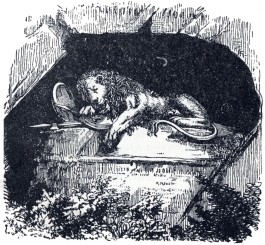
The show sight here is the celebrated Lion of Lucerne, which photographs
and pictures have made famous the world over. It is an immense figure,
cut in the side of a great rock, about a quarter of a mile from the
quay, in memory of the twenty-six officers and seven hundred soldiers
who were massacred in the Tuileries, Paris, on the tenth of August,
1792, when the Commune obtained control of the government, and compelled
King Louis to fly for his life. An immense lion, twenty-eight feet in
length, lies dying in a grotto, transfixed with a broken lance. Under
one paw, as though he would shelter it even in death, is the Bourbon
lily. On either side of the lion are the names of the officers, and an
inscription. The idea is a simple one, but the work was done by a master
hand, (the Danish sculptor Thorwalsden being the artist) and is very
impressive.
THE SWISS SOLDIERS ABROAD.
As a rule, people thrill when they look upon this famous Lion of
Lucerne, but I declined to do anything of the kind. The death of these
Swiss, in Paris, was a purely commercial matter. They were the hirelings
of an infamous despot, who was crushing the life out of the French
people by their aid. I have no sympathy for king, queen or noble, and
when one dies I have a hosanna to sing immediately. And I cannot imagine
anything more disgraceful than a man, Swiss, or of any other
nationality, who would sell himself to a despot. These fellows, who fell
in defense of Louis, had but one merit: they sold their blood, bones and
sinews, and they carried out their contract. They were simply honest
butchers, who contracted to do certain work for a lecherous French king,
and did it. But the monument at Lucerne to these hirelings is an insult
to humanity, and all the good I got out of it, was the contemplation of
a wondrously carved lion, and the drawback to that satisfaction was the
frightful fact that the men, to whose memory it stands, never should
have had any monument erected at all. This inscription is the only one
they deserved:
“Sacred to the memory of some hundreds of hired soldiery, who
fought for pay only, had too much animal courage to run, and who
died to carry out a contract.”
As a work of art, Thorwalsden’s lion is worth seeing—as a piece of
sentiment, excuse me. I have seen too many soldiers in Europe who sell
their sinews for pay, and I have seen too many starving people who are
kept poor to support them. I do not like any soldiers but volunteers,
and whenever the people get the upper hand of the other kind, I want to
contribute for a monument to the people, not to their oppressors.
Aside from the bridges, whose only merit is their age, and one or two
rather scantily furnished churches, there is but little of interest in
Lucerne.
The Glacier Mills are an attraction, and are well worth seeing. There is
no humbug about nature. You climb a hill after looking at the lion, and
you come to a garden in which are a series of the great pits known as
Glacier Mills.
These are simply great holes in solid rock thirty or forty feet deep,
and about the same in diameter. In the ages gone by when this country
was covered with glaciers, the action of water wore holes in the rock,
great stones lost themselves in these cavities, the water came in and
the stones, weighing many tons, revolved by the action of the water,
wore away the rock and enlarged the pit at every revolution.
This work went on for ages. The water forced itself into the pit, the
great rock revolved, by its action enlarging the cavity at every
revolution, until finally the glacier disappeared and the rocks were at
rest.
And here they are to-day, round as marbles, lying at the bottom of the
pits they made, so many evidences of the irresistible forces of nature.
In this enclosure there are, perhaps, twenty of them, varying in depth
from thirty to fifty feet, and about the same distance across.
Tibbitts believed they were artificial, and said he should dig a few for
his Hotel and Ruin Company, but he is entirely mistaken. The glacier
mills are genuine and the same forces are at work to-day under every
ice-field, and doing the work precisely as this was done. However, there
is no reason why he should not manufacture a few—tourists would take
them just the same, and be just as well satisfied. He claims that with
nitro-glycerine he can do in five hours the work that requires centuries
to accomplish with water and rock, which demonstrates the supremacy of
mind over matter.
Mont Pilatus, just out of Lucerne, is something you must see whether you
want to or not. It isn’t a very remarkable mountain, but the astute
hotel keeper and the more rapacious hackman, has made it necessary for
you to spend more money than you want to, by seeing Mont Pilatus. It is
a proper mountain to see, nothing extraordinary, as a mountain, but you
are compelled to go anyhow, and you do. And this is why you go.
PONTIUS PILATE.
There has to be a legend for every point of sufficient interest to
attract a traveler, and so Pilatus has its legend. You are told gravely
that after Pontius Pilate washed his hands of the blood of our Savior,
and saw him go to his death, instead of saving him as he might have
done, he was struck with remorse, returned to Rome, and pursued by a
feeling which he could not get rid of, made his way to this mountain in
Switzerland, and lived in a cave therein, a recluse, expiating by a
life of solitude the crime he had been guilty of in shedding innocent
blood.
And they show you gravely and without a blush, a pond in the top of the
mountain, where, after he became an old man, he ended the life that was
a burden to him, by drowning himself therein, and they tell you of the
earthquakes and things of unpleasant nature that followed his demise.
The Arch Enemy of mankind was on hand in person to seize him, and when
he had struck the water he was taken bodily by His Satanic Majesty and
whisked away to the lower regions.

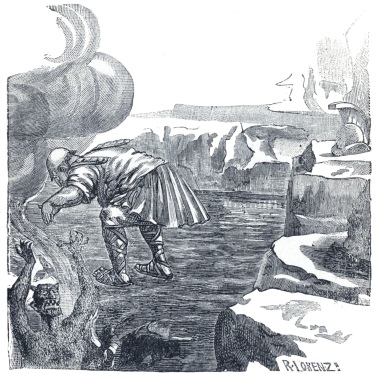
THE END OF PONTIUS PILATE.
Did all this happen? Possibly. I was not there, and therefore cannot say
positively that it did not. I wish to be truthful and reasonable. But I
will venture my opinion that Pilate never came to Switzerland; that
after his term expired as Governor of Judea he stole all he could lay
his hands upon and went back to Rome, and went over to the new Emperor
or Consul, or whatever they called the official who had the giving out
of patronage, and got a new appointment somewhere else. That is what
became of Pontius Pilate.
However, Mt. Pilatus is well worth seeing, and the legend is a very
effective one, and the guide who tells it to you always gets several
francs in addition to his original swindle.
You must have legends, and as people believe them it is the same as
though they were true.
An imaginative friend of mine was once standing upon the railroad
platform at Forest, Ohio, in the war years, probably the most lonesome
and desolate station in the world. There were twenty passengers with him
for a train that was so far behind that no one could guess as to when it
would arrive.
He had cut a little switch from a tree near the platform, and as he
flourished it ostentatiously, some one asked him where he got it.
With a quickness of invention—a fertility of lying that was simply
admirable—he said it was the tip of the flag-staff of Fort Donelson!
Now this was nothing but a little switch cut within twenty feet of where
they were standing, but immediately all the passengers came up and took
it in their hands and examined it critically, and commented on it, as
though it were something of actual importance. It was, to them. The
battle was discussed, the merits of Grant as a soldier were discussed,
and the whole war was with its causes and consequences, reviewed. And
all this because a prompt liar, in an impulsive way, located a Forest
switch as the tip of the flag-staff of Donelson.
We believed it, and handled the switch reverently. The tourist to
Pilatus swallows the legend of Pilate, and it does him just as much good
as though it were true.
The moral to all this is, the wise man swallows what is set before him
and asks no questions for his stomach’s sake.
Never go into the kitchen in which your hash is made. Be ignorant and
happy.
UP THE RIGI.
By this time we were ready for another mountaineering

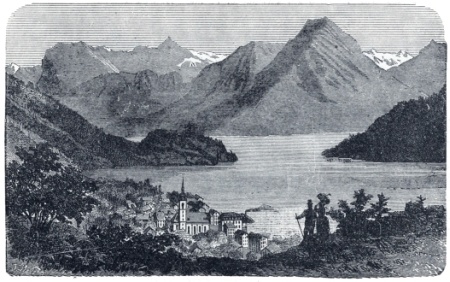
LUCERNE-RIGI-RAIL—VITZNAU AS SEEN FROM THE EICHBERG.
expedition, especially as in this instance the ascent could be made in a
comfortable railway car. To reach Vitznau, where the railway station is,
we took a sail of about an hour and a half, through beautiful scenery.
As we steam out from Lucerne, the city is seen to its best advantage,
its long walnut-shaded quay, its massive hotels, churches, walls and
towers, standing up from the water and thrown into relief by the dark
green forests on the mountains behind it.


LUCERNE-RIGI-RAIL—VIEW FROM THE KANZELI.
PILATE IN THE GUIDE BOOK.
Soon after Lucerne fades away we see the cross-like formation of the
lake, one arm, known as Lake Küssnach, stretching way to the north,
while on the other side is Lake Alpnach. Far ahead of us is the Bay of
Buosch and Lake of Uri, forming the foot of the cross. At the head of
Lake Küssnach can be seen the town of that name. Here, in the central
part of the cross, the view is particularly impressive; the Rigi, on the
left, with its wooded slopes shining in the sunlight, contrasting
strangely with the mist and clouds that envelope Pilatus, on the other
side of the lake. As we see the clouds lowering around the high peak of
Mt. Pilate, the legend told by Antonio, the guide in Sir Walter Scott’s
“Anne of Gierestein,” comes vividly to mind. I have given my readers my
notion of the legend of Pilatus—now they have it exactly as the guide
books give it. You pay your money and you take your choice. Here it is
in guide book talk:
‘The wicked Pontius Pilate, Proconsul of Judea, here found the
termination of his impious life; having, after spending years in
the recesses of the mountain which bears his name, at length, in
remorse and despair rather than in penitence, plunged into the
dismal lake that occupies the summit. Whether water refused to do
the executioner’s duty upon such a wretch, or whether, his body
being drowned, his vexed spirit continued to haunt the place where
he committed suicide, no one pretended to say. But a form was often
seen to emerge from the gloomy waters, and go through the action of
washing his hands, and when he did so dark clouds of mist gathered,
first round the bosom of the Infernal Lake (such it had been styled
of old), and then wrapping the whole upper part of the mountain in
darkness, presaged a tempest or hurricane, which was sure to follow
in a short space. The evil spirit was peculiarly exasperated at the
audacity of such strangers as ascended the mountain to gaze at his
place of punishment, and, in consequence, the magistrates of
Lucerne had prohibited any one from approaching Mt. Pilate, under
severe penalties.’
It is perhaps needless to say that the prohibition has been long
removed, and that every season a great many tourists ascend the grand
old peak, to see the Infernal Lake on its summit. All do it who can
afford to pay for it.
And speaking of these miracles and appearances, and all that sort of
thing, they don’t take place any more. Pilate hasn’t appeared in person
to any tourists for hundreds of years. His appearance is something that
used to happen, but doesn’t any more.
Tibbitts remarked that when he got his hotel done, he would have Pilate
appear, actually washing his hands, no matter what it cost him. He
intended to have a lot of fresh miracles. He would treat his patrons
decently, and not palm off upon them a lot of old legends. He could get
a man to do the Pilate business for thirty dollars a month, and he
wouldn’t be mean enough to stop at so small an expense as that.
Passing Weggis, a pretty village nestling at the foot of the Rigi,
Vitznau is reached, and there we disembark for our ride up the mountain.
The Rigi has long been a favorite resort for tourists, and as far back
as 1868 an attempt was made to assist them in reaching the summit with
less fatigue and greater comfort and security. In that year, one
Riggenbach, of Olten, and an engineer of Aaron, named Olivier Zschokke,
after having experimented for years on the subject, published a
pamphlet, in which they declared that it was possible to construct a
railway from Vitznau to the summit of the Rigi.

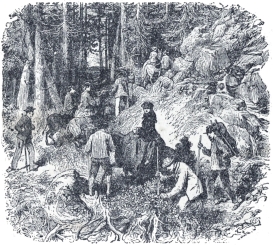
THE OLD WAY OF ASCENDING THE RIGI.
The treatise attracted a great deal of attention, and the following year
the two engineers applied for aid from the Government of Lucerne to
carry out the scheme they had devised. This aid was granted, and in two
years the road was finished to Stoffel, over half the distance, and two
years later to the very summit of the mountain.
A MOUNTAIN RAILWAY.
The new system consists of two rails of standard gauge, such as are used
on ordinary railways, firmly fixed on sleepers, which are solidly
secured to the rock by every device known, to insure their solidity.
Then a third rail, supplied with cogs, is placed between the other two,
and on this the cogged driving wheel of the engine of a new construction
propels the

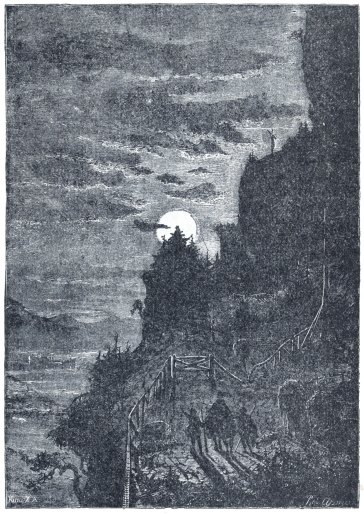
NIGHT ASCENT OF THE RIGI IN THE OLD TIMES.
engine up the hill. Engines of a special pattern were built, for as the
ascent is often at an angle of twenty-five degrees, ordinary locomotives
would not do. The boiler in the new engine is perpendicular and the rear
is slightly elevated. The tread-wheels are connected with the cog wheel
in the center of the engine in such a manner that each wheel bears its
proportion of the weight. The road has been a complete success from the
start, not a single accident having ever occurred.
The sensation after the car leaves level ground at the station in
Vitznau and begins to climb steadily up the mountain is peculiar. The
ground seems to melt away, and yet is always replaced. As we mount
higher and higher, the view becomes more extensive. Now we can see the
little town we have just left on the pretty little bay, at the foot of
the mountains. Beyond it the lake stretches out to the mountains that
seem to come to its very edge. Then the road passes through a tunnel, a
marvel of engineering skill, for going through there the ascent is at a
rise of twenty-five degrees.
Emerging from this tunnel, the train speeds across a bridge, over a
yawning chasm, whose sides are lined with stunted trees and great
bowlders, that are washed by a large stream which takes its rise higher
up the mountain.
From this point the view is grand. Pilate, towering above the lake, is
clearly seen on the right; just below is Weggis, and further on the
bright buildings of Lucerne shine in the sunlight, while the lake, with
its different arms, looks like “a painted sea.” All around and above are
the huge red rocks of the Rigi. There are two or three stations along
the route, but we push steadily on, the views becoming grander and
grander with each successive step, until the summit is reached, and then
the panorama is complete. You see the Alps in the eastern part of
Switzerland, the massive pile of the Loudi, all the western mountains of
Schwyz, and to the north the cantons of Zug, Zurich and Lucerne spread
out like a map at our feet. Way down the valley can be seen eleven
different lakes, with little clumps of houses, the villages on the
shores of the “Vierwaldstätter See.”
Passing by the great hotels that flourish here so high above the world,
we go to the great bluff which is so prominently seen from Lucerne, and
there the view is magnificent. As far as the eye can reach on the south
are the countless peaks of the Alps, covered with snow the year around.
Near at hand are beautiful valleys with winding rivers and straight,
thread-like roads.
RIGI KULM.
As we stand there, lost in wonder at the overpowering magnificence of
the scene, the sun, which up to this time had been shining brightly, was
obscured by clouds, and we were treated to a thunder storm which raged
with terrific fury for half an hour or more. Then the sun broke forth
again in all his splendor and we saw the clouds disappear beneath his
powerful rays.
Sunrise as seen from the Rigi Kulm is said to be one of the most
magnificent sights imaginable. One enthusiastic German writer gives a
very glowing account of it, which has been literally translated and is
sold in all the book-stores in Lucerne. The translation is so good (?)
that it should be universally read. A portion of it is reproduced:
“The starlight night far expanded and aromatic with the herbs of
the Alps and the meadow ground, now begins to assume a gray and
hazy veil. Their mists arise from the top of the feathered pines,
an airy crowd of ghost-like silent shapes approaching the light,
that with a feebly pale glimmering dawns in the East. It is a
strange beginning, a gentle breath of the morning air greets us
from the rocky walls in the deep, and brings confused noises from
below. That is a signal for all who did not like to ascend so high,
without beholding the sunrise. Meanwhile the day breaks out bright
and clear; a golden stripe, getting broader and broader, covers the
mountains of St. Gall; the peaks of snow change their colors,
indifferently white at first, then yellowish, and at last they turn
a lovely pink. The new-born day illuminates them. Now, a general
suspense! One bright flash—and the first ray of the sun shoots
forth. A loud and general “oh” bursts out. The public feels
grateful, be it a ray of the rising sun, or a rocket burnt off and
dying away in the distance, with an illuminating tail of fire, and,
after the refulgent globe, giving life to our little planet, has
fully risen, the crowd of people drop off one by one to their
various occupations.”

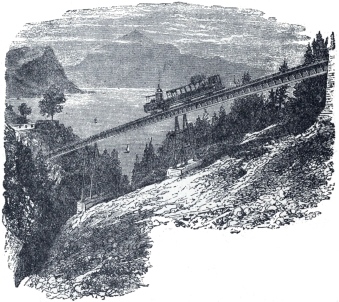
The ride down, while full of surprising views, is not so interesting as
the ascent, for one is familiar with every turn, and has not that
feeling of novelty that impresses him while going up.
Going back to Lucerne we are treated to a magnificent sunset, old Sol
sinking behind the mountains with a grand blaze of glory that tinges the
peaks all around the horizon with a brilliant golden outline.
TELL’S CHAPEL.
On the eastern border of this wondrously beautiful lake is

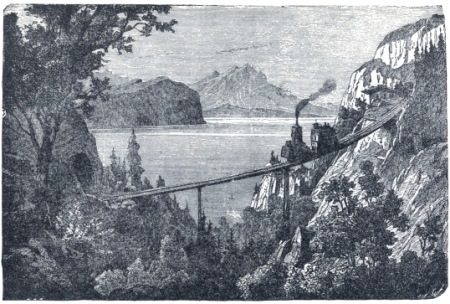
THE RAILWAY UP THE MOUNTAIN.
a chapel, built, it is said, upon the spot where Tell leaped from the
boat of Gesler, the Austrian tyrant, while on his way to prison, and
shot him. It is a pretty little structure, at the water’s edge, and is
every year visited by thousands of people who come to enthuse over the
alleged Swiss patriot.
I should have enthused with the rest, only ever since I have been in
Switzerland I have been investigating Tell, and to my profound grief I
find that like Sairy Gamp’s Mrs. Harris, “There ain’t no sich a person,”
and never was.

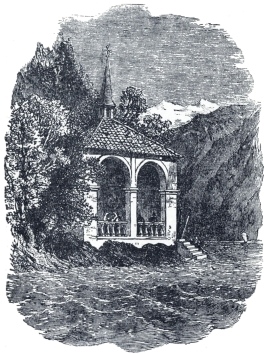
TELL’S CHAPEL, LAKE OF LUCERNE.
When I say to my profound grief, I mean it. In my boyhood—alas, that
was many a year ago—I had several pet heroes among men and things. Tell
shooting the arrow off his boy’s head and saving another arrow to shoot
Gesler had he harmed his son, was one of them; Jackson and his cotton
bales at New Orleans was another; the maelstrom, sucking down whales and
ships, as depicted in the school geographies, was another; and then came
Wellington with his “Up guards and at ’em,” at Waterloo, the quiet but
heroic General Taylor at Monterey with his “A little more grape, Captain
Bragg!” with others too tedious to mention. Among my especial hatreds
was the cruel King Richard, of England, who slaughtered the infant
princes in the tower.
HISTORICAL ROMANCE.
Alas for history and geography! One by one these idols were dismounted.
Later geographical investigation proves that there is no maelstrom on
the coast of Norway; that the statement was founded upon a few rather
ugly currents that swirl and eddy among some islands, but which are yet
perfectly safe for vessels of light draft.
I had scarcely recovered from this before it came to light that
Jackson’s riflemen did not rest their unerring pieces upon cotton bales.
When one thinks of it, it would be rather risky to fire flint-lock
rifles over such inflammable material as cotton, to say nothing of the
confession of that Brobindignagian fraud, Vincent Nolte, who confessed
that all there was of the cotton story was this: He was moving a few
bales of cotton he had in New Orleans up the country for safety, when it
was feared the British would burn the city, and one of his mule teams,
with two bales upon the wagon, was passing where some Tennesseeans were
throwing up an earthwork. The wild backwoodsmen, in sheer mischief,
upset the wagon, cut the mules loose, and buried the two bales and the
wagon under the earth. Then, as he sued the government, per custom, for
the price of five hundred bales, it was said that the battle was fought
behind cotton, and the pictures show it.
For Wellington to have said “Up guards and at them!” would be to presume
that Wellington was in the extreme front with the guards, and Taylor, to
have made his exclamation, must have been sitting on his horse beside
Captain Bragg, something generals never do.
But I said, though all these are gone, I have my Tell left me. Alas!
Swiss and German investigators have proved conclusively that there never
was such a man as Tell; that Gesler is quite as much of a fiction, and
that the whole business of the apple on the son’s head, the leap from
the boat, and all the rest of it, is a poetic legend, the counterpart of
which may be found in the literature of all old people. There is no
mention either of Tell or Gesler in any authentic history.
But I thank heaven my objects of dislike are proved to be just as much
fictions as the others. For up comes an English essayist who proves that
Richard III. did not smother the infant princes, that he was not a
cruel, humpbacked tyrant, but was the wisest and best king England had
ever had, and that his untimely taking off was one of the greatest
misfortunes that ever befell that country.
So these investigators have reduced humanity to a sort of average dead
level, with no Mt. Blancs of goodness and no Jungfraus of badness.
Tibbitts was very indignant when I told him this about Tell. He remarked
that he preferred not to believe the investigators; he preferred to
believe in Tell. He didn’t care a straw for the investigators, he defied
them. Suppose Tell didn’t shoot the apple? What then? Tell shooting the
apple made a picturesque picture, and it pleased him. He protested
against reducing all mankind to the drawing of molasses and the hewing
of calico. He wanted heroes and heroines, and if they didn’t appear in
real life the poet gave them to us, and it did just as well.
By this time Tibbitts got wound up. “How does any one know that there
was no Tell? I demand proof. You can’t prove that there was not such a
man, and that he did not do the feats ascribed to him. Very well! I
assert there was such a man; that there was a Gesler; that Gesler put
his hat on a pole in the market place, and required everybody to bow to
it, and Tell refused; and then Gesler insisted that he should shoot an
apple from his boy’s head, and he did it. You have no proof that this is
not so. I have proof that it is. I can show you the market place, and an
apple. That the feat is possible every schoolboy knows, for have we not
all seen Buffalo Bill do the same thing in the theaters? And, then, if
it were not precisely true, it should have been. We want such incidents
to keep alive a love of country, a healthy spirit of patriotism, and a
wholesome hatred of tyrants who go about putting caps upon poles and
requiring people to bow to them. Admitting it to be a fable, we want
more such fables. What difference does it make if it is a fable? Does it
not inculcate a great principle just the same? And inculcating a great
principle is the main thing. I hold to Tell with all the simple faith I
had in childhood, and even more. For in childhood Tell was merely a
romantic and highly colored sensation—now he has grown to the sublime
dimensions of a moral necessity.”
And in spite of the bald facts staring him in the face, he went into
ecstacies in the chapel, and spoke of it as a “shrine,” and remarked
that it would be better for the world had it had more Tells, and said
everything that everybody says.
SWISS REVERENCE FOR TELL.
The Young Man who Knows Everything ambled in at this point with the
remark that worms were made for sparrows, and the sparrows know it. It
is a beautiful provision of nature that the strong eat the weak. If
intellect and strength won’t provide a living, what is the use of
intellect and strength. A man might as well be a fool as anything else,
if he can’t live on his mental endowments.
Which, as it had no earthly application to the subject under discussion,
was characteristic, very. But it satisfied him.
But you had better not express any doubt as to Tell to any of the Swiss,
especially in this region. They believe in him as firmly as Americans do
in Washington, and in the apple as steadily as we do in the hatchet.
There was a book published in Berne, proving Tell to be a myth, and it
was suppressed by the government, and all the copies in circulation
siezed and burned.
Tell is a national pride, and besides, the legend brings tourists into
the country, and keeps them longer after they come, which is a matter of
national profit. And so, between pride and profit, they keep up the
fiction, and will, to the end of time.
However, I still believe in Washington’s hatchet, and in Franklin’s
eating bread in the streets of Philadelphia. I am going to cling to
something of my youth. But I suppose somebody will disembowel these
legends in the course of time, and life thereafter will be as monotonous
as a mill-pond—all on a dead level.
CHAPTER XXXIX.
ZURICH AND STRASBURG.
LEAVING Lucerne, Mont Pilatus and the Rigi behind us, we speed rapidly
on through pleasant valleys and fragrant meadows. The country loses its
high, mountainous nature, and becomes a level, well-farmed district,
extremely pleasant after three weeks of nothing but huge mountains,
steep passes and rugged hills. Mountain scenery is all very well in its
way, but one can have too much of it. A little is quite sufficient.
Zurich is a beautiful city, lying around the head of the lake of the
same name. The old portion dates back to the twelfth century, and
contains many interesting relics of that period. But around the old part
there has grown up a fine modern city, whose solid substantial
buildings, of fine architecture, contrast strangely with the old houses
and churches that were built centuries ago.
Its location could not be more beautiful. In front is the clear
pale-green lake, from which the limpid Limmat emerges and divides the
city into two parts. Its shores are lined with picturesque villas,
peeping out from among the orchards and vineyards that clothe the banks,
clear to the foot of the snow clad Alps which form a strong background,
being so far away that they are soft and subdued in the hazy air that
partly obscures them from view.
The pride of Zurich is her schools, indeed all of German Switzerland is
proud to recognize this place as its educational center. For centuries
it has enjoyed this distinction, and its University, founded in 1832, is
maintaining in these years the reputation of the city.
BEER AND MUSIC.
Where German is spoken three things are always found, music, wine and
beer. Bacchus, Gambrinus and Orpheus go hand in hand, and they engross
the German mind about equally. Zurich has more music to the square foot
than any of the Swiss cities, and the other two members of the trinity
are by no means neglected.

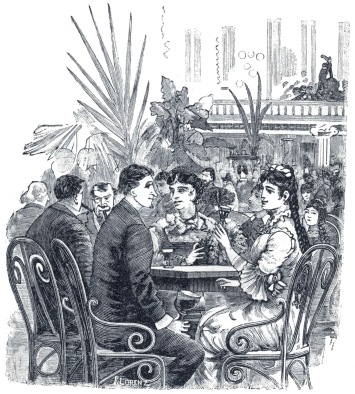
TIBBITTS IN A CONCERT HALL, ZURICH.
The Tonhalle is a spacious building finely decorated with rare plants
and flowers, and brilliantly lighted with gas jets springing from
artificial palm trees. Here the good citizens of Zurich spend an evening
of perfect enjoyment. An orchestra of seventy pieces, each performer a
trained musician, renders a programme of classical and popular music, in
the most perfect manner. The vast audience, composed of ladies and
gentlemen of the best standing, sit around the little round tables
sipping their light wine or beer, listening to the music and, during
the intervals, chatting and laughing and thoroughly enjoying themselves.
There is a something about such an evening that is irresistable. The
perfect order that prevails, the exquisite music, the brilliancy of the
room, all combined to make it a perfect delight. Night after night—the
programme is never twice alike—the Tonhalle is crowded with the wealth
and fashion of Zurich, people of refinement and culture, who can fully
appreciate and enjoy the delightful music.
There is one custom which obtains all over Germany, and especially in
Zurich, which is a German city in reality, which custom I would could be
transplanted in all its native vigor to America; and that is the
carrying of the family relation into amusement as well as business.
A Zuricher doesn’t eat his supper in silence, his mind full of his
business, and after, without a word, put on his hat and overcoat, and
with some indistinct reference to a lodge or a council meeting, or “the
office,” walk off to a club or beer place, and spend the evening
convivially, only to return in the middle of the night, and roll into
his bed without knowing or caring whether his wife and children have had
a pleasant evening or no.
Not he! On the contrary, he consults his wife at lunch as to whether she
prefers a dinner at home or at the gardens. The programmes of the
various places are consulted, and it is decided, we will say, that the
Tonhalle affords the most ponderous inducement; and so the whole
family—father, mother, children, and grandchildren and grandparents, if
such there be—go together and dine to the soft pleasings of the lute,
or, rather, to the music of a magnificent orchestra.
For, be it known, at all these musical resorts there are superb
restaurants, where splendid repasts are served at a very low price, so
that in the matter of expense it makes no difference whether a family
dines at home or at the public gardens.
THE SWISS WAY.
The whole family sit and chat over their dinner in the jolliest way,
listening to, enjoying and discussing the music, and after the dinner
there is the long evening over the delightful light wines for the ladies
and children, and the heavier beer for the adults; there are cigars for
the males, and confections for the women and children, and so on, until
the hour comes for home.
These concerts are made up of all kinds of music, from the weightiest
classical to the most simple and popular, but the simple and popular is
rendered with as much painstaking conscientiousness as the highest. They
do “Way down upon the Swanee River” as conscientiously as a selection
from Wagner, and as the performance lasts four hours or more there is
variety enough to suit every taste.
And then, after it is over, the whole family go home, pleased with their
simple enjoyment, and they go home together. The husband does not stop
on the way; his enjoyment is with his family, and in his family.
There is no more pleasant sight in Europe than a Swiss or German family
around one of these tables, enjoying drinking, music, smoking, and
conversation, all at once. Happy people! They have the rare art of
gratifying all the senses at once, at less cost than an American can any
one singly. The whole cost of an evening in the Tonhalle for a man and
his entire family is less than many an American of very moderate means
spends upon himself alone, and they get ten times as much out of it as
we do.
Tibbitts insisted the first night he was with a German family at one of
these places, that he should certainly marry a German girl and settle in
Switzerland. When you can dine a large family for a dollar, wine, music
and cigars included, was his remark, there is some inducement for having
a family. He could afford, if the price of land kept up in Wisconsin, to
have an indefinite number of children.
And the Young Man who Knows Everything, who felt the influence of the
heady wine he had drank, added, with great gravity: “Better a dinner of
herbs on a house-top with a brawling woman, than to dwell with a stalled
ox in the tents of wickedness.” It was his time for a quotation.
From Zurich through Basle, or Bale, we come to Strasburg, one of the
most interesting cities in Europe.
In this old city of Strasburg, founded by the Romans hundreds of years
ago, we get a better idea of old architecture than in any city yet
visited. Its narrow, crooked streets, with high, many-storied roofs,
tell the story of its age in unmistakable language. The unique wood
carving that embellishes the façades of so many of the old wooden
buildings look strange and out of place in this matter-of-fact age, but
in years gone by they gave to Strasburg the name of “the most beautiful
city.”
Approaching the city we pass a number of strong fortifications, which
were in active use during the Franco-Prussian war. Strasburg, two miles
from the Rhine, has always been a strategical point, and played a very
important part in the struggle of 1870-71, the siege, which lasted from
the thirteenth of August till the twenty-seventh of September, being one
of the marked episodes of the war.
Once in the city the tourist turns first to the cathedral, which stands
nearly in the center of the city. Unfortunately for the general effect,
it is located in a neighborhood of narrow streets and ugly high-roofed
houses that entirely surround the massive pile, and the first impression
is rather disappointing. But this feeling soon wears off. There is a
certain majesty about the noble building that compels admiration, while
the cloud-cleaving spire, wondrously graceful, is a marvel of strength
and grace. It is a fascinating structure. The more one studies its
beautiful proportions, and the wonderful decorations which so profusely
embellish it, the more he is struck with wonder at the genius of the
architect and the skill of the patient builders.
The present cathedral was begun some time during the twelfth century, on
the site of one destroyed by fire, said to have been built during the
sixth century. Tradition says that the site of the present cathedral has
been devoted to worship from the remotest times; that there was a sacred
wood in the midst of which the Celts built their Druidical Dolmen. After
the Romans conquered Gaul, they founded a fortified town, where
Strasburg now stands, and in place of the Dolmen they dedicated a temple
to Hercules and Mars. Old chronicles record that in the fourth century
St. Armand built a church on the ruins of an old Roman temple, the
previous existence of which is authenticated by the finding of several
brass statues of Hercules and Mars, during the excavations for the
foundations of the first cathedral.
THE CATHEDRAL.
From the beginning of the work on the present cathedral

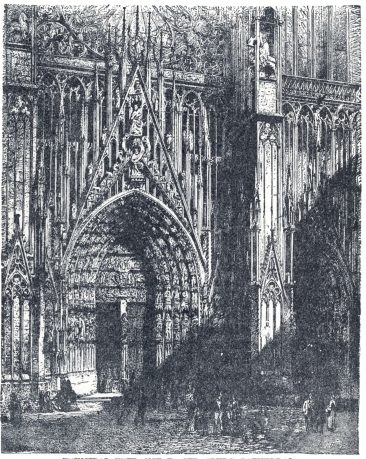
PRINCIPAL ENTRANCE TO STRASBURG CATHEDRAL.
down to 1870 it has been terribly unfortunate, having been burned,
struck by lightning, shaken by earthquakes, and in 1870 it suffered
terribly by the cannon balls of the German besiegers. In the first part
of the siege of Strasburg, the Germans tried to force the surrender by
the bombardment and partial destruction of the inner town. In the night
of the 23d of August began for the frightened inhabitants the real time
of terror; however, that night the rising conflagrations, for instance
in St. Thomas’ Church, were quickly put out. But in the following night
the new church, the library of the town, the museum of painting, and
many of the finest houses, became a heap of ruins, and under the hail of
shells all efforts to extinguish the fire were useless. For the
cathedral the night from the 25th to the 26th of August was the worst.
Towards midnight the flames broke out from the roof perforated by
shells, and increased by the melting copper they rose to a fearful
height beside the pyramid of the spire. The sight of this grand volume
of flames, rising above the town, was indescribable and tinged the whole
sky with its glowing reflection. And the guns went on thundering, and
shattering parts of the stone ornaments which adorned the front and
sides of the cathedral. The whole roof came down and the fire died out
for want of fuel.
The following morning the interior was covered with ruins, and through
the holes in the vault of the nave one could see the blue sky. The
beautiful organ built by Silbermann was pierced by a shell, and the
magnificent painted windows were in great part spoiled. On the 4th of
September two shells hit the crown of the cathedral and hurled the stone
masses to incredible distance; on the 15th a shot came even into the
point below the cross, which was bent on one side, and had its
threatened fall only prevented by the iron bars of the lightning
conductor which held it.
After the entrance of the Germans into the reconquered town, the
difficult and dangerous work of restoration of the point of the spire
was begun at once and happily ended a few months after. They have now
obliterated all traces of the ruin and devastation of that dreadful
time.
ROYALTY.
This is war, and what was this war all about? Why, Louis Napoleon, who
stole France and kept the French enslaved by amusing one-half of them
that he might rob the other half, had to appeal to French patriotism and
plunge France into a war to cover his Imperial thefts. On the other
hand, the Kaiser William, and the iron-handed Bismarck, who had been
grinding the people of Germany for years to prepare for war, were not
slow to accept the challenge. What they wanted was to have more
territory to plunder. There was no bad blood between the French and
German people; it was the self-constituted rulers of the two peoples,
who, for their own glory, set them to butchering each other. And so at
it they went.
These kings and emperors respect neither God nor man, and so they sent
their bombs hurtling through this wonderful temple dedicated to God.
Nothing to the gunners inspired by royalty was the delicate tracery, the
genius-inspired proportions, the almost breathing statues, the
wonderfully beautiful spire, that crystallized dream; nothing to them
the magnificent organ, attuned to the sweetest worship of the Most High,
nothing the recollections of the centuries that clustered about it,
nothing the art treasures it held. It was Strasburg, and Strasburg must
fall.
And they counted God’s images in the doomed city even less than they did
God’s temple. And so they sent shells crashing through the homes of
Strasburg, and men were killed in its streets, women in the houses, and
children in their cradles. It made no difference to the white-bearded
William, the iron-handed Bismarck, or the sensual Napoleon. It was their
fight, but they bore none of the suffering. The Kaiser actually had the
impudence to order a thanksgiving for the slaughter of ten thousand
Frenchmen, and Louis Napoleon would have done the same had he been in
condition.
I have expressed my opinion of kings before. The more one sees of them
and their work the less love he has for them. Soldiers and thin soup for
the people in Germany, soldiers and starvation in Ireland. That’s what
royalty and nobility mean everywhere—brute force and suffering.
The façade of the great cathedral is by Erwin, of Steinbach, the most
famous architect of the middle ages, and is a marvel of beauty, its
massive proportions being toned down and improved by the innumerable
figures, statues, and a fine rose window, forty-two feet in diameter,
that adorn it.
Entering the cathedral, one is greatly impressed with the harmonious
effect produced by the massive yet graceful columns from which spring
the light arches that form the ceiling. The proportions are admirable,
the height being ninety-nine feet, the width forty-five yards, and the
length one hundred and twenty-one yards.
The pulpit, a fine specimen of stone carving, dates back to 1485, and
affords a good idea of the style of art that flourished in Germany at
that time.
THE WONDERFUL CLOCK.
Next to the cathedral itself, which demands a great deal of study, the
great astronomical clock attracts the most attention. It was constructed
during the years 1838-42, by a Strasburg clockmaker named Schwilgue, and
is a wonderful piece of mechanism. The exterior, handsomely decorated
with exquisite carvings and paintings, shows a perpetual calendar, with
the feasts that vary, according to their connection with Easter or
Advent Sunday. The dial, which is thirty feet in circumference, is
subject to a revolution in three hundred and sixty-five or three hundred
and sixty-six days, and indicates the suppression of the circular
bi-sextile days. There is also a complete planetarium, representing the
mean tropical revolutions of each of the planets visible to the naked
eye, the phases of the moon, and the eclipses of the sun and moon
calculated forever.
Then with the same mechanism a number of figures are made to go through
certain motions at stated intervals. At noon the twelve apostles appear
before the Savior, who raises his hands to bless them, during which time
a cock flaps his wings, and crows three times. A figure of Death stands
in the midst of figures representing the four ages, childhood striking
the first quarter of the hour, youth the second, manhood the third, and
old age the last. Just before each quarter is struck, one of the two
genii seated above this perpetual calendar strikes a note of warning.
When the hour is struck by Death, the second of these genii turns over
the hour glass he holds in his hand. It is a wonderful piece of
mechanism.
As with everything else of public interest around this section, where in
olden times imagination ran riot, this clock has its legend. It is said
that, long ages ago, a mechanic of Strasburg labored and studied for
years for the accomplishment of some purpose that he kept secret from
all his neighbors. Even his only child, a lovely girl who was sought in
marriage by a prospective mayor of the city, and by a handsome young
clockmaker, was not allowed to enter the room where this mysterious work
was being carried on.
In the course of time the elder suitor was made mayor, and then proposed
for the hand of the beautiful girl, who, loving the young man, refused
him. Soon after this, the old mechanic showed to the astonished citizens
of Strasburg, who up to this time had ridiculed him as an insane person,
the wonderful clock he had constructed. He at once became very popular,
much to the disgust of the mayor who had been rejected by his daughter.
The clockmaker’s fame spread all over the country, and the citizens of
Basel, a neighboring city, attempted to buy the wonderful piece of
mechanism. But the corporation of Strasburg would not part with it, and
caused a chapel to be built in the cathedral for its reception. Then the
citizens of Basel offered a large sum of money if the master would
construct them a similar clock, and he accepted their offer.
This would never do. The wonderful clock was the principal glory of
Strasburg, and people were coming from all parts of the then civilized
world to see it. If Basel should have a clock like it or superior to it,
it would divide the trade as well as the glory, and Strasburg, instead
of standing alone as the possessor of such a piece of mechanism, would
have a rival. Should Basel get a clock, the citizen thereof would cock
his hat upon one side of his head and say, to a Strasburger, “You
needn’t put on airs about your old clock, with its twelve apostles, and
all that. We see your twelve apostles and go you a Judas Iscariot
better. You have a rooster it is true, we admit that, but we have one
with all the latest improvements. He flaps his wings better than yours,
and his crow is three times as loud. Come over to Basel and see a really
good clock.”
To prevent this the City Council of Strasburg, at the suggestion of the
mayor who had never got over being rejected by the clock-maker’s
daughter, determined to put out the old gentleman’s eyes, which they
rightly judged would prevent him from making any more clocks, and
Strasburg would still have the glory of owning the most wonderful one in
the world. This was assented to and the poor man was asked if there was
anything he wanted before the sentence was executed. He asked to have
the terrible operation performed in front of his noble work. When taken
before it, he gazed at it fondly, and secretly slipped out of place two
or three important springs. Just as the torture was completed the works
in the clock began to whirr, it struck thirteen times and then ceased to
work. The glory of Strasburg was destroyed. The artisan lost his sight,
the city its clock, the mayor his love—in short, it was a dead loss all
around, as it always is when fair dealing is departed from.
ST. THOMAS.
Years after the young clockmaker married his old blind friend’s
daughter, and after many years of hard, steady work, succeeded in
repairing and improving the clock, which was the predecessor of the one
now in the cathedral.
This is the legend of the clock.
In the Protestant church of St. Thomas is one of the finest monuments in
Europe. It was erected by Louis XV. in honor of Marshal Saxe.
In front of a high tablet, upon which there is a long inscription, is a
figure of the Marshal, heroic size, dressed in military uniform. He is
descending a short flight of steps leading to a coffin, the lid of which
Death holds open for his reception. A female figure, representing
France, attempts to detain the Marshal and ward off Death. On the left,
Hercules in a mournful attitude leans upon his club. Commemorating the
Marshal’s victories in the Flemish war are the Austrian eagle, the Dutch
lion and the English lion.
The whole work is exquisitely done, the figures of France and Death
being wonderful specimens of carving in marble. The artist, Pigalle, was
occupied twenty years in the execution of this masterpiece.
There are several other things of interest in the old church of St.
Thomas, besides the memorial of the great marshal, though they are of
the ghastly order, and more curious than pleasing.
A great many years ago there lived in Strasburg a lunatic whose very
soul was bound up in this old church. His soul being devoted to it, he
determined to throw in his body, and so he starved himself to death that
he might leave the corporation more money. He left all his fortune to
the church, and the least it could do was to give him a tomb, which it
did, and then carved upon it his emaciated form, taking him after death,
that nothing should be lacking in ghastliness. When religion or vanity,
or a compound of both, is freakish, it is very freakish.
The most repulsive sight in all Europe is within these venerable walls.
The Duke of Nassau wanted immortality, and so his remains—he was killed
in battle—are carefully preserved in a glass case, hermetically sealed,
clad in the very garments he wore when death struck him. And after he
was killed his little daughter, aged thirteen, died, and the family had
her poor remains, clad in the silks and tinsel of the period, disposed
of in the same way.
And there they are to this day, as beautiful a commentary on human hopes
and human ambitions as one would wish to see.
The Duke of Nassau was a mighty man in his day, and he hoped to be
remembered of men for all time. What is he now? The flesh has melted
from his bones, the very bones are crumbling into dust, the garments in
which he was clad are disappearing, and all there is of him is a
grinning, ghastly skeleton, and the daughter is the same in the same
way; the flesh has disappeared from her bones, the little finger, once
so plump and taper, is now a bone which time has eaten away to almost
nothing; the ring of gold which she wore in life is still there, but it
hangs on a time-wasted bone, the flesh having melted from under it.
It is a ghastly commentary. The duke undertook a fight with Time with a
certainty of Time’s winning. The philosopher draws a moral from his poor
remains, the loose-minded make jokes over them. Could he hear the
comments on his once august body he would get up and walk out of that
church, and go and bury himself somewhere in some cemetery, that he
might, as he should, be forgotten once for all. The duke should have
realized the fact before he had himself put in this glass case, that so
far as earth goes, everything ends with death, and that efforts that men
have made to perpetuate their memory have been invariably failures. The
kings who built the pyramids, solid as they are, are scarcely
remembered.
It was in a famous beer house in Strasburg that we met an American who
was not of the regulation kind, and who, consequently, was a sweet boon.
A PHILOSOPHICAL TRAMP.
He came into the place with a slouching gait, though his manner was by
no means deprecatory or humble. There was nothing in him to distinguish
him from the regular tramp, except that his rum-illuminated face carried
on its surface more intelligence and less brutality than the usual tramp
shows, and he evidently had some idea of not bidding eternal good-bye to
his respectability. Instead of the greasy wrap about the throat of the
regular tramp, he had a paper collar, which he had unquestionably
picked up somewhere and turned, and his coat was buttoned up carefully
to conceal the painfully evident absence of a shirt, a deceit the
confirmed tramp would scorn to practice. And then he wore a tall hat,
and had made attempts to brush it, and his carriage, when he knew he was
observed, was bold and defiant, and not cringing or slouching.
He sat down at the table with us, and commenced conversation with some
remarks about the weather, some original remarks concerning the state of
trade, and from that he glided with a grace that was to be commended
into a disquisition as to the effect upon the commerce of the world of
the building of a ship-canal across the Isthmus, and likewise the effect
it would have upon the climate of the United States, ending his
conversation with the request of the loan of a dollar.
“How happens it,” I asked, “that a man informed as you are, with your
evident education and your general information should be borrowing
dollars in this way?”
“Excuse me, sir,” said he; “I have not borrowed dollars, as yet, though
I hope to. You have, as yet, made no response to my modest appeal. But
why am I thus? Can you tell? Can I tell? Who is responsible for what
happens to him? Who can control tastes? Who can analyze that subtle and
unknown thing we call mind?”
“But who are you, anyhow?”
“I am a graduate of Harvard, sir, and a son of one of the once
wealthiest men in Boston.”
“Why this condition of things, then?”
“My dear sir, I was born fortunately—you would say unfortunately—I say
fortunately. I had tastes, appetites, and a philosophical mind. While a
student I indulged those tastes to the top of my bent. I was the best
billiard player, the most constant and steady drinker, the hardest
rider, and, in fact, the most confirmed pleasure seeker in the college.
I utterly refused to do anything that did not please me. I learned much,
for the pursuit of knowledge afforded me a delight, but I would learn
nothing the getting of which did not afford me pleasure.
“At the close of my college career, the world was before me. The
question was, what should I do? What should be the plan of my life?
Should I go into business, and make a great fortune? Should I go into
literature, and make myself an imperishable name? Should I go into
politics, and control the destinies of nations?
“Fortunately philosophy came to my aid. What earthly good would all this
do me? What good of piling up money? What good of making a name, and
what earthly use was there in controlling the destiny of nations? I
could do something for myself, and what I did for myself I got the good
of, but why worry about making a name, or why labor to make money which
I could not take with me?
“I could see no good in any of it, and so I followed the impulses of my
nature, feeling that if nature was no guide then was I lost, indeed.
“I sang, I drank, I yachted, I did everything till my money was gone,
and here I am.”
“Would it not have been better for you had you followed a more reputable
career?”
“I don’t see it. I could have done anything that I wanted to, but to
what purpose? Sir, the world is coming to an end, shortly. The approach
of various planets to the earth, the frequency of comets, the changes so
common now that have been totally unknown, all conspire to a very sudden
ending of the planet on which we live and move. Within my life-time,
doubtless, there will be a collapse. We shall either get away from the
sun or get into it, or some erratic planet will come bouncing into us,
and the entire universe will go to eternal smash. The earth will either
melt or freeze solid, or it will be dispersed into infinitesimal
fragments.
“Now, sir, let me ask you what encouragement there is for a man to worry
himself about making a fortune with this terrible condition of things
staring him in the face? What good would the ownership of the New York
Central Railroad be when there is a certainty that the entire structure,
road-bed, depots, rolling stock and everything will be utterly destroyed
within my life-time? Under such circumstances who would care to own a
city, or to possess in fee simple the cattle on a thousand hills? What
is beef going to be worth then?
ONE FRANC.
“And then reputation. When the earth melts and the sky is rolled up
like a scroll, where is your Shakespeare? Where is Milton, Byron, Burns,
and the long list of men who have written that their names may be
everlasting? The dust of Shakespeare will be mingled with that of the
organ grinder across the street, and the pyramids will be of no more
account than the dirt-heap on the other side, which the Street
Commissioner never moves away. The libraries will all be destroyed, and
in the general annihilation, clergymen, scholars, capitalists, life
insurance agents, presidents, emperors, book agents and tramps will all
stand upon a common level. One fragment of me may assume the character
of an aerolite and astonish the natives of another planet, and another
fragment may go to feed the sun and thus furnish heat for the shivering
tramp on Mars, and mingled with me may be the iron that is now in the
system of Vanderbilt.
“Therefore I have no desire for a name or money. Things are not
sufficiently permanent to be desirable for an ambitious man.
“But speaking of the great cataclysm that is imminent, I did not hear
any response to my application for a loan of a dollar to relieve my
hunger. That is permanent, and will be till the universal smash-up.”
I gave the man a franc.
“It is little but it will do, it will assuage the pangs of hunger. A
philosopher needs but little. Thank you. Farewell forever. In the smash
that is to come, let us hope that our fragments may come together, and
that we may sail through space in company.”
And he departed. He did not go to a restaurant, but he went, as straight
as the bird flies, to the nearest brandy shop from which he emerged in a
minute with his face illuminated. He did not live by bread alone.
Strasburg is rich in antiquity, rich in the quaintest old houses on the
continent, houses that commence inland from the sidewalk, each story
projecting above the one under it, the fronts filled full of carving of
the quaintest and most curious description. These houses, some of them,
count the years of their being by the hundreds, and Strasburg, sleepy
old town that it is, either keeps them because she is too lazy to pull
them down, or because she really treasures them because of their age.
An American looking at them feels that time has gone backward with him,
and that he has awakened in the fourteenth century.
Here you see the genuine Alsatian costume. The women are, as a rule,
fine-looking, some of them pretty, and the style of dress fits their
peculiar style of beauty. They wear immense bows of wide black ribbon,
which stands up at the back of the head, and flares out at the sides
like the wings of a wind-mill. This admits of no hat or any other
head-gear, and its effect, though odd at first sight, is rather
pleasing. However, anything looks well on a pretty woman, and the women
of Alsace are all comely. They wear their gowns short, that the effect
of shapely ankles and trim feet may not be lost, and altogether they are
good specimens of femininity.
The peculiarity of the old houses in Strasburg, already spoken of, is
greatly intensified by the huge storks’ nests that crown the large
awkward chimneys of many of the houses. All Summer long, the great white
storks live in Strasburg, until the cold weather drives them further
south. Their nests are built on the tops of chimneys, of rough sticks
and straw, and are very clumsy-looking affairs. But when there is a
white stork standing in them, solemn and grave, on one leg, the other
drawn closely under him, the effect is extremely ludicrous.
The stork is a peculiarly Strasburgian institution. It is considered a
bad omen if a stork leaves a house, in the chimney of which he has once
built his nest, and misfortune is certain, so they believe, to follow
any one who mistreats or offends a stork.
There are thousands of legends about them, in brief the stork figures in
everything Strasburgian. It is said that about a week before their
departure in the Autumn, all the storks meet in a meadow outside of the
city and hold solemn council, the oldest acting as chairman, and all
talking and discussing things the same as men do, in their own language.
It is not said that they come to blows in their debates, as American
Congressmen do, but that is doubtless because they know only French and
German usages. The stork is a well behaved bird.
CHAPTER XL.
BADEN-BADEN AND THINGS THEREIN.
AT one time Baden-Baden was one of the most famous gambling places in
the world, but it is now simply a fashionable watering place, very like
Saratoga. It is beautifully situated in the valley of the Oos, at the
entrance to the Black Forest. During the time the gambling rooms
flourished, great pains were taken to make it as attractive as possible.
Long, wide avenues were laid out and planted with beautiful trees,
picturesque drives were made, and all the natural advantages were
improved a thousand fold, so that to-day it is one of the most beautiful
spots imaginable.
The buildings, formerly the scenes of fashionable riot and dissipation,
were built in the most elaborate manner and most lavishly decorated with
beautiful frescoes by most eminent artists.
Nature made Baden-Baden a natural pleasure and health resort, and
wherever men and women go for pleasure or health you may be sure of
meeting vice in almost every form. The pleasure seekers must be
perpetually stimulated, and those who haunt mineral springs to recover
health, generally lost by persistent following of vicious practices,
come expecting the waters to build them up to the resumption of the
vices that brought them down. Consequently they gamble.
A few years ago Baden-Baden was the head centre of gambling for the
world. The Frenchman, Englishman, German, Russian, American, Turk, and,
for that matter, men of all nations came here to drink the waters, take
the baths and gamble. Following in the train of the rich invalids came
the professional gamblers, hawks following pigeons everywhere.
The government gave the exclusive right to manage a
A FEW LEGENDS.
gambling house to one company, or rather one man. Originally a Frenchman
named Benezet had it, paying some forty thousand dollars a year for the
privilege of plucking fools, and when he died, leaving an immense
fortune, his son-in-law, Dupressoir, continued the business. The money
received by the government for this privilege was appropriated to the
beautifying of the city and the other mineral water resorts in the Grand
Duchy.
The gambling was done in an immense building which is now the
“Conversation-haus,” and, if its walls could speak, many a tale, comic
and tragic, they could tell.
You are assailed with all sorts of legends concerning it. There was a
lady, of what nationality was never known, a woman who commenced
gambling at the age of thirty-six, who always came to the rooms closely
veiled, whose face was never seen. She played so much money invariably,
leaving the rooms when she had lost or won her limit. It was never
ascertained where she lodged, even. For twenty years she came to the
rooms twice each day, staking a Napoleon (four dollars) on each turn of
the wheel till she had lost or won fifty, and when that loss or that
winning was accomplished she glided out, only to reappear the next day.
There is a wild legend prevalent that this mysterious being’s lover had
lost his fortune at the tables, and had blown his brains out as a
fitting finish to his folly, and that there was an irresistible impulse
that brought her to the scene of his death, and kept her there all her
life.
What interested Tibbitts the most in this legend was the statement that
the lover lost all his money, and then blew out his brains.
“Any man, or alleged man,” said Tibbitts, “who would lose a fortune at
such a game as they played here, must have great faith in his
marksmanship, to try to hit his brains, no matter how short the range.”
The Young Man who Knows Everything wanted Tibbitts to make plain the
point to the remark, and then the Professor had to go on and explain
that what Mr. Tibbitts intended was that a man who would gamble at all
must have an infinitesimal brain, so small, indeed, as to make it safe
from the best marksman. The young man pondered over it a minute, and
expressed himself satisfied.
There is another story of a woman, an old and haggard woman, who came
every day and staked a Napoleon. She would not play unless there should
be in the room a child, a young, fresh child; and she used to take the
baby, and put her Napoleon in its little hand, and have it place it on
the black or red, as the child’s whim dictated. And it is said that she
generally won. Like all the rest of the mysterious beings of the
gambling hall, this eccentric old lady disappeared one day, and was
never seen again.

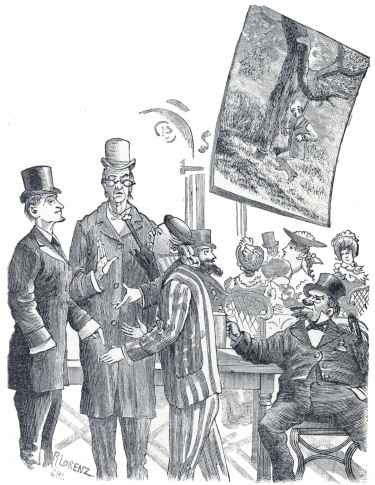
THE YOUNG MAN WANTED TIBBITTS TO MAKE PLAIN THE POINT.
THE REGULAR LEGEND.
It made little difference to her successors. The croupier, that calm,
impassive man, raked in the Napoleons, or raked them out, the wheel
revolved, and the life or death of one habitué of the place made no more
difference than a footprint on the sands of the sea.
German students who, by extravagant living, encumbered themselves with
debt, and who were afraid to apply at home for more money, came hither
to make enough at gambling to restore themselves. They never did it. M.
Benezet was not paying forty thousand dollars a year rent for the
privilege of running a game at which improvident and extravagant young
men could make up their folly—not he. His game was to take what they
had left, without knowing or caring what became of them afterward.
The most common legend of them all is of the young man who walked calmly
into the room with one hundred Napoleons, all he had left, and staked
one piece after another, and lost invariably. Finally there was but one
left. Turning to his friend, he remarked calmly, “This is my life I am
wagering.” He put it upon the black, the wheel revolved, he lost.
Without a word this calm young man went out, and hung himself with his
handkerchief to a tree, where his inanimate body was found the next
morning.
This young man is very plentiful in Baden-Baden, though not much more so
than the same kind of a fellow who, staking his last gold piece, draws a
pistol from his pocket, and shoots himself at the table, the croupier
paying no attention to it, and going on with the game as though it was a
regular part of it, and an everyday occurrence.
Tibbitts frowned upon this legend severely, holding it to be unworthy of
credence. “The young man,” said Tibbitts, “would have gone out and
pawned his revolver for ten dollars, and taken another hack at it.”
And then this young man with a lively imagination went on to show that
no matter how desperate the situation there is always a chance to get
out. His story was to this effect:
A young New Yorker had gone to Paris with some thousands of dollars
given him by his indulgent father, that he might see the world and study
the languages. He studied French with a young grisette whose
acquaintance he had made, and a very pleasant life he lived, till one
morning the two discovered that they hadn’t a dollar between them left,
that he had spent in three months with his syren what was sufficient to
have supported him decently for three years. He dared not send home for
more money, he could not leave his friend (that’s what they call it),
and they had not enough to buy another meal.
The pawn shops were resorted to, till everything they had was gone and
starvation stared them in the face.
They wept over it, and finally came to a conclusion. They loved each
other dearly, they could not live apart, and so they decided to die
together. She rushed out and pawned her last pair of stockings to
purchase charcoal; they closed all the cracks in the room and lighted
the coal, that its fumes might kill them in the regular Parisian style.
The girl died, but life was left in the young man. He rose and broke a
window with a boot—no, he had pawned his boots—but with something,
anyhow, and let in fresh air, which saved his life.
Then he turned and looked at the poor girl on the bed, her long hair
flung negligently over the pillow, her face not wasted by disease, but
plump and fresh as in life.
“Poor Fifine,” he sighed in agony; “how beautiful she is, and how I
loved her and how she loved me! I shall never love again. From this time
out my life, should I live, will be a desert waste. Should I live? Alas!
I cannot, will not live. Why did I spring from that couch and break open
the window? I cannot live without her; I will die with her.”
He commenced closing the window and looking for more charcoal, when
something occurred to him.
“Come to think, I won’t die with her. Dying with her wouldn’t do her any
good, and if I live, she, my love, will perpetually have something to
look down upon.”
He merely walked down and reported a case of suicide, and after the
investigation claimed the body as the next best friend, which was all
right.
THE END OF THE LEGEND OF PARIS.
Then he sold the body to a medical college for dissection, for sixty
dollars, and bought a second-class ticket and went home to New York and
told his mother he had been robbed of his money, and got her to
intercede with the irate father, and is, I believe, living in
comparative luxury to-day.”
“How could he have got out on the street, if he had pawned all his
clothes and his boots?” queried the Young Man who Knows Everything.
Tibbitts answered with asperity that there were so-called men everywhere
in the world who perpetually strewed the salt of fact over the flowery
fields of fancy. “You are the young man, I believe, who made me
miserable the other day, by unearthing the fact that there never was a
William Tell.”
The Professor, after thinking the tale over awhile, said that such a
thing might have happened in Oshkosh, but never in Paris. In Paris the
young woman would have lived and sold the body of the young man and
started a café on the proceeds.
Then the young man remarked that revenge was a fool’s luxury, and that
the New Testament precept about turning the other cheek, was not only
sound in religion, but was the highest good sense, as religion always
is. To nurse a hatred is more expensive than to keep a horse in feed or
a fine watch in repair.
The gambling came to an end finally, and the romance of Baden-Baden with
it. A decree withdrew the privilege of the establishment, another
prohibited the establishing of other places, and on one fateful night in
1872, at twelve o’clock, the bankers turned off their lights, and
Baden-Baden as a gambling resort was no more.
The old gambling house is now called the Conversationhaus and is used
for concerts and balls, and is the favorite rendezvous for the
fashionable world, especially during the time the band plays, in the
morning, afternoon and evening. Then the wealth and fashion residing in
Baden and representing all nationalities promenades the beautiful
avenues, or, making little parties, sips beer and laughs and flirts to
its hearts’ content.
Near the Conversationhaus is the “Trinkhalle,” where invalids, and those
who wish to be thought invalids, drink the famous mineral waters that
have made Baden celebrated all over the world. The rooms are
magnificently furnished, and on the arcade in front of the building are
some fine frescoes illustrating different legends of the Black Forest.

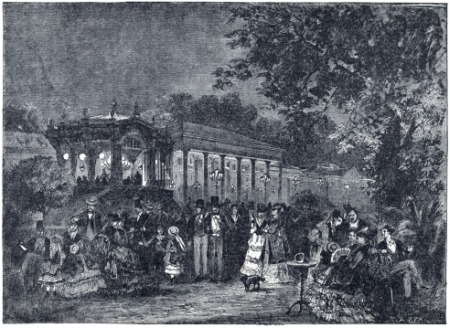
IN FRONT OF THE KURSAAL, AT BADEN.
The peculiar waters of Baden-Baden come from a great many springs in the
hill-sides, and are conducted to the various bathing places in pipes,
and they are as hot as you want them. One of the springs is known as
Hell Spring, because of the temperature of the water, one would suppose,
but the Badenese have another reason for its name. Of course they have a
legend for it, which runs thus:
THE LEGEND OF THE HELL SPRING.
A great many centuries ago an irascible and very wicked old man who
possessed the ground on which the spring is, had, as a matter of course,
a beautiful and supernaturally good daughter. By the way, I never could
understand why excessively wicked men in legends always had so sweet a
lot of daughters, but I suppose it is necessary in order to have
legends.
This daughter was beloved by the son of a neighboring noble who was at
feud with her father, and, as a matter of course, the old man opposed
the match. The present hot spring was then as cold as ice and a most
delicious water for drinking, of which the old man was very fond, which
statement proves the legend to be false. No German noble in this or any
other period of the world’s history ever knew whether the water on his
estate was good for drinking or not. He may have tested it for other
purposes, but never for a beverage. He prefers wine or beer.
One day going down to his pet spring he found his girl there, and with
her her lover. He was enraged, and when the young man told him he loved
his daughter and would wed her, he exclaimed with a horrible oath:
“Wed her! You may wed her when this spring is as hot as hell, and when
that happens I will drink to your nuptials in its waters!”
No sooner said than done. The spring changed from its lovely greenish
blue to a sulphurous and salty color. Great jets of gas with an
unpleasant smell issued, and the water boiled up quite as hot as the
place the profane old man had indicated as a standard. And Satan
himself, with tail and hoofs, and everything complete, appeared, from
where none of the three could determine, and politely handed him a
goblet of the boiling water.
He had sworn an oath, and there was no going back upon it. So he took
the goblet and swallowed the contents and rolled over in agony and died,
as I should suppose any one would.
The young man married the girl, and I doubt not his descendants are
interested in the bath houses supplied from the springs.
It isn’t much of a legend, indeed with a little practice I believe I
could write a better one myself, but it is as they gave it to me.
UP THE MOUNTAIN.
The grand bathing houses are on a scale of magnificence that is truly
wonderful, and one almost feels like shamming illness simply to enjoy
their luxury. Nothing that money can buy, and in Europe as in America,
it will buy almost anything, has been spared to make them as attractive
to the eye and the other senses as possible. They make up Baden’s stock
in trade, and Baden is too good a merchant not to have attractive wares
for sale.
One of the favorite excursions from Baden is up the hill to the south of
the city to the old castle, the walls of which are said to have been
built in the third century, when the Romans constructed fortifications
here. From the twelfth century till the completion of the new castle
nearer the city, the old Schloss was the residence of the Margraves of
the Duchy.
The road leading to the castle winds up the Battert, giving some
beautiful views of the valley, with Baden, rich with its luxuriant
foliage, nestling at the foot of the Black Mountains, whose dark profile
stretches away off far to the north.
Before reaching the steep portion of the ascent, the ladies of the party
were provided with donkeys.
The Professor, whose age and avoirdupois rendered steephill climbing a
matter of great difficulty, determined that he would ride.
A diminutive donkey, scarcely larger than a good sized Newfoundland dog,
was assigned to him, and a most ludicrous sight it was as the party made
its start up the hill.
A gentleman six feet in height, with very long legs and a remarkably
protuberant abdomen, arrayed in a very ill-fitting coat, light trowsers,
a tall hat, and enormous spectacles, with an immense cotton umbrella
under one arm, is not a sight to inspire respect, even when it is
traveling as infantry.
But take that figure and put it astride of a donkey so small that the
rider’s legs have to be drawn up to keep the feet off the ground, and
have that donkey a perverse and mischievous animal (most of them answer
to this description), and it is about as ludicrous a sight as was ever
vouchsafed to mortal ken.
Each donkey is led or driven, as the case may be, by a boy, and the
German boy has all the elements of mischief in him that any other boy
possesses. And so when this especial boy saw that the entire party were
laughing at the Professor, he wisely determined to gain popularity by
adding to the merriment. And so he would wink at the people following,
and twist the donkey’s tail, and the intelligent animal, knowing what
was expected of him, would kick up his heels, and the Professor, one
hand busy with the bridle and the other with the umbrella under his arm,
would objurgate as much as a Professor dared.

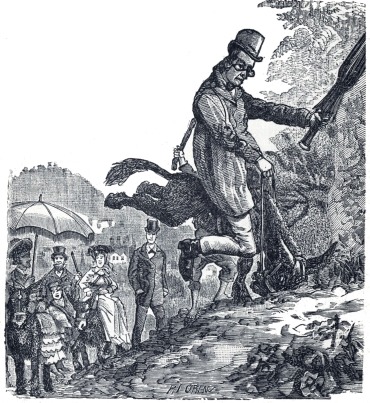
THE DONKEY ENJOYED IT HUGELY.
The donkey enjoyed it hugely, for he kicked up his heels with delight,
and pranced from one side of the road to the other in an ecstacy of
pleasure.
The portly gentleman didn’t seem to think it very funny, although at
last he was compelled to join in the general laugh that went up at his
expense.
TO THE OLD SCHLOSS.
Finally he beat the boy and the donkey both. When the donkey would kick
up behind he simply dropped both feet to the ground and brought him to
anchor; and when he attempted a shy to one side, one foot on the ground
held him to his business; and catching the boy at the trick he took him
by the arm, and, with a grip that long years of flagellating boys had
perfected, pulled him up in front of him, and everything was pleasant
again.

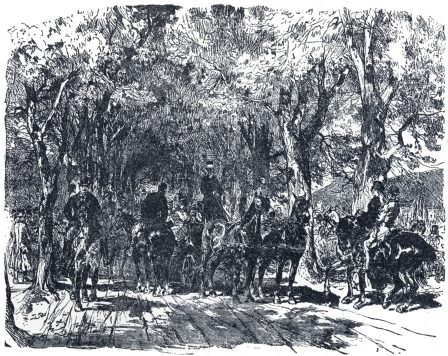
THE LICHTENTHAL AVENUE—BADEN.
As we toiled up the long hill the gathering clouds presaged a rain
storm. Then they broke, and as we reached the old ruin the sun came out
with great brilliancy, and gave us a magnificent view up and down the
broad, fertile valley.
But, unexpectedly, before we had time to go through the various rooms of
the castle the rain began to fall in torrents, which was uncomfortable,
the roof having long years ago succumbed to time, which has no more
respect for a margrave’s castle than it has for a laborer’s hut. Time is
no aristocrat.
We sought shelter in a room that had been fitted up as a restaurant, and
then we were treated to a genuine storm right from the Black Forest. The
wind howled around the open spaces of the ruined wails, the rain dashed
against the window panes in fitful gusts, while above all other sounds
could be heard the creaking and moaning of the trees all around us, as
they were bent and swayed by the storm. It required but a little stretch
of the imagination to fill the room with gallant knights, and to believe
it was the din and clatter of battle we heard without.

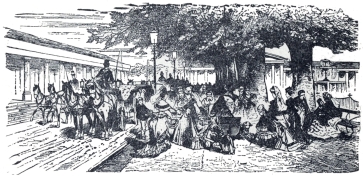
PROMENADE IN BADEN-BADEN.
We were sitting on the ground on which knights and ladies in the
centuries past had sat and feasted. There was not an inch of space
within a half mile of us that had not its story. Mailed knights in that
very room had
“Carved their meat in gloves of steel,
And drank red wine with their visors down.”
WAR AND CARDS.
And possibly their spirits were hovering over us. If they were, we did
not know it; they did not materialize. Instead of the mailed knights and
beardless pages and fair ladies of the middle ages, there was a party of
Americans in tall hats and short coats, ladies in the latest possible
Parisian walking dresses, and instead of the glorious game of war it was
a simple game of euchre, which the men played with the same earnestness
that characterizes them at home in their business, and the ladies with
that utter disregard of rule that characterizes feminine card playing
everywhere. It is needless to observe that in the matter of wine the
example of the old knights was followed, only we had no visors.

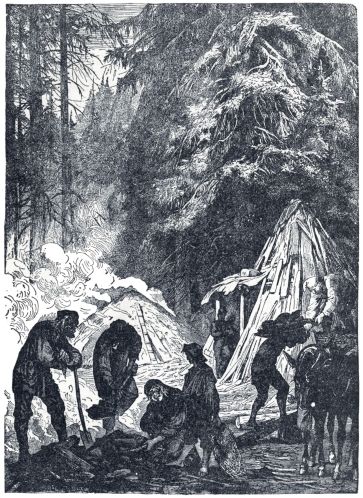
CHARCOAL BURNERS IN THE BLACK FOREST.
A party of Americans playing cards in the castle of a warlike king!
Well! well! There are steamboats on Loch Katrine; there will be a
railroad to Jerusalem, and the holy places will yet be illuminated with
the electric light. There is no room to-day for sentiment.
This castle was built, originally, by the Romans, and fell into the
hands of the Margrave of Baden in 1112. It was necessary in that day to
have these strongholds, from which the margraves could issue and make
war upon their neighbors, that being their principal business. It was
continued as a residence for the Baden potentates till 1689, when Louis
XV. of France demolished it, leaving it, less the ivy that has grown
over it, as it is to-day.
Its principal use now is to give employment to the donkeys to get to it,
and the selling of wine and refreshments to the tourists who hunger
after the delightful view it affords.
The new Friedrichsbad is an imposing edifice built against the hillside
upon which the springs are located. The exterior is a fine specimen of
the Renaissance style of architecture, and is embellished with a great
many fine statues, busts and medallions.
The interior is a marvel of completeness and elegance, being finer in
all its details than any similar bathing establishment in the world. The
wood work is all massive and elegant; the walls and ceilings are
artistically frescoed; the bath tubs, large swimming baths, are cut out
of solid marble, and are so arranged that the bather can go from one to
another, securing any desired temperature without inconvenience.
The water comes from springs on the hillsides, at a temperature of 144°
Fahrenheit, and is conveyed by pipes throughout the building, the pipes
being so arranged that the water is gradually cooled. In this way one is
enabled to bathe in any kind of water he desires. The yield is upwards
of one hundred gallons a minute, and are said to be among the most
efficacious mineral springs known, the solid ingredients, chiefly
chloride of sodium, amounting only to three per cent.
BATHS IN BADEN.
In this magnificent structure, there are the common bath tubs, hewn out
of solid blocks of marble and completely let into the floor, with steps
leading down to them; large hip baths, supplied with a continual stream
of mineral water; an electric bathroom for inhaling the thermal water;
baths for the cold water treatment and the cold shower baths; vapor
baths, hot air baths, swimming baths of different degrees of
temperature, supplied also with shower baths the temperature of whose
water can be regulated by the bather, and vapor baths in boxes.
After taking as many of these as he desires, and having been rubbed in a
room lurid with hot air, the bather is conducted to a large room where
he is enveloped in a warm bath cloak. Then he is taken to a large,
luxuriously furnished room where he lies down for half or three-quarters
of an hour.
When he emerges from the building, he feels like a new man—or says he
does, which is the same thing.
When The Young Man who Knows Everything made that remark, Tibbitts
replied promptly that he most earnestly hoped the change would be
permanent. “My young friend, if you feel symptoms of getting back to
your original self, take more baths.”
Baden merits all the good things said of it. It is a delicious spot, and
if one had nothing to do in life but enjoy it, I know of no place where,
with money, he could get more out of it. Its people are hospitable, and
its physicians will humor you to any disease you choose. If there is
nothing the matter with you, they will prescribe just as cheerfully as
though you had all the ills that human flesh is heir to, and will pocket
their fees with a grace unexcelled. They have had vast experience with
hypochondriacs, and know all about it.
CHAPTER XLI.
HEIDELBERG.
THERE is hardly a man, woman or child in the world who has not heard of
Heidelberg, and who does not know something of this famous little city
of students, wine, beer, castle and casks. It is a place better known,
probably, than any in Europe of its size and non-political importance,
and it entertains more sight-seers than any other. It is well worth the
attention given it.
Heidelberg is beautifully situated on the River Neckar, about twelve
miles from its junction with the Rhine, and a more delightful spot for
establishing the seat of a palatial residence does not exist in all
Germany.
On the one side is a high range of hills, on the other the beautiful
Neckar, the opposite bank of which is covered to the tops of the lovely
hills with terraced vineyards.
The very first thing the tourist has to see is the old Schloss, founded
by the Count Palatine Rudolph I., about the beginning of the fourteenth
century. It has passed through remarkable events. Various princes and
electors improved and fortified the original structure of Rudolph,
until, in 1720, when Elector Carl Theador rebuilt it, it covered a vast
extent of territory.
THE OLD SCHLOSS.
Situated on a spur of the Königestuhl, it is surrounded on three sides
by beautiful woods, while on the fourth the River Neckar flows past the
town down a wondrously beautiful valley, and loses itself in the Rhine,
twelve miles below. The outside walls are plain and unpretending, being
designed entirely for defense. But inside, the façades are embellished
with fine carvings, allegorical figures, the window arches having
medallions of eminent men of ancient times. In niches around the front,
facing the entrance, are statues of the sixteen Counts Palatine. This
front is thought to be the most magnificent, architecturally, of any of
the four, combining, as it does, four different styles: Doric, Tuscan,
Ionic and Corinthian. It certainly is very imposing, and before it was
battered and disfigured by cannon balls, during the war of 1693, it must
have been a wonderfully fine piece of work.

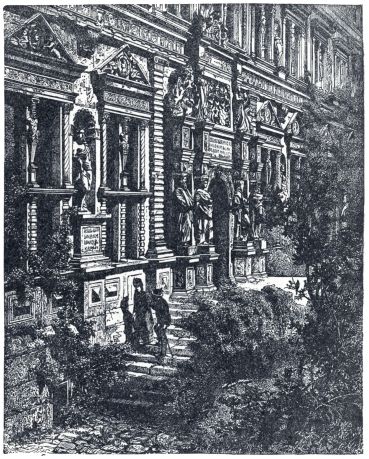
HEIDELBERG CASTLE, INSIDE THE COURT.
The regular thing to do at Heidelberg is to go through the great,
gloomy subterranean passages that wind in and out under the massive
pile. It is not a cheerful trip, but it gives one a good idea of the
solidity of ancient masonry, and of the security of their old dungeons.
The Grand Balcony is a wide, well-built terrace on the river side of the
castle. From this point the view is magnificent, the whole Neckar valley
being spread out like a map, below us. Then we go on through great
rooms, whose ivy-covered walls once resounded with song and merry jest,
to the huge tower at the eastern angle of the castle. This old tower is,
or was, rather, a monster, being ninety-three feet in diameter, with
walls twenty-one feet thick. In 1689, when the French General, Melac,
was obliged to surrender the castle and town to the Germans, he blew up
the fortifications and set the castle on fire. The attempt to demolish
the tower was only a partial success. The walls were so thick and so
well built that the explosion only detached about a half of it, which
fell, a solid mass, into the moat, where it is to-day, as solid as it
was two centuries ago, though now its rough sides are covered with
shrubs and ivy.
The best view of the castle in its entirety is from the Great Terrace,
quite a little distance from the garden that surrounds the grand old
ruin. From this height is seen the beautiful valley, with the town
spread out in irregular shape on the banks of the Neckar. Across a deep
ravine, beautifully clothed with green, is the ruined castle, standing
out in bold relief, the ruined tower, the dismantled walls, the grand
promenade making a picture of rare beauty.
The castle is decidedly the finest structure of the kind in Europe,
beautiful in its location, beautiful in its design, and beautiful even
in its ruin.
Like most things that are interesting in these old countries, it is,
however, a remembrance of the days when force was the only law, when the
sword and the spear were the only arbiters, and he who had command of
the most of them was the ruler.
THE DESTRUCTION OF THE CASTLE.
It has had many masters. In 1685 Louis XIV., of France, set up a claim
to the country and invaded it. Of course he had no earthly right to it,
any more than the then occupant, but that didn’t matter. They didn’t
split hairs in those days.
When a king wanted an adjoining country he simply figured up how many
cut-throats he had and how many cut-throats the king had that he
proposed to go for, and if he had more cut-throats than the other king,
why he went for him.
And so Count Melac, Louis’s chief cut-throat, assailed Heidelberg, and
the city and castle capitulated to him. He occupied it during the Winter
of 1688, but as the German armies were approaching in too great force to
suit his notions, in March, 1689, he evacuated the place, having first
blown up the fortifications and burned the town, and made what havoc he
could. Four years later the French finished the destruction, then the
Germans rebuilt it in part, but, as if fate had a spite against it, it
was struck by lightning shortly after and was abandoned as a fortress
and palace, and so it stands to-day.
Ruin as it is, it is the most wonderful combination of nature and art I
have ever seen or ever expect to. The old kings who built it had good
eyes for effect as well as defense. The mountain is three hundred and
thirty feet above the river, and it is a precipice inaccessible except
by winding paths, which, when fortified, an hundred men might hold
against ten thousand. This before the days of rifled guns. Our present
artillery would knock the place as it was into a cocked hat in an hour.
But in those smooth-bore days it was a place of strength, and could only
be taken by a systematic siege.
We are much obliged to the French for one piece of vandalism. When they
evacuated it the last time they tried to blow up the principal round
tower. They placed a frightful amount of powder in it, and it exploded,
but so well had the work been built that it merely broke off about a
third of it, which toppled over into the moat and still lies there as it
fell. The walls at the point where the break is, are twenty feet thick,
and are as solid as a rock. There was no shoddy in this work. There
needed to be no shoddy, for the work cost the Rhine robbers who built it
nothing. They confiscated the quarries for the stone, and then drafted a
sufficient force of men from all parts of their dominions to do the
work, feeding them upon black bread and sour wine, which they seized
also, making the building of almost any kind of a castle a very cheap
affair.
It is a curious place—this reminiscence of the past. There are miles
of halls, of passages, secret and open; there are drawbridges and
turrets, and posts for warders; there is the enormous terrace,
overlooking the beautiful Neckar and the vine-clad hills on the opposite
bank; there is the wonderful court in the interior, the walls facing
inward, rich in statuary and wondrous carving, grandly even though a
ruin.
Imagine this vast structure when it was itself, filled with knights and
ladies, on the night of some festival! Think of it, with lights gleaming
from every window, the terrace filled with happy dancers, and the
immense court full of pleasure-seekers!
There have been high jinks in the old Schloss. It must have been a
wonderful place for everyone except the wretched peasantry—whose
unrequited labor built it, whose unrequited labor supported it, and
whose bodies defended it.

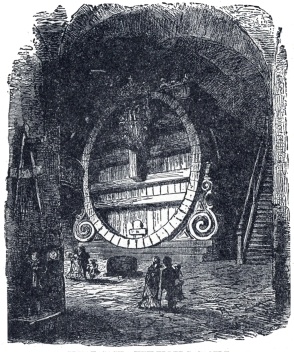
GREAT CASK—HEIDELBERG CASTLE.
It is well that it is in ruins. Its walls are royal, and, the fact is, I
hate everything that savors of royalty.
THE STUDENTS.
In the castle is the famous tun of Heidelberg. This famous cask is
twenty-six feet high and thirty-two feet long, and it holds, or rather
held, for it has not been filled for several years, eight hundred
hogsheads of wine, or two hundred and thirty-six thousand bottles. There
is a platform on the top of it, upon which a cotillion can be
comfortably danced.
The University at Heidelberg has in course of preparation for future
beer drinking some eight hundred students, from all the countries of the
world. I suppose they do pay some attention to studies, that they do
attend lectures and recitations, and all that sort of thing; but all I
saw them do was to drink beer, which they do in a way that no other
class of young men in the world can. It is a large thing in Heidelberg
to be able to drink more beer than any one else.
Smoking divides the honors with beer, although, as one student can smoke
about as much as another, there is not that opportunity for display of
talent that there is in beer drinking.
The students are all in societies or clubs, and each club wears a cap of
a peculiar color. You go into one of the innumerable beer halls, and you
see at one table students with blue caps, at another with red, and
another with yellow, and so on. They never mix, and each society is at
deadly feud with all the others. They sit, and sit, and sit, at these
tables, drinking beer out of mugs, and smoking enormous pipes, mostly
meerschaum, which they are at great pains to color.
As a red-capped student is supposed to be at mortal feud with all the
other colored caps, duels are as common as beer—and I can’t say more
than that. But a duel in Heidelberg is not a remarkably sanguinary
affair. It is about as harmless as a French duel. They don’t fight with
revolvers at ten paces, or shot-guns at thirty, or sabres, or anything
of that sort; and instead of trying to kill each other, every possible
precaution is taken not to kill at all. The weapons are rapiers, very
sharp, and ugly enough, if the duelist really meant business; but both
contestants are so swaddled in cloths, so wrapped in cotton defences,
that any harm, aside from a cut in the face, is impossible. They fence
and thrust, and do all sorts of things, the object being to inflict a
wound upon the face; and the student receiving the wound is very proud
of it, and if his flesh is healthy enough to heal without a scar, he
tears it open. The scars he must have, for they are testimonials, as it
were, of his bravery.
So you see on the streets of Heidelberg any number of students with
their faces scarred and seamed, horribly disfigured, but not one of them
would sell a scar for anything earthly.
Their beer-drinking proclivities I have referred to. Tibbitts had a
letter to one of the red-capped students, who immediately introduced him
to his club, and the result was—beer. The quantity that Lemuel could
consume nettled his friend, and an attempt was made to put him under the
table. The Professor, who believes that there is a devil in every drop
of beer, warned Tibbitts against joining the party.
“They will get you intoxicated,” said the good old man.
“Will they? Perhaps they will. But, Professor, a young man of good
physique, a son of nature, who has lived in Oshkosh, need not fear any
man who comes of the effete civilization of Germany. Don’t fear the
result of this encounter. I shall do credit to the old flag. To my
beloved country I dedicate my stomach. I will fetch them all.”
And so Tibbitts sat down with them, and he drank as often as they did
for a half hour, then he urged the drinking, and he called for larger
mugs.
There was consternation among the students. Tibbitts’ friend was the
President of the club, and a mighty man among the beer drinkers; indeed,
he owed his official position to his prowess in this line, and here was
a fresh American urging him to deeper and deeper draughts.
The contest waxed warm. One by one the feebler men dropped out until
only two remained—Tibbitts and the President. Tibbitts was cool and
collected, the President was hot and flurried.
Tibbitts made the President understand that he wanted larger mugs. He
explained that he was thirsty, and that the time consumed in bringing
the small mugs (they held nearly a quart) was so much waste, and that
the effect of one quencher died out before another could be brought.
What he wanted was a mug that held some beer. He was not a baby, but a
man.
MR. TIBBITTS AND THE STUDENTS.
And so mugs were brought about twice the size of those they had been
using. Tibbitts touched his opponent’s mug in good-fellowship, after
the custom, and putting his lips to it drank it off at one pull, and
tapped on the table to have it re-filled, to the delight of the other
colored caps, and the dismay of the reds. The President smiled in a
sickly sort of way and drank. He finished the mug, and leering wildly
around the room, made a feeble attempt to get his pipe to his mouth,
reeled and fell prostrate. He was vanquished, and his friends bore him
senseless from the floor.
“The idea of a mere German attempting to drink with a man who was weaned
on Oshkosh whisky,” said Tibbitts, contemptuously. “I am now just in
humor to tackle the Vice-President, Secretary and Treasurer of this
Club, all at once.”

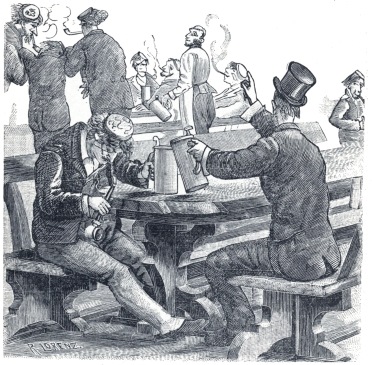
MR. TIBBITTS AND THE STUDENTS.
He did not, however, for they were all gone. But the honor of America
was saved—according to the notion of Tibbitts.
A curious place is the famous restaurant on Haupstrasse, which for many
years has been the resort of the University student. Here he sits and
drinks his beer at a table that is literally covered with the names of
students carved in the solid oak. Many of the names there engraved are
now known the world over, though when they were cut there, many decades
ago, the youthful carvers were great in literature, science or art, only
in the dreams of their early manhood.
CHAPTER XLII.
AN INLAND GERMAN CITY—MANNHEIM.
IT was comfort to get out of the beaten routes of tourists, and find
yourself in a city where you do not hear English, and where the
sight-seer with the inevitable guide book and field-glass, does not
display himself. It was a relief to get into a city that had not been
half Anglicised and Americanized by the constant stream of tourists that
pour over Europe every Summer, where you could see Germany and the
Germans, pure and simple. Such a place is Mannheim, at the confluence of
the Rhine and Neckar, twelve miles below Heidelberg.
Mannheim is a delicious old city, once the seat of the grand Dukes of
Baden, but now the seat of what is a great deal better than grand dukes,
much merchandising and manufacturing. It is the only city in Europe that
is laid out like Philadelphia, in regular squares.
The principal pride of the Mannheimers is their theater, and the
Mannheimers have every reason to be proud of it, for, in addition to its
being one of the best conducted in Europe, it is where Schiller and
other great German poets won their first successes.
The Germans amuse themselves at public cost whenever possible. For
instance, this beautiful theater, which contains costumes and stage sets
for all the standard operas, is supported by the city government. There
is a small fee for admission, (I believe the most expensive seat in the
house is a trifle less than a dollar, and ranging down from that to ten
cents), but the deficiency is put upon the tax duplicate and paid the
same as other taxes.
Nowhere in Europe are better performances given, either operatic or
dramatic. The principal characters are assigned to artists of the very
highest order, the orchestra is made up of picked musicians, every one a
soloist, and the chorus is not that mass of associated howlers that
drive us mad in America; but the members are trained singers, as well as
actors.
For the presentation of Wagner’s “Lohengrin” there was an orchestra of
fifty-eight in number, a chorus of two hundred and fifty, and as many
more supernumeraries. Nowhere is the detail of a presentation so
carefully and conscientiously worked out, and nowhere an opera more
satisfactorily given than in this little German city of less than fifty
thousand.
The singers enter into a contract with the Direction for a term of
years, and if they sing or act the full term they may go elsewhere, but
they are pensioned by the city for life. Their salaries are very small,
but the resultant pension is so comfortable a thing that they never
break their engagements and never do slovenly work.
The Sunday night we reached Mannheim, Wagner’s “Lohengrin” was given,
the performance commencing at half-past five in the afternoon and
continuing till eleven at night. It was not as in American opera houses.
There wasn’t a note omitted, a song, or line of text cut; the entire
opera as it came from the composer was given with a degree of
conscientious care that the American party had never heard before.
OPERA IN MANNHEIM.
Tibbitts was in a state of surprise all the time. First going to an
opera, not a matinee, in daylight; and then another custom that was as
novel and strange as the hour at which the performance began. After
entering the vestibule we passed through a long hallway lined with
shelves; on these shelves the gentlemen placed their hats, overcoats,
canes and umbrellas, and then passed into the auditorium without getting
any check for the articles so left.
“Imagine,” said Tibbitts, “an American theater with a free cloak room in
the lobby! How many hats, coats and walking sticks would be left by the
time the entertainment was over? Think of such a thing in New York, or
even Oshkosh! Why, in Oshkosh the boys out of one such audience would
supply themselves with overcoats, hats and umbrellas for a year. It is a
temptation even to me, as well as I have been brought up.”
The opera of Lohengrin is extremely difficult to render, but in this
little German town of only forty-seven thousand inhabitants, it was done
in a manner that would surprise the grand opera goers of New York, or
even Paris or London. The stage settings were magnificent, every detail
being most carefully and faithfully attended to.

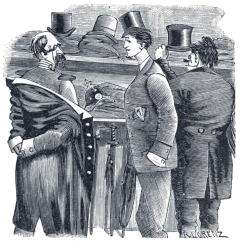
TIBBITTS IN THE CLOAK ROOM.
Wagner’s music, to be fully appreciated and enjoyed, must be heard under
the most favorable circumstances—at the Mannheim Court Theater, for
instance. There is an individuality about it, an expression of thought
by sound, that has never been equalled by any other composer. And when
performed by such a company as that at Mannheim it rises to the sublime.
Every member of that great company from the star down to the most humble
member of the orchestra, was a thorough artist, and having had the very
best training they interpreted the divine work of the great master in
the same spirit in which it was conceived. It was a rare performance.
“Tannhauser” was the next opera, and performed as carefully as
“Lohengrin”. It was enjoyed by the entire party except Tibbitts. He is
not musical or asthetic. And so when the Young Man who Knows Everything
went into raptures over the wonderful orchestra, Tibbitts spoke of it
contemptuously as “sound factory.” And he jeered at the procession of
pilgrims who, in the opera, are returning, to delicious music, from
Rome, where they had been for their sins. “Yes, that’s the way of it.
They load up with iniquity and go to Rome, if they are Catholics, or
somewhere else if they are of other beliefs. Then they come back as good
as new and entirely ready to take another load.”
He criticised other points in the opera. Tannhauser was in despair at
having committed the unpardonable sin of heathen worship. “You see how
it is. Other sinners who had merely committed murders and sins like
that, made a pilgrimage to Rome and were absolved, but Tannhauser knew
better. Religious power forgives everything except joining the
opposition shop.” And he was particularly severe upon Tannhauser for
confessing his sin to his love. “For,” he continued, “had he kept it to
himself it would have been just as well. But I suppose it had to be. Had
Tannhauser kept his counsel and married the girl, the opera would have
closed at the second act.”
Mannheim is a purely commercial and manufacturing town. It enjoys a most
picturesque situation. Its streets are regular and handsome, and in the
outskirts of the city are numerous pretty parks, which add greatly to
the beauty of the place.
When, in 1821, the Elector, Charles Philip had ecclesiastical
differences with the Protestant citizens of Heidelberg, where up to that
time he had his court, he transferred the seat to Mannheim, which from
that time became an important place. The town was founded in 1606, and
destroyed by the French eighty-three years later.
During the residence there of Charles Philip, the spacious castle, which
occupies the entire southwestern portion of the town, was built, and
though it suffered partial destruction in 1795, it has been restored,
and with the lovely grounds surrounding it, forms one of the most
attractive spots in Mannheim.
THE DIFFERENCE IN PEOPLE.
In appearance Mannheim is quite modern, though some of its buildings
bear the impress of the hand of time. But as a rule, its wealthy
citizens, with the enterprise and go-ahead activity that characterizes a
mercantile people, have erected solid substantial buildings of the most
approved modern style, which gives the city the look of wealth and
business success it possesses.
The theater, next to the castle, is probably the oldest building in the
town. It was constructed during the last century, and restored in 1854.
The people of Mannheim are industrious, hard-working Germans, full of
enterprise and business tact. During business hours they are always on
duty, but, with the purely German characteristic, as soon as business is
over they devote themselves to innocent amusement with as much gusto as
they do to their work during the day. And the German citizen is not
selfish in his enjoyments. He wants his whole family to partake of them
with him. So in the evening, in the parks where the bands play, you will
see him surrounded by his whole family, wife, daughters and sons,
sipping beer, chatting with friends, and enjoying the music. They are a
social lot of people, these Germans, and know full well how to get all
the pleasure there is in life.
They differ materially from the French and the English. The French are
full of life and vivacity that spur them up to an unusual state of
activity all the time. They must have a constant excitement, and noise,
and show, or they are miserable. He is the most generous man in speech
and the closest man in action in the world. He is effusive. He will, on
a steamer, embrace you at parting, and insist upon your making his house
your home when you visit Paris. He will swear that he will devote his
whole time to you, that he will take it as a mortal affront if you do
not command him, and all that. But don’t take too much stock in it. He
doubtless means it while he is saying it, but when he reaches Paris, and
you find him there, it is quite another thing. You are not necessary to
his happiness any more, and in the most adroit and suave way he gets rid
of you, and forever.
Very like people the world over, however. The man who applauds a
virtuous sentiment the most vehemently at a theater is the very fellow
who will go home and kick his wife, and the wildest approver of
patriotic sentiments is the very man who goes to Canada to avoid a
draft, or jumps the bounty for a thousand dollars. The Frenchman makes
the best outward show of any one in the world, but his goodness is very
thin. It will not bear the solid weight of actual use.
The Englishman delights in what he is pleased to think dignity, but what
is really overweening conceit. He is pompous, dull and heavy. If he does
a good thing, he does it in such a way as to make it an offense.
The German is neither the one nor the other. He goes through life
tranquilly, in perfect content with himself, always making the best of
his opportunities, and in a perfectly rational way getting all the
enjoyment he possibly can.
He does not profess to be your friend unless he is so in good faith, and
when he invites you to his house he always means it. He is rather
careful about his friendships, for as he never falsifies in this, he
needs to be, but when once said it is done. A rare good man to meet is
your German. He has his peculiarities, but he is good and solid all the
way through.
In Mannheim, as in all German communities, the absurd American fashion
of treating is most sternly discountenanced and tabooed. The true German
will not have it at all, at any price. Your friend asks you to join him
in a bottle of wine, and you accept, but that does not mean that he pays
for your drink. Not at all. He desires you to join him because you are
his friend, because he likes your society, and because he wants to talk
to you and have you talk to him. And when the bottle, or three, as a
German says, is consumed each pays for what he has had and they go their
way.
Consequently the bar-room beat so common in America is an unknown
institution in Germany, and the beery, bloated pimpled faces hanging
around public places waiting for invitations are never seen.
A TREATISE ON TREATING.
Mr. Tibbitts most heartily approved of this custom. He remarked that the
American system of treating came very nearly ruining him. In Oshkosh he
had a very large circle of close friends, who loved him dearly. They
were very fond of him, why, he would not say, because he was a modest
man. It might have been that they admired his physical graces, or
possibly his intellectual endowments—men have tastes that cannot be
accounted for. I met one gentleman on this trip who admired the Young
Man who Knows Everything; that is, he said he rather liked him.
He was studying law in Oshkosh, and after wrestling all the forenoon
with his studies he was, naturally, mentally as well as physically
exhausted.
“I tell you,” said Mr. Tibbitts, “when a young and enthusiastic student
at law has been poring all day over the pages of Walter Scott, or
Dickens, or Thackeray, with only an occasional intermission at a
beer-shop across the street, without feeling something like a squeezed
lemon, he is a strong man indeed. I am physically fragile, and my active
mental nature makes fearful drains upon my body.
“And so on my way to my boarding house for dinner I was accustomed to
stop over a minute at the Spread Eagle Hotel, to take one solitary
cock-tail, which I really needed as a bracer, as it were, to the system;
something that would encourage nature to the point of taking in a full
meal, a meal that would hold me up to the work of the afternoon.
“Now here is where the infernalism of the American system comes in.
There would be at the bar every day at the same hour seven fellows, all
good, jolly men, all particular friends of mine, who came there, as I
did, for just one drink. Now, understand, I went in there for one drink,
which I felt I needed, and one drink only. But seeing the other seven in
classical poses about the bar, I could do no less than to ask them to
join me, which, in the freshness of youth and the first blush of a
strong manhood, they always did promptly. After a minute of joyous
conversation, Snedeker would wink at the barkeeper, who would set before
us another. More talk, a little more cheerful than before, and Wilson
would insist upon all drinking with him. Still more talk, and Adams
would consider it an offense if we did not take just one more with him.
“By this time any one of us would have taken something with anybody, for
good sense, that faithful though easily overcome sentinel over our
passions, had been driven out, and we were on the high road to
inebriety. And there we would stand, and stand, taking ‘just another
one,’ till we had forgotten all about dinner and everything pertaining
to life, except of that article contained in the bottles before us.
“I have known these incidents to cover a great space of time and much
territory. I have gone into the Spread Eagle for just one cock-tail, and
in consequence of the infernal American system of treating, have found
myself a day or two later in St. Louis, paying a most recklessly
incurred hotel bill from money obtained by pawning my watch and
overcoat. And once I extended the excursion as far as New Orleans, and
probably would have gone on through Mexico if delirium tremens had not
kindly put in an estopper.
“If we did in America as they do in Germany I should have gone in and
taken one cock-tail and gone to my dinner and returned to my studies,
and gone home to my supper and have been a good and useful citizen.”
And Tibbitts having got fairly launched upon the wide ocean of drinking
continued:
“Americans are fools in their way of drinking. All other peoples have a
defined idea of what they want to accomplish with stimulants, but the
American has not. Your Englishman wants to get stupid drunk; he wants
forgetfulness, which I can’t blame him for. Were I living in England I
should want forgetfulness in large doses. I don’t blame an Englishman,
condemned to London climate and London customs, for drinking. The
Frenchman and German drink just enough to produce the requisite
hilarity, the general good feeling which light stimulants in moderation
produces, and then they quit. An American does nothing of the sort. He
drinks through all the stages, the slightly exhilerant, the mild
hilarious, the boisterous idiotic, the brutally quarrelsome, the pitiful
maudlin, and then slips off his chair harmless because helpless.
“Why, I have heard a nine-tenths drunken man rouse up his companion by
shaking him, with the appeal: ‘Jimmy, rouse up! Can’t you stand
another one?’
WHY MR. TIBBITTS WAS NOT A TEMPERANCE LECTURER.
“Just think of it! In this fellow’s case there was no pleasure to be had
from the drinking of ‘another one.’ His poor, outraged stomach rebelled
against it, the very smell of it was death, and the taste worse than
death, and yet he was asked if he could not endure ‘another one!’ He
was asked if his abused system could not be further outraged. And he did
manage to stagger up to the bar and swallow another dose of poison,
which was the last straw that broke the camel’s back. His indignant
stomach deposited it on the floor with great promptness. A moment’s
rest, and he did take ‘another one,’ and subsided into a miserable
sleep.
“I have seen so much of the infernalism of the American treating system
that I could deliver a wonderful lecture upon that and kindred
temperance subjects.”
“Why don’t you lecture on temperance?” asked one of the party.
“Alas! I am not a reformed drunkard,” was Tibbitts reply.
Then up spoke the Young Man who Knows Everything.
“My dear sir, all you have to do is to reform.”
Tibbitts disdained to answer this, and walked moodily away.
CHAPTER XLIII.
FROM MANNHEIM TO FRANKFORT-ON-THE-MAINE.

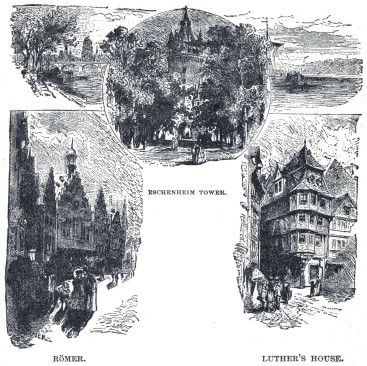
ESCHENHEIM TOWER.
RÖMER. LUTHER’S HOUSE.
We had a great deal of trouble to get out of Mannheim. All German
railroad officials are in uniform, and the regulations are about as
strict in the railroad service as in the military. The train we were
compelled to take left at six o’clock in the morning, and we were at the
station promptly. That is, we had four of five minutes in which to get
our tickets, see to our baggage and go on. We hurried to the little
window in the ticket-office, but it was down. Through the window we
could see the official in an ordinary coat, and we knocked on the glass.
He did not open it, but sat there, nervously consulting his watch. The
minutes were rushing on, tumbling over each other with frightful
rapidity. But still he did not open the window, and we were ticketless,
and the train was within a minute of departure.
RED-TAPE.
What was the matter? Why simply this: The ticket agent had sent his
uniform coat out to be brushed and the boy had not returned with it. He
would no more think of selling a ticket except with that blue coat on,
buttoned up to the chin, and with every button there, than he would have
thought of cutting off his right hand. It mattered not that passengers
were waiting, it mattered not that the engine was whistling its last
warning notes, that coat was not brushed and on the official’s back, and
no tickets could be sold till it was.
Fortunately the boy came with the coat, the official got it on somehow,
the train waited two or three minutes, tickets were sold hurriedly and
we did get away.
What would have happened if the boy had not come back with the coat at
all, no one can answer.
Certainly no one would have got tickets till he got his coat, and we
should all have missed our train.
Red-tape is a great institution, and nowhere do you see more of it than
in Germany. But we got away finally to Frankfort.
Contrasting strangely with Mannheim’s straight streets and quiet
unpretentious business blocks, is the very peculiar city of Frankfort,
where within a stone’s throw of each other are streets so entirely
different, that in one you may imagine yourself on Broadway, while in
the other you may with equal propriety consider yourself set back five
or six hundred years.
New Frankfort is the newest city I know of. It is more fresh and recent
than Broadway. It is very like Broadway, except that its buildings are
less garish, and more solidly built.
The line between the old and the new is only a street, and the old is
the oldest in Europe, as the new is the newest. The contrast is
wonderful. It is the fourteenth century and the nineteenth shaking hands
across the chasm of time. It is the mediæval knight and the London
exquisite side by side. The same may be seen in all European cities, but
nowhere so striking as in Frankfort.
Approaching the city you see the old watch towers high on the hills that
surround the environs of Frankfort, those remaining monuments of the
reign of force, when the people, ruled mercilessly by the nobles,
erected these towers from which the usurpers watched each other. Germany
is not yet free from this kind of rule; it has merely taken a different
form. Gunpowder changed the form of force, but not its spirit. These
once impregnable fortresses would not stand a minute before the
artillery of the present, and so they are abandoned. But in their stead
are the regiments we saw in Mannheim and everywhere else, each one a
fortress of flesh and blood. Germany will get rid of the whole of it one
of these days, and the million of men employed to support that one
unmitigated curse of the world, royalty, will be added to the productive
power of the country instead of living upon it.
SOLID BUILDINGS.
As we leave the fine station and enter the wide “Anlagen,” or public
grounds, that completely encircle the city and are lined with handsome
buildings, it is hard to realize that the city of Frankfort dates from
the time of Charlemagne, and that it has for centuries played an
important part in the history of Germany. From the year 1152 the German
emperors were chosen in Frankfort.
The Kaiser-strasse leads directly to the center of the city, and is
lined with magnificent business blocks and dwellings. The street is wide
and well kept, the buildings are all of the modern style of
architecture, built of cut stone, and they present a fresh and
attractive appearance.
Speaking of buildings in European cities, it would be fortunate for us
of America if we could imitate them ever so slightly. In London I
visited a steam fire engine house, and was amused at the clumsiness of
the apparatus, and the slowness in general of the entire concern. The
horses, for instance, were stabled around a corner! In New York the
horses are in the same room with the engine, fastened so they may be
unhitched by electricity, the men sleep in their clothes above, and
everything is arranged so that in one second the engine is on the
street, and on its way to the fire on a run.
“How long does it take you to get out upon the street?” I asked.
“From seven to ten minutes.”
“Why, in America we get out in two and one-half seconds.”
“Y-a-a-s, and so would we, if we built tinder boxes.”
There he had me and had me badly. There is no necessity for rapid and
extensive fire departments in Europe, for the houses are not mere lumber
yards, as with us. When a man wants to build in a European city he has
to get a license. His plans are submitted to the authorities, and, if
approved, a proper authority stands over the work and sees that it is
properly built. You are not permitted to run up a fire trap in the midst
of valuable property; you are not permitted to build a showy sham that
may be burned to the ground in ten minutes. Nothing of the sort. Your
walls must be solid, your staircases of stone, and open, not of pine
with the space under them for coal-oil depositories, there must be so
many escapes from the building, the roof must be metal or slate, and the
walls must be so built that a fire cannot get beyond the room in which
it originates, and the only damage that can possibly result is the
destruction of the contents of the room, and such damage as smoke and
water may inflict. When a fire occurs in one room in a house, the
people in the other rooms keep on as usual. It does not annoy them, for
the fire cannot spread.

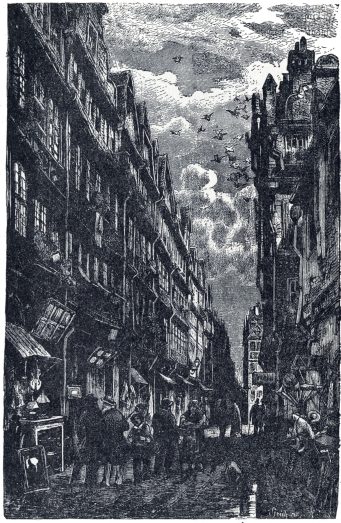
FRANKFORT-ON-THE-MAINE—THE JEWS’ STREET.
THE JEWS’ STREET.
No one dreads to occupy a room on the fourth floor of a European hotel,
for the idea of fire never occurs to one. They seldom have fires, and
when one occurs it is counted a misdemeanor on the part of the owner of
the premises.
This all comes of solid and substantial buildings, to begin with. As a
matter of course, a house costs something at the start, but when you get
through you have a house for all time. The modern buildings in Frankfort
will be standing and in good repair centuries hence. I wish I could live
to verify this assertion, but I suppose I shall not.
Going on through the Kossmarkt, where there is a fine monument to
Gutenberg, we came to the Zeil, a very beautiful street, and then,
turning to the right, found ourselves in the celebrated Judengasse, or
Jews’ street, one of the most dingy, wretched, forlorn quarters that can
well be imagined.
The street is narrow, dirty, and squalid. The houses are high structures
in the last stages of decay, many of them having great props to keep
them from falling. The inmates of these apologies for houses are as
dirty and squalid as the street itself. There are little pawn shops,
dirty shops where old clothes are sold, an occasional tenement house,
and very many liquor stores. It is the very acme of squalor and is in
great contrast with the elegance of the Zeil, only a block or two away.
A dirty, squalid, beggarly-looking street is Judengasse, but who knows
what wealth is hidden behind all this apparent poverty? The Jew of
to-day is no less acute than the Jew of the fourteenth century. He has
all the wisdom of his ancestors in money getting, with the added
experience of time. He can no longer be hauled up by a mailed knight,
and compelled to disgorge; but in the stead of the robber, by the strong
hand, there is the tax-gatherer; and, in his passion for the
accumulation of wealth and disinclination to part with it, the Frankfort
Israelite hates the one as heartily as his ancestor did the other. The
American Israelite lives as bravely and ostentatiously as any man, and
even more so, but the habit in the old European cities is to conceal
wealth, to live meanly, and to find enjoyment, not in the using of money
but its accumulation.
This street has always been set apart for Jews, and down to the year
1806 it was closed every evening, and on Sundays and holidays,
throughout the entire day, and no one of its inhabitants were allowed
in any other part of the city, under heavy penalty. Until the time of
the Prince Primate, in 1806, no Jew was ever allowed to enter the
Römerberg, or market place in front of the town hall. It is said that
while the persecutions of the Jews from the twelfth to the seventeenth
century throughout the continent was merciless, it continued longer in
Germany than any other country, coming down, in Frankfort, even to the
present century.
Notwithstanding the abridgement of their rights, a great many of the
Jews attained wealth and distinction. The house is still pointed out in
Judengasse where the Rothschilds, the founders of the present great
banking house, lived during those troublous times.
It is the same old story. The Jews, despised, persecuted and outraged in
every way, bore everything patiently, waiting for the time for their
revenge. And their revenge has come in every country. In the olden days,
in all the countries of Europe, the Jew had no rights which any other
nationality or blood was bound to respect. He was outside of the law. He
was taxed at the caprice of every prince and power. He had no chance in
any court where a Christian was opposed to him, and when they differed
among themselves, it was made a pretext to rob him. The most absurd laws
were made against them, and it really seemed as though the native rulers
and their subjects laid awake nights to invent ways to oppress them.
All this has changed. With a power of endurance simply wonderful, they
bowed their heads to their oppressors, and, as all oppressed people do,
substituted cunning for brute strength, and trained minds for lusty
thews and sinews. They won in the end.
The despised family of Rothschild, once compelled by the haughty
citizens to confine themselves to one quarter of the city, is now its
boast. The Frankforter takes more pride to-day in the fact that the city
was the home of the Rothschilds, than it does in the fact that it was
for centuries the seat of government of the German Empire. The Jew in
Europe, while yet under something of a ban, is not the despised creature
he was. The world has learned to respect him.
SOMETHING ABOUT JEWS.
There is not a calling in Europe that a Jew is not at the very head and
front of. He has composed all the great operas, the sons and daughters
of Judea are the great actors and singers of the world; in law and
divinity, and learning of all kinds, they stand at the head, and in
finance they are the world’s creditors. A convention of Jew bankers
could be called together who could shake every throne in Europe.
Kings and nobles don’t pull the teeth of Jews any more to extract loans.
On the contrary, they come into the presence of these great financiers
with hat in hand and humble step. The Jew holds the forceps now, and it
is the noble’s teeth that are pulled. How, in the absence of all law,
hated, despised and contemned, and persecuted, they could amass wealth,
is a mystery, but they did it.
When persecution in one State got too warm for them they always had
enough wealth to get away to another, and they always found a prince who
needed money badly enough to give them protection, for a time, at least,
and these same princes were wont to become silent partners with the Jews
in the work of eating up their own subjects with usury, which held until
the Jews got the upper hand, when the prince always made a raid upon
them, paying his debts to them in this way, and they flitted.
Finally they got some measure of rights, when they made themselves felt.
The hatred of Jews continues in Germany and Russia, for the reason that
their superior energy and acuteness has made them the masters of the
trade of those countries. There is no business that they do not control.
A great people are the descendants of Abraham, Isaac and Jacob. They
live where all others die, they wax rich where others starve. It is so
in Europe, it is so in America, it is so everywhere. There is no village
so small that it has not its Jew, precisely as in America. The Jew with
his goods is the first man in a new town—he progresses a little faster
than progress. He was in the front or in the rear of the armies going
southward; he was at the western end of every rail laid on the Pacific
Road; he is essentially the pioneer in money and trade. They are a
wonderful people.
The Jew of the fifteenth century and the Jew of to-day are practically
the same. They use different methods, but the underlying principle that
moves them remains unchanged. We had two of them in the cars coming to
Frankfort, an elderly Israelite with the regular nose, and his nephew,
who was the exact picture of his uncle. The old man was giving the boy
sage counsel:
“Vot is necessary for a peesnis man, Abram, is berseverance more ash
anyting else. Berseverance is vot vins, every dime. Ven I livet in
Shalesfille, shust back mit Vicksberg, (I vas in clodink), der vash
Cohen and Lilienthal both in groceries. Cohen vas doin der besht
peesness and it made Lilienthal mat. Lilienthal mate a special ding oof
mackarel and Cohen unterselt him. Den Lilienthal put down sugar but
Cohen unterselt him. Lilienthal put rice down mit almosht nottin, unt
Cohen almosht gif it avay. Cohen het de peesnis, and no matter how much
Lilienthal sanded hees sugar and vatered hees vishkey Cohen alvays beet
him. Dot Cohen vas a goot peesnis man.
“But Lilienthal vash de most berseverin’ man ash ever vash, and he vash
pound to beat Cohen anyhow, and so vun day he notist dot Cohen het a
fery fine delivery mule. So Lilienthal he sait to Cohen:
“ ‘Shake, dit you efer dink dot oof dot mule oof yours hed dot wart off
his hint leg he wood pring you more ash dwice vot he vood now?’
“ ‘Dot wart? It don’t look vell. But how ish dot wart to be got off? Der
hint leg oof a helty mule isn’t der pesht blace to go foolin rount.’
“Lilienthal vas a most berseverin’ man. He sait:
“ ‘It’s der easiest ting vot efer vos. You come up behint dot mule mit a
red hot iron and burn off der wart. De mule is vort a huntret tollars
more ash he vas.’
“Cohen triet it der next tay, unt hish funeral vash der piggest vot dey
efer hat in Shalesfille. Lilienthal attented it hisself in two
carriages, an’ he vent right along and did all de peesness, and at a
goot brofit, vor he hedn’t no gompetishun. Lilienthal vosh a berseverin’
man, Abram. Der ain’t notting in peesness like berseverance. Remember
dot.”
THE RÖMER.
In a historic point of view, very interesting is the Römer, or Council
Hall, erected about the year 1406. It faces the Römerberg, and its three
pointed gables give it a picturesque appearance. In the principal hall
on the second floor are “Portraits of the Emperors,” beginning with
Charlemagne (768-814),

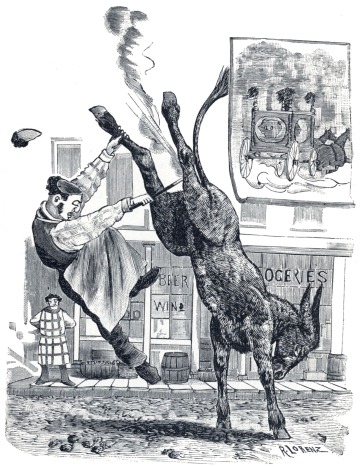
“DER HINT LEG OOF A HELTY MULE ISN’T DER PESHT BLACE TO
GO FOOLIN’ ROUNT.”
and Conrad I. (911-918), and coming down to Ferdinand III. (1637-1658).
It was in this room the new emperor dined with the electors and then
showed himself to the people assembled in the market place in front.
Adjoining this room is a smaller one, in which the electors used to meet
to consult on the choice of an emperor. It is still preserved in the
style of the olden days.
Of course Frankfort has fine churches and a cathedral, but there is no
especial merit in them.
Near the monument erected on the Friedberger Thor by Frederick William
II. to the memory of the Hessians who fell in 1792, during the attack on
Frankfort, is a small circular building which contains one of the most
beautiful as well as most celebrated works of art in Germany, if not in
Europe.
A wealthy banker, named Bethman, purchased from the artist, Dannecker,
of Stuttgart, his masterpiece, the exquisite “Ariadne on the Panther,”
and erected this building for its exhibition. In one part of the room is
a recess, separated from the room by a crimson curtain. The ceiling is
of glass, across which is stretched some heavy crimson cloth stuff. This
filters the light, soft and subdued upon the group, producing a most
beautiful effect. The figure of Ariadne, nearly life-size, is half
sitting, half reclining on the back of the panther, one elbow resting on
the animal’s head. The position is one of grace itself, and the modeling
is perfect. As the soft light is shed upon the pure white marble, one
can almost believe that it is the figure of a living, breathing woman
before him. The effect is greatly heightened by the arrangement of the
pedestal which allows the statue to be slowly revolved, thus giving the
peculiar light and shade effect to every part. It is truly a most
marvelous piece of statuary, and is worthy the admiration and praise
bestowed upon it by the most eminent critics.
During the sixteenth and seventeenth centuries, Frankfort derived the
most of her importance from the great fairs that were held there
annually. Merchants came from all parts of the country, with their
stuffs, and made the old city, for the time being, a great commercial
center, a position its excellent location especially adapted it for. But
later, these fairs lost their prestige, and finally died away
altogether, though occasionally they have an industrial exposition. But
they are nothing compared to the fairs of the olden time.
THE LOVELY GARDENS.
While we were in Frankfort an Industrial Exposition was in progress
which, of course, we visited, and spent at least two hours very
pleasantly, wandering around the different buildings and the beautiful
grounds. The display was about equal to an ordinary State Fair in
Western America. The most enjoyable portion of it all was the ride back
to the depot, through the floral gardens, with their magnificent flowers
and plants and shrubs, and along the broad Anlagen, with their handsome
residences and well kept lawns.
CHAPTER XLIV.
DOWN THE RHINE.
WHAT a flood of anticipations came trooping through the mind at the mere
thought of a sail “Down the Rhine.” Down that famous old river, every
mile the scene of a legend; the river in whose praise poets have sung
for ages; whose every turn reveals a castle or fortress that has figured
for centuries in story and song! What visions of wooded banks, vine-clad
hills, and ivy-covered ruins! What pure, unalloyed pleasure a trip “Down
the Rhine” must be!
And it is. Poets may have written what seemed to be over-wrought praises
of its marvelous beauty; writers may have gone into ecstacies over its
beauty, its grandeur and its sublimity, but they have none of them
exaggerated. It is all that has been said of it, and more.
We were whirled into the fortified city of Mayence, a place that has
long been an important strategical point, early in the afternoon of a
lovely day in August. The sun was shining brightly, the river was clear
and limpid, and everything was propitious. Favorable, indeed, began our
trip down the Rhine.
Sailing down the river, past the grim fortifications on both sides, we
pass between two islands, and soon reach the pretty little town of
Biebrich, where, in A.D. 840, Louis the Pious, son and successor of
Charlemagne, died.
The river at this point begins to assume a bolder and more picturesque
appearance than it did near Mayence, and as we approach Eltville we get
the first glimpse of a ruined castle, built in 1330, by Baldwin,
Archbishop of Treves, who was then Governor of Mayence. It stands high
up the bank, and is almost hidden from view by the trees that surround
it. Just beyond, back of a low-lying island, is the town of Erbach, near
which are some old abbey’s ruins.
“BINGEN ON THE RHINE.”
From here the river is dotted with little islands whose irregular shape
and diversified surface adds a new charm to the scene; while over on the
right bank, in a commanding position, surrounded by fruitful vineyards,
is the celebrated Schloss Johannisberg, built in 1716 on the site of an
old Benedictine monastery founded in 1106. Around this old castle, which
is in good repair, are the vineyards from which come the famous
Johannisberger wines, the favorite of all Rhine wines. From this point
all along the river to the “Siebengeberger” or “Seven Mountains,” the
vineyards that clothe the banks of the river are famous for their
exquisite wines.
A few minutes further on and on the same bank Rüdesheim comes into
sight, flanked by the massive Brömserburg, a massive castle, with
ivy-grown walls, that towers high above the little town below it. This
is another famous wine-producing district, its fame having been handed
down from as far back as the twelfth century. The castle, a
three-storied rectangular building, was erected in the twelfth century,
and has but recently been restored.
With a graceful sweep that reveals new beauties every minute, we came in
sight of Bingen, “fair Bingen on the Rhine,” just where the River Nahe
empties into the noble stream. High above it, on a thickly wooded
eminence, on the site of an ancient Roman fortress, is the Castle Klopp,
with its frowning battlements and forbidding towers.
No one can see what there is about Bingen to make it famous. It never
would have been famous but for the Hon. Mrs. Norton, an English poetess,
who found the name to be properly accented, and of the right number of
syllables for use in a poem, which she wrote. It will be known so long
as the platform is infested with readers and there are school
exhibitions.
“A soldier of the legion lay dying in Algiers,
There was lack of woman’s nursing, there was dearth of woman’s tears.”
That’s the way it commences, and the burden to each stanza is:—
“For I was born in Bingen—fair Bingen on the Rhine.”
It is a most absurd poem. There must necessarily be a lack of woman’s
tears around a shot soldier in a foreign land, for no government on
earth could afford its soldiers any such luxury. How, possibly, could a
government send out a complement of wives, sisters, cousins and aunts to
nurse and weep over each wounded individual? And then this soldier,
mortally wounded, instead of dying properly, goes on through nearly two
hundred lines to send messages to everybody he ever knew in Bingen,
ending each message with:
“Fair Bingen on the Rhine.”
And so, as the boat approached Bingen, all the excursionists, especially
the sweet girls from the seminaries, who were on their Summer vacation,
murmured softly:
“For I was born at Bingen—fair Bingen on the Rhine.”
And one young divinity student, with long hair, and a high forehead, and
long, narrow white hands, deliberately recited the whole poem with what
he firmly believed to be “expression,” which consisted in ending each
sentence with the upward inflection. The ineffable nuisance had spent
the night in committing the drivel to memory, and he spared us never a
line.
The school-girls all said, “How nice!” Tibbitts went below and amused
himself with a bottle of wine, and the majority of the other passengers
walked forward where they could smoke.
And then the real worry of life began. The dozen or more young men with
high foreheads, who did hear the “reader” through, sought you out, and
collared you, and said: “Did you hear Mr. —— read Bingen? He thinks he
can read, but he can’t. Now this is the proper way to read that poem.”
And he went right on, and read it to you as he thought it should be
done. There were thirteen of them.
THE MOUSE TOWER.
Scarcely has this view faded from sight before we pass the ruined towers
of a castle erected in 1210, and destroyed by the French in 1689. Just
opposite this ruin is the famous Mouse Tower, a small, circular tower,
built of massive stone. It takes its name from the legend of Hatto,
Archbishop of Mayence. The legend runs that during a great famine in the
land thereabouts, the poor people were sorely distressed for corn, and
vainly besought Archbishop Hatto, who had graneries full of the previous
year’s crop, to aid them in their time of want. At length he promised
that to all who should be at his barn on a certain morning he would
give corn. Of course the poor people flocked thither, and when the barn
was full he locked the doors, and, despite their piteous cries for
mercy, set the barn on fire, and laughed at their cries, comparing them
to mice that had come to carry away his corn.

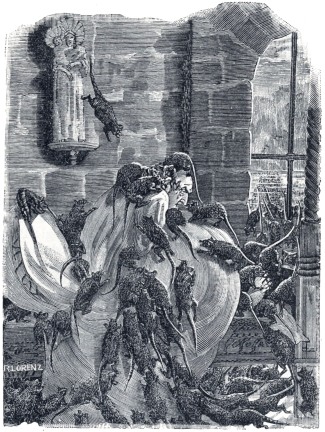
DEATH OF ARCHBISHOP HATTO.
That night he had troubled dreams, as was proper, and in the morning his
servants told him to fly, for his grounds were being filled with rats
who had eaten all the corn he had saved. He hastily quitted his castle
and sought refuge in the castle on the island, thinking that the steep
rocks and swift water would prevent the rats from finding him there.
But they swarmed over the island by millions and the cruel Archbishop
died a terrible lingering death.
This is a good solid legend, with meat in it. There is a great moral
lesson inculcated, and every legend should inculcate a moral. It
contains, I thought, a solemn warning to American grain operators.
But Tibbitts found a great many flaws in it, and said he did not
consider it a good legend at all. It was full of improbabilities. Hatto
made a corner on corn. Very good. He had some purpose in it. Very good.
That purpose could have been nothing but a speculative desire to run up
the price of his corn and sell out at an advance. Very good. To whom
could he sell the corn at a profit? Only to the starving people. Now
what an ass he must have been to corner the corn and then go and burn up
his customers, the people to whom he could have sold the corn at any
price! Mr. Tibbitts insisted, that that wouldn’t wash.
He doubted the rat story also. He knew all about grain operators. He
knew many of them in Chicago who frequently saw rats, and snakes, and
all that sort of thing. Probably Archbishop Hatto had been drinking, and
fancied these things. But it was well enough. One must have legends and
it wouldn’t do to go any more closely into particulars about legends,
than it does to be too critical as to the character of candidates for
Congress. He should accept Hatto, corn, rats and all. It was a very
pretty story—for children. It would teach them not to burn people.
At this point the Rhine makes a sudden bend and the channel becomes very
narrow. Formerly the passage was very dangerous, and in the olden times
it was a favorite spot for the robber knights who had their strongholds
on the banks thereabouts, to stop trading vessels on their way up and
down the river to request the payment of tolls.
THE DEVIL’S LADDER.
The merchants always paid the tolls. Sir Hugo, or Sir Bruno, or Sir
whoever he might be, did not need a Custom House to collect his imposts.
He merely had a score or more of cut-throats, fellows who would kill a
man for sixpence, or its equivalent in the money of the day, and in
default of the sixpence would do it for the sheer love of the thing,
and the trader found it much better to give what was asked than to go to
the bottom of the Rhine with a slit in his windpipe. But I have no idea
that he lost anything. He counted this in his expense account, the same
as the merchant of to-day does his insurance and bad debts, and he took
it out of his customers, and they in turn took it out of the people. All
of these things come out of the ground at the end. It is the tiller of
the soil who finally pays for the soldier, the robber, the judge and
jury, the gin-mill and the faro bank. And Tibbitts referred at once to a
remark he had previously made, that it was vice, not virtue, that cost
the world, that to wipe out the gin-mills was to do away with the
police, the courts, and with the hangman, and everything else connected
with what is called justice, that is so expensive. Armies are supported
to sustain kings and courts, liquor makes police and justices’ courts
necessary, and while everybody seems to pay a tax, none of them do it
but the tiller of the soil, for they all charge up these expenses on
what they do till it gets down to him. What he would do would be to do
away with vice. Virtue is very cheap—so cheap that he wondered more
people did not encourage it.
The banks now assume a more rugged appearance, and on each eminence is a
castle or a ruin. We pass by in rapid succession a number of very
picturesque views, in each one of which these ancient fortresses play an
important part. Those old robbers knew well where to build, and they
built exceeding well.
After passing Lorch we came to the pretty stream of the Wisper, which
empties into the Rhine at this point. On the left bank of the stream is
a rugged cliff, towering high in the air, called the “Devil’s Ladder,”
which, of course, has its legend.
Near Lorch there lived a knight who, after losing his wife, became
sullen and morose, and would have nothing to do with any one but his
daughter, a lovely girl, just budding into womanhood. He refused to
grant hospitality to any one who asked it. One stormy night a knight in
distress applied for shelter and rest and was gruffly refused. The next
morning when old Sibo, the knight, inquired for his daughter, he was
told that she had been seen early in the morning with two sprites going
up the impassable crag across the river. The distracted father hastened
after and could see his daughter on the very summit of the crag. Almost
crazed with grief he in vain besought the sprites to return her to him.
But they only laughed and jeered at him. Finally, after a long time had
passed, a young knight who had long loved the maid returned from the
wars, and hearing the rather awkward situation his early love was in,
hastily repaired to the foot of the crag determined to rescue her. But
it was in vain. There was no way of making the ascent. He was about
giving up in despair when a little figure suddenly appeared before him,
and asked him why he was so despondent. On learning his love for the
girl she told him to come again at the same time the following evening.
The young knight returned promptly, as young men in love always do, and
was surprised to find a ladder reaching from the foot to the top of the
crag. He hastily mounted to the summit, and there in an enchanted garden
he found the object of his search, and soon restored her to her father,
who henceforth was most lavish with his hospitality. The maiden and the
brave young knight were united in marriage and lived a long and happy
life. The ladder remained on the rock for many years, and was called the
Devil’s Ladder. It fell away in the course of time, but the name has
ever since been applied to the great rugged cliff.
It is a thousand pities that some of these ladders and things don’t
remain, simply to give us faith in the legends. If there was just one
round of the ladder left, if one could only be shown the holes in the
rock in which he was fastened, it would be something, but there is
nothing of the kind. You have to take it all on faith, and that is
sometimes wrenching.
THE LURLIEBERG.
All the way along the river, from here to beyond Coblenz, the Rhine is a
succession of constantly changing views as the boat winds its way around
the tortuous channel, every one more beautiful and picturesque than its
predecessor. There are castles on high hills on the right bank, some
close to the river, others further inland, just discernable through the
trees. On the left bank are pretty villas and more castles, and
occasionally an island is passed that has on it a ruined watch tower
built hundreds of years ago, when might was right in this romantic
country.
Just before approaching the pretty village of St. Goar, on the left hand
of the Rhine, the imposing rocks of the Lurlie rise over four hundred
feet above the river. Here the current is very swift, and many are the
tales told of bold adventurous knights who have lost their lives under
the shadow of this famous rock.
Of course the Lurlieberg, as the rock is called, has its legend, as has
every well regulated rock on the river. A rock without an appropriate
legend would be no rock at all. The knights and ladies, and witches and
devils, of the olden time, existed, apparently, solely in the interest
of the booksellers of Mayence, and the other cities of to-day. The
legend of the Lurlie runs something like this:
The rock known as the Lurlie was the resort of a water-nymph, who was
about as capricious as other nymphs. She was a young lady who could live
under water as well as above it; in fact, her permanent residence was
under the Rhine. Her regular recreation was to come out of the wet, and
sit on a rock, and comb her long, yellow hair (she was a natural blonde,
as all entrancers are), and sing, accompanying herself on a golden lute.
Of course all the young men in the vicinity fell desperately in love
with her, and they went for her. But while the nymph would sing and pose
for them so as to set them crazy, their boats were all dashed to pieces
upon the rock, whereat the nymph would laugh, and comb her hair, and
sing, and entice other young fellows to their doom. She was kindly only
to fishermen, and the one item to her credit is that she never did them
harm, but always good. That was probably because they were old men, and
unimpressible.
The son of a count in the vicinity, fell in love with her, and despite
the warnings he had received, determined to conquer her. He ordered his
boat, and commanded the men to steer for the fatal rock. There was no
nymph on it at first, but after a minute or two she appeared more
radiantly beautiful than ever. The foolish young man attempted to climb
the rock, but he fell into the seething waves and was never more seen.
Then his father swore vengeance and sent valiant men to seize her and
burn her as a witch. The result might have been anticipated. The nymph
sang a song to the waves and plunged into them, laughing, the same waves
upsetting the boat which held the soldiers, and she descended to her
cave under the water, while her pursuers thought themselves lucky to
escape with their lives.
At another time a maiden loved a young man who was to go to Palestine to
fight the Saracens. During his absence she was so persecuted by the
other young men that she retired to a convent near the Lurlie, and
waited for her lover. At last she saw a boat approaching filled with
men, and among them, gorgeously attired, was her young man.
Unfortunately to get to where she was the boat had to come very near the
rock, the water-demons raised the whirlpool, the beautiful nymph
presiding with a mocking smile, and they seized the doomed craft and
hurled it against the rock, and down it went, and all on board were
lost. The hapless maid plunged into the seething waves after her lover,
and as she went under the flood, the nymph of the Lurlie appeared on the
surface, beautiful as ever, but with the laugh that was frightfully
harsh and discordant. She could not bear to see earthly young maids
happy.
That same night she was on the rock as usual, combing her hair, and
other young men got into her toils, till there was a scarcity of
eligible suitors in the neighborhood.
She was a dangerous person, this young nymph of Lurlie.
Passing Coblenz, a beautiful city, picturesquely situated at the
confluence of the Mosel and the Rhine, we soon came to the
Siebengebergen, “Seven Mountains,” the rugged banks gradually tone down,
and between Bonn and Cologne the scenery is not so interesting, because
of the grandeur of that which has preceded it. Still it is not
altogether devoid of interest, though it is of a quieter and less
imposing kind. After a five hours’ ride through such magnificence, one
is quite willing to take it in a little milder form, and we were
thoroughly content when we landed in Cologne, the great cathedral city.
THE SMART YOUNG MAN.
Was there ever a steamboat, or stage, or rail car, or any other place
where people are thrown together in such a way that they can not
escape, that that unmitigated nuisance, that nuisance without any
compensating features, the knowing young man, the young man who knows
everything that a young man should be ashamed to have it known that he
does know, is not present? There is a tremendous crop of these weeds
every year: Lightning strikes innocent cows and beautiful houses, but it
never hits one of these fellows, which argues a great waste of
electricity. Good men and beautiful women die of fevers and such
complaints, but these insects never have anything of the kind. A row of
shanties never burns, but stately buildings go down or up in smoke
daily.
They are an exasperating set. They do not seem to know that it is rather
discreditable than otherwise for a man not in the trade to actually
know all about wines and liquors, and things of that nature. But when
a young fellow is weak enough to profess this disreputable knowledge
when he has it not, he ought to be immediately taken out and killed. To
see the old wine tasters and the ancient beer drinkers, who do actually
know all about these things, smile and wink at the vaporings of these
young simpletons, is a piteous sight. But, heaven help them, they go on
just the same. Panoplied in egotism, they do not know they are asses,
and therefore enjoy themselves. It is a delightful thing to be an
egotist. An egotist pities the people who do not enjoy him.
We had him on our steamer down the Rhine. He was six feet high, with a
moustache, and a billy-cock hat, and pointed shoes, and short coat, and
all that, and he talked to everybody.
“Know Ned Stokes? Should say so! Knew him before he killed Jim Fisk.
Used to meet him at Harry Felter’s, and many a hot old time I’ve had
with him. Last time I met Ned was in Chicago, and we were both so blind
drunk we didn’t know whether we were in Illinois or Louisiana.”
He rattled on about wines, and salads, and so on, and then a bottle of
wine that he had ordered came up. He took a little of it in his mouth,
and rinsed it, and passed the bottle under his nose, backward and
forward, and sniffed critically, and then remarked sagely that it would
do, but that it was not quite up to the mark, and that it was difficult
to get good wine even in the Rhine country.
From this he glided off to beer, criticising the various varieties, with
the air of a man who had lived a long life in sampling beverages and
doing everything else of that kind, and he branched out in cheerful
conversation about celebrities in the various walks of life.
“D’ye ever meet Ned Sothern? Poor Ned! There was Ned and Billy Florence,
and we used to have high old times before poor Ned went under. I
remember—”
Tibbitts moved uneasily in his chair, which portended something.
“Then there was Uncle John Brougham, and Lester Wallack”—and he went
glibly through all the noted actors and actresses as though he had been
a boon companion and bosom friend of all of them for years.
Then he took a short excursion into the realm of sport. He knew every
pugilist who had ever fought, every rower, every pedestrian, and all the
crack shots and base ball players, and he had the dates of their various
performances down to a dot. He reeled off this interesting matter,
toying the while with corks from champagne bottles, pausing a moment in
his narrations, to give the history of each one.
He not only knew all these people, but he never by any means used family
names. He did not say, “Mr. Fechter,” it was “Charley,” “Old Charley,”
and when he spoke of women it was not “Miss Rose Eytinge,” it was
“Rosy.” And he kept on talking of clubs, and horses, and yachts, and
fishing, and gunning, and cards, and women, and racing, and “events” of
that sort, till Tibbitts pounced down upon him as a cat does upon a
mouse.
“May I ask what part of the Great Republic you are from?” asked
Tibbitts.
“I hail from Kokomo, Indiana, but I spend most of my time East.”
“Your business?”
“Business, ah, I am in hardware.”
MR. TIBBITTS’ ROMANCE.
“I see—you have a branch house in New York. Do you know Billy
Vanderbilt? No? You ought to know him. Take Billy Vanderbilt and Russ
Sage, and Cy Field, and little Gouldy, and you just more than have an
everlasting team. And there’s Chet Arthur; who’d ever spose that Chet
would ever have got to be President? Some men have all the luck. And
there’s Jack Sherman, of Ohio, why Jack and I—but never mind. I don’t
let on all I know. But I tell you, when Jack and his brother Cump—he’s
the general of the armies now, and his other brother Charley, is a
judge. Poor Scotty, of Philadelphia, the president of the Pennsylvania
Road, he’s gone. He couldn’t stand the racket, and he went under. But
Hughy Jewett, of the Erie, he’s another kind of a rooster, he is. He is
in with Gus Belmont, and they two, with Jim Keene and Dave Mills, of San
Francisco—well you ought to just see them punish wine after they have
taken the boys in and done for ’em. They are up to everything, they are.
I remember one night—”
“Where are you from?” asked the knowing young man, gasping in
astonishment at this array of names and the familiarity with which they
were used.
“Me! Oh, I’m from Oshkosh; but I have a branch house in New York too. I
go down just once a year to sell live stock, and I pick up more names in
the week I stay there than an ordinary man can remember, and I remember
all their given names, and I can reel them off just as fast as any
Indiana young man I ever met, and I know them just as well. Only I
prefer financiers and statesmen to horse men, actors and prize fighters.
I am very select. Next year I shall not know anybody under a senator.
You may just as well know big men, really great men, as merely notorious
ones. Now there’s ‘Lyss Grant and Bob Schenck, and Rufe Ingalls, and
Black Jack Logan, you ought to just sit down with them at a game of
poker! That’s where you have sport, and as for fishing, Bill Wheeler,
till he got spoiled by being Vice-President, he could everlastingly
handle a rod, and the way he’d yank ’em out was a caution. He was no
slouch. Many a time I’ve—”
The wise young man from Kokomo, Indiana, Who Knew Everybody, could not
endure the reminiscences of the Oshkosh young man, and he beat a
precipitate retreat and we saw him no more. Tibbitts drew a sigh of
relief and remarked that he had never strained his imagination so
frightfully in all his life.
CHAPTER XLV.
COLOGNE, ITS CATHEDRAL AND OTHER THINGS.
THERE may be altogether too much of even cathedrals. After going through
those in London, then tackling those in Northern France and wandering
through those in Paris, going out of your way to see a dozen more or
less in Southern France, then taking by the way the big and little ones
in Switzerland, one gets, as it were, somewhat tired of cathedrals, and
wishes the necessities of travel did not compel him to see more of them.
To a certain extent they are all alike. It is true they are all built in
different styles, but there is a striking family resemblance, and they
are so alike that after you have seen a dozen or two you will not be
very much interested in those to follow.
The interiors are all alike, and the “objects of interest” are the same.
They have the same style of pictures, there is always a “Descent from
the Cross” by an old master, and there is a well-selected assortment of
saints, also by old masters, and the interiors are always dim and
sombre, and have the precise kind of light that aggravates the always
too faithful picture of a saint undergoing martyrdom, or dead just after
martyrdom.
Mr. Tibbitts discoursed at length upon the general gloominess of
religious institutions. Inasmuch as the builders of churches put in
their time and money for the good of mankind, he wondered why they
didn’t have the knowledge of human nature, and the good sense of those
engaged in wicked pursuits.
AN ORTHODOX CHURCH.
“Cathedrals in Europe,” said he, “and even the churches in our own
beloved country, are always the darkest, gloomiest places that human
ingenuity can possibly devise. I remember the one my grandmother used to
compel me to attend when I was a boy of six. The interior, even to the
pews, and their furnishings were of a dark and dismal color, the
hen-coop pulpit was dark, the trimmings about it were dark, the windows
were narrow and very high up. The ceiling was dark, and to add to the
prevailing gloominess, there were outside green blinds over the windows
that admitted just enough light to make the gloom of the interior felt.
And then the domine was a sallow man with gray hair, brushed back from
his forehead; and he dressed in a black frock coat buttoned up to his
chin. He was the least cheerful picture in the church.
“The seats in the pews were very high, and slanted slightly forward, as
did the backs; and as the feet of a six-year-old child wouldn’t touch
the floor, it was the most distressing thing in life to sit there. And
then the music! The worthy old gentleman in the pulpit, in a voice as
harsh as a saw mill, would grind out a most doleful hymn, which was
always sung to most doleful music. And that was followed by a sermon
three hours long, on the doctrine of foreordination! Cheerful, for a boy
of six, who, when dragged into that gloom on a bright June morning,
looked longingly out upon the bright, green fields, on which the soft
sunlight was falling like a benison from a good Creator; and who, to get
to the church, had to cross a beautiful brook with trout, which knew no
Sunday, swimming in the clear waters, every ripple of which was an
invitation to him.
“Now the wicked people are a great deal more wise than this. A wicked
place is always made attractive. There never was such a lie written as
“Vice is a monster of such hideous mien.” Vice is not hideous; it is
that which follows vice that is hideous. Champagne is as beautiful as
can be; its effects are hideous. It isn’t the getting drunk that is
hideous; it is the resultant headache the next morning. A bar-room is
always made light and pleasant; there is silverware, and curious glass,
and chandeliers, and warm fires, and everything pleasant and cheerful.
Your merchant, who is worldly if not wicked, makes his place as pleasant
as possible, and even the butcher dresses his meats in sprigs of
evergreen. If I ever go into the ministry, I shall do away with gloom,
and have my place as pleasant as light and flowers can make it. As
religion is the best thing in the world, I don’t see why it should be
made the gloomiest. As for these pictures—bah!”
Then we went through the cathedral. We did it as a duty.
There’s another trouble about cathedrals, and that is the “restoration”
that is going on perpetually and constantly. They were all commenced
some hundreds of years ago, they were very slow in building, and by the
time the last part was done the first part had decayed, and had to be
restored. Go wherever you may in a cathedral, you shall see a large part
of it disfigured with scaffolds, with workmen on them, and building
material around, giving one the idea they are yet unfinished.
It is said by scoffers and sneerers that the reason why it took several
centuries to finish a cathedral was to prolong the time for pulling
money out of the faithful, and that the perpetual restorations that are
going on are for the same purpose, but of course that is a slander. Boss
Tweed might do such a thing, but not those filled with zeal for
cathedrals.
Cologne has many points of interest, but the principal one is its grand
cathedral, the fourth largest in Christendom; St. Peter’s at Rome
standing first, the cathedral at Milan second, St. Paul’s in London
third, Cologne fourth.
Though it may not be so huge in its dimensions as the other three, it
certainly cannot be excelled in beauty of design or artistic excellence
in construction. It is cruciform in shape, with a total length of one
hundred and forty-eight yards, and sixty-seven yards breadth. Its walls
are one hundred and fifty feet high, the roof two hundred and one feet,
and the tower over the transept three hundred and fifty-seven feet, and
the two towers over the west façade two hundred and fifty feet high.
Tibbitts didn’t think much of the architect. The tower over the
transept, he insisted, should have been an inch, or an inch and a half,
wider at the top.
These figures, however, give but a faint idea of the immensity of the
structure, whose imposing appearance is greatly heightened by the
elaborate galleries, turrets, flying buttresses and cornices that adorn
every portion of the walls and towers.
THE GREAT CATHEDRAL.
The history of this cathedral, which has been building since 1248, is
somewhat interesting to those who take any interest in cathedrals. The
foundation stone was laid on the twenty-fourth of August, 1248, by
Archbishop Conrad, of Hechstaden, but it was a number of years before
anything more was done. In 1322 the choir was finished and consecrated.
In 1388 the nave was fitted up for use, and in 1447 the bells were
placed in the south tower. From that time the interest in the work
gradually died out, and it seemed as though the original design would
never be carried out. In 1796 the French took off the lead roof that had
been placed over the decaying building, and converted it into a hay
magazine.
It was not till 1823 that anything was done to restore the church. In
that year the work of renovation commenced, and a few years later a
talented architect named Zwirner, suggested the completion of the
building according to the original designs. The idea was
enthusiastically taken up, and in 1842 the work was begun, and has been
steadily continued, until now only a few finishing touches remain to be
given.
The architect who first designed this structure, undoubtedly the finest
Gothic edifice in the world, is not definitely known, though it is
commonly supposed to be Meister Gerard, of Riehl, a small village near
Cologne. The imaginative people there had to have a legend about the
cathedral, which is as follows:
Archbishop St. Engelbert conceived the idea of building, on the site of
an old Roman church, the most magnificent cathedral the world ever saw.
He called to him a young architect and told him to prepare plans in
accordance with this idea. The young man, delighted with this
opportunity of distinguishing himself and making his name famous
forever, worked night and day to design a building that would meet the
requirements of the Archbishop. But there was one part he could not
master. He became almost insane over his disappointment, and was about
to give up, when one night he dreamed he saw the missing portion
sketched on the wall of his chamber. Thoroughly awakened, he sprang from
his bed to make a copy of it. But it had disappeared, and in the room
stood Satan with an illuminated parchment in his hand. This contained
the long sought plan. Satan, doing the regular thing, offered it to the
despairing architect on condition that he should have his soul and that
of the first person who entered the cathedral. The young man was
distracted. He wanted the plan, and told Satan he might have his soul;
but he could not barter away the salvation of another. Satan smiled,
returned the parchment to his bosom, and was about to go away, when the
young man acceded to his terms.
The devil knew his business. He knew that the architect’s ambition would
not let him stop for a soul or two, as he had mortgaged his own, and
that he would get him finally. He has gone on that principle ever since
and has always won.

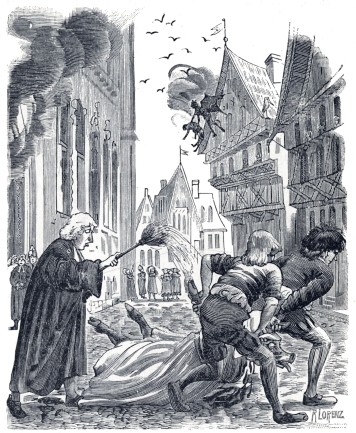
LEGEND OF THE CATHEDRAL—COLOGNE.
HOW SATAN WAS FOOLED.
The plans were then made out, and work on the beautiful edifice was
pushed rapidly forward, and at length was so far completed that a date
was set for the consecration. Then the architect realized the position
he was in. Not only was his own soul everlastingly lost, but that of an
innocent person. This so preyed upon his mind that the people noticed
his agitation and besought the Archbishop to ascertain the cause. The
unhappy man finally told the good father the whole circumstance, much to
the latter’s horror. He was advised to make his peace with God, while
the Archbishop determined to sacrifice a woman of ill-repute who was in
prison awaiting sentence, by making her the first to enter the church.
When the day for consecration came, a long box containing, as was
supposed, the poor woman, was carried to the cathedral, the door was
opened, the lid of the box was taken off, and the unfortunate victim
crawled on her knees into the church, the attendants sprinkling holy
water all the time.
As she entered there was a terrific noise. Satan appeared, broke the
neck of the unfortunate in the box, flying off, presumably, with her
soul. He then flew to the architect’s house and broke his neck. As Satan
disappeared from the church, the woman arose from the box, went into the
building to pray, while the servants carried from the dome the carcass
of a pig, which had been enveloped in a woman’s gown, and sacrificed.
This legend will not do, any more than the other legends you hear about
these places. Satan could not have been fooled with a pig. It is no
compliment to him. To suppose that he did not see the woman enter the
church is to give him credit for very little intelligence and a most
singular neglect of his own business; and the attempt to try to swindle
him with so clumsy a contrivance is too absurd. And then why should
Satan be perpetually swindled? The contract was a fair one, and should
have been carried out in good faith.
It may be remarked, in passing, that Satan does not, now-a-days, appear
to those having charge of government buildings in the United States,
making offers of plans and other assistance, that he may get them in the
end. He is too acute for that. Why should he go to the trouble of
helping them, when he knows perfectly well that he will get them,
anyhow? He doesn’t waste his time that way any longer.
The interior of the cathedral is large and very impressive, the
fifty-six pillars which support the roof being of huge but graceful
dimensions, giving a pleasing aspect to the whole. The stained glass
windows are particularly fine, being among the best in Europe.
The various chapels that surround the nave are all handsomely decorated
with statues, frescoes, and fine altars, done in the highest style of
art. The wood carving representing The Passion in the altar of St. Clara
is especially good, as is also the tapestry on the walls back of the
choir stalls, illustrative of the Nicene creed and the seven sacraments.
This tapestry was worked by the ladies of Cologne, and is a fine
specimen of that style of art.
From the cathedral the visitor naturally turns to the other churches,
but a hasty inspection of them is all that is required, for, after the
cathedral, everything else loses its interest. There are some very
imposing edifices, which, if they did not suffer so by comparison with
the cathedral, would be considered fine specimens of early architecture.
For instance, the Gross St. Martin, consecrated in 1172, which is a
massive building, with an imposing tower surrounded by four corner
turrets.
The still older church, St. Maria im Capital, consecrated in 1049, is in
the shape of a cross, built in the Romanesque style. The interior is
decorated with modern frescoes that are very badly done, being of light
and gaudy colors, that do away entirely with the idea that they adorn a
place of worship. Other churches of interest are, St. Peter’s and St.
Cecilia, the former of the sixteenth and the latter of the tenth and
twelfth century; St. Gereon, dedicated to the three hundred and eighteen
martyrs of the Theban legion, with their Captain Gereon, who perished on
the site of the church during the persecutions of the Christians under
Diocletian.
On the substructure of an ancient Roman stronghold stands the
Rath-house, a picturesque building erected in different centuries,
beginning with the fourteenth. Here the meetings of Hanseatic League
were held in the fourteenth century.
From the Rath-house the visitor turns to the markets, passing through
narrow, dirty streets, with high overlapping houses, to the monument of
Frederick William III., a huge equestrian statue of the King. Here is
the Heumarkt, and a busy sight it is. As far as the eye can reach is a
vast concourse of people, buying and selling all manner of things. The
women, with their white caps and peculiar dresses, flit hither and yon,
talking, laughing and jesting with men, who are arrayed in costumes that
suggest the old Rheinish peasants, made familiar by the painters of the
old Rheinish school.
ELEVEN THOUSAND VIRGINS.
Time was when Cologne, founded by the Ubii, when Agrippa compelled them
to migrate from the right to the left bank of the Rhine, was a power in
that land. At the end of the fifteenth century she was the wealthiest
and most influential city in Germany: Not only was it great in commerce,
but it was the center of German art, both in architecture and painting,
as may be seen yet by the elegant buildings, designed and erected in
those olden days, that are yet standing, and in the pictures of that age
that are still preserved.
Cologne’s great troubles were internal dissensions, which finally led to
the banishment of the Protestants in 1608. It was due more than to any
other one cause, to these discords that caused the city to gradually
decline in power as early as the middle of the sixteenth century. Later
on she lost nearly all her importance and continued in a state of
lethargy until the Prussians obtained control in 1815, since which time
her trade and commerce have been steadily improving, making her to-day
one of the chiefest commercial cities in Germany.
In the old church of St. Ursula are the alleged bones of eleven thousand
virgins. The legend is that this sainted woman, a Scotch princess, was
returning from a pilgrimage to Rome with eleven thousand virgins in her
train, and they were set upon by the barbarous Huns and all slain. There
can be no doubt as to the truth of the legend (if you want to believe
it), for you are shown, through gratings, bones enough to stock a
cemetery.
I have no opinion about it. Possibly St. Ursula was skillful enough to
corner that number of virgins; but would the Huns have slain them all?
That makes us pause. It was a great many years ago, and I am glad the
legend has it (for I wish to believe all the legends I can) that the
virgins came from a country far distant from Cologne. Could a saint, be
she ever so devout, find that number in Cologne now? It is not for me to
say. Possibly they are all gone on pilgrimages. Let us take the legend
down at one gulp, and forget the fact that among these bones are the
remains of any number of males, and likewise any number of animals.
In this same church you are shown one of the identical jars in which
water was miraculously turned into wine at the marriage in Cana, and
various other relics, such as the teeth of saints, and cheerful things
of that nature, in which I really could take no especial interest. After
the eleven thousand skeletons of virgins, anything else in the way of
relics seemed tame. If they had saved the teeth of eleven thousand
saints, it would have been something like; but isolated teeth, single
teeth at that, make too small a show. The teeth were doubtless genuine,
but there were too few of them.
Cologne is probably the best known city in Europe. Leaving out the
wonderful cathedral, and the bones of the virgins and the history that
clings to it, giving it a musty and ancient flavor, it is the place
where cologne water was invented, and where is the American school-girl
who does not know all about that? She may know nothing about the
cathedral, but she knows all about that especial perfume. A man named
Farina invented it several generations ago, and every male child born
since in the families of perfumers has been christened Farina. There are
at least fifty places where the “original” is sold. Here you get the
genuine, and though you shall have it much better in any little drug
store, in any Western village in America, you buy a flask of it in
Cologne, at one of the originals. It is the thing to do. Our party all
supplied themselves, though I noticed that the most of them threw the
flasks away, from the train on the way to Brussels. It was genuine, but
cologne by any other name would smell as sweet.
Home! There are other countries to see, but, first, home. Three
thousand miles away lies a land fairer than any yet visited, a
country more pleasing. We are glad that our time is expended, for
we go home! Six months of absence is quite enough, and the thought
of returning makes the blood course quicker in one’s veins. And yet
never was time more profitably spent than in these rambles through
strange countries, for the experience put us in condition to
appreciate our own. An American has no idea how good America is,
till he sees Europe. He does not know how good a government he has,
till he lives for a time under others. It requires a glimpse of
oppressed Ireland or king-ridden Prussia, to make one properly
appreciate a Republic. We have no palaces, but we have no soldiers.
We have no cathedrals, but we have no paupers. We have no ruins,
and shall never have, for under our system the ephemeral structures
of to-day will be replaced to-morrow with what will be eternal.
Every American should go abroad once at least, that he may, with
sufficient fervor, thank the fates that cast his lines in pleasant
places. And so, glad that we have been abroad, but much gladder to
get back, we turn our faces westward. Our exile is ended.
THE END.
| Typographical errors corrected by the etext transcriber: |
|---|
| when its gets older=> when it gets older {pg 19} |
| Never heerd of=> Never heard of {pg 29} |
| Then there is the eminently respectable shops=> Then there are the eminently respectable shops {pg 48} |
| assured us that he know=> assured us that he knew {pg 61} |
| peace and and quietness=> peace and quietness {pg 99} |
| Waiting uopn Messrs.=> Waiting upon Messrs. {pg 109} |
| a repectable paper=> a respectable paper {pg 114} |
| But is is not alone=> But it is not alone {pg 132} |
| an American would irrevelantly say=> an American would irreverently say {pg 140} |
| must be feed=> must be fed {pg 167} |
| the average menhanic=> the average mechanic {pg 172} |
| a hugh merchantman=> a huge merchantman {pg 180} |
| A PLEASENT PLACE TO LIVE=> A PLEASANT PLACE TO LIVE {pg 219} |
| began preparing=> begun preparing {pg 120} |
| fire works were diplayed=> fire works were displayed {pg 263} |
| religous ceremonies=> religious ceremonies {pg 283} |
| royal palaise=> royal palais {pg 324} |
| for he know that=> for he knew that {pg 429} |
| nephews and neices=> nephews and nieces {pg 399} |
| as if by faries=> as if by fairies {pg 430} |
| than a theif has to your watch=> than a thief has to your watch {pg 450} |
| equivalant to ten cents=> equivalent to ten cents {pg 507} |
| leave Chamounix=> leave Chamonix {pg 531} |
| in an ampitheater=> in an amphitheater {pg 569} |
| to yet=> as yet {pg 601} |
| as my modest appeal=> to my modest appeal {pg 601} |
| feminity=> femininity {pg 604} |
| is very plenty in Baden-Baden=> is very plentiful in Baden-Baden {pg 609} |
| It’s streets=> Its streets {pg 634} |
| troubulous times=> troublous times {pg 646} |
| Conrad I. (911-918)=> Conrad I. (911-818) {pg 650} |
| flying butresses=> flying buttresses {pg 666} |
| during the the persecutions=> during the persecutions {pg 670} |
*** END OF THE PROJECT GUTENBERG EBOOK 46451 ***
![]() will bring up a larger version of the image.
will bring up a larger version of the image.
